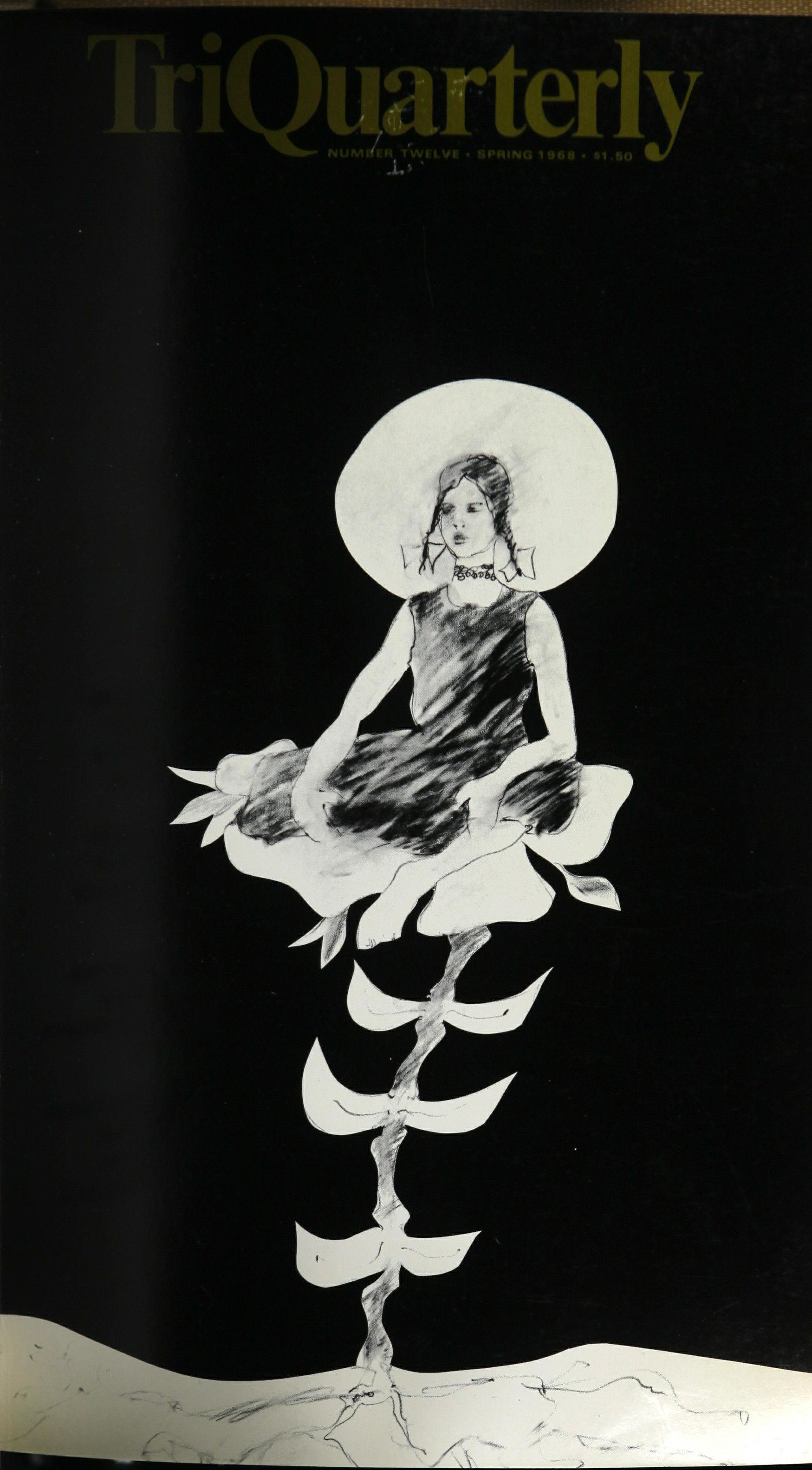
! J '\).�

EDITOR MANAGING EDITOR
ART DIRECTOR
ASSOCIATES
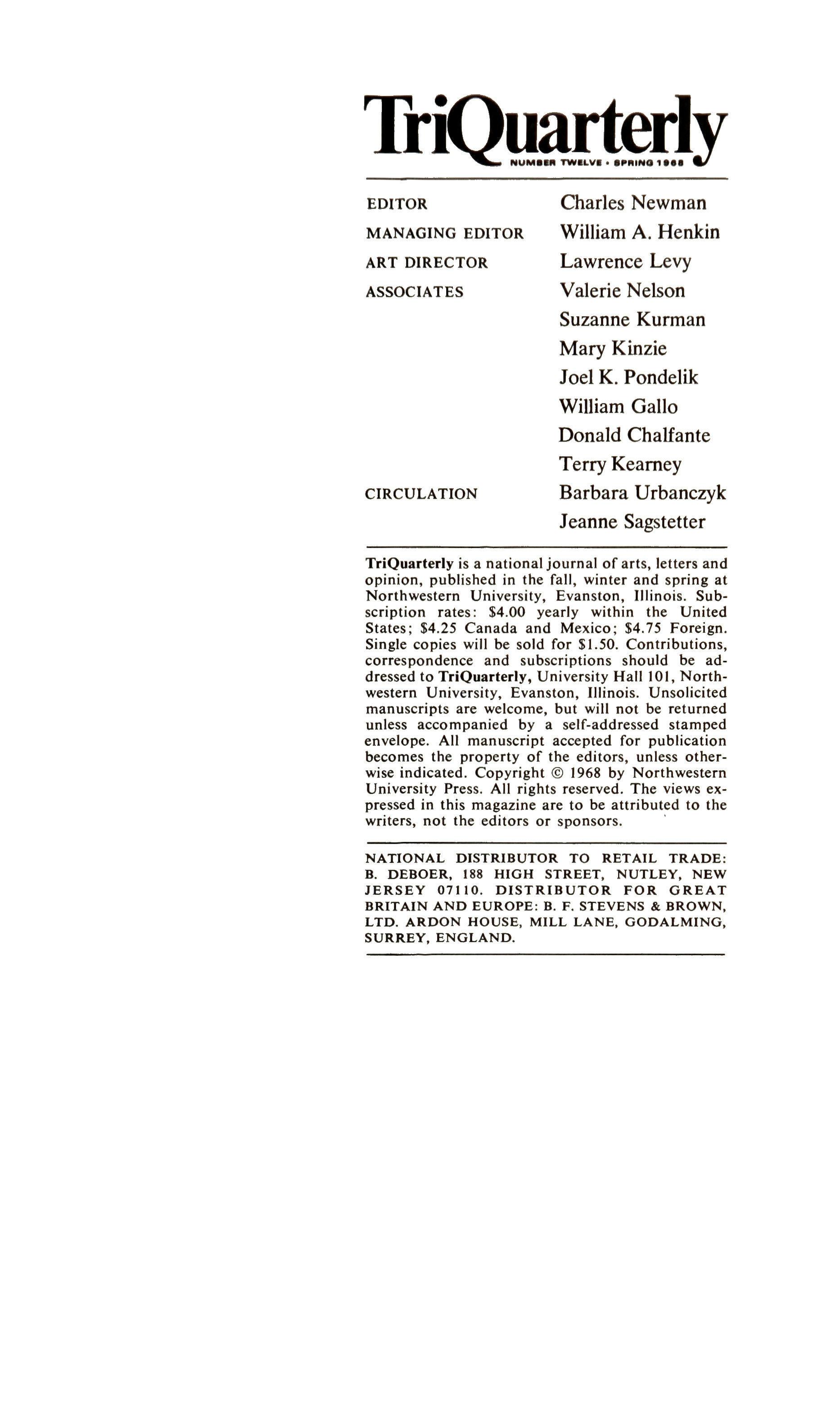
CIRCULATION
Charles Newman
William A. Henkin
Lawrence Levy
Valerie Nelson
Suzanne Kurman
Mary Kinzie
Joel K. Pondelik:
William Gallo
Donald Chalfante
Terry Kearney
Barbara Urbanczyk
Jeanne Sagstetter
TriQuarterly is a national journal of arts, letters and opinion, published in the fall, winter and spring at Northwestern University, Evanston, Illinois. Subscription rates: $4.00 yearly within the United States; $4.25 Canada and Mexico; $4.75 Foreign. Single copies will be sold for $1.50. Contributions, correspondence and subscriptions should be addressed to TriQuarterly, University Hall 101, Northwestern University, Evanston, Illinois. Unsolicited manuscripts are welcome, but will not be returned unless accompanied by a self-addressed stamped envelope. All manuscript accepted for publication becomes the property of the editors, unless otherwise indicated. Copyright © 1968 by Northwestern University Press. All rights reserved. The views expressed in this magazine are to be attributed to the writers, not the editors or sponsors.
NATIONAL DISTRIBUTOR TO RETAIL TRADE: B. DEBOER, 188 HIGH STREET, NUTLEY, NEW JERSEY 07110. DISTRIBUTOR FOR GREAT BRITAIN AND EUROPE: B. F. STEVENS & BROWN, LTD. ARDON HOUSE, MILL LANE. GODALMING, SURREY, ENGLAND.
NUM L'"i'aLV ""INO 1
GEORGE LICHTHEIM
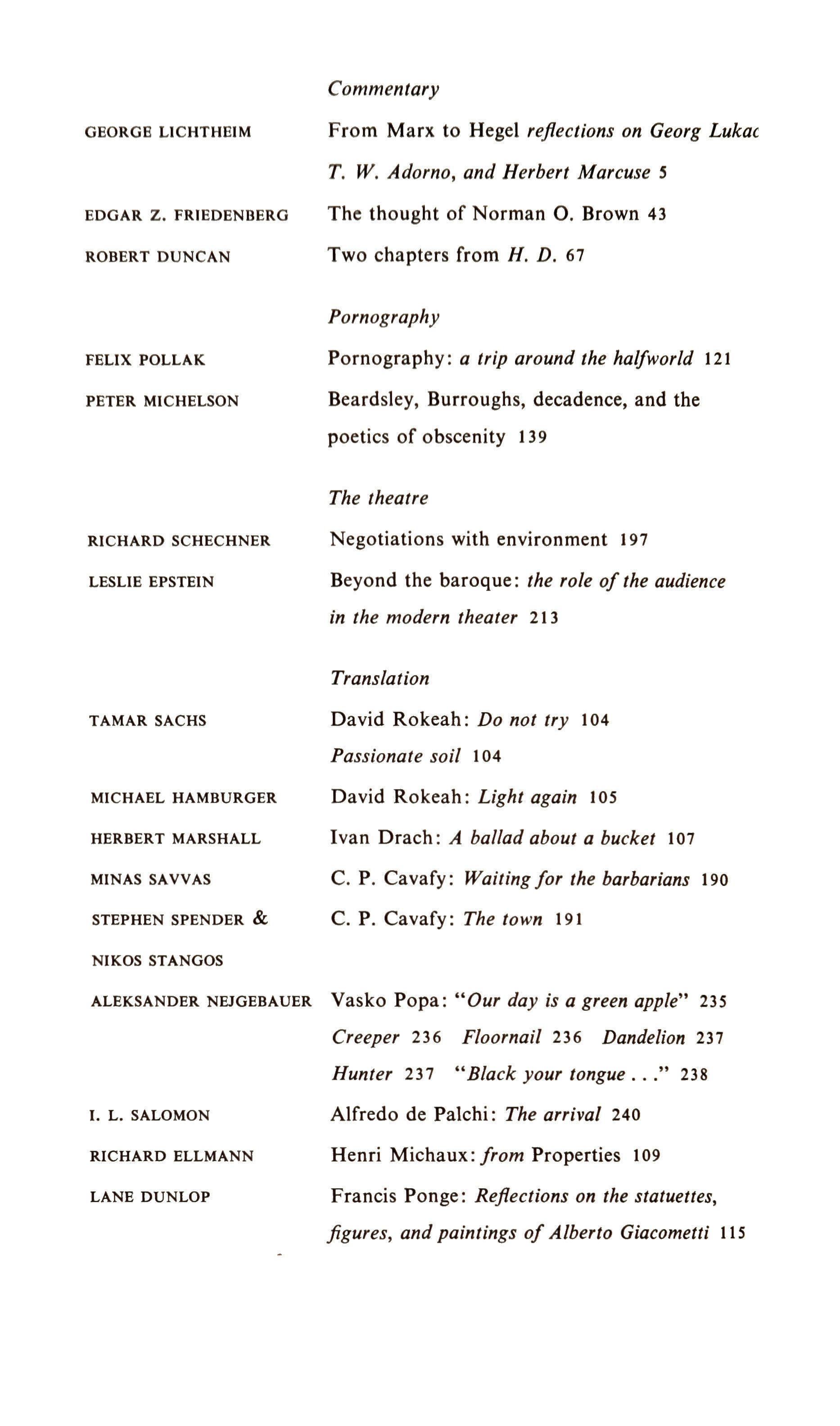
EDGAR Z. FRIEDENBERG
ROBERT DUNCAN
FELIX POLLAK
PETER MICHELSON
RICHARD SCHECHNER
LESLIE EPSTEIN
TAMAR SACHS
MICHAEL HAMBURGER
HERBERT MARSHALL
MINAS SAVVAS
STEPHEN SPENDER & NIKOS STANGOS
Commentary
From Marx to Hegel reflections on Georg Lukac
T. W. Adorno, and Herbert Marcuse !i
The thought of Norman O. Brown 43
Two chapters from H. D. 67
Pornography
Pornography: a trip around the halfworld 121
Beardsley, Burroughs, decadence, and the poetics of obscenity 139
The theatre
Negotiations with environment 197
Beyond the baroque: the role of the audience in the modern theater 213
Translation
David Rokeah: Do not try 104
Passionate soil 104
David Rokeah: Light again 105
Ivan Drach: A ballad about a bucket 107
C. P. Cavafy: Waitingfor the barbarians 190
C. P. Cavafy: The town 191
ALEKSANDER NEJGEBAUER Vasko Popa: "Our day is a green apple" 235
Creeper 236 Floornail 236 Dandelion 237
Hunter 237 "Black your tongue 238
I. L. SALOMON
RICHARD ELLMANN
LANE DUNLOP
Alfredo de Palchi: The arrival 240
Henri Michaux: from Properties 109
Francis Ponge: Reflections on the statuettes, figures, and paintings of Alberto Giacometti 115
-
JOY N. HUMES
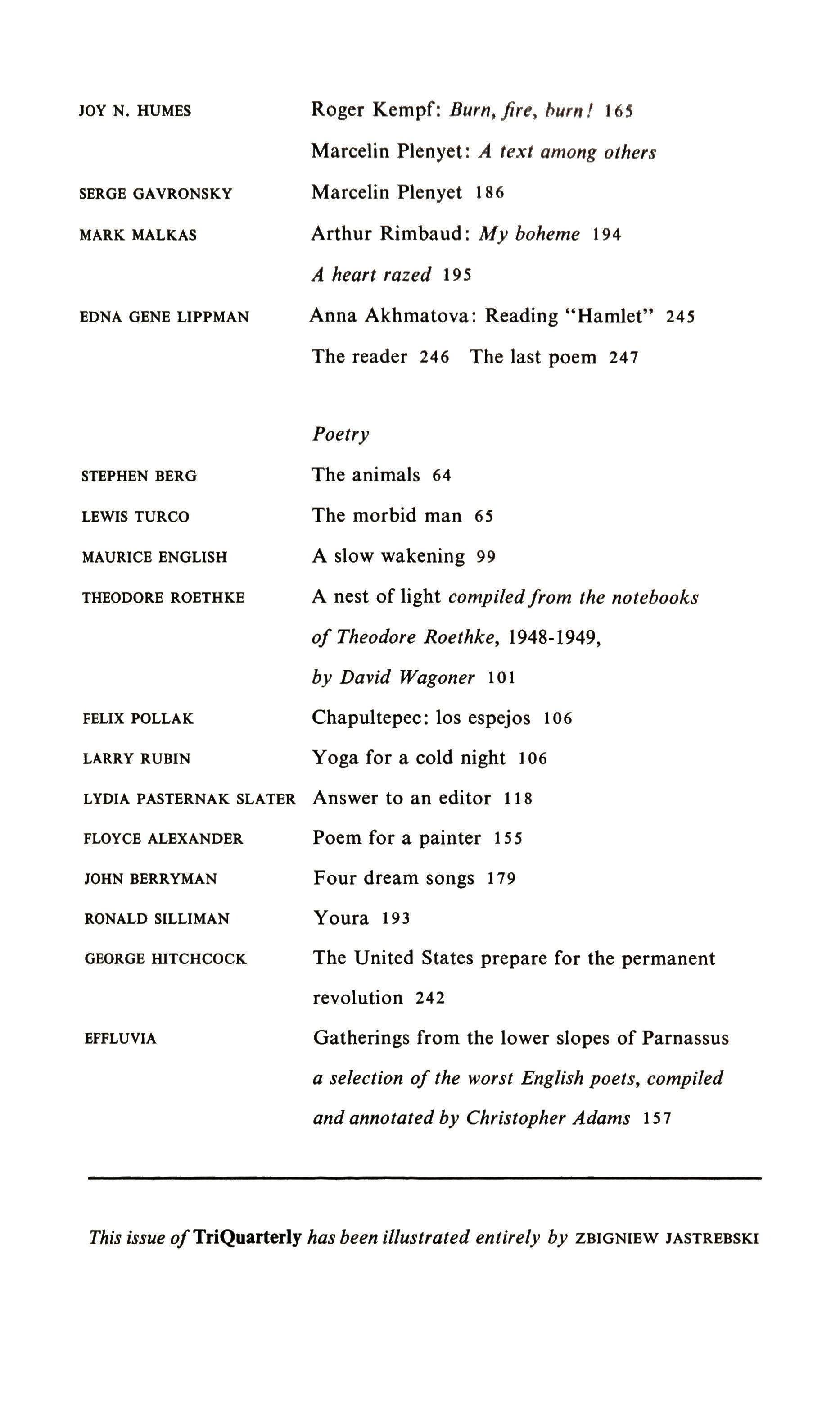
SERGE GAVRONSKY
MARK MALKAS
EDNA GENE LIPPMAN
STEPHEN BERG
LEWIS TURCO
MAURICE ENGLISH
THEODORE ROETHKE
FELIX POLLAK
LARRY RUBIN
Roger Kempf: Burn, fire, burn! 165
Marcelin Plenyet: A text among others
Marcelin Plenyet 186
Arthur Rimbaud: My boheme 194
A heart razed 195
Anna Akhmatova: Reading "Hamlet" 245
The reader 246 The last poem 247
Poetry
The animals 64
The morbid man 65
A slow wakening 99
A nest of light compiledfrom the notebooks of Theodore Roethke, 1948-1949, by David Wagoner 101
Chapultepec: los espejos 106
Yoga for a cold night 106
LYDIA PASTERNAK SLATER Answer to an editor 118
FLOYCE ALEXANDER Poem for a painter 155
JOHN BERRYMAN
RONALD SILLIMAN
GEORGE HITCHCOCK
EFFLUVIA
Four dream songs 179
Youra 193
The United States prepare for the permanent revolution 242
Gatherings from the lower slopes of Parnassus
a selection of the worst English poets, compiled and annotated by Christopher Adams 157
This issue ofTriQuarterly has been illustrated entirely by ZBIGNIEW JASTREBSKI
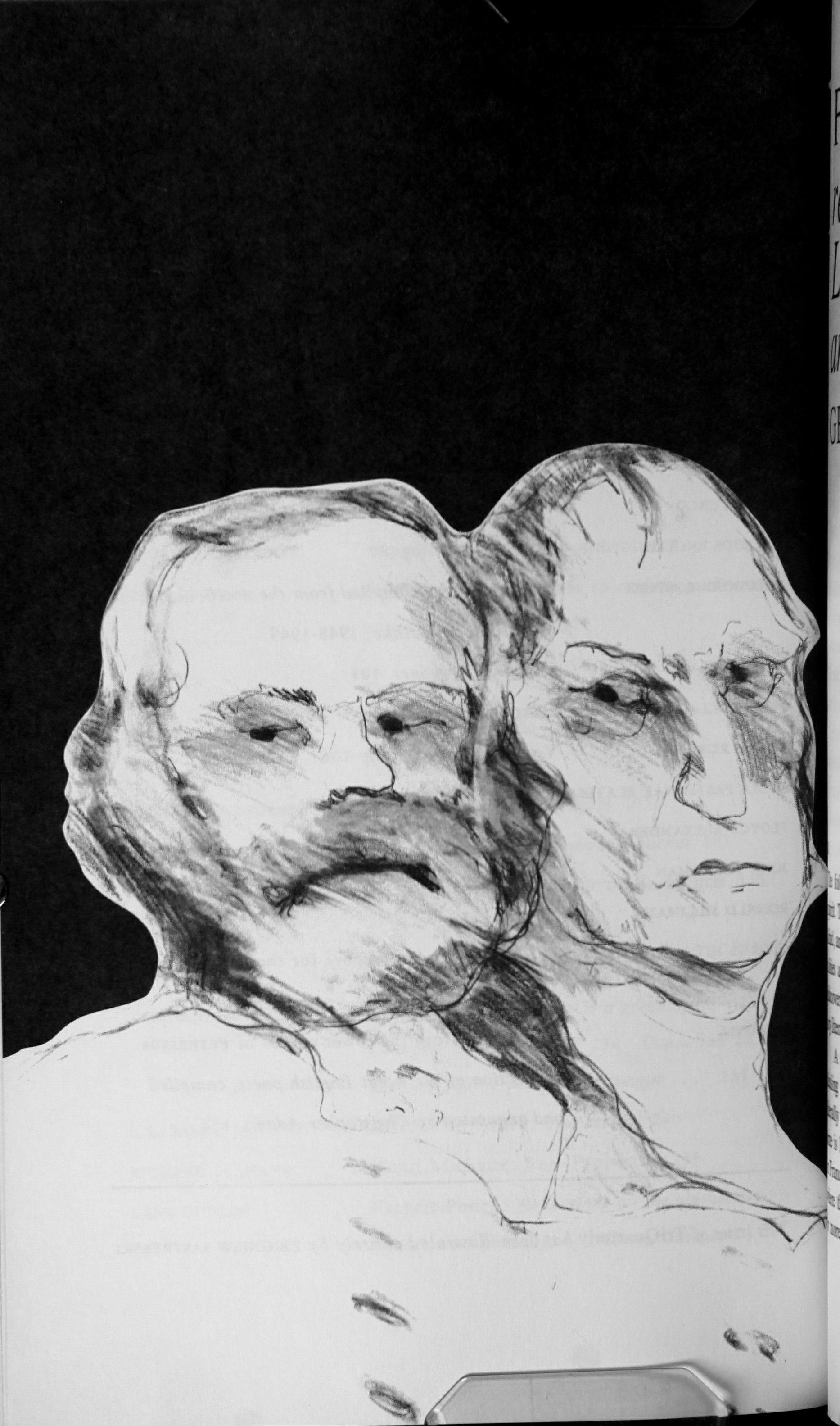
I �, I I /' I ,) I, I1
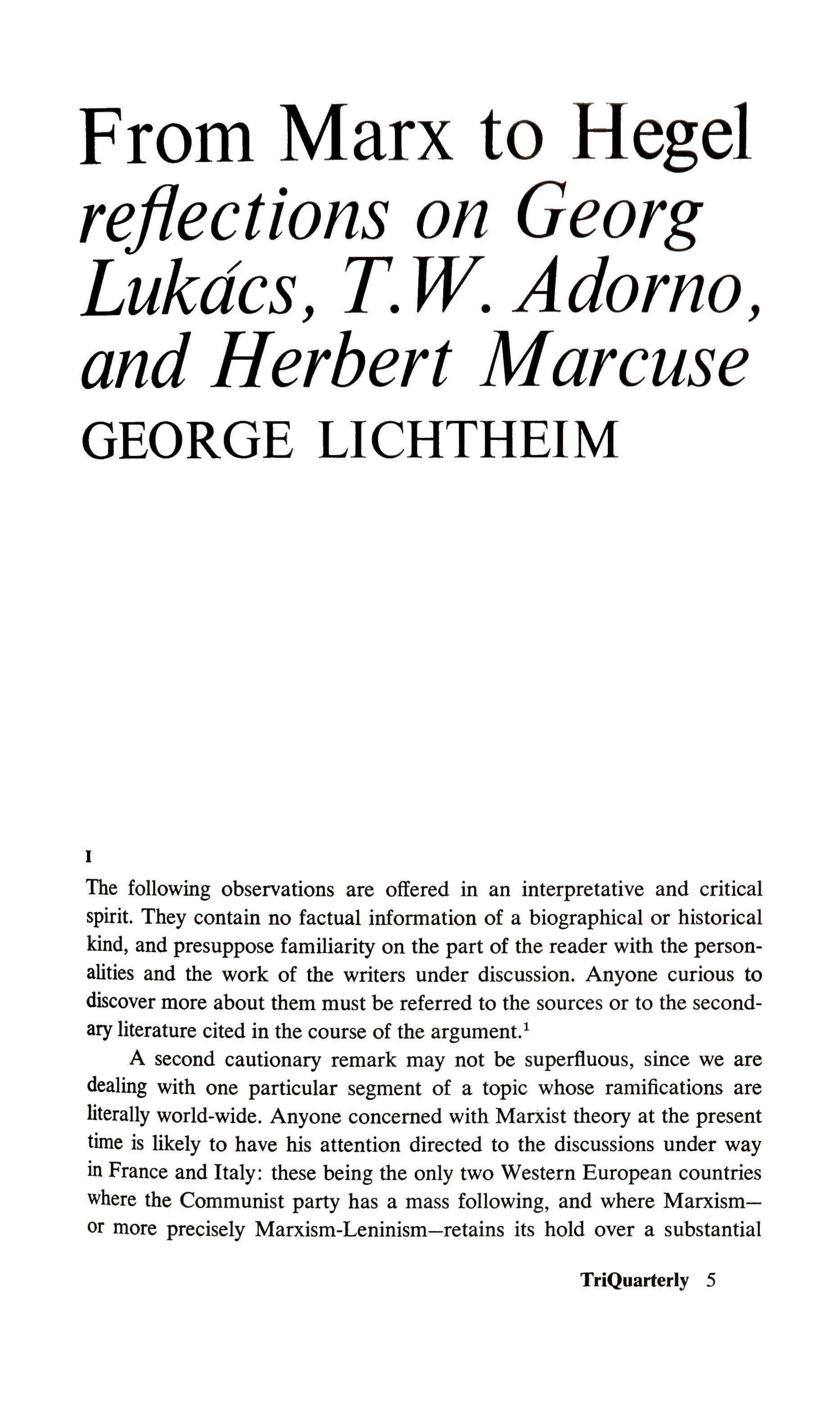
The following observations are offered in an interpretative and critical spirit. They contain no factual information of a biographical or historical kind, and presuppose familiarity on the part of the reader with the personalities and the work of the writers under discussion. Anyone curious to discover more about them must be referred to the sources or to the secondary literature cited in the course of the argument. 1
A second cautionary remark may not be superfluous, since we are dealing with one particular segment of a topic whose ramifications are literally world-wide. Anyone concerned with Marxist theory at the present time is likely to have his attention directed to the discussions under way in France and Italy: these being the only two Western European countries where the Communist party has a mass following, and where Marxismor more precisely Marxism-Leninism retains its hold over a substantial
TriQuarterly 5
, • • , I
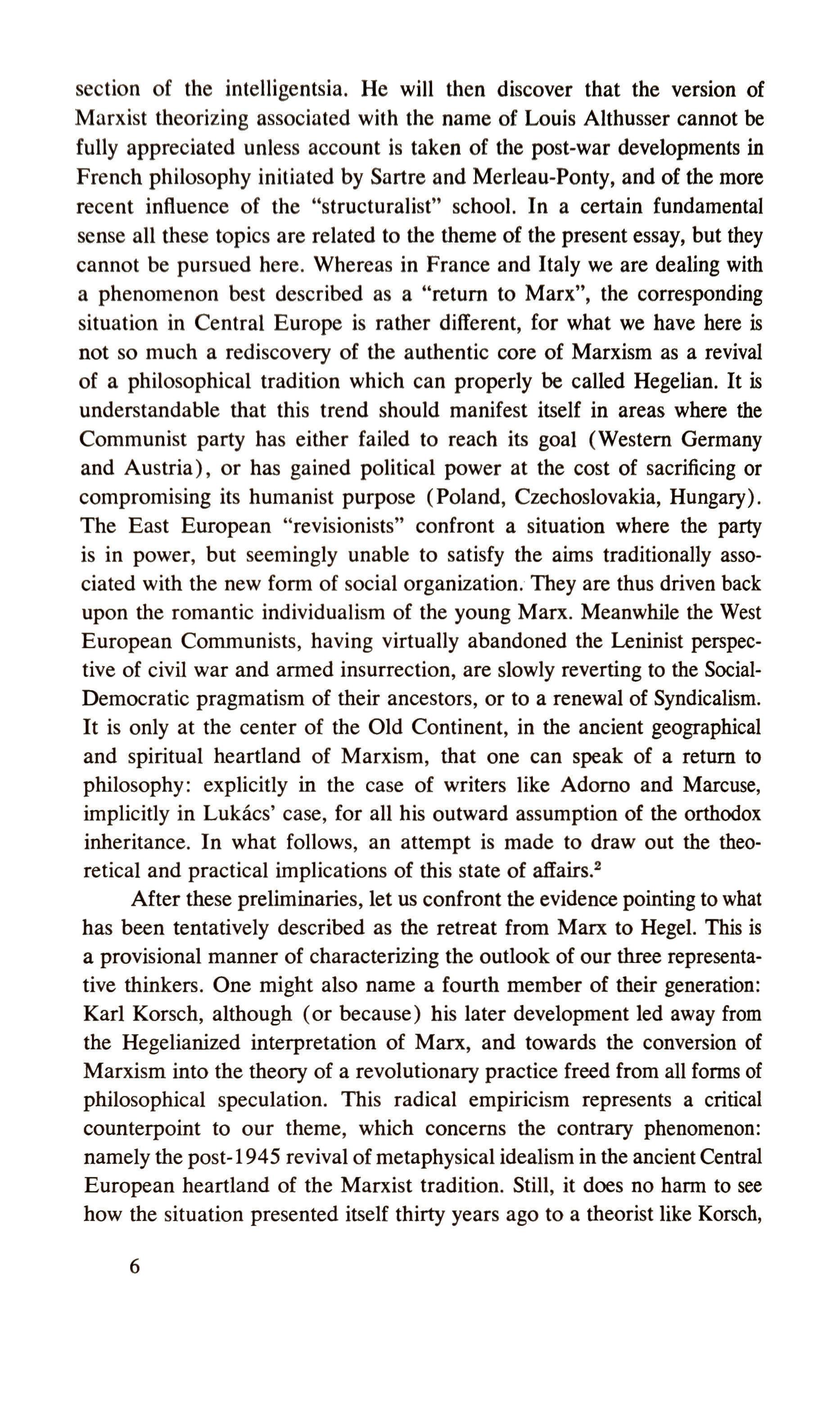
section of the intelligentsia. He will then discover that the version of Marxist theorizing associated with the name of Louis Althusser cannot be fully appreciated unless account is taken of the post-war developments in French philosophy initiated by Sartre and Merleau-Ponty, and of the more recent influence of the "structuralist" school. In a certain fundamental sense all these topics are related to the theme of the present essay, but they cannot be pursued here. Whereas in France and Italy we are dealing with a phenomenon best described as a "return to Marx", the corresponding situation in Central Europe is rather different, for what we have here is not so much a rediscovery of the authentic core of Marxism as a revival of a philosophical tradition which can properly be called Hegelian. It is understandable that this trend should manifest itself in areas where the Communist party has either failed to reach its goal (Western Germany and Austria), or has gained political power at the cost of sacrificing or compromising its humanist purpose (Poland, Czechoslovakia, Hungary).
The East European "revisionists" confront a situation where the party is in power, but seemingly unable to satisfy the aims traditionally associated with the new form of social organization. They are thus driven back upon the romantic individualism of the young Marx. Meanwhile the West European Communists, having virtually abandoned the Leninist perspective of civil war and armed insurrection, are slowly reverting to the SocialDemocratic pragmatism of their ancestors, or to a renewal of Syndicalism. It is only at the center of the Old Continent, in the ancient geographical and spiritual heartland of Marxism, that one can speak of a return to philosophy: explicitly in the case of writers like Adorno and Marcuse, implicitly in Lukacs' case, for all his outward assumption of the orthodox inheritance. In what follows, an attempt is made to draw out the theoretical and practical implications of this state of affairs,"
After these preliminaries, let us confront the evidence pointing to what has been tentatively described as the retreat from Marx to Hegel. This is a provisional manner of characterizing the outlook of our three representative thinkers. One might also name a fourth member of their generation: Karl Korsch, although (or because) his later development led away from the Hegelianized interpretation of Marx, and towards the conversion of Marxism into the theory of a revolutionary practice freed from all for IllS of philosophical speculation. This radical empiricism represents a critical counterpoint to our theme, which concerns the con phenomenon: namely the post-1945 revival of metaphysical idealism in the ancient Central European heartland of the Marxist tradition. Still, it does no harm to see how the situation presented itself thirty years ago to a theorist like Korsch,
6
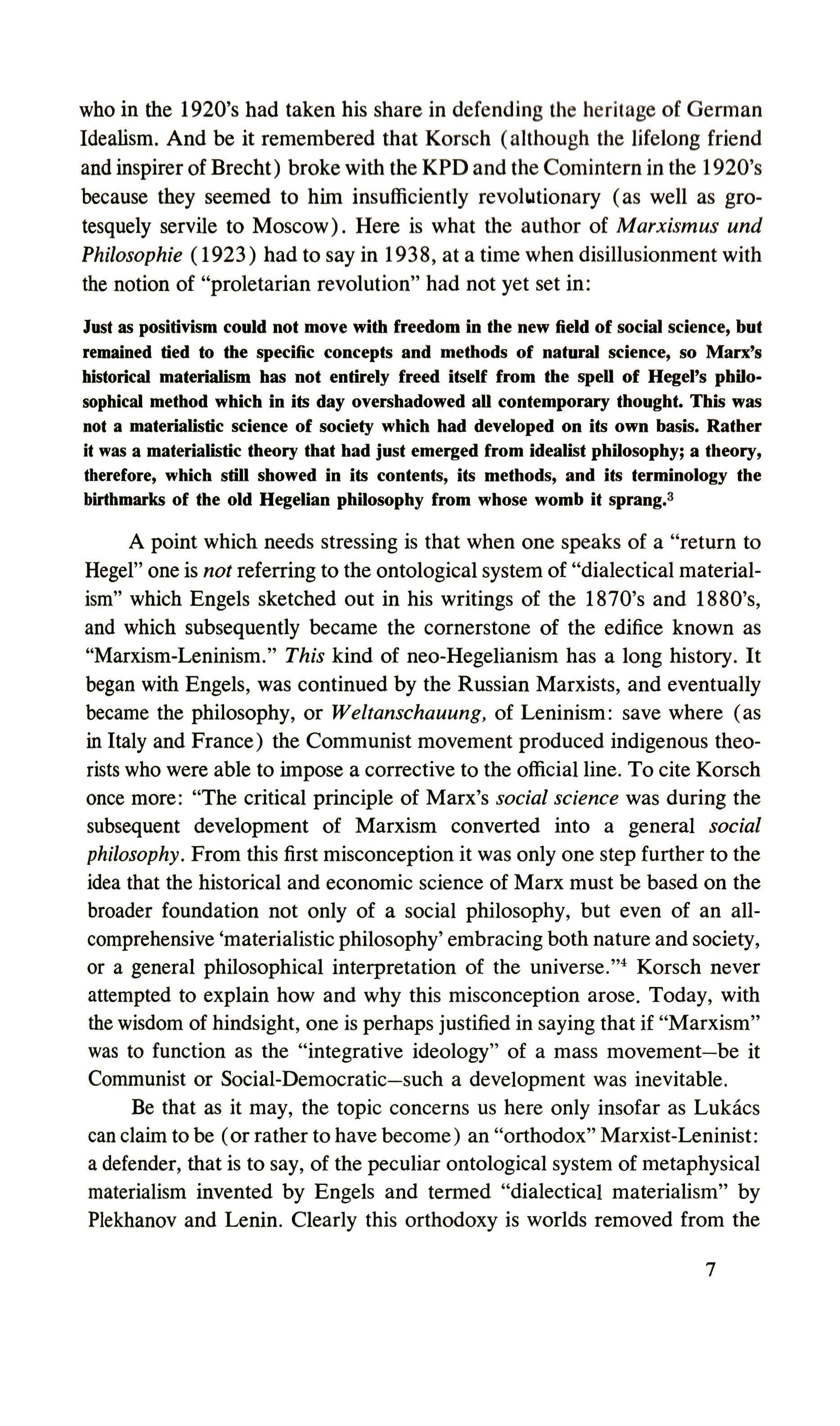
who in the 1920's had taken his share in defending tile heritage of German Idealism. And be it remembered that Korsch (although the lifelong friend and inspirer of Brecht) broke with the KPD and the Comintern in the 1920's because they seemed to him insufficiently revolutionary (as well as grotesquely servile to Moscow). Here is what the author of Marxismus und Philosophie (1923) had to say in 1938, at a time when disillusionment with the notion of "proletarian revolution" had not yet set in:
Just as positivism could not move with freedom in the new field of social science, but remained tied to the specific concepts and methods of natural science, so Marx's historical materialism has not entirely freed itself from the speD of Hegel's philosophical method which in its day overshadowed aD contemporary thought. This was not a materialistic science of society which had developed on its own basis. Rather it was a materialistic theory that had just emerged from idealist philosophy; a theory, therefore, which stiU showed in its contents, its methods, and its terminology the birthmarks of the old Hegelian philosophy from whose womb it sprang.3
A point which needs stressing is that when one speaks of a "return to Hegel" one is not referring to the ontological system of "dialectical materialism" which Engels sketched out in his writings of the 1870's and 1880's, and which subsequently became the cornerstone of the edifice known as "Marxism-Leninism." This kind of neo-Hegelianism has a long history. It began with Engels, was continued by the Russian Marxists, and eventually became the philosophy, or Weltanschauung, of Leninism: save where (as in Italy and France) the Communist movement produced indigenous theorists who were able to impose a corrective to the official line. To cite Korsch once more: "The critical principle of Marx's social science was during the subsequent development of Marxism converted into a general social philosophy. From this first misconception it was only one step further to the idea that the historical and economic science of Marx must be based on the broader foundation not only of a social philosophy, but even of an allcomprehensive 'materialistic philosophy' embracing both nature and society, or a general philosophical interpretation of the universe.:" Korsch never attempted to explain how and why this misconception arose. Today, with the wisdom of hindsight, one is perhaps justified in saying that if "Marxism" was to function as the "integrative ideology" of a mass movement be it Communist or Social-Democratic such a development was inevitable.
Be that as it may, the topic concerns us here only insofar as Lukacs can claim to be (or rather to have become) an "orthodox" Marxist-Leninist: a defender, that is to say, of the peculiar ontological system of metaphysical materialism invented by Engels and termed "dialectical materialism" by Plekhanov and Lenin. Clearly this orthodoxy is worlds removed from the 7
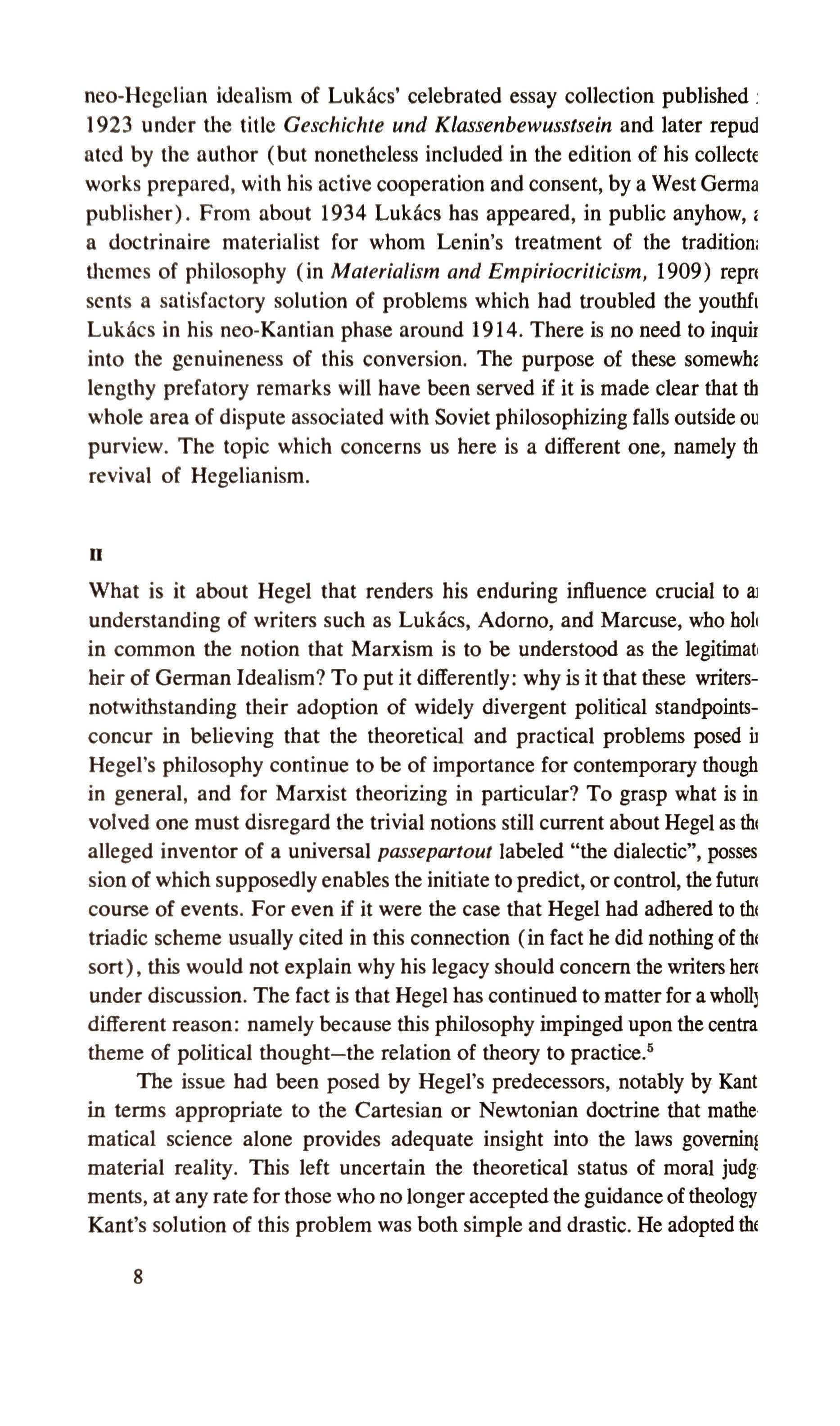
nco-Hegelian idealism of Lukacs' celebrated essay collection published: 1923 under the title Geschichte und Klassenbewusstsein and later repud ated by the author (but nonetheless included in the edition of his collecte works prepared, with his active cooperation and consent, by a West Germa publisher). From about 1934 Lukacs has appeared, in public anyhow, I a doctrinaire materialist for whom Lenin's treatment of the tradition: themes of philosophy (in Materialism and Empiriocriticism, 1909) repn scnts a satisfactory solution of problems which had troubled the youthn Lukacs in his neo-Kantian phase around 1914. There is no need to inquir into the genuineness of this conversion. The purpose of these somewhs lengthy prefatory remarks will have been served if it is made clear that th whole area of dispute associated with Soviet philosophizing falls outside ou purview. The topic which concerns us here is a different one, namely th revival of Hegelianism.
D
What is it about Hegel that renders his enduring influence crucial to aJ understanding of writers such as Lukacs, Adorno, and Marcuse, who hoh in common the notion that Marxism is to be understood as the legitimat heir of German Idealism? To put it differently: why is it that these writersnotwithstanding their adoption of widely divergent political standpointsconcur in believing that the theoretical and practical problems posed iJ Hegel's philosophy continue to be of importance for contemporary though in general, and for Marxist theorizing in particular? To grasp what is in volved one must disregard the trivial notions still CIII rent about Hegel as the alleged inventor of a universal passepartout labeled "the dialectic", posses sion of which supposedly enables the initiate to predict, or control, the future course of events. For even if it were the case that Hegel had adhered to the triadic scheme usually cited in this connection (in fact he did nothing of the sort), this would not explain why his legacy should concern the writers here under discussion. The fact is that Hegel has continued to matter for a whollj different reason: namely because this philosophy impinged upon the centra theme of political thought the relation of theory to practice."
The issue had been posed by Hegel's predecessors, notably by Kant in terms appropriate to the Cartesian or Newtonian doctrine that mathe matical science alone provides adequate insight into the laws governim material reality. This left uncertain the theoretical status of moral judg ments, at any rate for those who no longer accepted the guidance of theology Kant's solution of this problem was both simple and drastic. He adopted the
8

mathematical approach, but restricted it to the world of appearances. Theoretical thinking thereby lost the standing it had possessed for over two thousand years, that is to say since Aristotle. It was limited to the phenomenal world which could be described by (mathematical) science. The latter, as defined in the Critiques, had nothing to say about morals. In Kant's philosophy the moral life belongs to the noumenal realm of the Ding-ansich, along with God and the soul. Theory and practice are thus torn asunder. Morality is approached through introspection: by consulting the conscience whose inspired deliverances instruct us in our duties towards our fellow men. What is morally obligatory or practical cannot be established by ratiocination, for while the natural world is analyzable in scientific terms, the moral world is not. Nature is subject to causality, and thus follows unalterable laws, whereas the moral life is free, in the sense of being self-determined. This freedom is "noumenal", that is to say, transphenomenal. Hence the part of Kant's philosophy which deals with ethics and politics is "practical" in a sense wholly different from that intended by Aristotle (or by Thomist doctrine down to our own day). The dividing line runs not between theoretical contemplation and practical action, but between scientific understanding and ethical judgment. The distinction between theory and practice thus reflects the ontological difference between causality and freedom. Theory (science) has to do with appearances, moral judgment with supersensible reality. Kant's moral philosophy is "practical" not because (like any other moral philosophy) it deals with human practice, but because morality cannot be grounded theoretically. For Aristotle the difference between practice and theory corresponds to the distinction between physics and metaphysics. For Kant it runs parallel to the division between physics and ethics. There is a theory of nature: there is no theory of morals. What we should do, how we ought to behave, what sort of polity we may found, cannot be established by theoretical insight into the reality of things, for the "reality of things" is beyond our (theoretical) grasp. It is wholly a matter of conscience, of our free will. For freedom does not belong to the world of appearances and hence is not causally bound. If it were, morality could not tell us what we ought to do. Hence the subject-matter of Kant's "practical" philosophy is the "ideal" that which ought to be, but is not."
But what if a follower of Kant without explicitly going back to Aristotle, or to Spinoza took the view that genuine theoretical insight into the nature of reality was possible? Then Kant's distinction between phenomena and noumena would go by the board, and the philosopher would once more derive his practical recommendations from his theoretical postulates. This is just what happened when Hegel refused to accept the Kantian noumenon,
9
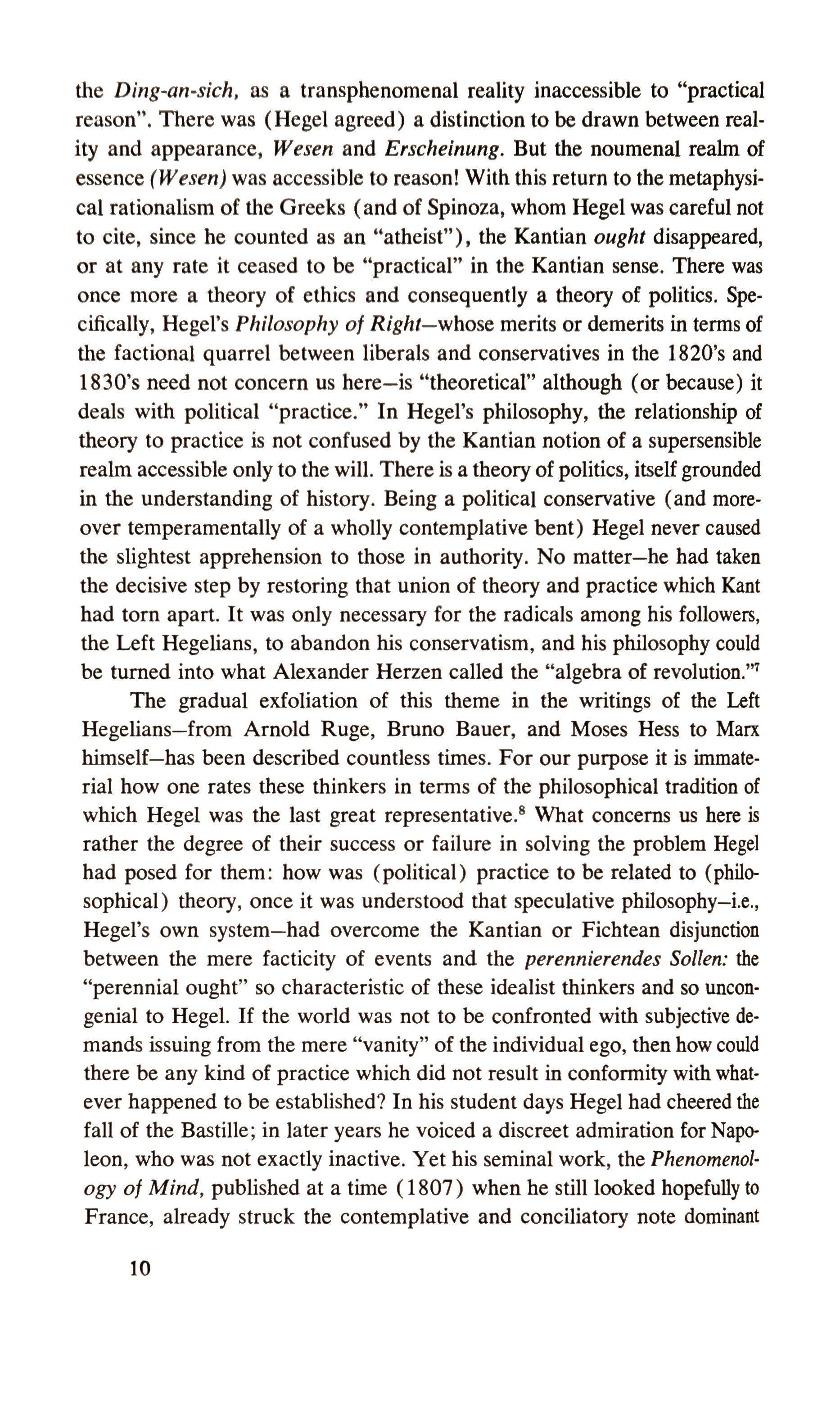
the Ding-an-sich, as a transphenomenal reality inaccessible to "practical reason". There was (Hegel agreed) a distinction to be drawn between reality and appearance, Wesen and Erschelnung, But the noumenal realm of essence (Wesen) was accessible to reason! With this return to the metaphysical rationalism of the Greeks (and of Spinoza, whom Hegel was careful not to cite, since he counted as an "atheist"), the Kantian ought disappeared, or at any rate it ceased to be "practical" in the Kantian sense. There was once more a theory of ethics and consequently a theory of politics. Specifically, Hegel's Philosophy of Right whose merits or demerits in terms of the factional quarrel between liberals and conservatives in the 1820's and 1830's need not concern us here is "theoretical" although (or because) it deals with political "practice." In Hegel's philosophy, the relationship of theory to practice is not confused by the Kantian notion of a supersensible realm accessible only to the will. There is a theory of politics, itself grounded in the understanding of history. Being a political conservative (and moreover temperamentally of a wholly contemplative bent) Hegel never caused the slightest apprehension to those in authority. No matter he had taken the decisive step by restoring that union of theory and practice which Kant had tom apart. It was only necessary for the radicals among his followers, the Left Hegelians, to abandon his conservatism, and his philosophy could be turned into what Alexander Herzen called the "algebra of revolution."
The gradual exfoliation of this theme in the writings of the Left Hegelians from Arnold Ruge, Bruno Bauer, and Moses Hess to Marx himself has been described countless times. For our purpose it is immaterial how one rates these thinkers in terms of the philosophical tradition of which Hegel was the last great representative," What concerns us here is rather the degree of their success or failure in solving the problem Hegel had posed for them: how was (political) practice to be related to (philosophical) theory, once it was understood that speculative philosophy-i.e., Hegel's own system had overcome the Kantian or Fichtean disjunction between the mere facticity of events and the perennierendes Sollen: the "perennial ought" so characteristic of these idealist thinkers and so uncongenial to Hegel. If the world was not to be confronted with subjective demands issuing from the mere "vanity" of the individual ego, then how could there be any kind of practice which did not result in conformity with whatever happened to be established? In his student days Hegel had cheered the fall of the Bastille; in later years he voiced a discreet admiration for Napoleon, who was not exactly inactive. Yet his seminal work, the Phenomenology of Mind, published at a time (1807) when he still looked hopefully to France, already struck the contemplative and conciliatory note dominant
10
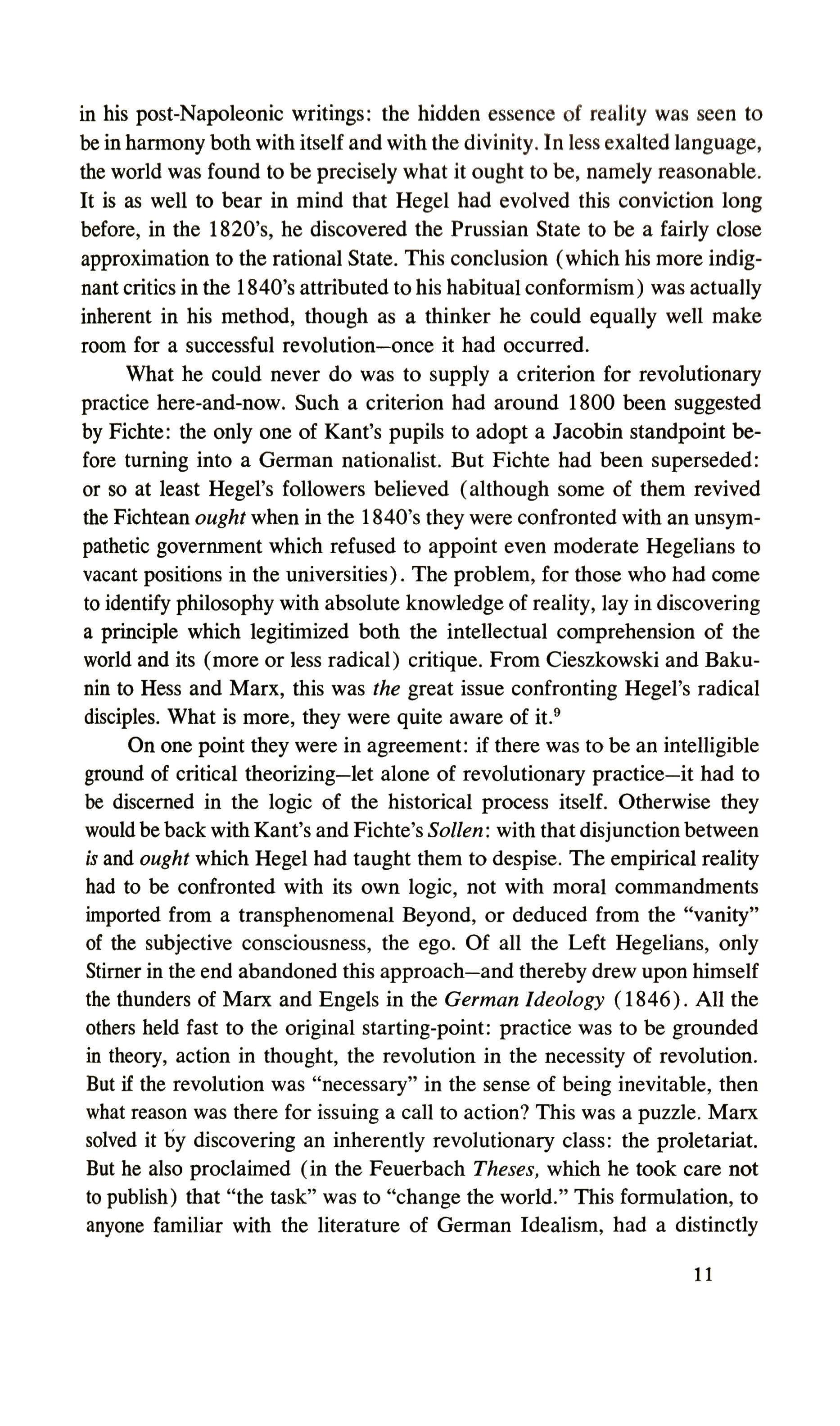
in his post-Napoleonic writings: the hidden essence of reality was seen to be in halmony both with itself and with the divinity. In less exalted language, the world was found to be precisely what it ought to be, namely reasonable. It is as well to bear in mind that Hegel had evolved this conviction long before, in the 1820's, he discovered the Prussian State to be a fairly close approximation to the rational State. This conclusion (which his more indignant critics in the 1840's attributed to his habitual conformism) was actually inherent in his method, though as a thinker he could equally well make room for a successful revolution once it had occurred.
What he could never do was to supply a criterion for revolutionary practice here-and-now. Such a criterion had around 1800 been suggested by Fichte: the only one of Kant's pupils to adopt a Jacobin standpoint before turning into a German nationalist. But Fichte had been superseded: or so at least Hegel's followers believed (although some of them revived the Fichtean ought when in the 1840's they were confronted with an unsympathetic government which refused to appoint even moderate Hegelians to vacant positions in the universities). The problem, for those who had come to identify philosophy with absolute knowledge of reality, lay in discovering a principle which legitimized both the intellectual comprehension of the world and its (more or less radical) critique. From Cieszkowski and Bakunin to Hess and Marx, this was the great issue confronting Hegel's radical disciples. What is more, they were quite aware of it."
On one point they were in agreement: if there was to be an intelligible ground of critical theorizing let alone of revolutionary practice it had to be discerned in the logic of the historical process itself. Otherwise they would be back with Kant's and Fichte's Sollen: with that disjunction between is and ought which Hegel had taught them to despise. The empirical reality had to be confronted with its own logic, not with moral commandments imported from a transphenomenal Beyond, or deduced from the "vanity" of the subjective consciousness, the ego. Of all the Left Hegelians, only Stimer in the end abandoned this approach and thereby drew upon himself the thunders of Marx and Engels in the German Ideology (1846). All the others held fast to the original starting-point: practice was to be grounded in theory, action in thought, the revolution in the necessity of revolution. But if the revolution was "necessary" in the sense of being inevitable, then what reason was there for issuing a call to action? This was a puzzle. Marx solved it by discovering an inherently revolutionary class: the proletariat. But he also proclaimed (in the Feuerbach Theses, which he took care not to publish) that "the task" was to "change the world." This formulation, to anyone familiar with the literature of German Idealism, had a distinctly
11
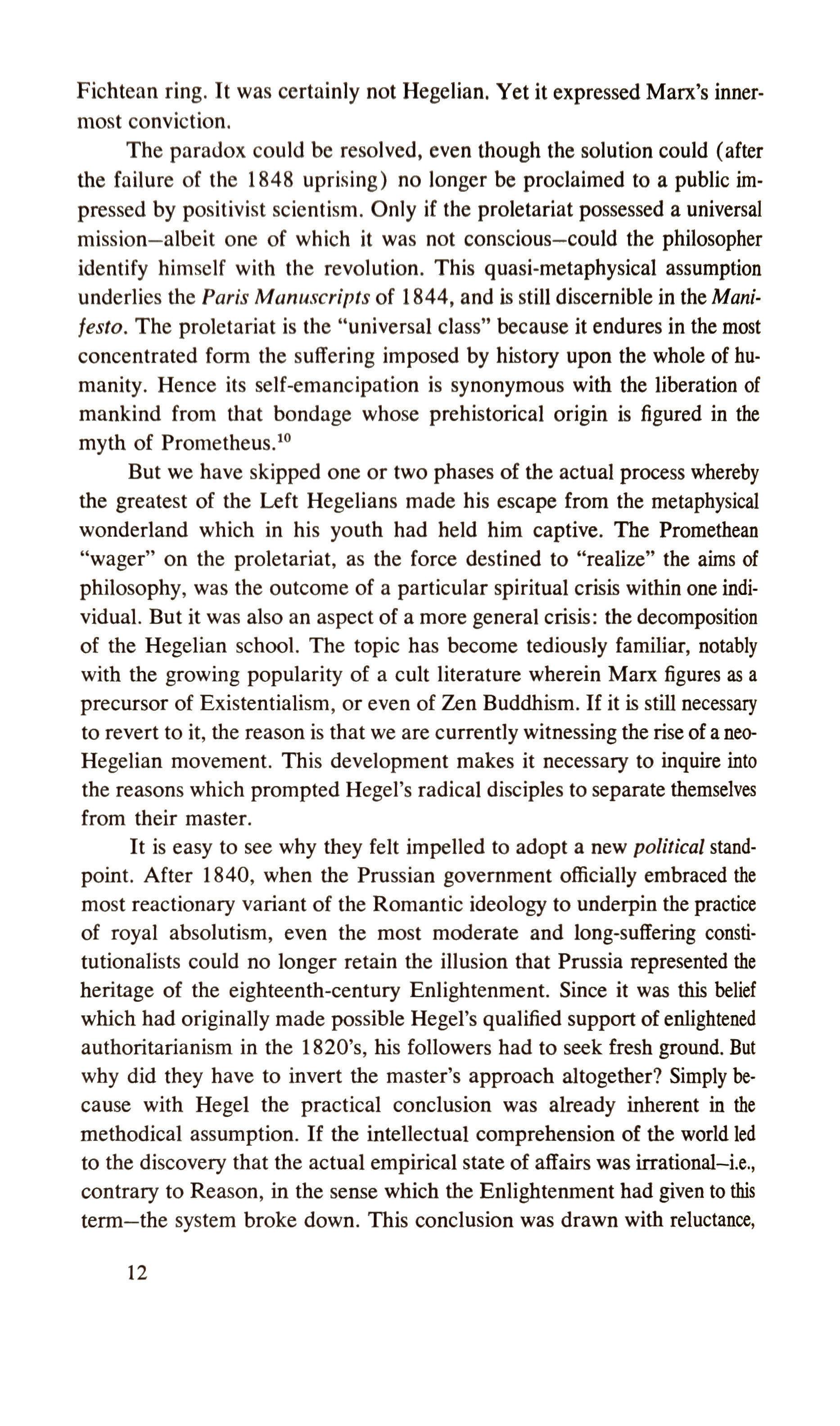
Fichtean ring. It was certainly not Hegelian. Yet it expressed Marx's innermost conviction.
The paradox could be resolved, even though the solution could (after the failure of the 1848 uprising) no longer be proclaimed to a public impressed by positivist scientism. Only if the proletariat possessed a universal mission albeit one of which it was not conscious could the philosopher identify himself with the revolution. This quasi-metaphysical assumption underlies the Paris Manuscripts of 1844, and is still discernible in the Manifesto. The proletariat is the "universal class" because it endures in the most concentrated fOI'In the suffering imposed by history upon the whole of humanity. Hence its self-emancipation is synonymous with the liberation of mankind from that bondage whose prehistorical origin is figured in the myth of Prometheus.'?
But we have skipped one or two phases of the actual process whereby the greatest of the Left Hegelians made his escape from the metaphysical wonderland which in his youth had held him captive. The Promethean "wager" on the proletariat, as the force destined to "realize" the aims of philosophy, was the outcome of a particular spiritual crisis within one individual. But it was also an aspect of a more general crisis: the decomposition of the Hegelian school. The topic has become tediously familiar, notably with the growing popularity of a cult literature wherein Marx figures as a precursor of Existentialism, or even of Zen Buddhism. If it is still necessary to revert to it, the reason is that we are currently witnessing the rise of a neoHegelian movement. This development makes it necessary to inquire into the reasons which prompted Hegel's radical disciples to sepal ate themselves from their master.
It is easy to see why they felt impelled to adopt a new political standpoint. After 1840, when the Prussian government officially embraced the most reactionary variant of the Romantic ideology to underpin the practice of royal absolutism, even the most moderate and long-suffering constitutionalists could no longer retain the illusion that Prussia represented the heritage of the eighteenth-century Enlightenment. Since it was this belief which had originally made possible Hegel's qualified support of enlightened authoritarianism in the 1820's, his followers had to seek fresh ground. But why did they have to invert the master's approach altogether? Simply because with Hegel the practical conclusion was already inherent in the methodical assumption. If the intellectual comprehension of the world led to the discovery that the actual empirical state of affairs was irrational-i.e., contrary to Reason, in the sense which the Enlightenment had given to this term the system broke down. This conclusion was drawn with reluctance,
12
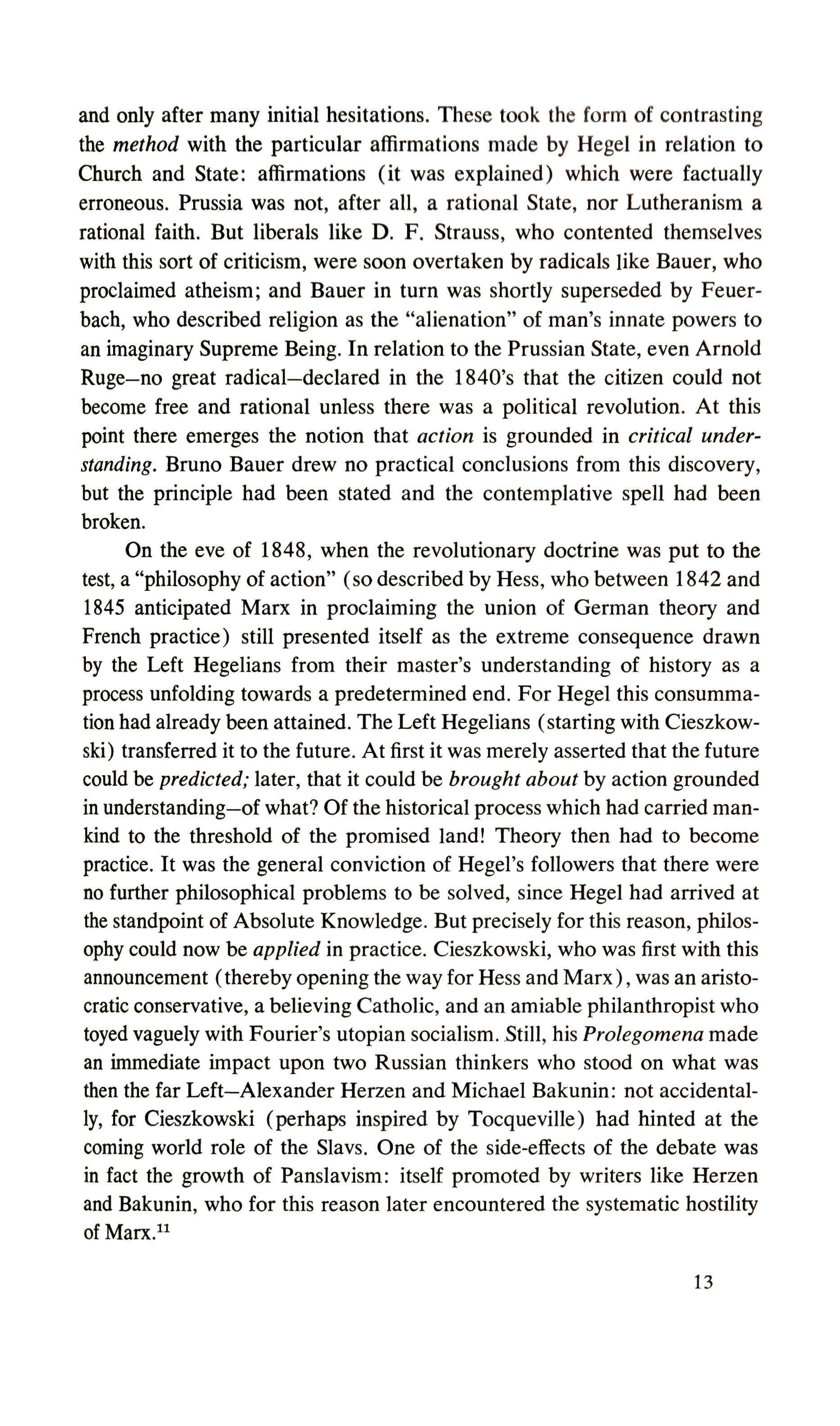
and only after many initial hesitations. These took the form of contrasting the method with the particular affirmations made by Hegel in relation to Church and State: affirmations (it was explained) which were factually erroneous. Prussia was not, after all, a rational State, nor Lutheranism a rational faith. But liberals like D. F. Strauss, who contented themselves with this sort of criticism, were soon overtaken by radicals like Bauer, who proclaimed atheism; and Bauer in turn was shortly superseded by Feuerbach, who described religion as the "alienation" of man's innate powers to an imaginary Supreme Being. In relation to the Prussian State, even Arnold Ruge-no great radical declared in the 1840's that the citizen could not become free and rational unless there was a political revolution. At this point there emerges the notion that action is grounded in critical understanding. Bruno Bauer drew no practical conclusions from this discovery, but the principle had been stated and the contemplative spell had been broken.
On the eve of 1848, when the revolutionary doctrine was put to the test, a "philosophy of action" (so described by Hess, who between 1842 and 1845 anticipated Marx in proclaiming the union of German theory and French practice) still presented itself as the extreme consequence drawn by the Left Hegelians from their master's understanding of history as a process unfolding towards a predetermined end. For Hegel this consummation had already been attained. The Left Hegelians (starting with Cieszkowski) transferred it to the future. At first it was merely asserted that the future could be predicted,' later, that it could be brought about by action grounded in understanding of what? Of the historical process which had carried mankind to the threshold of the promised land! Theory then had to become practice. It was the general conviction of Hegel's followers that there were no further philosophical problems to be solved, since Hegel had arrived at the standpoint of Absolute Knowledge. But precisely for this reason, philosophy could now be applied in practice. Cieszkowski, who was first with this announcement (therebyopening the way for Hess and Marx), was an aristocratic conservative, a believing Catholic, and an amiable philanthropist who toyed vaguely with Fourier's utopian socialism. Still, his Prolegomena made an immediate impact upon two Russian thinkers who stood on what was then the far Left Alexander Herzen and Michael Bakunin: not accidentally, for Cieszkowski (perhaps inspired by Tocqueville) had hinted at the coming world role of the Slavs. One of the side-effects of the debate was in fact the growth of Panslavism: itself promoted by writers like Herzen and Bakunin, who for this reason later encountered the systematic hostility of Marx."
13
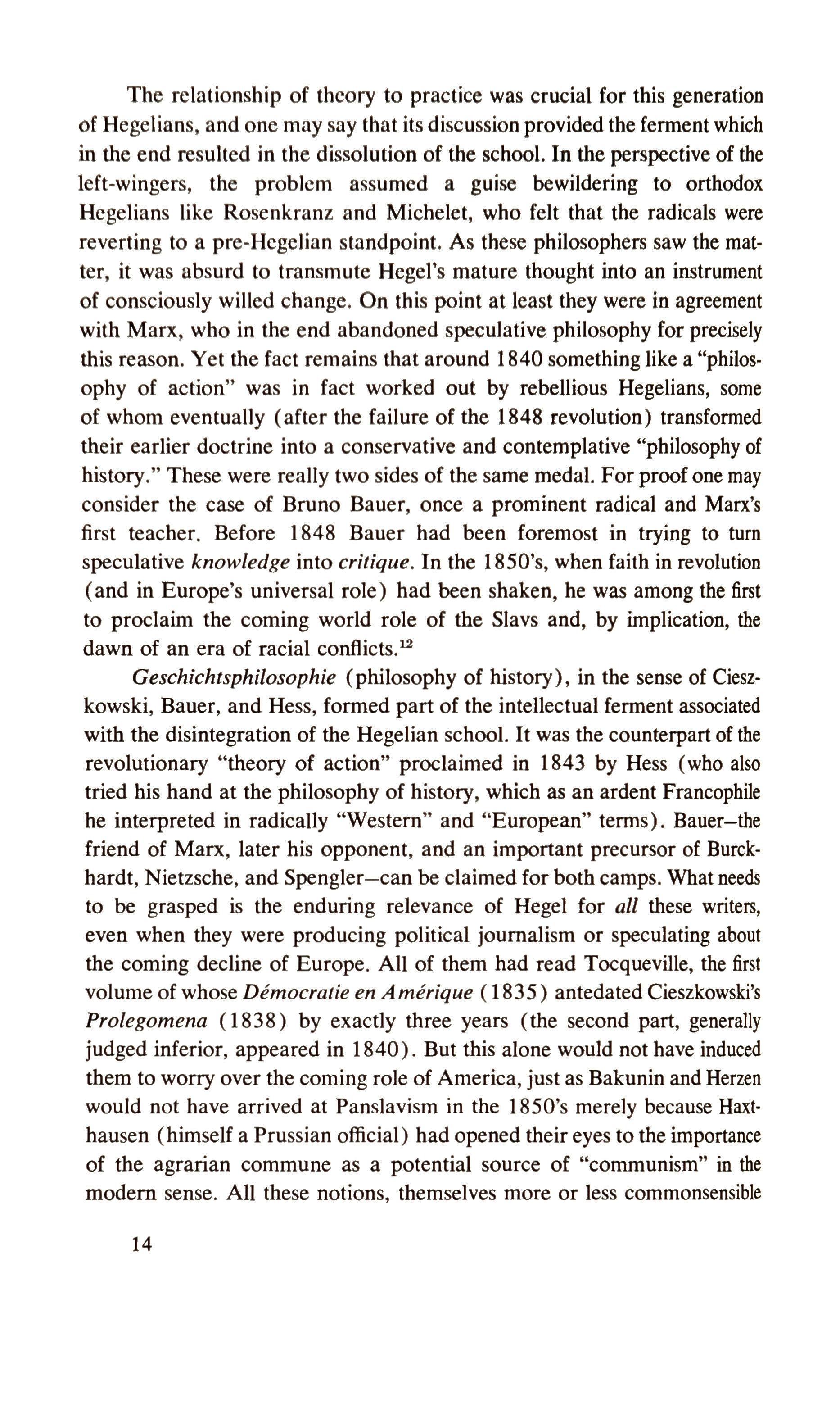
The relationship of theory to practice was crucial for this generation of Hegelians, and one may say that its discussion provided the ferment which in the end resulted in the dissolution of the school. In the perspective of the left-wingers, the problem assumed a guise bewildering to orthodox Hegelians like Rosenkranz and Michelet, who felt that the radicals were reverting to a pre-Hegelian standpoint. As these philosophers saw the matter, it was absurd to transmute Hegel's mature thought into an instrument of consciously willed change. On this point at least they were in agreement with Marx, who in the end abandoned speculative philosophy for precisely this reason. Yet the fact remains that around 1840 something like a "philosophy of action" was in fact worked out by rebellious Hegelians, some of whom eventually (after the failure of the 1848 revolution) transformed their earlier doctrine into a conservative and contemplative "philosophy of history." These were really two sides of the same medal. For proof one may consider the case of Bruno Bauer, once a prominent radical and Marx's first teacher. Before 1848 Bauer had been foremost in trying to tum speculative knowledge into critique. In the 1850's, when faith in revolution (and in Europe's universal role) had been shaken, he was among the first to proclaim the coming world role of the Slavs and, by implication, the dawn of an era of racial conflicts."
Geschichtsphilosophie (philosophy of history), in the sense of Cieszkowski, Bauer, and Hess, formed part of the intellectual ferment associated with the disintegration of the Hegelian school. It was the counterpart of the revolutionary "theory of action" proclaimed in 1843 by Hess (who also tried his hand at the philosophy of history, which as an ardent Francophile he interpreted in radically "Western" and "European" terms), Bauer-the friend of Marx, later his opponent, and an important precursor of Burckhardt, Nietzsche, and Spengler can be claimed for both camps. What needs to be grasped is the enduring relevance of Hegel for all these writers, even when they were producing political journalism or speculating about the coming decline of Europe. All of them had read Tocqueville, the first volume of whose Democratie en Amerique (1835) antedated Cieszkowski's Prolegomena (1838) by exactly three years (the second part, generally judged inferior, appeared in 1840). But this alone would not have induced them to worry over the coming role of America, just as Bakunin and Herzen would not have arrived at Panslavism in the 1850's merely because Haxthausen (himself a Prussian official) had opened their eyes to the importance of the agrarian commune as a potential source of "communism" in the modem sense. All these notions, themselves more or less commonsensible
14
and grounded in the study of actual social history, obtained an extra dimension in the light of a philosophy of history derived from Hegel's thinking. IS This may seem farfetched; but one need only study the utterances of Hegel's more orthodox followers to see that they had taken to heart the master's message: only that which is fully comprehended has been overcome; conversely, intellectual comprehension is possible only in relation to that from which the spirit of life has already departed. "The owl of Minerva starts its flight when the shades of dusk have fallen." True understanding relates to the past, for the actual process "comes to itself" in the philosophy which sums up the sense of the epoch. Hence for an orthodox disciple of Hegel there could be no "philosophy of action", but there could and must be an effort to comprehend the necessity of the universal process as it unfolds through the ordinary vicissitudes of history. This in the end was Bauer's standpoint, and he was to have numerous successors, down to and including Spengler (who indeed sought an escape from determinism by appealing to Nietzsche's cult of "will", thereby landing himself in an inconsistency which has remained characteristic of all the ideologists of Fascism) Immediately, for those who shared Hegel's contemplative bent, the problem presented itself in the fOI'In of pessimistic reflections on the future of their own civilization: that of Europe. For if Hegel's philosophy represented the mature self-consciousness of the epoch, then plainly its appearance signified the approaching end of European history, and perhaps (according to Bauer) of Christianity as well. Hence the failure of the 1848 uprising made no deep impression on Bauer: it was (he said) a trivial incident in a process of disintegration which had gone too far to be reversed: "This whole revolution was an illusion. Originating in the general pauperism, it was merely a bloody intermezzo in the smooth, passive dissolution in which the whole hitherto existing culture withers away and passes into decay.">
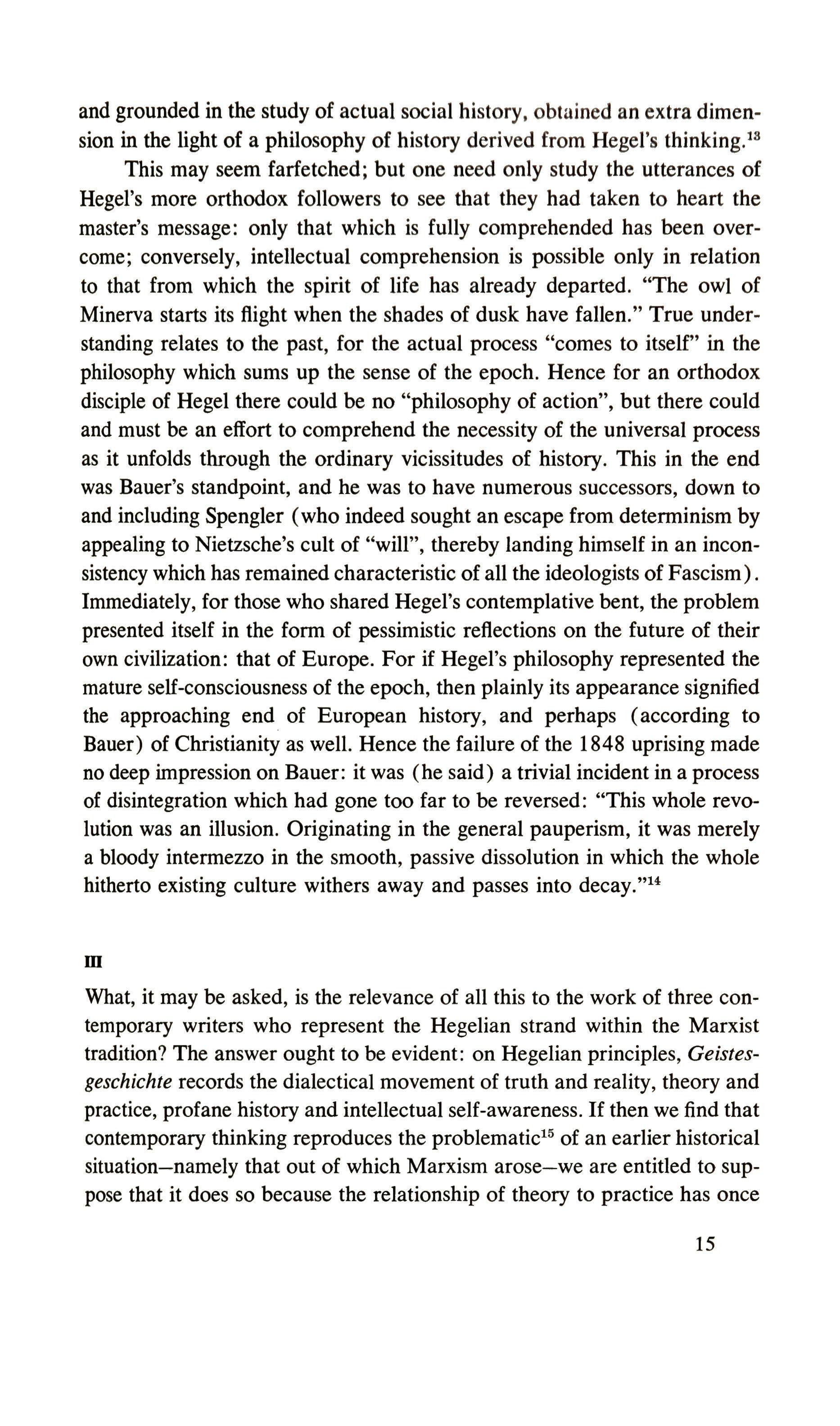
What, it may be asked, is the relevance of all this to the work of three contemporary writers who represent the Hegelian strand within the Marxist tradition? The answer ought to be evident: on Hegelian principles, Geistesgeschichte records the dialectical movement of truth and reality, theory and practice, profane history and intellectual self-awareness. If then we find that contemporary thinking reproduces the problematic" of an earlier historical situation namely that out of which Marxism arose we are entitled to suppose that it does so because the relationship of theory to practice has once
m
15
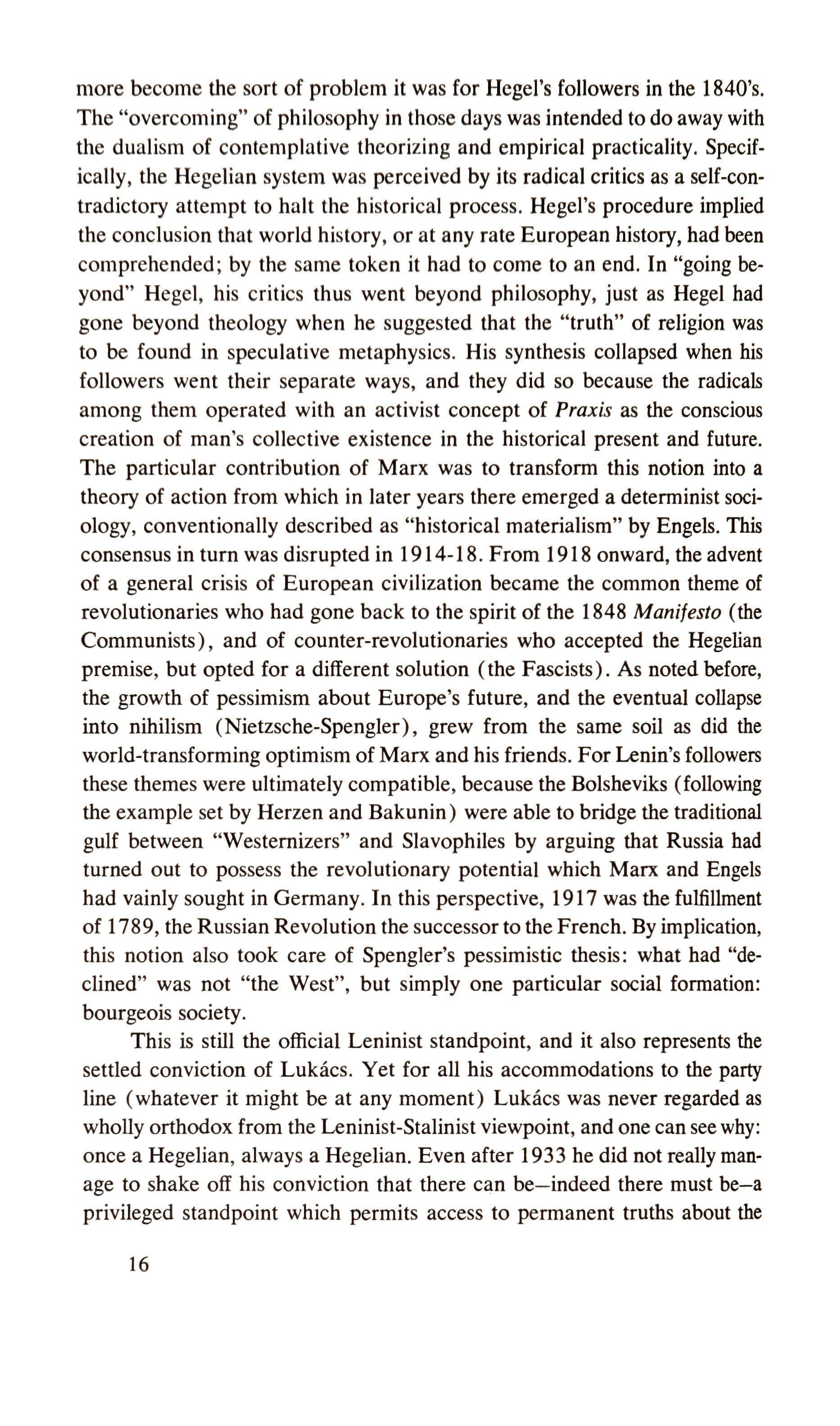
more become the sort of problem it was for Hegel's followers in the 1840's. The "overcoming" of philosophy in those days was intended to do away with the dualism of contemplative theorizing and empirical practicality. Specifically, the Hegelian system was perceived by its radical critics as a self-contradictory attempt to halt the historical process. Hegel's procedure implied the conclusion that world history, or at any rate European history, had been comprehended; by the same token it had to come to an end. In "going beyond" Hegel, his critics thus went beyond philosophy, just as Hegel had gone beyond theology when he suggested that the "truth" of religion was to be found in speculative metaphysics. His synthesis collapsed when his followers went their separate ways, and they did so because the radicals among them operated with an activist concept of Praxis as the conscious creation of man's collective existence in the historical present and future. The particular contribution of Marx was to transform this notion into a theory of action from which in later years there emerged a determinist sociology, conventionally described as "historical materialism" by Engels. 'I'his consensus in turn was disrupted in 1914-18. From 1918 onward, the advent of a general crisis of European civilization became the common theme of revolutionaries who had gone back to the spirit of the 1848 Maniiesto (the Communists), and of counter-revolutionaries who accepted the Hegelian premise, but opted for a different solution (the Fascists). As noted before, the growth of pessimism about Europe's future, and the eventual collapse into nihilism (Nietzsche-Spengler), grew from the same soil as did the world-transforming optimism of Marx and his friends. For Lenin's followers these themes were ultimately compatible, because the Bolsheviks (following the example set by Herzen and Bakunin) were able to bridge the traditional gulf between "Westemizers" and Slavophiles by arguing that Russia had turned out to possess the revolutionary potential which Marx and Engels had vainly sought in Germany. In this perspective, 1917 was the fulfillment of 1789, the Russian Revolution the successor to the French. Byimplication, this notion also took care of Spengler's pessimistic thesis: what had "declined" was not "the West", but simply one particular social formation: bourgeois society.
This is still the official Leninist standpoint, and it also represents the settled conviction of Lukacs. Yet for all his accommodations to the party line (whatever it might be at any moment) Lukacs was never regarded as wholly orthodox from the Leninist-Stalinist viewpoint, and one can see why: once a Hegelian, always a Hegelian. Even after 1933 he did not really manage to shake off his conviction that there can be indeed there must be-a privileged standpoint which permits access to permanent truths about the
16
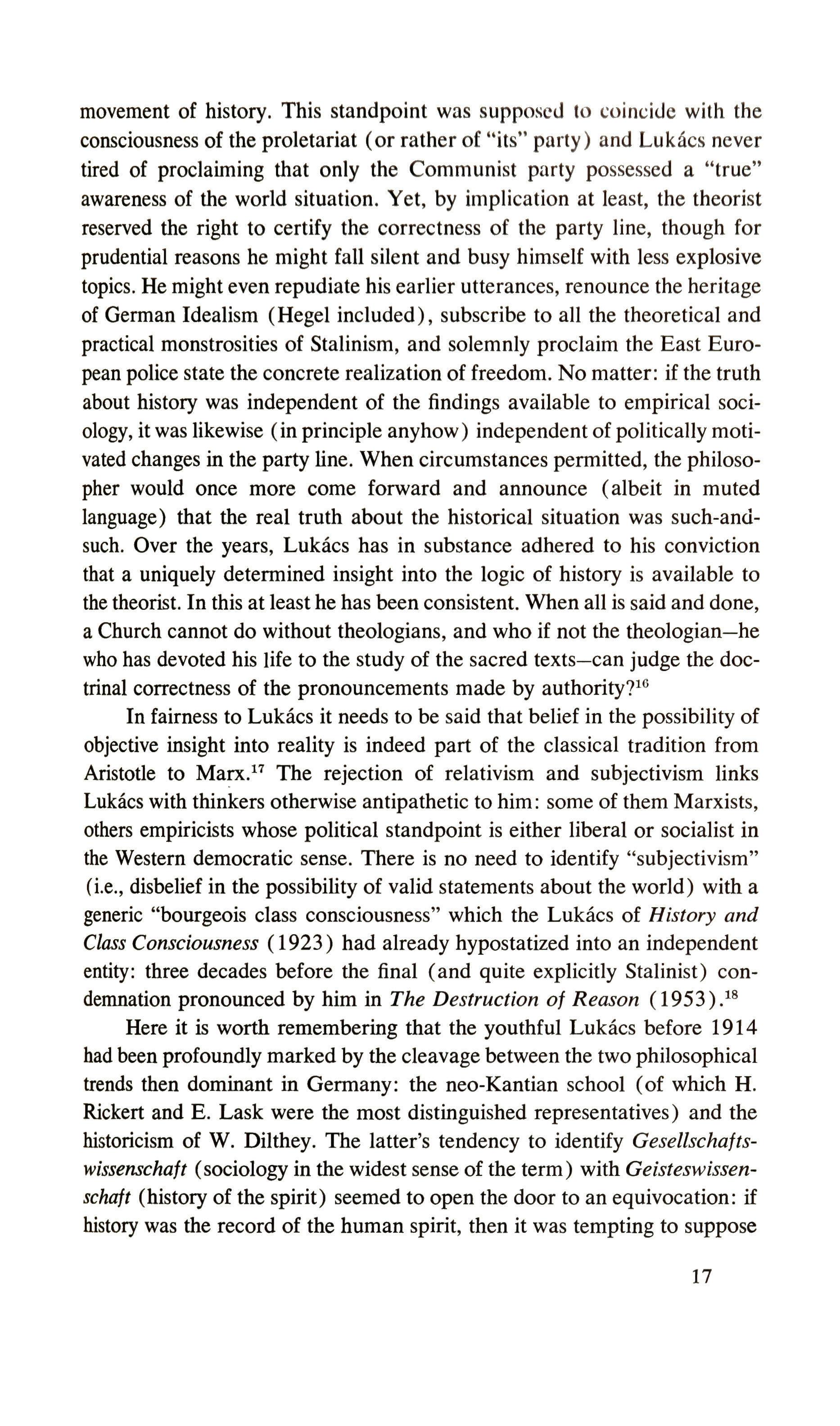
movement of history. This standpoint was supposed to coincide with the consciousness of the proletariat (or rather of "its" party) and Lukacs never tired of proclaiming that only the Communist party possessed a "true" awareness of the world situation. Yet, by implication at least, the theorist reserved the right to certify the correctness of the party line, though for prudential reasons he might fall silent and busy himself with less explosive topics. He might even repudiate his earlier utterances, renounce the heritage of German Idealism (Hegel included), subscribe to all the theoretical and practical monstrosities of Stalinism, and solemnly proclaim the East European police state the concrete realization of freedom. No matter: if the truth about history was independent of the findings available to empirical sociology, it was likewise (in principle anyhow) independent of politically motivated changes in the party line. When circumstances permitted, the philosopher would once more come forward and announce (albeit in muted language) that the real truth about the historical situation was such-andsuch. Over the years, Lukacs has in substance adhered to his conviction that a uniquely determined insight into the logic of history is available to the theorist. In this at least he has been consistent. When all is said and done, a Church cannot do without theologians, and who if not the theologian he who has devoted his life to the study of the sacred texts can judge the doctrinal correctness of the pronouncements made by authority?"
In fairness to Lukacs it needs to be said that belief in the possibility of objective insight into reality is indeed part of the classical tradition from Aristotle to Marx." The rejection of relativism and subjectivism links Lukacs with thinkers otherwise antipathetic to him: some of them Marxists, others empiricists whose political standpoint is either liberal or socialist in the Western democratic sense. There is no need to identify "subjectivism" (i.e., disbelief in the possibility of valid statements about the world) with a generic "bourgeois class consciousness" which the Lukacs of History and Class Consciousness (1923) had already hypostatized into an independent entity: three decades before the final (and quite explicitly Stalinist) condemnation pronounced by him in The Destruction of Reason (1953).18 Here it is worth remembering that the youthful Lukacs before 1914 had been profoundly marked by the cleavage between the two philosophical trends then dominant in Germany: the neo-Kantian school (of which H. Rickert and E. Lask were the most distinguished representatives) and the historicism of W. Dilthey. The latter's tendency to identify Gesellschaftswissenschajt (sociology in the widest sense of the term) with Geisteswissenschait (history of the spirit) seemed to open the door to an equivocation: if history was the record of the human spirit, then it was tempting to suppose
17
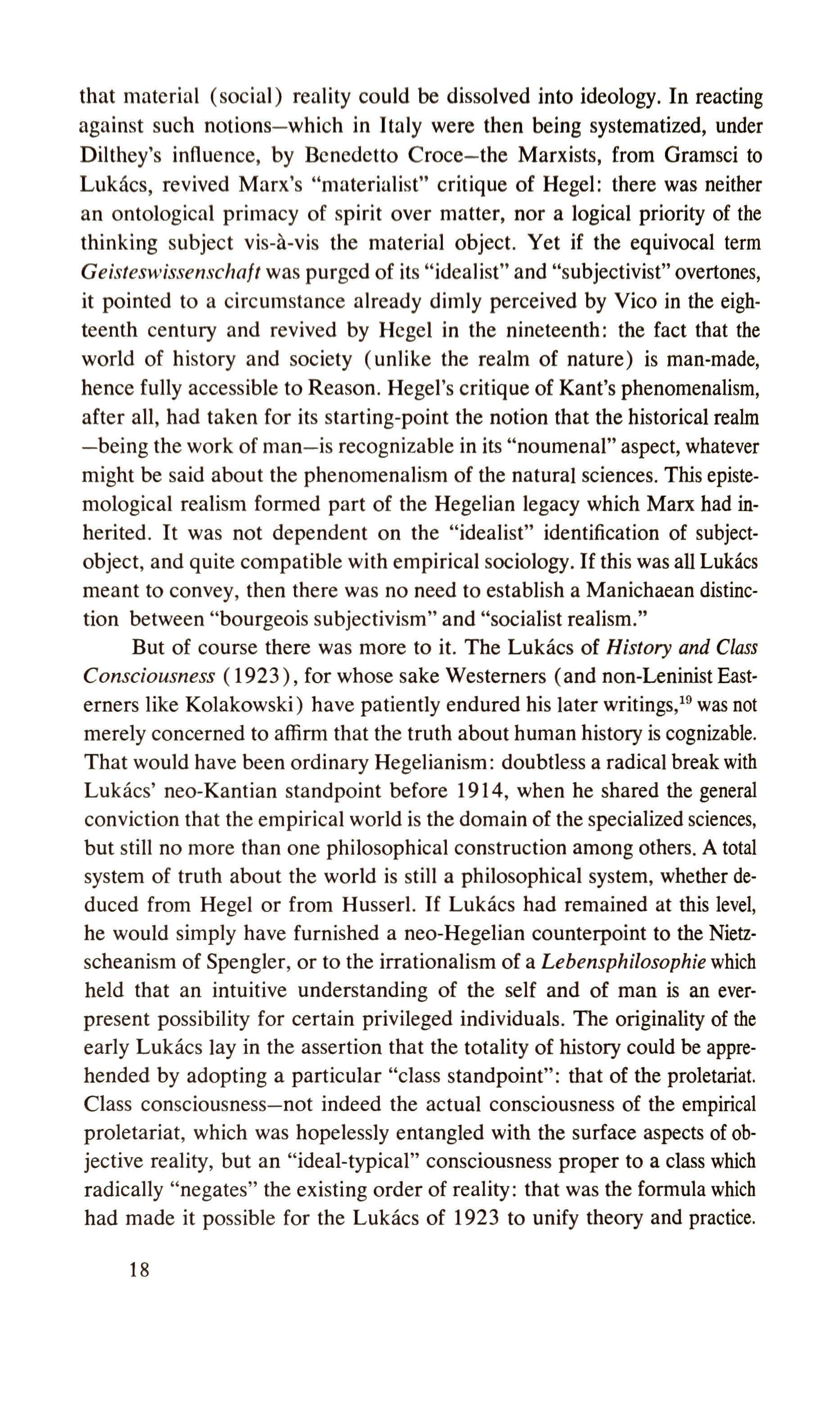
that material (social) reality could be dissolved into ideology. In reacting against such notions which in Italy were then being systematized, under Dilthey's influence, by Benedetto Croce the Marxists, from Gramsci to Lukacs, revived Marx's "materialist" critique of Hegel: there was neither an ontological primacy of spirit over matter, nor a logical priority of the thinking subject vis-a-vis the material object. Yet if the equivocal term Gelsteswissenschajt was purged of its "idealist" and "subjectivist" overtones, it pointed to a circumstance already dimly perceived by Vico in the eighteenth century and revived by Hegel in the nineteenth: the fact that the world of history and society (unlike the realm of nature) is man-made, hence fully accessible to Reason. Hegel's critique of Kant's phenomenalism, after all, had taken for its starting-point the notion that the historical realm -being the work of man is recognizable in its "noumenal" aspect, whatever might be said about the phenomenalism of the natural sciences. This epistemological realism formed part of the Hegelian legacy which Marx had inherited. It was not dependent on the "idealist" identification of subjectobject, and quite compatible with empirical sociology. If this was all Lukacs meant to convey, then there was no need to establish a Manichaean distinction between "bourgeois subjectivism" and "socialist realism."
But of course there was more to it. The Lukacs of History and Class Consciousness (1923), for whose sake Westerners (and non-Leninist Easterners like Kolakowski) have patiently endured his later writings," was not merely concerned to affirm that the truth about human history is cognizable. That would have been ordinary Hegelianism: doubtless a radical break with Lukacs' neo-Kantian standpoint before 1914, when he shared the general conviction that the empirical world is the domain of the specialized sciences, but still no more than one philosophical construction among others. A total system of truth about the world is still a philosophical system, whether deduced from Hegel or from Husserl. If Lukacs had remained at this level, he would simply have furnished a neo-Hegelian counterpoint to the Nietzscheanism of Spengler, or to the irrationalism of a Lebensphilosophie which held that an intuitive understanding of the self and of man is an everpresent possibility for certain privileged individuals. The originality of the early Lukacs lay in the assertion that the totality of history could be apprehended by adopting a particular "class standpoint": that of the proletariat. Class consciousness not indeed the actual consciousness of the empirical proletariat, which was hopelessly entangled with the surface aspects of objective reality, but an "ideal-typical" consciousness proper to a class which radically "negates" the existing order of reality: that was the formula which had made it possible for the Lukacs of 1923 to unify theory and practice.
18
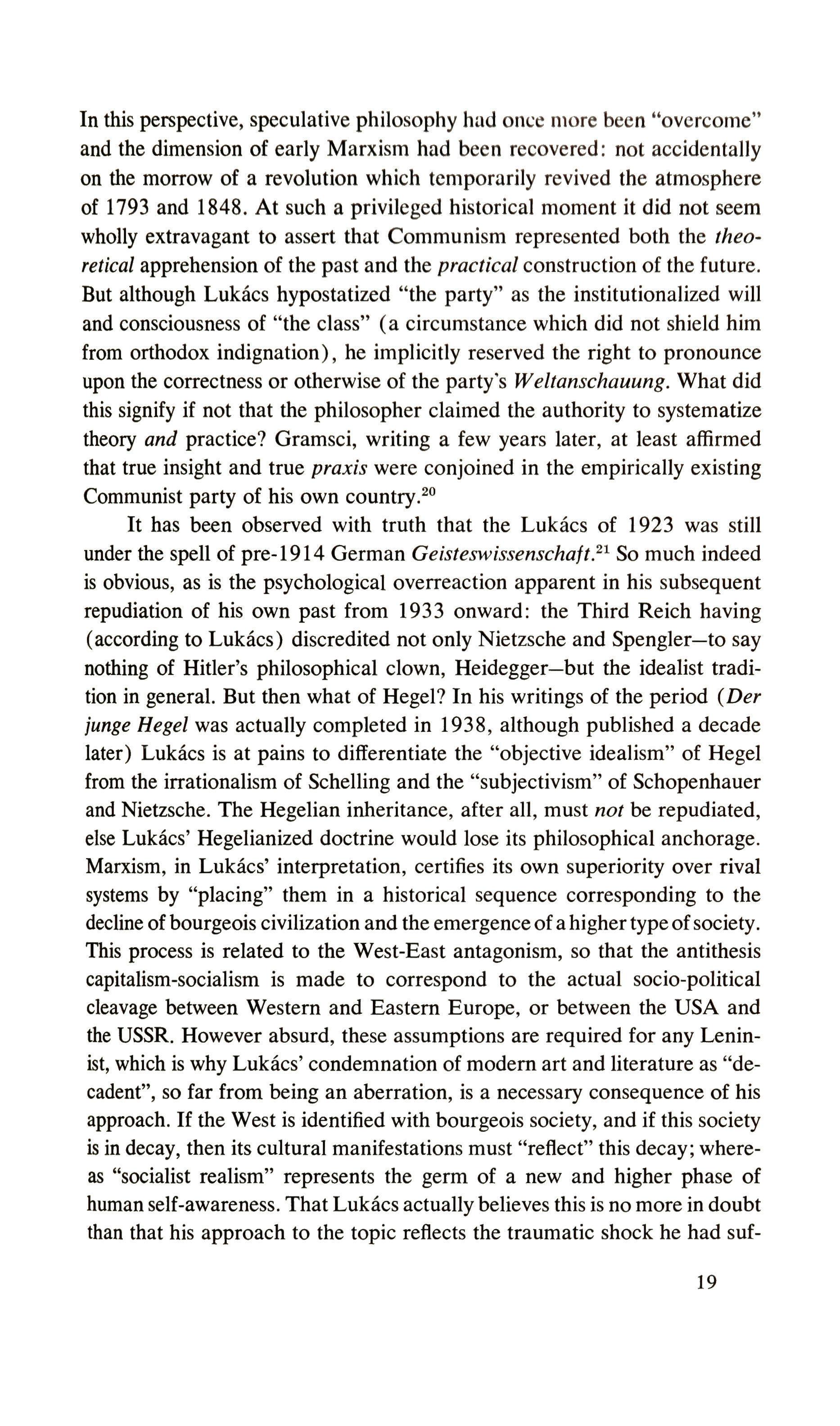
In this perspective, speculative philosophy hud once IIIore been "overcome" and the dimension of early Marxism had been recovered: not accidentally on the morrow of a revolution which temporarily revived the atmosphere of 1793 and 1848. At such a privileged historical moment it did not seem wholly extravagant to assert that Communism represented both the theoretical apprehension of the past and the practical construction of the future. But although Lukacs hypostatized "the party" as the institutionalized will and consciousness of "the class" (a circumstance which did not shield him from orthodox indignation), he implicitly reserved the right to pronounce upon the correctness or otherwise of the party's Weltanschauung. What did this signify if not that the philosopher claimed the authority to systematize theory and practice? Gramsci, writing a few years later, at least affirmed that true insight and true praxis were conjoined in the empirically existing Communist party of his own country."
It has been observed with truth that the Lukacs of 1923 was still under the spell of pre-1914 German GeisteswissenschaitP So much indeed is obvious, as is the psychological overreaction apparent in his subsequent repudiation of his own past from 1933 onward: the Third Reich having (according to Lukacs) discredited not only Nietzsche and Spengler to say nothing of Hitler's philosophical clown, Heidegger but the idealist tradition in general. But then what of Hegel? In his writings of the period (Der junge Hegel was actually completed in 1938, although published a decade later) Lukacs is at pains to differentiate the "objective idealism" of Hegel from the irrationalism of Schelling and the "subjectivism" of Schopenhauer and Nietzsche. The Hegelian inheritance, after all, must not be repudiated, else Lukacs' Hegelianized doctrine would lose its philosophical anchorage. Marxism, in Lukacs' interpretation, certifies its own superiority over rival systems by "placing" them in a historical sequence corresponding to the decline of bourgeois civilization and the emergenceof a highertype ofsociety. This process is related to the West-East antagonism, so that the antithesis capitalism-socialism is made to correspond to the actual socio-political cleavage between Western and Eastern Europe, or between the USA and the USSR. However absurd, these assumptions are required for any Leninist, which is why Lukacs' condemnation of modem art and literature as "decadent", so far from being an aberration, is a necessary consequence of his approach. If the West is identified with bourgeois society, and if this society is in decay, then its cultural manifestations must "reflect" this decay; whereas "socialist realism" represents the germ of a new and higher phase of human self-awareness. That Lukacs actually believes this is no more in doubt than that his approach to the topic reflects the traumatic shock he had suf-
19
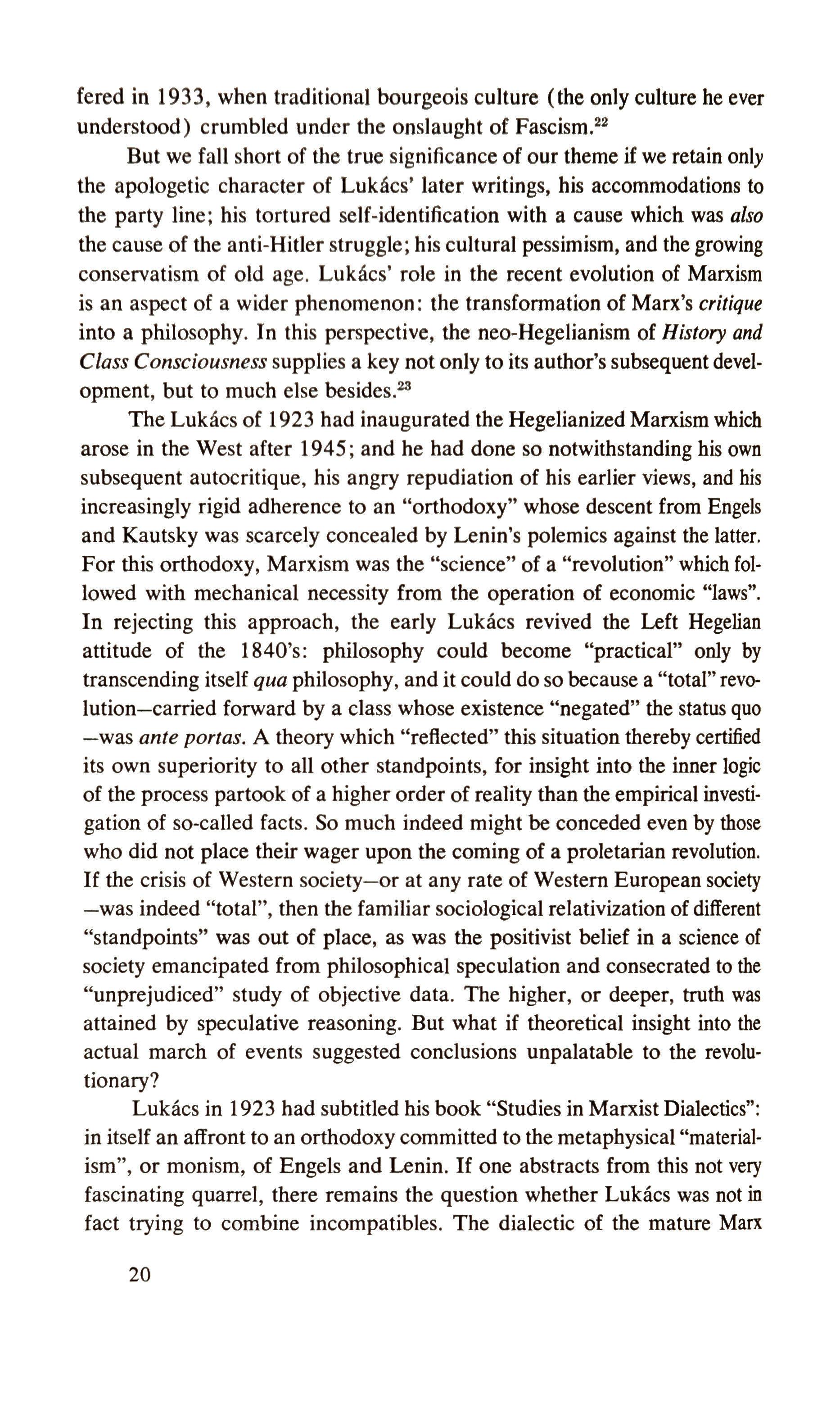
fered in 1933, when traditional bourgeois culture (the only culture he ever understood) crumbled under the onslaught of Fascism."
But we fall short of the true significance of our theme if we retain only the apologetic character of Lukacs' later writings, his accommodations to the party line; his tortured self-identification with a cause which was also the cause of the anti-Hitler struggle; his cultural pessimism, and the growing conservatism of old age. Lukacs' role in the recent evolution of Marxism is an aspect of a wider phenomenon: the transformation of Marx's critique into a philosophy. In this perspective, the neo-Hegelianism of History and Class Consciousness supplies a key not only to its author's subsequent development, but to much else besides."
The Lukacs of 1923 had inaugurated the Hegelianized Marxism which arose in the West after 1945; and he had done so notwithstanding his own subsequent autocritique, his angry repudiation of his earlier views, and his increasingly rigid adherence to an "orthodoxy" whose descent from Engels and Kautsky was scarcely concealed by Lenin's polemics against the latter. For this orthodoxy, Marxism was the "science" of a "revolution" which followed with mechanical necessity from the operation of economic "laws". In rejecting this approach, the early Lukacs revived the Left Hegelian attitude of the 1840's: philosophy could become "practical" only by transcending itself qua philosophy, and it could do so because a "total" revolution carried forward by a class whose existence "negated" the status quo -was ante portas. A theory which "reflected" this situation thereby certified its own superiority to all other standpoints, for insight into the inner logic of the process partook of a higher order of reality than the empirical investigation of so-called facts. So much indeed might be conceded even by those who did not place their wager upon the coming of a proletarian revolution. If the crisis of Western society or at any rate of Western European society -was indeed "total", then the familiar sociological relativization of different "standpoints" was out of place, as was the positivist belief in a science of society emancipated from philosophical speculation and consecrated to the "unprejudiced" study of objective data. The higher, or deeper, truth was attained by speculative reasoning. But what if theoretical insight into the actual march of events suggested conclusions unpalatable to the revolutionary?
Lukacs in 1923 had subtitled his book "Studies in Marxist Dialectics": in itself an affront to an orthodoxy committed to the metaphysical "materialism", or monism, of Engels and Lenin. If one abstracts from this not very fascinating quarrel, there remains the question whether Lukacs was not in fact trying to combine incompatibles. The dialectic of the mature Marx
20

(unlike that of Hegel and the Young Hegelians) was a dialectic of theory and practice, thought and action, generalization and experience. His critique was the intellectual side of a practical commitment whose success or failure could not be predetermined: whether or not the revolution will actually take place is a question to be answered by "scientific" study of the concrete social situation. It cannot be certified by a supposed insight into the logic of the historical process. In reverting to this mode of discourse, Lukacs was in fact returning from Marx to Hegel.
IV
A Hegelianized Marxism such as that of Lukacs begins and ends of necessity with an attempt to portray the actual interplay of reality and ideality, logical categories and the "stuff" of experience, without yielding to Hegel's temptation the construction of yet another metaphysical system. In 1923 Lukacs for a moment believed he had solved the problem: it was only necessary to dispense with "vulgar materialism" so as to arrive at a dialectic in which "being" and "thinking" were reciprocally interdependent. One could then see that Hegel had in effect continued the Kantian enterprise, albeit with some modifications, and that Marx was in the tradition of classical (i.e., idealist) German philosophy, even though in his later writings he had permitted himself a few backslidings: not to mention Engels, whose naively realistic theory of cognition was clearly pre-Kantian.P"
The later Lukacs having reverted to the conception of the mind as a mirror which "reflects" an external reality, the problem of formulating a "materialist dialectic" in terms that took account ofKantand Hegelpresented itself anew to the group of scholars who in the early 1930's made up the inner circle of the Frankfurt Institut fur Sozialjorschung (subsequently transferred to the United States, where some of its members eventually settled down). After 1945 the discussion of this topic spread to France, primarily under the influence of Merleau-Ponty who had made his own the theme of Marx's early writings: La seule maniere de realiser la philosophie est de la detruire." Here we are only concerned with the Central European debate, and specifically with the two writers who in recent years have systematized the Hegelianized Marxism of the original Frankfurt group: T. W. Adorno and Herbert Marcuse."
The "Marxist-Leninist" approach starts from the "materialist inversion" of Hegel's philosophy which Marx is supposed to have effected. If this misunderstanding is avoided, as it should be." a thinker who tries to operate with Hegel's method is confronted with the question what the dialectic sig-
21

nifies if it is not the movement of an absolute: be its label "Matter" or "Spirit." This is Adorno's problem. He has devoted a lifetime to its solution, and his work, taken as a whole, represents a counterpoint to that of Lukacs, while Marcuse is best understood as the exponent of an intermediate position.
If this circumstance is borne in mind, a brief consideration of these two writers can afford to disregard their spectacular, and often very interesting, excursions into other fields, notably the interpretation of psychoanalytical theory. It is doubtless more than a biographical coincidence that both Adorno and Marcuse have felt the fascination of Freud, or that they have taken a prominent share in sponsoring the libertarian morality which differentiates Western from Eastern Europe. But these topics fall outside our theme, which is rather more narrowly defined than would be proper in a sketch of Central European intellectual history since the first world war. It is indeed useful to remember that all the writers in question have had to cope with a set of theoretical and practical problems which in the last resort stemmed from the collapse of traditional European society between the wars, and from the subsequent failure of Stalinism and Fascism to hold the allegiance of intellectuals brought up in the liberal tradition. But this having been said, the fact that Lukacs, Adorno, and Marcuse have arrived at different interpretations of the Hegelian inheritance constitutes a theoretical theme, not an invitation to spin biographical or psychological fantasies.
Adorno's work as a philosopher is refracted in a multitude of publications, of which only a few can enter into consideration here: principally his Aspekte der Hegelschen Philosophie (1957); Zur Metakritik der Erkenninistheorie (originally composed in 1934-37, but given its final form in 1956); and Negative Dialektik (1966). Additionally, mention must be made of the selection of essays which appeared under the title Prisms in an English translation in 1966. Marcuse's study of Hegel, Reason and Revolution (London: 1941, 1955), established him in an unshakable position, from which in later years he sallied out to deliver critical and polemical broadsides along a sector of the front usually associated with the New Left. It seems fair to say that, while politically further to the left, Marcuse shares Adorno's aversion to the type of dogmatic scholasticism institutionalizedwith the help of Lukacs in the USSR and in Eastern Europe."
What then is the enduring problem for a thinker who tries to operate with the Hegelian method, while retaining the Marxian critique of Hegel and of philosophy as such? We can approach the topicbyciting whatAdorno himself has to say about the inmost core of Hegel's logic: the notion of a
22
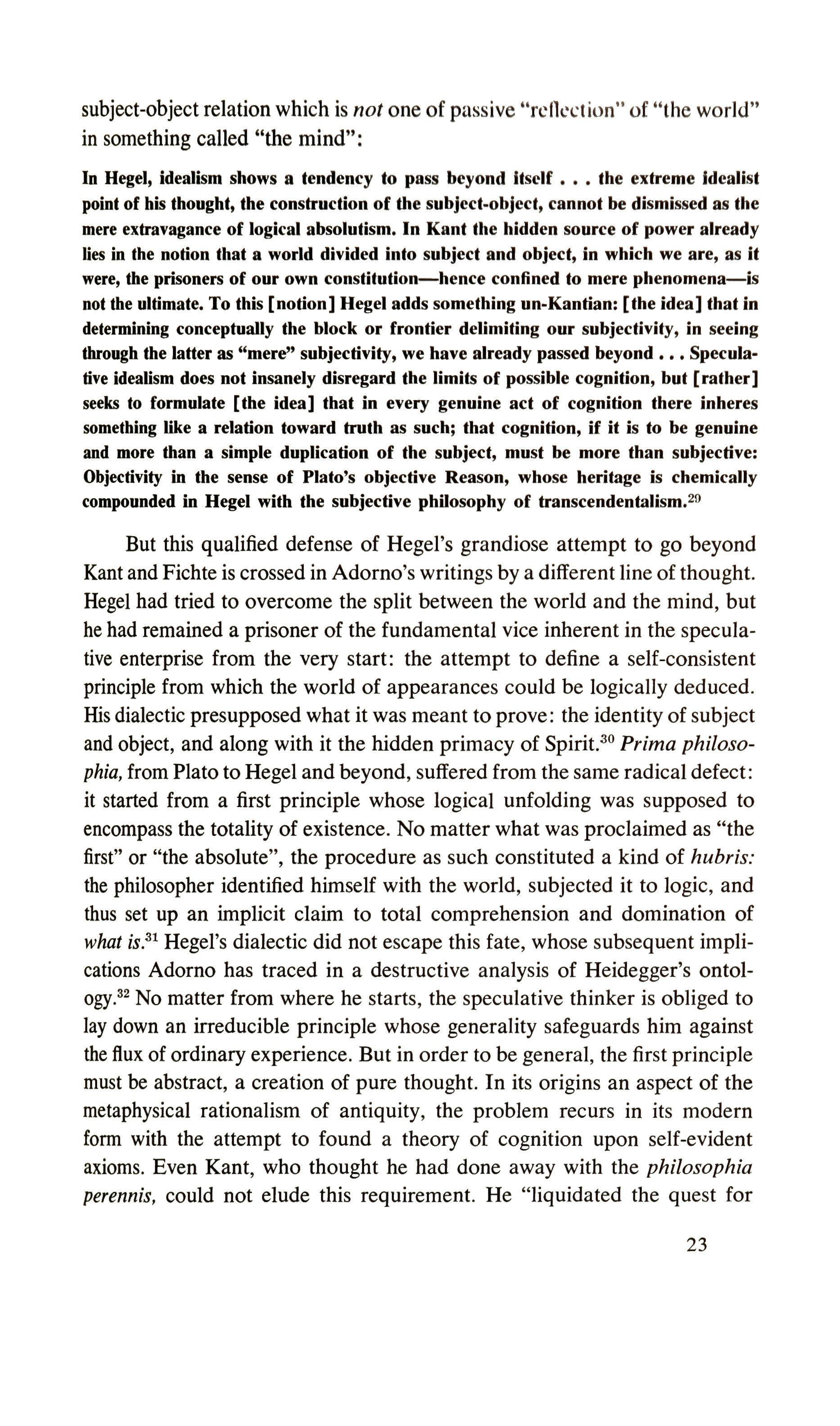
subject-object relation which is not one of passive "reflection' of "the world" in something called "the mind":
In Hegel, idealism shows a tendency to pass beyond Itself the extreme Idealist point of his thought, the construction of the subject-object, cannot be dismissed as the mere extravagance of logical absolutism. In Kant the hidden source of power already lies in the notion that a world divided into subject and object, in which we are, as it were, the prisoners of our own constitution hence confined to mere phenomena is not the ultimate. To this [notion] Hegel adds something un-Kantian: [the idea] that in deterulining conceptually the block or frontier delimiting our subjectivity, in seeing through the latter as "mere" subjectivity, we have already passed beyond Speculative idealism does not insanely disregard the limits of possible cognition, but [rather] seeks to formulate [the idea] that in every genuine act of cognition there inheres something like a relation toward truth as such; that cognition, if it is to be genuine and more than a simple duplication of the subject, must be more than subjective: Objectivity in the sense of Plato's objective Reason, whose heritage is chemically compounded in Hegel with the subjective philosophy of transcendentalism.w
But this qualified defense of Hegel's grandiose attempt to go beyond Kant and Fichte is crossed in Adorno's writings by a different line of thought. Hegel had tried to overcome the split between the world and the mind, but he had remained a prisoner of the fundamental vice inherent in the speculative enterprise from the very start: the attempt to define a self-consistent principle from which the world of appearances could be logically deduced. His dialectic presupposed what it was meant to prove: the identity of subject and object, and along with it the hidden primacy of Spirit." Prima philosophia, from Plato to Hegel and beyond, suffered from the same radical defect: it started from a first principle whose logical unfolding was supposed to encompass the totality of existence. No matter what was proclaimed as "the first" or "the absolute", the procedure as such constituted a kind of hubris: the philosopher identified himself with the world, SUbjected it to logic, and thus set up an implicit claim to total comprehension and domination of what is.at Hegel's dialectic did not escape this fate, whose subsequent implications Adorno has traced in a destructive analysis of Heidegger's ontology." No matter from where he starts, the speculative thinker is obliged to lay down an irreducible principle whose generality safeguards him against the flux of ordinary experience. But in order to be general, the first principle must be abstract, a creation of pure thought. In its origins an aspect of the metaphysical rationalism of antiquity, the problem recurs in its modern fO(111 with the attempt to found a theory of cognition upon self-evident axioms. Even Kant, who thought he had done away with the philosophia perennis, could not elude this requirement. He "liquidated the quest for
23
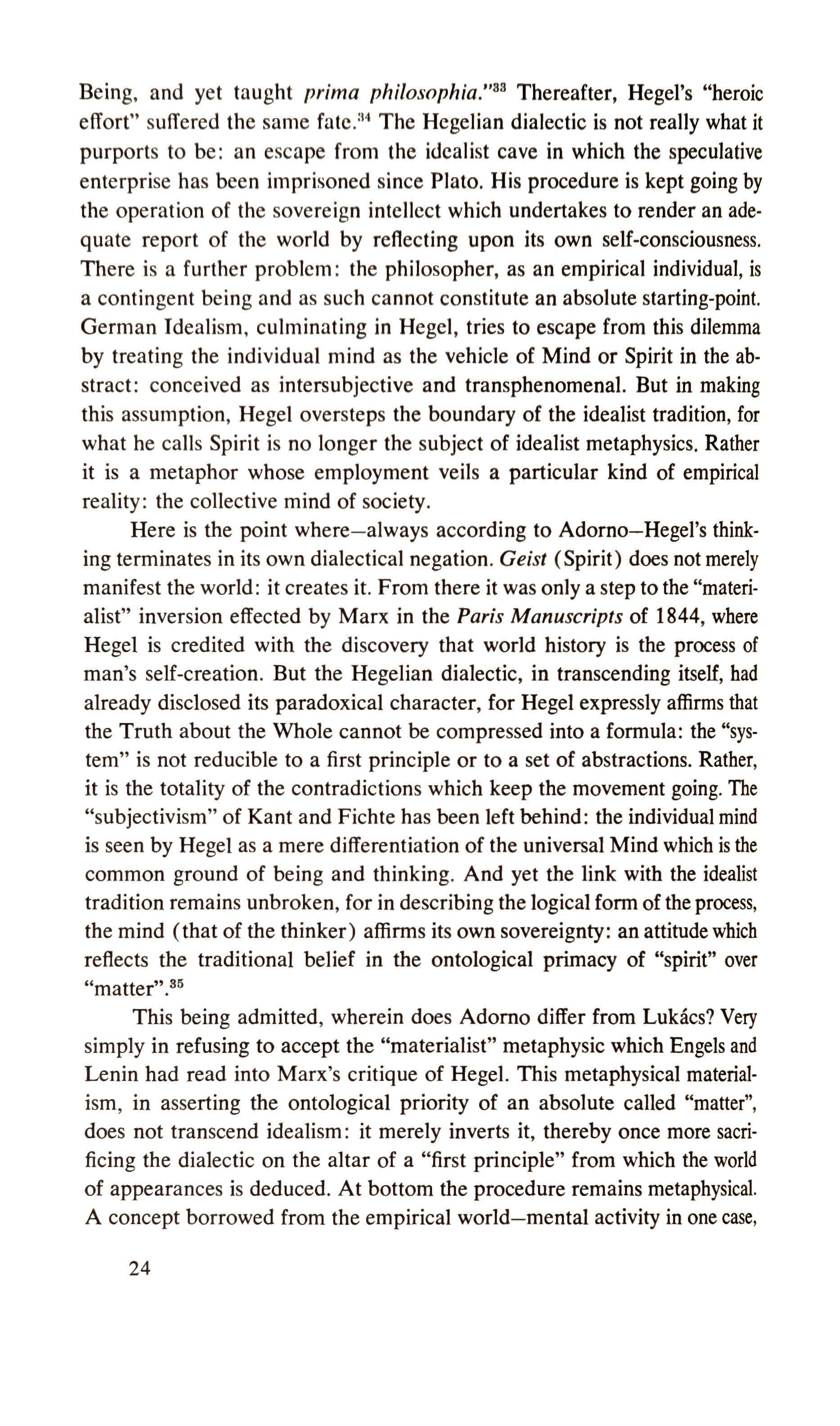
Being, and yet taught prima philosophia=" Thereafter, Hegel's "heroic effort" suffered the same fate." The Hegelian dialectic is not really what it purports to be: an escape from the idealist cave in which the speculative enterprise has been imprisoned since Plato. His procedure is kept going by the operation of the sovereign intellect which undertakes to render an adequate report of the world by reflecting upon its own self-consciousness. There is a further problem: the philosopher, as an empirical individual, is a contingent being and as such cannot constitute an absolute starting-point. German Idealism, culminating in Hegel, tries to escape from this dilemma by treating the individual mind as the vehicle of Mind or Spirit in the abstract: conceived as intersubjective and transphenomenal. But in making this assumption, Hegel oversteps the boundary of the idealist tradition, for what he calls Spirit is no longer the subject of idealist metaphysics. Rather it is a metaphor whose employment veils a particular kind of empirical reality: the collective mind of society.
Here is the point where always according to Adorno Hegel's thinking tel minates in its own dialectical negation. Geist (Spirit) does not merely manifest the world: it creates it. From there it was only a step to the "materialist" inversion effected by Marx in the Paris Manuscripts of 1844, where Hegel is credited with the discovery that world history is the process of man's self-creation. But the Hegelian dialectic, in transcending itself, had already disclosed its paradoxical character, for Hegel expressly affirms that the Truth about the Whole cannot be compressed into a formula: the "system" is not reducible to a first principle or to a set of abstractions. Rather, it is the totality of the contradictions which keep the movement going. The "subjectivism" of Kant and Fichte has been left behind: the individual mind is seen by Hegel as a mere differentiation of the universal Mind which is the common ground of being and thinking. And yet the link with the idealist tradition remains unbroken, for in describing the logical fOI III of the process, the mind (that of the thinker) affirms its own sovereignty: an attitude which reflects the traditional belief in the ontological primacy of "spirit" over "matter"."
This being admitted, wherein does Adorno differ from Lukacs? Very simply in refusing to accept the "materialist" metaphysic which Engels and Lenin had read into Marx's critique of Hegel. This metaphysical materialism, in asserting the ontological priority of an absolute called "matter", does not transcend idealism: it merely inverts it, thereby once more sacrificing the dialectic on the altar of a "first principle" from which the world of appearances is deduced. At bottom the procedure remains metaphysical. A concept borrowed from the empirical world mental activity in one case,
24
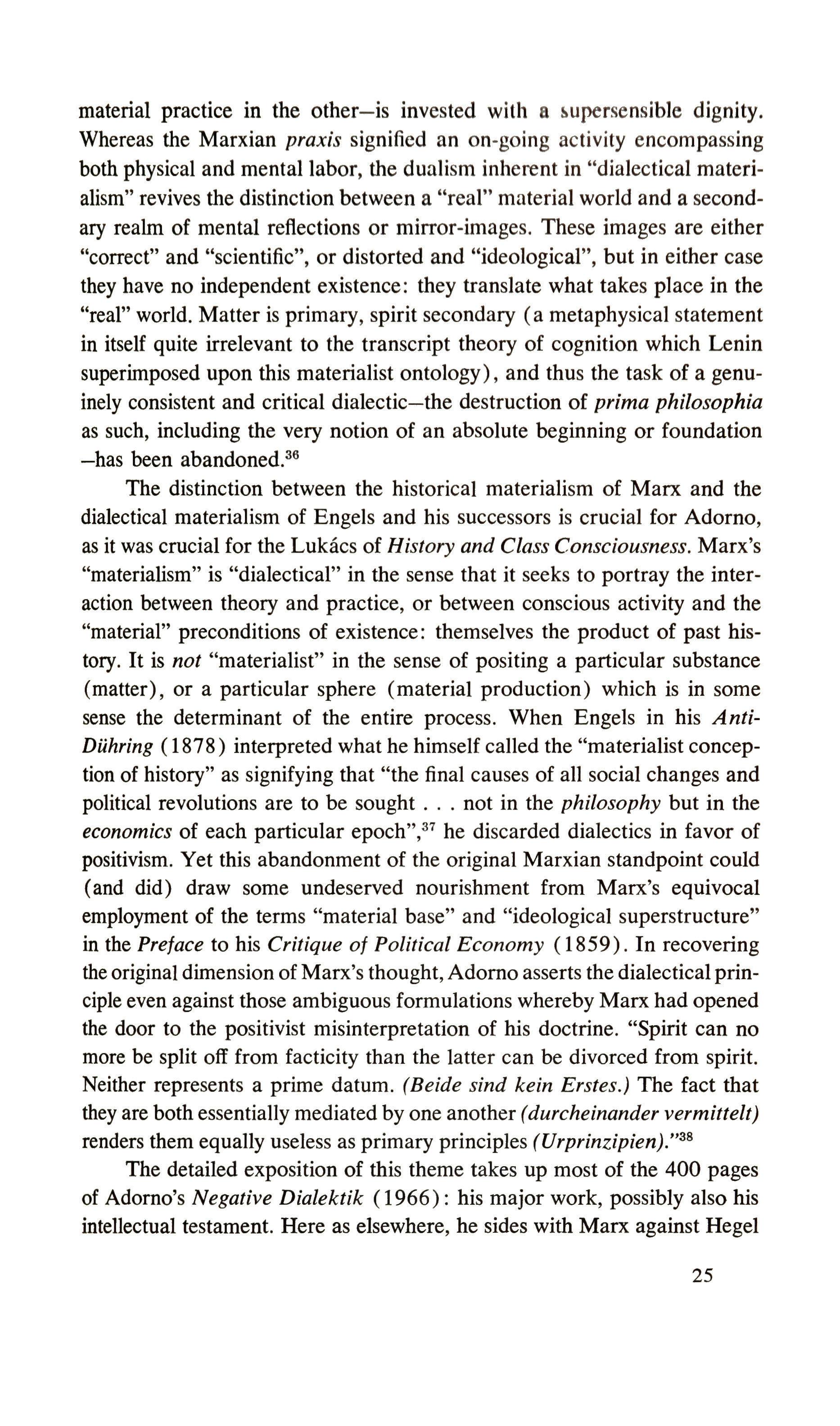
material practice in the other is invested with a supersenslble dignity. Whereas the Marxian praxis signified an on-going activity encompassing both physical and mental labor, the dualism inherent in "dialectical materialism" revives the distinction between a "real" material world and a secondary realm of mental reflections or mirror-images. These images are either "correct" and "scientific", or distorted and "ideological", but in either case they have no independent existence: they translate what takes place in the "real" world. Matter is primary, spirit secondary (a metaphysical statement in itself quite irrelevant to the transcript theory of cognition which Lenin superimposed upon this materialist ontology), and thus the task of a genuinely consistent and critical dialectic the destruction of prima philosophia as such, including the very notion of an absolute beginning or foundation -has been abandoned."
The distinction between the historical materialism of Marx and the dialectical materialism of Engels and his successors is crucial for Adorno, as it was crucial for the Lukacs of History and Class Consciousness. Marx's "materialism" is "dialectical" in the sense that it seeks to portray the interaction between theory and practice, or between conscious activity and the "material" preconditions of existence: themselves the product of past history. It is not "materialist" in the sense of positing a particular substance (matter), or a particular sphere (material production) which is in some sense the determinant of the entire process. When Engels in his AntiDiihring (1878) interpreted what he himself called the "materialist conception of history" as signifying that "the final causes of all social changes and political revolutions are to be sought not in the philosophy but in the economics of each particular epoch"," he discarded dialectics in favor of positivism. Yet this abandonment of the original Marxian standpoint could (and did) draw some undeserved nourishment from Marx's equivocal employment of the terms "material base" and "ideological superstructure" in the Pre/ace to his Critique 0/ Political Economy (1859). In recovering the original dimension of Marx's thought, Adorno asserts the dialectical principle even against those ambiguous formulations whereby Marx had opened the door to the positivist misinterpretation of his doctrine. "Spirit can no more be split off from facticity than the latter can be divorced from spirit. Neither represents a prime datum. (Beide sind kein Erstes.) The fact that they are both essentially mediated by one another (durcheinander vermittelt) renders them equally useless as primary principles (Urprinzipienl/P"
The detailed exposition of this theme takes up most of the 400 pages of Adorno's Negative Dialektik (1966): his major work, possibly also his intellectual testament. Here as elsewhere, he sides with Marx against Hegel
25
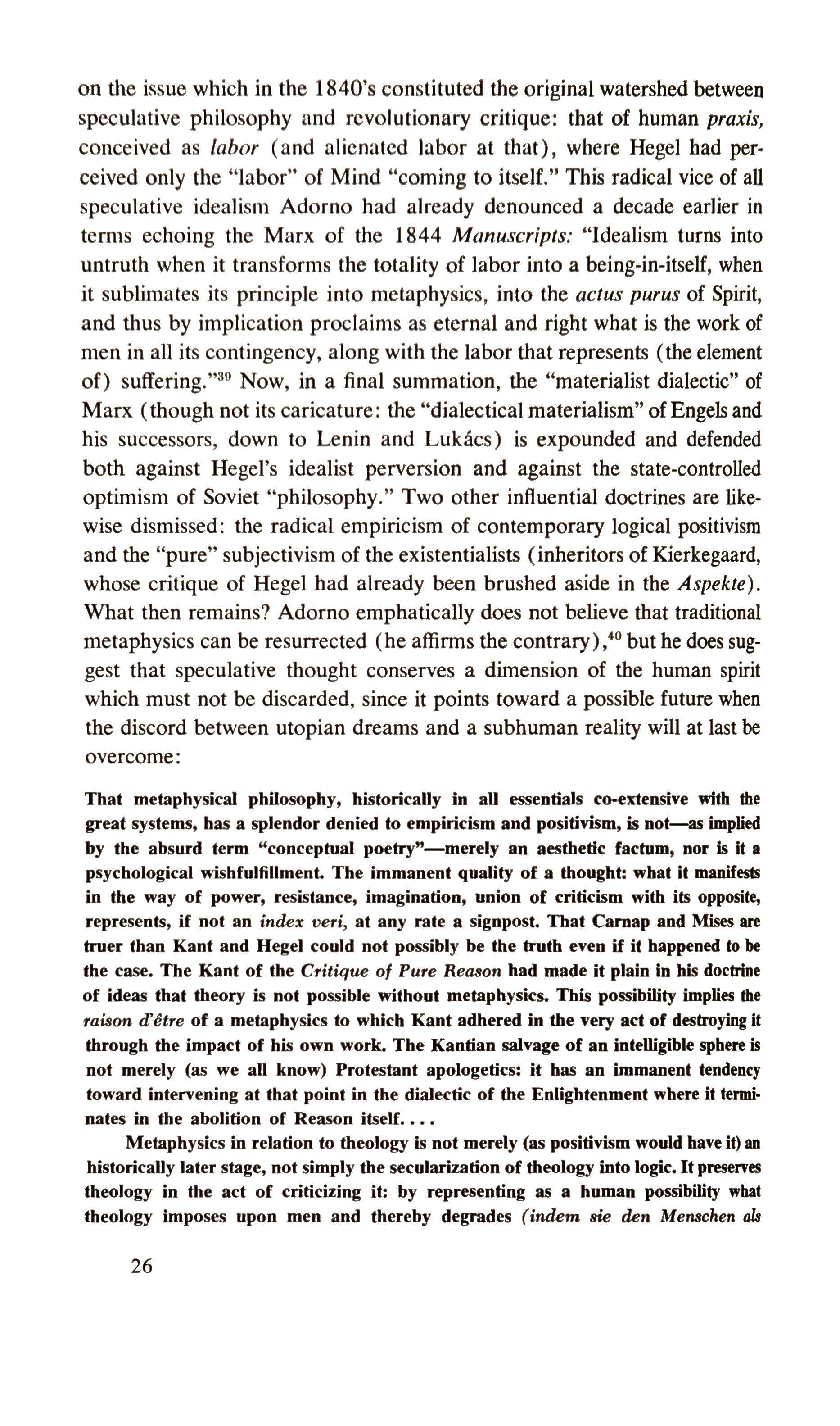
on the issue which in the 1840's constituted the original watershed between speculative philosophy and revolutionary critique: that of human praxis, conceived as labor (and alienated labor at that), where Hegel had perceived only the "labor" of Mind "coming to itself." This radical vice of all speculative idealism Adorno had already denounced a decade earlier in terms echoing the Marx of the 1844 Manuscripts.' "Idealism turns into untruth when it transforms the totality of labor into a being-in-itself, when it sublimates its principle into metaphysics, into the actus purus of Spirit, and thus by implication proclaims as eternal and right what is the work of men in all its contingency, along with the labor that represents (the element of) suffering. "89 Now, in a final summation, the "materialist dialectic" of Marx (though not its caricature: the "dialectical materialism" of Engels and his successors, down to Lenin and Lukacs) is expounded and defended both against Hegel's idealist perversion and against the state-controlled optimism of Soviet "philosophy." Two other influential doctrines are likewise dismissed: the radical empiricism of contemporary logical positivism and the "pure" subjectivism of the existentialists (inheritors of Kierkegaard, whose critique of Hegel had already been brushed aside in the Aspekte). What then remains? Adorno emphatically does not believe that traditional metaphysics can be resurrected (he affirms the contrary),40 but he does suggest that speculative thought conserves a dimension of the human spirit which must not be discarded, since it points toward a possible future when the discord between utopian dreams and a subhuman reality will at last be overcome:
That metaphysical philosophy, historically in aU essentials co-extensive with the great systems, has a splendor denied to empiricism and positivism, is not 8S implied by the absurd term "conceptual poetry" merely an aesthetic factum, nor is it a psychological wishfulfillment. The immanent quality of a thought: what it manifests in the way of power, resistance, imagination, union of criticism with its opposite, represents, if not an index veri, at any rate a signpost. That Carnap and Mises are truer than Kant and Hegel could not possibly be the truth even if it happened to be the case. The Kant of the Critique of Pure Reason had made it plain in his doctrine of ideas that theory is not possible without metaphysics. This possibility implies the raison aetre of a metaphysics to which Kant adhered in the very act of destroying it through the impact of his own work. The Kantian salvage of an intelligible spbere is not merely (as we all know) Protestant apologetics: it has an immanent tendency toward intervening at that point in the dialectic of the Enlightenment where it tefillinates in the abolition of Reason itself.•••
Metaphysics in relation to theology is not merely (as positivism would have it) an historicaUy later stage, not simply the secularization of theology into logic. It preserves theology in the act of criticizing it: by representing as a human possibility what theology imposes upon men and thereby degrades (indem Bie den Menschen a1s
26
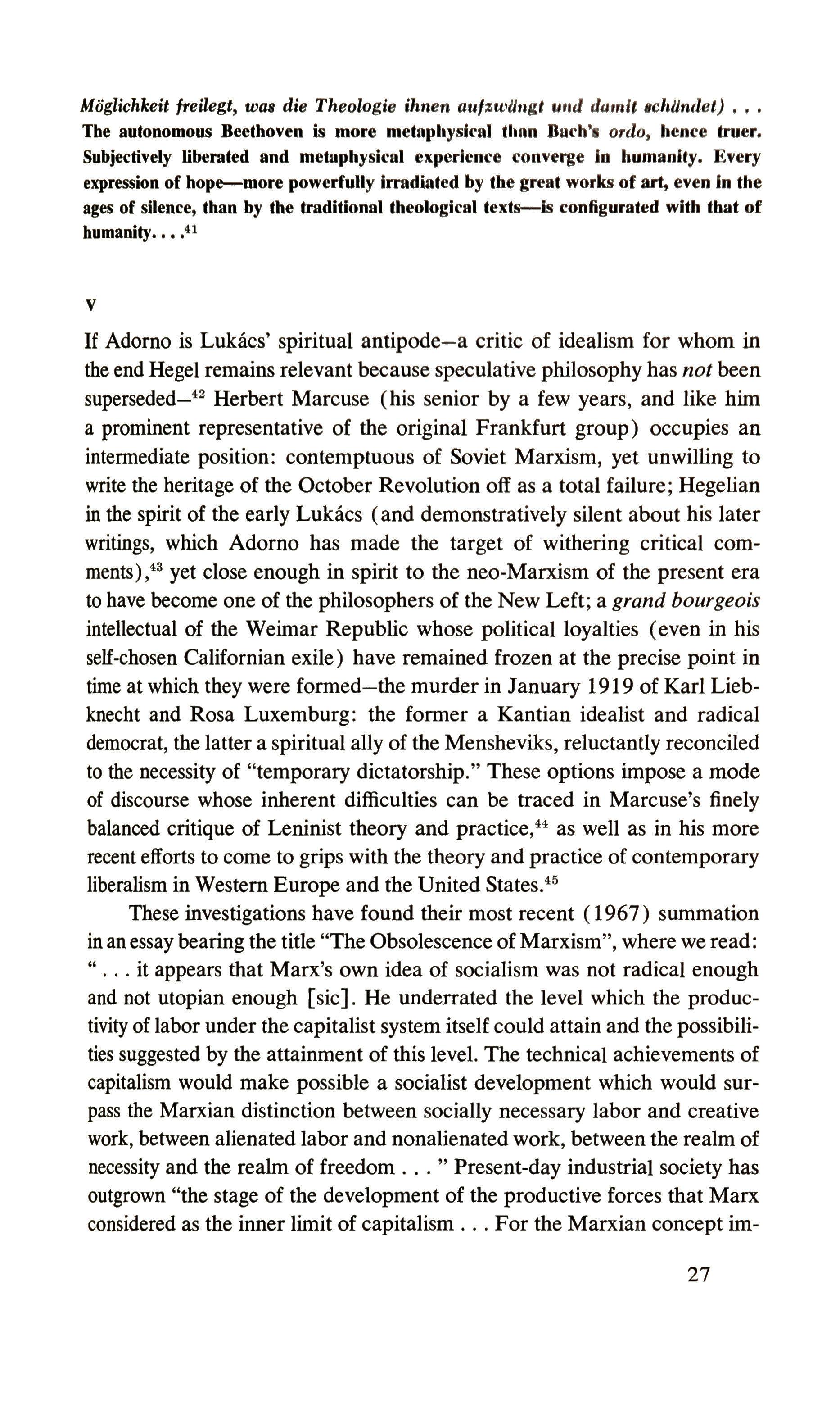
Moglichkeit freilegt, was die Theologie Ihnen aufzula'lg' u,.d dll,nlt ,chan(let) The autonomous Beethoven is more metaphysical tllan Bach'. ordo, hence truer. Subjectively liberated and metaphysical experience converge In humanity. Every expression of hope more powerfully Irladiated by the great works of art, even In the ages of silence, than by the traditional theological texts Is configurated with that of h 0ty 41 uman.
v
If Adorno is Lukacs' spiritual antipode a critic of idealism for whom in the end Hegel remains relevant because speculative philosophy has not been superseded 42 Herbert Marcuse (his senior by a few years, and like him a prominent representative of the original Frankfurt group) occupies an intermediate position: contemptuous of Soviet Marxism, yet unwilling to write the heritage of the October Revolution off as a total failure; Hegelian in the spirit of the early Lukacs (and demonstratively silent about his later writings, which Adorno has made the target of withering critical comments),43 yet close enough in spirit to the neo-Marxism of the present era to have become one of the philosophers of the New Left; a grand bourgeois intellectual of the Weimar Republic whose political loyalties (even in his self-chosen Californian exile) have remained frozen at the precise point in time at which they were formed the murder in January 1919 of Karl Liebknecht and Rosa Luxemburg: the former a Kantian idealist and radical democrat, the latter a spiritual ally of the Mensheviks, reluctantly reconciled to the necessity of "temporary dictatorship." These options impose a mode of discourse whose inherent difficulties can be traced in Marcuse's finely balanced critique of Leninist theory and practice," as well as in his more recent efforts to come to grips with the theory and practice of contemporary liberalism in Western Europe and the United States."
These investigations have found their most recent (1967) summation in an essay bearing the title "The Obsolescence of Marxism", where we read: " it appears that Marx's own idea of socialism was not radical enough and not utopian enough [sic]. He underrated the level which the productivity of labor under the capitalist system itself could attain and the possibilities suggested by the attainment of this level. The technical achievements of capitalism would make possible a socialist development which would surpass the Marxian distinction between socially necessary labor and creative work, between alienated labor and nonalienated work, between the realm of necessity and the realm of freedom Present-day industrial society has outgrown "the stage of the development of the productive forces that Marx considered as the inner limit of capitalism For the Marxian concept im-
27
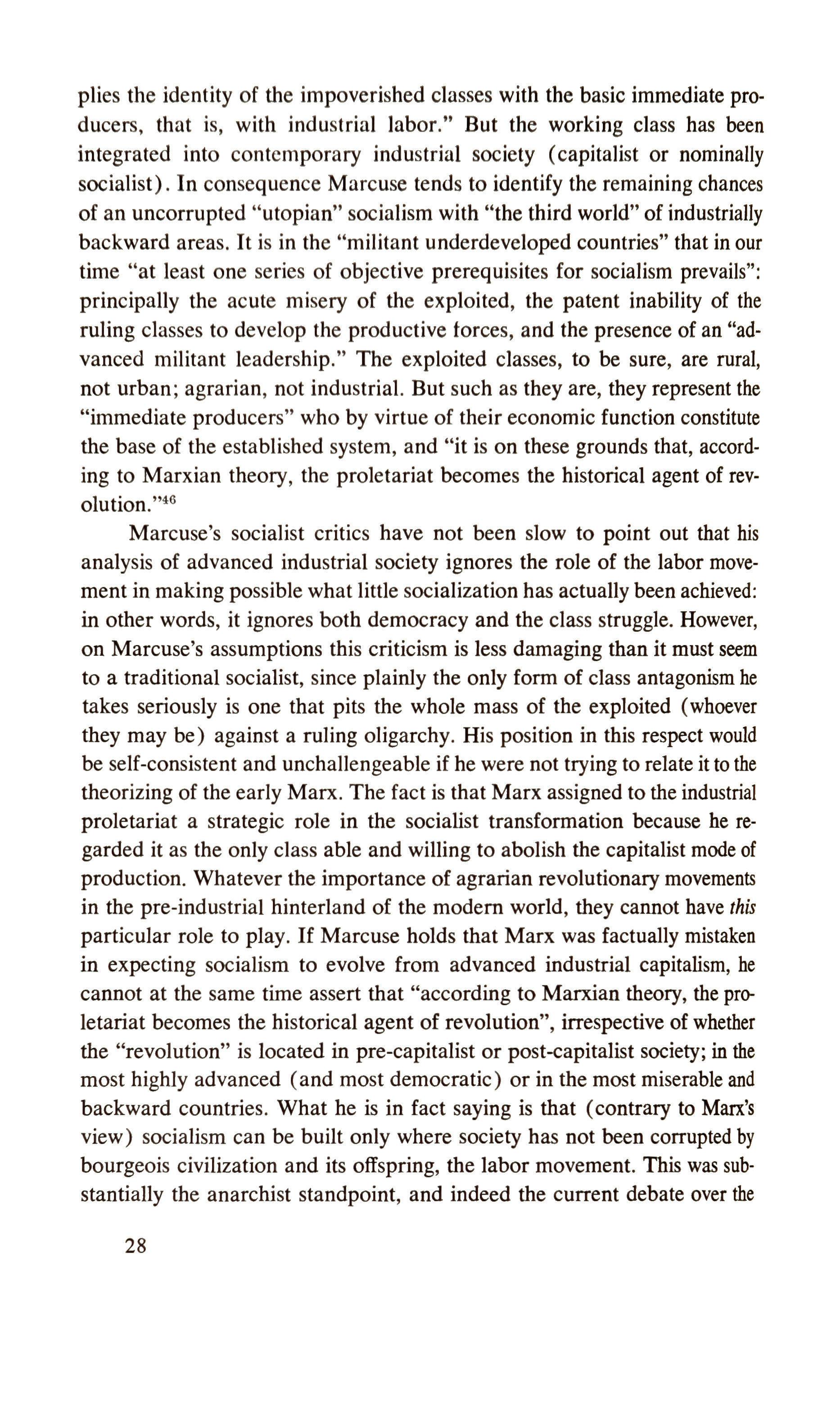
plies the identity of the impoverished classes with the basic immediate producers, that is, with industrial labor." But the working class has been integrated into contemporary industrial society (capitalist or nominally socialist). In consequence Marcuse tends to identify the remaining chances of an uncorrupted "utopian" socialism with "the third world" of industrially backward areas. It is in the "militant underdeveloped countries" that in our time "at least one series of objective prerequisites for socialism prevails": principally the acute misery of the exploited, the patent inability of the ruling classes to develop the productive torces, and the presence of an "advanced militant leadership." The exploited classes, to be sure, are rural, not urban; agrarian, not industrial. But such as they are, they represent the "immediate producers" who by virtue of their economic function constitute the base of the established system, and "it is on these grounds that, according to Marxian theory, the proletariat becomes the historical agent of revolution.'?"
Marcuse's socialist critics have not been slow to point out that his analysis of advanced industrial society ignores the role of the labor movement in making possible what little socialization has actually been achieved: in other words, it ignores both democracy and the class struggle. However, on Marcuse's assumptions this criticism is less damaging than it must seem to a traditional socialist, since plainly the only fOI'III of class antagonism he takes seriously is one that pits the whole mass of the exploited (whoever they may be) against a ruling oligarchy. His position in this respect would be self-consistent and unchallengeable if he were not trying to relate it to the theorizing of the early Marx. The fact is that Marx assigned to the industrial proletariat a strategic role in the socialist transformation because he regarded it as the only class able and willing to abolish the capitalist mode of production. Whatever the importance of agrarian revolutionary movements in the pre-industrial hinterland of the modem world, they cannot have this particular role to play. If Marcuse holds that Marx was factually mistaken in expecting socialism to evolve from advanced industrial capitalism, he cannot at the same time assert that "according to Marxian theory, the proletariat becomes the historical agent of revolution", irrespective of whether the "revolution" is located in pre-capitalist or post-capitalist society; in the most highly advanced (and most democratic) or in the most miserable and backward countries. What he is in fact saying is that (contrary to Marx's view) socialism can be built only where society has not been corrupted by bourgeois civilization and its offspring, the labor movement. This was substantially the anarchist standpoint, and indeed the current debate over the
28
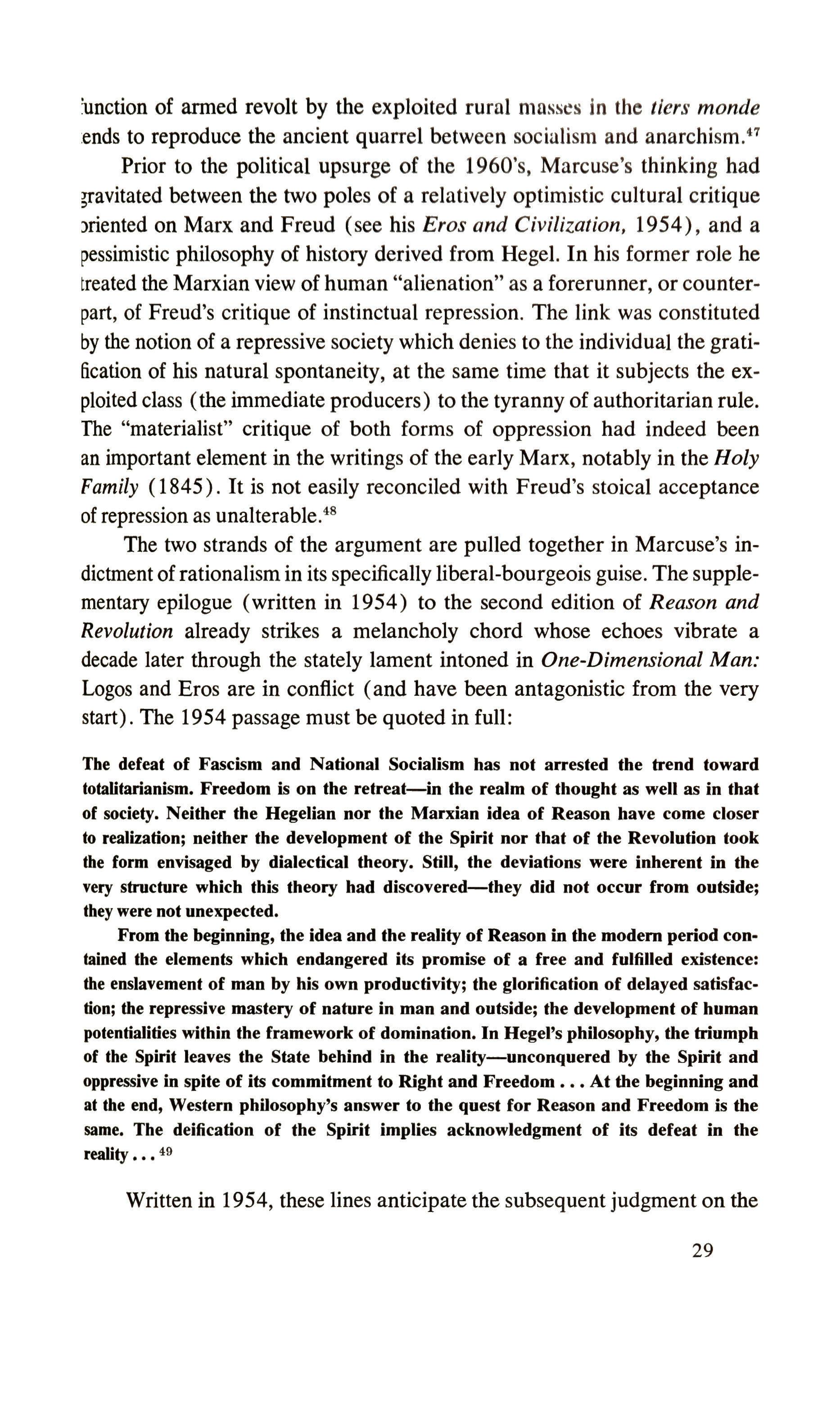
unction of armed revolt by the exploited rural masses in the tiers monde ends to reproduce the ancient quarrel between socialism and anarchism."
Prior to the political upsurge of the 1960's, Marcuse's thinking had gravitated between the two poles of a relatively optimistic cultural critique oriented on Marx and Freud (see his Eros and Civilization, 1954), and a pessimistic philosophy of history derived from Hegel. In his former role he treated the Marxian view of human "alienation" as a forerunner, or counterpart, of Freud's critique of instinctual repression. The link was constituted by the notion of a repressive society which denies to the individual the gratification of his natural spontaneity, at the same time that it subjects the exploited class (the immediate producers) to the tyranny of authoritarian rule. The "materialist" critique of both forms of oppression had indeed been an important element in the writings of the early Marx, notably in the Holy Family (1845). It is not easily reconciled with Freud's stoical acceptance of repression as unalterable."
The two strands of the argument are pulled together in Marcuse's indictment of rationalism in its specificallyliberal-bourgeois guise. The supplementary epilogue (written in 1954) to the second edition of Reason and Revolution already strikes a melancholy chord whose echoes vibrate a decade later through the stately lament intoned in One-Dimensional Man.' Logos and Eros are in conflict (and have been antagonistic from the very start). The 1954 passage must be quoted in full:
The defeat of Fascism and National Socialism has not arrested the trend toward totaHtarianism. Freedom is on the retreat in the realm of thought as well as in that of society. Neither the Hegelian nor the Marxian idea of Reason have come closer to realization; neither the development of the Spirit nor that of the Revolution took the forlll envisaged by dialectical theory. Still, the deviations were inherent in the very structure which this theory had discovered they did not occur from outside; they were not unexpected.
From the beginning, the idea and the reality of Reason in the modem period contained the elements which endangered its promise of a free and fulfilled existence: the enslavement of man by his own productivity; the glorification of delayed satisfaction; the repressive mastery of nature in man and outside; the development of human potentialities within the framework of domination. In Hegel's philosophy, the triumph of the Spirit leaves the State behind in the reality unconquered by the Spirit and oppressive in spite of its commitment to Right and Freedom At the beginning and at the end, Western phHosophy's answer to the quest for Reason and Freedom is the same. The deification of the Spirit implies acknowledgment of its defeat in the eaJ'ty 49 r I
Written in 1954, these lines anticipate the subsequent judgment on the 29
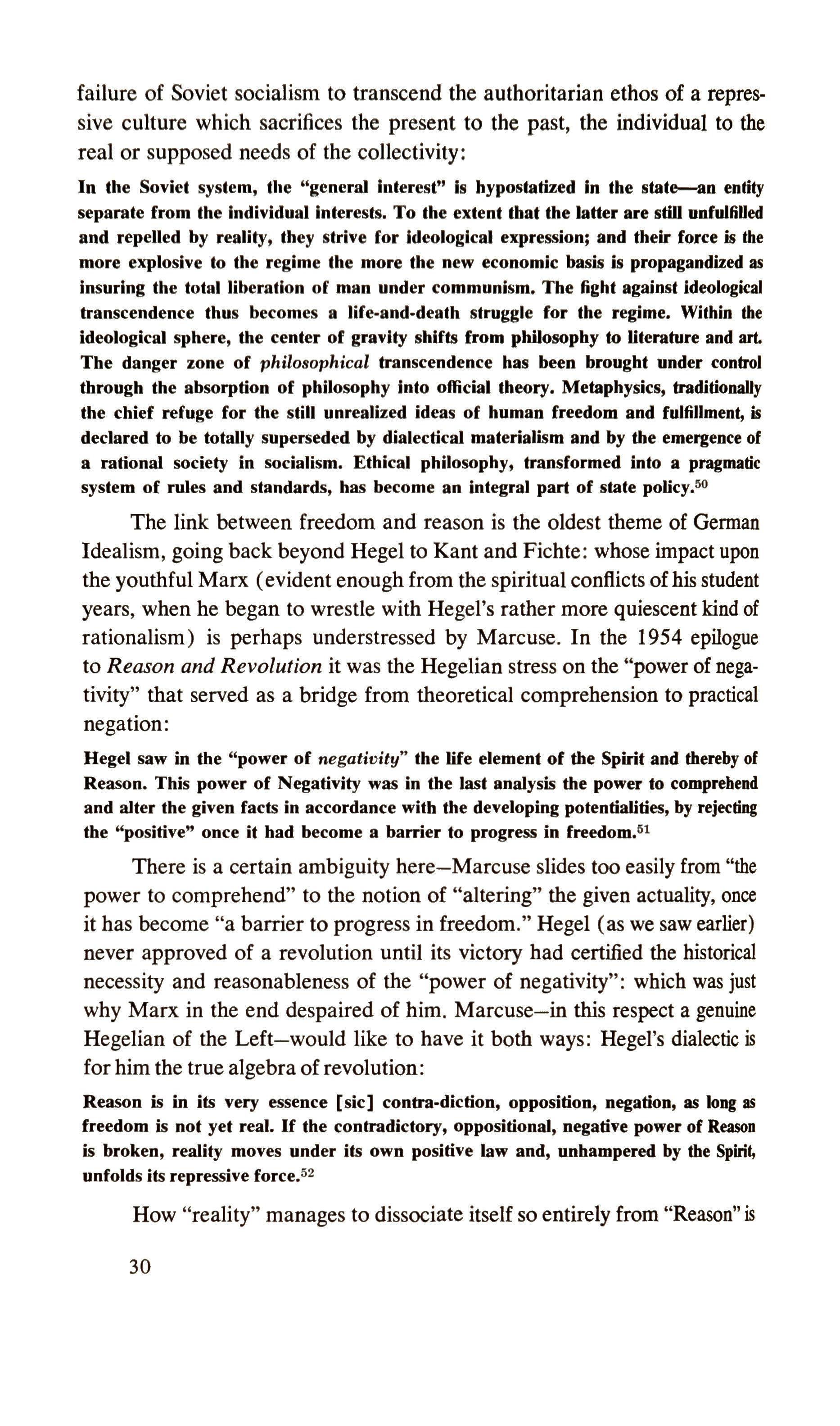
failure of Soviet socialism to transcend the authoritarian ethos of a repressive culture which sacrifices the present to the past, the individual to the real or supposed needs of the collectivity:
In the Soviet system, the "general Interest" Is hypostatized In the state an entity separate from the individual Interests. To the extent that the latter are still unfulfilled and repelled by reality, they strive for Ideological expression; and their force is the more explosive to the regime the more the new economic basis is propagandized as insuring the total liberation of man under communism. The fight against ideological transcendence thus becomes a life-and-death struggle for the regime. Within the ideological sphere, the center of gravity shifts from phUosophy to literature and art. The danger zone of philosophical transcendence has been brought under control through the absorption of philosophy into official theory. Metaphysics, traditionaUy the chief refuge for the still unrealized ideas of human freedom and fulfillment, is declared to be totally superseded by dialectical materialism and by the emergence of a rational society in socialism. Ethical philosophy, transformed into a pragmatic system of rules and standards, has become an integral part of state policy.50
The link between freedom and reason is the oldest theme of German Idealism, going back beyond Hegel to Kant and Fichte: whose impact upon the youthful Marx (evident enough from the spiritual conflicts ofhis student years, when he began to wrestle with Hegel's rather more quiescent kind of rationalism) is perhaps understressed by Marcuse. In the 1954 epilogue to Reason and Revolution it was the Hegelian stress on the "power of negativity" that served as a bridge from theoretical comprehension to practical negation:
Hegel saw in the "power of negativity" the life element of the Spirit and thereby of Reason. This power of Negativity was in the last analysis the power to comprehend and alter the given facts in accordance with the developing potentialities, by rejecting the "positive" once it had become a barrier to progress in freedom.51
There is a certain ambiguity here Marcuse slides too easily from "the power to comprehend" to the notion of "altering" the given actuality, once it has become "a barrier to progress in freedom." Hegel (as we saw earlier) never approved of a revolution until its victory had certified the historical necessity and reasonableness of the "power of negativity": which was just why Marx in the end despaired of him. Marcuse in this respect a genuine Hegelian of the Left would like to have it both ways: Hegel's dialectic is for him the true algebra of revolution:
Reason is in its very essence [sic] contra-diction, opposition, negation, as long as freedom is not yet real. If the contradictory, oppositional, negative power of Reason is broken, reality moves under its own positive law and, unhampered by the Spirit, unfolds its repressive force.52
How "reality" manages to dissociate itself so entirely from "Reason" is
30
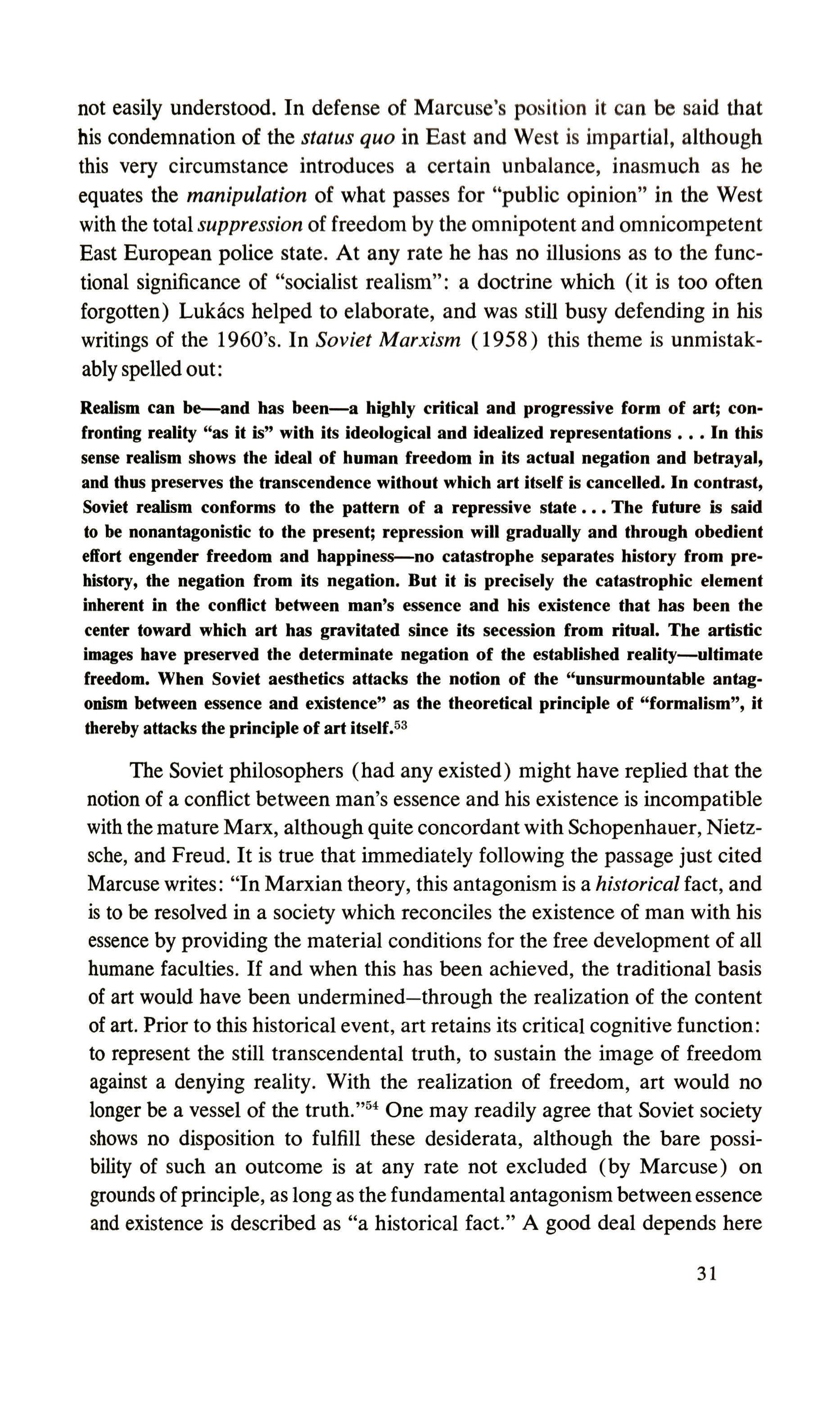
not easily understood. In defense of Marcuse's position it can be said that his condemnation of the status quo in East and West is impartial, although this very circumstance introduces a certain unbalance, inasmuch as he equates the manipulation of what passes for "public opinion" in the West with the total suppression of freedom by the omnipotent and omnicompetent East European police state. At any rate he has no illusions as to the functional significance of "socialist realism": a doctrine which (it is too often forgotten) Lukacs helped to elaborate, and was still busy defending in his writings of the 1960's. In Soviet Marxism (1958) this theme is unmistakablyspelled out:
Realism can be and has been a highly critical and progressive form of art; confronting reality "as it is" with its ideological and idealized representations In this sense realism shows the ideal of human freedom in its actual negation and betrayal, and thus preserves the transcendence without which art itself is cancelled. In contrast, Soviet realism conforms to the pattern of a repressive state The future is said to be nonantagonistic to the present; repression will gradually and through obedient effort engender freedom and happiness no catastrophe separates history from prehistory, the negation from its negation. But it is precisely the catastrophic element inherent in the conflict between man's essence and his existence that has been the center toward which art has gravitated since its secession from ritual. The al'listic images have preserved the determinate negation of the established reality ultimate freedom. When Soviet aesthetics attacks the notion of the "unsurmountable antagonism between essence and existence" as the theoretical principle of "formalism", it thereby attacks the principle of art itself.53
The Soviet philosophers (had any existed) might have replied that the notion of a conflict between man's essence and his existence is incompatible with the mature Marx, although quite concordant with Schopenhauer, Nietzsche, and Freud. It is true that immediately following the passage just cited Marcuse writes: "In Marxian theory, this antagonism is a historical fact, and is to be resolved in a society which reconciles the existence of man with his essence by providing the material conditions for the free development of all humane faculties. If and when this has been achieved, the traditional basis of art would have been undermined through the realization of the content of art. Prior to this historical event, art retains its critical cognitive function: to represent the still transcendental truth, to sustain the image of freedom against a denying reality. With the realization of freedom, art would no longer be a vessel of the truth. "54 One may readily agree that Soviet society shows no disposition to fulfill these desiderata, although the bare possibility of such an outcome is at any rate not excluded (by Marcuse) on grounds ofprinciple, as long as the fundamental antagonism between essence and existence is described as "a historical fact." A good deal depends here
31
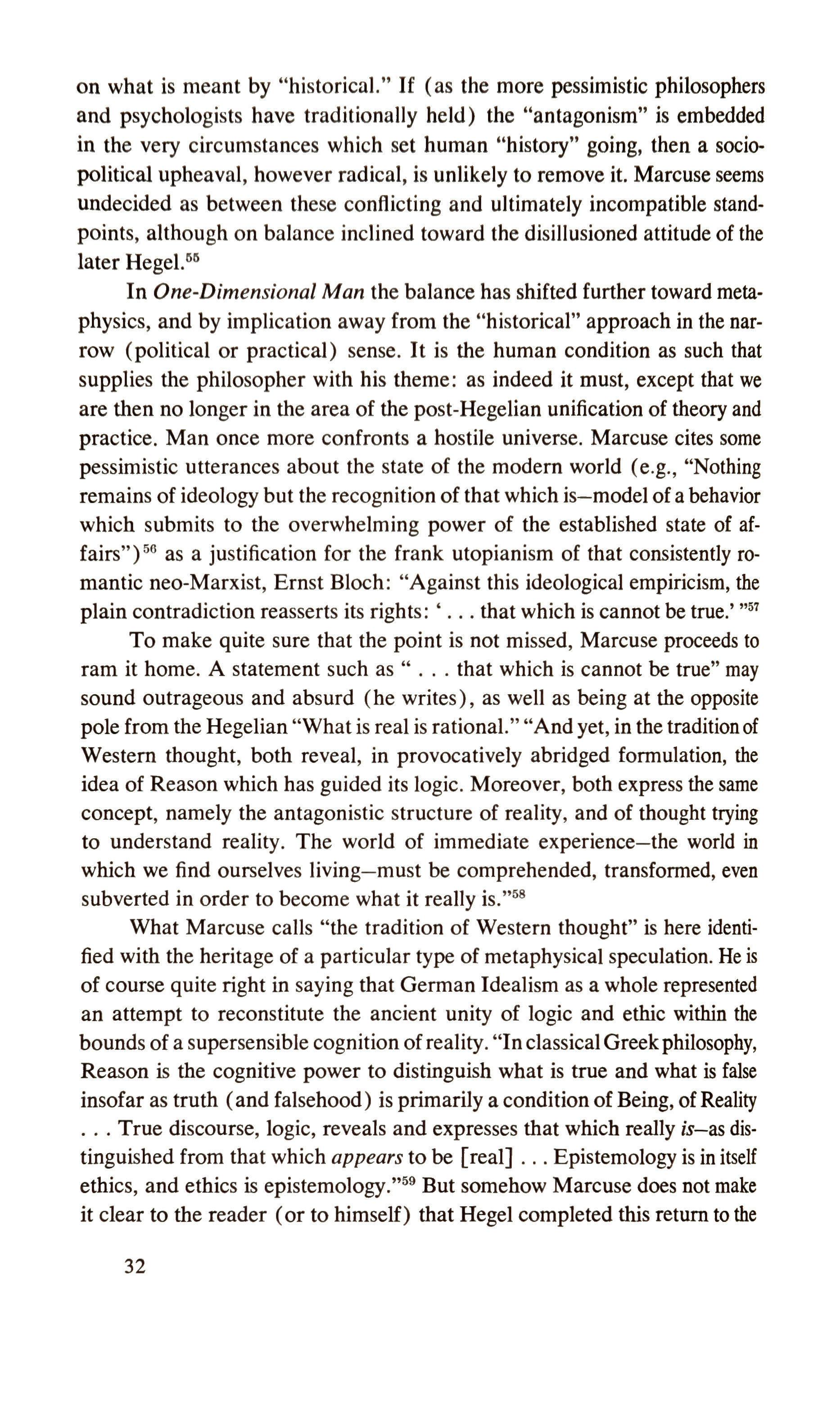
on what is meant by "historical." If (as the more pessimistic philosophers and psychologists have traditionally held) the "antagonism" is embedded in the very circumstances which set human "history" going, then a sociopolitical upheaval, however radical, is unlikely to remove it. Marcuse seems undecided as between these conflicting and ultimately incompatible standpoints, although on balance inclined toward the disillusioned attitude of the later Hegel."
In One-Dimensional Man the balance has shifted further toward metaphysics, and by implication away from the "historical" approach in the narrow (political or practical) sense. It is the human condition as such that supplies the philosopher with his theme: as indeed it must, except that we are then no longer in the area of the post-Hegelian unification of theory and practice. Man once more confronts a hostile universe. Marcuse cites some pessimistic utterances about the state of the modern world (e.g., "Nothing remains of ideology but the recognition of that which is model of a behavior which submits to the overwhelming power of the established state of affairs") 56 as a justification for the frank utopianism of that consistently romantic neo-Marxist, Ernst Bloch: "Against this ideological empiricism, the plain contradiction reasserts its rights: that which is cannot be true.' "57
To make quite sure that the point is not missed, Marcuse proceeds to ram it home. A statement such as that which is cannot be true" may sound outrageous and absurd (he writes), as well as being at the opposite pole from the Hegelian "What is real is rational. "And yet, in the tradition of Western thought, both reveal, in provocatively abridged formulation, the idea of Reason which has guided its logic. Moreover, both express the same concept, namely the antagonistic structure of reality, and of thought trying to understand reality. The world of immediate experience the world in which we find ourselves living must be comprehended, transformed, even subverted in order to become what it really is."58
What Marcuse calls "the tradition of Western thought" is here identified with the heritage of a particular type of metaphysical speculation. He is of course quite right in saying that Gel man Idealism as a whole represented an attempt to reconstitute the ancient unity of logic and ethic within the bounds of a supersensible cognition ofreality. "In classical Greekphilosophy, Reason is the cognitive power to distinguish what is true and what is false insofar as truth (and falsehood) is primarily a condition of Being, ofReality
True discourse, logic, reveals and expresses that which really is-as distinguished from that which appears to be [real] Epistemology is in itself ethics, and ethics is episremology.v'" But somehow Marcuse does not make it clear to the reader (or to himself) that Hegel completed this return to the
32
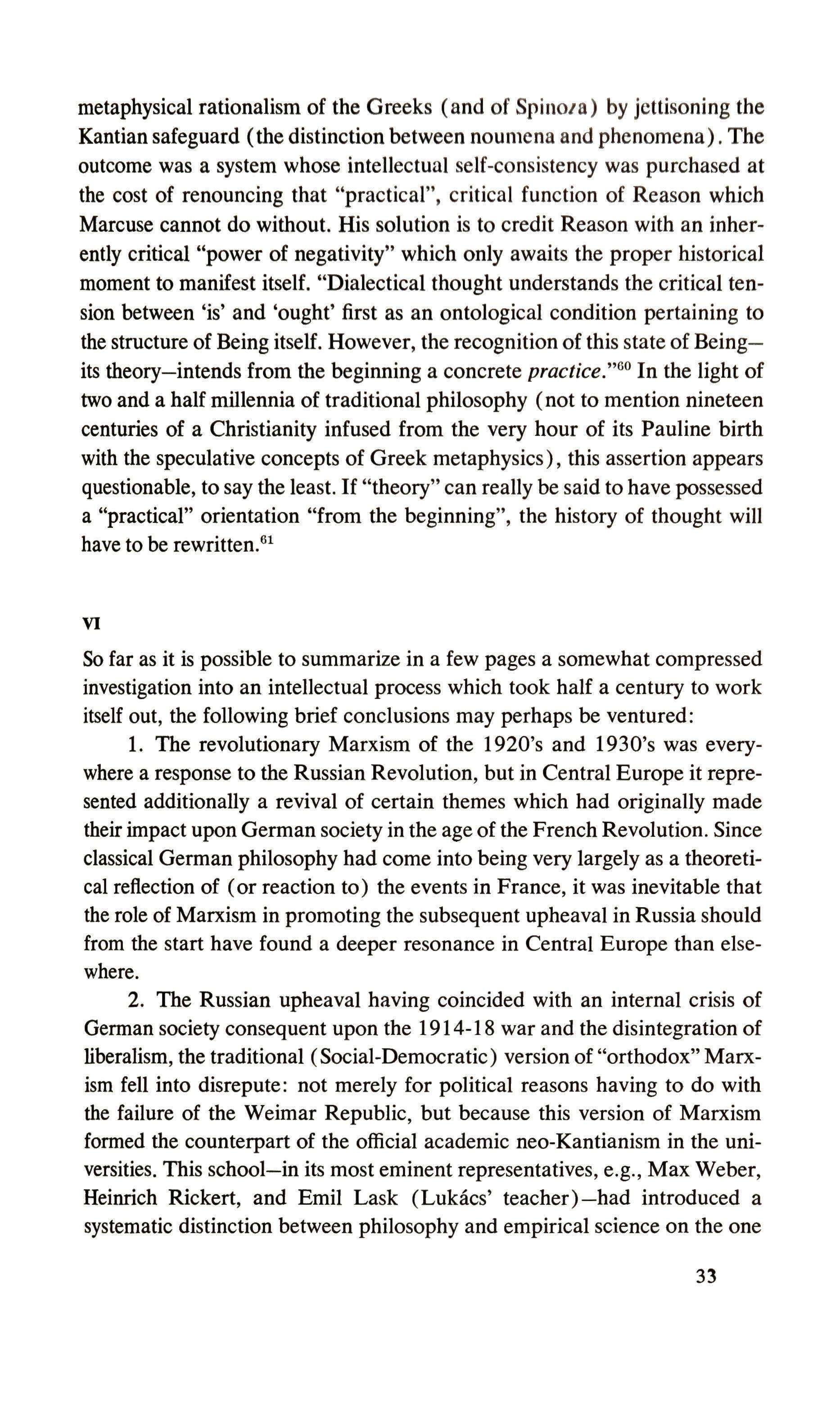
metaphysical rationalism of the Greeks (and of Spinoza) by jettisoning the Kantian safeguard (the distinction between noumena and phenomena). The outcome was a system whose intellectual self-consistency was purchased at the cost of renouncing that "practical", critical function of Reason which Marcuse cannot do without. His solution is to credit Reason with an inherently critical "power of negativity" which only awaits the proper historical moment to manifest itself. "Dialectical thought understands the critical tension between 'is' and 'ought' first as an ontological condition pertaining to the structure of Being itself. However, the recognition of this state of Beingits theory intends from the beginning a concrete practicer" In the light of two and a half millennia of traditional philosophy (not to mention nineteen centuries of a Christianity infused from the very hour of its Pauline birth with the speculative concepts of Greek metaphysics), this assertion appears questionable, to say the least. If "theory" can really be said to have possessed a "practical" orientation "from the beginning", the history of thought will have to be rewritten." VI
So far as it is possible to summarize in a few pages a somewhat compressed investigation into an intellectual process which took half a century to work itself out, the following brief conclusions may perhaps be ventured:
1. The revolutionary Marxism of the 1920's and 1930's was everywhere a response to the Russian Revolution, but in Central Europe it represented additionally a revival of certain themes which had originally made their impact upon German society in the age of the French Revolution. Since classical German philosophy had come into being very largely as a theoretical reflection of (or reaction to) the events in France, it was inevitable that the role of Marxism in promoting the subsequent upheaval in Russia should from the start have found a deeper resonance in Central Europe than elsewhere.
2. The Russian upheaval having coincided with an internal crisis of German society consequent upon the 1914-18 war and the disintegration of liberalism, the traditional (Social-Democratic) version of "orthodox" Marxism fell into disrepute: not merely for political reasons having to do with the failure of the Weimar Republic, but because this version of Marxism formed the counterpart of the official academic neo-Kantianism in the universities. This school in its most eminent representatives, e.g., Max Weber, Heinrich Rickert, and Emil Lask (Lukacs' teacher) had introduced a systematic distinction between philosophy and empirical science on the one
33
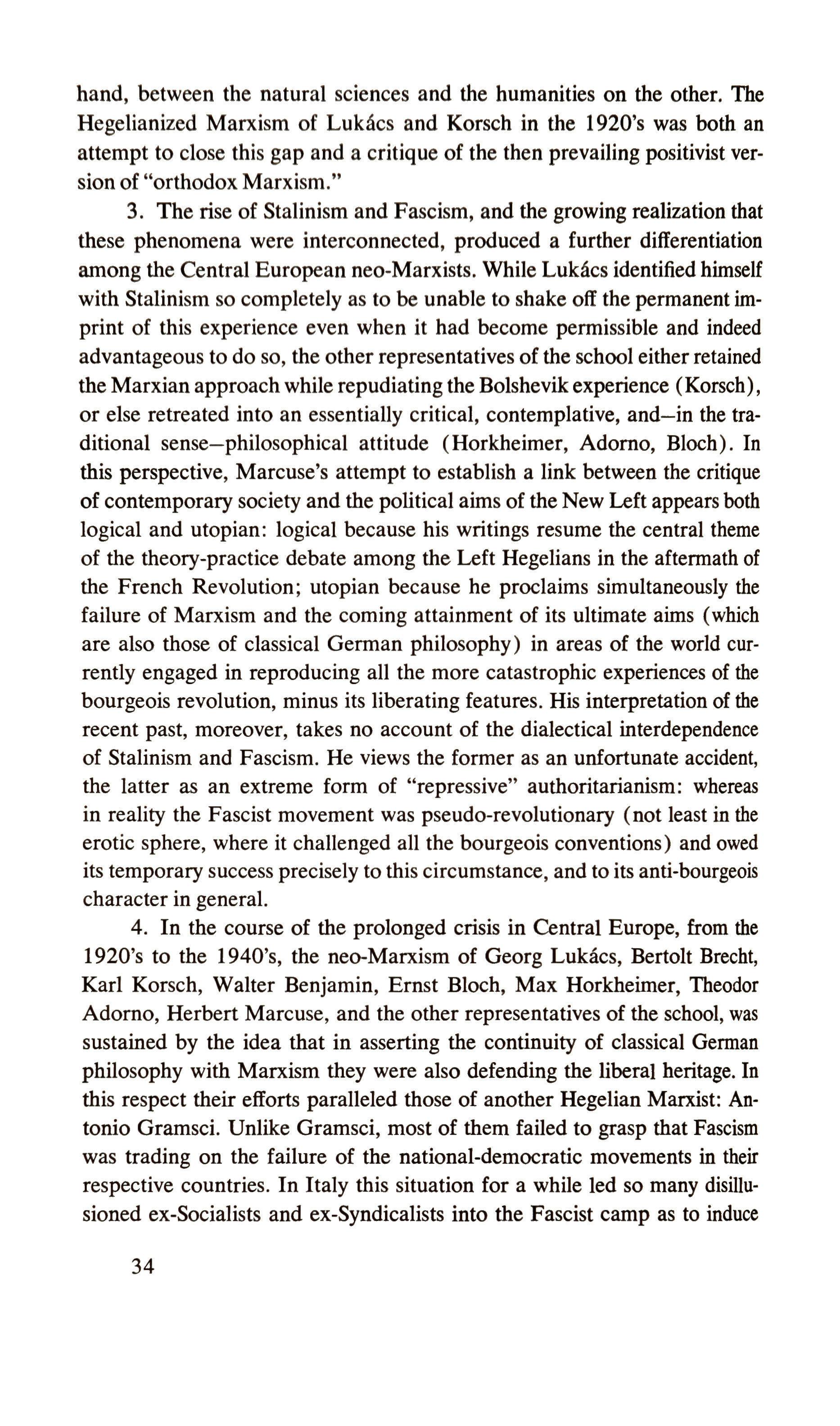
hand, between the natural sciences and the humanities on the other. The Hegelianized Marxism of Lukacs and Korsch in the 1920's was both an attempt to close this gap and a critique of the then prevailing positivist version of "orthodox Marxism."
3. The rise of Stalinism and Fascism, and the growing realization that these phenomena were interconnected, produced a further differentiation among the Central European neo-Marxists. While Lukacs identified himself with Stalinism so completely as to be unable to shake off the permanent imprint of this experience even when it had become permissible and indeed advantageous to do so, the other representatives of the school either retained the Marxian approach while repudiating the Bolshevik experience (Korsch), or else retreated into an essentially critical, contemplative, and in the traditional sense philosophical attitude (Horkheimer, Adorno, Bloch). In this perspective, Marcuse's attempt to establish a link between the critique of contemporary society and the political aims of the New Left appears both logical and utopian: logical because his writings resume the central theme of the theory-practice debate among the Left Hegelians in the aftermath of the French Revolution; utopian because he proclaims simultaneously the failure of Marxism and the coming attainment of its ultimate aims (which are also those of classical German philosophy) in areas of the world currently engaged in reproducing all the more catastrophic experiences of the bourgeois revolution, minus its liberating features. His interpretation of the recent past, moreover, takes no account of the dialectical interdependence of Stalinism and Fascism. He views the former as an unfortunate accident, the latter as an extreme form of "repressive" authoritarianism: whereas in reality the Fascist movement was pseudo-revolutionary (not least in the erotic sphere, where it challenged all the bourgeois conventions) and owed its temporary success precisely to this circumstance, and to its anti-bourgeois character in general.
4. In the course of the prolonged crisis in Central Europe, from the 1920's to the 1940's, the neo-Marxism of Georg Lukacs, Bertolt Brecht, Karl Korsch, Walter Benjamin, Ernst Bloch, Max Horkheimer, Theodor Adorno, Herbert Marcuse, and the other representatives of the school, was sustained by the idea that in asserting the continuity of classical German philosophy with Marxism they were also defending the liberal heritage. In this respect their efforts paralleled those of another Hegelian Marxist: Antonio Gramsci. Unlike Gramsci, most of them failed to grasp that Fascism was trading on the failure of the national-democratic movements in their respective countries. In Italy this situation for a while led so many disillusioned ex-Socialists and ex-Syndicalists into the Fascist camp as to induce
34
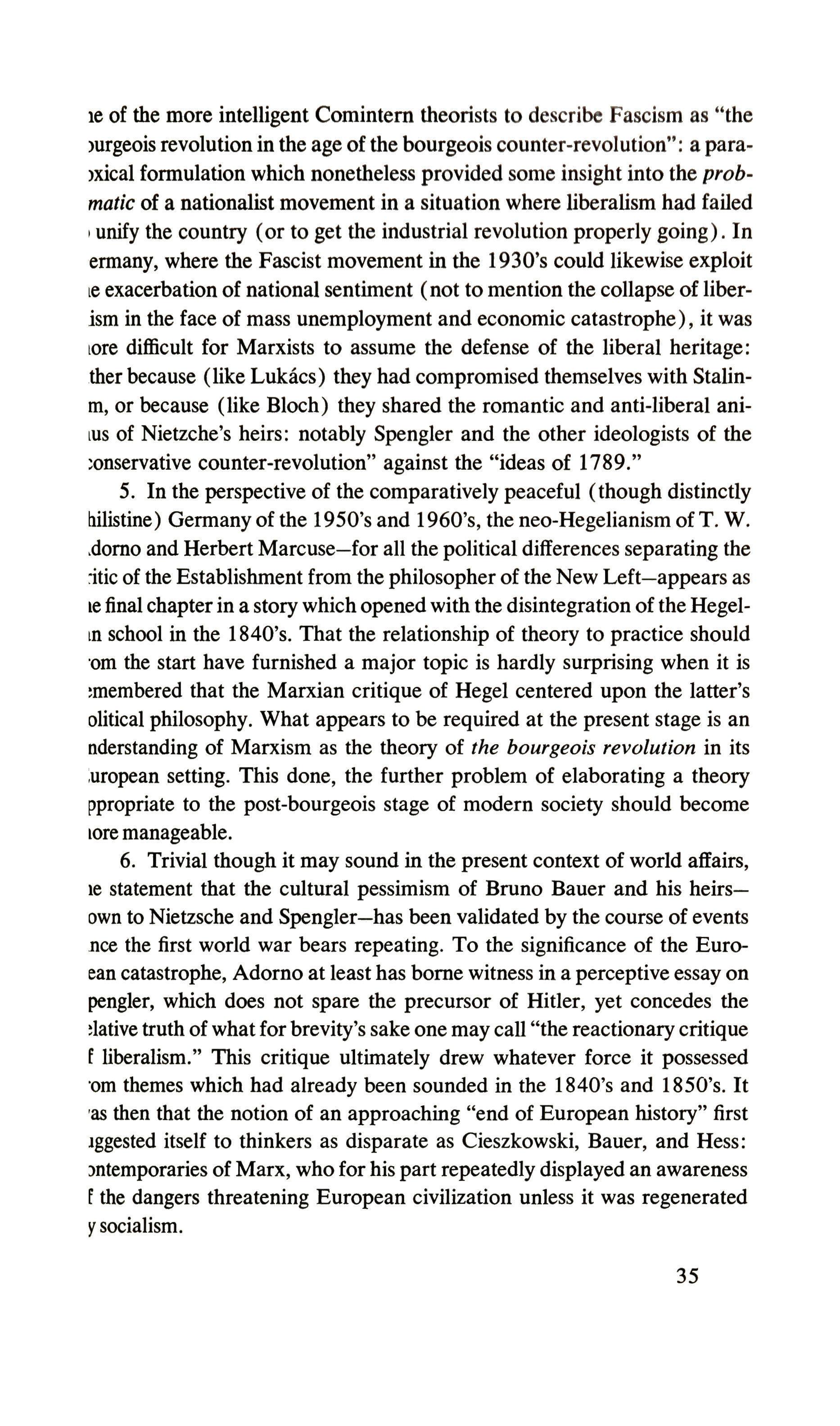
ie of the more intelligent Comintem theorists to describe Fascism as "the nirgeois revolution in the age of the bourgeois counter-revolution": a paranical formulation which nonetheless provided some insight into the probmalic of a nationalist movement in a situation where liberalism had failed I unify the country (or to get the industrial revolution properly going). In ermany, where the Fascist movement in the 1930's could likewise exploit le exacerbation of national sentiment (not to mention the collapse of liberism in the face of mass unemployment and economic catastrophe), it was lore difficult for Marxists to assume the defense of the liberal heritage: ther because (like Lukacs) they had compromised themselves with Stalinm, or because (like Bloch) they shared the romantic and anti-liberal anilUS of Nietzche's heirs: notably Spengler and the other ideologists of the ionservative counter-revolution" against the "ideas of 1789."
5. In the perspective of the comparatively peaceful (though distinctly hilistine) Germany of the 1950's and 1960's, the neo-Hegelianism of T. W domo and Herbert Marcuse for all the political differences separating the ritic of the Establishment from the philosopher of the New Left appears as Ie final chapter in a story which opened with the disintegration of the Hegelm school in the 1840's. That the relationship of theory to practice should 'om the start have furnished a major topic is hardly surprising when it is imembered that the Marxian critique of Hegel centered upon the latter's olitical philosophy. What appears to be required at the present stage is an nderstanding of Marxism as the theory of the bourgeois revolution in its uropean setting. This done, the further problem of elaborating a theory ppropriate to the post-bourgeois stage of modern society should become lore manageable.
6. Trivial though it may sound in the present context of world affairs, ie statement that the cultural pessimism of Bruno Bauer and his heirsown to Nietzsche and Spengler has been validated by the course of events nee the first world war bears repeating. To the significance of the Euroean catastrophe, Adorno at least has borne witness in a perceptive essay on pengler, which does not spare the precursor of Hitler, yet concedes the elative truth of what for brevity'S sake one may call "the reactionarycritique f liberalism." This critique ultimately drew whatever force it possessed 'om themes which had already been sounded in the 1840's and 1850's. It 'as then that the notion of an approaching "end of European history" first iggested itself to thinkers as disparate as Cieszkowski, Bauer, and Hess: ontemporaries of Marx, who for his part repeatedly displayed an awareness f the dangers threatening European civilization unless it was regenerated y socialism.
35
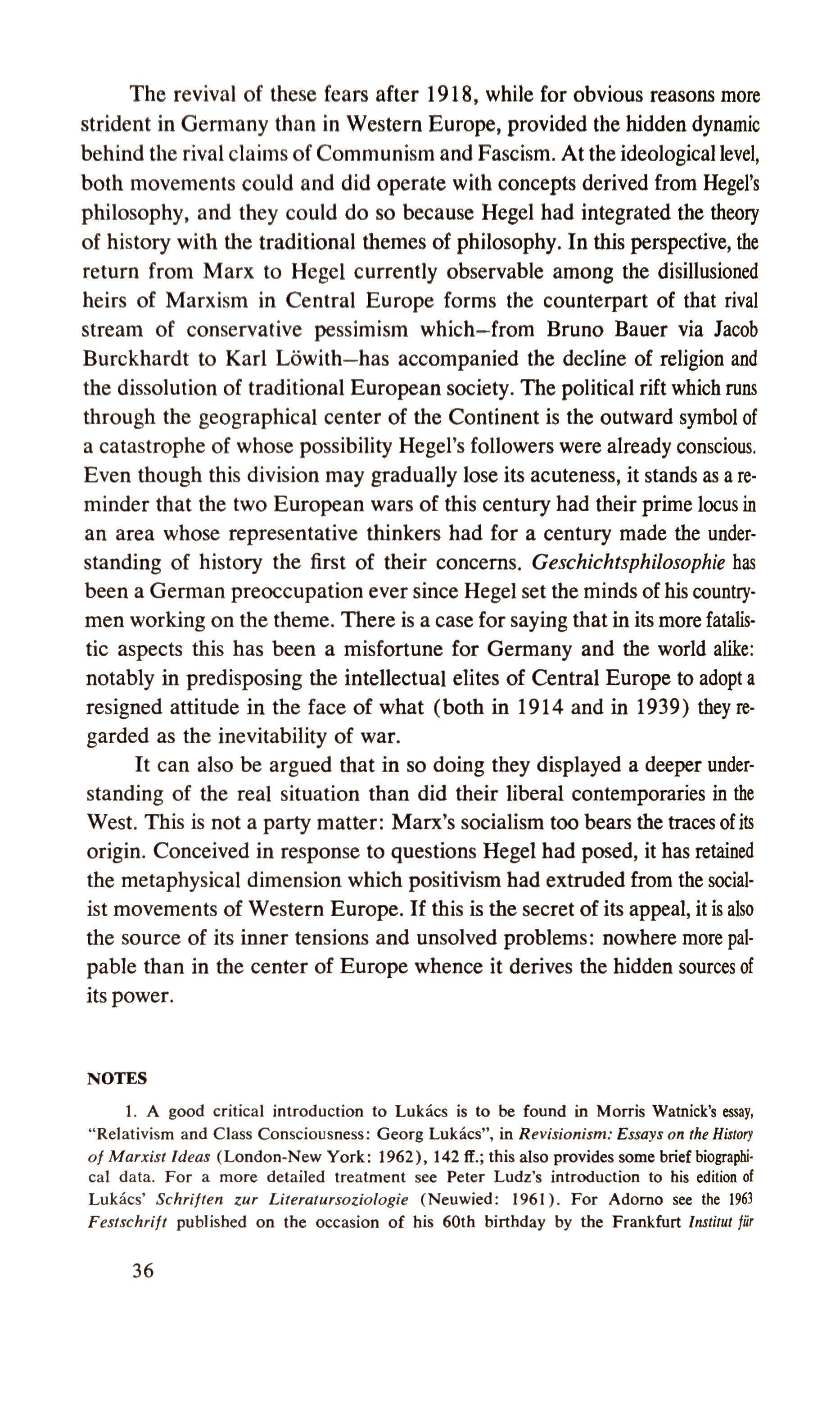
The revival of these fears after 1918, while for obvious reasons more strident in Germany than in Western Europe, provided the hidden dynamic behind the rival claims of Communism and Fascism. At the ideological level, both movements could and did operate with concepts derived from Hegel's philosophy, and they could do so because Hegel had integrated the theory of history with the traditional themes of philosophy. In this perspective, the return from Marx to Hegel currently observable among the disillusioned heirs of Marxism in Central Europe forms the counterpart of that rival stream of conservative pessimism which from Bruno Bauer via Jacob Burckhardt to Karl Lowith has accompanied the decline of religion and the dissolution of traditional European society. The political rift which runs through the geographical center of the Continent is the outward symbol of a catastrophe of whose possibility Hegel's followers were already conscious. Even though this division may gradually lose its acuteness, it stands as a reminder that the two European wars of this century had their prime locus in an area whose representative thinkers had for a century made the understanding of history the first of their concerns. Geschichtsphilosophie has been a German preoccupation ever since Hegel set the minds of his countrymen working on the theme. There is a case for saying that in its more fatalistic aspects this has been a misfortune for Germany and the world alike: notably in predisposing the intellectual elites of Central Europe to adopt a resigned attitude in the face of what (both in 1914 and in 1939) tbeyregarded as the inevitability of war.
It can also be argued that in so doing they displayed a deeper understanding of the real situation than did their liberal contemporaries in the West. This is not a party matter: Marx's socialism too bears the traces ofits origin. Conceived in response to questions Hegel had posed, it has retained the metaphysical dimension which positivism had extruded from the socialist movements of Western Europe. If this is the secret of its appeal, it is also the source of its inner tensions and unsolved problems: nowhere more palpable than in the center of Europe whence it derives the hidden sources of its power.
NOTES
1. A good critical introduction to Lukacs is to be found in Morris Warnick's essay, "Relativism and Class Consciousness: Georg Lukacs", in Revisionism: Essays on the History of Marxist Ideas (London-New York: 1962),142 ff.; this also provides some brief biographical data. For a more detailed treatment see Peter Ludz's introduction to his edition of Lukacs' Schriften zur Literatursoziologie (Neuwied: 1961). For Adorno see the 1963 Festschrift published on the occasion of his 60th birthday by the Frankfurt lnstinu lur
36
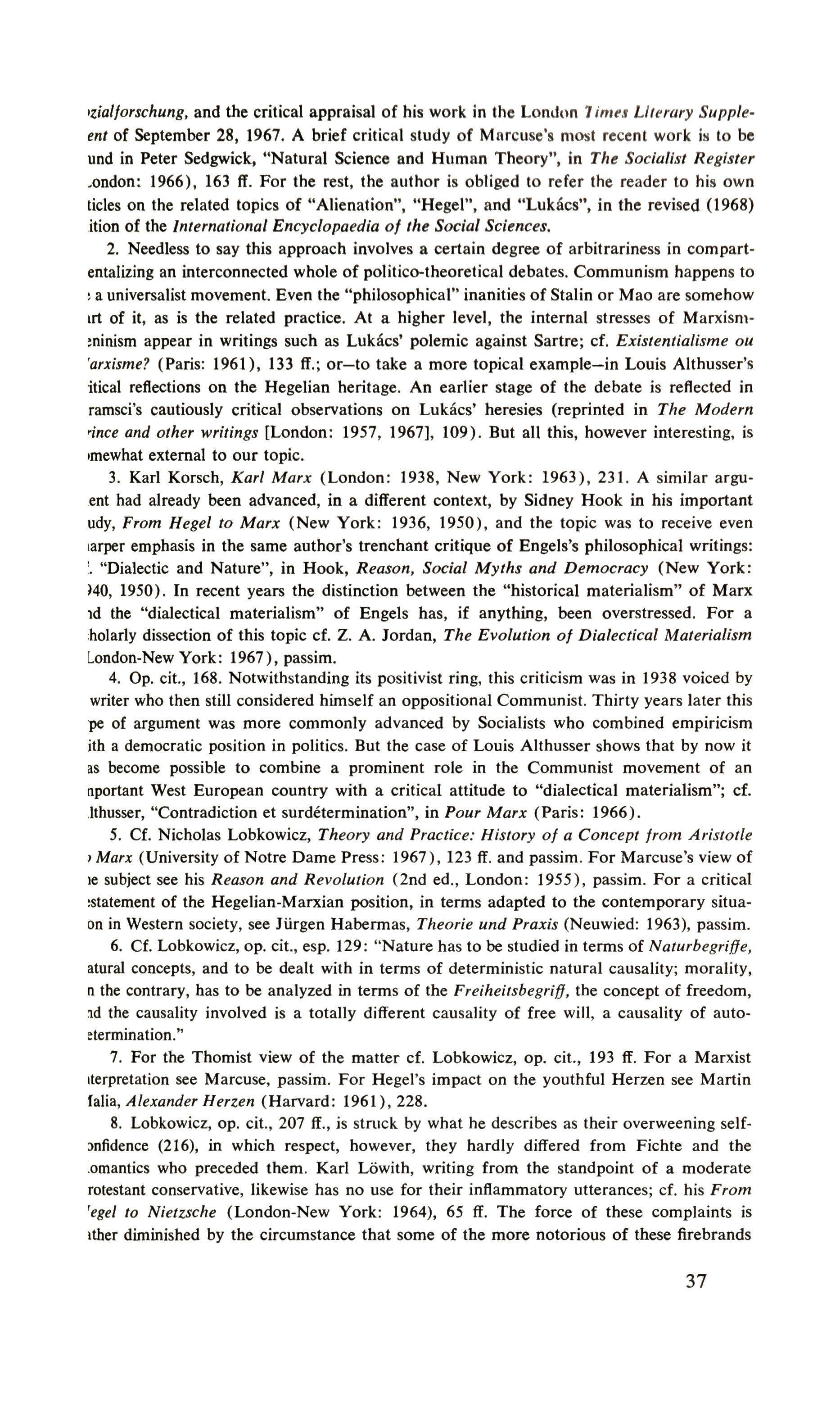
szialjorschung, and the critical appraisal of his work in the London 7 imes Literary Suppleent of September 28, 1967. A brief critical study of Marcuse's most recent work is to be und in Peter Sedgwick, "Natural Science and Human Theory", in The Socialist Register .ondon: 1966), 163 ff. For the rest, the author is obliged to refer the reader to his own ticles on the related topics of "Alienation", "Hegel", and "Lukacs", in the revised (1968) lition of the International Encyclopaedia 01 the Social Sciences.
2. Needless to say this approach involves a certain degree of arbitrariness in compartentalizing an interconnected whole of politico-theoretical debates. Communism happens to : a universalist movement. Even the "philosophical" inanities of Stalin or Mao are somehow irt of it, as is the related practice. At a higher level, the internal stresses of Marxismeninism appear in writings such as Lukacs' polemic against Sartre; cf. Existentiallsme ou 'arxisme? (Paris: 1961), 133 ff.; or-to take a more topical example-in Louis Althusser's itical reflections on the Hegelian heritage. An earlier stage of the debate is reflected in ramsci's cautiously critical observations on Lukacs' heresies (reprinted in The Modern since and other writings [London: 1957, 1967], 109). But all this, however interesting, is unewhat external to our topic.
3. Karl Korsch, Karl Marx (London: 1938, New York: 1963),231. A similar arguent had already been advanced, in a different context, by Sidney Hook in his important udy, From Hegel to Marx (New York: 1936, 1950), and the topic was to receive even iarper emphasis in the same author's trenchant critique of Engels's philosophical writings: '. "Dialectic and Nature", in Hook, Reason, Social Myths and Democracy (New York: �40, 1950). In recent years the distinction between the "historical materialism" of Marx id the "dialectical materialism" of Engels has, if anything, been overstressed. For a :holarly dissection of this topic cf. Z. A. Jordan, The Evolution of Dialectical Materialism London-New York: 1967), passim.
4. Op. cit., 168. Notwithstanding its positivist ring, this criticism was in 1938 voiced by writer who then still considered himself an oppositional Communist. Thirty years later this pe of argument was more commonly advanced by Socialists who combined empiricism ith a democratic position in politics. But the case of Louis Althusser shows that by now it as become possible to combine a prominent role in the Communist movement of an nportant West European country with a critical attitude to "dialectical materialism"; cf. .lthusser, "Contradiction et surdetermination", in Pour Marx (Paris: 1966).
5. Cf. Nicholas Lobkowicz, Theory and Practice: History of a Concept from Aristotle ) Marx (University of Notre Dame Press: 1967),123 ff. and passim. For Marcuse's view of ie subject see his Reason and Revolution (2nd ed., London: 1955), passim. For a critical statement of the Hegelian-Marxian position, in terms adapted to the contemporary situaon in Western society, see Jtirgen Habermas, Theorie und Praxis (Neuwied: 1963), passim.
6. Cf. Lobkowicz, op. cit., esp. 129: "Nature has to be studied in terms of Naturbegriffe, atural concepts, and to be dealt with in terms of deterministic natural causality; morality, n the contrary, has to be analyzed in terms of the Freiheitsbegriff, the concept of freedom, nd the causality involved is a totally different causality of free will, a causality of autoetermination.
7. For the Thomist view of the matter cf. Lobkowicz, op. cit., 193 ff. For a Marxist iterpretation see Marcuse, passim. For Hegel's impact on the youthful Herzen see Martin Ialia, Alexander Herzen (Harvard: 1961),228.
8. Lobkowicz, op. cit., 207 ff., is struck by what he describes as their overweening selfonfidence (216), in which respect, however, they hardly differed from Fichte and the .omantics who preceded them. Karl Lowith, writing from the standpoint of a moderate rotestant conservative, likewise has no use for their inflammatory utterances; cf. his From 'ezel to Nietzsche (London-New York: 1964), 65 ff. The force of these complaints is ither diminished by the circumstance that some of the more notorious of these firebrands
37
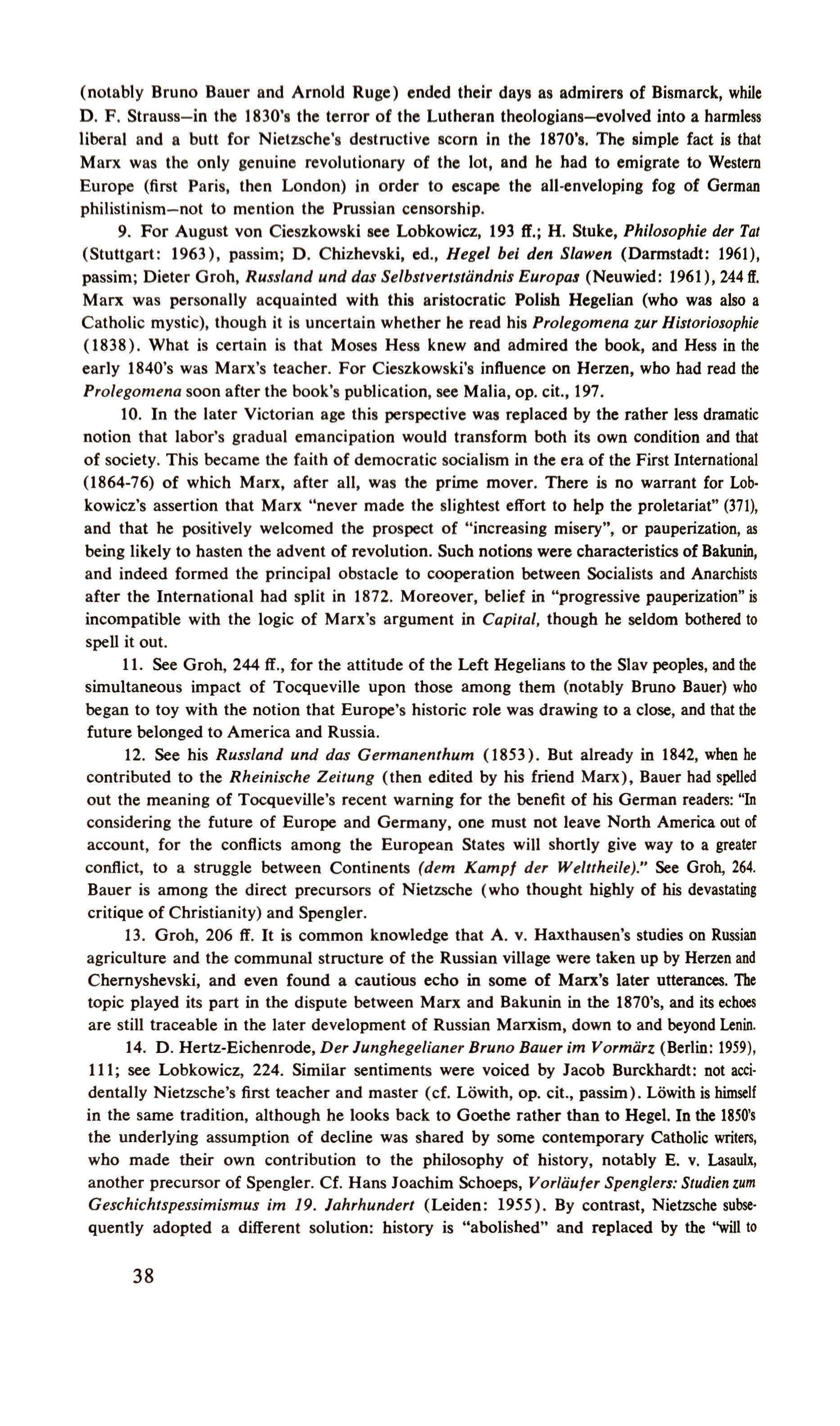
(notably Bruno Bauer and Arnold Ruge) ended their days as admirers of Bismarck, while D. F. Strauss-in the 1830's the terror of the Lutheran theologians evolved into a harmless liberal and a butt for Nietzsche's destructive scorn in the 1870's. The simple fact is that Marx was the only genuine revolutionary of the lot, and he had to emigrate to Western Europe (first Paris, then London) in order to escape the all-enveloping fog of German philistinism-not to mention the Prussian censorship.
9. For August von Cieszkowski see Lobkowicz, 193 fl.; H. Stuke, Phllosophie der Tat (Stuttgart: 1963), passim; D. Chizhevski, ed., Hegel bel den Slawen (Darmstadt: 1961), passim; Dieter Groh, Russ/and und das Selbstvertstdndnls Europa, (Neuwied: 1961), 244 fl. Marx was personally acquainted with this aristocratic Polish Hegelian (who was also a Catholic mystic), though it is uncertain whether he read his Prolegomena zur Hlstorlosophie (1838). What is certain is that Moses Hess knew and admired the book, and Hess in the early 1840's was Marx's teacher. For Cieszkowski's influence on Herzen, who had read the Prolegomena soon after the book's publication, see Malia, op. cit., 197.
10. In the later Victorian age this perspective was replaced by the rather less dramatic notion that labor's gradual emancipation would transform both its own condition and that of society. This became the faith of democratic socialism in the era of the First International (1864-76) of which Marx, after all, was the prime mover. There is no warrant for Lobkowicz's assertion that Marx "never made the slightest effort to help the proletariat" (371), and that he positively welcomed the prospect of "increasing misery", or pauperization, as being likely to hasten the advent of revolution. Such notions were characteristics of Bakunia, and indeed formed the principal obstacle to cooperation between Socialists and Anarchists after the International had split in 1872. Moreover, belief in "progressive pauperization" is incompatible with the logic of Marx's argument in Capital, though he seldom bothered to spell it out.
11. See Groh, 244 If., for the attitude of the Left Hegelians to the Slav peoples, and the simultaneous impact of Tocqueville upon those among them (notably Bruno Bauer) who began to toy with the notion that Europe's historic role was drawing to a close, and that the future belonged to America and Russia.
12. See his Russ/and und das Germanenthum (1853). But already in 1842, when he contributed to the Rheinische Zeitung (then edited by his friend Marx), Bauer had spelled out the meaning of Tocqueville's recent warning for the benefit of his German readers: ''In considering the future of Europe and Germany, one must not leave North America out of account, for the conflicts among the European States will shortly give way to a greater conflict, to a struggle between Continents (dem Kampf der Welttheile}" See Groh, 264. Bauer is among the direct precursors of Nietzsche (who thought highly of his devastating critique of Christianity) and Spengler.
13. Groh, 206 If. It is common knowledge that A. v. Haxthausen's studies on Russian agriculture and the communal structure of the Russian village were taken up by Herzen and Chernyshevski, and even found a cautious echo in some of Marx's later utterances. The topic played its part in the dispute between Marx and Bakunin in the 1870's, and its echoes are still traceable in the later development of Russian Marxism, down to and beyond Lenin.
14. D. Hertz-Eichenrode, Der lunghege/ianer Bruno Bauer im Vormdrz (Berlin: 1959), 111; see Lobkowicz, 224. Similar sentiments were voiced by Jacob Burckhardt: not accidentally Nietzsche's first teacher and master (cf. Lowith, op, cit., passim). Lowith is himself in the same tradition, although he looks back to Goethe rather than to Hegel. In the 1850's the underlying assumption of decline was shared by some contemporary Catholic writers, who made their own contribution to the philosophy of history, notably E. v. Lasaulx, another precursor of Spengler. Cf. Hans Joachim Schoeps, Vorliiujer Spenglers: Studien zum Geschichtspessimismus im 19. Iahrhundert (Leiden: 1955). By contrast, Nietzsche subse· quently adopted a different solution: history is "abolished" and replaced by the ''will to
38
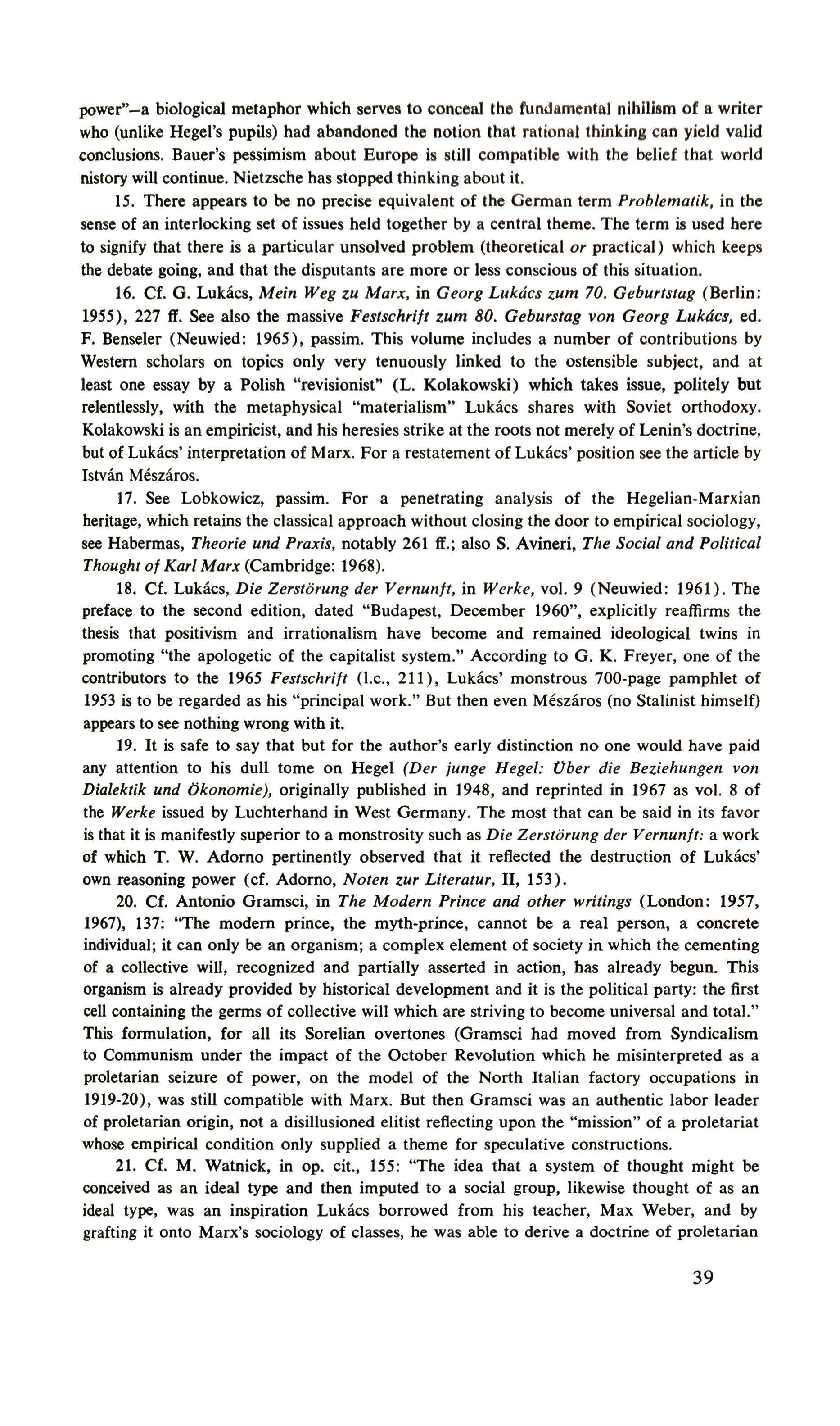
power"-a biological metaphor which serves to conceal the fundamental nihilism of a writer who (unlike Hegel's pupils) had abandoned the notion that rational thinking can yield valid conclusions. Bauer's pessimism about Europe is still compatible with the belief that world nistory will continue. Nietzsche has stopped thinking about it.
15. There appears to be no precise equivalent of the German term Problematik, in the sense of an interlocking set of issues held together by a central theme. The term is used here to signify that there is a particular unsolved problem (theoretical or practical) which keeps the debate going, and that the disputants are more or less conscious of this situation.
16. Cf. G. Lukacs, Mein Weg zu Marx, in Georg Lukacs zum 70. Geburtstag (Berlin: 1955), 227 fl. See also the massive Festschrift zum 80. Geburstag von Georg Lukacs, ed. F. Benseler (Neuwied: 1965), passim. This volume includes a number of contributions by Western scholars on topics only very tenuously linked to the ostensible subject, and at least one essay by a Polish "revisionist" (L. Kolakowski) which takes issue, politely but relentlessly, with the metaphysical "materialism" Lukacs shares with Soviet orthodoxy. Kolakowski is an empiricist, and his heresies strike at the roots not merely of Lenin's doctrine, but of Lukacs' interpretation of Marx. For a restatement of Lukacs' position see the article by Istvan Meszaros.
17. See Lobkowicz, passim. For a penetrating analysis of the Hegelian-Marxian heritage, which retains the classical approach without closing the door to empirical sociology, see Habermas, Theorie und Praxis, notably 261 ff.; also S. Avineri, The Social and Political Thought of Karl Marx (Cambridge: 1968).
18. Cf. Lukacs, Die Zerstorung der Vernunjt, in Werke, vol. 9 (Neuwied: 1961). The preface to the second edition, dated "Budapest, December 1960", explicitly reaffirms the thesis that positivism and irrationalism have become and remained ideological twins in promoting "the apologetic of the capitalist system." According to G. K. Freyer, one of the contributors to the 1965 Festschrift (I.e., 211), Lukacs' monstrous 700-page pamphlet of 1953 is to be regarded as his "principal work." But then even Meszaros (no Stalinist himself) appears to see nothing wrong with it.
19. It is safe to say that but for the author's early distinction no one would have paid any attention to his dull tome on Hegel (Der junge Hegel: Uber die Beziehungen von Dialektik und Okonomie], originally published in 1948, and reprinted in 1967 as vol. 8 of the Werke issued by Luchterhand in West Germany. The most that can be said in its favor is that it is manifestly superior to a monstrosity such as Die Zerstorung der Vernunjt: a work of which T. W. Adorno pertinently observed that it reflected the destruction of Lukacs' own reasoning power (cf. Adorno, Noten zur Literatur, II, 153).
20. Cf. Antonio Gramsci, in The Modern Prince and other writings (London: 1957, 1967), 137: ''The modem prince, the myth-prince, cannot be a real person, a concrete individual; it can only be an organism; a complex element of society in which the cementing of a collective will, recognized and partially asserted in action, has already begun. This organism is already provided by historical development and it is the political party: the first cell containing the germs of collective will which are striving to become universal and total." This formulation, for all its Sorelian overtones (Gramsci had moved from Syndicalism to Communism under the impact of the October Revolution which he misinterpreted as a proletarian seizure of power, on the model of the North Italian factory occupations in 1919-20), was still compatible with Marx. But then Gramsci was an authentic labor leader of proletarian origin, not a disillusioned elitist reflecting upon the "mission" of a proletariat whose empirical condition only supplied a theme for speculative constructions.
21. Cf. M. Watnick, in op. cit., 155: "The idea that a system of thought might be conceived as an ideal type and then imputed to a social group, likewise thought of as an ideal type, was an inspiration Lukacs borrowed from his teacher, Max Weber, and by grafting it onto Marx's sociology of classes, he was able to derive a doctrine of proletarian
39
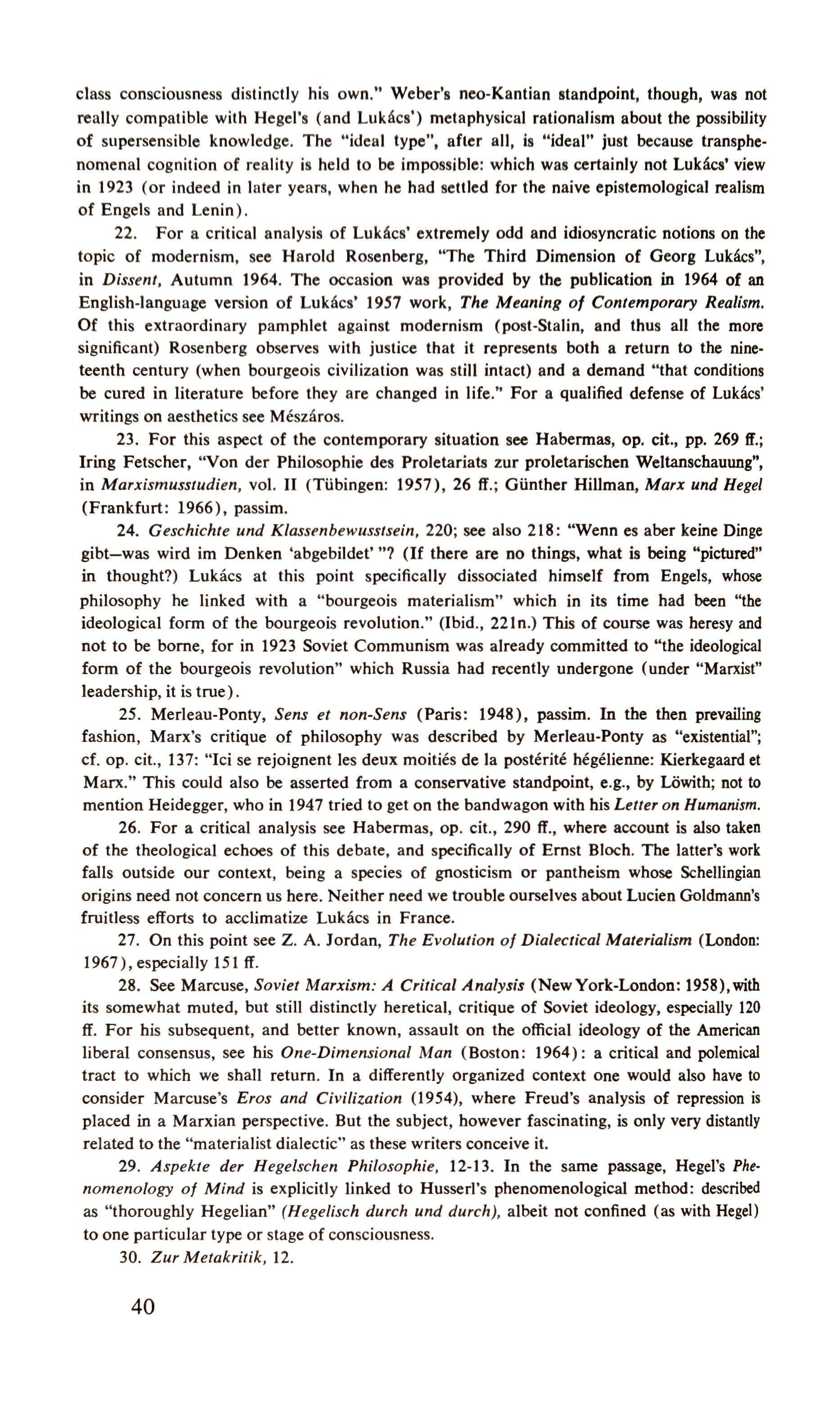
class consciousness distinctly his own." Weber's neo-Kantian standpoint, though, was not really compatible with Hegel's (and Lukacs') metaphysical rationalism about the possibility of supersensible knowledge. The "ideal type", after all, is "ideal" just because transphenomenal cognition of reality is held to be impossible: which was certainly not Lukacs' view in 1923 (or indeed in later years, when he had settled for the naive epistemological realism of Engels and Lenin).
22. For a critical analysis of Lukacs' extremely odd and idiosyncratic notions on the topic of modernism, see Harold Rosenberg, "The Third Dimension of Georg Lukacs", in Dissent, Autumn 1964. The occasion was provided by the publication in 1964 of an English-language version of Lukacs' 1957 work, The Meaning 01 Contemporary Realism. Of this extraordinary pamphlet against modernism (post-Stalin, and thus all the more significant) Rosenberg observes with justice that it represents both a return to the nineteenth century (when bourgeois civilization was still intact) and a demand "that conditions be cured in literature before they are changed in life." For a qualified defense of Lukacs' writings on aesthetics see Meszaros.
23. For this aspect of the contemporary situation see Habermas, op. cit., pp. 269 If.; Iring Fetscher, "Von der Philosophie des Proletariats zur proletarischen Weltanschauung", in Marxismusstudien, vol. II (Tubingen: 1957), 26 If.; Gunther HiUman, Marx und Hegel (Frankfurt: 1966), passim.
24. Geschichte und Klassenbewusstsein, 220; see also 218: "Wenn es aber keine Dinge gibt-was wird im Denken 'abgebildet' "'} (If there are no things, what is being "pictured" in thought?) Lukacs at this point specifically dissociated himself from Engels, whose philosophy he linked with a "bourgeois materialism" which in its time had been "the ideological form of the bourgeois revolution." (Ibid., 221n.) This of course was heresy and not to be borne, for in 1923 Soviet Communism was already committed to "the ideological fOI'III of the bourgeois revolution" which Russia had recently undergone (under "Marxist" leadership, it is true).
25. Merleau-Ponty, Sens et non-Sens (Paris: 1948), passim. In the then prevailing fashion, Marx's critique of philosophy was described by Merleau-Ponty as "existential"; cf. op. cit., 137: "Ici se rejoignent les deux moities de la posterite hegelienne: Kierkegaard et Marx." This could also be asserted from a conservative standpoint, e.g., by LOwith; not to mention Heidegger, who in 1947 tried to get on the bandwagon with his Letter on Humanism.
26. For a critical analysis see Habermas, op. cit., 290 ff., where account is also taken of the theological echoes of this debate, and specifically of Ernst Bloch. The latter's work falls outside our context, being a species of gnosticism or pantheism whose Schellingian origins need not concern us here. Neither need we trouble ourselves about Lucien Goldmann's fruitless efforts to acclimatize Lukacs in France.
27. On this point see Z. A. Jordan, The Evolution 01 Dialectical Materialism (London: 1967), especially 151 If.
28. See Marcuse, Soviet Marxism: A Critical Analysis (New York-London: 1958), with its somewhat muted, but still distinctly heretical, critique of Soviet ideology, especially 120 If. For his subsequent, and better known, assault on the official ideology of the American liberal consensus, see his One-Dimensional Man (Boston: 1964): a critical and polemical tract to which we shall return. In a differently organized context one would also have to consider Marcuse's Eros and Civilization (1954), where Freud's analysis of repression is placed in a Marxian perspective. But the subject, however fascinating, is only very distantly related to the "materialist dialectic" as these writers conceive it.
29. Aspekte der Hegelschen Philosophie, 12-J3. In the same passage, Hegel's Phenomenology of Mind is explicitly linked to Husserl's phenomenological method: described as "thoroughly Hegelian" (Hegelisch durch und durch], albeit not confined (as with Hegel) to one particular type or stage of consciousness.
30. Zur Metakritik, 12.
40
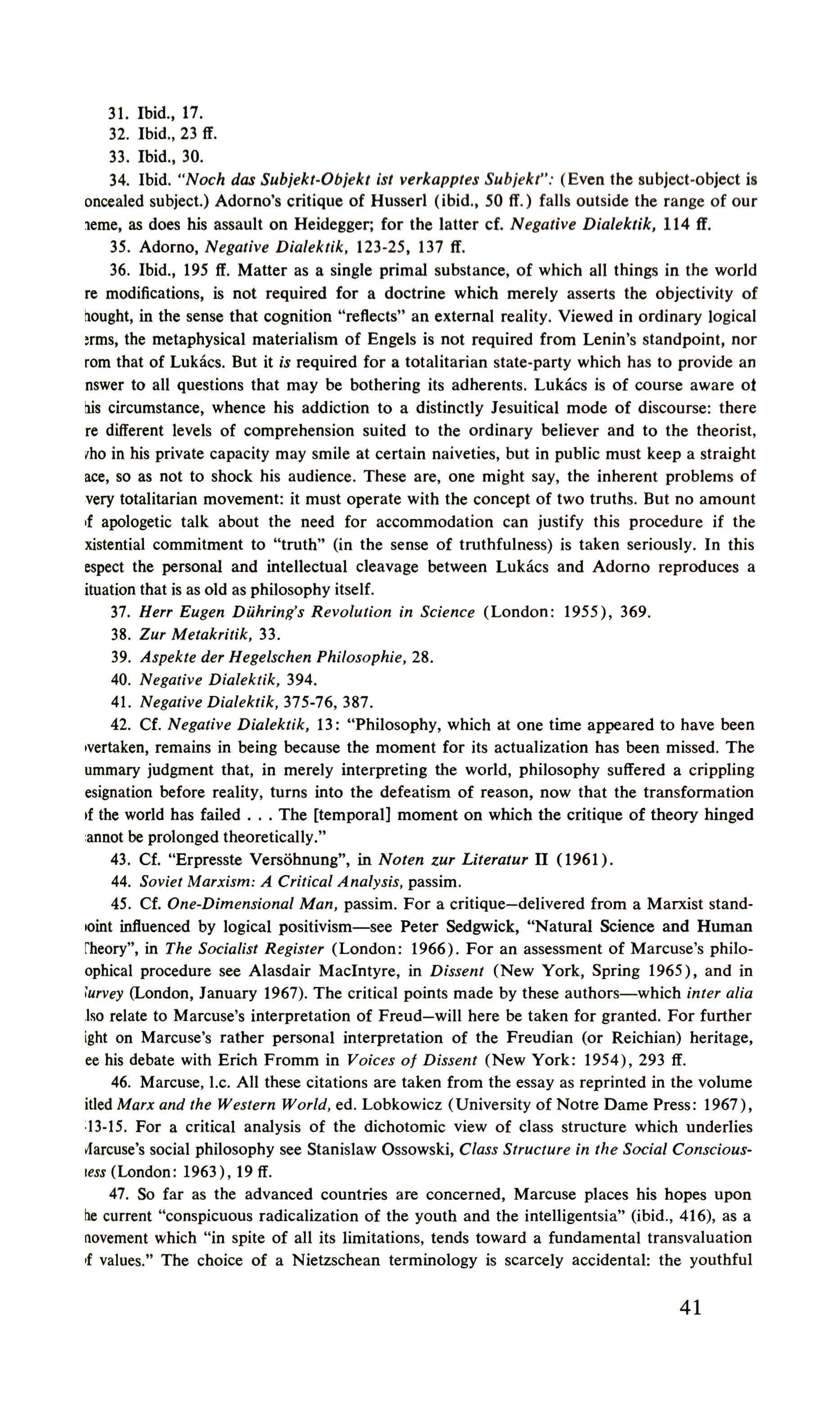
31. Ibid., 17.
32. Ibid., 23 if.
33. Ibid., 30.
34. Ibid. "Noch das Subiekt-Objekt ist verkapptes Subjekt": (Even the subject-object is oncealed subject.) Adorno's critique of Husserl (ibid., 50 if.) falls outside the range of our aeme, as does his assault on Heidegger; for the latter cf. Negative Dialektik, 114 if.
35. Adorno, Negative Dialektik, 123-25, 137 if.
36. Ibid., 195 if. Matter as a single primal substance, of which all things in the world re modifications, is not required for a doctrine which merely asserts the objectivity of bought, in the sense that cognition "reflects" an external reality. Viewed in ordinary logical erms, the metaphysical materialism of Engels is not required from Lenin's standpoint, nor rom that of Lukacs. But it is required for a totalitarian state-party which has to provide an nswer to all questions that may be bothering its adherents. Lukacs is of course aware ot Ills circumstance, whence his addiction to a distinctly Jesuitical mode of discourse: there re different levels of comprehension suited to the ordinary believer and to the theorist, rho in his private capacity may smile at certain naiveties, but in public must keep a straight ace, so as not to shock his audience. These are, one might say, the inherent problems of very totalitarian movement: it must operate with the concept of two truths. But no amount If apologetic talk about the need for accommodation can justify this procedure if the xistential commitment to "truth" (in the sense of truthfulness) is taken seriously. In this espect the personal and intellectual cleavage between Lukacs and Adorno reproduces a ituation that is as old as philosophy itself.
37. Herr Eugen Diihring's Revolution in Science (London: 1955), 369.
38. Zur Metakritik, 33.
39. Aspekte der Hegelschen Philosophie, 28.
40. Negative Dialektik, 394.
41. Negative Dialektik, 375-76, 387.
42. Cf. Negative Dialektik, 13: "Philosophy, which at one time appeared to have been wertaken, remains in being because the moment for its actualization has been missed. The ummary judgment that, in merely interpreting the world, philosophy suffered a crippling esignation before reality, turns into the defeatism of reason, now that the transformation If the world has failed The [temporal] moment on which the critique of theory hinged :annot be prolonged theoretically."
43. Cf. "Erpresste Versohnung", in Noten zur Literatur n (1961).
44. Soviet Marxism: A Critical Analysis, passim.
45. Cf. One-Dimensional Man, passim. For a critique-delivered from a Marxist standoint influenced by logical positivism see Peter Sedgwick, "Natural Science and Human lheory", in The Socialist Register (London: 1966). For an assessment of Marcuse's philoophical procedure see Alasdair MacIntyre, in Dissent (New York, Spring 1965), and in lurvey (London, January 1967). The critical points made by these authors which inter alia lso relate to Marcuse's interpretation of Freud-will here be taken for granted. For further ight on Marcuse's rather personal interpretation of the Freudian (or Reichian) heritage, ee his debate with Erich Fromm in Voices of Dissent (New York: 1954),293 ff.
46. Marcuse, l.c. All these citations are taken from the essay as reprinted in the volume itled Marx and the Western World, ed. Lobkowicz (University of Notre Dame Press: 1967), :13-15. For a critical analysis of the dichotomic view of class structure which underlies .1arcuse's social philosophy see Stanislaw Ossowski, Class Structure in the Social Consciousless (London: 1963), 19 ff.
47. So far as the advanced countries are concerned, Marcuse places his hopes upon he current "conspicuous radicalization of the youth and the intelligentsia" (ibid., 416), as a novement which "in spite of all its limitations, tends toward a fundamental transvaluation If values." The choice of a Nietzschean terminology is scarcely accidental: the youthful
41
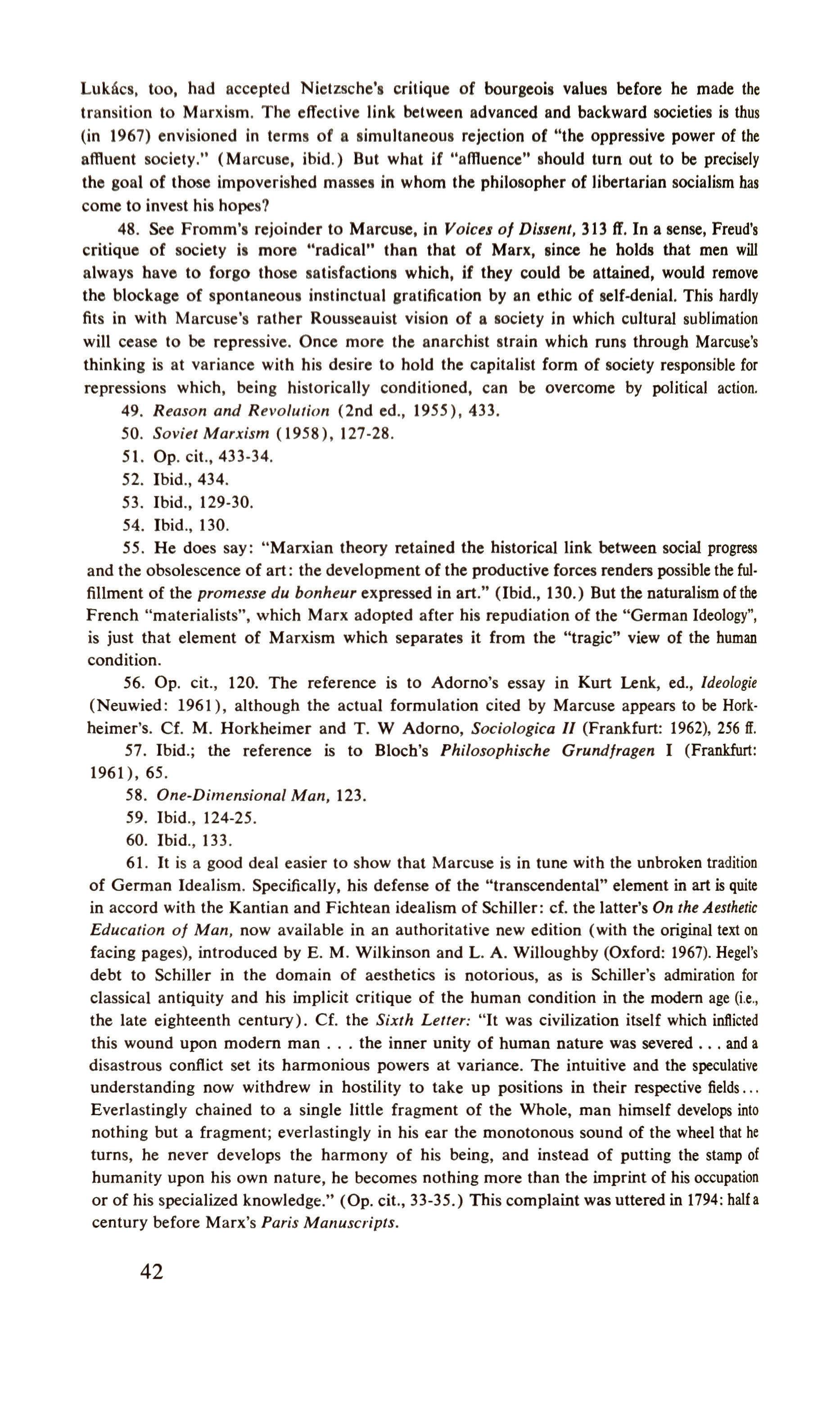
Lukacs, too, had accepted Nietzsche'. critique of bourgeois values before he made the transition to Marxism. The effective link between advanced and backward societies is thus (in 1967) envisioned in terms of a simultaneous rejection of "the oppressive power of the affluent society.' (Marcuse, ibid.) But what if "affluence" should turn out to be precisely the goal of those impoverished masses in whom the philosopher of libertarian socialism has come to invest his hopes?
48. See Fromm's rejoinder to Marcuse, in Voices of Dlssent, 313 tf. In a sense, Freud's critique of society is more "radical" than that of Marx, since he holds that men will always have to forgo those satisfactions which, if they could be attained, would remove the blockage of spontaneous instinctual gratification by an ethic of self-denial. This hardly fits in with Marcuse's rather Rousseauist vision of a society in which cultural sublimation will cease to be repressive. Once more the anarchist strain which runs through Marcuse's thinking is at variance with his desire to hold the capitalist form of society responsible for repressions which, being historically conditioned, can be overcome by political action.
49. Reason and Revolution (2nd ed., 1955), 433.
50. Soviet Marxism (1958), 127-28.
51. Op. cit., 433-34.
52. Ibid., 434.
53. Ibid., 129-30.
54. Ibid., 130.
55. He does say: "Marxian theory retained the historical link between social progress and the obsolescence of art: the development of the productive forces renders possible the fulfillment of the promesse du bonheur expressed in art." (Ibid., 130.) But the naturalism of the French "materialists", which Marx adopted after his repudiation of the "German Ideology", is just that element of Marxism which separates it from the "tragic" view of the human condition.
56. Op. cit., 120. The reference is to Adorno's essay in Kurt Lenk, ed., ldeologie (Neuwied: 1961), although the actual formulation cited by Marcuse appears to be Horkheimer's. Cf. M. Horkheimer and T. W Adorno, Sociologica II (Frankfurt: 1962), 256 If.
57. Ibid.; the reference is to Bloch's Philosophische Grund/ragen I (Frankfurt: 1961),65.
58. One-Dimensional Man, 123.
59. Ibid., 124-25.
60. Ibid., 133.
61. It is a good deal easier to show that Marcuse is in tune with the unbroken tradition of German Idealism. Specifically, his defense of the "transcendental" element in art is quite in accord with the Kantian and Fichtean idealism of Schiller: cf. the latter's On the Aesthetic Education 0/ Man, now available in an authoritative new edition (with the original text on facing pages), introduced by E. M. Wilkinson and L. A. Willoughby (Oxford: 1967). Hegel's debt to Schiller in the domain of aesthetics is notorious, as is Schiller's admiration for classical antiquity and his implicit critique of the human condition in the modem age (i.e., the late eighteenth century). Cf. the Sixth Letter; "It was civilization itself which inflicted this wound upon modem man the inner unity of human nature was severed and a disastrous conflict set its harmonious powers at variance. The intuitive and the speculative understanding now withdrew in hostility to take up positions in their respective fields Everlastingly chained to a single little fragment of the Whole, man himself develops into nothing but a fragment; everlastingly in his ear the monotonous sound of the wheel that be turns, he never develops the harmony of his being, and instead of putting the stamp of humanity upon his own nature, he becomes nothing more than the imprint of his occupation or of his specialized knowledge." (Op, cit., 33-35.) This complaint was uttered in 1794: half a century before Marx's Paris Manuscripts.
42
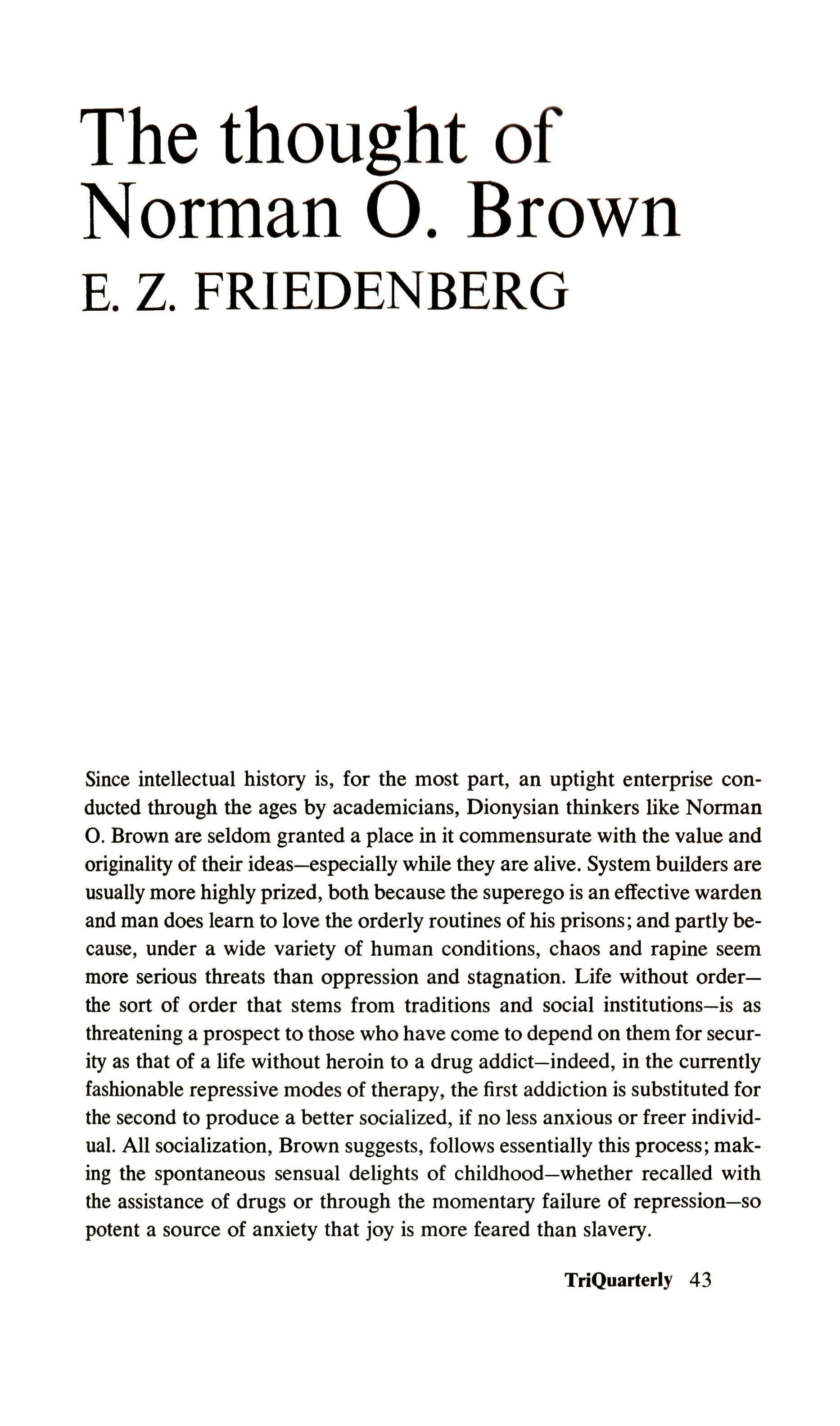
Since intellectual history is, for the most part, an uptight enterprise conducted through the ages by academicians, Dionysian thinkers like Norman O. Brown are seldom granted a place in it commensurate with the value and originality of their ideas-especially while they are alive. System builders are usually more highly prized, both because the superego is an effective warden and man does learn to love the orderly routines of his prisons; and partly because, under a wide variety of human conditions, chaos and rapine seem more serious threats than oppression and stagnation. Life without orderthe sort of order that stems from traditions and social institutions is as threatening a prospect to those who have come to depend on them for security as that of a life without heroin to a drug addict indeed, in the currently fashionable repressive modes of therapy, the first addiction is substituted for the second to produce a better socialized, if no less anxious or freer individual. All socialization, Brown suggests, follows essentially this process; making the spontaneous sensual delights of childhood whether recalled with the assistance of drugs or through the momentary failure of repression so potent a source of anxiety that joy is more feared than slavery. TriQuarterly
•
43

Orderly thought, promising control of the environment at whatever cost in expressiveness, thus gains more prestige than poetic insight. As they lose legitimacy, the forms in which Dionysian flashes of wit and moments of truth may be expressed decay; the medium really is the message and the use of poetry or metaphor conveys that one is not be taken seriously. On solemn occasions, it is still customary to pronounce an invocation; but no Muse or spirit could conceivably be invoked by such an official pronouncement. The Muses are not dead; but they have always been snobbish.
Norman O. Brown, himself, in his first book, Life Against Death? retains the conventional format and order of logical analysis; later, in Love's Body,2 he adopts the aphoristic, Nietzschean structure which seems appropriate to what he has to say. I am not sure it really is, though; and it is hard to judge fairly. That Life Against Death is much easier to follow may mean nothing more than that once one is bound by conventions, in reading as in anything else, it is easier to follow them than to be free of them which is, of course, one of the obvious, if minor, implications of Brown's work. But Love's Body also seems the richer of the two books; and in choosing to write it aphoristically Brown has, I think, made the same mistake as Marshall MeLuhan, with whom he shares many views, especially on the nature of language and its relation to culture. Both men are correct in finding the medium of print constricting and deforming because it does indeed impose an impersonal linearity and chilly logic on whatever one is trying to say. But that is the way books work; and if you really believe that the medium is the message you must perforce grant that there are some messages books can't carry very well, instead of tormenting the essay fOIIn into trying to make like haiku.
But, in Life Against Death, logic and reason are certainly directed against themselves, and to brilliant effect; and Love's Body is a box ofjewels, many precious, though a setting would have made them a little easier to handle the box does have 16 compartments with labels like "Liberty", "Person", "Boundary", and "Head"; but these do not help to establish a pattern for the work as a whole. Brown really is a Manichean, who glories in the mixture of light and darkness in his finished work as well as in his thought. Periods in which such writing emerges, gets credit, and gains currency are unusual. Stultification, as Brown makes clear, is the normal function of culture. It was Sparta that endured for nearly a thousand years; though we prefer to take the brief Periclean age of Athens as our prototype. Perhapsjustly; golden ages, distinguished by a flair for expressiveness and creativity, are not very pleasant to live in and not just for ego-dominated people. In any era, human spontaneity panics the fuzz, turns on the heat, and provokes
44
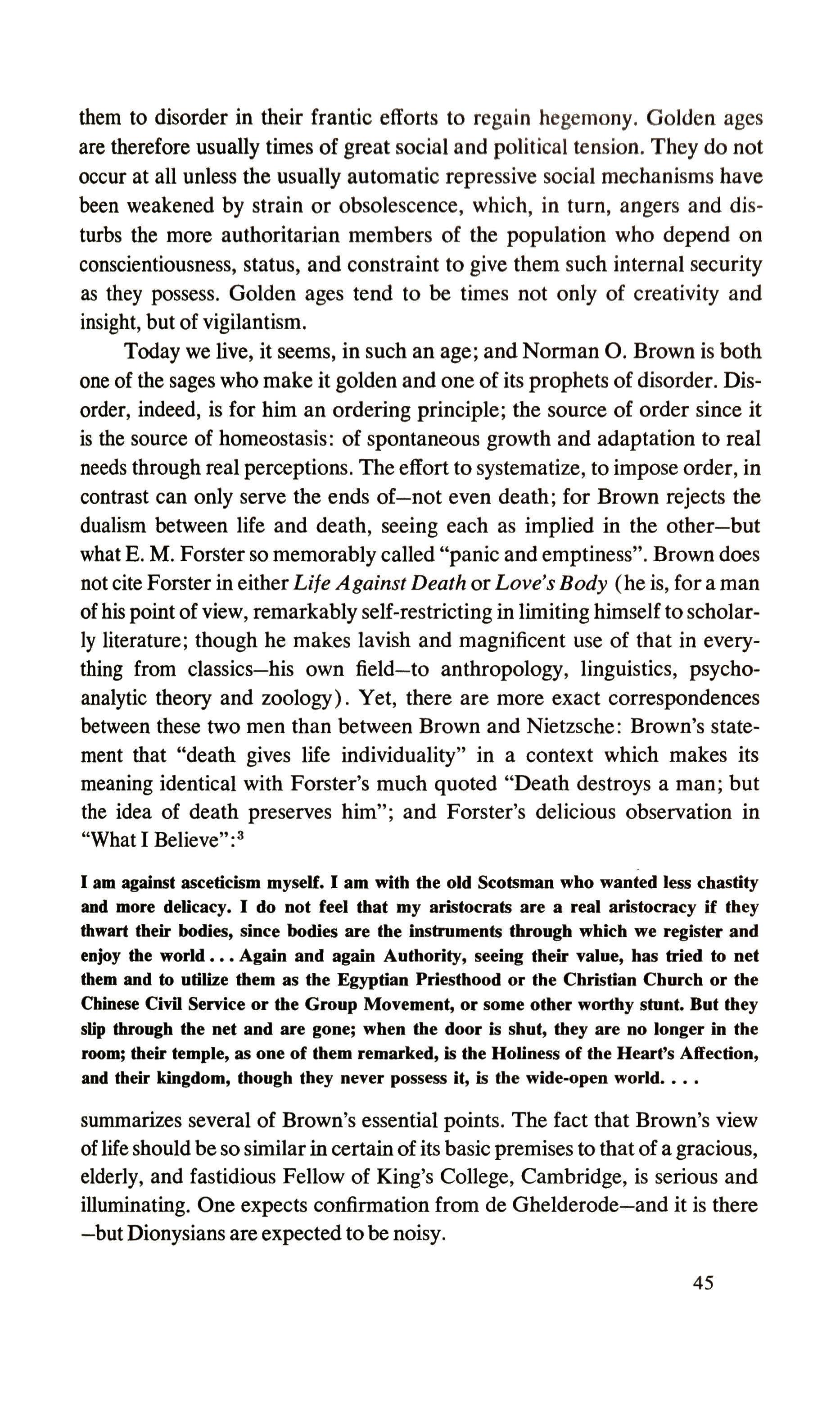
them to disorder in their frantic efforts to regain hegemony. Golden ages are therefore usually times of great social and political tension. They do not occur at all unless the usually automatic repressive social mechanisms have been weakened by strain or obsolescence, which, in turn, angers and disturbs the more authoritarian members of the population who depend on conscientiousness, status, and constraint to give them such internal security as they possess. Golden ages tend to be times not only of creativity and insight, but of vigilantism.
Today we live, it seems, in such an age; and Norman O. Brown is both one of the sages who make it golden and one of its prophets of disorder. Disorder, indeed, is for him an ordering principle; the source of order since it is the source of homeostasis: of spontaneous growth and adaptation to real needs through real perceptions. The effort to systematize, to impose order, in contrast can only serve the ends of not even death; for Brown rejects the dualism between life and death, seeing each as implied in the other but what E. M. Forster so memorably called "panic and emptiness". Brown does not cite Forster in either Life Against Death or Love's Body (he is, for a man ofhis point of view, remarkably self-restricting in limiting himself to scholarly literature; though he makes lavish and magnificent use of that in everything from classics his own field to anthropology, linguistics, psychoanalytic theory and zoology). Yet, there are more exact correspondences between these two men than between Brown and Nietzsche: Brown's statement that "death gives life individuality" in a context which makes its meaning identical with Forster's much quoted "Death destroys a man; but the idea of death preserves him"; and Forster's delicious observation in "What I Believe":"
I am against asceticism myself. I am with the old Scotsman who wanted less chastity and more delicacy. I do not feel that my aristocrats are a real aristocracy if they thwart their bodies, since bodies are the instruments through which we register and enjoy the world Again and again Authority, seeing their value, has tried to net them and to utilize them as the Egyptian Priesthood or the Christian Church or the Chinese Civil Service or the Group Movement, or some other worthy stunt. But they slip through the net and are gone; when the door is shut, they are no longer in the room; their temple, as one of them remarked, is the Holiness of the Heart's Affection, and their kingdom, though they never possess it, is the wide-open world.
summarizes several of Brown's essential points. The fact that Brown's view of life should be so similar in certain of its basic premises to that of a gracious, elderly, and fastidious Fellow of King's College, Cambridge, is serious and illuminating. One expects confirmation from de Ghelderode and it is there -but Dionysians are expected to be noisy.
45
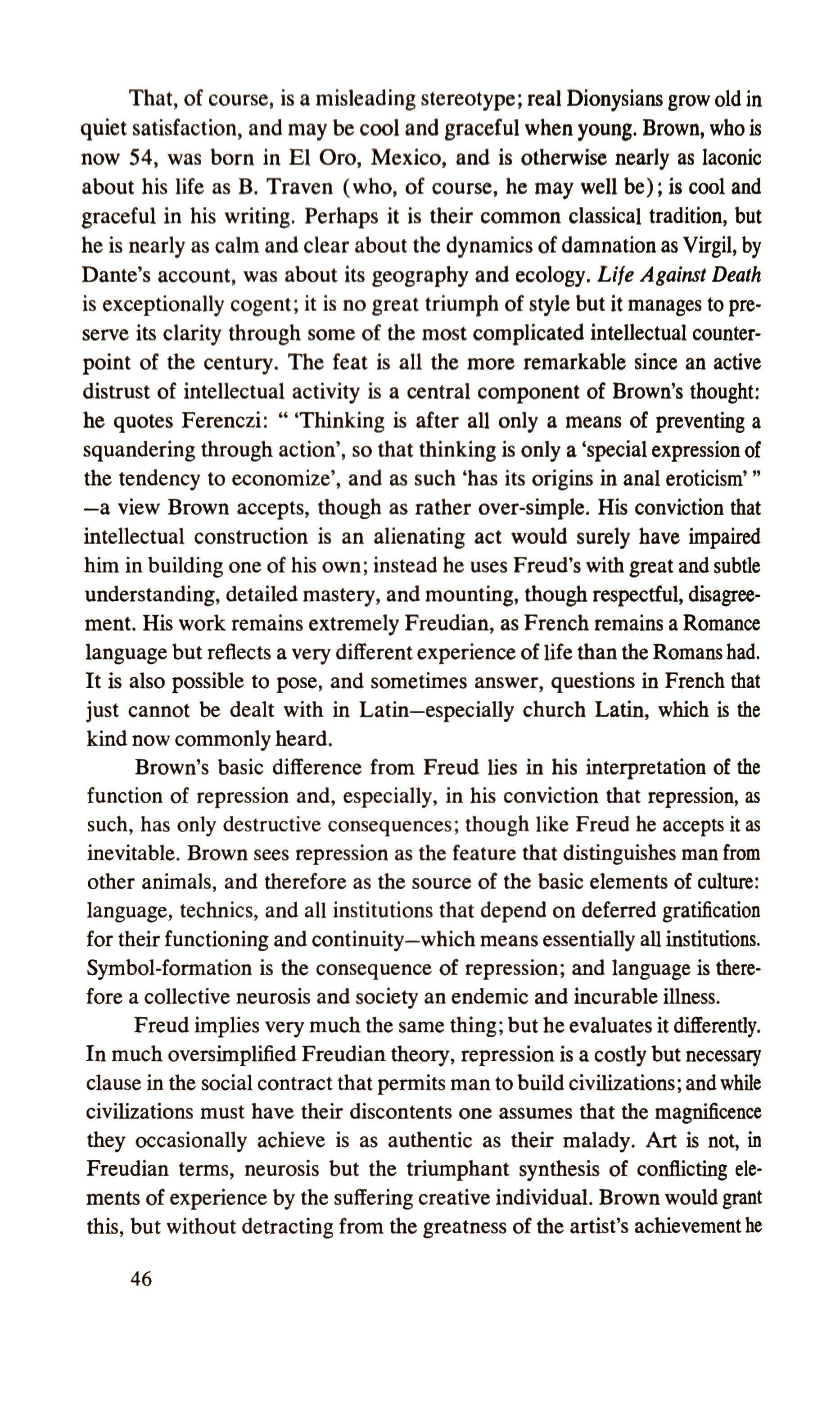
That, of course, is a misleading stereotype; real Dionysians grow old in quiet satisfaction, and may be cool and graceful when young. Brown, who is now 54, was born in El Oro, Mexico, and is otherwise nearly as laconic about his life as B. Traven (who, of course, he may well be); is cool and graceful in his writing. Perhaps it is their common classical tradition, but he is nearly as calm and clear about the dynamics of damnation as Virgil, by Dante's account, was about its geography and ecology. Life Against Death is exceptionally cogent; it is no great triumph of style but it manages to preserve its clarity through some of the most complicated intellectual counterpoint of the century. The feat is all the more remarkable since an active distrust of intellectual activity is a central component of Brown's thought: he quotes Ferenczi: "'Thinking is after aU only a means of preventing a squandering through action', so that thinking is only a 'special expression of the tendency to economize', and as such 'has its origins in anal eroticism'" -,a view Brown accepts, though as rather over-simple. His conviction that intellectual construction is an alienating act would surely have impaired him in building one of his own; instead he uses Freud's with great and subtle understanding, detailed mastery, and mounting, though respectful, disagreement. His work remains extremely Freudian, as French remains a Romance language but reflects a very different experience of life than the Romans had. It is also possible to pose, and sometimes answer, questions in French that just cannot be dealt with in Latin especiaUy church Latin, which is the kind now commonly heard.
Brown's basic difference from Freud lies in his interpretation of the function of repression and, especially, in his conviction that repression, as such, has only destructive consequences; though like Freud he accepts it as inevitable. Brown sees repression as the feature that distinguishes man from other animals, and therefore as the source of the basic elements of culture: language, technics, and all institutions that depend on deferred gratification for their functioning and continuity which means essentially aU institutions. Symbol-formation is the consequence of repression; and language is therefore a collective neurosis and society an endemic and incurable illness.
Freud implies very much the same thing; but he evaluates it differently. In much oversimplified Freudian theory, repression is a costly but necessary clause in the social contract that permits man to build civilizations; and while civilizations must have their discontents one assumes that the rna cence they occasionally achieve is as authentic as their malady. Art is not, in Freudian terms, neurosis but the triumphant synthesis of conflicting elements of experience by the suffering creative individual. Brown would grant this, but without detracting from the greatness of the artist's achievement he
46
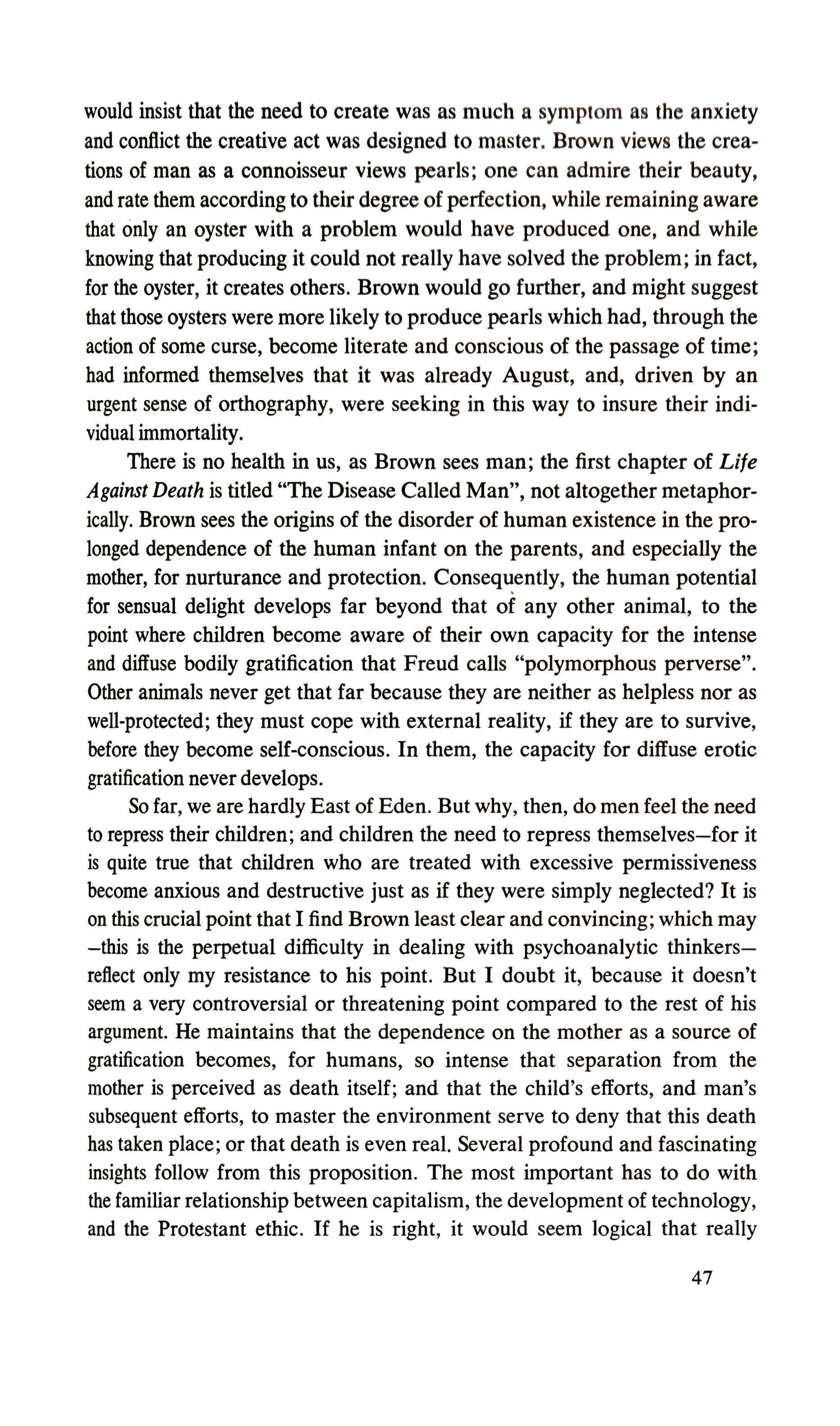
would insist that the need to create was as much a symptom as the anxiety and conflict the creative act was designed to master. Brown views the creations of man as a connoisseur views pearls; one can admire their beauty, and rate them according to their degree of perfection, while remaining aware that only an oyster with a problem would have produced one, and while knowing that producing it could not really have solved the problem; in fact, for the oyster, it creates others. Brown would go further, and might suggest that those oysters were more likely to produce pearls which had, through the action of some curse, become literate and conscious of the passage of time; had informed themselves that it was already August, and, driven by an urgent sense of orthography, were seeking in this way to insure their individual immortality.
There is no health in us, as Brown sees man; the first chapter of Life Against Death is titled "The Disease Called Man", not altogethermetaphorically. Brown sees the origins of the disorder of human existence in the prolonged dependence of the human infant on the parents, and especially the mother, for nurturance and protection. Consequently, the human potential for sensual delight develops far beyond that of any other animal, to the point where children become aware of their own capacity for the intense and diffuse bodily gratification that Freud calls "polymorphous perverse". Other animals never get that far because they are neither as helpless nor as well-protected; they must cope with external reality, if they are to survive, before they become self-conscious. In them, the capacity for diffuse erotic gratification never develops.
So far, we are hardly East of Eden. But why, then, do men feel the need to repress their children; and children the need to repress themselves for it is quite true that children who are treated with excessive permissiveness become anxious and destructive just as if they were simply neglected? It is on this crucial point that I find Brown least clear and convincing; which may -this is the perpetual difficulty in dealing with psychoanalytic thinkersreflect only my resistance to his point. But I doubt it, because it doesn't seem a very controversial or threatening point compared to the rest of his argument. He maintains that the dependence on the mother as a source of gratification becomes, for humans, so intense that separation from the mother is perceived as death itself; and that the child's efforts, and man's subsequent efforts, to master the environment serve to deny that this death has taken place; or that death is even real. Several profound and fascinating insights follow from this proposition. The most important has to do with the familiar relationship between capitalism, the development of technology, and the Protestant ethic. If he is right, it would seem logical that really
47
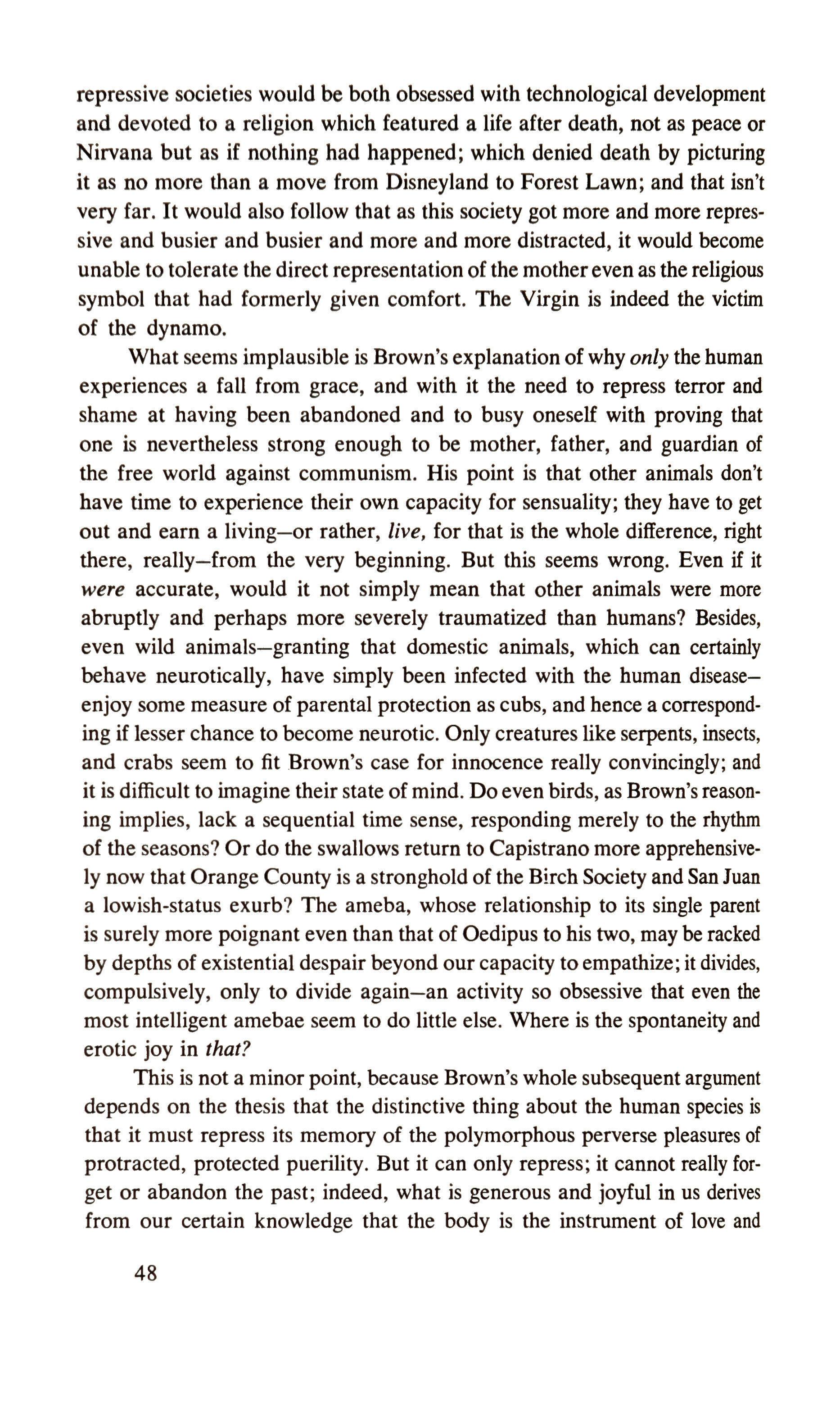
repressive societies would be both obsessed with technological development and devoted to a religion which featured a life after death, not as peace or Nirvana but as if nothing had happened; which denied death by picturing it as no more than a move from Disneyland to Forest Lawn; and that isn't very far. It would also follow that as this society got more and more repressive and busier and busier and more and more distracted, it would become unable to tolerate the direct representation of the mother even as the religious symbol that had formerly given comfort. The Virgin is indeed the victim of the dynamo.
What seems implausible is Brown's explanation of why only the human experiences a fall from grace, and with it the need to repress terror and shame at having been abandoned and to busy oneself with proving that one is nevertheless strong enough to be mother, father, and guardian of the free world against communism. His point is that other animals don't have time to experience their own capacity for sensuality; they have to get out and earn a living or rather, live, for that is the whole difference, right there, really from the very beginning. But this seems wrong. Even if it were accurate, would it not simply mean that other animals were more abruptly and perhaps more severely traumatized than humans? Besides, even wild animals granting that domestic animals, which can certainly behave neurotically, have simply been infected with the human diseaseenjoy some measure of parental protection as cubs, and hence a corresponding if lesser chance to become neurotic. Only creatures like serpents, insects, and crabs seem to fit Brown's case for innocence really convincingly; and it is difficult to imagine their state of mind. Do even birds, as Brown's reasoning implies, lack a sequential time sense, responding merely to the rh of the seasons? Or do the swallows return to Capistrano more apprehensively now that Orange County is a stronghold of the Birch Society and San Juan a lowish-status exurb? The ameba, whose relationship to its single parent is surely more poignant even than that of Oedipus to his two, may be racked by depths of existential despair beyond our capacity to empathize; it divides, compulsively, only to divide again an activity so obsessive that even the most intelligent amebae seem to do little else. Where is the spontaneity and erotic joy in that?
This is not a minor point, because Brown's whole subsequent argument depends on the thesis that the distinctive thing about the human species is that it must repress its memory of the polymorphous perverse pleasures of protracted, protected puerility. But it can only repress; it cannot really forget or abandon the past; indeed, what is generous and joyful in us derives from our certain knowledge that the body is the instrument of love and
48
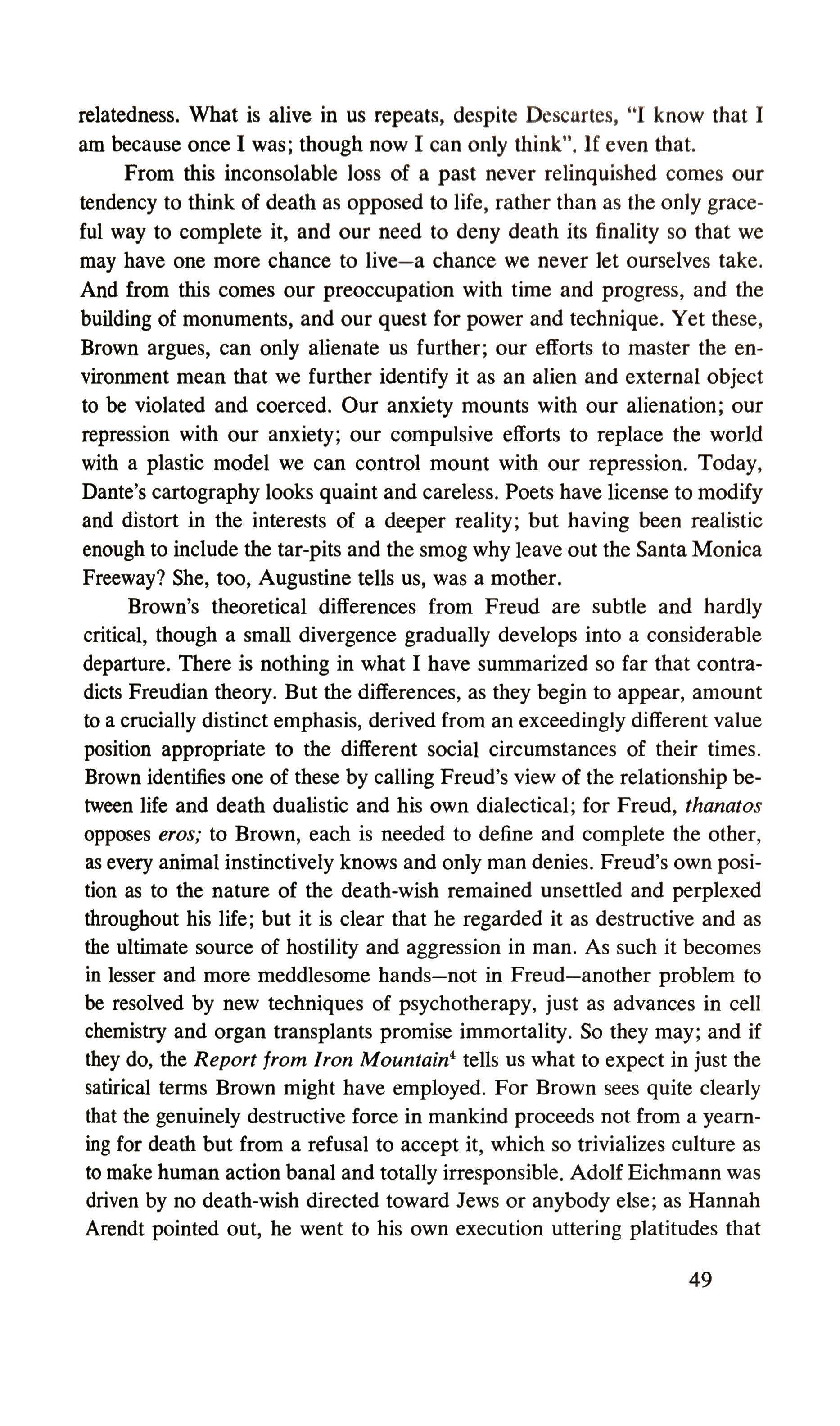
relatedness. What is alive in us repeats, despite Descartes, "I know that I aln because once I was; though now I can only think", If even that.
From this inconsolable loss of a past never relinquished comes our tendency to think of death as opposed to life, rather than as the only graceful way to complete it, and our need to deny death its finality so that we may have one more chance to live a chance we never let ourselves take. And from this comes our preoccupation with time and progress, and the building of monuments, and our quest for power and technique. Yet these, Brown argues, can only alienate us further; our efforts to master the environment mean that we further identify it as an alien and external object to be violated and coerced. Our anxiety mounts with our alienation; our repression with our anxiety; our compulsive efforts to replace the world with a plastic model we can control mount with our repression. Today, Dante's cartography looks quaint and careless. Poets have license to modify and distort in the interests of a deeper reality; but having been realistic enough to include the tar-pits and the smog why leave out the Santa Monica Freeway? She, too, Augustine tells us, was a mother.
Brown's theoretical differences from Freud are subtle and hardly critical, though a small divergence gradually develops into a considerable departure. There is nothing in what I have summarized so far that contradicts Freudian theory. But the differences, as they begin to appear, amount to a crucially distinct emphasis, derived from an exceedingly different value position appropriate to the different social circumstances of their times. Brown identifies one of these by calling Freud's view of the relationship between life and death dualistic and his own dialectical; for Freud, thanatos opposes eros,' to Brown, each is needed to define and complete the other, as every animal instinctively knows and only man denies. Freud's own position as to the nature of the death-wish remained unsettled and perplexed throughout his life; but it is clear that he regarded it as destructive and as the ultimate source of hostility and aggression in man. As such it becomes in lesser and more meddlesome hands not in Freud another problem to be resolved by new techniques of psychotherapy, just as advances in cell chemistry and organ transplants promise immortality. So they may; and if they do, the Report from Iron Mountain' tells us what to expect in just the satirical terms Brown might have employed. For Brown sees quite clearly that the genuinely destructive force in mankind proceeds not from a yearning for death but from a refusal to accept it, which so trivializes culture as to make human action banal and totally irresponsible. Adolf Eichmann was driven by no death-wish directed toward Jews or anybody else; as Hannah Arendt pointed out, he went to his own execution uttering platitudes that
49
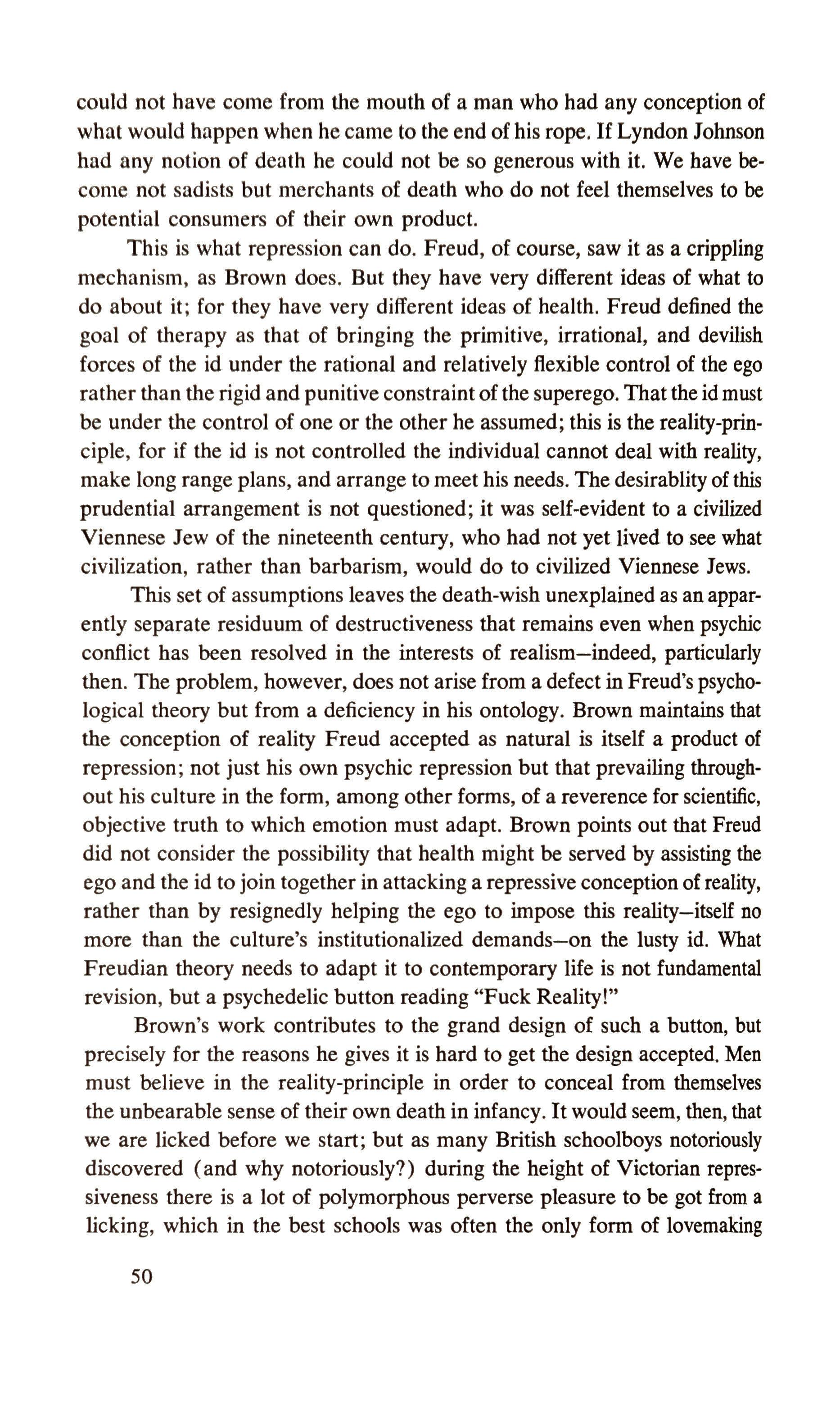
could not have come from the mouth of a man who had any conception of what would happen when he came to the end of his rope. If Lyndon Johnson had any notion of death he could not be so generous with it. We have become not sadists but merchants of death who do not feel themselves to be potential consumers of their own product.
This is what repression can do. Freud, of course, saw it as a crippling mechanism, as Brown does. But they have very different ideas of what to do about it; for they have very different ideas of health. Freud defined the goal of therapy as that of bringing the primitive, irrational, and devilish forces of the id under the rational and relatively flexible control of the ego rather than the rigid and punitive constraint of the superego. That the id must be under the control of one or the other he assumed; this is the reality-principle, for if the id is not controlled the individual cannot deal with reality, make long range plans, and arrange to meet his needs. The desirablity of this prudential arrangement is not questioned; it was self-evident to a civilized Viennese Jew of the nineteenth century, who had not yet lived to see what civilization, rather than barbarism, would do to civilized Viennese Jews.
This set of assumptions leaves the death-wish unexplained as an apparently separate residuum of destructiveness that remains even when psychic conflict has been resolved in the interests of realism indeed, particularly then. The problem, however, does not arise from a defect in Freud's psychological theory but from a deficiency in his ontology. Brown maintains that the conception of reality Freud accepted as natural is itself a product of repression; not just his own psychic repression but that prevailing throughout his culture in the form, among other forms, of a reverence for scientific, objective truth to which emotion must adapt. Brown points out that Freud did not consider the possibility that health might be served by assisting the ego and the id to join together in attacking a repressive conception of reality, rather than by resignedly helping the ego to impose this reality itself no more than the culture's institutionalized demands on the lusty id. What Freudian theory needs to adapt it to contemporary life is not fundamental revision, but a psychedelic button reading "Fuck Reality!" Brown's work contributes to the grand design of such a button, but precisely for the reasons he gives it is hard to get the design accepted. Men must believe in the reality-principle in order to conceal from themselves the unbearable sense of their own death in infancy. It would seem, then, that we are licked before we start; but as many British schoolboys notoriously discovered (and why notoriously?) during the height of Victorian repressiveness there is a lot of polymorphous perverse pleasure to be got from a licking, which in the best schools was often the only form of lovemaking
50
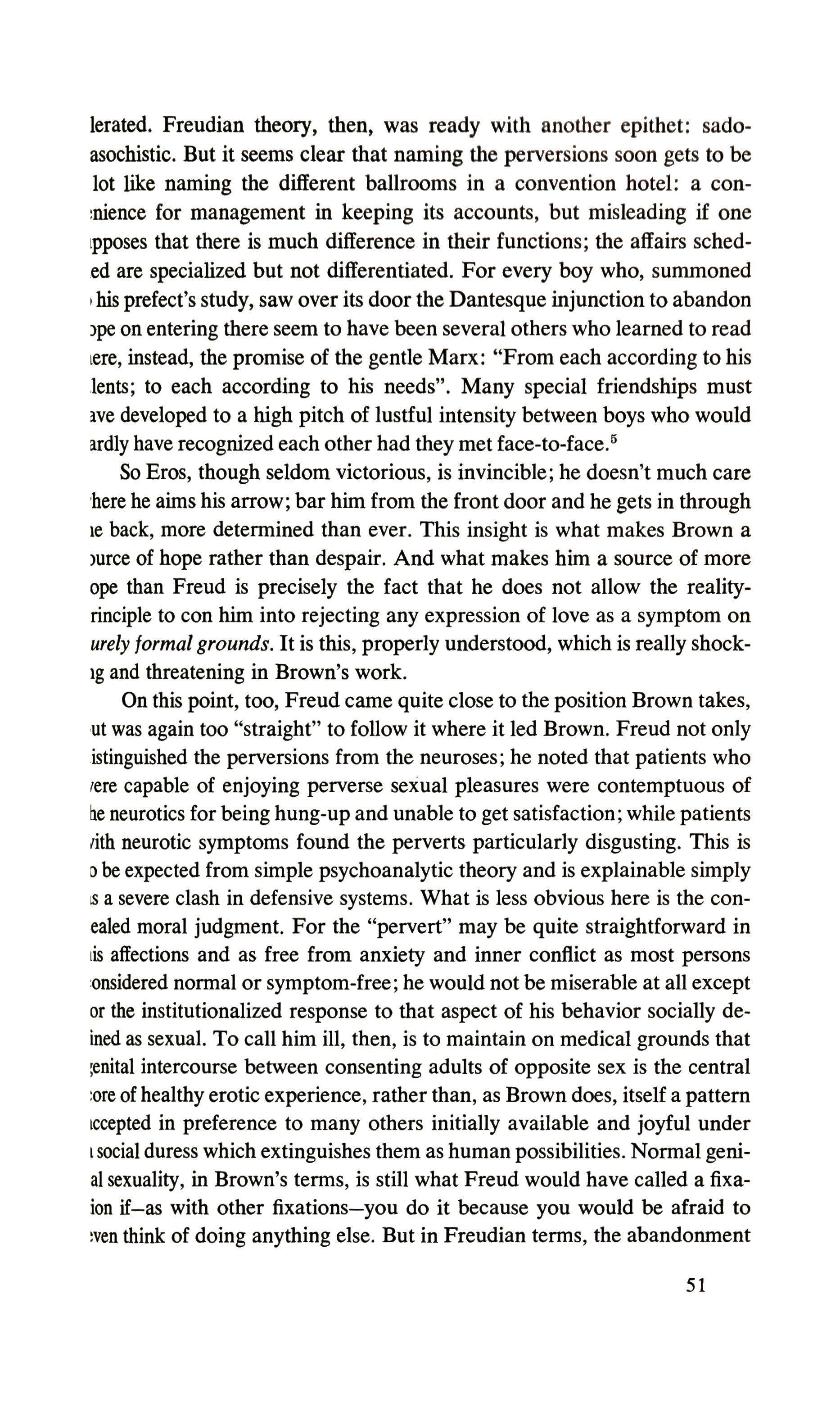
lerated. Freudian theory, then, was ready with another epithet: sadoasochistic. But it seems clear that naming the perversions soon gets to be lot like naming the different ballrooms in a convention hotel: a con:nience for management in keeping its accounts, but misleading if one pposes that there is much difference in their functions; the affairs scheded are specialized but not differentiated. For every boy who, sununoned I his prefect's study, saw over its door the Dantesque injunction to abandon ope on entering there seem to have been several others who learned to read ere, instead, the promise of the gentle Marx: "From each according to his lents; to each according to his needs". Many special friendships must ave developed to a high pitch of lustful intensity between boys who would ardly have recognized each other had they met face-to-face. 5
So Eros, though seldom victorious, is invincible; he doesn't much care 'here he aims his arrow; bar him from the front door and he gets in through ie back, more determined than ever. This insight is what makes Brown a mrce of hope rather than despair. And what makes him a source of more ope than Freud is precisely the fact that he does not allow the realityrinciple to con him into rejecting any expression of love as a symptom on urely formalgrounds. It is this, properly understood, which is really shock19 and threatening in Brown's work.
On this point, too, Freud came quite close to the position Brown takes, ut was again too "straight" to follow it where it led Brown. Freud not only istinguished the perversions from the neuroses; he noted that patients who rere capable of enjoying perverse sexual pleasures were contemptuous of he neurotics for being hung-up and unable to get satisfaction; while patients lith neurotic symptoms found the perverts particularly disgusting. This is n be expected from simple psychoanalytic theory and is explainable simply is a severe clash in defensive systems. What is less obvious here is the conealed moral judgment. For the "pervert" may be quite straightforward in lis affections and as free from anxiety and inner conflict as most persons onsidered normal or symptom-free; he would not be miserable at all except or the institutionalized response to that aspect of his behavior socially deined as sexual. To call him ill, then, is to maintain on medical grounds that :enital intercourse between consenting adults of opposite sex is the central :ore of healthy erotic experience, rather than, as Brown does, itself a pattern iccepted in preference to many others initially available and joyful under I social duress which extinguishes them as human possibilities. Normal genial sexuality, in Brown's terms, is still what Freud would have called a fixaion if-as with other fixations you do it because you would be afraid to :ven think of doing anything else. But in Freudian terms, the abandonment
51
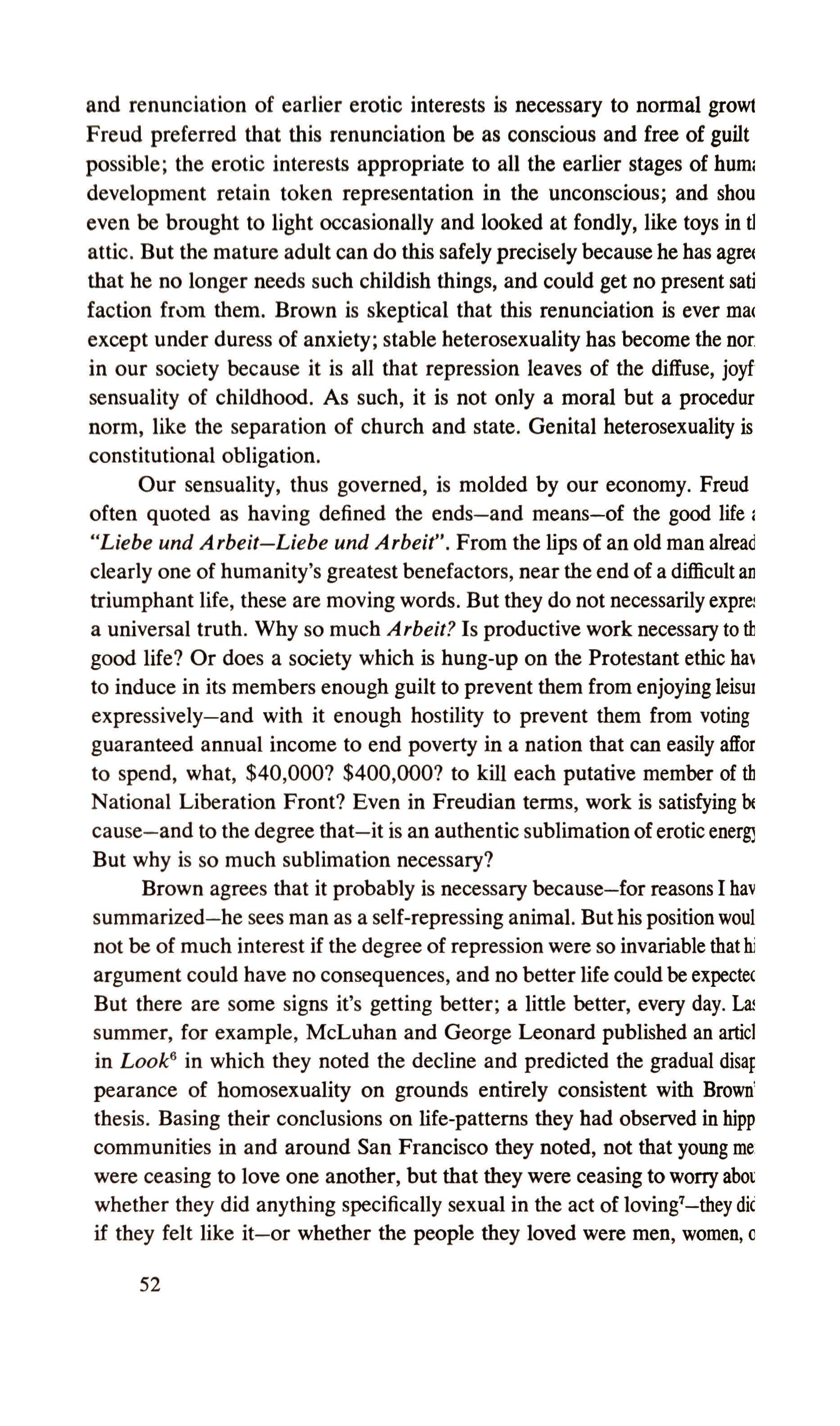
and renunciation of earlier erotic interests is necessary to normal growt Freud preferred that this renunciation be as conscious and free of guilt possible; the erotic interests appropriate to all the earlier stages of hum, development retain token representation in the unconscious; and shou even be brought to light occasionally and looked at fondly, like toys in d attic. But the mature adult can do this safelyprecisely because he has agree that he no longer needs such childish things, and could get no present sati faction from them. Brown is skeptical that this renunciation is ever ma: except under duress of anxiety; stable heterosexuality has become the nor in our society because it is all that repression leaves of the diffuse, joyf sensuality of childhood. As such, it is not only a moral but a procedur norm, like the separation of church and state. Genital heterosexuality is constitutional obligation.
Our sensuality, thus governed, is molded by our economy. Freud often quoted as having defined the ends and means of the good life l "Liebe und Arbeit Liebe und Arbeit", From the lips of an old man alread clearly one of humanity's greatest benefactors, near the end of a difficult an triumphant life, these are moving words. But they do not necessarily expre a universal truth. Why so much Arbeit? Is productive work necessary to til good life? Or does a society which is hung-up on the Protestant ethic ha, to induce in its members enough guilt to prevent them from enjoying Ieisui expressively and with it enough hostility to prevent them from voting guaranteed annual income to end poverty in a nation that can easily affor to spend, what, $40,000? $400,000? to kill each putative member of tb National Liberation Front? Even in Freudian terms, work is satisfying 1x cause and to the degree that it is an authentic sublimation of erotic energj But why is so much sublimation necessary?
Brown agrees that it probably is necessary because for reasons I hav summarized he sees man as a self-repressing animal. But his position woul not be of much interest if the degree of repression were so invariable thathi argument could have no consequences, and no better life could be expeetec But there are some signs it's getting better; a little better, every day. tal summer, for example, McLuhan and George Leonard published an artiel in Look" in which they noted the decline and predicted the gradual disap pearance of homosexuality on grounds entirely consistent with Brown' thesis. Basing their conclusions on life-patterns they had observed in hipp communities in and around San Francisco they noted, not that young me, were ceasing to love one another, but that they were ceasing to worry abor whether they did anything specifically sexual in the act of lovingt-they die if they felt like it or whether the people they loved were men, women, (J
52
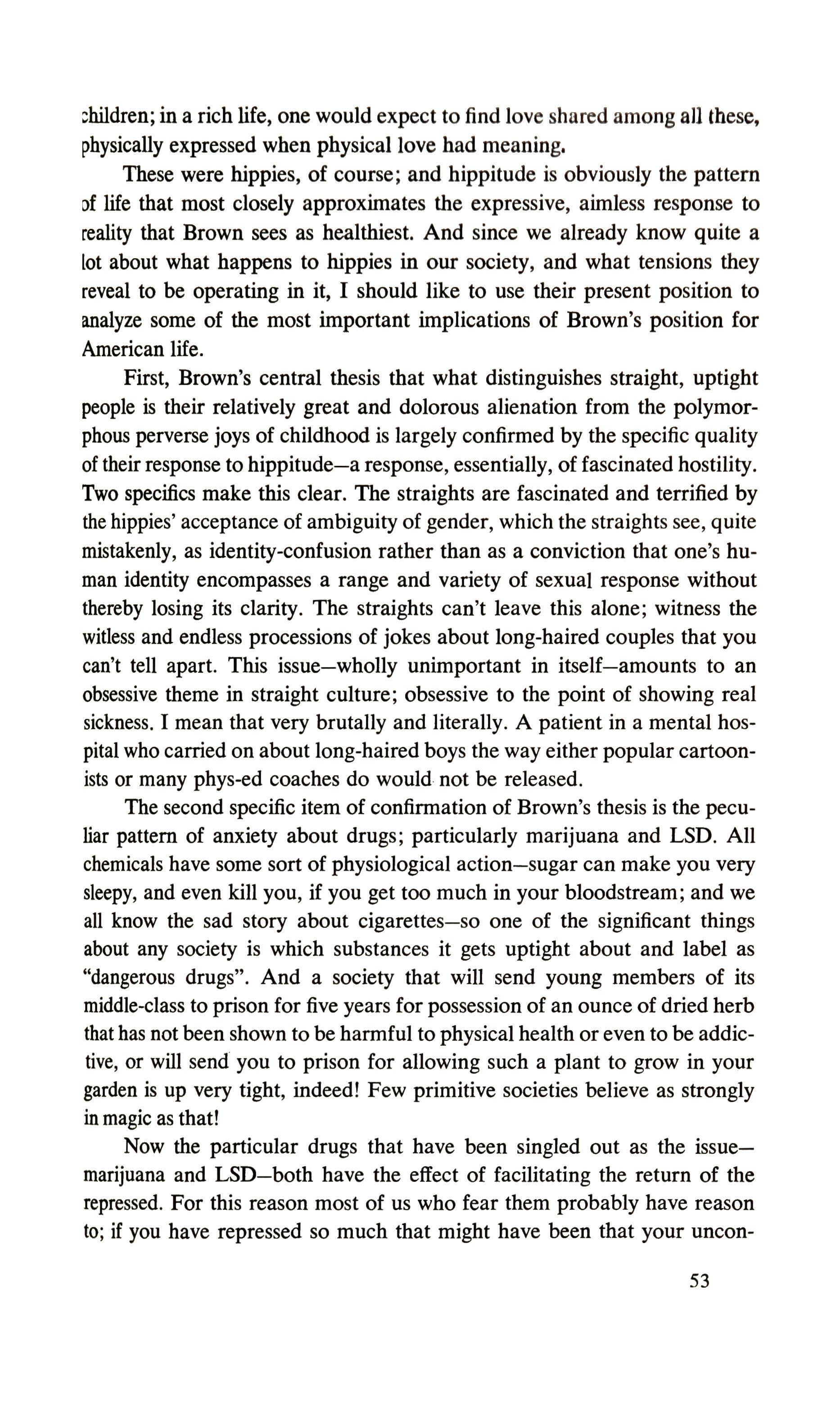
children; in a rich life, one would expect to find love shared among all these, physically expressed when physical love had meaning.
These were hippies, of course; and hippitude is obviously the pattern [)f life that most closely approximates the expressive, aimless response to reality that Brown sees as healthiest. And since we already know quite a lot about what happens to hippies in our society, and what tensions they reveal to be operating in it, I should like to use their present position to analyze some of the most important implications of Brown's position for American life.
First, Brown's central thesis that what distinguishes straight, uptight people is their relatively great and dolorous alienation from the polymorphous perverse joys of childhood is largely confirmed by the specific quality of their response to hippitude a response, essentially, of fascinated hostility. Two specifics make this clear. The straights are fascinated and terrified by the hippies' acceptance of ambiguity of gender, which the straights see, quite mistakenly, as identity-confusion rather than as a conviction that one's human identity encompasses a range and variety of sexual response without thereby losing its clarity. The straights can't leave this alone; witness the witless and endless processions of jokes about long-haired couples that you can't tell apart. This issue wholly unimportant in itself amounts to an obsessive theme in straight culture; obsessive to the point of showing real sickness. I mean that very brutally and literally. A patient in a mental hospital who carried on about long-haired boys the way either popular cartoonists or many phys-ed coaches do would not be released.
The second specific item of confirmation of Brown's thesis is the peculiar pattern of anxiety about drugs; particularly marijuana and LSD. All chemicals have some sort of physiological action sugar can make you very sleepy, and even kill you, if you get too much in your bloodstream; and we all know the sad story about cigarettes so one of the significant things about any society is which substances it gets uptight about and label as "dangerous drugs". And a society that will send young members of its middle-class to prison for five years for possession of an ounce of dried herb that has not been shown to be harmful to physical health or even to be addictive, or will send you to prison for allowing such a plant to grow in your garden is up very tight, indeed! Few primitive societies believe as strongly in magic as that!
Now the particular drugs that have been singled out as the issuemarijuana and LSD both have the effect of facilitating the return of the repressed. For this reason most of us who fear them probably have reason to; if you have repressed so much that might have been that your uncon-
53

scious is a morass of horror and desolation, you will have a very bad tril indeed. But for youngsters as basically innocent as most American middle class kids who have been reared genially and sympathetically, if not wit] much real understanding, the experience is likely to be quite groovy. To b turned on is to have greater access to the colorful sensuality of childhoot and a greater sense of the wholeness of things. It is also to be less motivate toward any kind of action. Marijuana does indeed weaken achievement orientation. Caffeine, an OK drug, keys you up and strengthens it; ane flushes the kidneys as well. Most Americans are addicted to it.
At most of the recent pot conferences I have read reports of, it Will this factor that the hard-nosed anti-pot and enforcement people hammerec on. They have about given up, it seems, on trying to establish that marijuana is physiologically harmful; it is pretty clearly less physiologically harmful than either alcohol or a night at the police station. What they emphasize II that it ruins young people's desire to get ahead, to achieve and excel, to make something out of themselves.
The morality of these aims is never questioned; the abandonment oj them is the fundamental offense of which hippies and pot-blowers are held to be guilty while the fact that marijuana the same plant, in different form, as hashish does indeed promote a sense of mystical restoration with nature -just what Brown holds to be destroyed through repression is what endears it to hippies. Marijuana is antisocial in a really fundamental sense; it hardly ever leads to antisocial behavior since it reduces the desire to impose one's will on the environment by any kind of aggression, but it retards and impedes the kind of repression and alienation from one's own feelings that is the essence of the socializing process. In proper and sufficient dosage, for example, it provides almost complete immunity against schooling.
The fact, then, that this relatively harmless substance should have been selected by society to make a federal case against its young goes far toward confirming Brown's central thesis. But the fact that the young select this drug and the more potent though apparently more hazardous LSD as important enough to them to risk sadistic and destructive punishment also has some interesting implications for Brown's thesis and helps explain why, in this particular Golden Age, his thought has become influential.
For perhaps the first time in history, a considerable proportion of the middle-class has become affluent enough to be able to question the fundamental assumption of the Protestant ethic that work is a moral necessity. Most hippies, notoriously, are middle-class; and marijuana is a middle-class drug. It wasn't, in America, when the legislation against it was passed; then it was used primarily by desperate, lower-class unemployed and unemploy-
54
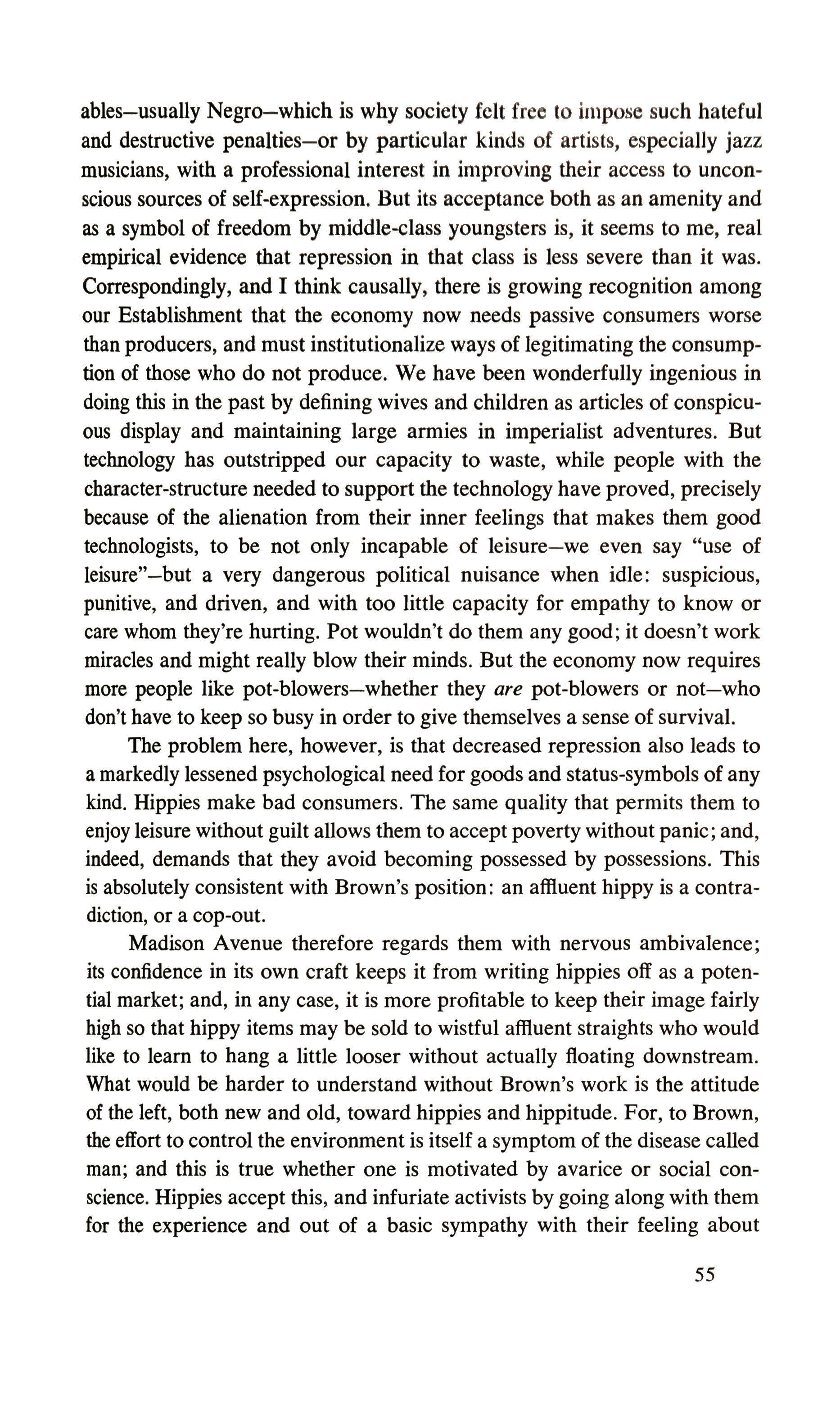
abies usually Negro which is why society felt free to impose such hateful and destructive penalties or by particular kinds of artists, especially jazz musicians, with a professional interest in improving their access to unconscious sources of self-expression. But its acceptance both as an amenity and as a symbol of freedom by middle-class youngsters is, it seems to me, real empirical evidence that repression in that class is less severe than it was. Correspondingly, and I think causally, there is growing recognition among our Establishment that the economy now needs passive consumers worse than producers, and must institutionalize ways of legitimating the consumption of those who do not produce. We have been wonderfully ingenious in doing this in the past by defining wives and children as articles of conspicuous display and maintaining large armies in imperialist adventures. But technology has outstripped our capacity to waste, while people with the character-structure needed to support the technology have proved, precisely because of the alienation from their inner feelings that makes them good technologists, to be not only incapable of leisure we even say "use of leisure" but a very dangerous political nuisance when idle: suspicious, punitive, and driven, and with too little capacity for empathy to know or care whom they're hurting. Pot wouldn't do them any good; it doesn't work miracles and might really blow their minds. But the economy now requires more people like pot-blowers whether they are pot-blowers or not who don't have to keep so busy in order to give themselves a sense of survival.
The problem here, however, is that decreased repression also leads to a markedly lessened psychological need for goods and status-symbols of any kind. Hippies make bad consumers. The same quality that permits them to enjoy leisure without guilt allows them to accept poverty without panic; and, indeed, demands that they avoid becoming possessed by possessions. This is absolutely consistent with Brown's position: an affluent hippy is a contradiction, or a cop-out.
Madison Avenue therefore regards them with nervous ambivalence; its confidence in its own craft keeps it from writing hippies off as a potential market; and, in any case, it is more profitable to keep their image fairly high so that hippy items may be sold to wistful affluent straights who would like to learn to hang a little looser without actually floating downstream. What would be harder to understand without Brown's work is the attitude of the left, both new and old, toward hippies and hippitude. For, to Brown, the effort to control the environment is itself a symptom of the disease called man; and this is true whether one is motivated by avarice or social conscience. Hippies accept this, and infuriate activists by going along with them for the experience and out of a basic sympathy with their feeling about
55
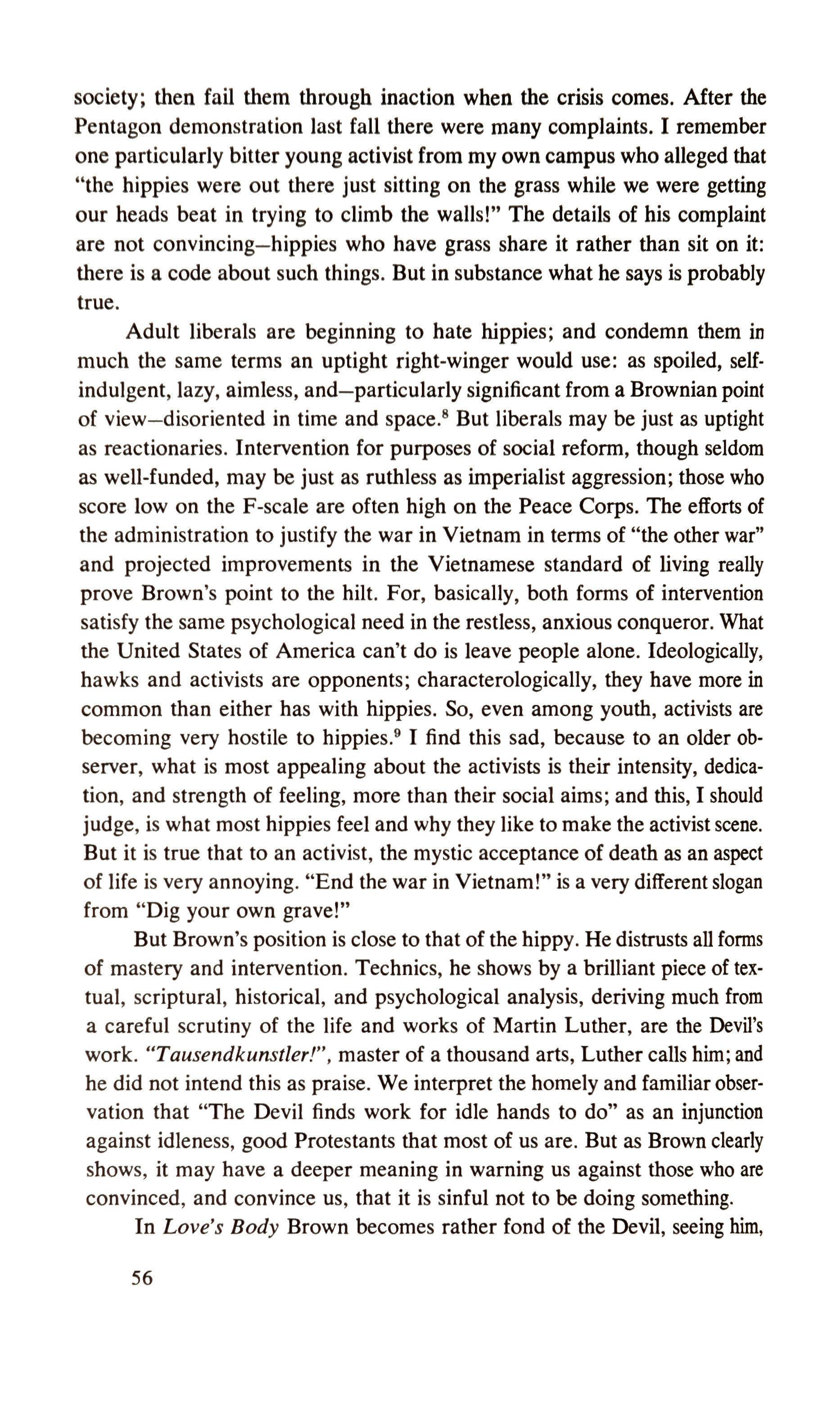
society; then fail them through inaction when the crisis comes. After the Pentagon demonstration last fall there were many complaints. I remember one particularly bitter young activist from my own campus who alleged that "the hippies were out there just sitting on the grass while we were getting our heads beat in trying to climb the walls!" The details of his complaint are not convincing hippies who have grass share it rather than sit on it: there is a code about such things. But in substance what he says is probably true.
Adult liberals are beginning to hate hippies; and condemn them in much the same terms an uptight right-winger would use: as spoiled, selfindulgent, lazy, aimless, and particularly significant from a Brownian point of view disoriented in time and space," But liberals may be just as uptight as reactionaries. Intervention for purposes of social reform, though seldom as well-funded, may be just as ruthless as imperialist aggression; those who score low on the F-scale are often high on the Peace Corps. The efforts of the administration to justify the war in Vietnam in terms of "the other war" and projected improvements in the Vietnamese standard of living really prove Brown's point to the hilt. For, basically, both forms of intervention satisfy the same psychological need in the restless, anxious conqueror. What the United States of America can't do is leave people alone. Ideologically, hawks and activists are opponents; characterologically, they have more in common than either has with hippies. So, even among youth, activists are becoming very hostile to hippies." I find this sad, because to an older observer, what is most appealing about the activists is their intensity, dedication, and strength of feeling, more than their social aims; and this, I should judge, is what most hippies feel and why they like to make the activist scene. But it is true that to an activist, the mystic acceptance of death as an aspect of life is very annoying. "End the war in Vietnam!" is a very different slogan from "Dig your own grave!"
But Brown's position is close to that of the hippy. He distrusts all fOnDS of mastery and intervention. Technics, he shows by a brilliant piece of textual, scriptural, historical, and psychological analysis, deriving much from a careful scrutiny of the life and works of Martin Luther, are the Devil's work. "Tausendkunstler!", master of a thousand arts, Luther calls him; and he did not intend this as praise. We interpret the homely and familiar observation that "The Devil finds work for idle hands to do" as an injunction against idleness, good Protestants that most of us are. But as Brown clearly shows, it may have a deeper meaning in warning us against those who are convinced, and convince us, that it is sinful not to be doing something.
In Love's Body Brown becomes rather fond of the Devil, seeing him,
56
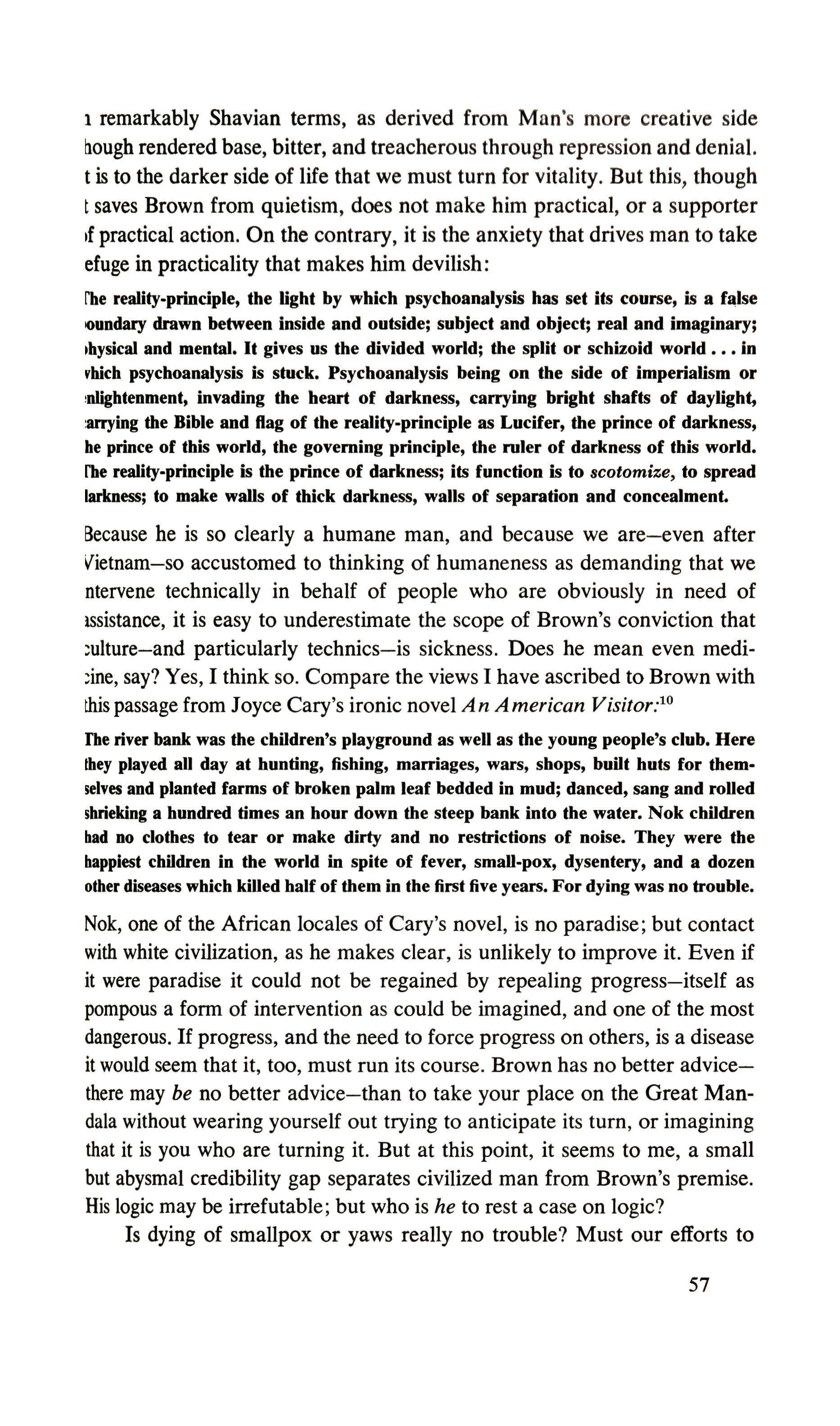
1 remarkably Shavian terms, as derived from Man's more creative side hough rendered base, bitter, and treacherous through repression and denial. t is to the darker side of life that we must turn for vitality. But this, though t saves Brown from quietism, does not make him practical, or a supporter If practical action. On the contrary, it is the anxiety that drives man to take efuge in practicality that makes him devilish:
['be reality-principle, the light by which psychoanalysis has set its course, is a false lOundary drawn between inside and outside; subject and object; real and imaginary; Ihysical and mental. It gives us the divided world; the split or schizoid world in 'hich psychoanalysis is stuck. Psychoanalysis being on the side of imperialism or �nlightenment, invading the heart of darkness, carrying bright shafts of daylight, :arryiog the Bible and flag of the reality-principle as Lucifer, the prince of darkness, be prince of this world, the governing principle, the ruler of darkness of this world. [be reality-principle is the prince of darkness; its function is to scotomize, to spread larkness; to make walls of thick darkness, walls of separation and concealment.
Because he is so clearly a humane man, and because we are even after vietnam so accustomed to thinking of humaneness as demanding that we ntervene technically in behalf of people who are obviously in need of issistance, it is easy to underestimate the scope of Brown's conviction that culture and particularly technics is sickness. Does he mean even medicine, say? Yes, I think so. Compare the views I have ascribed to Brown with this passage from Joyce Cary's ironic novel An American Visitort'"
The river bank was the children's playground as well as the young people's club. Here they played aU day at hunting, fishing, marriages, wars, shops, built huts for themselves and planted farms of broken palm leaf bedded in mud; danced, sang and roUed shrieking a hundred times an hour down the steep bank into the water. Nok children bad no clothes to tear or make dirty and no restrictions of noise. They were the bappiest children in the world in spite of fever, smaU-pox, dysentery, and a dozen other diseases which kiUed half of them in the first five years. For dying was no trouble.
Nok, one of the African locales of Cary's novel, is no paradise; but contact with white civilization, as he makes clear, is unlikely to improve it. Even if it were paradise it could not be regained by repealing progress itself as pompous a form of intervention as could be imagined, and one of the most dangerous. If progress, and the need to force progress on others, is a disease it would seem that it, too, must run its course. Brown has no better advicethere may be no better advice than to take your place on the Great Mandala without wearing yourself out trying to anticipate its turn, or imagining that it is you who are turning it. But at this point, it seems to me, a small but abysmal credibility gap separates civilized man from Brown's premise. His logic may be irrefutable; but who is he to rest a case on logic?
Is dying of smallpox or yaws really no trouble? Must our efforts to
57
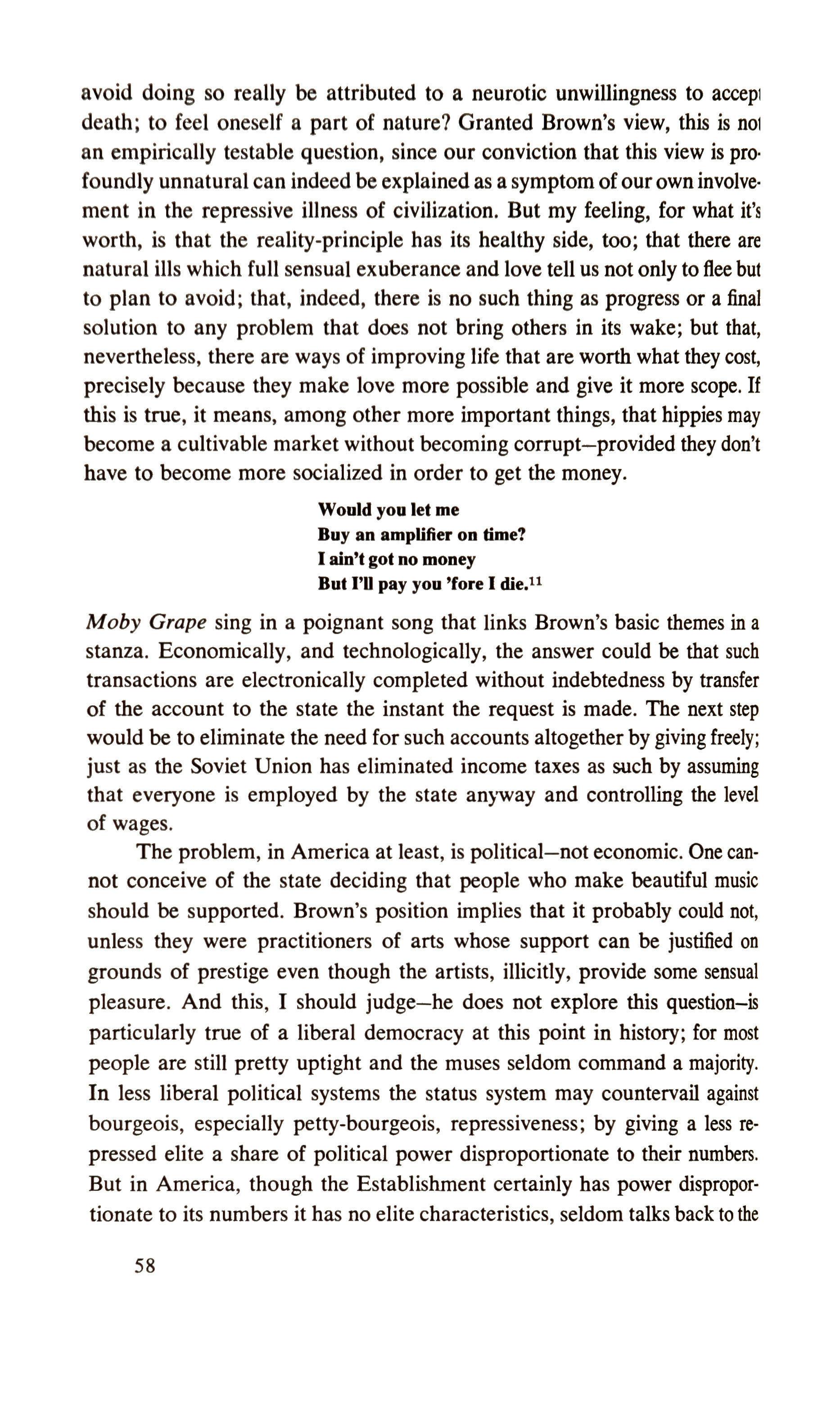
avoid doing so really be attributed to a neurotic unwillingness to accep death; to feel oneself a part of nature? Granted Brown's view, this is noi an empirically testable question, since our conviction that this view is profoundly unnatural can indeed be explained as a symptom of our own involvement in the repressive illness of civilization. But my feeling, for what it's worth, is that the reality-principle has its healthy side, too; that there are natural ills which full sensual exuberance and love tell us not only to flee but to plan to avoid; that, indeed, there is no such thing as progress or a final solution to any problem that does not bring others in its wake; but that, nevertheless, there are ways of improving life that are worth what they cost, precisely because they make love more possible and give it more scope. If this is true, it means, among other more important things, that hippies may become a cultivable market without becoming corrupt provided they don't have to become more socialized in order to get the money.
Would you let me
Buy an amplifier on time?
laiu't got no money
But I'D pay you 'fore I die.I1
Moby Grape sing in a poignant song that links Brown's basic themes in a stanza. Economically, and technologically, the answer could be that such transactions are electronically completed without indebtedness by transfer of the account to the state the instant the request is made. The next step would be to eliminate the need for such accounts altogetherby giving freely; just as the Soviet Union has eliminated income taxes as such by assuming that everyone is employed by the state anyway and controlling the level of wages.
The problem, in America at least, is political not economic. One cannot conceive of the state deciding that people who make beautiful music should be supported. Brown's position implies that it probably could not, unless they were practitioners of arts whose support can be justified on grounds of prestige even though the artists, illicitly, provide some sensual pleasure. And this, I should judge he does not explore this question-is particularly true of a liberal democracy at this point in history; for most people are still pretty uptight and the muses seldom command a majority. In less liberal political systems the status system may countervail against bourgeois, especially petty-bourgeois, repressiveness; by giving a less repressed elite a share of political power disproportionate to their numbers. But in America, though the Establishment certainly has power disproportionate to its numbers it has no elite characteristics, seldom talks back to the
58
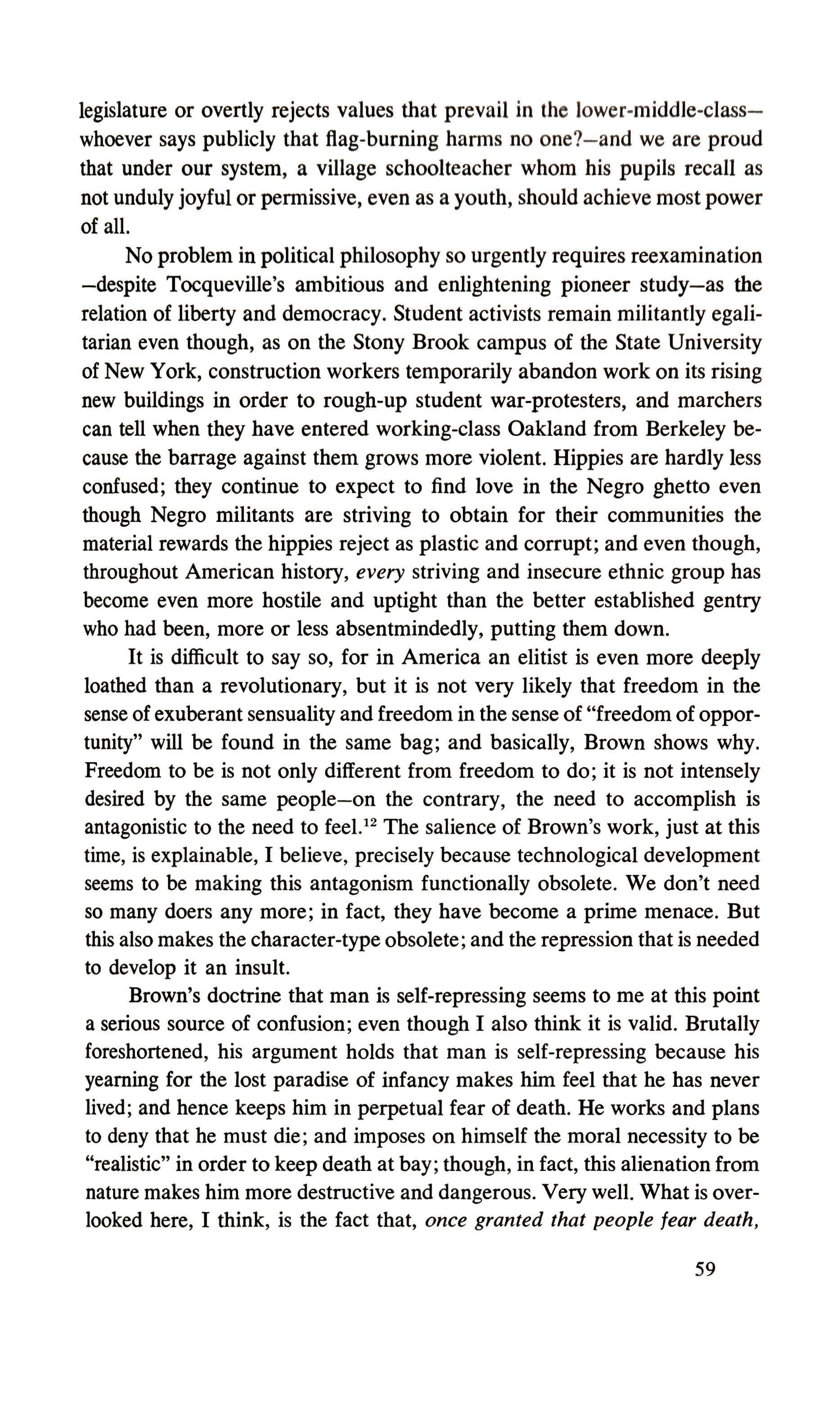
legislature or overtly rejects values that prevail in the lower-middle-classwhoever says publicly that flag-burning harms no one? and we are proud that under our system, a village schoolteacher whom his pupils recall as not unduly joyful or pelmissive, even as a youth, should achieve most power of all.
No problem in political philosophy so urgently requires reexamination -despite Tocqueville's ambitious and enlightening pioneer study as the relation of liberty and democracy. Student activists remain militantly egalitarian even though, as on the Stony Brook campus of the State University of New York, construction workers temporarily abandon work on its rising new buildings in order to rough-up student war-protesters, and marchers can tell when they have entered working-class Oakland from Berkeley because the barrage against them grows more violent. Hippies are hardly less confused; they continue to expect to find love in the Negro ghetto even though Negro militants are striving to obtain for their communities the material rewards the hippies reject as plastic and corrupt; and even though, throughout American history, every striving and insecure ethnic group has become even more hostile and uptight than the better established gentry who had been, more or less absentmindedly, putting them down.
It is difficult to say so, for in America an elitist is even more deeply loathed than a revolutionary, but it is not very likely that freedom in the sense of exuberant sensuality and freedom in the sense of "freedom of opportunity" will be found in the same bag; and basically, Brown shows Why. Freedom to be is not only different from freedom to do; it is not intensely desired by the same people on the contrary, the need to accomplish is antagonistic to the need to feel." The salience of Brown's work, just at this time, is explainable, I believe, precisely because technological development seems to be making this antagonism functionally obsolete. We don't need so many doers any more; in fact, they have become a prime menace. But this also makes the character-type obsolete; and the repression that is needed to develop it an insult.
Brown's doctrine that man is self-repressing seems to me at this point a serious source of confusion; even though I also think it is valid. Brutally foreshortened, his argument holds that man is self-repressing because his yearning for the lost paradise of infancy makes hiln feel that he has never lived; and hence keeps him in perpetual fear of death. He works and plans to deny that he must die; and imposes on himself the moral necessity to be "realistic" in order to keep death at bay; though, in fact, this alienation from nature makes him more destructive and dangerous. Very well. What is overlooked here, I think, is the fact that, once granted that people fear death,
59

even though that fear may be a sign of sickness unto death, the reality-principle becomes partly realistic. In societies where people work, save, amass capital, and develop technology they live longer not happier, but longer. Fear of death may be neurotic, and make a neurosis of life but the kookiest neuroses of all are those in which only the major premise is mad, and the rest perfectly logical. What is mad is to prefer a long life to a good life; to complain, like the guest at the proverbial Catskill resort, that "Not only is the food awful, but the portions are so small." But if one does, puritanism made sense, till about 1910.
What technology may have done is break the logical chain without having to repudiate the universal premise. For it is no longer true that society must institutionalize a characterological drive to work and save in order to postpone death. The social need to postpone death has, in economic terms, become roughly equivalent to the putative craving of pregnant women for pickles; it makes no sense, but if that's what you want we have barrels of them. Eat and enjoy.
But may there not then be a de-escalating effect? Man will remain selfrepressing; and this repression will result in some alienation and ultimately in destructive hostility. But how much, in a society that no longer needs to put his repression to work? Much less, certainly; and this, I believe, is the kernel of implicit optimism that makes Brown appealing to the turned-on young. The very widespread revolt of American youth against all repressive social institutions that against high school restrictions seems particularly overdue suggests that they perceive that repression will not be functional for them to the degree that it was for their elders. Most commentators on current youthful "unrest" they are better rested, actually, than their eagerbeaver predecessors agree in attributing the relative freedom of these young people to their having been spared the anxieties of the depression that fortfled their parents' character. But commentators are middle-aged themselves; and speak as if this must somehow be an aberration; the anxiety of the parents is "realistic" and the kids are just enjoying a boom, like grasshoppers in a mild autumn.
Suppose, though, the young people's instincts are right? For them, and hopefully their children, the reality-principle may become something quite mild; and even benign. There are many myths; and one of the most central holds that it is the balanced and orderly Apollo who is the God of the muses, poetry, and light; and that he is a beautiful person. Dionysos makes the festivities swing; but the most moving celebrations are not held in his honor. This, surely, is the myth of a people only moderately afraid of life, or death;
60
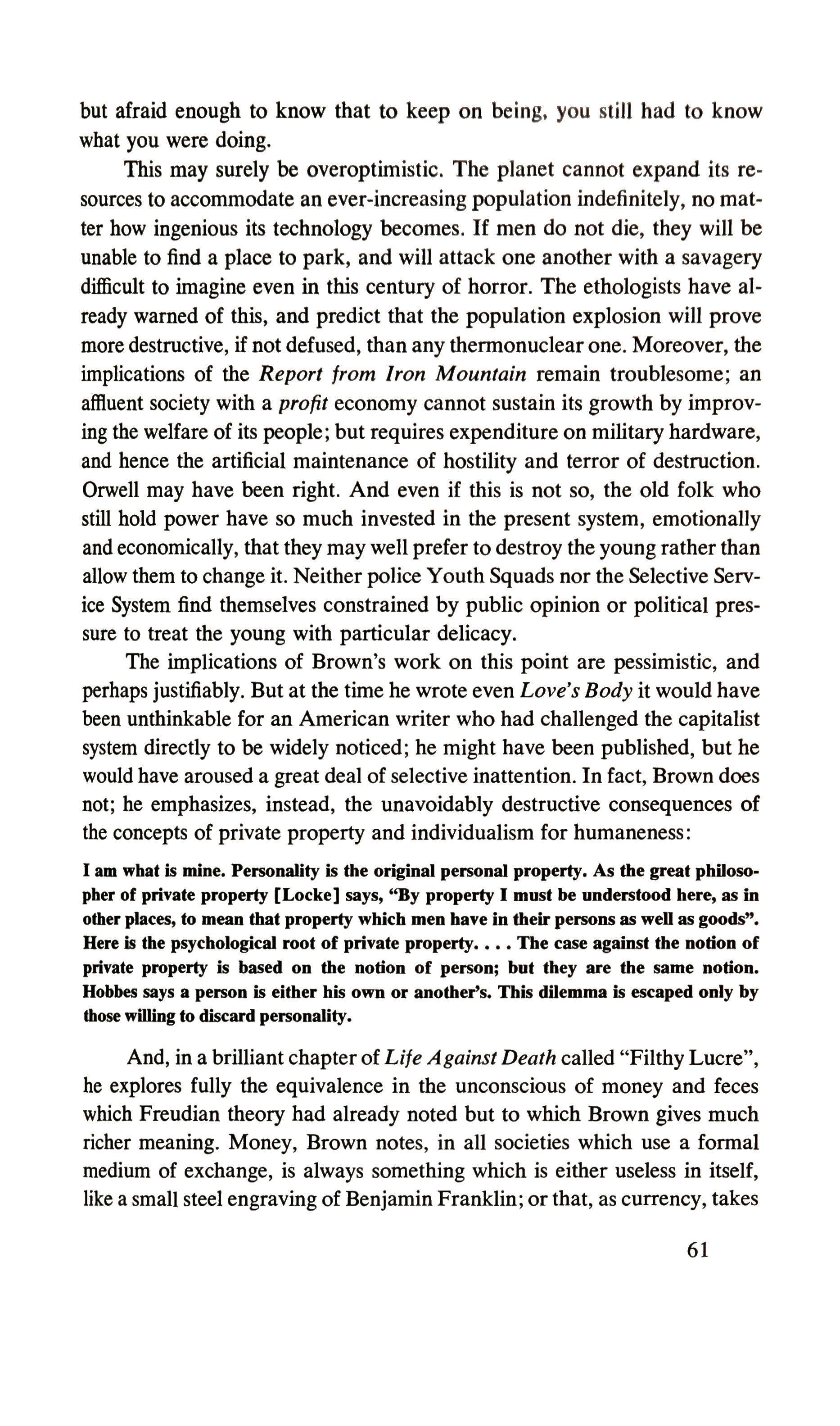
but afraid enough to know that to keep on being, you still had to know what you were doing.
This may surely be overoptimistic. The planet cannot expand its resources to accommodate an ever-increasing population indefinitely, no matter how ingenious its technology becomes. If men do not die, they will be unable to find a place to park, and will attack one another with a savagery difficult to imagine even in this century of horror. The ethologists have already warned of this, and predict that the population explosion will prove more destructive, if not defused, than any thermonuclear one. Moreover, the implications of the Report from Iron Mountain remain troublesome; an affluent society with a profit economy cannot sustain its growth by improving the welfare of its people; but requires expenditure on military hardware, and hence the artificial maintenance of hostility and terror of destruction. Orwell may have been right. And even if this is not so, the old folk who still hold power have so much invested in the present system, emotionally and economically, that they may well prefer to destroy the young rather than allow them to change it. Neither police Youth Squads nor the Selective Service System find themselves constrained by public opinion or political pressure to treat the young with particular delicacy.
The implications of Brown's work on this point are pessimistic, and perhaps justifiably. But at the time he wrote even Love's Body it would have been unthinkable for an American writer who had challenged the capitalist system directly to be widely noticed; he might have been published, but he would have aroused a great deal of selective inattention. In fact, Brown does not; he emphasizes, instead, the unavoidably destructive consequences of the concepts of private property and individualism for humaneness:
I am what is mine. Personality is the original personal property. As the great philosopher of private property [Locke] says, ''By property I must be understood here, as in other places, to mean that property which men have in their persons as well as goods". Here is the psychological root of private property The case against the notion of private property is based on the notion of person; but they are the same notion. Hobbes says a person is either his own or another's. This dilemma is escaped only by those willing to discard personality.
And, in a brilliant chapter of Life Against Death called "Filthy Lucre", he explores fully the equivalence in the unconscious of money and feces which Freudian theory had already noted but to which Brown gives much richer meaning. Money, Brown notes, in all societies which use a formal medium of exchange, is always something which is either useless in itself, like a small steel engraving of Benjamin Franklin; or that, as currency, takes
61

a form in which it has no utility, like the copper sheets used in Kwakiutl potlatches or the broken gongs of the Alorese. And it surely cannot be coincidence that the most uptight country in the world, and the only remaining one to officially impose racial segregation and a neurotically-complex system of it at that on people or to have devised such a punishment as internal "banishment" should be the one that became important to the world's economy by contributing to it not the product of any man's creative actbut gold. Such a people is truly Faustian; one might almost expect them to succeed in transplanting the heart of one human being to another who would have, with his whole being, to reject it. South Africa is a Brownian fable.
But that does not make it a logical necessity. Brown's statement about the relationship between property and personality means, as I understand it, exactly the same thing as McLuhan's observations about the relationships between print-orientation and industrialism, on the one hand, and individualism on the other. But it is this relationship, McLuhan correctly notes, which is dying, in the process that he calls electronically-induced retribalization. Hippies are one of the new tribes. Even Brown's strictures about the fecality of money, which depend upon the undoubtedly valid inference that willingness to hoard and defer satisfaction is an anal-erotic character trait, really do not apply to our much-maligned credit-card economy to the same degree; and as credit replaces money more nearly universally, they may cease to apply at all. Curiously enough, this is no shit!
American society, and in some respects the underlying economy as well at least as it affects consumption is changing in such a way as to become less repressive. Even the Vietnam war has, I think, helped with this. It may, of course, snap back in our faces at any time as a new and more vicious McCarthyism; the enabling legislation is on the books and the concentration camps built as places of administrative detention under the Internal Security Act of 1950 have recently been refurbished. But even if it does, it will be McCarthyism with a difference; more brutal, probably, but certainly less legitimate. The honky, self-righteous tone cannot survive the cynicism of the victims, who will not this time immolate themselves so willingly in agonized efforts to placate the Establishment. Even though he can have them fired or locked up, it seems clear that a lot ofpeoplejust aren't going to take off Joe Pool what Joe McCarthy dished out a decade ago. The Vietnam war has drained the American social system of its legitimacy; and legitimacy is the lubricant that prevents social systems from destroying themselves through internal friction. If it survives, it will have to be rebored and rebuilt; and many of the young people who are comingalong have made it very clear indeed as Leonard Ross's H*Y*M*A*N K*A*P*L*A*N
62
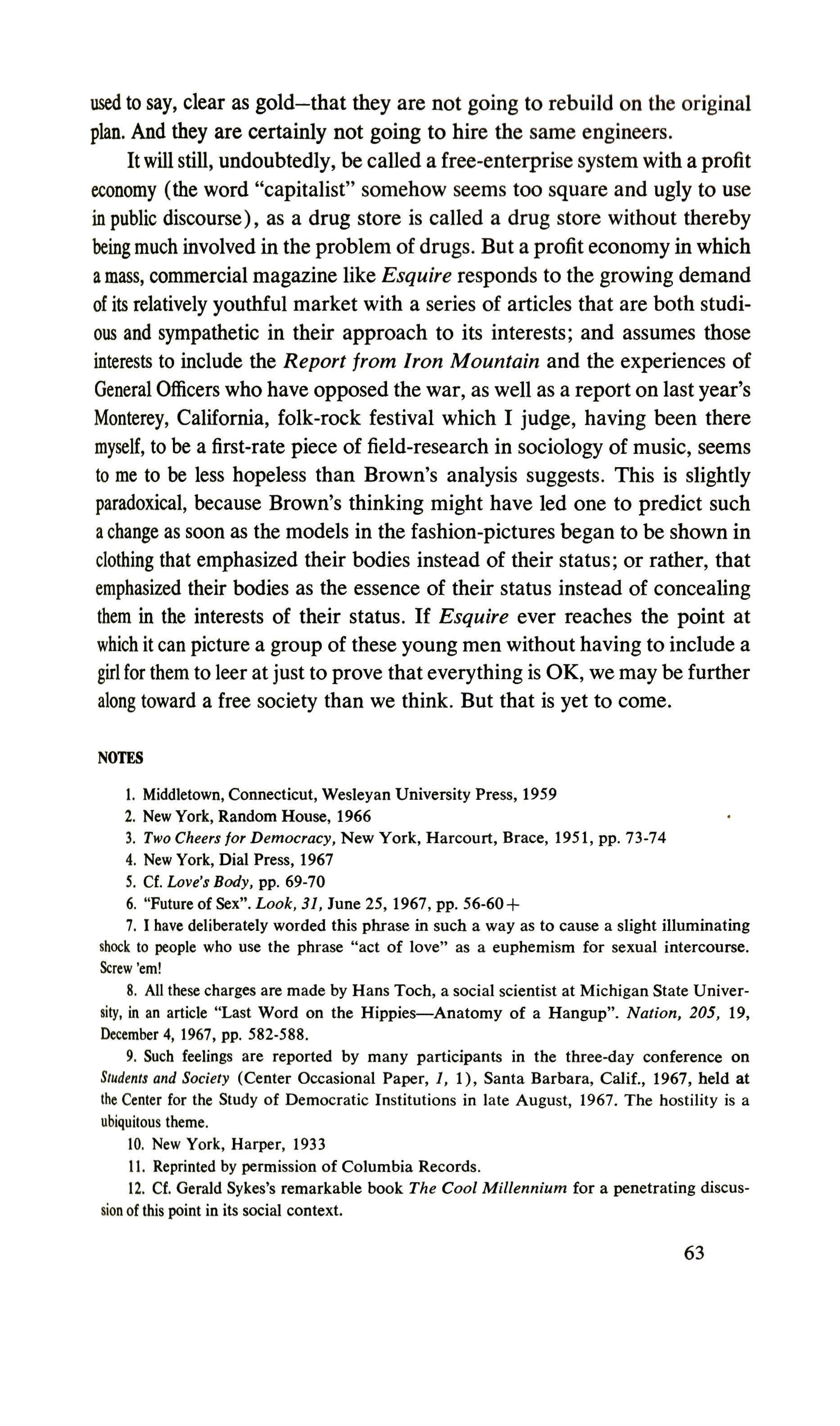
used to say, clear as gold that they are not going to rebuild on the original plan. And they are certainly not going to hire the same engineers. It will still, undoubtedly, be called a free-enterprise system with a profit economy (the word "capitalist" somehow seems too square and ugly to use in public discourse), as a drug store is called a drug store without thereby being much involved in the problem of drugs. But a profit economy in which a mass, commercial magazine like Esquire responds to the growing demand of its relatively youthful market with a series of articles that are both studious and sympathetic in their approach to its interests; and assumes those interests to include the Report from Iron Mountain and the experiences of General Officers who have opposed the war, as well as a report on last year's Monterey, California, folk-rock festival which I judge, having been there myself, to be a first-rate piece of field-research in sociology of music, seems to me to be less hopeless than Brown's analysis suggests. This is slightly paradoxical, because Brown's thinking might have led one to predict such a change as soon as the models in the fashion-pictures began to be shown in clothing that emphasized their bodies instead of their status; or rather, that emphasized their bodies as the essence of their status instead of concealing them in the interests of their status. If Esquire ever reaches the point at which it can picture a group of these young men without having to include a girl for them to leer at just to prove that everything is OK, we may be further along toward a free society than we think. But that is yet to come.
NOTES
1. Middletown, Connecticut, Wesleyan University Press, 1959
2. New York, Random House, 1966
3. Two Cheers for Democracy, New York, Harcourt, Brace, 1951, pp. 73-74
4. New York, Dial Press, 1967
S. Cf. Love's Body, pp, 69-70
6. "Future of Sex". Look, 31, June 25, 1967, pp. 56-60+
7. I have deliberately worded this phrase in such a way as to cause a slight illuminating shock to people who use the phrase "act of love" as a euphemism for sexual intercourse. Screw 'em!
8. All these charges are made by Hans Toch, a social scientist at Michigan State University, in an article "Last Word on the Hippies Anatomy of a Hangup". Nation, 205, 19, December 4, 1967, pp. 582-588.
9. Such feelings are reported by many participants in the three-day conference on Students and Society (Center Occasional Paper, 1, 1), Santa Barbara, Calif., 1967, held at the Center for the Study of Democratic Institutions in late August, 1967. The hostility is a ubiquitous theme.
10. New York, Harper, 1933
11. Reprinted by permission of Columbia Records.
12. Cf. Gerald Sykes's remarkable book The Cool Millennium for a penetrating discussion of this point in its social context.
63
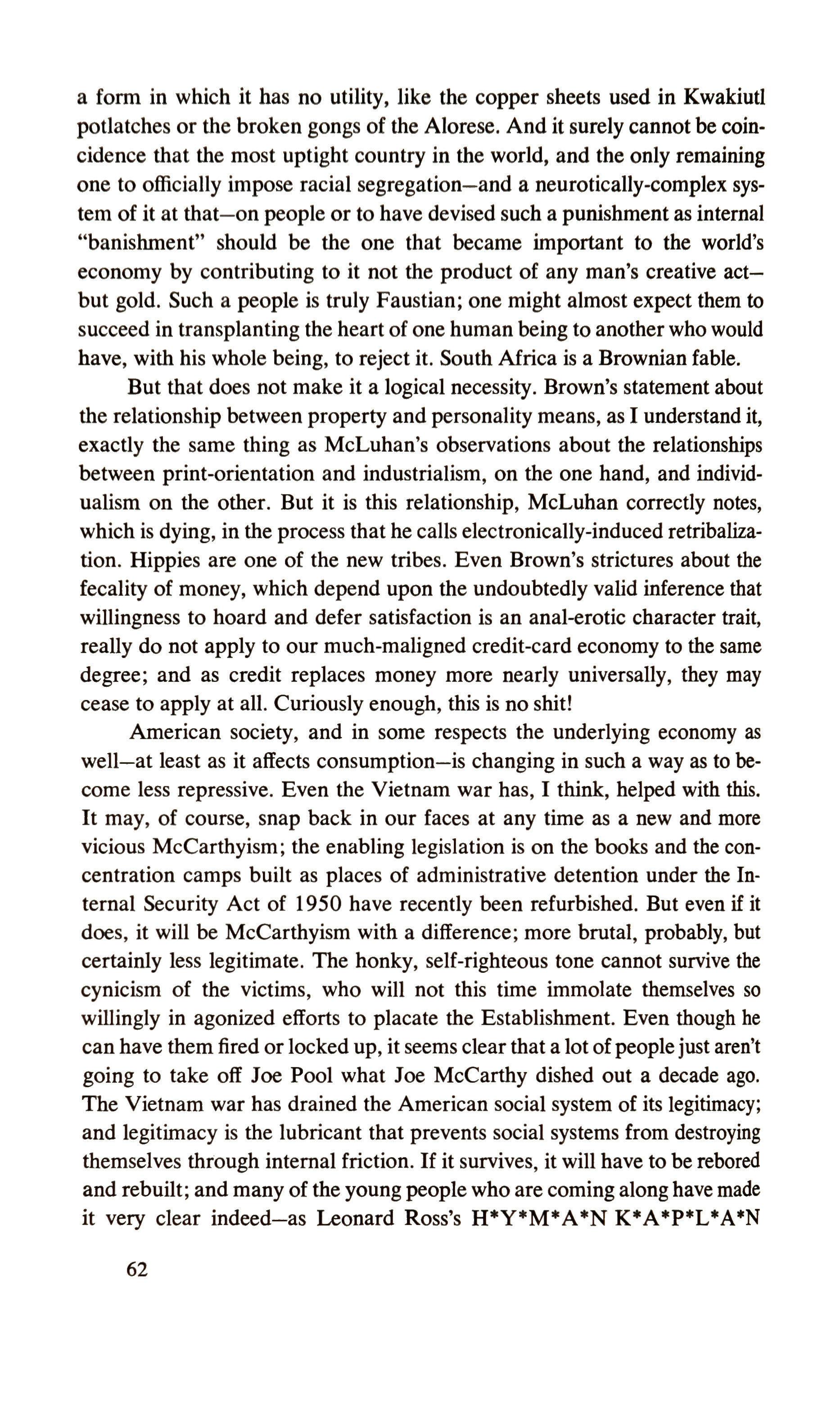
a form in which it has no utility, like the copper sheets used in Kwakiutl potlatches or the broken gongs of the Alorese. And it surely cannot be coincidence that the most uptight country in the world, and the only remaining one to officially impose racial segregation and a neurotically-complex system of it at that on people or to have devised such a punishment as internal "banishment" should be the one that became important to the world's economy by contributing to it not the product of any man's creative actbut gold. Such a people is truly Faustian; one might almost expect them to succeed in transplanting the heart of one human being to another who would have, with his whole being, to reject it. South Africa is a Brownian fable.
But that does not make it a logical necessity. Brown's statement about the relationship between property and personality means, as I understand it, exactly the same thing as McLuhan's observations about the relationships between print-orientation and industrialism, on the one hand, and individualism on the other. But it is this relationship, McLuhan correctly notes, which is dying, in the process that he calls electronically-induced retribalization. Hippies are one of the new tribes. Even Brown's strictures about the fecality of money, which depend upon the undoubtedly valid inference that willingness to hoard and defer satisfaction is an anal-erotic character trait, really do not apply to our much-maligned credit-card economy to the same degree; and as credit replaces money more nearly universally, they may cease to apply at all. Curiously enough, this is no shit!
American society, and in some respects the underlying economy as well at least as it affects consumption is changing in such a way as to become less repressive. Even the Vietnam war has, I think, helped with this. It may, of course, snap back in our faces at any time as a new and more vicious McCarthyism; the enabling legislation is on the books and the concentration camps built as places of administrative detention under the Internal Security Act of 1950 have recently been refurbished. But even if it does, it will be McCarthyism with a difference; more brutal, probably, but certainly less legitimate. The honky, self-righteous tone cannot survive the cynicism of the victims, who will not this time immolate themselves so willingly in agonized efforts to placate the Establishment. Even though he can have them fired or locked up, it seems clear that a lot ofpeoplejust aren't going to take off Joe Pool what Joe McCarthy dished out a decade ago. The Vietnam war has drained the American social system of its legitimacy; and legitimacy is the lubricant that prevents social systems from destroying themselves through internal friction. If it survives, it will have to be rebored and rebuilt; and many of the young people who are coming along have made it very clear indeed as Leonard Ross's H*Y*M*A*N K*A*P*L*A*N
62
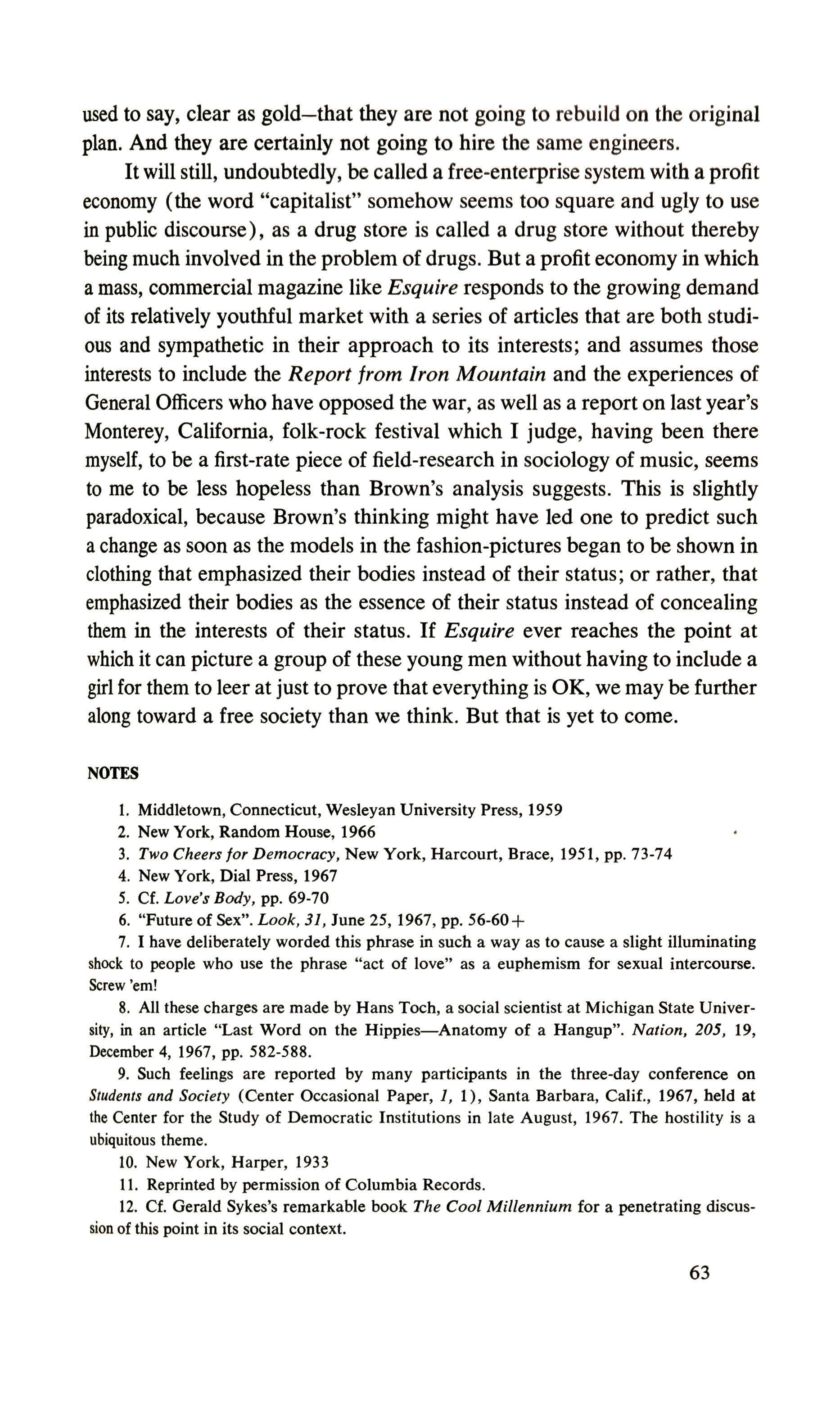
used to say, clear as gold that they are not going to rebuild on the original plan. And they are certainly not going to hire the same engineers. It will still, undoubtedly, be called a free-enterprise system with a profit economy (the word "capitalist" somehow seems too square and ugly to use in public discourse), as a drug store is called a drug store without thereby being much involved in the problem of drugs. But a profit economy in which a mass, commercial magazine like Esquire responds to the growing demand of its relatively youthful market with a series of articles that are both studious and sympathetic in their approach to its interests; and assumes those interests to include the Report from Iron Mountain and the experiences of General Officers who have opposed the war, as well as a report on last year's Monterey, California, folk-rock festival which I judge, having been there myself, to be a first-rate piece of field-research in sociology of music, seems to me to be less hopeless than Brown's analysis suggests. This is slightly paradoxical, because Brown's thinking might have led one to predict such a change as soon as the models in the fashion-pictures began to be shown in clothing that emphasized their bodies instead of their status; or rather, that emphasized their bodies as the essence of their status instead of concealing them in the interests of their status. If Esquire ever reaches the point at which it can picture a group of these young men without having to include a girl for them to leer at just to prove that everything is OK, we may be further along toward a free society than we think. But that is yet to come.
NOTES
1. Middletown, Connecticut, Wesleyan University Press, 1959
2. New York, Random House, 1966
3. Two Cheers for Democracy, New York, Harcourt, Brace, 1951, pp. 73-74
4. New York, Dial Press, 1967
5. Cf. Love's Body, pp. 69-70
6. "Future of Sex". Look, 31, June 25, 1967, pp. 56-60+
7. I have deliberately worded this phrase in such a way as to cause a slight illuminating shock to people who use the phrase "act of love" as a euphemism for sexual intercourse. Screw 'em!
8. All these charges are made by Hans Toch, a social scientist at Michigan State University, in an article "Last Word on the Hippies Anatomy of a Hangup", Nation, 205, 19, December 4, 1967, pp. 582-588.
9. Such feelings are reported by many participants in the three-day conference on Students and Society (Center Occasional Paper, 1, 1), Santa Barbara, Calif., 1967, held at the Center for the Study of Democratic Institutions in late August, 1967. The hostility is a ubiquitous theme.
10. New York, Harper, 1933
11. Reprinted by permission of Columbia Records.
12. Cf. Gerald Sykes's remarkable book The Cool Millennium for a penetrating discussion of this point in its social context.
63
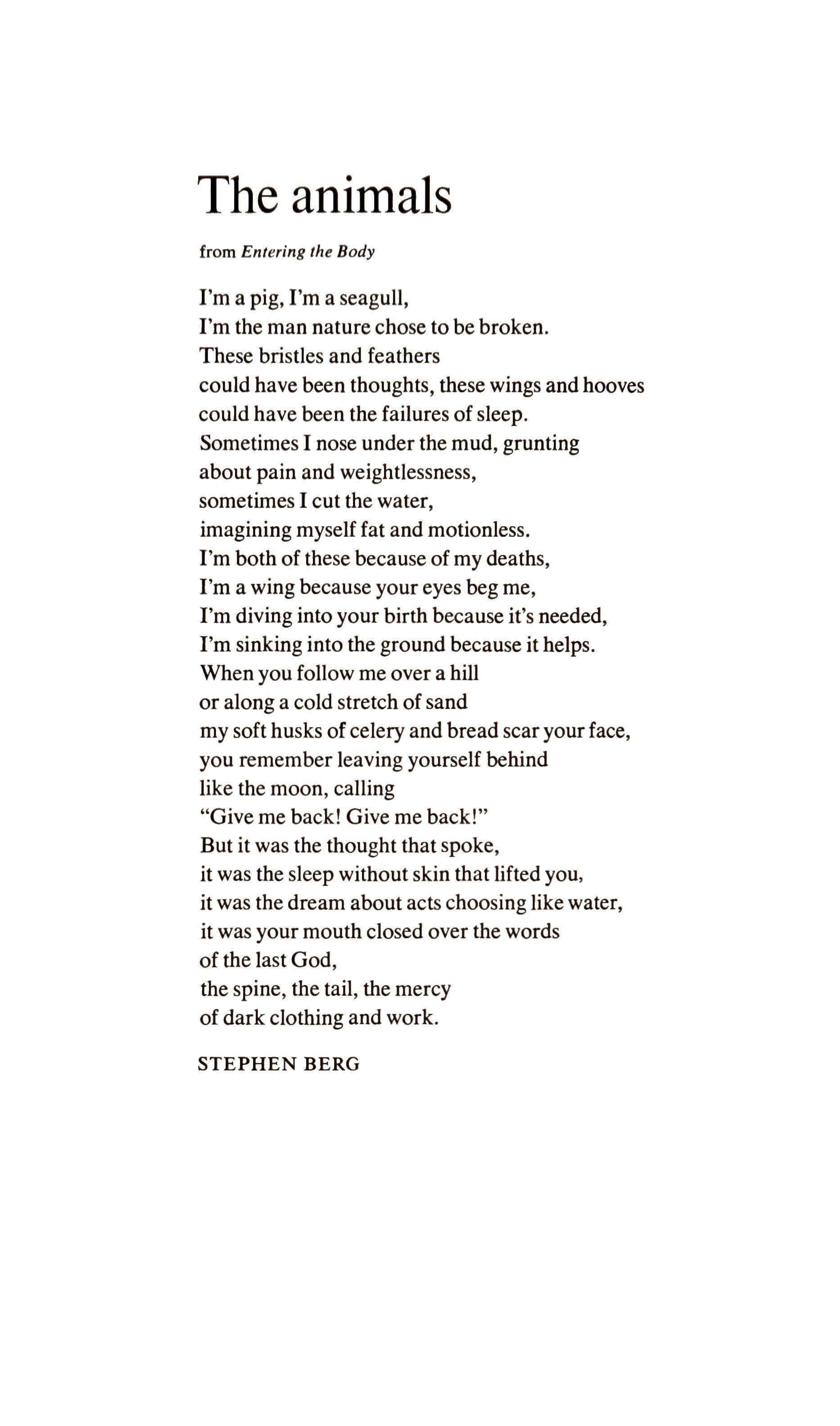
e ani
from Entering the Body
I'm a pig, I'm a seagull, I'm the man nature chose to be broken. These bristles and feathers could have been thoughts, these wings and hooves could have been the failures of sleep. Sometimes I nose under the mud, grunting about pain and weightlessness, sometimes I cut the water, imagining myself fat and motionless. I'm both of these because of my deaths, I'm a wing because your eyes beg me, I'm diving into your birth because it's needed, I'm sinking into the ground because it helps. When you follow me over a hill or along a cold stretch of sand my soft husks of celery and bread scar your face, you remember leaving yourself behind like the moon, calling "Give me back! Give me back!" But it was the thought that spoke, it was the sleep without skin that lifted you, it was the dream about acts choosing like water, it was your mouth closed over the words of the last God, the spine, the tail, the mercy of dark clothing and work.
STEPHEN BERG
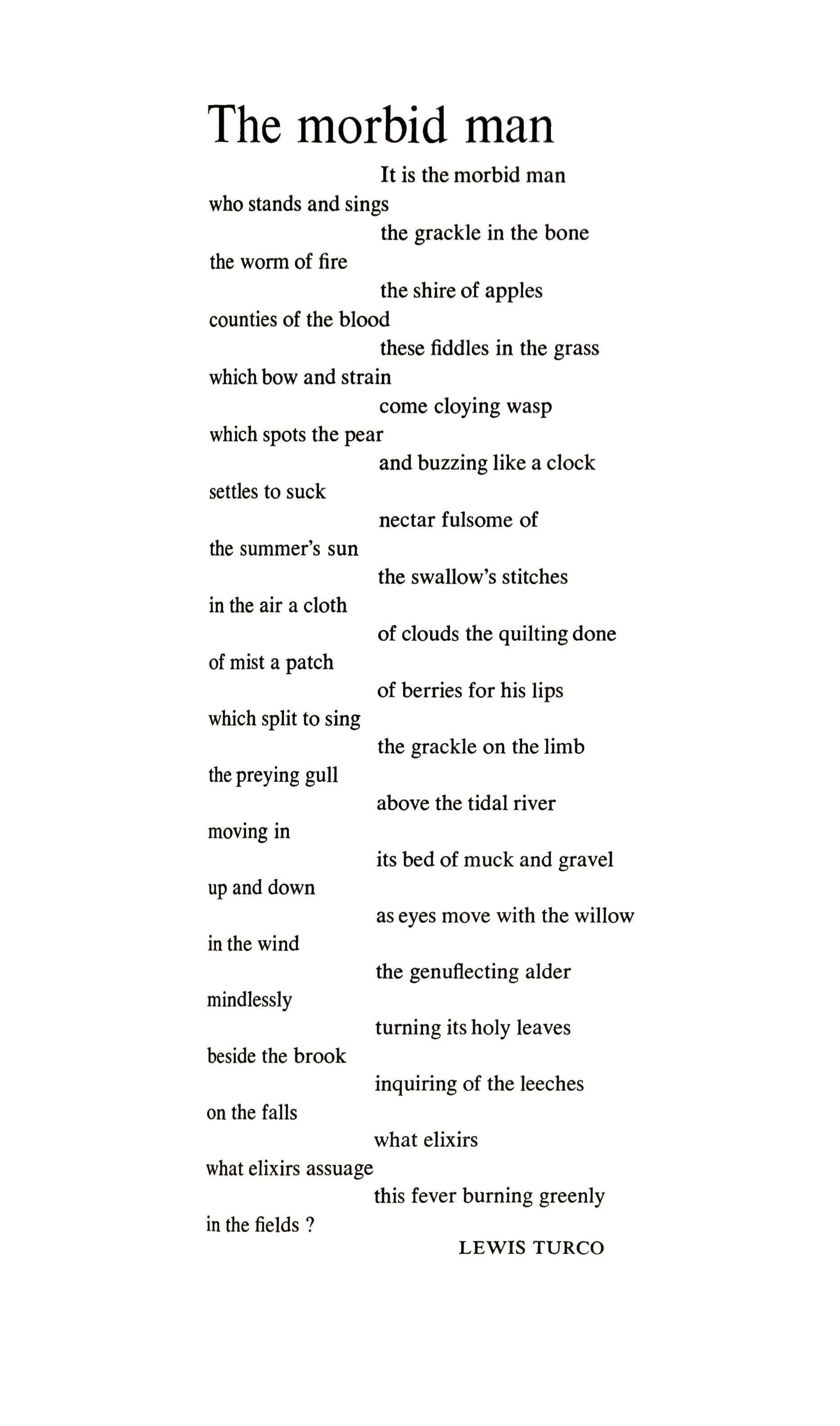
It is the morbid man who stands and sings the grackle in the bone the WOlIn of fire the shire of apples counties of the blood
these fiddles in the grass which bow and strain
come cloying wasp which spots the pear and buzzing like a clock settles to suck
nectar fulsome of the summer's sun
the swallow's stitches in the air a cloth of clouds the quilting done of mist a patch of berries for his lips which split to sing the grackle on the limb the preying gull
above the tidal river moving In its bed of muck and gravel up and down
as eyes move with the willow in the wind the genuflecting alder mindlessly turning its holy leaves beside the brook inquiring of the leeches on the falls what elixirs what elixirs assuage this fever burning greenly in the fields ?
LEWIS TURCO
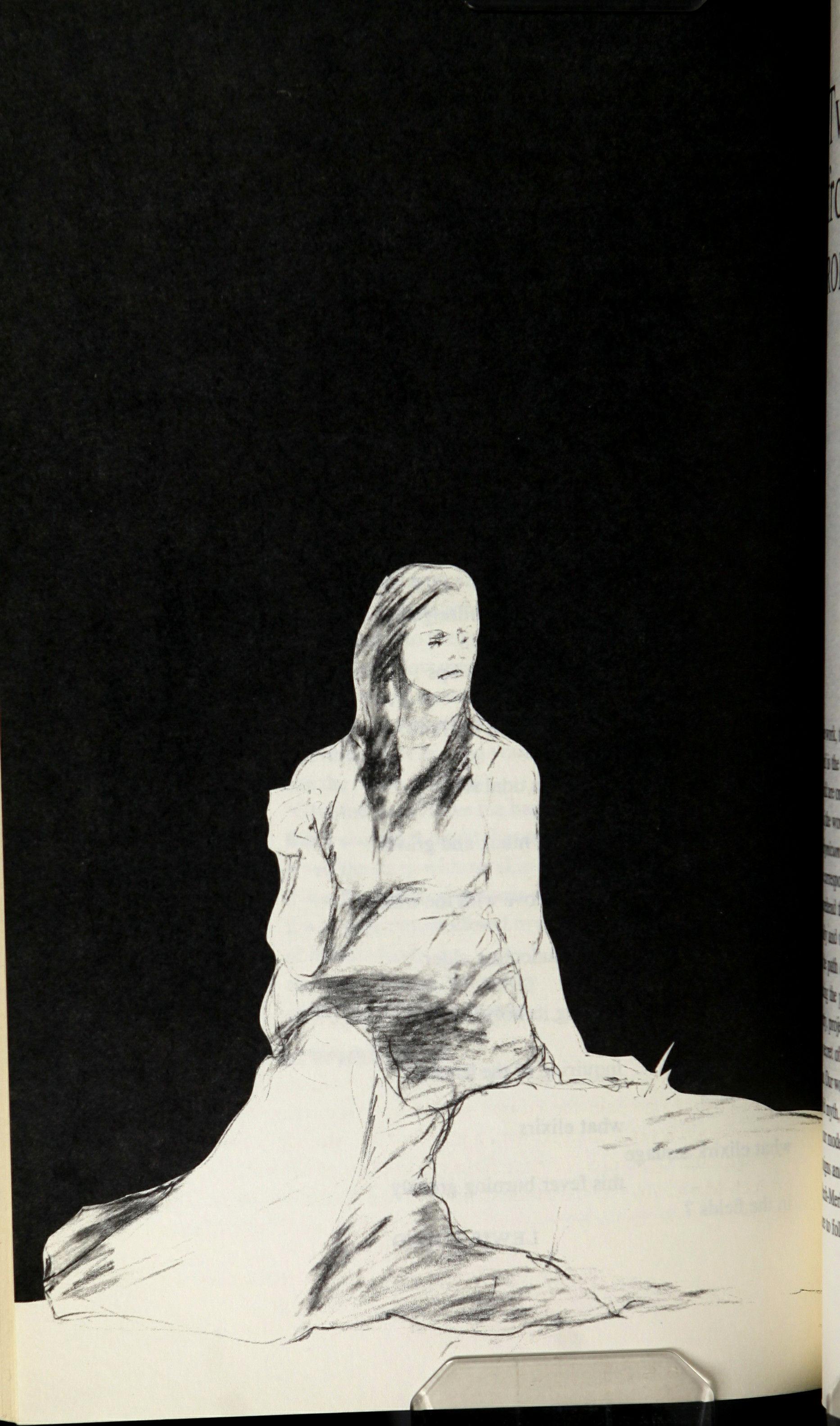
I I]j I /' '-,_ 'L_�--: ..c-- _--
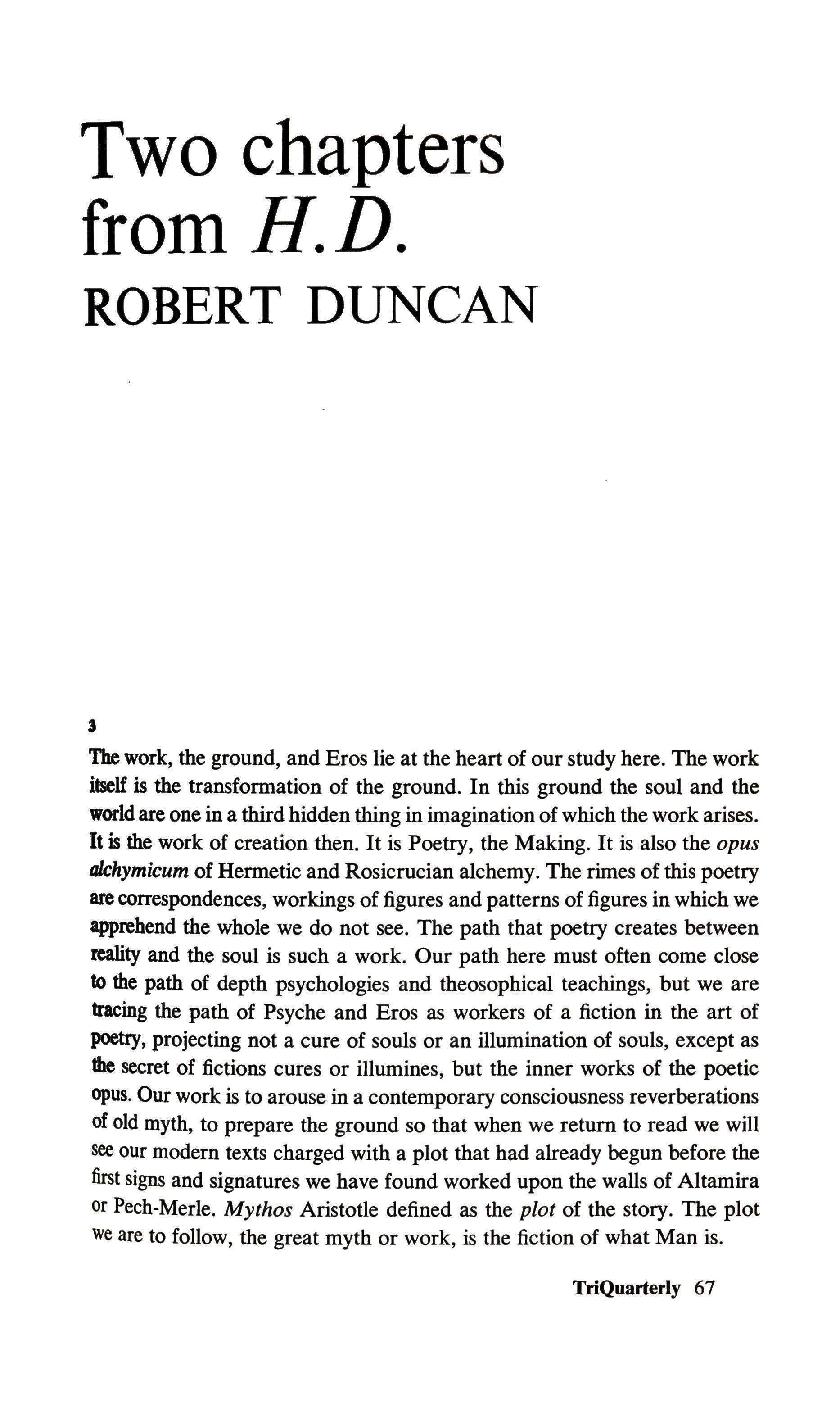
The work, the ground, and Eros lie at the heart of our study here. The work itself is the transformation of the ground. In this ground the soul and the world are one in a third hidden thing in imagination of which the work arises. It is the work of creation then. It is Poetry, the Making. It is also the opus akhymicum of Hermetic and Rosicrucian alchemy. The rimes of this poetry are correspondences, workings of figures and patterns of figures in which we apprehend the whole we do not see. The path that poetry creates between reality and the soul is such a work. Our path here must often come close to the path of depth psychologies and theosophical teachings, but we are tracing the path of Psyche and Eros as workers of a fiction in the art of poetry, projecting not a cure of souls or an illumination of souls, except as the secret of fictions cures or illumines, but the inner works of the poetic opus. Our work is to arouse in a contemporary consciousness reverberations of old myth, to prepare the ground so that when we return to read we will see our modern texts charged with a plot that had already begun before the first signs and signatures we have found worked upon the walls of Altamira or Pech-Merle. Mythos Aristotle defined as the plot of the story. The plot we are to follow, the great myth or work, is the fiction of what Man is.
TriQuarterly 67
3
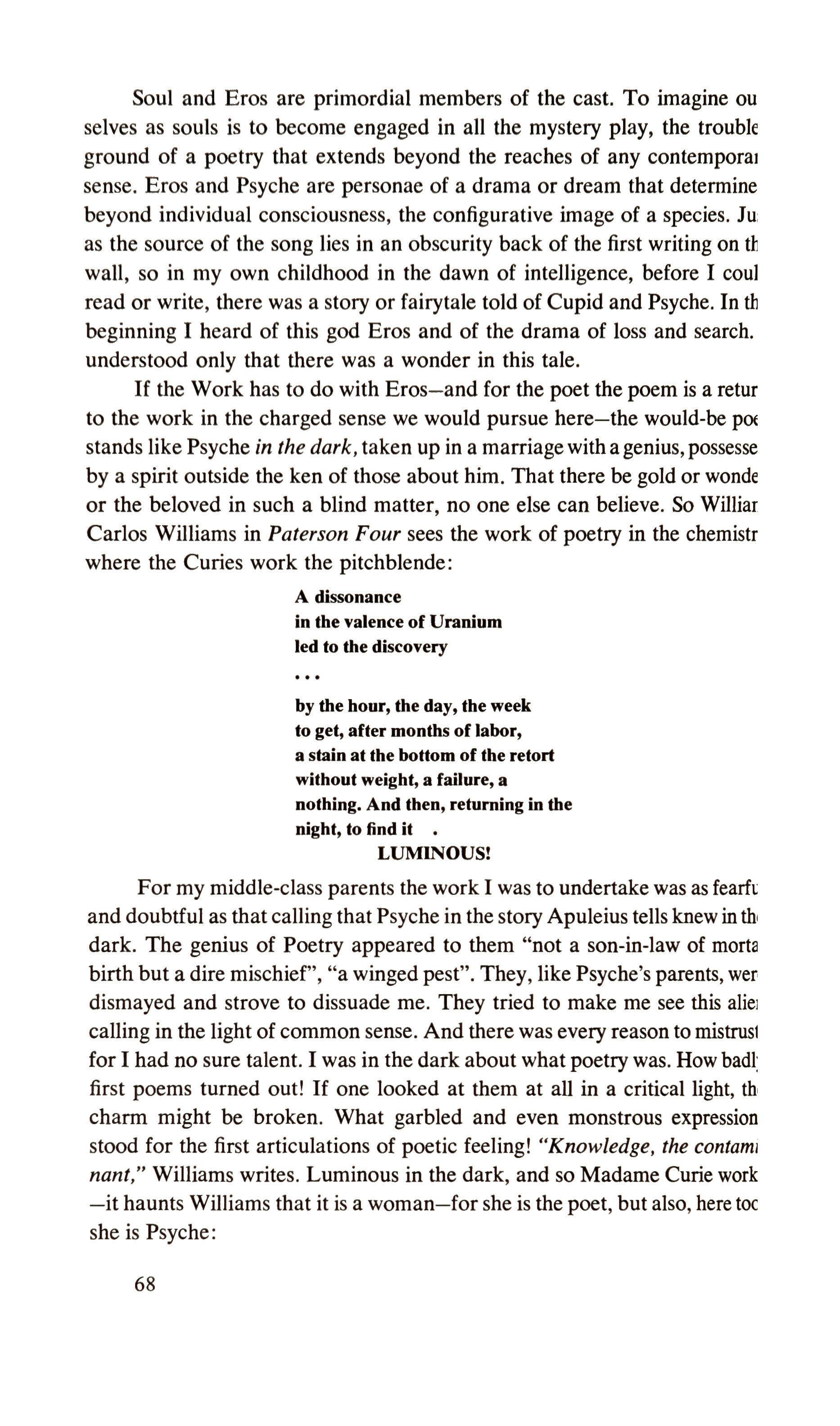
Soul and Eros are primordial members of the cast. To imagine ou selves as souls is to become engaged in all the mystery play, the trouble ground of a poetry that extends beyond the reaches of any contemporal sense. Eros and Psyche are personae of a drama or dream that determine beyond individual consciousness, the configurative image of a species. Ju as the source of the song lies in an obscurity back of the first writing on th wall, so in my own childhood in the dawn of intelligence, before I coul read or write, there was a story or fairytale told of Cupid and Psyche. In th beginning I heard of this god Eros and of the drama of loss and search. understood only that there was a wonder in this tale.
If the Work has to do with Eros and for the poet the poem is a retur to the work in the charged sense we would pursue here the would-be PO( stands like Psyche in the dark, taken up in a marriage with a genius, possesse by a spirit outside the ken of those about him. That there be gold or wonde or the beloved in such a blind matter, no one else can believe. So Williar Carlos Williams in Paterson Four sees the work of poetry in the chemistr where the Curies work the pitchblende:
A dissonance in the valence of Uranium led to the discovery
by the hour, the day, the week to get, after months of labor, a stain at the bottom of the retort without weight, a failure, a nothing. And then, returning in the night, to find it
LUMINOUS!
For my middle-class parents the work I was to undertake was as fearft and doubtful as that calling that Psyche in the story Apuleius tells knew in tb dark. The genius of Poetry appeared to them "not a son-in-law of morta birth but a dire mischief", "a winged pest". They, like Psyche's parents, wen dismayed and strove to dissuade me. They tried to make me see this aliei calling in the light of common sense. And there was every reason to mistrust for I had no sure talent. I was in the dark about what poetry was. How badl first poems turned out! If one looked at them at all in a critical light, th charm might be broken. What garbled and even monstrous expression stood for the first articulations of poetic feeling! "Knowledge, the contami nant;" Williams writes. Luminous in the dark, and so Madame Curie work -it haunts Williams that it is a woman for she is the poet, but also, here toe she is Psyche:
68
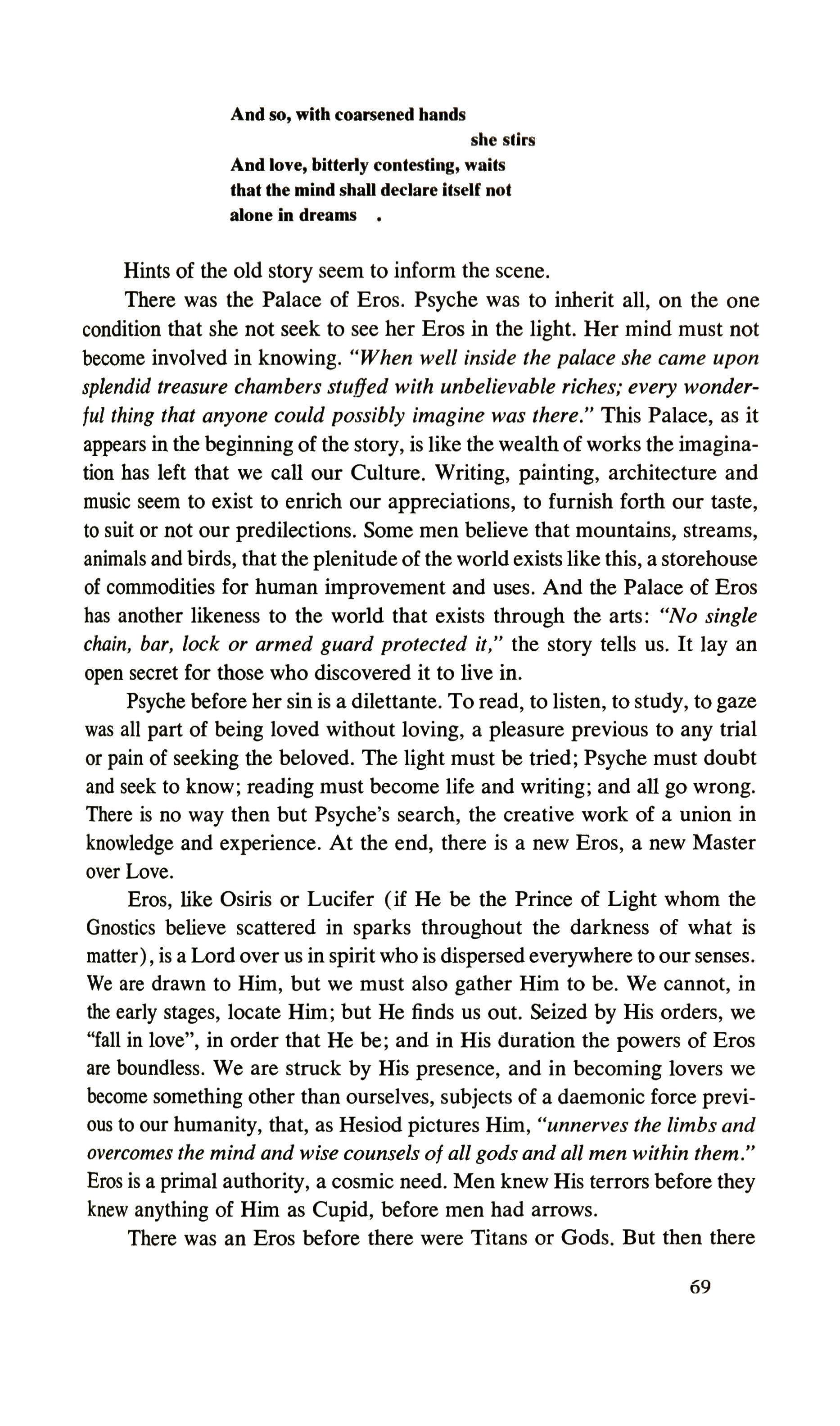
And so, with coarsened hands she stirs And love, bitterly contesting, waits that the mind shall declare itself not alone in dreams
Hints of the old story seem to inform the scene.
There was the Palace of Eros. Psyche was to inherit all, on the one condition that she not seek to see her Eros in the light. Her mind must not become involved in knowing. "When well inside the palace she came upon splendid treasure chambers stuffed with unbelievable riches,' every wonderful thing that anyone could possibly imagine was there." This Palace, as it appears in the beginning of the story, is like the wealth of works the imagination has left that we call our Culture. Writing, painting, architecture and music seem to exist to enrich our appreciations, to furnish forth our taste, to suit or not our predilections. Some men believe that mountains, streams, animals and birds, that the plenitude of the world exists like this, a storehouse of commodities for human improvement and uses. And the Palace of Eros has another likeness to the world that exists through the arts: "No single chain, bar, lock or armed guard protected it," the story tells us. It lay an open secret for those who discovered it to live in.
Psyche before her sin is a dilettante. To read, to listen, to study, to gaze was all part of being loved without loving, a pleasure previous to any trial or pain of seeking the beloved. The light must be tried; Psyche must doubt and seek to know; reading must become life and writing; and all go wrong. There is no way then but Psyche's search, the creative work of a union in knowledge and experience. At the end, there is a new Eros, a new Master over Love.
Eros, like Osiris or Lucifer (if He be the Prince of Light whom the Gnostics believe scattered in sparks throughout the darkness of what is matter), is a Lord over us in spirit who is dispersedeverywhere to our senses. We are drawn to Him, but we must also gather Him to be. We cannot, in the early stages, locate Him; but He finds us out. Seized by His orders, we "fall in love", in order that He be; and in His duration the powers of Eros are boundless. We are struck by His presence, and in becoming lovers we become something other than ourselves, subjects of a daemonic force previous to our humanity, that, as Hesiod pictures Him, "unnerves the limbs and overcomes the mind and wise counsels of all gods and all men within them." Eros is a primal authority, a cosmic need. Men knew His terrors before they knew anything of Him as Cupid, before men had arrows.
There was an Eros before there were Titans or Gods. But then there
69
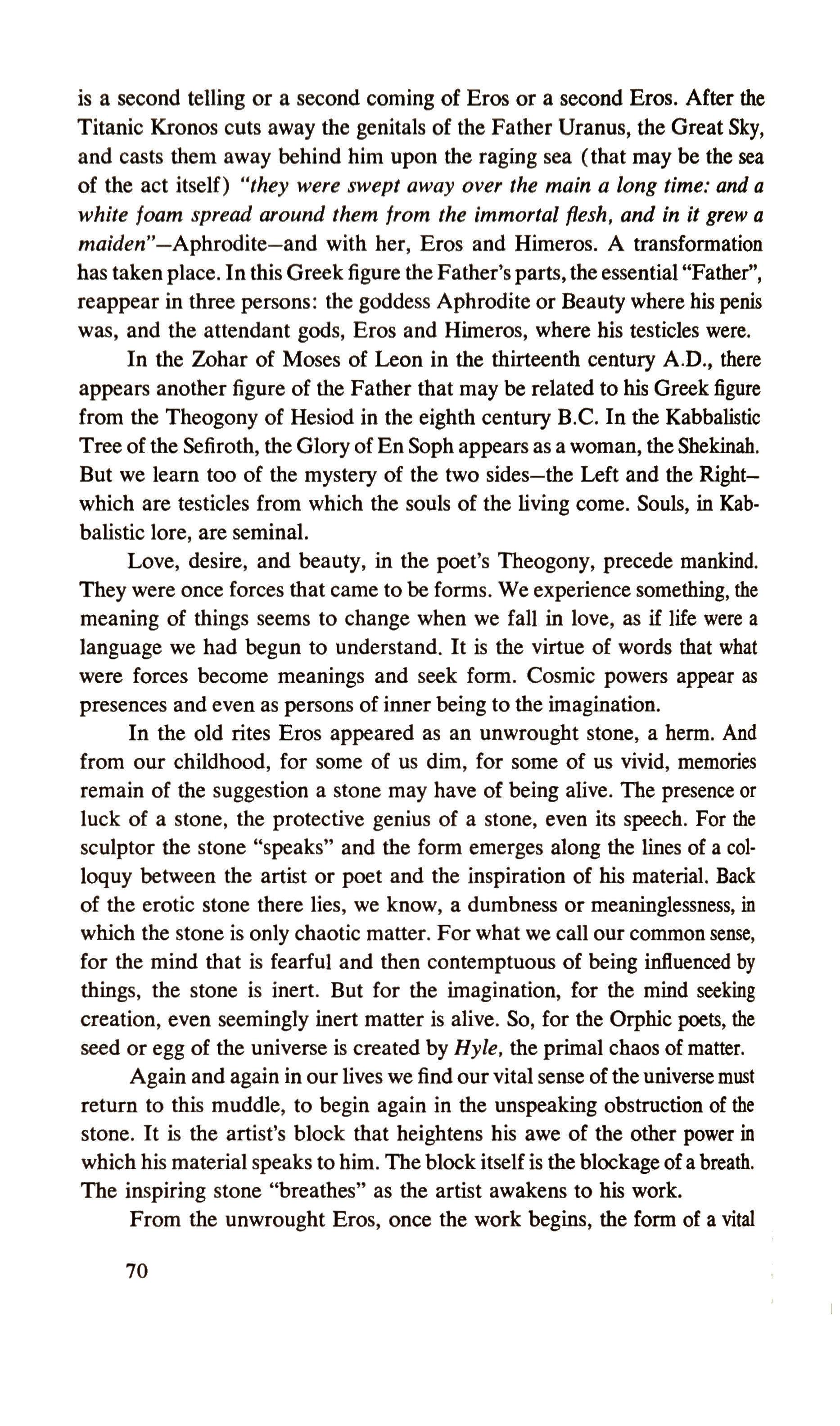
is a second telling or a second coming of Eros or a second Eros. After the Titanic Kronos cuts away the genitals of the Father Uranus, the Great Sky, and casts them away behind him upon the raging sea (that may be the sea of the act itself) "they were swept away over the main a long time.' and a white foam spread around them from the immortal flesh, and in it grew a maiden" Aphrodite and with her, Eros and Himeros. A transformation has taken place. In this Greek figure the Father's parts, the essential "Father", reappear in three persons: the goddess Aphrodite or Beauty where his penis was, and the attendant gods, Eros and Himeros, where his testicles were.
In the Zohar of Moses of Leon in the thirteenth century A.D., there appears another figure of the Father that may be related to his Greek figure from the Theogony of Hesiod in the eighth century B.C. In the Kabbalistic Tree of the Sefiroth, the Glory of En Soph appears as a woman, the Shekinah. But we learn too of the mystery of the two sides the Left and the Rightwhich are testicles from which the souls of the living come. Souls, in Kabbalistic lore, are seminal.
Love, desire, and beauty, in the poet's Theogony, precede mankind. They were once forces that came to be forms. We experience something, the meaning of things seems to change when we fall in love, as if life were a language we had begun to understand. It is the virtue of words that what were forces become meanings and seek form, Cosmic powers appear as presences and even as persons of inner being to the imagination.
In the old rites Eros appeared as an unwrought stone, a herm. And from our childhood, for some of us dim, for some of us vivid, memories remain of the suggestion a stone may have of being alive. The presence or luck of a stone, the protective genius of a stone, even its speech. For the sculptor the stone "speaks" and the form emerges along the lines of a colloquy between the artist or poet and the inspiration of his material. Back of the erotic stone there lies, we know, a dumbness or meaninglessness, in which the stone is only chaotic matter. For what we call our common sense, for the mind that is fearful and then contemptuous of being influenced by things, the stone is inert. But for the imagination, for the mind seeking creation, even seemingly inert matter is alive. So, for the Orphic poets, the seed or egg of the universe is created by Hyle, the primal chaos of matter. Again and again in our lives we find our vital sense of the universe must return to this muddle, to begin again in the unspeaking obstruction of the stone. It is the artist's block that heightens his awe of the other power in which his material speaks to him. The block itself is the blockage of a breath. The inspiring stone "breathes" as the artist awakens to his work.
From the unwrought Eros, once the work begins, the form of a vital
70
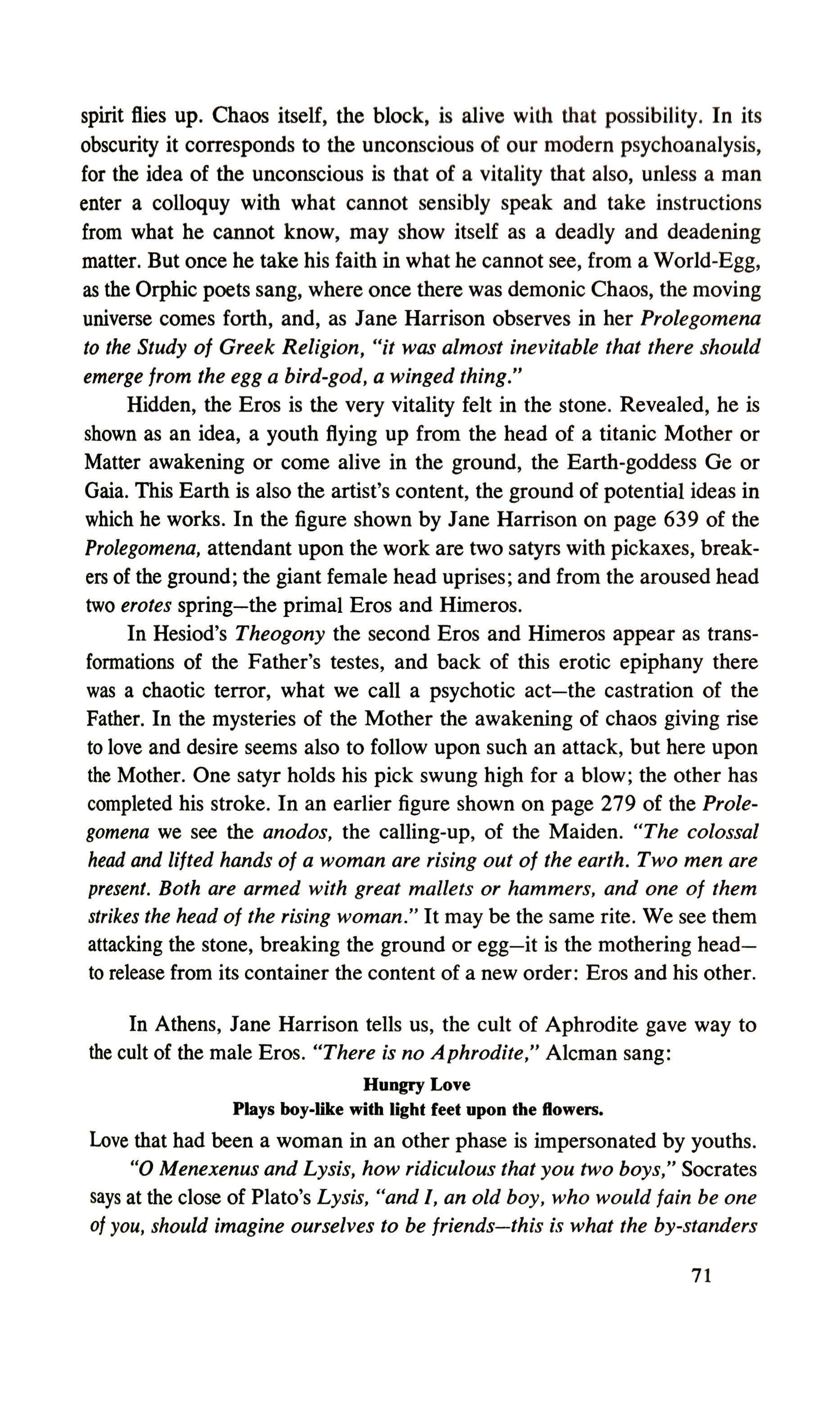
spirit flies up. Chaos itself, the block, is alive with that possibility. In its obscurity it corresponds to the unconscious of our modern psychoanalysis, for the idea of the unconscious is that of a vitality that also, unless a man enter a colloquy with what cannot sensibly speak and take instructions from what he cannot know, may show itself as a deadly and deadening matter. But once he take his faith in what he cannot see, from a World-Egg, as the Orphic poets sang, where once there was demonic Chaos, the moving universe comes forth, and, as Jane Harrison observes in her Prolegomena to the Study of Greek Religion, "it was almost inevitable that there should emerge from the egg a bird-god, a winged thing."
Hidden, the Eros is the very vitality felt in the stone. Revealed, he is shown as an idea, a youth flying up from the head of a titanic Mother or Matter awakening or come alive in the ground, the Earth-goddess Ge or Gaia. This Earth is also the artist's content, the ground of potential ideas in which he works. In the figure shown by Jane Harrison on page 639 of the Prolegomena, attendant upon the work are two satyrs with pickaxes, breakers of the ground; the giant female head uprises; and from the aroused head two erotes spring the primal Eros and Himeros.
In Hesiod's Theogony the second Eros and Himeros appear as transformations of the Father's testes, and back of this erotic epiphany there was a chaotic terror, what we call a psychotic act the castration of the Father. In the mysteries of the Mother the awakening of chaos giving rise to love and desire seems also to follow upon such an attack, but here upon the Mother. One satyr holds his pick swung high for a blow; the other has completed his stroke. In an earlier figure shown on page 279 of the Prolegomena we see the anodos, the calling-up, of the Maiden. "The colossal head and lifted hands of a woman are rising out of the earth. Two men are present. Both are armed with great mallets or hammers, and one of them strikes the head of the rising woman." It may be the same rite. We see them attacking the stone, breaking the ground or egg it is the mothering headto release from its container the content of a new order: Eros and his other.
In Athens, Jane Harrison tells us, the cult of Aphrodite gave way to the cult of the male Eros. "There is no Aphrodite," Aleman sang:
Hungry Love
Plays boy-Hke with light feet upon the flowers. Love that had been a woman in an other phase is impersonated by youths. "0 Menexenus and Lysis, how ridiculous that you two boys," Socrates says at the close of Plato's Lysis, "and I, an old boy, who would fain be one of you, should imagine ourselves to be friends this is what the by-standers
71
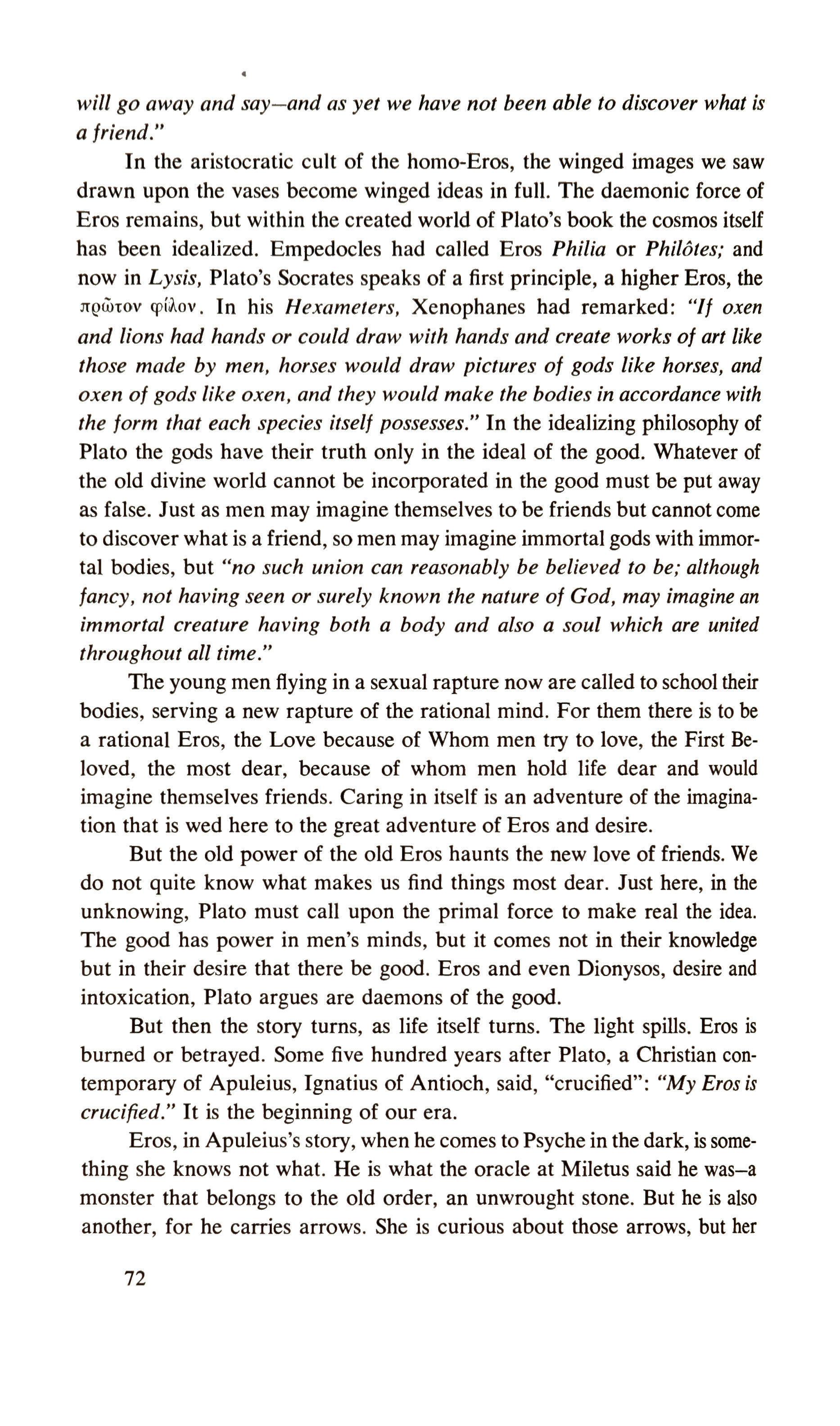
will go away and say and as yet we have not been able to discover what is a friend."
In the aristocratic cult of the homo-Eros, the winged images we saw drawn upon the vases become winged ideas in full. The daemonic force of Eros remains, but within the created world of Plato's book the cosmos itself has been idealized. Empedocles had called Eros Philia or Phllotes; and now in Lysis, Plato's Socrates speaks of a first principle, a higher Eros, the 3TQW'(OV lp(;AOV. In his Hexameters, Xenophanes had remarked: "I] oxen and lions had hands or could draw with hands and create works of art like those made by men, horses would draw pictures of gods like horses, and oxen of gods like oxen, and they would make the bodies in accordance with the form that each species itself possesses." In the idealizing philosophy of Plato the gods have their truth only in the ideal of the good. Whatever of the old divine world cannot be incorporated in the good must be put away as false. Just as men may imagine themselves to be friends but cannot come to discover what is a friend, so men may imagine immortal gods with immortal bodies, but "no such union can reasonably be believed to be,' although fancy, not having seen or surely known the nature of God, may imagine an immortal creature having both a body and also a soul which are united throughout all time."
The young men flying in a sexual rapture now are called to school their bodies, serving a new rapture of the rational mind. For them there is to be a rational Eros, the Love because of Whom men try to love, the First Beloved, the most dear, because of whom men hold life dear and would imagine themselves friends. Caring in itself is an adventure of the imagination that is wed here to the great adventure of Eros and desire.
But the old power of the old Eros haunts the new love of friends. We do not quite know what makes us find things most dear. Just here, in the unknowing, Plato must call upon the primal force to make real the idea. The good has power in men's minds, but it comes not in their knowledge but in their desire that there be good. Eros and even Dionysos, desire and intoxication, Plato argues are daemons of the good.
But then the story turns, as life itself turns. The light spills. Eros is burned or betrayed. Some five hundred years after Plato, a Christian contemporary of Apuleius, Ignatius of Antioch, said, "crucified": "My Eros is crucified." It is the beginning of our era.
Eros, in Apuleius's story, when he comes to Psyche in the dark, is something she knows not what. He is what the oracle at Miletus said he was-a monster that belongs to the old order, an unwrought stone. But he is also another, for he carries arrows. She is curious about those arrows, but her
72
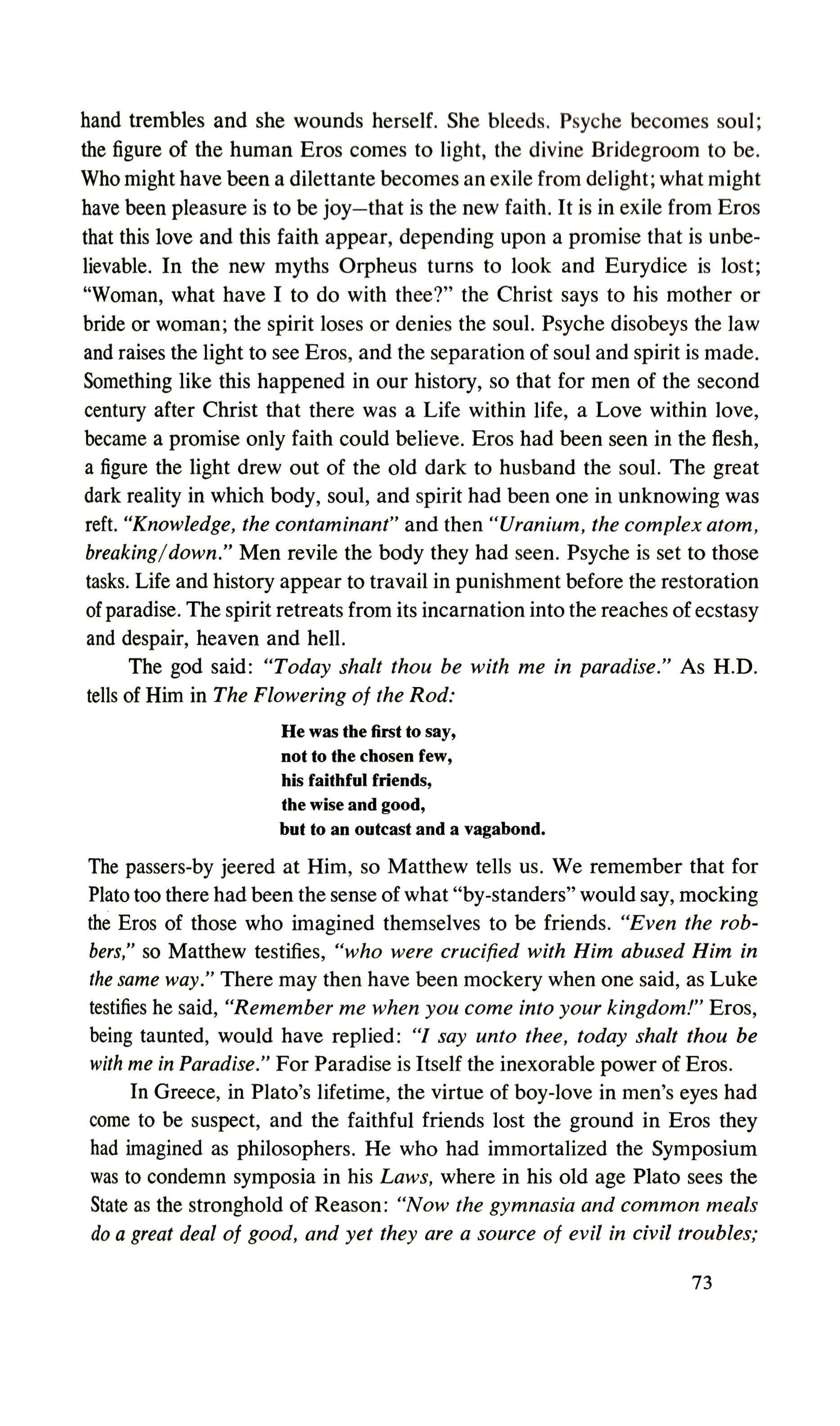
hand trembles and she wounds herself. She bleeds. Psyche becomes soul; the figure of the human Eros comes to light, the divine Bridegroom to be. Who might have been a dilettante becomes an exile from delight; what might have been pleasure is to be joy that is the new faith. It is in exile from Eros that this love and this faith appear, depending upon a promise that is unbelievable. In the new myths Orpheus turns to look and Eurydice is lost; "Woman, what have I to do with thee?" the Christ says to his mother or bride or woman; the spirit loses or denies the soul. Psyche disobeys the law and raises the light to see Eros, and the separation of soul and spirit is made. Something like this happened in our history, so that for men of the second century after Christ that there was a Life within life, a Love within love, became a promise only faith could believe. Eros had been seen in the flesh, a figure the light drew out of the old dark to husband the soul. The great dark reality in which body, soul, and spirit had been one in unknowing was reft. "Knowledge, the contaminant" and then "Uranium, the complex atom, breaking/down." Men revile the body they had seen. Psyche is set to those tasks. Life and history appear to travail in punishment before the restoration ofparadise. The spirit retreats from its incarnation into the reaches of ecstasy and despair, heaven and hell.
The god said: "Today shalt thou be with me in paradise." As H.D. tells of Him in The Flowering of the Rod.·
He was tbe first to say, not to tbe cbosen few, bis faitbful friends, tbe wise and good, but to an outcast and a vagabond.
The passers-by jeered at Him, so Matthew tells us. We remember that for Plato too there had been the sense of what "by-standers" would say, mocking the Eros of those who imagined themselves to be friends. "Even the robbers," so Matthew testifies, "who were crucified with Him abused Him in the same way." There may then have been mockery when one said, as Luke testifies he said, "Remember me when you come into your kingdom!" Eros, being taunted, would have replied: "I say unto thee, today shalt thou be with me in Paradise." For Paradise is Itself the inexorable power of Eros.
In Greece, in Plato's lifetime, the virtue of boy-love in men's eyes had come to be suspect, and the faithful friends lost the ground in Eros they had imagined as philosophers. He who had immortalized the Symposium was to condemn symposia in his Laws, where in his old age Plato sees the State as the stronghold of Reason: "Now the gymnasia and common meals do a great deal of good, and yet they are a source of evil in civil troubles,·
73
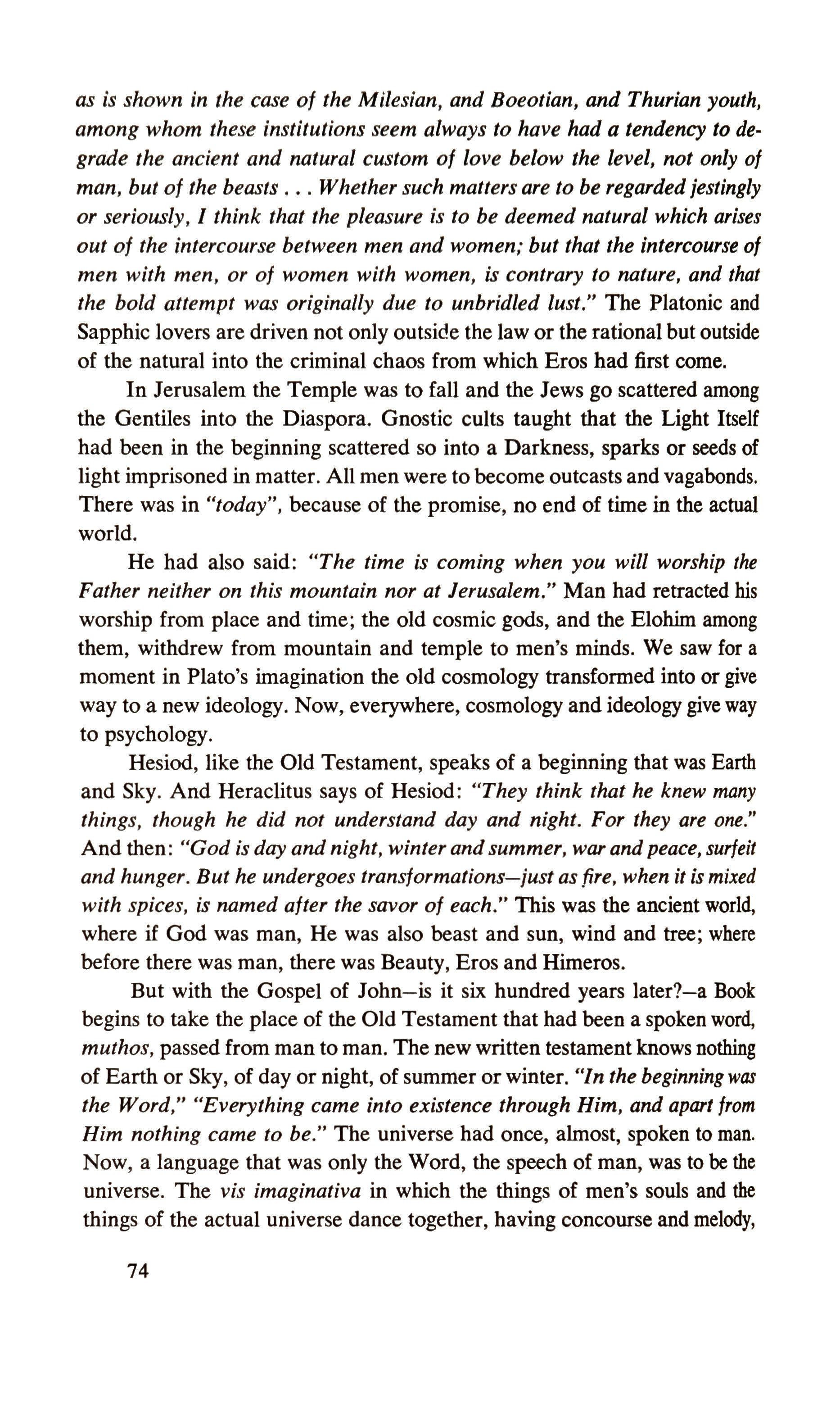
as is shown in the case of the Milesian, and Boeotian, and Thurian youth, among whom these institutions seem always to have had a tendency to degrade the ancient and natural custom of love below the level, not only of man, but of the beasts .•. Whether such matters are to be regardedjestingly or seriously, I think that the pleasure is to be deemed natural which arises out of the intercourse between men and women,' but that the intercourse of men with men, or of women with women, is contrary to nature, and that the bold attempt was originally due to unbridled lust." The Platonic and Sapphic lovers are driven not only outside the law or the rational but outside of the natural into the criminal chaos from which Eros had first come.
In Jerusalem the Temple was to fall and the Jews go scattered among the Gentiles into the Diaspora. Gnostic cults taught that the Light Itself had been in the beginning scattered so into a Darkness, sparks or seeds of light imprisoned in matter. All men were to become outcasts and vagabonds. There was in "today", because of the promise, no end of time in the actual world.
He had also said: "The time is coming when you will worship the Father neither on this mountain nor at Jerusalem." Man had retracted his worship from place and time; the old cosmic gods, and the Elohim among them, withdrew from mountain and temple to men's minds. We saw for a moment in Plato's imagination the old cosmology transformed into or give way to a new ideology. Now, everywhere, cosmology and ideology give way to psychology.
Hesiod, like the Old Testament, speaks of a beginning that was Earth and Sky. And Heraclitus says of Hesiod: "They think that he knew many things, though he did not understand day and night. For they are one." And then: "God is day and night, winter and summer, war and peace, surfeit and hunger. But he undergoes transformations just as fire, when it is mixed with spices, is named after the savor of each." This was the ancient world, where if God was man, He was also beast and sun, wind and tree; where before there was man, there was Beauty, Eros and Himeros.
But with the Gospel of John is it six hundred years later? a Book begins to take the place of the Old Testament that had been a spoken word, muthos, passed from man to man. The new written testament knows nothing of Earth or Sky, of day or night, of summer or winter. "In the beginning was the Word," "Everything came into existence through Him, and apart from Him nothing came to be." The universe had once, almost, spoken to man. Now, a language that was only the Word, the speech of man, was to be the universe. The vis imaginativa in which the things of men's souls and the things of the actual universe dance together, having concourse and melody,
74
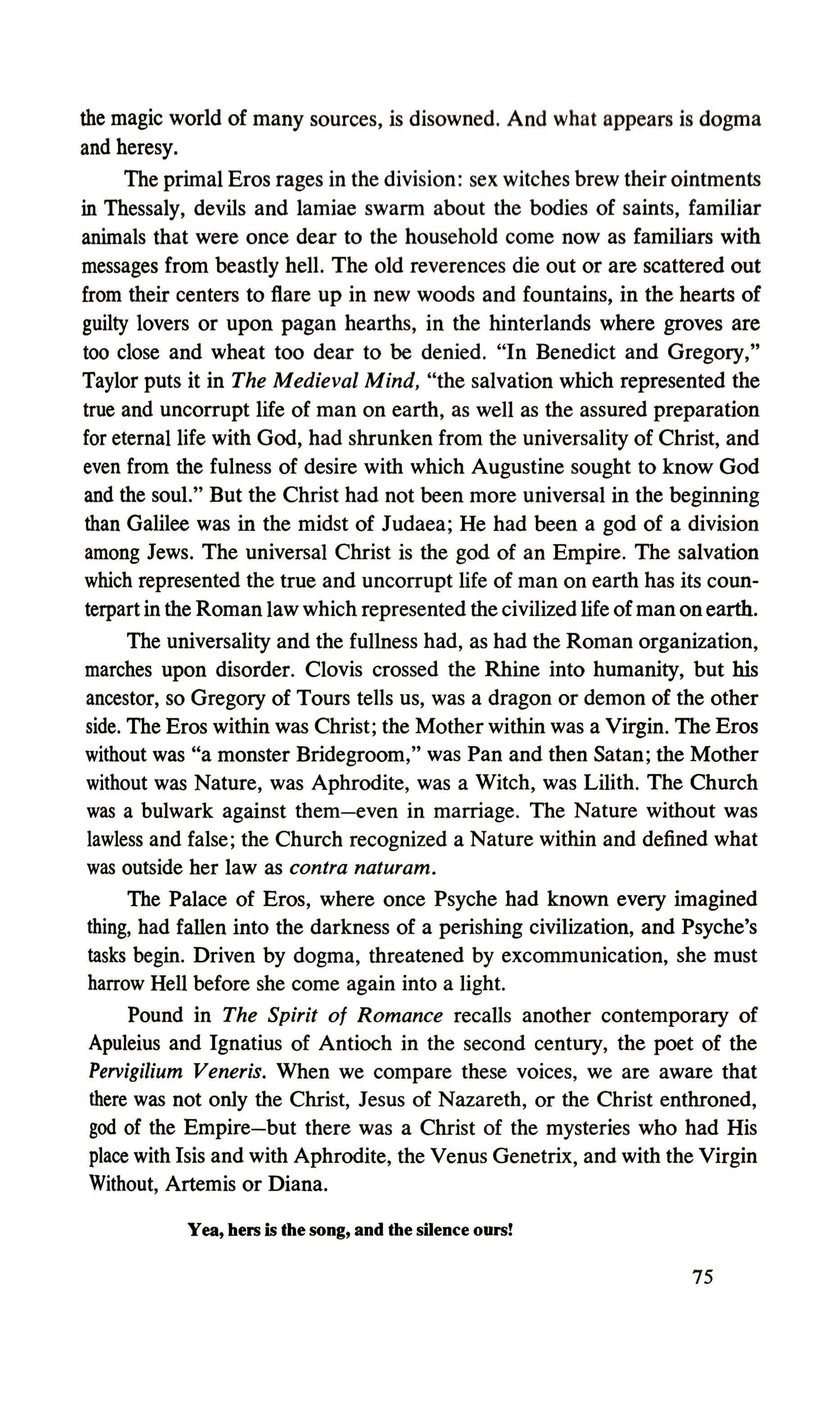
the magic world of many sources, is disowned. And what appears is dogma and heresy.
The primal Eros rages in the division: sex witches brew their ointments in Thessaly, devils and lamiae swarm about the bodies of saints, familiar animals that were once dear to the household come now as familiars with messages from beastly hell. The old reverences die out or are scattered out from their centers to flare up in new woods and fountains, in the hearts of guilty lovers or upon pagan hearths, in the hinterlands where groves are too close and wheat too dear to be denied. "In Benedict and Gregory," Taylor puts it in The Medieval Mind, "the salvation which represented the true and uncorrupt life of man on earth, as well as the assured preparation for eternal life with God, had shrunken from the universality of Christ, and even from the fulness of desire with which Augustine sought to know God and the soul." But the Christ had not been more universal in the beginning than Galilee was in the midst of Judaea; He had been a god of a division among Jews. The universal Christ is the god of an Empire. The salvation which represented the true and uncorrupt life of man on earth has its counterpart in the Roman law which represented the civilized life of man on earth,
The universality and the fullness had, as had the Roman organization, marches upon disorder. Clovis crossed the Rhine into humanity, but his ancestor, so Gregory of Tours tells us, was a dragon or demon of the other side. The Eros within was Christ; the Mother within was a Virgin. The Eros without was "a monster Bridegroom," was Pan and then Satan; the Mother without was Nature, was Aphrodite, was a Witch, was Lilith. The Church was a bulwark against them-even in marriage. The Nature without was lawless and false; the Church recognized a Nature within and defined what was outside her law as contra naturam.
The Palace of Eros, where once Psyche had known every imagined thing, had fallen into the darkness of a perishing civilization, and Psyche's tasks begin. Driven by dogma, threatened by excommunication, she must harrow Hell before she come again into a light.
Pound in The Spirit of Romance recalls another contemporary of Apuleius and Ignatius of Antioch in the second century, the poet of the Pervigilium Veneris. When we compare these voices, we are aware that there was not only the Christ, Jesus of Nazareth, or the Christ enthroned, god of the Empire but there was a Christ of the mysteries who had His place with Isis and with Aphrodite, the Venus Genetrix, and with the Virgin Without, Artemis or Diana.
Yea, hers is the song, and the sllence ours!
75
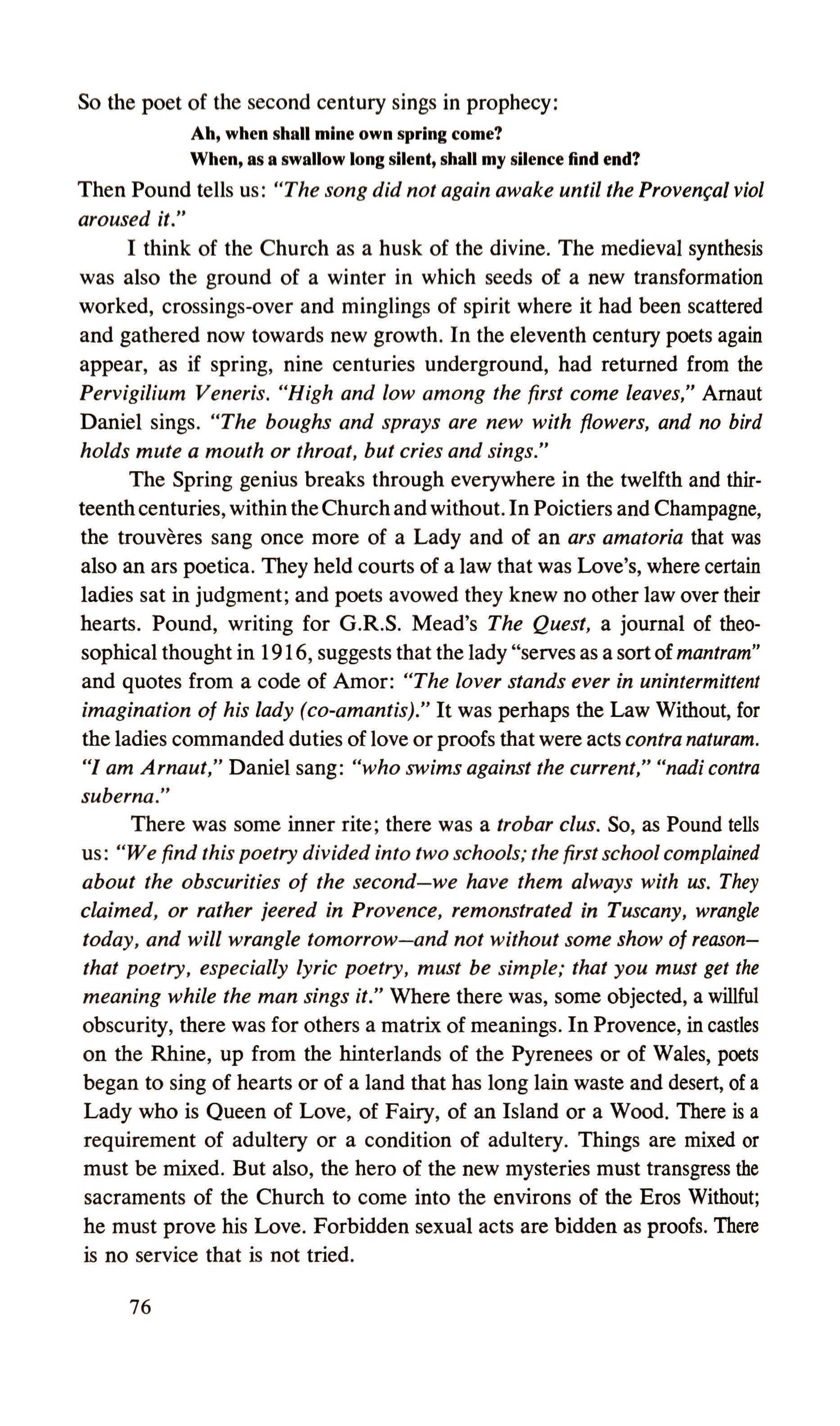
So the poet of the second century sings in prophecy:
Ah, when shall mine own spring come?
When, as a swallow long silent, shall my silence find end?
Then Pound tells us: "The song did not again awake until the Provencal viol aroused it."
I think of the Church as a husk of the divine. The medieval synthesis was also the ground of a winter in which seeds of a new transformation worked, crossings-over and minglings of spirit where it had been scattered and gathered now towards new growth. In the eleventh century poets again appear, as if spring, nine centuries underground, had returned from the Pervigilium Veneris. "High and low among the first come leaves," Amaut Daniel sings. "The boughs and sprays are new with flowers, and no bird holds mute a mouth or throat, but cries and sings."
The Spring genius breaks through everywhere in the twelfth and thirteenthcenturies, within theChurchandwithout. In Poictiers and Champagne, the trouveres sang once more of a Lady and of an ars amatoria that was also an ars poetica. They held courts of a law that was Love's, where certain ladies sat in judgment; and poets avowed they knew no other law over their hearts. Pound, writing for G.R.S. Mead's The Quest, a journal of theosophical thought in 1916, suggests that the lady "serves as a sort of mantram" and quotes from a code of Amor: "The lover stands ever in unintermittent imagination 0/ his lady (co-amantis):" It was perhaps the Law Without, for the ladies commanded duties of love or proofs that were acts contra naturam. "I am Arnaut," Daniel sang: "who swims against the current," "nadi contra suberna."
There was some inner rite; there was a trobar clus. So, as Pound tells us : "We find this poetry divided into two schools,' the firstschool complained about the obscurities 0/ the second we have them always with us. They claimed, or rather jeered in Provence, remonstrated in Tuscany, wrangle today, and will wrangle tomorrow-and not without some show 0/ reasonthat poetry, especially lyric poetry, must be simple; that you must get the meaning while the man sings it." Where there was, some objected, a willful obscurity, there was for others a matrix of meanings. In Provence, in castles on the Rhine, up from the hinterlands of the Pyrenees or of Wales, poets began to sing of hearts or of a land that has long lain waste and desert, of a Lady who is Queen of Love, of Fairy, of an Island or a Wood. There is a requirement of adultery or a condition of adultery. Things are mixed or must be mixed. But also, the hero of the new mysteries must transgress the sacraments of the Church to come into the environs of the Eros Without; he must prove his Love. Forbidden sexual acts are bidden as proofs. There is no service that is not tried.
76
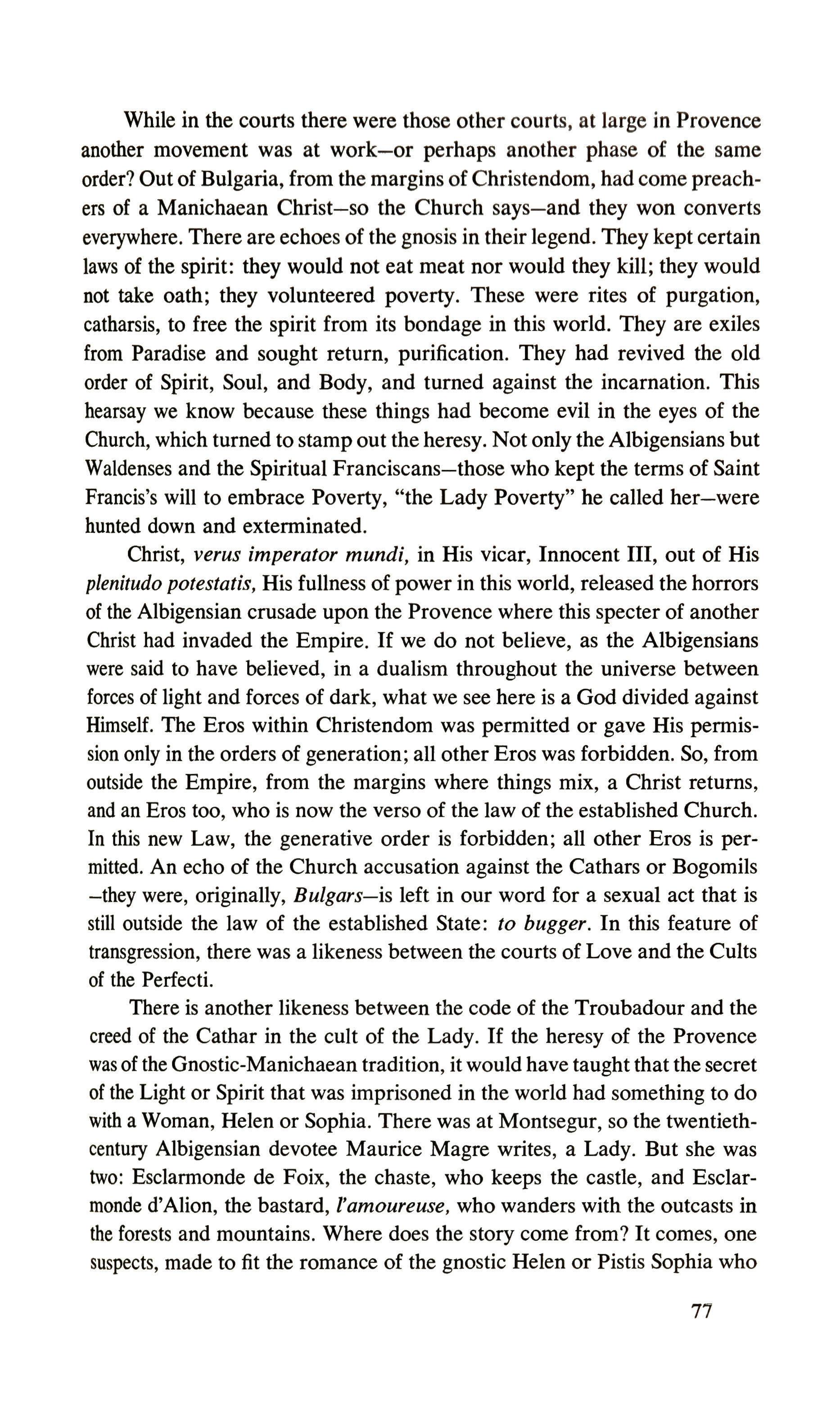
While in the courts there were those other courts, at large in Provence another movement was at work or perhaps another phase of the same order? Out of Bulgaria, from the margins of Christendom, had come preachers of a Manichaean Christ so the Church says and they won converts everywhere. There are echoes of the gnosis in their legend. They kept certain laws of the spirit: they would not eat meat nor would they kill; they would not take oath; they volunteered poverty. These were rites of purgation, catharsis, to free the spirit from its bondage in this world. They are exiles from Paradise and sought return, purification. They had revived the old order of Spirit, Soul, and Body, and turned against the incarnation. This hearsay we know because these things had become evil in the eyes of the Church, which turned to stamp out the heresy. Not only the Albigensians but Waldenses and the Spiritual Franciscans those who kept the terms of Saint Francis's will to embrace Poverty, "the Lady Poverty" he called her were hunted down and exterminated.
Christ, verus imperator mundi, in His vicar, Innocent III, out of His plenitudo potestatis, His fullness of power in this world, released the horrors of the Albigensian crusade upon the Provence where this specter of another Christ had invaded the Empire. If we do not believe, as the Albigensians were said to have believed, in a dualism throughout the universe between forces of light and forces of dark, what we see here is a God divided against Himself. The Eros within Christendom was permitted or gave His permission only in the orders of generation; all other Eros was forbidden. So, from outside the Empire, from the margins where things mix, a Christ returns, and an Eros too, who is now the verso of the law of the established Church. In this new Law, the generative order is forbidden; all other Eros is permitted. An echo of the Church accusation against the Cathars or Bogomils -they were, originally, Bulgars is left in our word for a sexual act that is still outside the law of the established State: to bugger. In this feature of transgression, there was a likeness between the courts of Love and the Cults of the Perfecti.
There is another likeness between the code of the Troubadour and the creed of the Cathar in the cult of the Lady. If the heresy of the Provence was of the Gnostic-Manichaean tradition, it would have taught that the secret of the Light or Spirit that was imprisoned in the world had something to do with a Woman, Helen or Sophia. There was at Montsegur, so the twentiethcentury Albigensian devotee Maurice Magre writes, a Lady. But she was two: Esclarmonde de Foix, the chaste, who keeps the castle, and Esclarmonde d'Alion, the bastard, l'amoureuse, who wanders with the outcasts in the forests and mountains. Where does the story come from? It comes, one suspects, made to fit the romance of the gnostic Helen or Pistis Sophia who
77
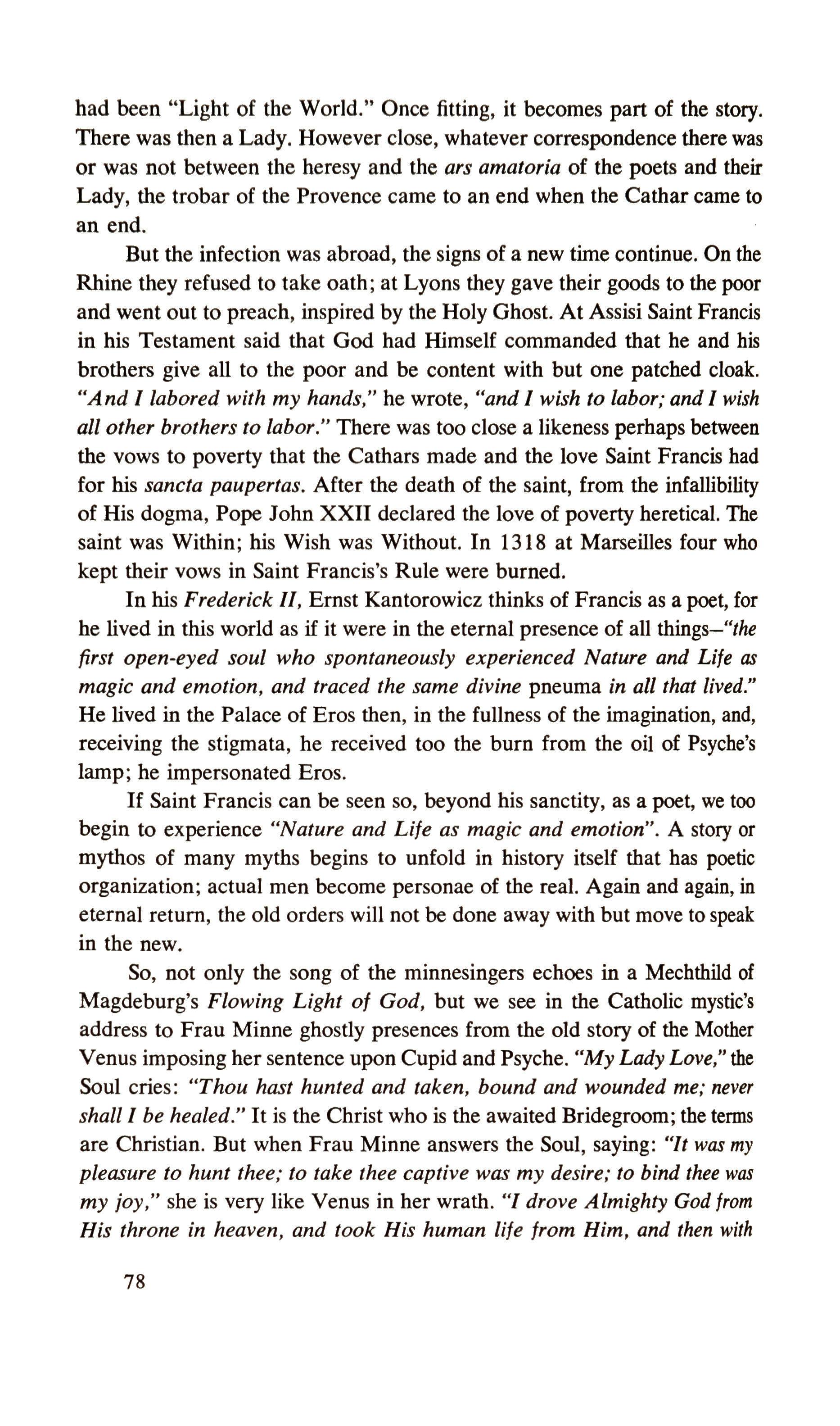
had been "Light of the World." Once fitting, it becomes part of the story. There was then a Lady. However close, whatever correspondence there was or was not between the heresy and the ars amatoria of the poets and their Lady, the trobar of the Provence came to an end when the Cathar came to an end.
But the infection was abroad, the signs of a new time continue. On the Rhine they refused to take oath; at Lyons they gave their goods to the poor and went out to preach, inspired by the Holy Ghost. At Assisi Saint Francis in his Testament said that God had Himself commanded that he and his brothers give all to the poor and be content with but one patched cloak. "And I labored with my hands," he wrote, "and I wish to labor; and I wish all other brothers to labor." There was too close a likeness perhaps between the vows to poverty that the Cathars made and the love Saint Francis had for his sancta paupertas. After the death of the saint, from the infallibility of His dogma, Pope John XXII declared the love of poverty heretical. The saint was Within; his Wish was Without. In 1318 at Marseilles four who kept their vows in Saint Francis's Rule were burned.
In his Frederick II, Ernst Kantorowicz thinks of Francis as a poet, for he lived in this world as if it were in the eternal presence of all things-"the first open-eyed soul who spontaneously experienced Nature and Life as magic and emotion, and traced the same divine pneuma in all that lived." He lived in the Palace of Eros then, in the fullness of the imagination, and, receiving the stigmata, he received too the burn from the oil of Psyche's lamp; he impersonated Eros.
If Saint Francis can be seen so, beyond his sanctity, as a poet, we too begin to experience "Nature and Life as magic and emotion". A story or mythos of many myths begins to unfold in history itself that has poetic organization; actual men become personae of the real. Again and again, in eternal return, the old orders will not be done away with but move to speak in the new.
So, not only the song of the minnesingers echoes in a Mechthild of Magdeburg's Flowing Light of God, but we see in the Catholic mystic's address to Frau Minne ghostly presences from the old story of the Mother Venus imposing her sentence upon Cupid and Psyche. "MyLady Love," the Soul cries: "Thou hast hunted and taken, bound and wounded me,' never shall I be healed." It is the Christ who is the awaited Bridegroom; the terms are Christian. But when Frau Minne answers the Soul, saying: "It was my pleasure to hunt thee,' to take thee captive was my desire,' to bind thee was my joy," she is very like Venus in her wrath. "I drove Almighty God from His throne in heaven, and took His human life from Him, and then with
78
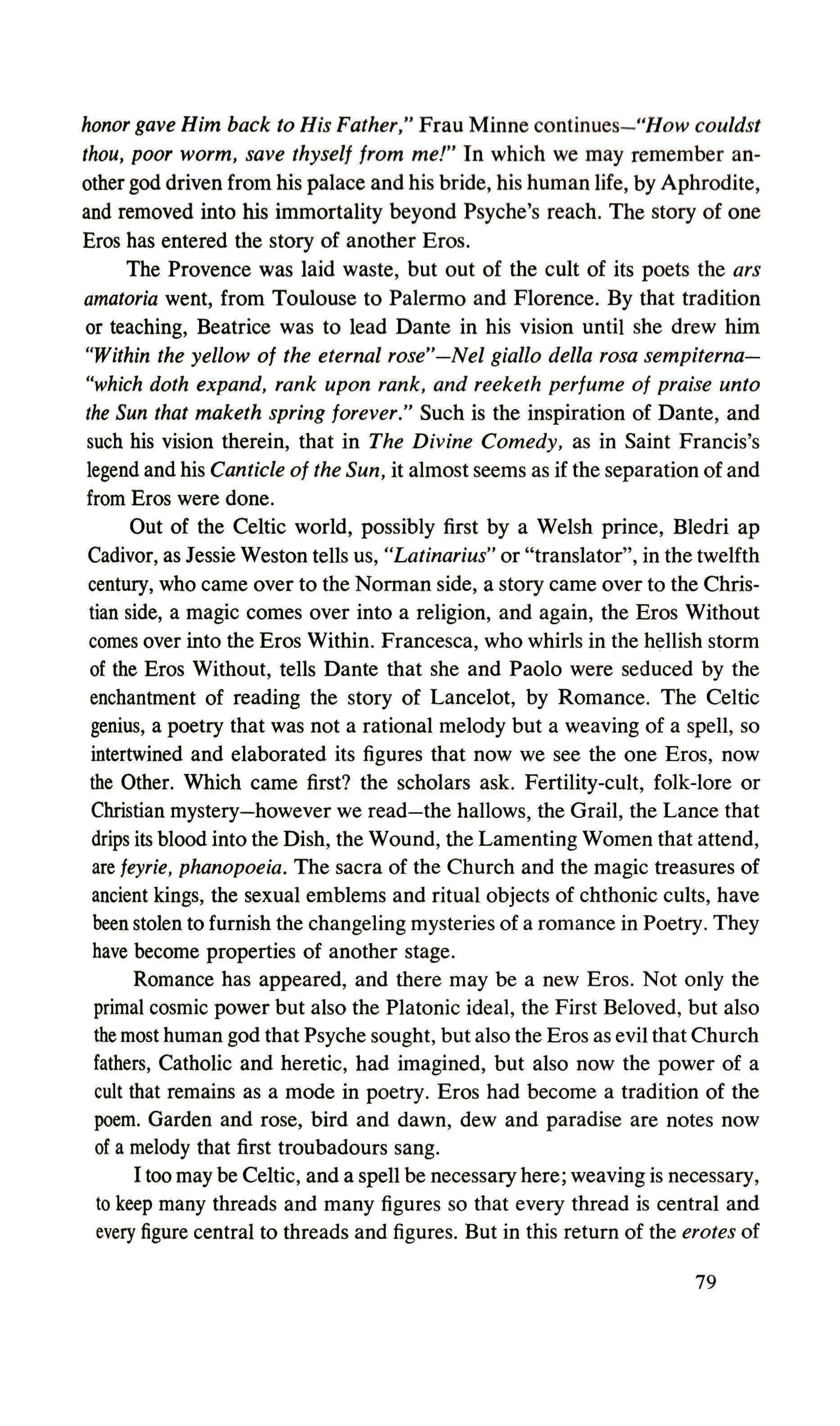
honor gave Him back to His Father," Frau Minne continues "How couldst thou, poor worm, save thyself from me!" In which we may remember another god driven from his palace and his bride, his human life, by Aphrodite, and removed into his immortality beyond Psyche's reach. The story of one Eros has entered the story of another Eros.
The Provence was laid waste, but out of the cult of its poets the ars amatoria went, from Toulouse to Palermo and Florence. By that tradition or teaching, Beatrice was to lead Dante in his vision until she drew him "Within the yellow of the eternal rose" Nel giallo della rosa sempiterna"which doth expand, rank upon rank, and reeketh perfume of praise unto the Sun that maketh spring forever." Such is the inspiration of Dante, and such his vision therein, that in The Divine Comedy, as in Saint Francis's legend and his Canticle of the Sun, it almost seems as if the separation of and from Eros were done.
Out of the Celtic world, possibly first by a Welsh prince, Bledri ap Cadivor, as Jessie Weston tells us, "Latinarius' or "translator", in the twelfth century, who came over to the Norman side, a story came over to the Christian side, a magic comes over into a religion, and again, the Eros Without comes over into the Eros Within. Francesca, who whirls in the hellish storm of the Eros Without, tells Dante that she and Paolo were seduced by the enchantment of reading the story of Lancelot, by Romance. The Celtic genius, a poetry that was not a rational melody but a weaving of a spell, so intertwined and elaborated its figures that now we see the one Eros, now the Other. Which came first? the scholars ask. Fertility-cult, folk-lore or Christian mystery however we read the hallows, the Grail, the Lance that drips its blood into the Dish, the Wound, the Lamenting Women that attend, are feyrie, phanopoeia. The sacra of the Church and the magic treasures of ancient kings, the sexual emblems and ritual objects of chthonic cults, have been stolen to furnish the changeling mysteries of a romance in Poetry. They have become properties of another stage.
Romance has appeared, and there may be a new Eros. Not only the primal cosmic power but also the Platonic ideal, the First Beloved, but also the most human god that Psyche sought, but also the Eros as evil that Church fathers, Catholic and heretic, had imagined, but also now the power of a cult that remains as a mode in poetry. Eros had become a tradition of the poem. Garden and rose, bird and dawn, dew and paradise are notes now of a melody that first troubadours sang.
I too may be Celtic, and a spell be necessary here; weaving is necessary, to keep many threads and many figures so that every thread is central and every figure central to threads and figures. But in this return of the erotes of
79

the verso to our own time, we are heirs of work done in the first decades of this century. In The Spirit of Romance Pound related the tradition of Eros from Apuleius to "the consummation of it all in Dante's glorification of Beatrice" and "the final evolution of Amor by Guido and Dante, a new and paganish god, neither Eros nor an angel of the Talmud." The poetic tradition of the Grail was related to this tradition by Jessie Weston in The Quest for the Holy Grail (1913) and in From Ritual to Romance (1919). The cult of the gods as it is found in the hellenizing poems of Lawrence, H.D., and Pound in the Imagist period cannot be separated from the reawakened sense of the meaning and reality of the gods in contemporary studies of the mystery cults Jane Harrison's Prolegomena (1903) and Themis (1912), Cook's Zeus (1914), the Orphic studies of Robert Eisler, the Gnostic studies of G.R.S. Mead, whose lectures Pound attended in 1916 finding "in the legend of Simon Magus and Helen of Tyre a prototype of chivalric love." In scholarship as well as in poetry there is an insistence that the contemporary world must call up within itself the old gods; that there must be a return of the Underworld. "I know.T mean, one man who understands Persephone and Demeter," Pound writes, "and one who understands the Laurel, and another who has, I should say, met Artemis. These things are for them real." Edward Sapir, reviewing H.D.'s Collected Poems in 1925, saw rightly, beyond the images, "the rediscovery of ancient and beautiful ways made apt once again for the hungering spirit." Along these ways, Eros and Psyche reveal their meanings here, now; there, then. "All ages are contemporaneous," Pound wrote, but it was by the poetic genius that "all ages" and "the contemporary" were created. The Spirit of Romance was not a history of the past but an instruction in the nature of the high art that was to be the contemporary poetry.
"Earth's fallen kingdom contains its original face," a friend, M. C. Richards, writes in a poem that has come in a letter. "Dante found it in a dream," H.D. writes in The Guest in 1946, a companion work or counterpart of The Spirit of Romance thirty years later. Where Pound had taken the story of the Spirit of Romance from what he calls "the phantom dawn" in Apuleius to the Latin Renaissance after Dante, H.D., "remembering Shakespeare always, but remembering him differently," follows the proliferation of the Spirit in Tudor poetry. Theosophic insights lie back of Pound's study, Freudian learning infOIIIIS H.D.'s but these poets bring us to see the theosophie and the psychoanalytic anew as hints of a primary poetic vision that returns where it will in man's history. With certain men, Pound wrote, "their consciousness is germinal, Their thoughts are in them as the thought of the tree is in the seed, or in the grass, or the grain, or the blossom. And these
80
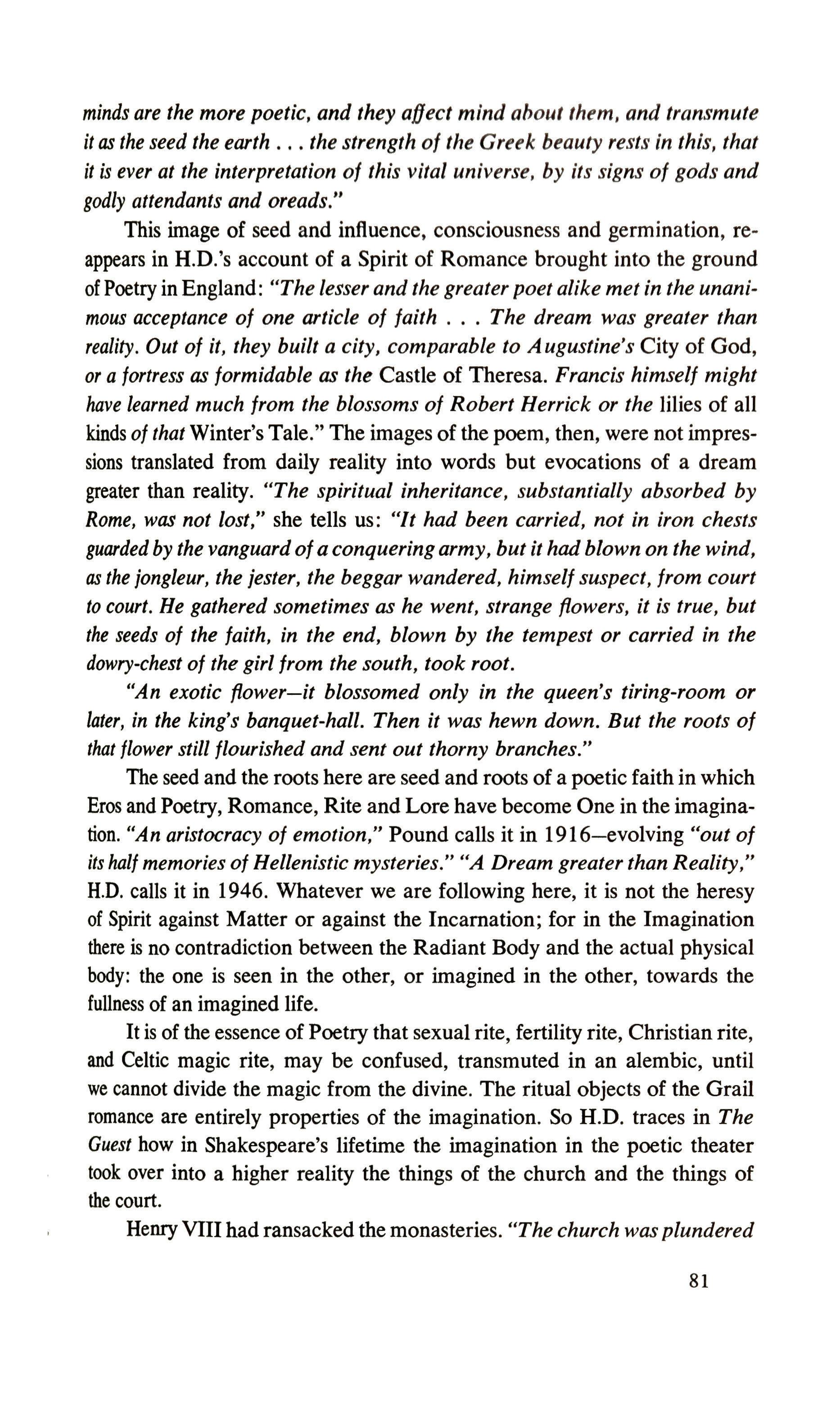
minds are the more poetic, and they affect mind about them, and transmute it as the seed the earth the strength of the Greek beauty rests in this, that it is ever at the interpretation of this vital universe, by its signs of gods and godly attendants and oreads:"
This image of seed and influence, consciousness and germination, reappears in H.D.'s account of a Spirit of Romance brought into the ground of Poetry in England: "The lesser and the greater poet alike met in the unanimous acceptance of one article of faith The dream was greater than reality. Out of it, they built a city, comparable to Augustine's City of God, or a fortress as formidable as the Castle of Theresa. Francis himself might have learned much from the blossoms of Robert Herrick or the lilies of all kinds of that Winter's Tale." The images of the poem, then, were not impressions translated from daily reality into words but evocations of a dream greater than reality. "The spiritual inheritance, substantially absorbed by Rome, was not lost," she tells us: "It had been carried, not in iron chests guardedby the vanguardof a conquering army, but it had blown on the wind, as the jongleur, the jester, the beggar wandered, himself suspect, from court to court. He gathered sometimes as he went, strange flowers, it is true, but the seeds of the faith, in the end, blown by the tempest or carried in the dowry-chest of the girl from the south, took root.
"An exotic flower it blossomed only in the queen's tiring-room or later, in the king's banquet-hall. Then it was hewn down. But the roots of that flower still flourished and sent out thorny branches."
The seed and the roots here are seed and roots of a poetic faith in which Eros and Poetry, Romance, Rite and Lore have become One in the imagination. "An aristocracy of emotion," Pound calls it in 1916 evolving "out of its half memories of Hellenistic mysteries." "A Dream greater than Reality," H.D. calls it in 1946. Whatever we are following here, it is not the heresy of Spirit against Matter or against the Incarnation; for in the Imagination there is no contradiction between the Radiant Body and the actual physical body: the one is seen in the other, or imagined in the other, towards the fullness of an imagined life.
It is of the essence of Poetry that sexual rite, fertility rite, Christian rite, and Celtic magic rite, may be confused, transmuted in an alembic, until we cannot divide the magic from the divine. The ritual objects of the Grail romance are entirely properties of the imagination. So H.D. traces in The Guest how in Shakespeare's lifetime the imagination in the poetic theater took over into a higher reality the things of the church and the things of the court.
Henry VIII had ransacked the monasteries. "The church was plundered
81
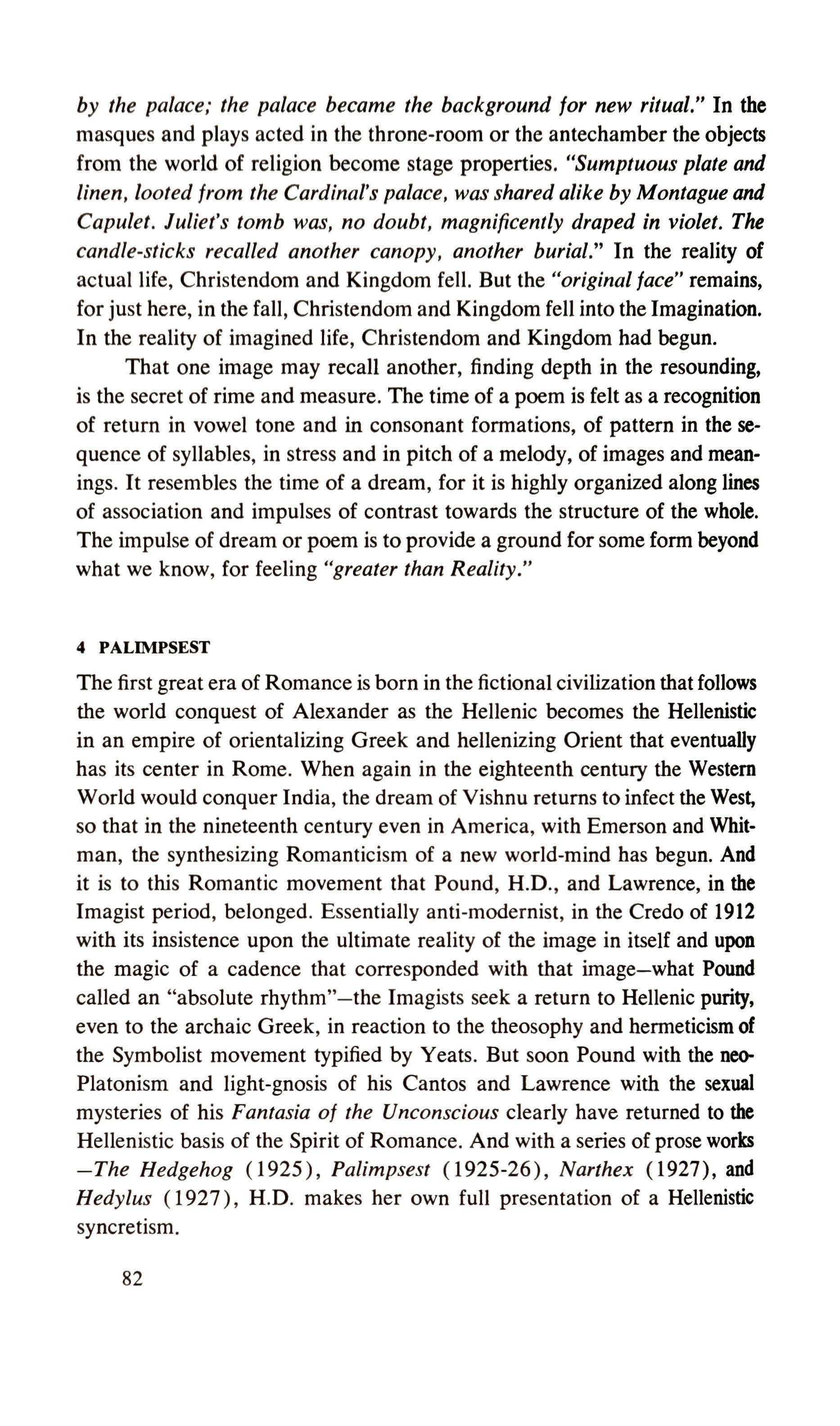
by the palace,· the palace became the background for new ritual." In the masques and plays acted in the throne-room or the antechamber the objects from the world of religion become stage properties. "Sumptuous plate and linen, looted from the Cardinal's palace, was shared alike by Montague and Capulet. Iuliet's tomb was, no doubt, magnificently draped in violet. The candle-sticks recalled another canopy, another burial." In the reality of actual life, Christendom and Kingdom fell. But the "originalface" remains, for just here, in the fall, Christendom and Kingdom fell into the Imagination. In the reality of imagined life, Christendom and Kingdom had begun.
That one image may recall another, finding depth in the resounding, is the secret of rime and measure. The time of a poem is felt as a recognition of return in vowel tone and in consonant formations, of pattern in the sequence of syllables, in stress and in pitch of a melody, of images and meanings. It resembles the time of a dream, for it is highly organized along lines of association and impulses of contrast towards the structure of the whole. The impulse of dream or poem is to provide a ground for some form beyond what we know, for feeling "greater than Reality."
4 PALIMPSEST
The first great era of Romance is born in the fictional civilization that follows the world conquest of Alexander as the Hellenic becomes the Hellenistic in an empire of orientalizing Greek and hellenizing Orient that eventually has its center in Rome. When again in the eighteenth century the Western World would conquer India, the dream of Vishnu returns to infect the West, so that in the nineteenth century even in America, with Emerson and Whitman, the synthesizing Romanticism of a new world-mind has begun. And it is to this Romantic movement that Pound, H.D., and Lawrence, in the Imagist period, belonged. Essentially anti-modernist, in the Credo of 1912 with its insistence upon the ultimate reality of the image in itself and upon the magic of a cadence that corresponded with that image what Pound called an "absolute rhythm" the Imagists seek a return to Hellenic purity, even to the archaic Greek, in reaction to the theosophy and hermeticism of the Symbolist movement typified by Yeats. But soon Pound with the neoPlatonism and light-gnosis of his Cantos and Lawrence with the sexual mysteries of his Fantasia of the Unconscious clearly have returned to the Hellenistic basis of the Spirit of Romance. And with a series of prose works -The Hedgehog (1925), Palimpsest (1925-26), Narthex (1927), and Hedylus (1927), H.D. makes her own full presentation of a Hellenistic syncretism.
82
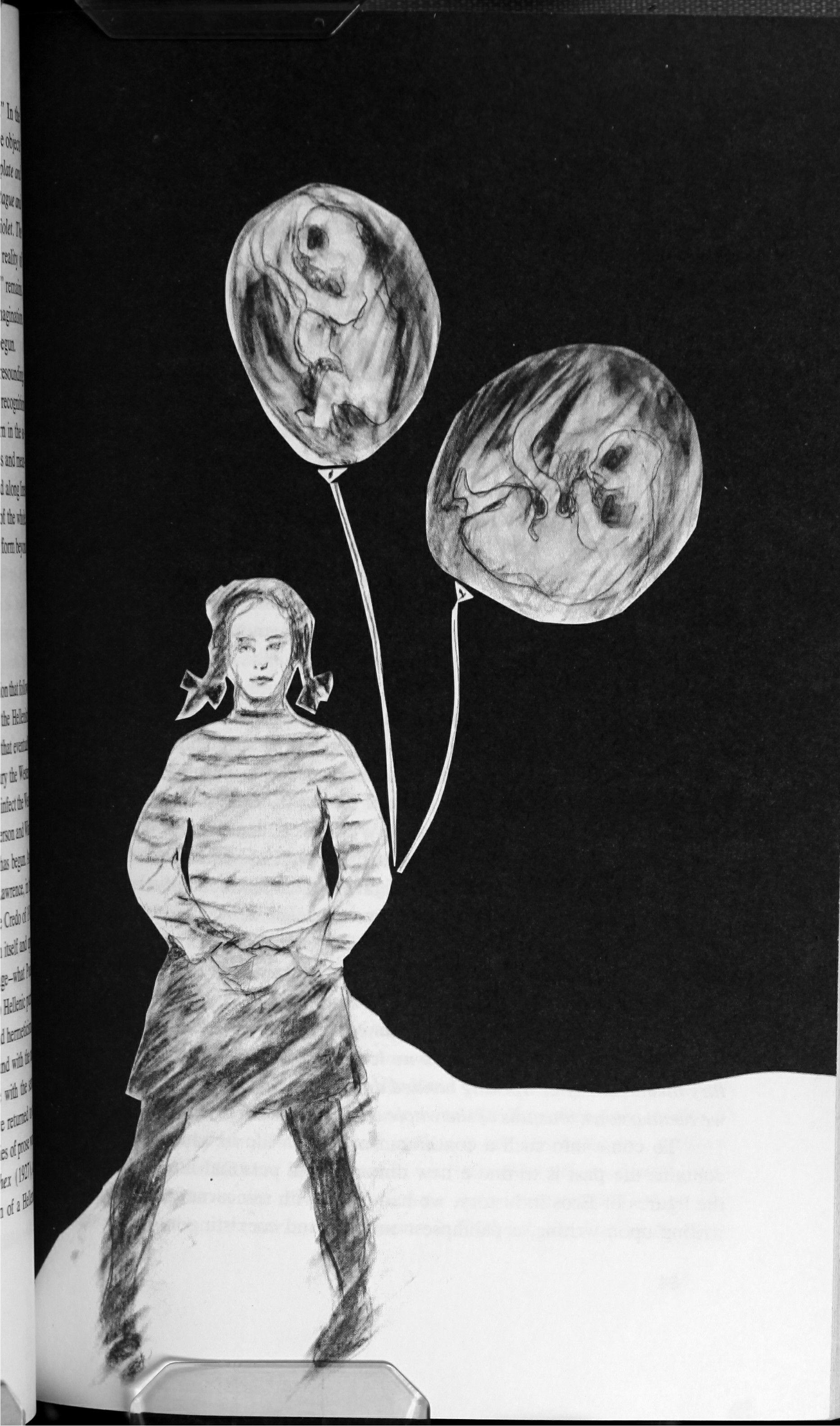
-114',1
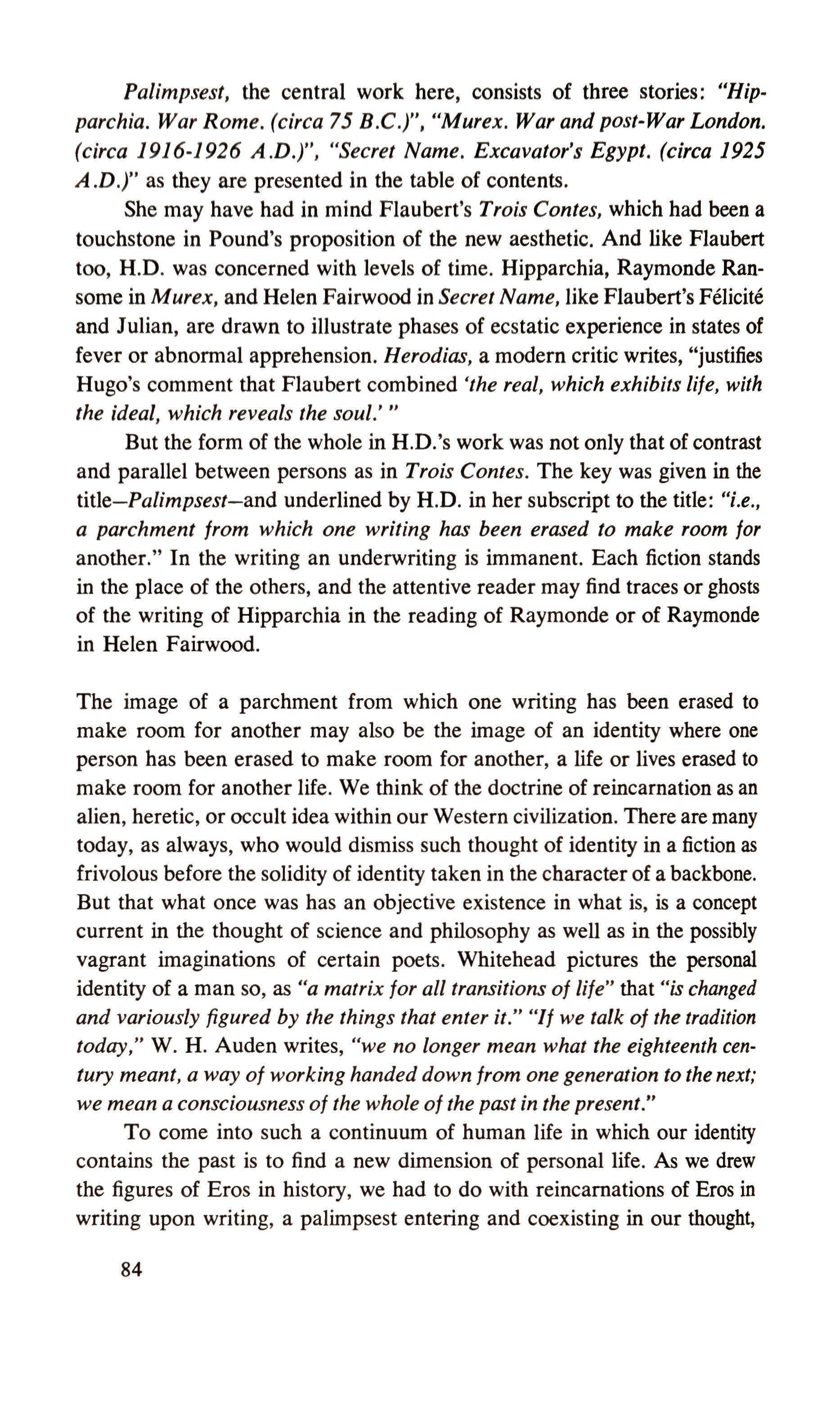
Palimpsest, the central work here, consists of three stories: "Hip. parchia. War Rome. (circa 75 B.C.)", "Murex. War and post-War London. (circa 1916-1926 A.D.)", "Secret Name. Excavator's Egypt. (circa 1925 A .D.)" as they are presented in the table of contents.
She may have had in mind Flaubert's Trois Contes, which had been a touchstone in Pound's proposition of the new aesthetic. And like Flaubert too, H.D. was concerned with levels of time. Hipparchia, Raymonde Ransome in Murex, and Helen Fairwood in Secret Name, like Flaubert's Felicite and Julian, are drawn to illustrate phases of ecstatic experience in states of fever or abnormal apprehension. Herodias, a modern critic writes, "justifies Hugo's comment that Flaubert combined 'the real, which exhibits life, with the ideal, which reveals the soul.' "
But the form of the whole in H.D.'s work was not only that of contrast and parallel between persons as in Trois Contes. The key was given in the title Palimpsest and underlined by H.D. in her subscript to the title: "i.e., a parchment from which one writing has been erased to make room for another." In the writing an underwriting is immanent. Each fiction stands in the place of the others, and the attentive reader may find traces or ghosts of the writing of Hipparchia in the reading of Raymonde or of Raymonde in Helen Fairwood.
The image of a parchment from which one writing has been erased to make room for another may also be the image of an identity where one person has been erased to make room for another, a life or lives erased to make room for another life. We think of the doctrine of reincarnation as an alien, heretic, or occult idea within our Western civilization. There are many today, as always, who would dismiss such thought of identity in a fiction as frivolous before the solidity of identity taken in the character of a backbone. But that what once was has an objective existence in what is, is a concept current in the thought of science and philosophy as well as in the possibly vagrant imaginations of certain poets. Whitehead pictures the personal identity of a man so, as "a matrix for all transitions of life" that "is changed and variously figured by the things that enter it." "If we talk of the tradition today," W. H. Auden writes, "we no longer mean what the eighteenth century meant, a way of working handed down from one generation to the next; we mean a consciousness of the whole of the past in the present."
To come into such a continuum of human life in which our identity contains the past is to find a new dimension of personal life. As we drew the figures of Eros in history, we had to do with reincarnations of Eros in writing upon writing, a palimpsest entering and coexisting in our thought,
84
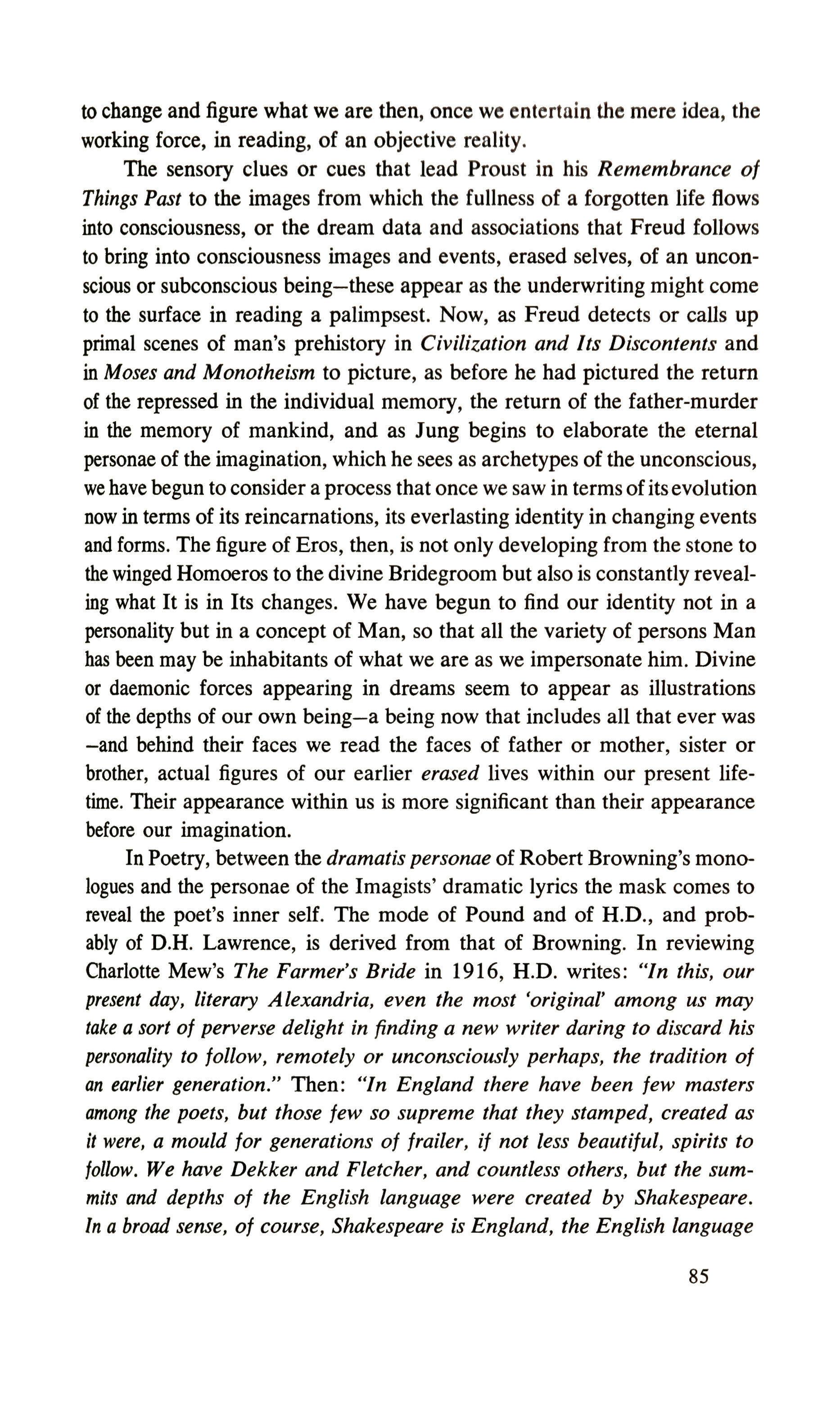
to change and figure what we are then, once we entertain the mere idea, the working force, in reading, of an objective reality.
The sensory clues or cues that lead Proust in his Remembrance 0/ Things Past to the images from which the fullness of a forgotten life flows into consciousness, or the dream data and associations that Freud follows to bring into consciousness images and events, erased selves, of an unconscious or subconscious being these appear as the underwriting might come to the surface in reading a palimpsest. Now, as Freud detects or calls up primal scenes of man's prehistory in Civilization and Its Discontents and in Moses and Monotheism to picture, as before he had pictured the return of the repressed in the individual memory, the return of the father-murder in the memory of mankind, and as Jung begins to elaborate the eternal personae of the imagination, which he sees as archetypes of the unconscious, we have begun to consider a process that once we saw in terms ofitsevolution now in terms of its reincarnations, its everlasting identity in changing events and forms. The figure of Eros, then, is not only developing from the stone to the winged Homoeros to the divine Bridegroom but also is constantly revealing what It is in Its changes. We have begun to find our identity not in a personality but in a concept of Man, so that all the variety of persons Man has been may be inhabitants of what we are as we impersonate him. Divine or daemonic forces appearing in dreams seem to appear as illustrations of the depths of our own being a being now that includes all that ever was -and behind their faces we read the faces of father or mother, sister or brother, actual figures of our earlier erased lives within our present lifetime. Their appearance within us is more significant than their appearance before our imagination.
In Poetry, between the dramatis personae of Robert Browning's monologues and the personae of the Imagists' dramatic lyrics the mask comes to reveal the poet's inner self. The mode of Pound and of H.D., and probably of D.H. Lawrence, is derived from that of Browning. In reviewing Charlotte Mew's The Farmer's Bride in 1916, H.D. writes: "In this, our present day, literary Alexandria, even the most 'original' among us may take a sort of perverse delight in finding a new writer daring to discard his personality to follow, remotely or unconsciously perhaps, the tradition of an earlier generation." Then: "In England there have been few masters among the poets, but those few so supreme that they stamped, created as it were, a mould for generations of frailer, if not less beautiful, spirits to follow. We have Dekker and Fletcher, and countless others, but the summits and depths of the English language were created by Shakespeare. In a broad sense, of course, Shakespeare is England, the English language
85
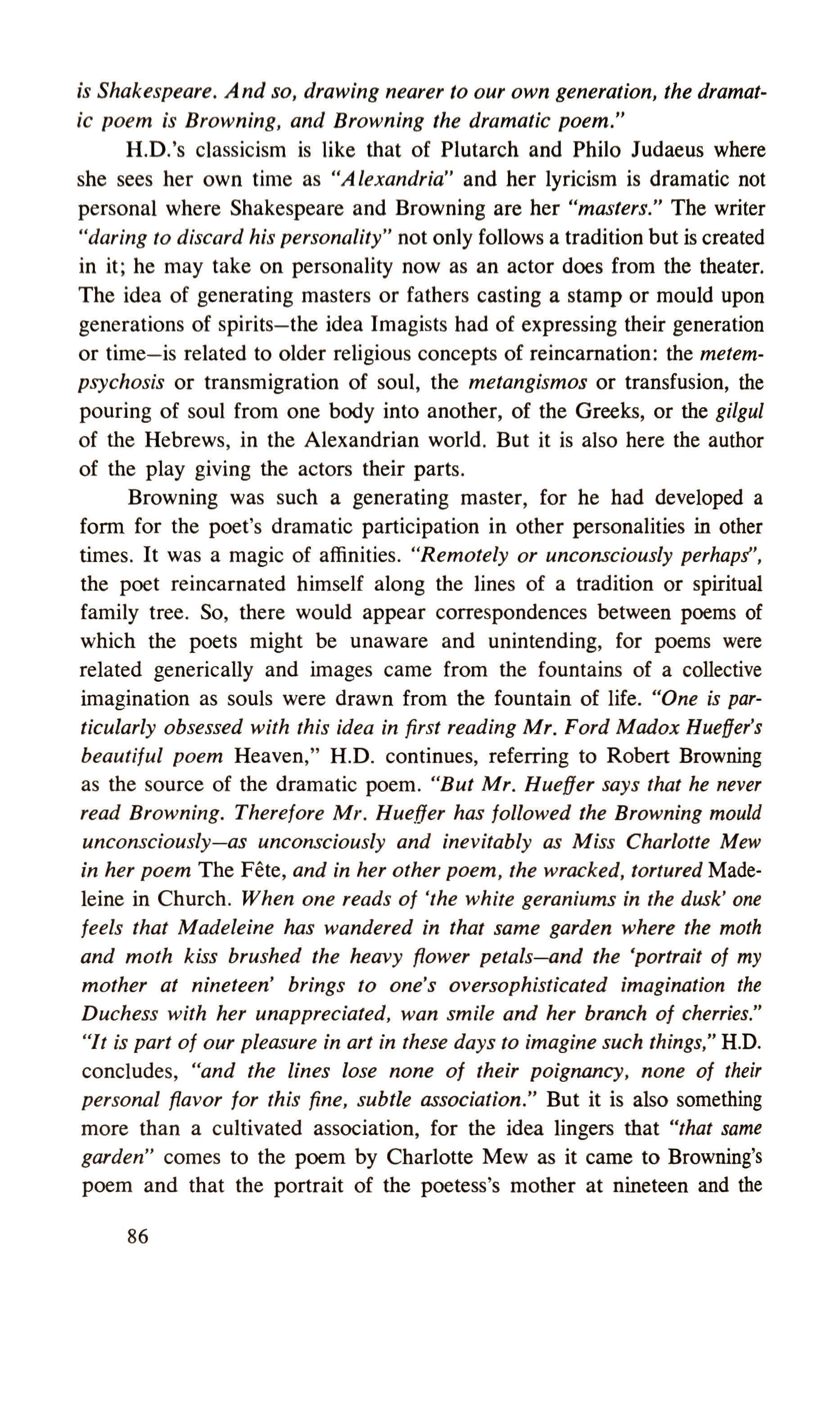
is Shakespeare. And so, drawing nearer to our own generation, the dramatic poem is Browning, and Browning the dramatic poem."
H.D.'s classicism is like that of Plutarch and Philo Judaeus where she sees her own time as "A lexandria" and her lyricism is dramatic not personal where Shakespeare and Browning are her "masters." The writer "daring to discard his personality" not only follows a tradition but is created in it; he may take on personality now as an actor does from the theater. The idea of generating masters or fathers casting a stamp or mould upon generations of spirits the idea Imagists had of expressing their generation or time is related to older religious concepts of reincarnation: the metempsychosis or transmigration of soul, the metanglsmos or transfusion, the pouring of soul from one body into another, of the Greeks, or the gilgul of the Hebrews, in the Alexandrian world. But it is also here the author of the play giving the actors their parts.
Browning was such a generating master, for he had developed a f01111 for the poet's dramatic participation in other personalities in other times, It was a magic of affinities. "Remotely or unconsciously perhaps", the poet reincarnated himself along the lines of a tradition or spiritual family tree. So, there would appear correspondences between poems of which the poets might be unaware and unintending, for poems were related generically and images came from the fountains of a collective imagination as souls were drawn from the fountain of life. "One is particularly obsessed with this idea in first reading Mr. Ford Madox HuefJer's beautiful poem Heaven," H.D. continues, referring to Robert Browning as the source of the dramatic poem. "But Mr. Hueffer says that he never read Browning. Therefore Mr. Hueffer has followed the Browning mould unconsciously as unconsciously and inevitably as Miss Charlotte Mew in her poem The Fete, and in her other poem, the wracked, tortured Madeleine in Church. When one reads of 'the white geraniums in the dusk' one feels that Madeleine has wandered in that same garden where the moth and moth kiss brushed the heavy flower petals-and the 'portrait of my mother at nineteen' brings to one's oversophisticated imagination the Duchess with her unappreciated, wan smile and her branch of cherries." "It is part of our pleasure in art in these days to imagine such things," H.D. concludes, "and the lines lose none of their poignancy, none of their personal flavor for this fine, subtle association." But it is also something more than a cultivated association, for the idea lingers that "that same garden" comes to the poem by Charlotte Mew as it ca me to Browning's poem and that the portrait of the poetess's mother at nineteen and the
86

portrait of the last duchess of Browning's duke are showings forth from a hidden idea.
In the voices of Pound or H.D., the poet's own identity becomes involved in the projection as Robert Browning's was not in his dramatis personae. Pound derives his self from Odysseus, Peire Vidal, Homer, Kung; he identifies with them in impersonating them. H.D. is to be confused with Sappho or Helen, with the priestess of Artemis in whom Artemis Herself speaks or with Helios. D.H. Lawrence is to become Dionysos.
In his magic-lantern art, Browning calls up Verona in Sordello and "Lo, the past is hurled
In twain: up-thrust, out-staggering on the world, Subsiding into shape, a darkness rears Its outline, kindles at the core, appears Verona
midway between the phantom-shows of Doctor Faustus (where we but see Helen of Troy) and the shadow-screens of the motion picture to come. So Browning also dismisses his phantoms: "The ghost's gone, and the story ends." This is an art in which the poet calls up image and persona, evoking at the same time his distance, the magician's pentacle within which he stands.
"The consciousness of some seems to rest," Pound says in Psychology and Troubadours, "or to have its center more properly, in what the Greek psychologists called the phantastikon. Their minds are, that is, circumvolved about them like soap-bubbles reflecting sundry patches of the macrocosmos." Here image was phanopoeia, "a casting of images upon the visual imagination." The Imagists in the beginning worked towards a new phantastikon. We are not to underestimate the role that this magic of reflections has in even the masterworks of Pound or H.D. But higher poetic power, it seemed to Pound, was in the "germinal" consciousness. The image or persona, what is seen in the world "outside" or in the mind's world "inside", no longer is a show of that world only, an epiphany, but is a seed, a generative point of the inner and outer.
So the persons and the images of Palimpsest work within each other, as the sequence of times is a set of interworkings. The palimpsest is not only that of image beneath image or person beneath person, but of time beneath time. Within London 1926 is wartime London; back of that, revealed within it, is an American scene that may also reveal Greece. As Edward Sapir in reviewing H.D.'s poetry had seen America in her Hellen87
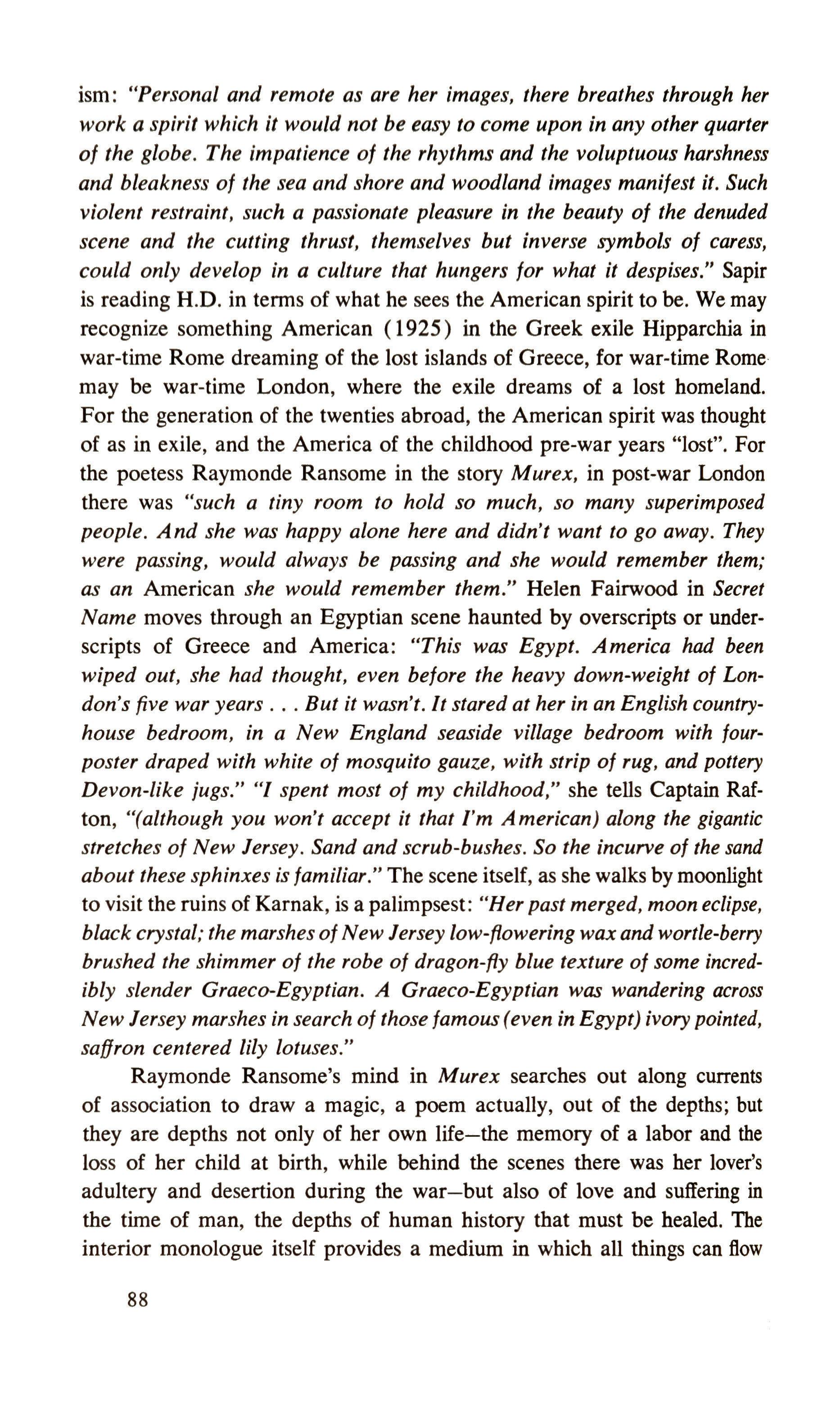
ism: "Personal and remote as are her images, there breathes through her work a spirit which it would not be easy to come upon in any other quarter 0/ the globe. The impatience 0/ the rhythms and the voluptuous harshness and bleakness 0/ the sea and shore and woodland images manifest it. Such violent restraint, such a passionate pleasure in the beauty 0/ the denuded scene and the cutting thrust, themselves but inverse symbols of caress, could only develop in a culture that hungers for what it despises." Sapir is reading H.D. in terms of what he sees the American spirit to be. We may recognize something American (1925) in the Greek exile Hipparchia in war-time Rome dreaming of the lost islands of Greece, for war-time Romemay be war-time London, where the exile dreams of a lost homeland. For the generation of the twenties abroad, the American spirit was thought of as in exile, and the America of the childhood pre-war years "lost". For the poetess Raymonde Ransome in the story Murex, in post-war London there was "such a tiny room to hold so much, so many superimposed people. And she was happy alone here and didn't want to go away. They were passing, would always be passing and she would remember them; as an American she would remember them." Helen Fairwood in Secret Name moves through an Egyptian scene haunted by overscripts or underscripts of Greece and America: "This was Egypt. America had been wiped out, she had thought, even before the heavy down-weight of London's five war years But it wasn't. It stared at her in an English countryhouse bedroom, in a New England seaside village bedroom with fourposter draped with white of mosquito gauze, with strip of rug, and pottery Devon-like jugs." "I spent most of my childhood," she tells Captain Rafton, "(although you won't accept it that I'm American) along the gigantic stretches of New Jersey. Sand and scrub-bushes. So the incurve of the sand about these sphinxes is familiar." The scene itself, as she walks bymoonlight to visit the ruins of Karnak, is a palimpsest: "Her past merged, moon eclipse, black crystal,' the marshes of New Jersey low-flowering wax and wortle-berry brushed the shimmer of the robe of dragon-fly blue texture of some incredibly slender Graeco-Egyptian. A Graeco-Egyptian was wandering across New Jersey marshes in search of those famous (even in Egypt) ivorypointed, saffron centered lily lotuses."
Raymonde Ransome's mind in Murex searches out along currents of association to draw a magic, a poem actually, out of the depths; but they are depths not only of her own life the memory of a labor and the loss of her child at birth, while behind the scenes there was her lover's adultery and desertion during the war but also of love and suffering in the time of man, the depths of human history that must be healed. The interior monologue itself provides a medium in which all things can flow
88
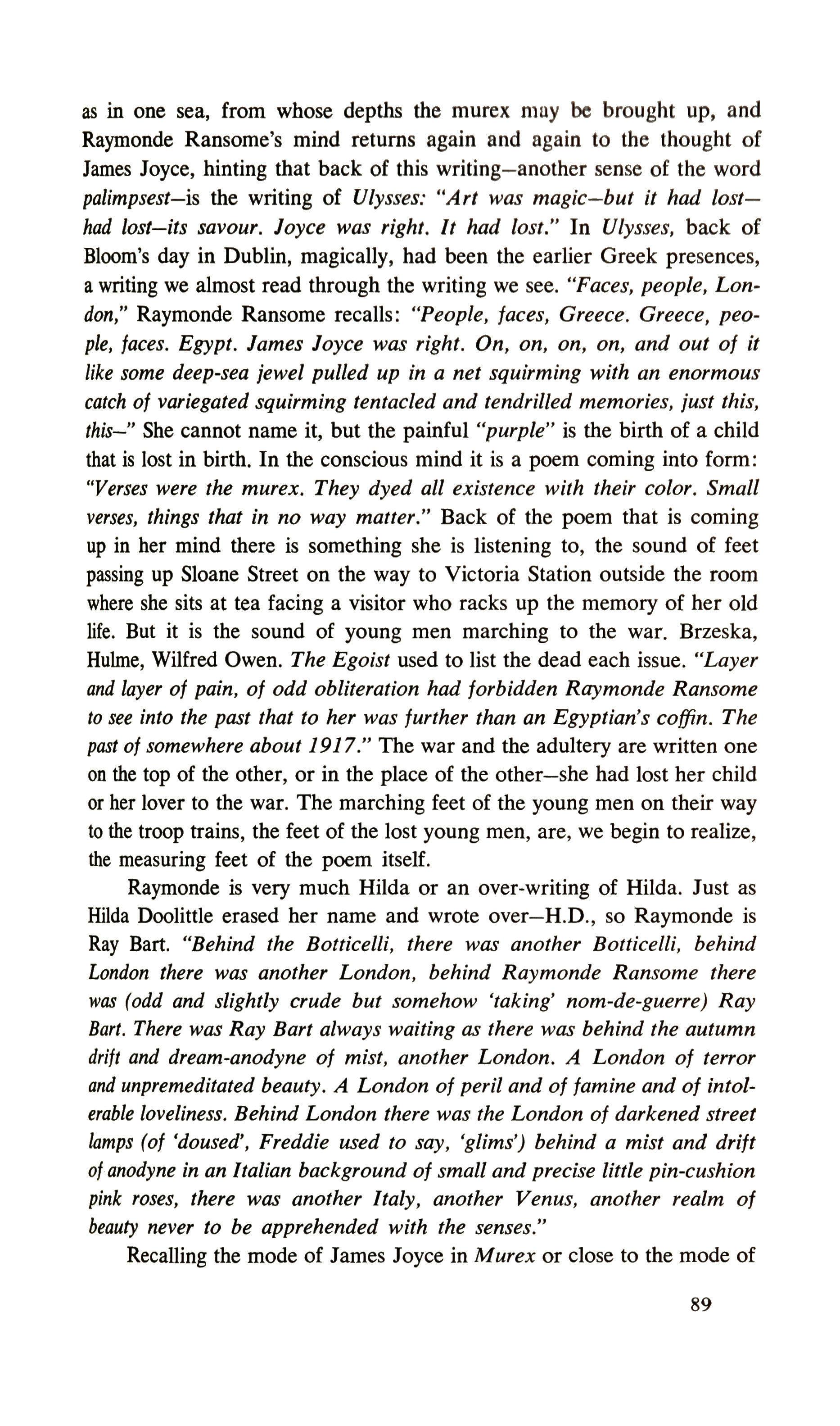
as in one sea, from whose depths the murex may be brought up, and Raymonde Ransome's mind returns again and again to the thought of James Joyce, hinting that back of this writing another sense of the word palimpsest is the writing of Ulysses.' "Art was magic but it had losthad lost its savour. Joyce was right. It had lost." In Ulysses, back of Bloom's day in Dublin, magically, had been the earlier Greek presences, a writing we almost read through the writing we see. "Faces, people, London," Raymonde Ransome recalls: "People, faces, Greece. Greece, people, faces. Egypt. James Joyce was right. On, on, on, on, and out of it like some deep-sea jewel pulled up in a net squirming with an enormous catch of variegated squirming tentacled and tendrilled memories, just this, this-' She cannot name it, but the painful "purple" is the birth of a child that is lost in birth. In the conscious mind it is a poem coming into fOI In: "Verses were the murex. They dyed all existence with their color. Small verses, things that in no way matter." Back of the poem that is coming up in her mind there is something she is listening to, the sound of feet passing up Sloane Street on the way to Victoria Station outside the room where she sits at tea facing a visitor who racks up the memory of her old life. But it is the sound of young men marching to the war. Brzeska, Hulme, Wilfred Owen. The Egoist used to list the dead each issue. "Layer and layer of pain, of odd obliteration had forbidden Raymonde Ransome to see into the past that to her was further than an Egyptian's coffin. The past of somewhere about 1917." The war and the adultery are written one on the top of the other, or in the place of the other she had lost her child or her lover to the war. The marching feet of the young men on their way to the troop trains, the feet of the lost young men, are, we begin to realize, the measuring feet of the poem itself.
Raymonde is very much Hilda or an over-writing of Hilda. Just as Hilda Doolittle erased her name and wrote over H.D., so Raymonde is Ray Bart. "Behind the Botticelli, there was another Botticelli, behind London there was another London, behind Raymonde Ransome there was (odd and slightly crude but somehow 'taking' nom-de-guerre) Ray Bart. There was Ray Bart always waiting as there was behind the autumn drift and dream-anodyne of mist, another London. A London of terror and unpremeditated beauty. A London of peril and of famine and of intolerable loveliness. Behind London there was the London of darkened street lamps (of 'doused', Freddie used to say, 'glims') behind a mist and drift of anodyne in an Italian background of small and precise little pin-cushion pink roses, there was another Italy, another Venus, another realm of beauty never to be apprehended with the senses."
Recalling the mode of James Joyce in Murex or close to the mode of
89
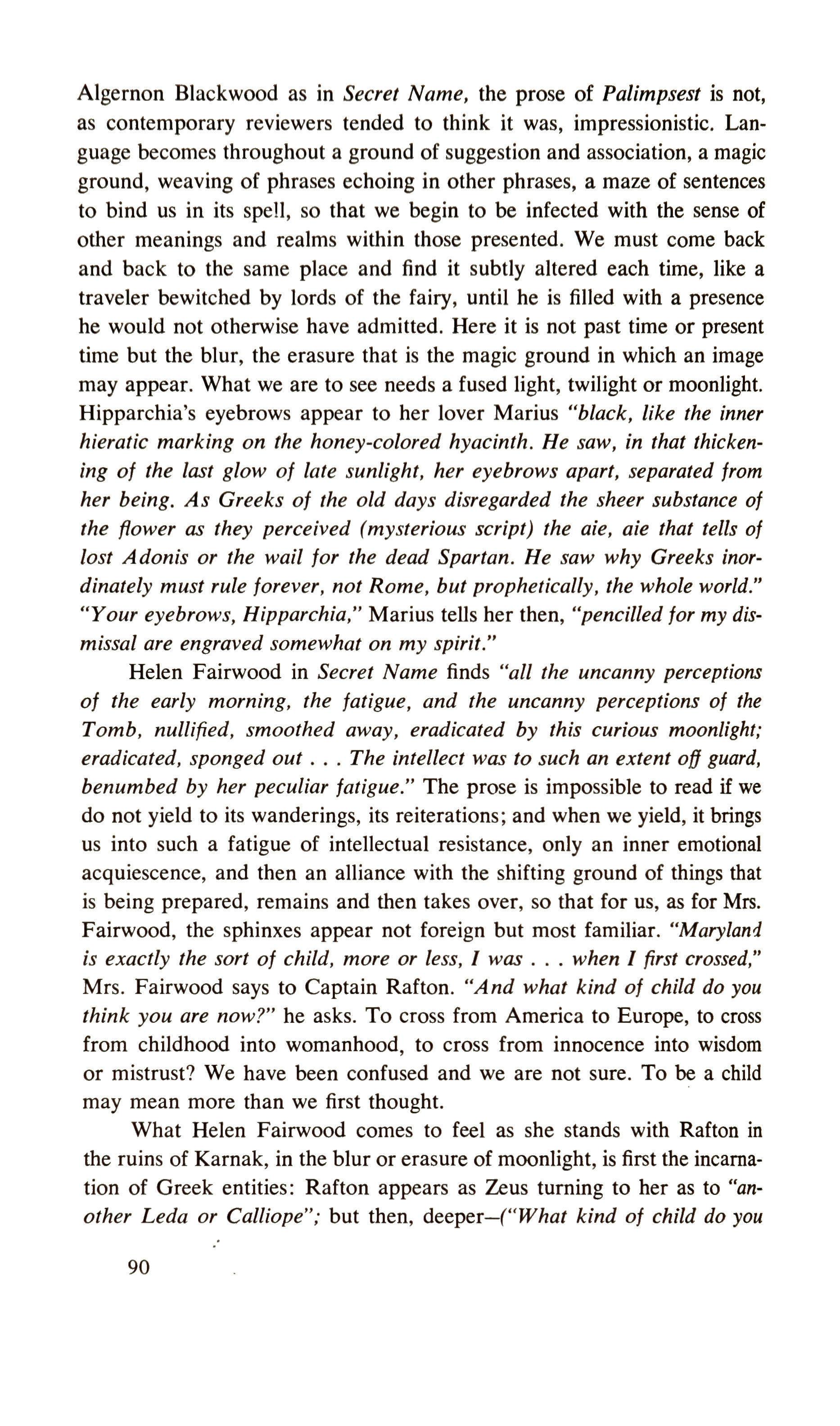
Algernon Blackwood as in Secret Name, the prose of Palimpsest is not, as contemporary reviewers tended to think it was, impressionistic. Language becomes throughout a ground of suggestion and association, a magic ground, weaving of phrases echoing in other phrases, a maze of sentences to bind us in its spell, so that we begin to be infected with the sense of other meanings and realms within those presented. We must come back and back to the same place and find it subtly altered each time, like a traveler bewitched by lords of the fairy, until he is filled with a presence he would not otherwise have admitted. Here it is not past time or present time but the blur, the erasure that is the magic ground in which an image may appear. What we are to see needs a fused light, twilight or moonlight. Hipparchia's eyebrows appear to her lover Marius "black, like the inner hieratic marking on the honey-colored hyacinth. He saw, in that thickening of the last glow of late sunlight, her eyebrows apart, separated from her being. As Greeks of the old days disregarded the sheer substance of the flower as they perceived (mysterious script) the aie, aie that tells of lost Adonis or the wail for the dead Spartan. He saw why Greeks inordinately must rule forever, not Rome, but prophetically, the whole world." "Your eyebrows, Hipparchia," Marius tells her then, "pencilled for my dismissal are engraved somewhat on my spirit."
Helen Fairwood in Secret Name finds "all the uncanny perceptions of the early morning, the fatigue, and the uncanny perceptions of the Tomb, nullified, smoothed away, eradicated by this curious moonlight,' eradicated, sponged out The intellect was to such an extent off guard, benumbed by her peculiar fatigue." The prose is impossible to read if we do not yield to its wanderings, its reiterations; and when we yield, it brings us into such a fatigue of intellectual resistance, only an inner emotional acquiescence, and then an alliance with the shifting ground of things that is being prepared, remains and then takes over, so that for us, as for Mrs. Fairwood, the sphinxes appear not foreign but most familiar. "Maryland is exactly the sort of child, more or less, 1 was when 1 first crossed," Mrs. Fairwood says to Captain Rafton. "And what kind of child do you think you are now?" he asks. To cross from America to Europe, to cross from childhood into womanhood, to cross from innocence into wisdom or mistrust? We have been confused and we are not sure. To be a child may mean more than we first thought.
What Helen Fairwood comes to feel as she stands with Rafton in the ruins of Karnak, in the blur or erasure of moonlight, is first the incarnation of Greek entities: Rafton appears as Zeus turning to her as to "another Leda or Calliope",' but then, deeper ("What kind of child do you
90
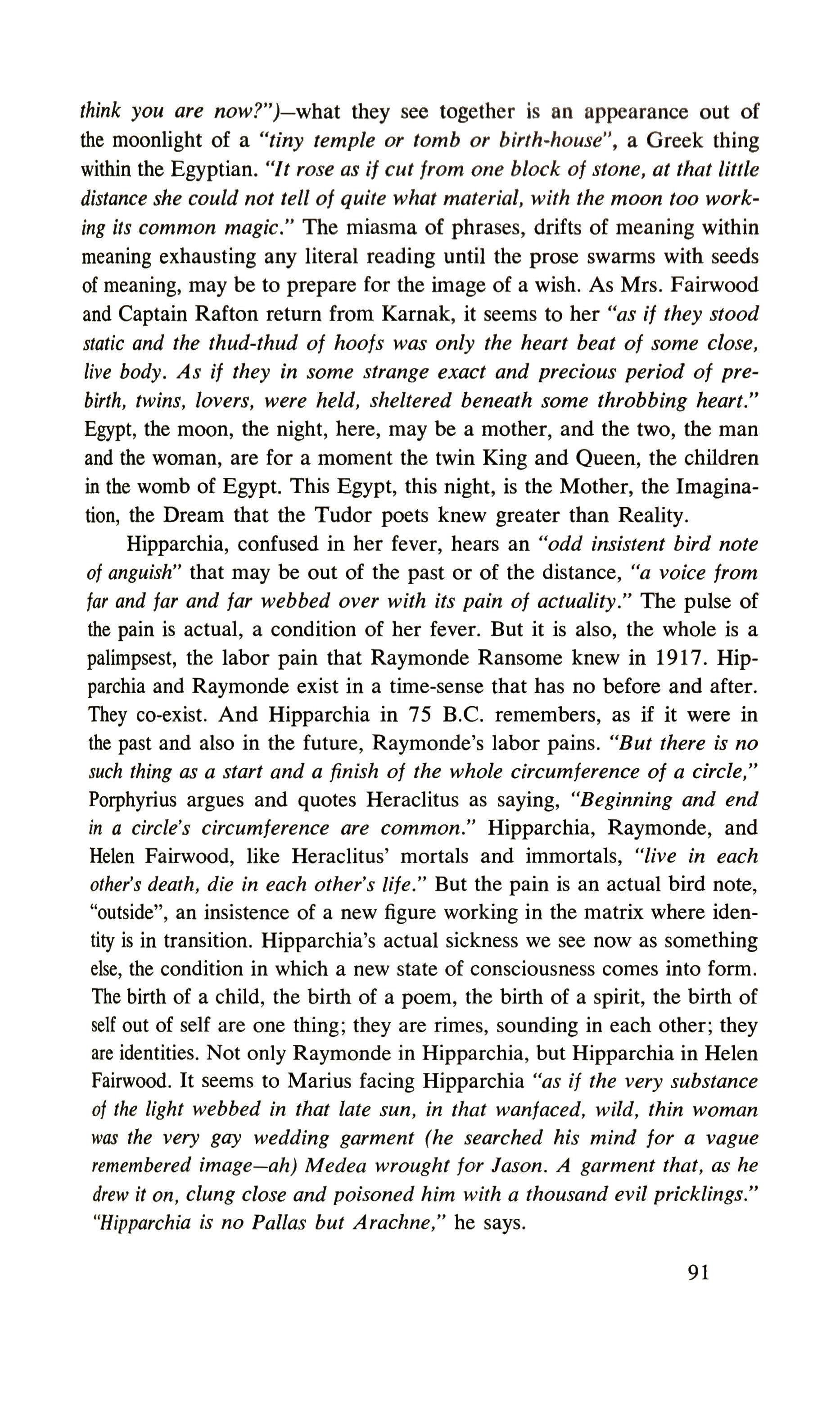
think you are now?") what they see together is an appearance out of the moonlight of a "tiny temple or tomb or birth-house", a Greek thing within the Egyptian. "It rose as if cut from one block of stone, at that little distance she could not tell of quite what material, with the moon too working its common magic." The miasma of phrases, drifts of meaning within meaning exhausting any literal reading until the prose swarms with seeds of meaning, may be to prepare for the image of a wish. As Mrs. Fairwood and Captain Rafton return from Karnak, it seems to her "as if they stood static and the thud-thud of hoofs was only the heart beat of some close, live body. As if they in some strange exact and precious period of prebirth, twins, lovers, were held, sheltered beneath some throbbing heart." Egypt, the moon, the night, here, may be a mother, and the two, the man and the woman, are for a moment the twin King and Queen, the children in the womb of Egypt. This Egypt, this night, is the Mother, the Imagination, the Dream that the Tudor poets knew greater than Reality. Hipparchia, confused in her fever, hears an "odd insistent bird note of anguish" that may be out of the past or of the distance, "a voice from far and far and far webbed over with its pain of actuality." The pulse of the pain is actual, a condition of her fever. But it is also, the whole is a palimpsest, the labor pain that Raymonde Ransome knew in 1917. Hipparchia and Raymonde exist in a time-sense that has no before and after. They co-exist. And Hipparchia in 75 B.C. remembers, as if it were in the past and also in the future, Raymonde's labor pains. "But there is no such thing as a start and a finish of the whole circumference of a circle," Porphyrius argues and quotes Heraclitus as saying, "Beginning and end in a circle's circumference are common." Hipparchia, Raymonde, and Helen Fairwood, like Heraclitus' mortals and immortals, "live in each other's death, die in each other's life." But the pain is an actual bird note, "outside", an insistence of a new figure working in the matrix where identity is in transition. Hipparchia's actual sickness we see now as something else, the condition in which a new state of consciousness comes into form, The birth of a child, the birth of a poem, the birth of a spirit, the birth of self out of self are one thing; they are rimes, sounding in each other; they are identities. Not only Raymonde in Hipparchia, but Hipparchia in Helen Fairwood. It seems to Marius facing Hipparchia "as if the very substance of the light webbed in that late sun, in that waniaced, wild, thin woman was the very gay wedding garment (he searched his mind for a vague remembered image ah) Medea wrought for Jason. A garment that, as he drew it on, clung close and poisoned him with a thousand evil pricklings:" "Hipparchia is no Pallas but Arachne," he says.
91

In Secret Name the figure of the woman as Arachne, the webspinner, appears again. Helen Fairwood's over-mind is Athenian, but below, her thoughts wander and in the dusk of evening take over: "It was utterly Athenian starkly to define, to outline in terms of thought every human emotion, not making allowance for this intermediate state where thought and emotion were delicately merged. Thought and emotion merged delicately now that she had let go, or now that her very evident fatigue had let go for her, that stark analytical hold on things of emotion, on things of intellect. Fire-flies (she couldn't help feeling) should have darted up, hung between her and the smudged-out smile of the oblong cat-Sekmet, a veil, glimmering of dancing frenzied stars." The undermind wandering weaves a complexity in which the fatigue of the overmind spreads until Athene succumbs to Arachne. Dressing for dinner Helen finds that "she was in the un-A thenian dusk of the blurred over Luxor garden, making deep down a web, a fine and subtle surprise for Captain Raiton when the blue slim creature with the heavy blue collar of blue stones should rise, 'you'." Her upper-mind had thought about Greece and Egypt, about thought and emotion, but her lower-mind all the time had been conceiving how she would dress herself. "She was planning this, in the spider part of her subconscious, all this, but her brain had not recognized the plan, had only starkly qualified the empty spaces of the garden with some image, 'there should be, why aren't there, knots and star jewels of flaming fire-flies?' Her brain had formed that precise image but her spider self was weaving, weaving down, down the very, very self she was to offer."
The rimes or reoccurrences are knots in the web or tissue of reality. Suddenly, at the knot of it, we realize what is going on. If the mind of Pallas Athena is our gnosis, the mind of Arachne is our realization of what is. H.D. is to be concerned now as her Hipparchia, Raymonde, or Helen Fairwood are concerned with "transitions of life", with things that enter, not only her thought but her identity, which will be changed and figured anew. "Osiris was waiting to recall her," it seems to Hipparchia. Who the Osiris is still engages H.D.'s imagination twenty years later in The Walls Do Not Fall.' "Osiris / the star Sirius"
relates resurrection myth and resurrection reality through the ages; in her last great work, Helen in Egypt, the Presence of Greece in Egypt, of Egypt in Greece, is the very warp and woof of her poem.
A gloss of The Book of the Dead says: "As for yesterday, that is
92 1
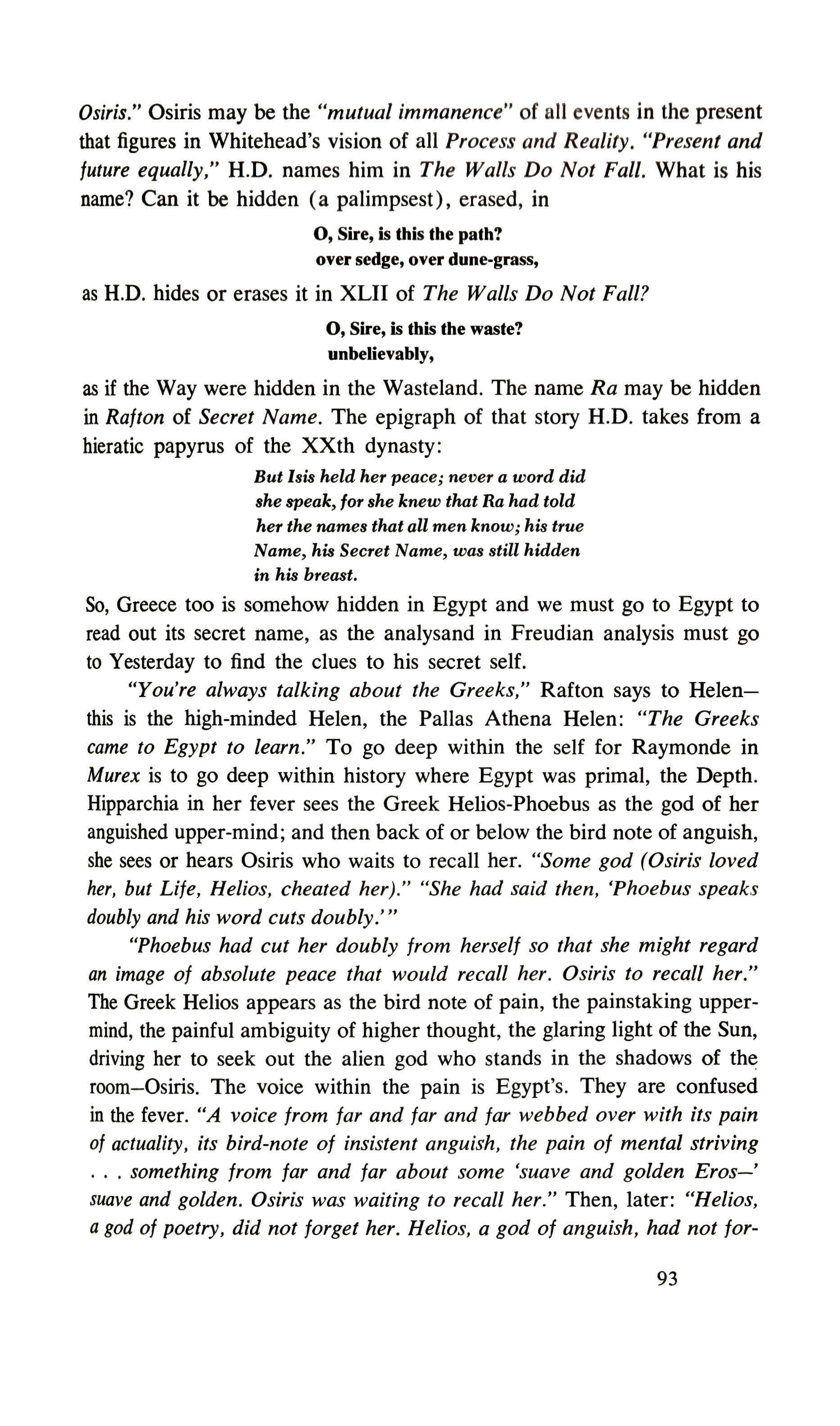
Osiris." Osiris may be the "mutual immanence" of all events in the present that figures in Whitehead's vision of all Process and Reality. "Present and future equally," H.D. names him in The Walls Do Not Fall. What is his name? Can it be hidden (a palimpsest), erased, in 0, Sire, is this the path? over sedge, over dune-grass, as H.D. hides or erases it in XLII of The Walls Do Not Fall?
0, Sire, is this the waste? unbelievably,
as if the Way were hidden in the Wasteland. The name Ra may be hidden in Rafton of Secret Name. The epigraph of that story H.D. takes from a hieratic papyrus of the XXth dynasty:
But Isis held her peace; never a word did she speak, for she knew that Ra had told her the names that all men know; his true Name, his Secret Name, was still hidden in his breast.
So, Greece too is somehow hidden in Egypt and we must go to Egypt to read out its secret name, as the analysand in Freudian analysis must go to Yesterday to find the clues to his secret self.
"You're always talking about the Greeks," Rafton says to Helenthis is the high-minded Helen, the Pallas Athena Helen: "The Greeks came to Egypt to learn." To go deep within the self for Raymonde in Murex is to go deep within history where Egypt was primal, the Depth. Hipparchia in her fever sees the Greek Helios-Phoebus as the god of her anguished upper-mind; and then back of or below the bird note of anguish, she sees or hears Osiris who waits to recall her. "Some god (Osiris loved her, but Life, Helios, cheated her)." "She had said then, 'Phoebus speaks doubly and his word cuts doubly.'"
"Phoebus had cut her doubly from herself so that she might regard an image of absolute peace that would recall her. Osiris to recall her."
The Greek Helios appears as the bird note of pain, the painstaking uppermind, the painful ambiguity of higher thought, the glaring light of the Sun, driving her to seek out the alien god who stands in the shadows of the room-Osiris. The voice within the pain is Egypt's. They are confused in the fever. "A voice from far and far and far webbed over with its pain of actuality, its bird-note of insistent anguish, the pain of mental striving something from far and far about some 'suave and golden Eros suave and golden. Osiris was waiting to recall her." Then, later: "Helios, a god of poetry, did not forget her. Helios, a god of anguish, had not for-
93
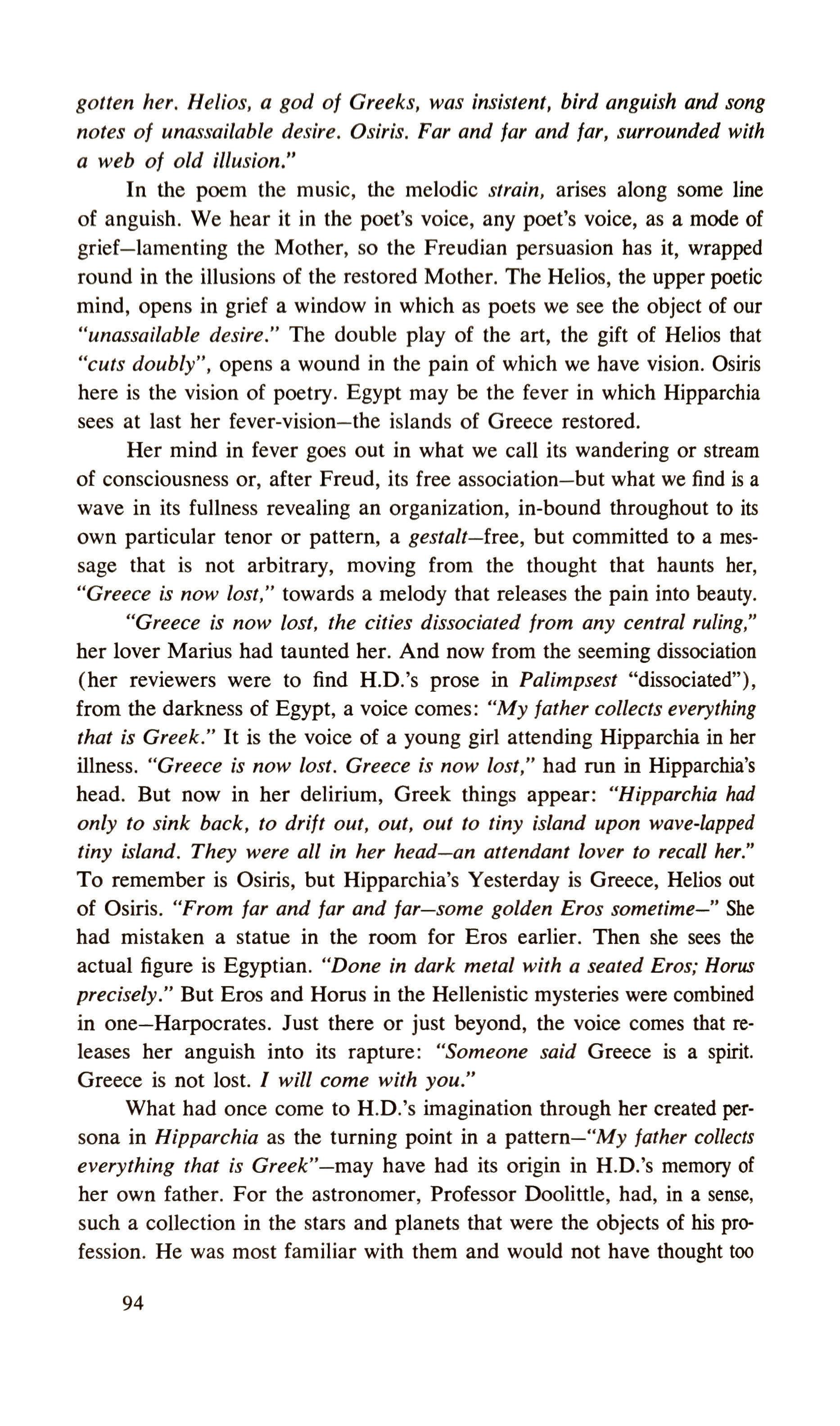
gotten her. Helios, a god of Greeks, was insistent, bird anguish and song notes of unassailable desire. Osiris. Far and far and far, surrounded with a web of old illusion."
In the poem the music, the melodic strain, arises along some line of anguish. We hear it in the poet's voice, any poet's voice, as a mode of grief lamenting the Mother, so the Freudian persuasion has it, wrapped round in the illusions of the restored Mother. The Helios, the upper poetic mind, opens in grief a window in which as poets we see the object of our "unassailable desire." The double play of the art, the gift of Helios that "cuts doubly", opens a wound in the pain of which we have vision. Osiris here is the vision of poetry. Egypt may be the fever in which Hipparchia sees at last her fever-vision the islands of Greece restored. Her mind in fever goes out in what we call its wandering or stream of consciousness or, after Freud, its free association but what we find is a wave in its fullness revealing an organization, in-bound throughout to its own particular tenor or pattern, a gestalt free, but committed to a message that is not arbitrary, moving from the thought that haunts her, "Greece is now lost," towards a melody that releases the pain into beauty. "Greece is now lost, the cities dissociated from any central ruling," her lover Marius had taunted her. And now from the seeming dissociation (her reviewers were to find H.D.'s prose in Palimpsest "dissociated"), from the darkness of Egypt, a voice comes: "My father collects everything that is Greek." It is the voice of a young girl attending Hipparchia in her illness. "Greece is now lost. Greece is now lost," had run in Hipparchia's head. But now in her delirium, Greek things appear: "Hipparchia had only to sink back, to drift out, out, out to tiny island upon wave-lapped tiny island. They were all in her head an attendant lover to recall her." To remember is Osiris, but Hipparchia's Yesterday is Greece, Hellos out of Osiris. "From far and far and far some golden Eros sometime-" She had mistaken a statue in the room for Eros earlier. Then she sees the actual figure is Egyptian. "Done in dark metal with a seated Eros,' Horus precisely." But Eros and Horus in the Hellenistic mysteries were combined in one Harpocrates. Just there or just beyond, the voice comes that releases her anguish into its rapture: "Someone said Greece is a spirit. Greece is not lost. I will come with you."
What had once come to H.D.'s imagination through her created persona in Hipparchia as the turning point in a pattern "My father collects everything that is Greek" may have had its origin in H.D.'s memory of her own father. For the astronomer, Professor Doolittle, had, in a sense, such a collection in the stars and planets that were the objects of his profession. He was most familiar with them and would not have thought too
94
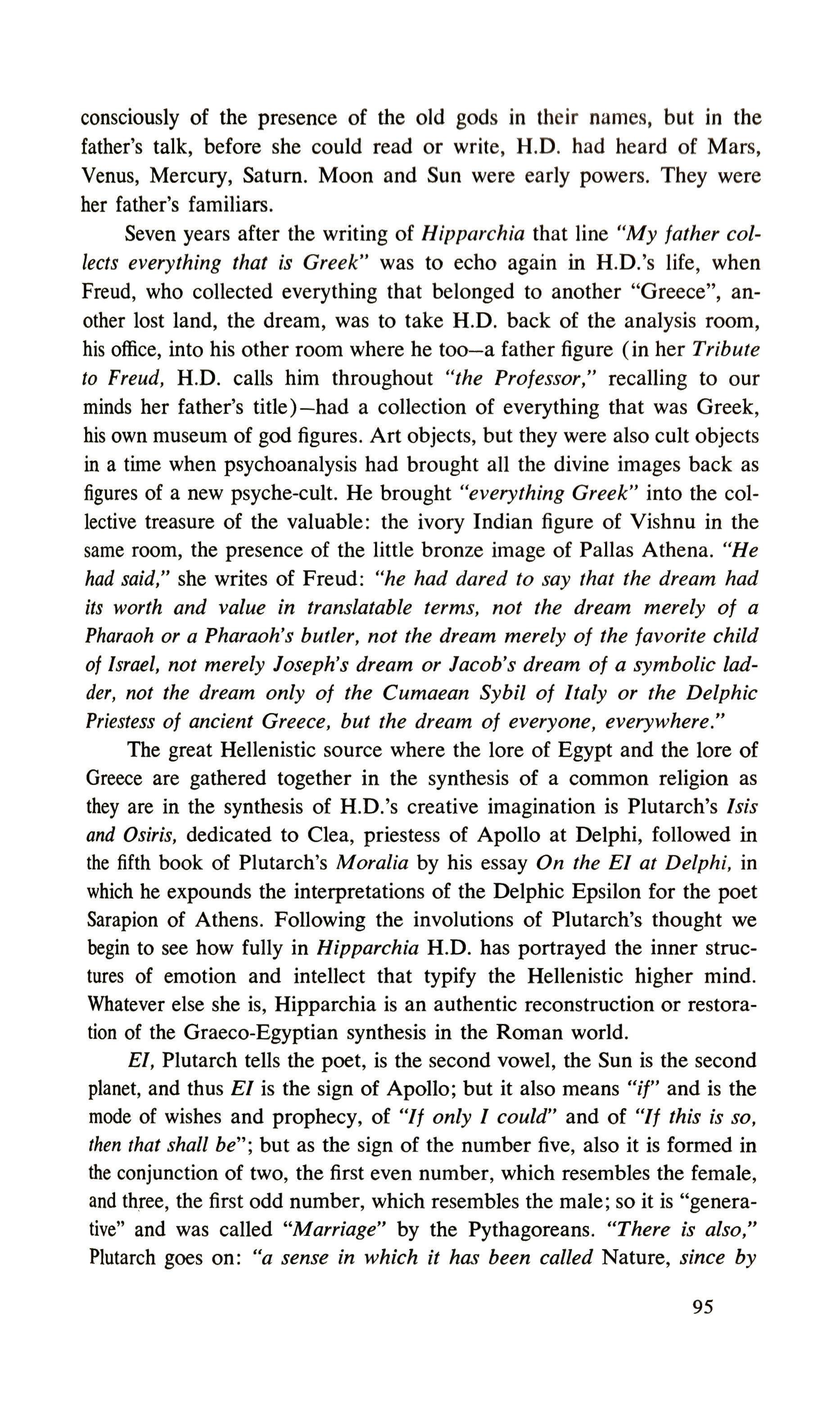
consciously of the presence of the old gods in their names, but in the father's talk, before she could read or write, H.D. had heard of Mars, Venus, Mercury, Saturn. Moon and Sun were early powers. They were her father's familiars.
Seven years after the writing of Hipparchia that line "My father collects everything that is Greek" was to echo again in H.D.'s life, when Freud, who collected everything that belonged to another "Greece", another lost land, the dream, was to take H.D. back of the analysis room, his office, into his other room where he too-a father figure (in her Tribute to Freud, H.D. calls him throughout "the Professor," recalling to our minds her father's title) had a collection of everything that was Greek, his own museum of god figures. Art objects, but they were also cult objects in a time when psychoanalysis had brought all the divine images back as figures of a new psyche-cult. He brought "everything Greek" into the collective treasure of the valuable: the ivory Indian figure of Vishnu in the same room, the presence of the little bronze image of Pallas Athena. "He had said," she writes of Freud: "he had dared to say that the dream had its worth and value in translatable terms, not the dream merely of a Pharaoh or a Pharaoh's butler, not the dream merely of the favorite child of Israel, not merely Joseph's dream or Jacob's dream of a symbolic ladder, not the dream only of the Cumaean Sybil of Italy or the Delphic Priestess of ancient Greece, but the dream of everyone, everywhere."
The great Hellenistic source where the lore of Egypt and the lore of Greece are gathered together in the synthesis of a common religion as they are in the synthesis of H.D.'s creative imagination is Plutarch's Isis and Osiris, dedicated to Clea, priestess of Apollo at Delphi, followed in the fifth book of Plutarch's Moralia by his essay On the El at Delphi, in which he expounds the interpretations of the Delphic Epsilon for the poet Sarapion of Athens. Following the involutions of Plutarch's thought we begin to see how fully in Hipparchia H.D. has portrayed the inner structures of emotion and intellect that typify the Hellenistic higher mind. Whatever else she is, Hipparchia is an authentic reconstruction or restoration of the Graeco-Egyptian synthesis in the Roman world.
EI, Plutarch tells the poet, is the second vowel, the Sun is the second planet, and thus EI is the sign of Apollo; but it also means "if" and is the mode of wishes and prophecy, of "If only 1 could" and of "If this is so, then that shall be"; but as the sign of the number five, also it is formed in the conjunction of two, the first even number, which resembles the female, and three, the first odd number, which resembles the male; so it is "generative" and was called "Marriage" by the Pythagoreans. "There is also," Plutarch goes on: "a sense in which it has been called Nature, since by
95
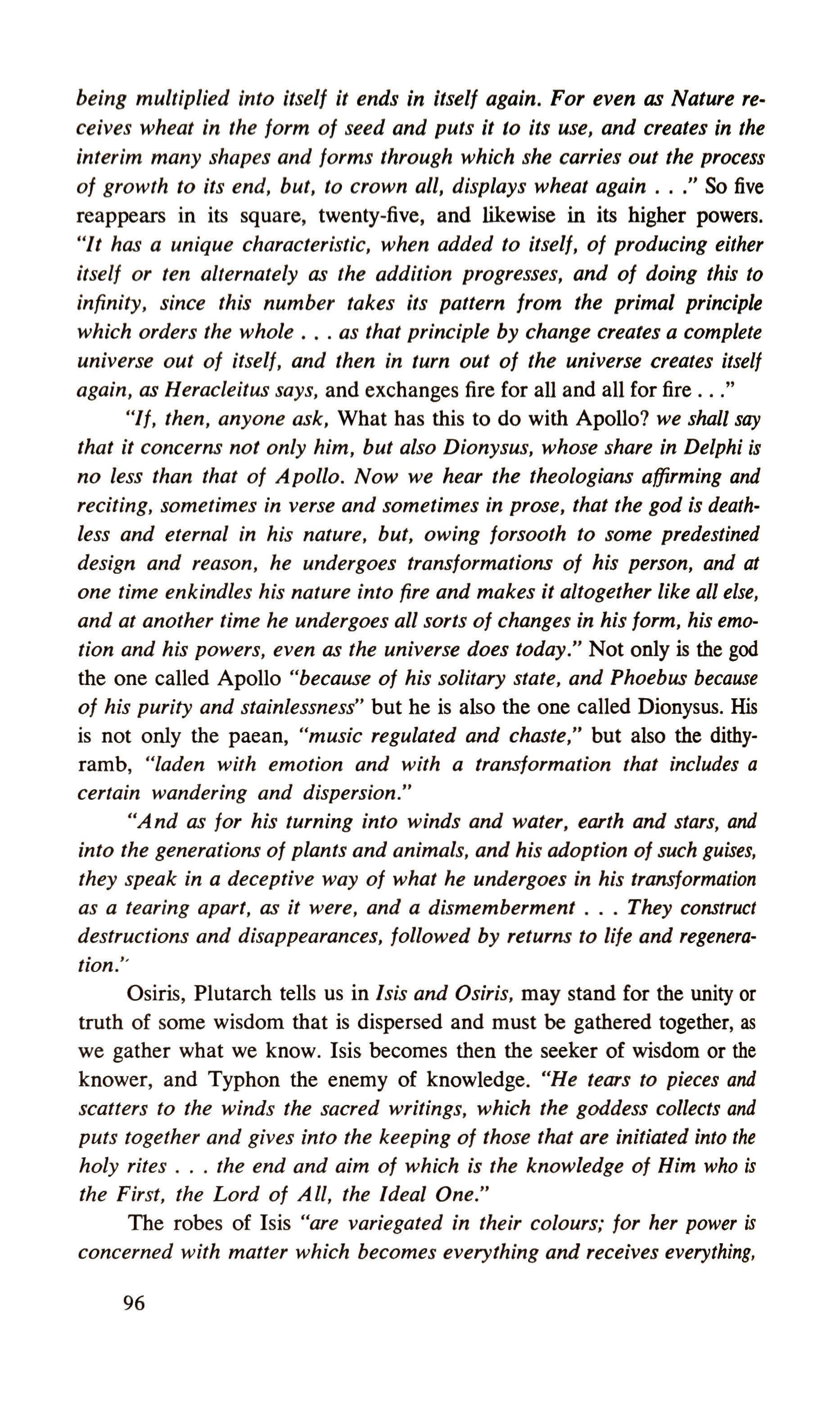
being multiplied into itself it ends in itself again. For even as Nature receives wheat in the form of seed and puts it to its use, and creates in the interim many shapes and forms through which she carries out the process of growth to its end, but, to crown all, displays wheat again So five reappeal's in its square, twenty-five, and likewise in its higher powers. "It has a unique characteristic, when added to itself, of producing either itself or ten alternately as the addition progresses, and 0/ doing this to infinity, since this number takes its pattern from the primal principle which orders the whole as that principle by change creates a complete universe out 0/ itself, and then in turn out of the universe creates itself again, as Heracleitus says, and exchanges fire for all and all for fire
"II, then, anyone ask, What has this to do with Apollo? we shall say that it concerns not only him, but also Dionysus, whose share in Delphi is no less than that of Apollo. Now we hear the theologians affirming and reciting, sometimes in verse and sometimes in prose, that the god is deathless and eternal in his nature, but, owing iorsootb to some predestined design and reason, he undergoes transformations 0/ his person, and at one time enkindles his nature into fire and makes it altogether like all else, and at another time he undergoes all sorts 01 changes in his [orm, his emotion and his powers, even as the universe does today." Not only is the god the one called Apollo "because of his solitary state, and Phoebus because 0/ his purity and stainlessness" but he is also the one called Dionysus. His is not only the paean, "music regulated and chaste," but also the dithyramb, "laden with emotion and with a transformation that includes a certain wandering and dispersion."
"And as for his turning into winds and water, earth and stars, and into the generations 0/ plants and animals, and his adoption of such guises, they speak in a deceptive way 0/ what he undergoes in his transformation as a tearing apart, as it were, and a dismemberment They construct destructions and disappearances, followed by returns to life and regeneration."
Osiris, Plutarch tells us in Isis and Osiris, may stand for the unity or truth of some wisdom that is dispersed and must be gathered together, as we gather what we know. Isis becomes then the seeker of wisdom or the knower, and Typhon the enemy of knowledge. "He tears to pieces and scatters to the winds the sacred writings, which the goddess collects and puts together and gives into the keeping 0/ those that are initiated into the holy rites the end and aim of which is the knowledge of Him who is the First, the Lord 0/ All, the Ideal One."
The robes of Isis "are variegated in their colours,' for her power is concerned with matter which becomes everything and receives everything,
96
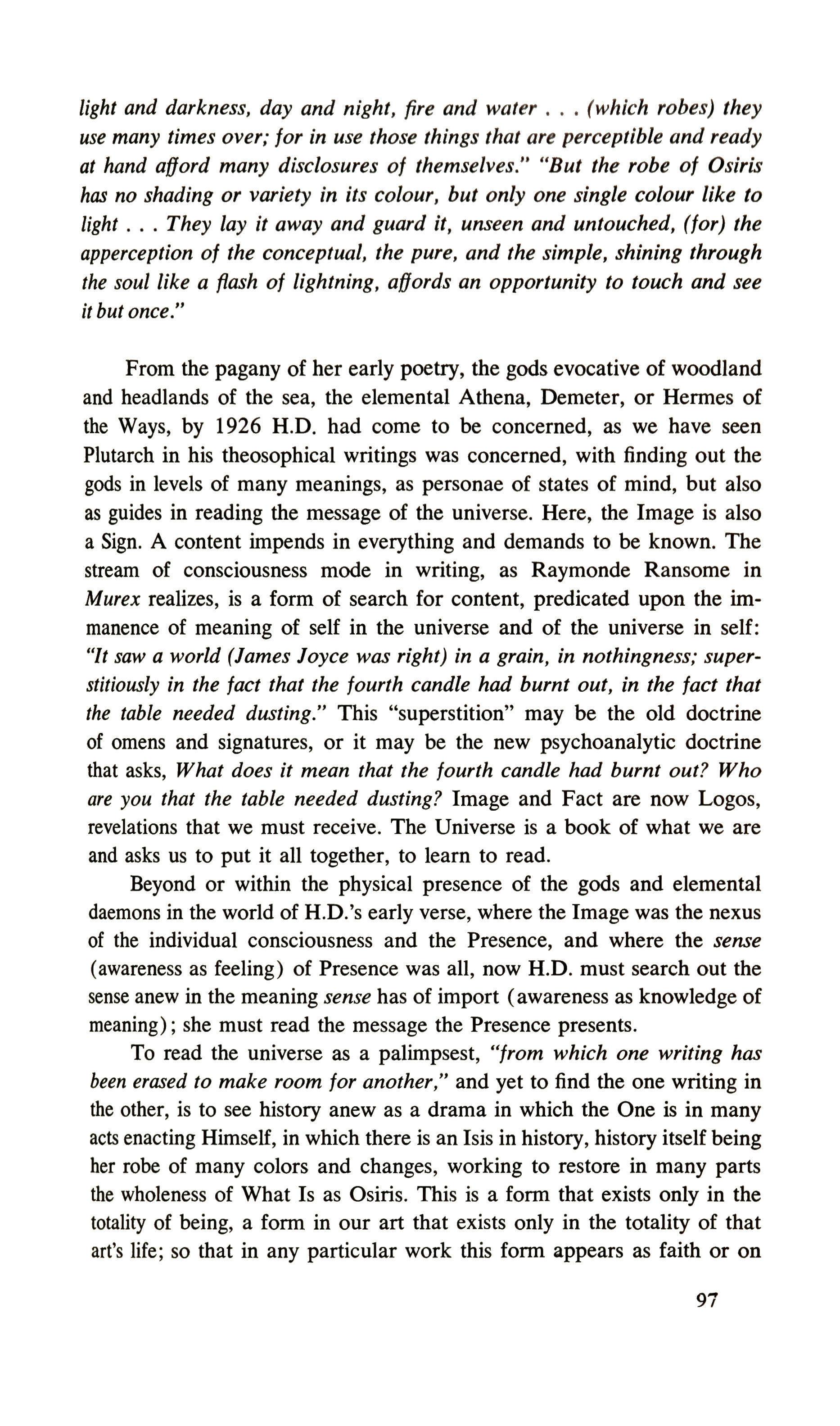
light and darkness, day and night, fire and water ..• (which robes) they use many times over; for in use those things that are perceptible and ready at hand afford many disclosures of themselves." "But the robe of Osiris has no shading or variety in its colour, but only one single colour like to light They lay it away and guard it, unseen and untouched, (for) the apperception of the conceptual, the pure, and the simple, shining through the soul like a flash of lightning, affords an opportunity to touch and see it but once."
From the pagany of her early poetry, the gods evocative of woodland and headlands of the sea, the elemental Athena, Demeter, or Hermes of the Ways, by 1926 H.D. had come to be concerned, as we have seen Plutarch in his theosophical writings was concerned, with finding out the gods in levels of many meanings, as personae of states of mind, but also as guides in reading the message of the universe. Here, the Image is also a Sign. A content impends in everything and demands to be known. The stream of consciousness mode in writing, as Raymonde Ransome in Murex realizes, is a form of search for content, predicated upon the immanence of meaning of self in the universe and of the universe in self: "lt saw a world (James Joyce was right) in a grain, in nothingness,' superstitiously in the fact that the fourth candle had burnt out, in the fact that the table needed dusting." This "superstition" may be the old doctrine of omens and signatures, or it may be the new psychoanalytic doctrine that asks, What does it mean that the fourth candle had burnt out? Who are you that the table needed dusting? Image and Fact are now Logos, revelations that we must receive. The Universe is a book of what we are and asks us to put it all together, to learn to read.
Beyond or within the physical presence of the gods and elemental daemons in the world of H.D.'s early verse, where the Image was the nexus of the individual consciousness and the Presence, and where the sense (awareness as feeling) of Presence was all, now H.D. must search out the sense anew in the meaning sense has of import (awareness as knowledge of meaning); she must read the message the Presence presents.
To read the universe as a palimpsest, "from which one writing has been erased to make room for another," and yet to find the one writing in the other, is to see history anew as a drama in which the One is in many acts enacting Himself, in which there is an Isis in history, history itself being her robe of many colors and changes, working to restore in many parts the wholeness of What Is as Osiris. This is a form that exists only in the totality of being, a form in our art that exists only in the totality of that art's life; so that in any particular work this fonn appears as faith or on
97
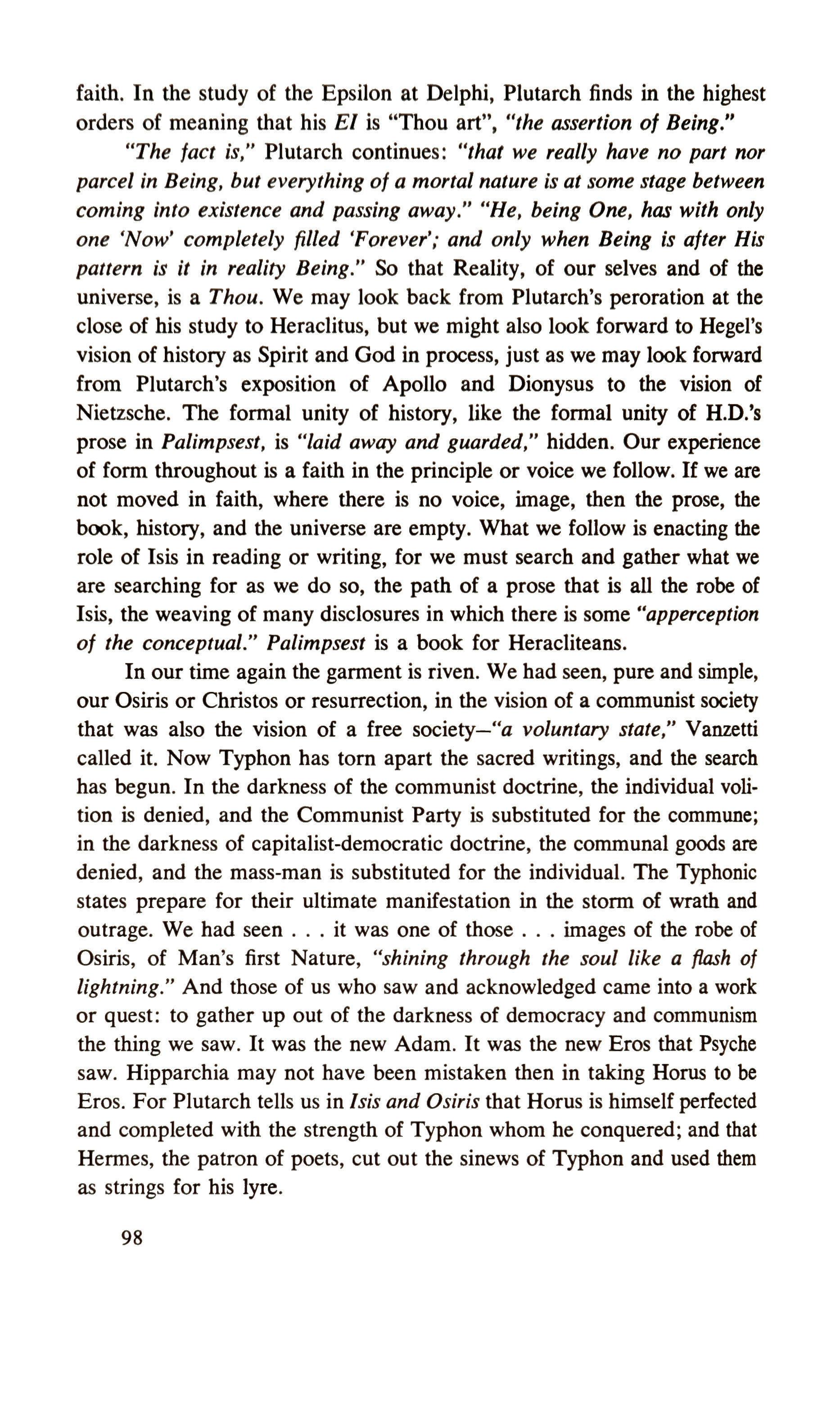
faith. In the study of the Epsilon at Delphi, Plutarch finds in the highest orders of meaning that his EI is "Thou art", "the assertion of Being."
"The fact is," Plutarch continues: "that we really have no part nor parcel in Being, but everything of a mortal nature is at some stage between coming into existence and passing away." "He, being One, has with only one 'Now' completely filled 'Forever',' and only when Being is after His pattern is it in reality Being." So that Reality, of our selves and of the universe, is a Thou. We may look back from Plutarch's peroration at the close of his study to Heraclitus, but we might also look forward to Hegel's vision of history as Spirit and God in process, just as we may look forward from Plutarch's exposition of Apollo and Dionysus to the vision of Nietzsche. The formal unity of history, like the formal unity of H.D.'s prose in Palimpsest, is "laid away and guarded," hidden. Our experience of form throughout is a faith in the principle or voice we follow. If we are not moved in faith, where there is no voice, image, then the prose, the book, history, and the universe are empty. What we follow is enacting the role of Isis in reading or writing, for we must search and gather what we are searching for as we do so, the path of a prose that is all the robe of Isis, the weaving of many disclosures in which there is some "apperception of the conceptual." Palimpsest is a book for Heracliteans.
In our time again the garment is riven. We had seen, pure and simple, our Osiris or Christos or resurrection, in the vision of a communist society that was also the vision of a free society "a voluntary state," Vanzetti called it. Now Typhon has tom apart the sacred writings, and the search has begun. In the darkness of the communist doctrine, the individual volition is denied, and the Communist Party is substituted for the commune; in the darkness of capitalist-democratic doctrine, the communal goods ace denied, and the mass-man is substituted for the individual. The Typhonic states prepare for their ultimate manifestation in the storm of wrath and outrage. We had seen it was one of those images of the robe of Osiris, of Man's first Nature, "shining through the soul like a flash of lightning." And those of us who saw and acknowledged came into a work or quest: to gather up out of the darkness of democracy and communism the thing we saw. It was the new Adam. It was the new Eros that Psyche saw. Hipparchia may not have been mistaken then in taking Horus to be Eros. For Plutarch tells us in Isis and Osiris that Horus is himself perfected and completed with the strength of Typhon whom he conquered; and that Hermes, the patron of poets, cut out the sinews of Typhon and used them as strings for his lyre.
98
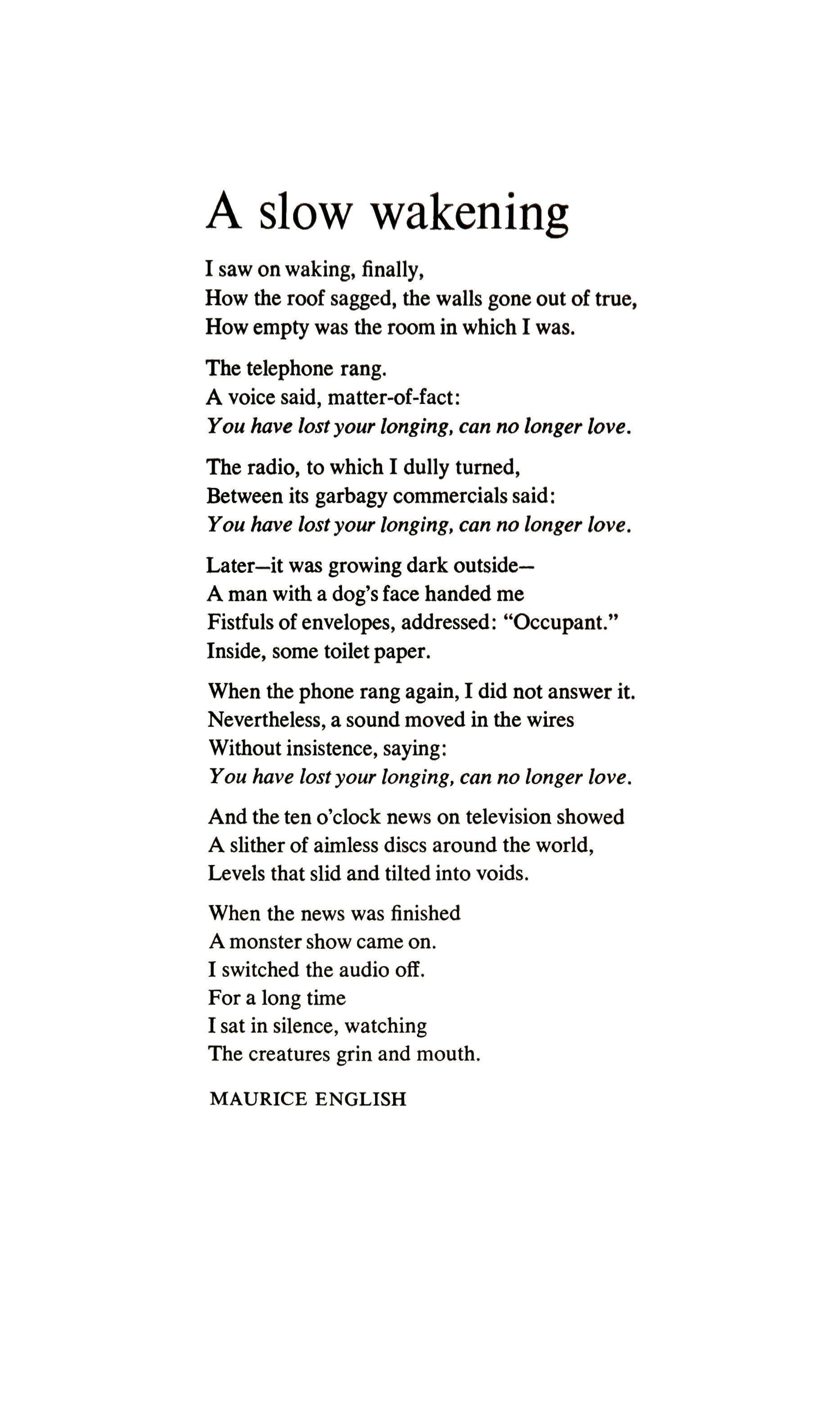
I saw on waking, finally, How the roof sagged, the walls gone out of true, How empty was the room in which I was.
The telephone rang.
A voice said, matter-of-fact: You have lostyour longing, can no longer love.
The radio, to which I dully turned, Between its garbagy commercials said: You have lostyour longing, can no longer love.
Later it was growing dark outsideA man with a dog's face handed me Fistfuls of envelopes, addressed: "Occupant." Inside, some toilet paper.
When the phone rang again, I did not answer it. Nevertheless, a sound moved in the wires Without insistence, saying: You have lost your longing, can no longer love.
And the ten o'clock news on television showed A slither of aimless discs around the world, Levels that slid and tilted into voids.
When the news was finished A monster show came on.
I switched the audio off.
For a long time
I sat in silence, watching The creatures grin and mouth.
MAURICE
ENGLISH

/ '''_ I \ � f
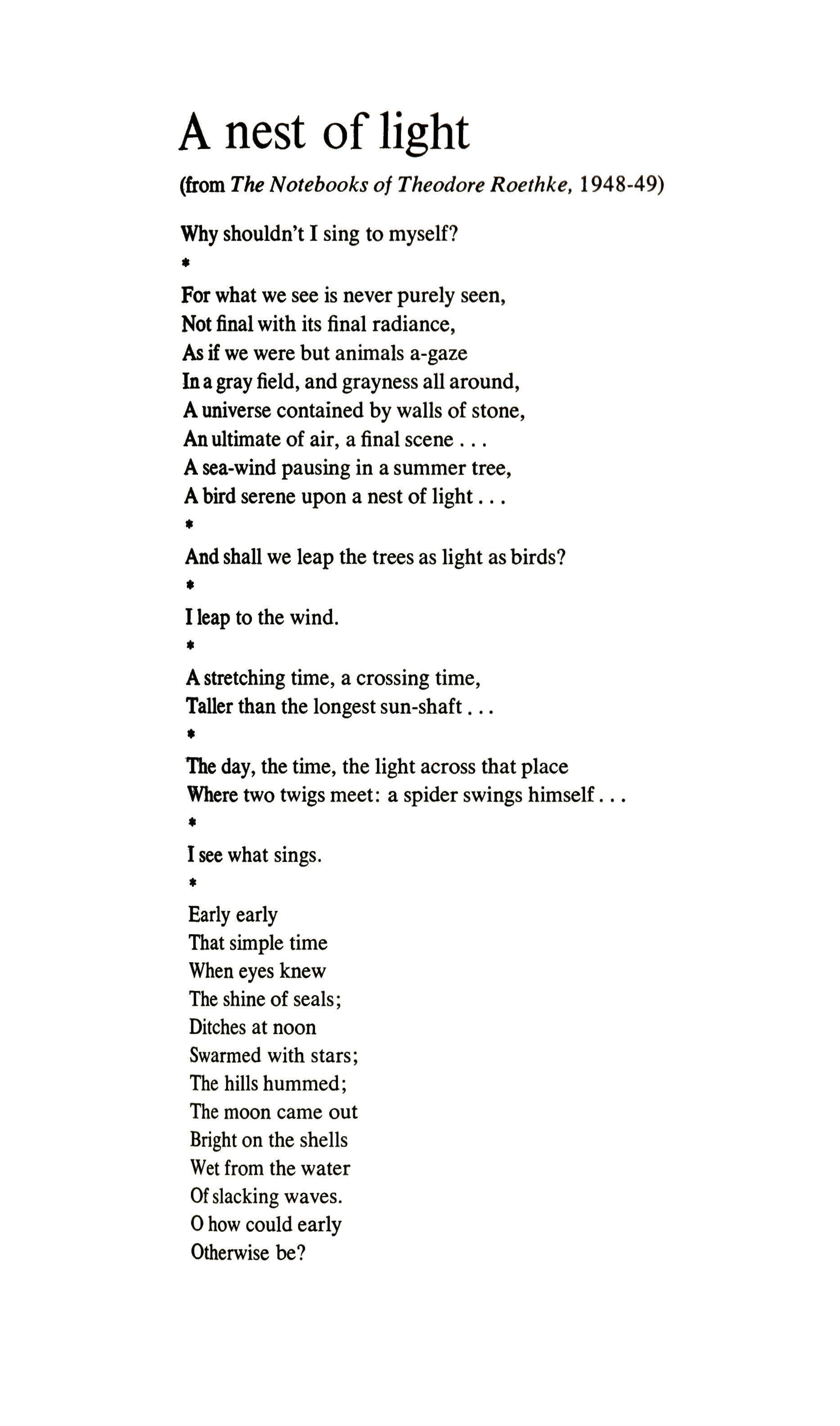
(from The Notebooks 0/ Theodore Roethke, 1948·49)
Wby shouldn't I sing to myself?
For what we see is never purely seen, Not final with its final radiance,
As if we were but animals a-gaze
In a gray field, and grayness all around, A universe contained by walls of stone, An ultimate of air, a final scene
A sea-wind pausing in a summer tree, A bird serene upon a nest of light
• And shall we leap the trees as light as birds?
I leap to the wind.
•
A stretching time, a crossing time, Taller than the longest sun-shaft
• The day, the time, the light across that place Where two twigs meet: a spider swings himself
• I see what sings.
• Early early That simple time When eyes knew The shine of seals; Ditches at noon Swarmed with stars; The hills hummed; The moon came out
Bright on the shells
Wet from the water
Ofslacking waves.
o how could early
Otherwise be?
•
1
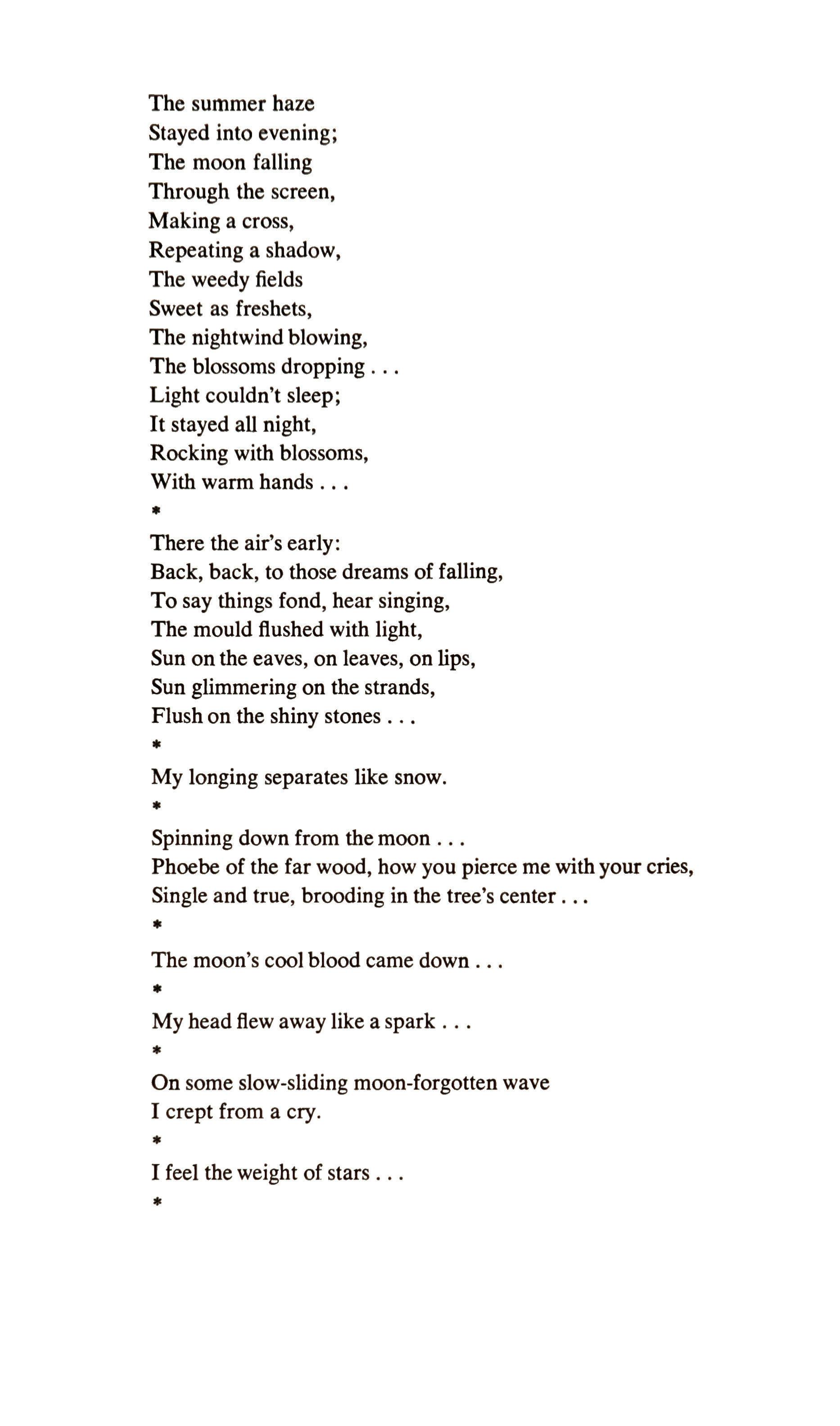
The summer haze
Stayed into evening; The moon falling Through the screen, Making a cross, Repeating a shadow, The weedy fields
Sweet as freshets, The nightwindblowing, The blossoms dropping Light couldn't sleep; It stayed all night, Rocking with blossoms, With warIII hands
• There the air's early: Back, back, to those dreams of falling, To say things fond, hear singing, The mould flushed with light, Sun on the eaves, on leaves, on lips, Sun glimmering on the strands, Flush on the shiny stones
•
My longing separates like snow.
• Spinning down from the moon
Phoebe of the far wood, how you pierce me with your cries, Single and true, brooding in the tree's center
The moon's cool blood came down
My head flew away like a spark
* On some slow-sliding moon-forgotten wave I crept from a cry.
* I feel the weight of stars
*

A light-foot fragmentsing To bring us to delight.
We'll sing away the night, Birds without wing, we pause Beneath fruit-heavyboughs
• Growing both ways at once, Alive in the light, in the dark
•
Too much of me stays here. Am I still half asleep From this early dream?
The bird circles; the swale darkens. Something stirs. It is not morning. I see what pierced me; and 8111 impaled. Yea, that shaft of singleness has me.
I have undone myself loving the shine on stones. Must I forget the mice in the ferns? Yes.
It's still enough here among the webs and skeins. That early dream recedes and then returns. Is the first eye dying?
The wind won't lift me.
Theveils and skeins, the horns, the heart of life, the sweet imperishable forms.
• The rising waters surround me. There's no falling star. Here's the last place of light
• And torment takes me further into joy
The great wind's part of me: I see before I stretch to this intention like a seed .•. I have sunk down to rise. I see the stream That bears me
arrangedby David Wagoner
o no
Do not try to explain my songs. They do not yield to the wind like flags. They do not yield at all. The mountain that fathered the stream thirsts for rain. Lightning whets his blades on flints of dead volcanoes. Eagles intercept the soaring voices of people at prayer. Love makes no pledge of love.
DAVID ROKEAH
translated by Tamar Sachs

•
aSS10na e SOl
This passionate soil of yours opens its mouth to reveal glow-worms and dry roots. Sahara of fire sets grey silence on the sea. Our desire is naked, like the mountain wounds near a quarry. You are unwanted on this shore that bakes its shells.potatoes on stubble-fields in boyhood.
DAVID ROKEAH
translated by Tamar Sachs
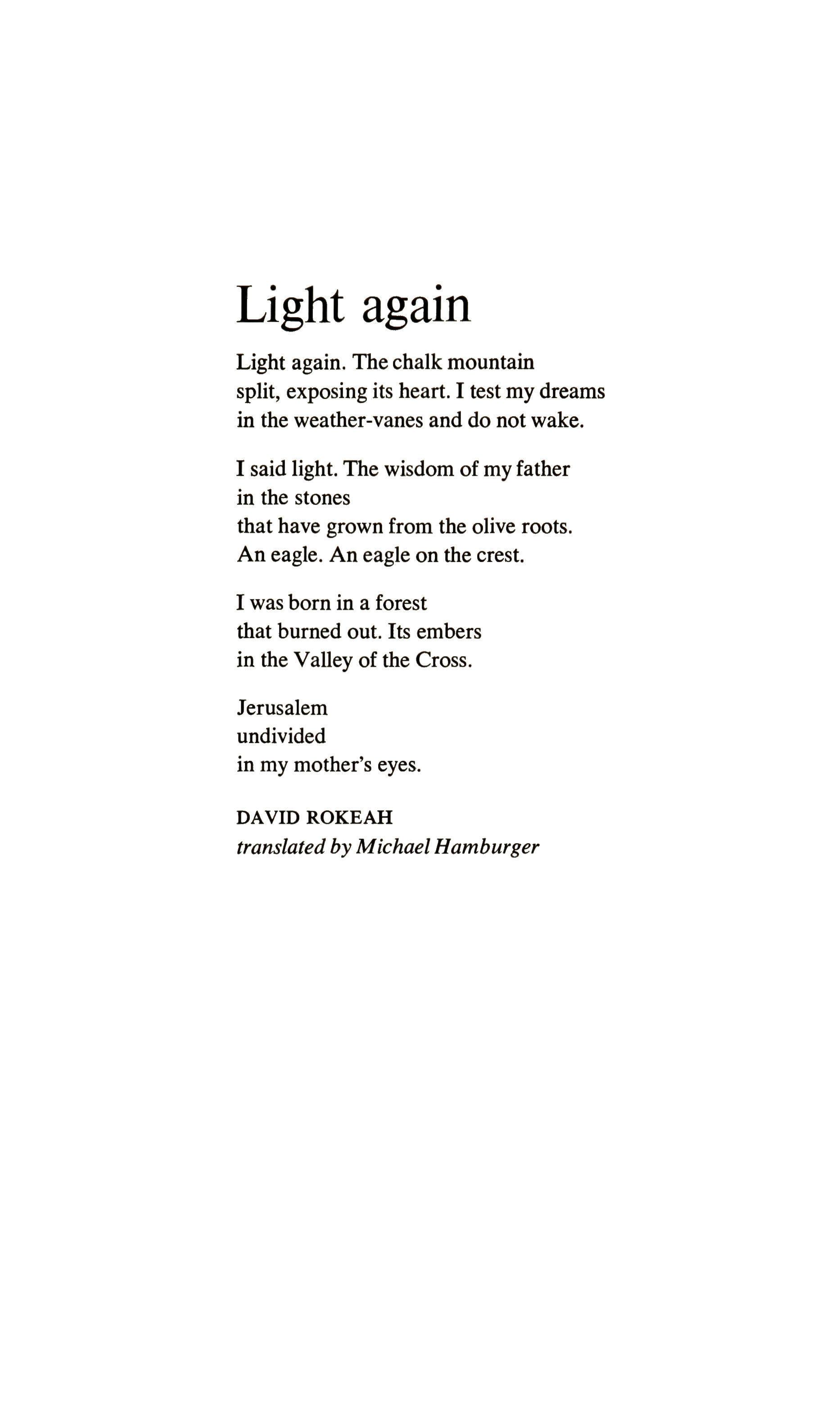
Light again. The chalk mountain split, exposing its heart. I test my dreams in the weather-vanes and do not wake.
I said light. The wisdom of my father in the stones that have grown from the olive roots. An eagle. An eagle on the crest.
I was born in a forest that burned out. Its embers in the Valley of the Cross.
Jerusalem undivided in my mother's eyes.
DAVID ROKEAH
translated by Michael Hamburger
PeterAltenberg, on seeing a cartoon ofhimself: "But aren't we all only caricatures of what God and our mothers meant us to be?"
Trick mirrors tell them, wall to wall who is the ugliest of them all.
A fair prince turns into six frogs and back again. His princess shrieks.
They try embracing and are shown more monstrous than they felt alone.
They leave and laugh, never aware that they're frogs the way they are.
FELIX POLLAK
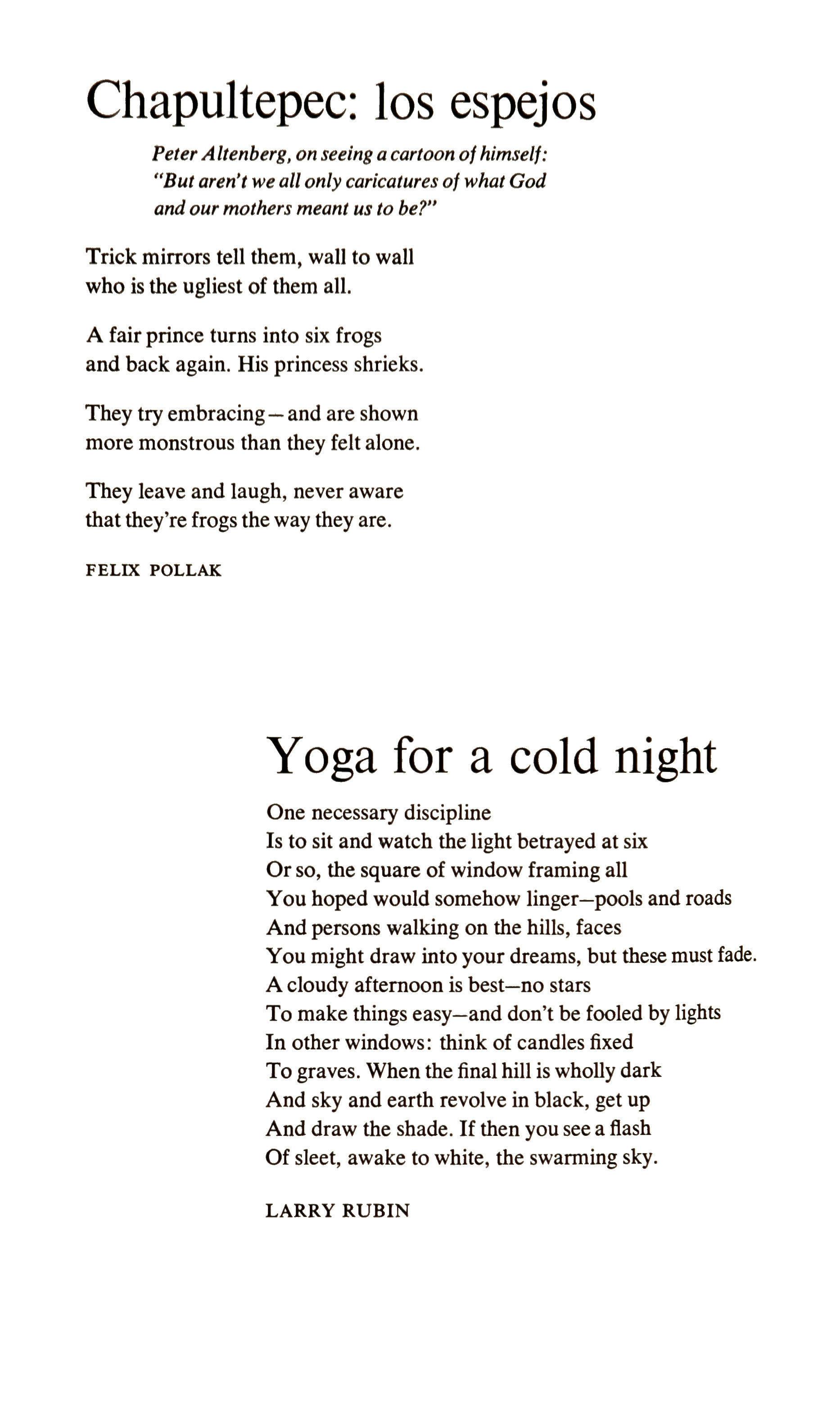
One necessary discipline
Is to sit and watch the light betrayed at six Or so, the square of window framing all You hoped would somehow linger pools and roads And persons walking on the hills, faces You might draw into your dreams, but these must fade. A cloudy afternoon is best no stars To make things easy and don't be fooled by lights In other windows: think of candles fixed To graves. When the final hill is wholly dark And sky and earth revolve in black, get up And draw the shade. If then you see a flash Of sleet, awake to white, the swarming sky.
LARRY RUBIN
nl
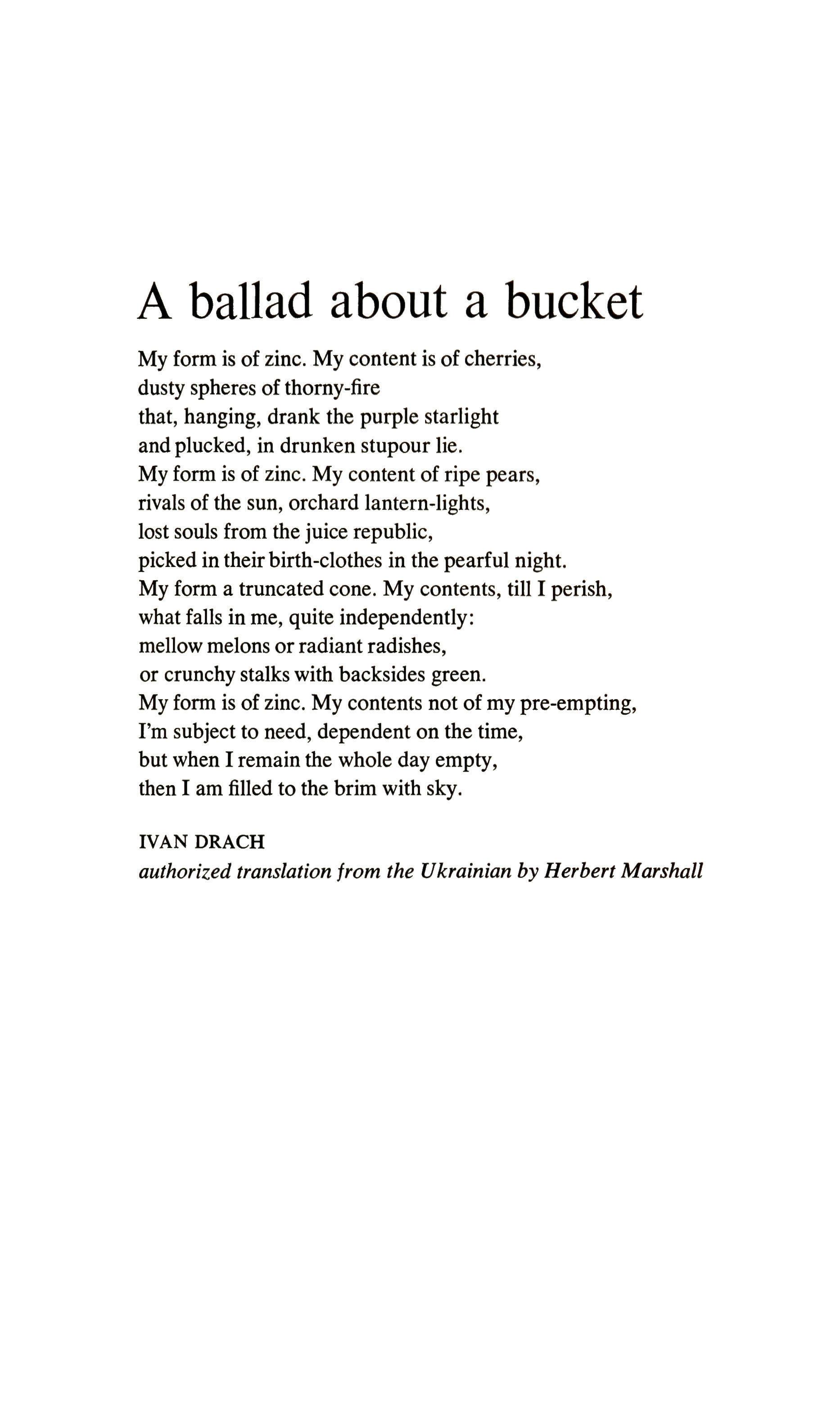
My form is of zinc. My content is of cherries, dusty spheres of thorny-fire that, hanging, drank the purple starlight and plucked, in drunken stupour lie.
My form is of zinc. My content of ripe pears, rivals of the sun, orchard lantern-lights, lost souls from the juice republic, picked in theirbirth-clothes in the pearful night.
My form a truncated cone. My contents, till I perish, what falls in me, quite independently: mellow melons or radiant radishes, or crunchy stalks with backsides green.
My form is of zinc. My contents not of my pre-empting, I'm subject to need, dependent on the time, but when I remain the whole day empty, then I am filled to the brim with sky.
IVAN DRACH
authorized translation from the Ukrainian by Herbert Marshall
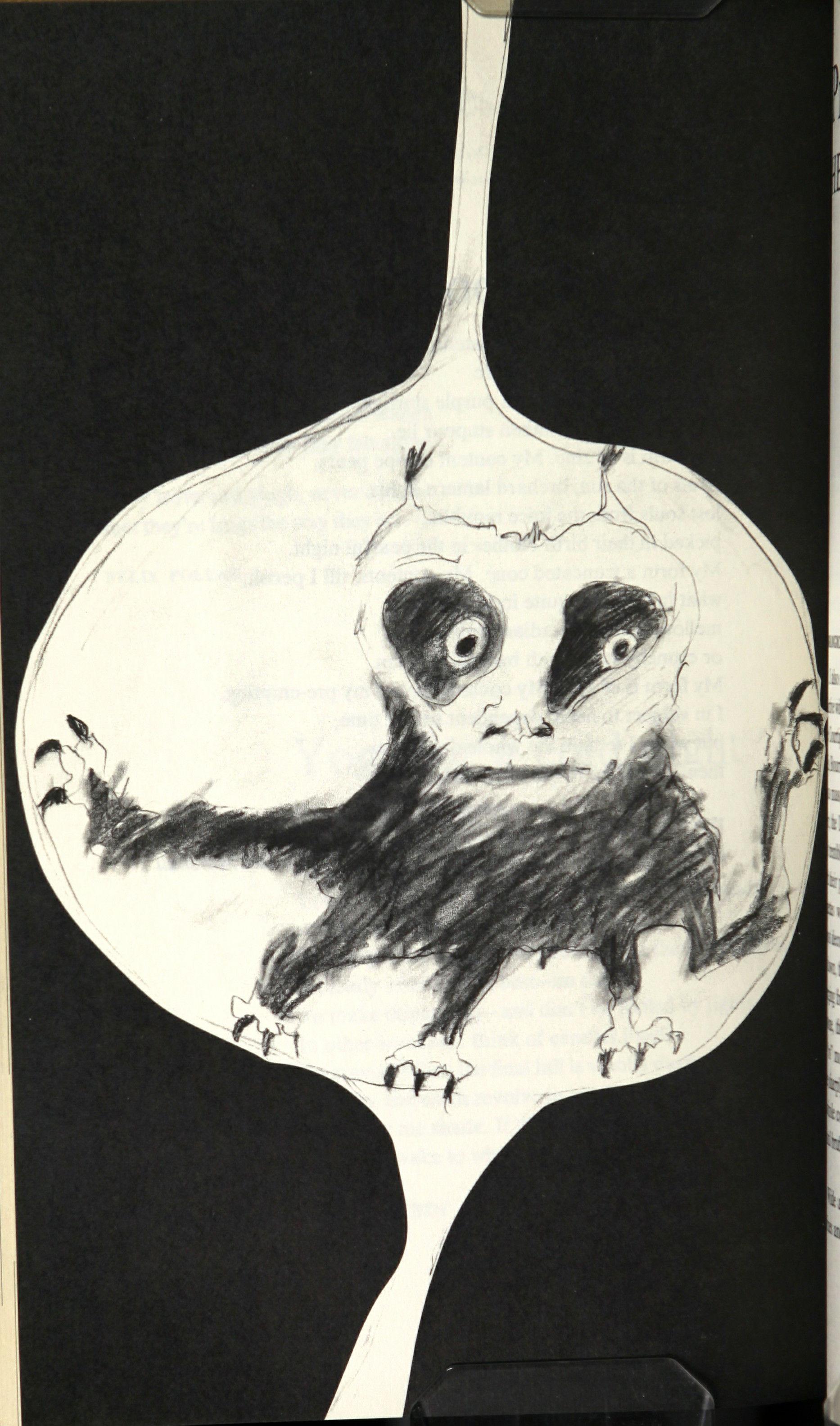
/'
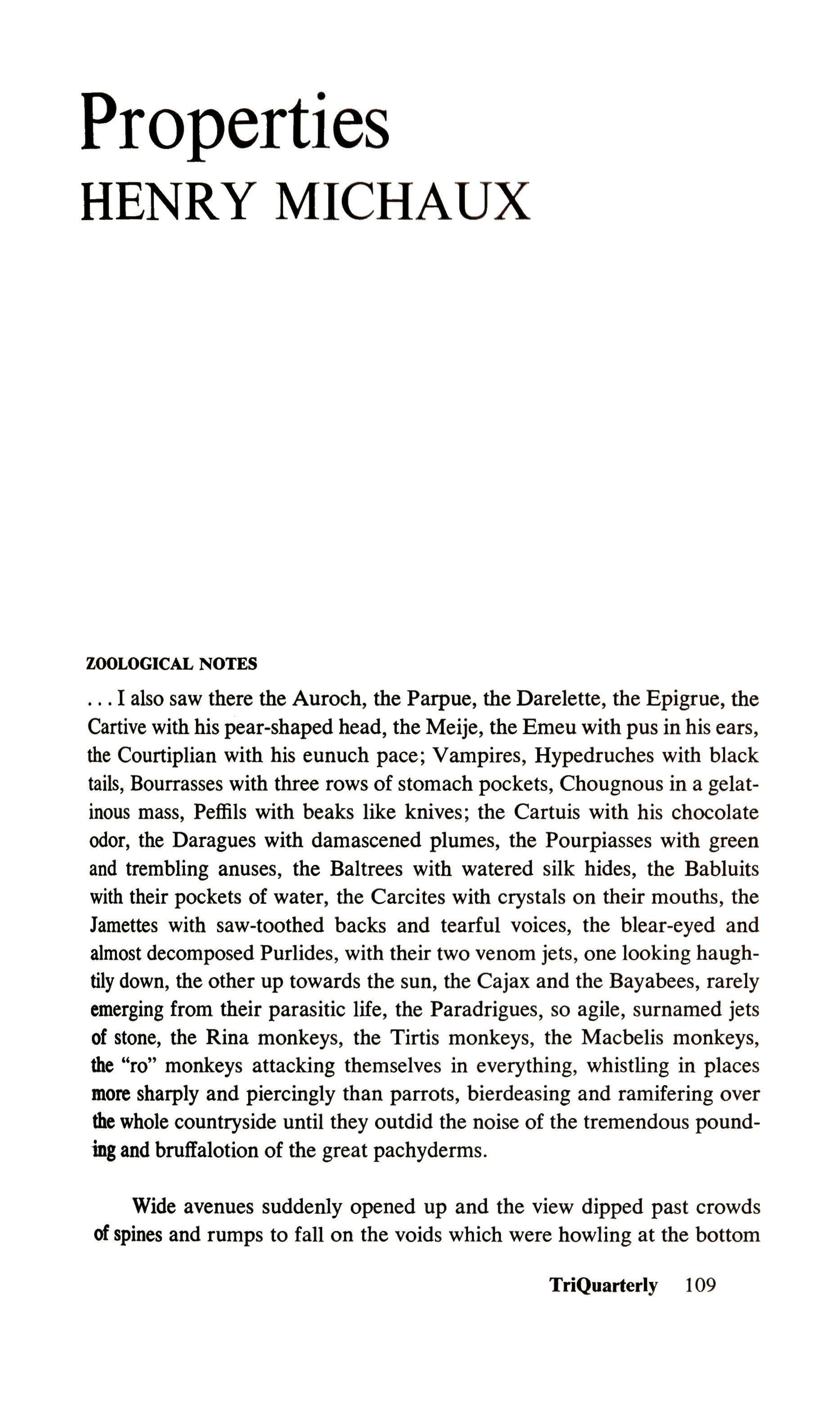
ZOOLOGICAL NOTES
I also saw there the Auroch, the Parpue, the Darelette, the Epigrue, the Cartive with his pear-shaped head, the Meije, the Emeu with pus in his ears, the Courtiplian with his eunuch pace; Vampires, Hypedruches with black tails, Bourrasses with three rows of stomach pockets, Chougnous in a gelatinous mass, Peffils with beaks like knives; the Cartuis with his chocolate odor, the Daragues with damascened plumes, the Pourpiasses with green and trembling anuses, the Baltrees with watered silk hides, the Babluits with their pockets of water, the Carcites with crystals on their mouths, the Jamettes with saw-toothed backs and tearful voices, the blear-eyed and almost decomposed Purlides, with their two venom jets, one looking haughtily down, the other up towards the sun, the Cajax and the Bayabees, rarely emerging from their parasitic life, the Paradrigues, so agile, surnamed jets of stone, the Rina monkeys, the Tirtis monkeys, the Macbelis monkeys, the "ro' monkeys attacking themselves in everything, whistling in places more sharply and piercingly than parrots, bierdeasing and ramifering over the whole countryside until they outdid the noise of the tremendous pounding and bruffalotion of the great pachyderms.
Wide avenues suddenly opened up and the view dipped past crowds of spines and rumps to fallon the voids which were howling at the bottom
TriQuarterly 109
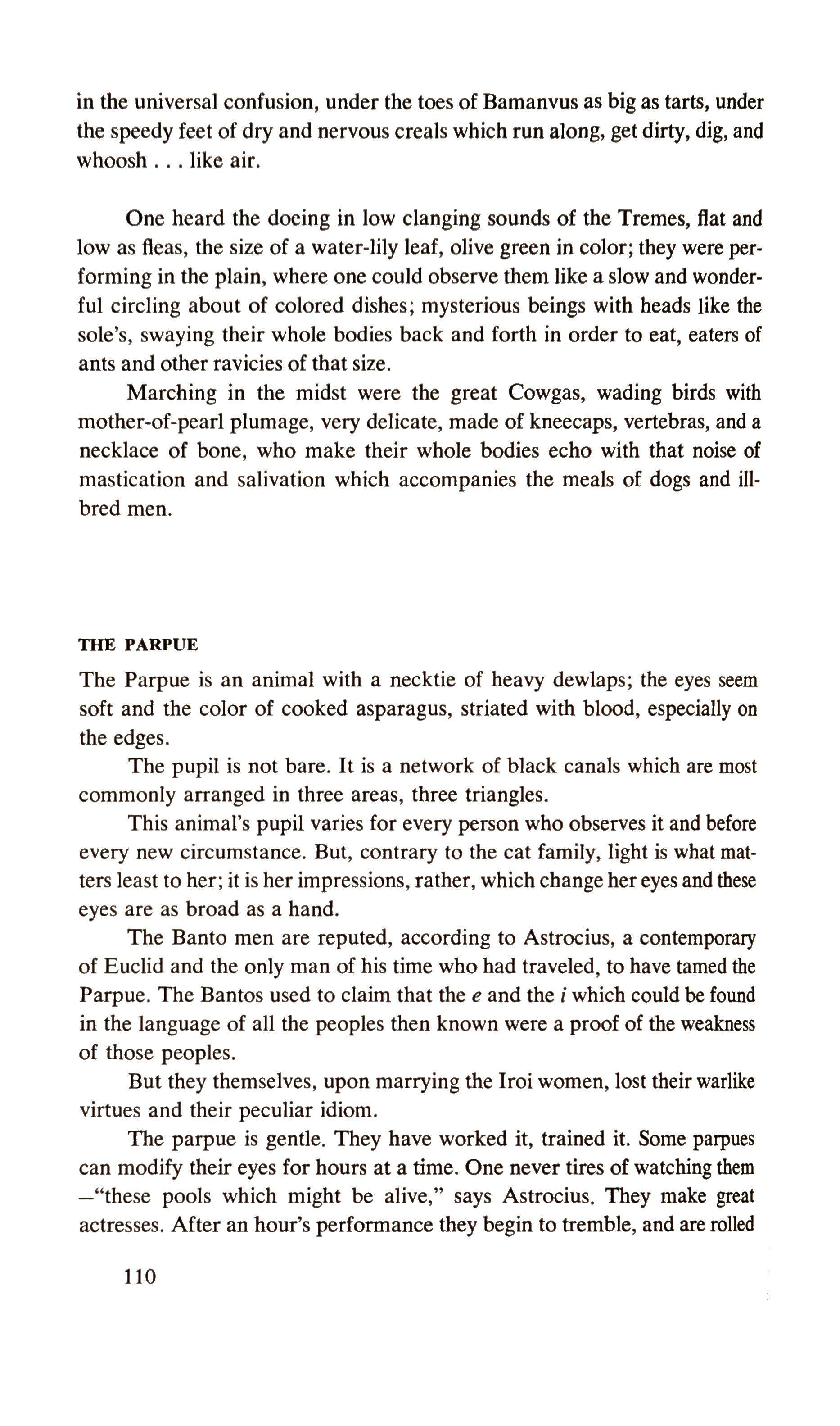
in the universal confusion, under the toes of Bamanvus as big as tarts, under the speedy feet of dry and nervous creals which run along, get dirty, dig, and whoosh like air.
One heard the doeing in low clanging sounds of the Tremes, flat and low as fleas, the size of a water-lily leaf, olive green in color; they were performing in the plain, where one could observe them like a slow and wonderful circling about of colored dishes; mysterious beings with heads like the sole's, swaying their whole bodies back and forth in order to eat, eaters of ants and other ravicies of that size.
Marching in the midst were the great Cowgas, wading birds with mother-of-pearl plumage, very delicate, made of kneecaps, vertebras, and a necklace of bone, who make their whole bodies echo with that noise of mastication and salivation which accompanies the meals of dogs and illbred men.
'I'HE PARPUE
The Parpue is an animal with a necktie of heavy dewlaps; the eyes seem soft and the color of cooked asparagus, striated with blood, especially on the edges.
The pupil is not bare. It is a network of black canals which are most commonly arranged in three areas, three triangles.
This animal's pupil varies for every person who observes it and before every new circumstance. But, contrary to the cat family, light is what matters least to her; it is her impressions, rather, which change her eyes and these eyes are as broad as a hand.
The Banto men are reputed, according to Astrocius, a contemporary of Euclid and the only man of his time who had traveled, to have tamed the Parpue. The Bantos used to claim that the e and the i which could be found in the language of all the peoples then known were a proof of the weakness of those peoples.
But they themselves, upon marrying the Iroi women, lost their warlike virtues and their peculiar idiom.
The parpue is gentle. They have worked it, trained it. Some parpues can modify their eyes for hours at a time. One never tires of watching them -"these pools which might be alive," says Astrocius. They make great actresses. After an hour's performance they begin to tremble, and are rolled
110
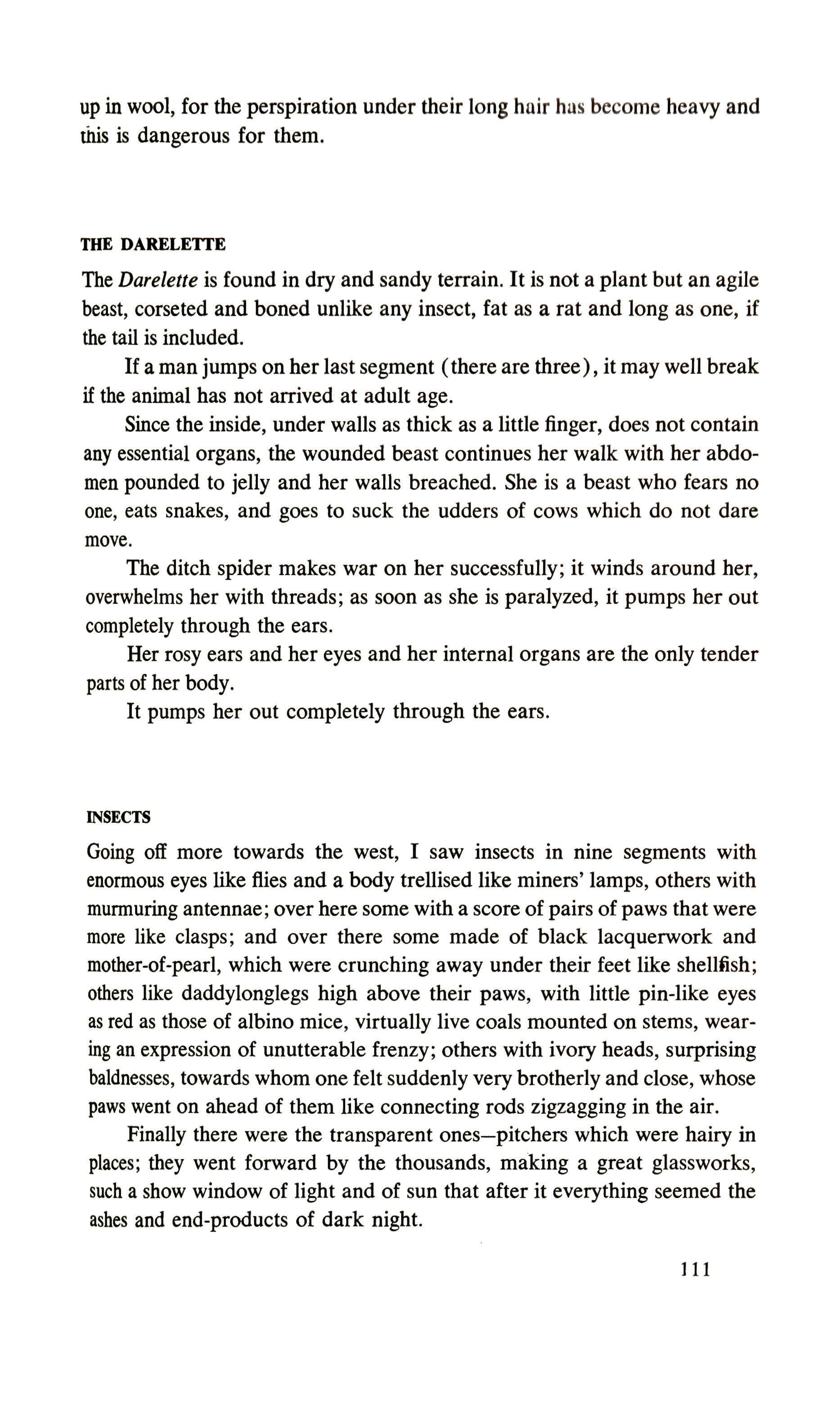
up in wool, for the perspiration under their long hair hus become heavy and this is dangerous for them.
THE DARELE1TE
The Darelette is found in dry and sandy terrain. It is not a plant but an agile beast, corseted and boned unlike any insect, fat as a rat and long as one, if the tail is included.
If a man jumps on her last segment (there are three), it may well break if the animal has not arrived at adult age.
Since the inside, under walls as thick as a little finger, does not contain any essential organs, the wounded beast continues her walk with her abdomen pounded to jelly and her walls breached. She is a beast who fears no one, eats snakes, and goes to suck the udders of cows which do not dare move.
The ditch spider makes war on her successfully; it winds around her, overwhelms her with threads; as soon as she is paralyzed, it pumps her out completely through the ears.
Her rosy ears and her eyes and her internal organs are the only tender parts of her body.
It pumps her out completely through the ears.
INSECTS
Going off more towards the west, I saw insects in nine segments with enormous eyes like flies and a body trellised like miners' lamps, others with murmuring antennae; over here some with a score of pairs of paws that were more like clasps; and over there some made of black lacquerwork and mother-of-pearl, which were crunching away under their feet like shellfish; others like daddylonglegs high above their paws, with little pin-like eyes as red as those of albino mice, virtually live coals mounted on stems, wearing an expression of unutterable frenzy; others with ivory heads, surprising baldnesses, towards whom one felt suddenly very brotherly and close, whose paws went on ahead of them like connecting rods zigzagging in the air.
Finally there were the transparent ones pitchers which were hairy in places; they went forward by the thousands, making a great glassworks, such a show window of light and of sun that after it everything seemed the ashes and end-products of dark night.
111
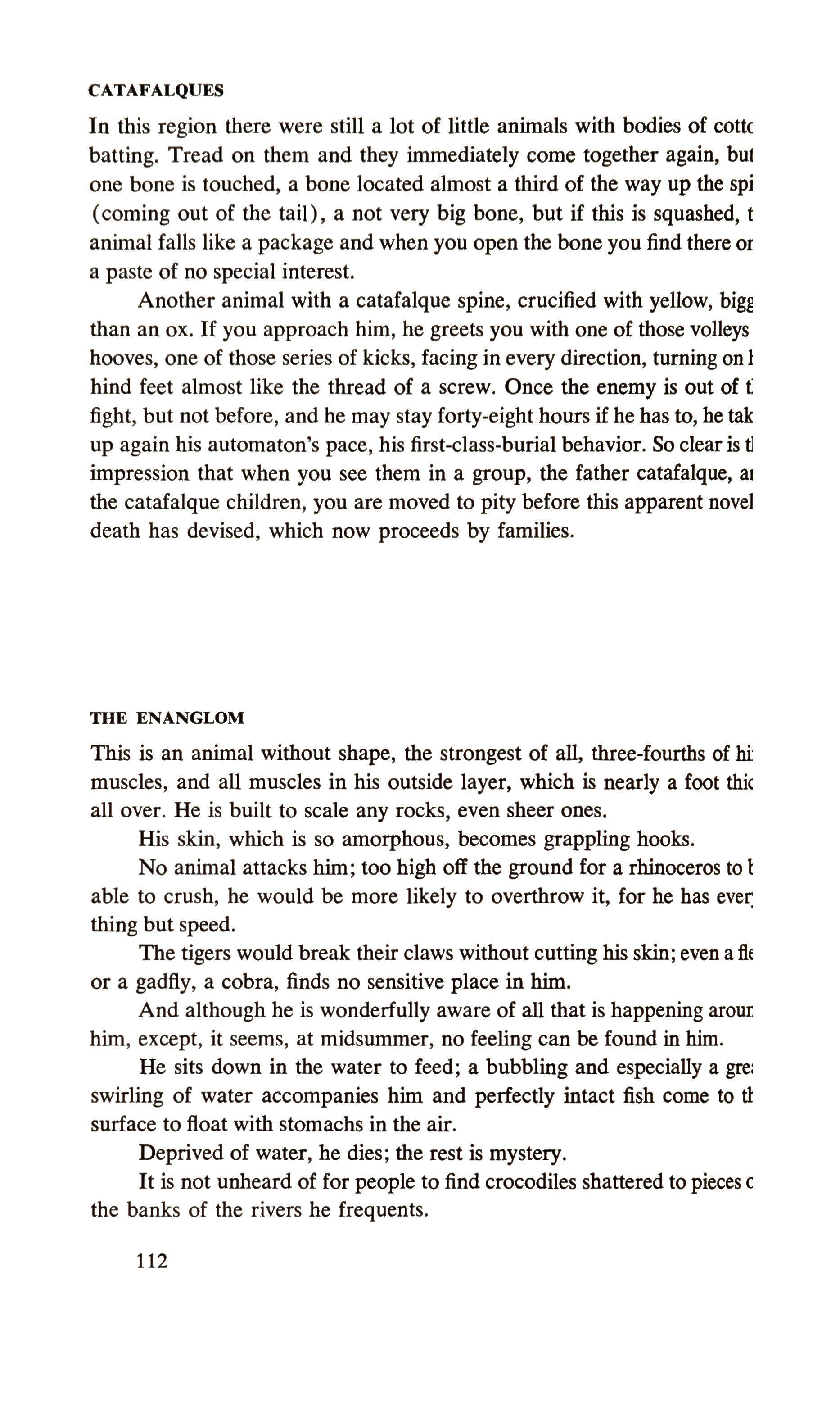
CATAFALQUES
In this region there were still a lot of little animals with bodies of cottc batting. Tread on them and they immediately come together again, bUI one bone is touched, a bone located almost a third of the way up the spi (coming out of the tail), a not very big bone, but if this is squashed, t animal falls like a package and when you open the bone you find there 01 a paste of no special interest.
Another animal with a catafalque spine, crucified with yellow, bigg than an ox. If you approach him, he greets you with one of those volleys hooves, one of those series of kicks, facing in every direction, turning on I hind feet almost like the thread of a screw. Once the enemy is out of � fight, but not before, and he may stay forty-eight hours if he has to, he tak up again his automaton's pace, his first-class-burial behavior. So clear is � impression that when you see them in a group, the father catafalque, al the catafalque children, you are moved to pity before this apparent nove] death has devised, which now proceeds by families.
THE ENANGLOM
'I'his is an animal without shape, the strongest of all, three-fourths of hi muscles, and all muscles in his outside layer, which is nearly a foot thie allover. He is built to scale any rocks, even sheer ones.
His skin, which is so amorphous, becomes grappling hooks.
No animal attacks him; too high off the ground for a rhinoceros to 1 able to crush, he would be more likely to overthrow it, for he has ever: thing but speed.
The tigers would break their claws without cutting his skin; even a flf or a gadfly, a cobra, finds no sensitive place in hi111.
And although he is wonderfully aware of all that is happening aroun him, except, it seems, at midsummer, no feeling can be found in him.
He sits down in the water to feed; a bubbling and especially a gre swirling of water accompanies him and perfectly intact fish come to tl surface to float with stomachs in the air.
Deprived of water, he dies; the rest is mystery.
It is not unheard of for people to find crocodiles shattered to pieces c the banks of the rivers he frequents.
112
A..\I GO.sG
n the sons of my anzer is an ezz c 0 �..." udinthis egg ale my mother. my father, a,..1 my children, \ndinitale mixedjoy and sad I KSS, and life. luge tel I Ipests who have succoured me, Avely sun whohave thW31 ted me. lhere ishate in me. hate that is strong and 0{ancient \ jllt33c y � as forbeauty \\"C will see that later. [have teaDybeCOIlte hald onlyby thin Ia}CtS; [fanyone knew how 11131tO'llt-Y I alii at bottom, [alii gong and cotton and snowy song, [say so andI alii SIIIL 0{it.
A
CERTAD{ PLl..�n: C 1931)
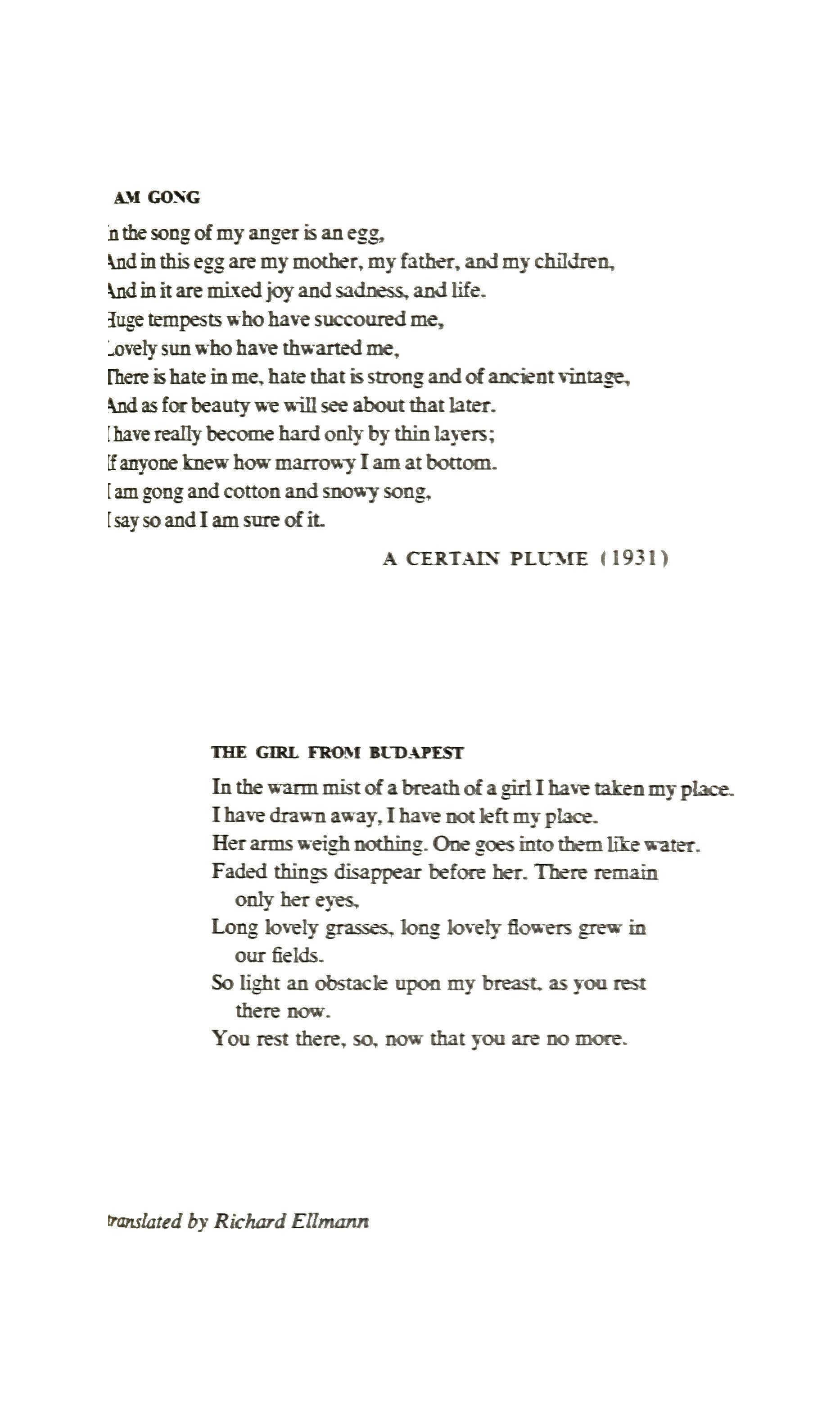
'IRE GIRl. �I .t:u_U'EST
In the W31111111isto{ a breath ofagirl I have takenmyplace, I have drawn away. I have not left my place, Her aliliS weigh nothinz. One !!<o1I(·S into thetll like W3rr I <t,;;i Faded things disappea, before her. 'IheiL ILII!aill only her eyes.
Long lovely gl asse,5. long lo\"Cly fiow CIS g I ew in our fields.
So light an Ie upon my br,3st. as you It 5t there DOW.
You rest there, so. now that you 3rL no more.
translated by Richard Ellmann
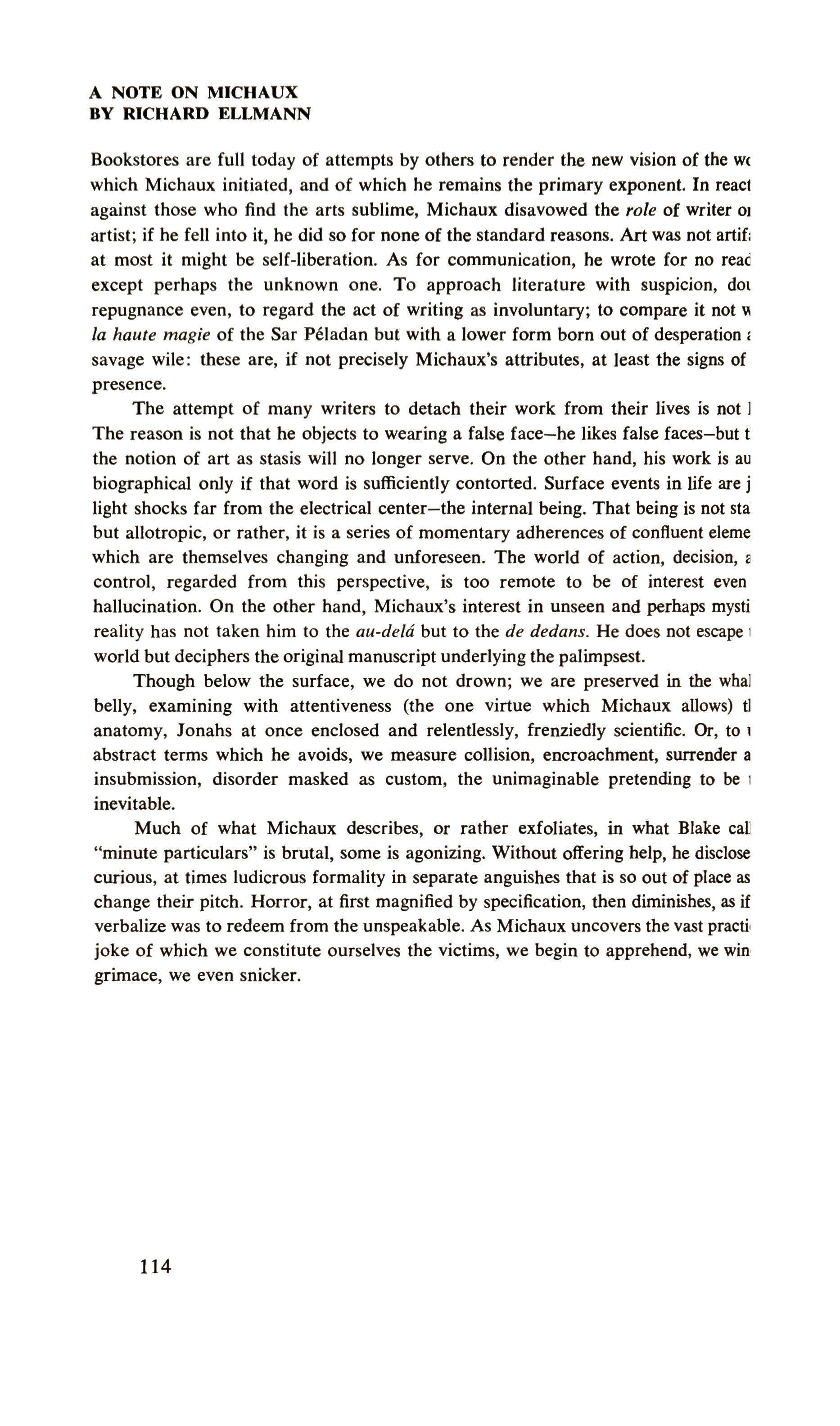
A NOTE ON MICHAUX
BY RICHARD ELLMANN
Bookstores are full today of attempts by others to render the new vision of the w( which Michaux initiated, and of which he remains the primary exponent. In react against those who find the arts sublime, Michaux disavowed the role of writer 01 artist; if he fell into it, he did so for none of the standard reasons. Art was not artif at most it might be self-liberation. As for communication, he wrote for no read except perhaps the unknown one. To approach literature with suspicion, dot repugnance even, to regard the act of writing as involuntary; to compare it not VI la haute magie of the Sar Peladan but with a lower form born out of desperation 1 savage wile: these are, if not precisely Michaux's attributes, at least the signs of presence.
The attempt of many writers to detach their work from their lives is not 1 The reason is not that he objects to wearing a false face-he likes false faces-but t the notion of art as stasis will no longer serve. On the other hand, his work is au biographical only if that word is sufficiently contorted. Surface events in life are j light shocks far from the electrical center-the internal being. That being is not sta but allotropic, or rather, it is a series of momentary adherences of confluent eleme which are themselves changing and unforeseen. The world of action, decision, a control, regarded from this perspective, is too remote to be of interest even hallucination. On the other hand, Michaux's interest in unseen and perhaps mysti reality has not taken him to the au-de/a but to the de dedans. He does not escape 1 world but deciphers the original manuscript underlying the palimpsest.
Though below the surface, we do not drown; we are preserved in the wbal belly, examining with attentiveness (the one virtue which Michaux allows) tl anatomy, Jonahs at once enclosed and relentlessly, frenziedly scientific. Or, to 1 abstract terms which he avoids, we measure collision, encroachment, surrender a insubmission, disorder masked as custom, the unimaginable pretending to be 1 inevitable.
Much of what Michaux describes, or rather exfoliates, in what Blake caU "minute particulars" is brutal, some is agonizing. Without offering help, he disclose curious, at times ludicrous formality in separate anguishes that is so out of place as change their pitch. Horror, at first magnified by specification, then diminishes, as if verbalize was to redeem from the unspeakable. As Michaux uncovers the vast practn joke of which we constitute ourselves the victims, we begin to apprehend, we win' grimace, we even snicker.
114
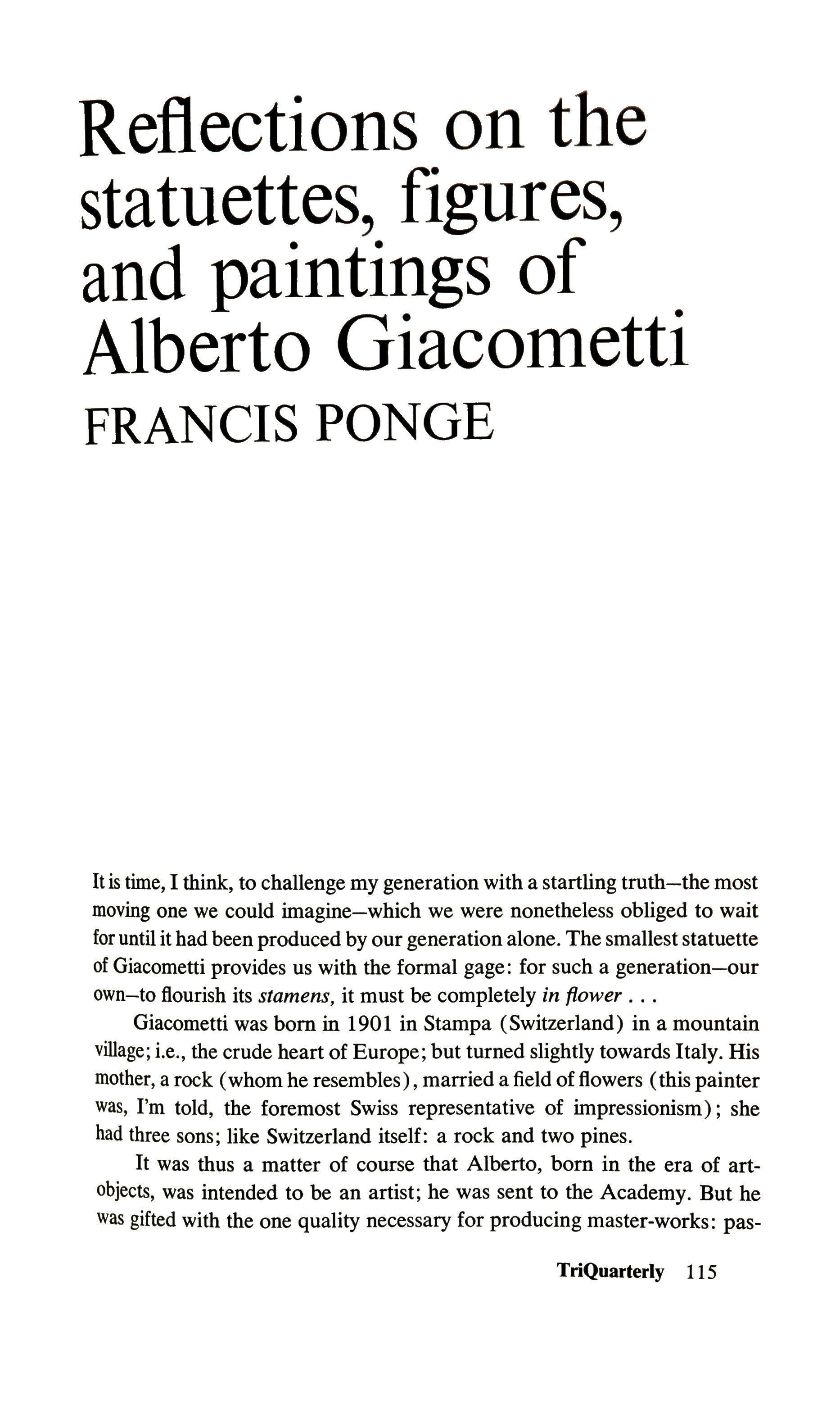
It is time, I think, to challenge my generation with a startling truth the most moving one we could imagine which we were nonetheless obliged to wait foruntil it had been producedby our generation alone. The smallest statuette of Giacometti provides us with the formal gage: for such a generation our own-to flourish its stamens, it must be completely in flower
Giacometti was born in 1901 in Stampa (Switzerland) in a mountain village; i.e., the crude heart of Europe; but turned slightly towards Italy. His mother, a rock (whom he resembles) married a field of flowers (this painter was, I'm told, the foremost Swiss representative of impressionism); she had three sons; like Switzerland itself: a rock and two pines.
It was thus a matter of course that Alberto, born in the era of artobjects, was intended to be an artist; he was sent to the Academy. But he was gifted with the one quality necessary for producing master-works: pas-
TriQuarterly 115
• • • •
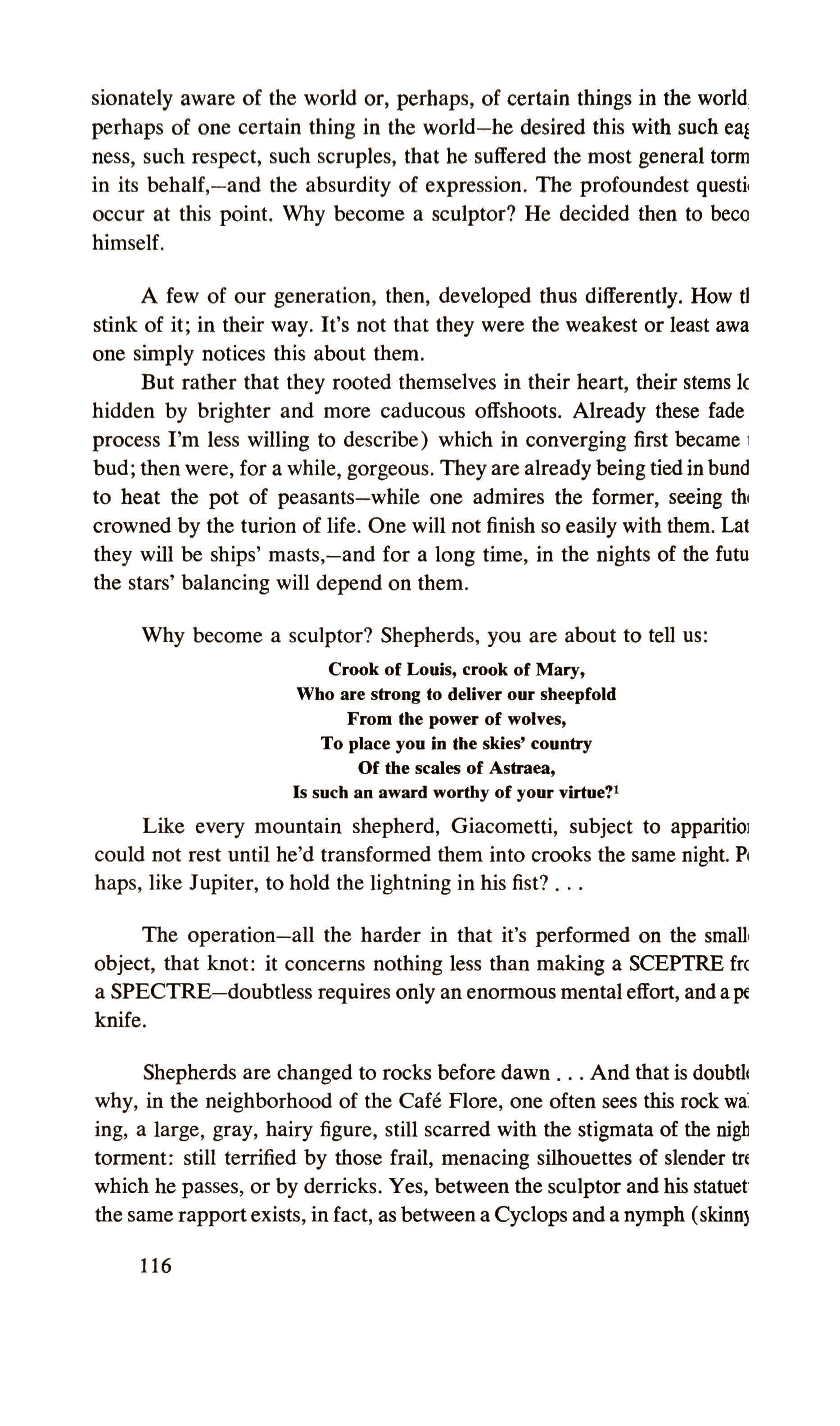
sionately aware of the world or, perhaps, of certain things in the world. perhaps of one certain thing in the world he desired this with such ea� ness, such respect, such scruples, that he suffered the most general torm in its behalf, and the absurdity of expression. The profoundest questi occur at this point. Why become a sculptor? He decided then to beco himself.
A few of our generation, then, developed thus differently. How tl stink of it; in their way. It's not that they were the weakest or least awa one simply notices this about them.
But rather that they rooted themselves in their heart, their stems 1< hidden by brighter and more caducous offshoots. Already these fade process I'm less willing to describe) which in converging first became 1 bud; then were, for a while, gorgeous. They are alreadybeing tied in bund to heat the pot of peasants while one admires the former, seeing tb crowned by the turion of life. One will not finish so easily with them. Lat they will be ships' masts, and for a long time, in the nights of the futu the stars' balancing will depend on them.
Why become a sculptor? Shepherds, you are about to tell us: Crook of Louis, crook of Mary, Who are strong to deliver our sheepfold From the power of wolves, To place you in the skies' country Of the scales of Astraea, Is such an award worthy of your virtue?l
Like every mountain shepherd, Giacometti, subject to apparitio could not rest until he'd transformed them into crooks the same night. PI haps, like Jupiter, to hold the lightning in his fist?
The operation all the harder in that it's performed on the small, object, that knot: it concerns nothing less than making a SCEP'I'RE frc a SPEC'I'RE doubtless requires only an enormous mental effort, and a pe knife.
Shepherds are changed to rocks before dawn And that is doubtk why, in the neighborhood of the Cafe Flore, one often sees this rock wa ing, a large, gray, hairy figure, still scarred with the stigmata of the nigh torment: still terrified by those frail, menacing silhouettes of slender tn which he passes, or by derricks. Yes, between the sculptor and his statuet the same rapport exists, in fact, as between a Cyclops and a nymph (skinn;
116
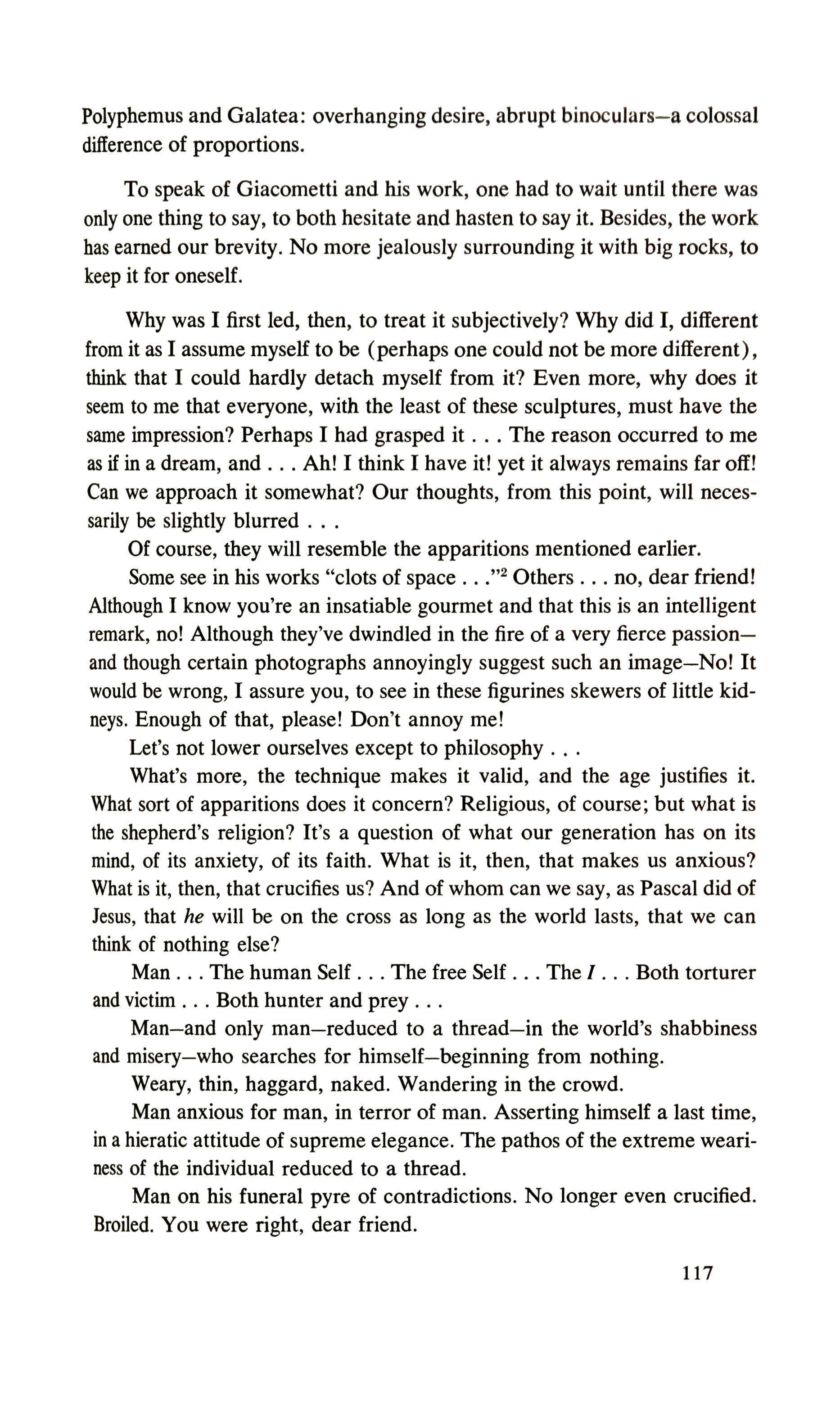
Polyphemus and Galatea: overhanging desire, abrupt binoculars a colossal difference of proportions.
To speak of Giacometti and his work, one had to wait until there was only one thing to say, to both hesitate and hasten to say it. Besides, the work has earned our brevity. No more jealously surrounding it with big rocks, to keep it for oneself.
Why was I first led, then, to treat it subjectively? Why did I, different from it as I assume myself to be (perhaps one could not be more different), think that I could hardly detach myself from it? Even more, why does it seem to me that everyone, with the least of these sculptures, must have the same impression? Perhaps I had grasped it The reason occurred to me as if in a dream, and Ah! I think I have it! yet it always remains far off! Can we approach it somewhat? Our thoughts, from this point, will necessarily be slightly blurred
Of course, they will resemble the apparitions mentioned earlier.
Some see in his works "clots of space "2 Others no, dear friend! Although I know you're an insatiable gourmet and that this is an intelligent remark, no! Although they've dwindled in the fire of a very fierce passionand though certain photographs annoyingly suggest such an image No! It would be wrong, I assure you, to see in these figurines skewers of little kidneys. Enough of that, please! Don't annoy me!
Let's not lower ourselves except to philosophy
What's more, the technique makes it valid, and the age justifies it. What sort of apparitions does it concern? Religious, of course; but what is the shepherd's religion? It's a question of what our generation has on its mind, of its anxiety, of its faith. What is it, then, that makes us anxious? What is it, then, that crucifies us? And of whom can we say, as Pascal did of Jesus, that he will be on the cross as long as the world lasts, that we can think of nothing else?
Man The human Self The free Self The I Both torturer and victim Both hunter and prey
Man-and only man reduced to a thread in the world's shabbiness and misery who searches for himself beginning from nothing.
Weary, thin, haggard, naked. Wandering in the crowd.
Man anxious for man, in terror of man. Asserting himself a last time, in a hieratic attitude of supreme elegance. The pathos of the extreme weariness of the individual reduced to a thread.
Man on his funeral pyre of contradictions. No longer even crucified. Broiled. You were right, dear friend.
117
Man on a pavement of burning iron; unable to lift his big feet. Ah! since Greek sculpture or rather, since Laurens and Maillol m has been melting on the pyre!
It's doubtless since Nietzsche and Baudelaire that the destruction values has accelerated.
They trickle from him, his values, his fats; to feed his pyre!
Man not only no longer has anything; he no longer is anything; exo this 1.
He no longer has a name only a pronoun!
It is this 1 that you have managed to keep upright on its jamb, its me strous foot, dear Alberto.
This thin, blurred apparition, which appears at the beginning of me of our phrases. This imperious phantom.
Thank you!
For, thanks to you, he is still ours, this pig of intelligence, man, tl sceptre, this thread! our last god.
Even under the name of SELF, he can no longer impress us.
It's a question only of being alert, and observing his agony.
1. Malherbe.
2. I.-P. Sartre.
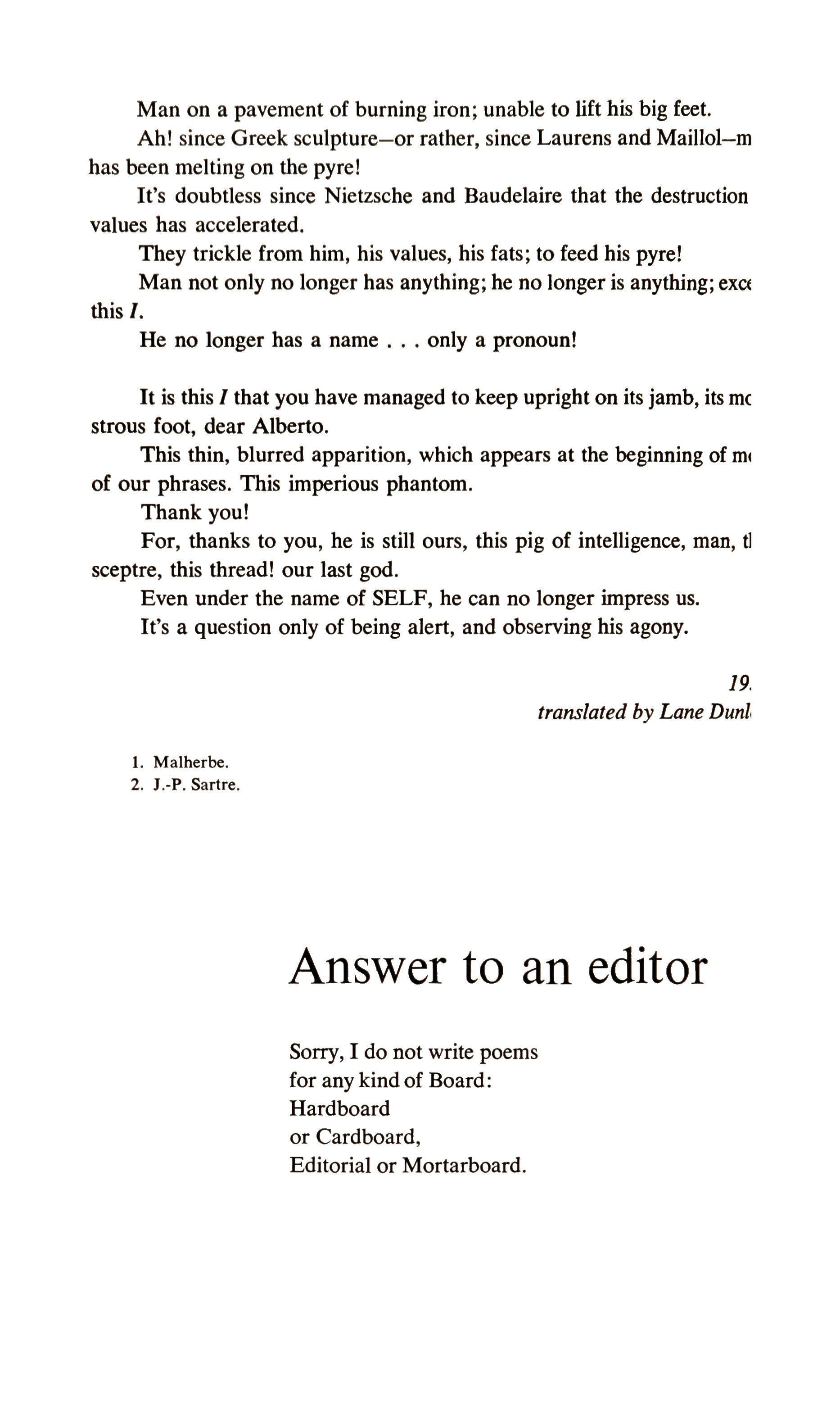
Sorry, I do not write poems for any kind of Board: Hardboard or Cardboard, Editorial or Mortarboard.
19. translated by Lane Dunl.
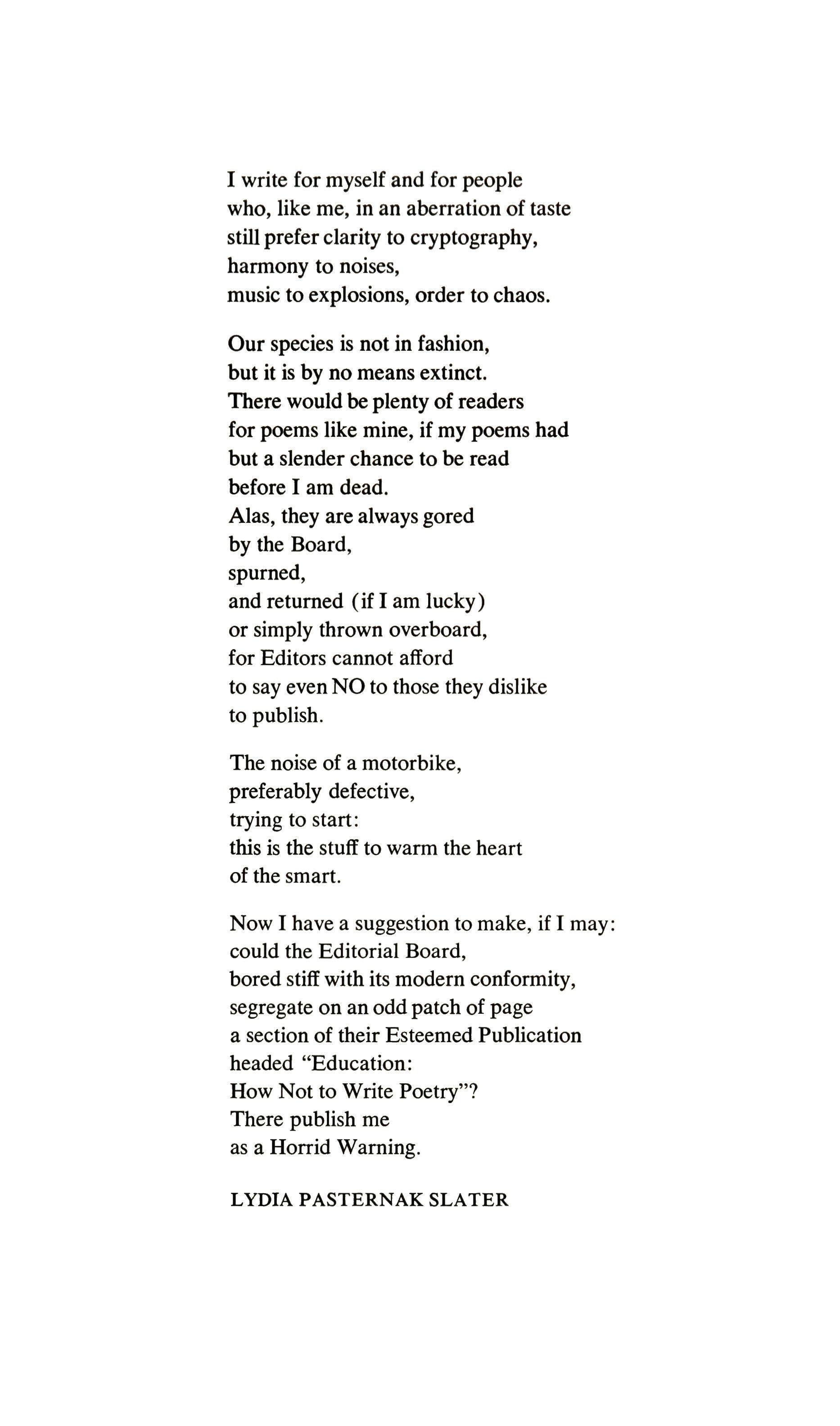
I write for myself and for people who, like me, in an aberration of taste still preferclarity to cryptography, harmony to noises, music to explosions, order to chaos.
Our species is not in fashion, but it is by no means extinct. There would be plenty of readers for poems like mine, if my poems had but a slender chance to be read before I am dead.
Alas, they are always gored by the Board, spurned, and returned (if I am lucky) or simply thrown overboard, for Editors cannot afford to say even NO to those they dislike to publish.
The noise of a motorbike, preferably defective, trying to start: this is the stuff to warm the heart of the smart.
Now I have a suggestion to make, if I may: could the Editorial Board, bored stiff with its modern conformity, segregate on an odd patch of page a section of their Esteemed Publication headed "Education: How Not to Write Poetry"? There publish me as a Horrid Warning.
LYDIA PASTERNAK SLATER
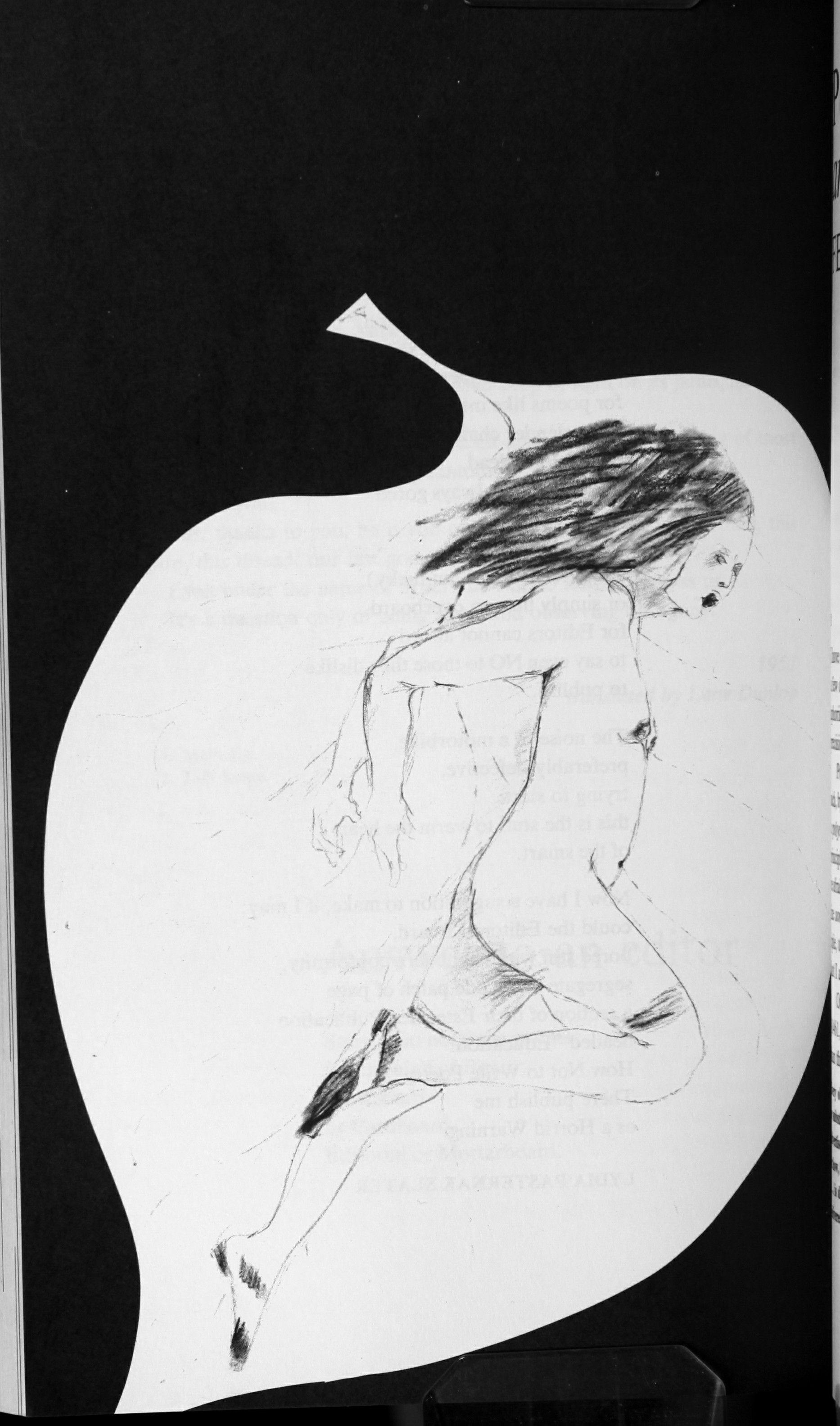
I vf .. r '-.��\ i /1 t / J. \ f � \ \ I I f I I \ I \I I// I
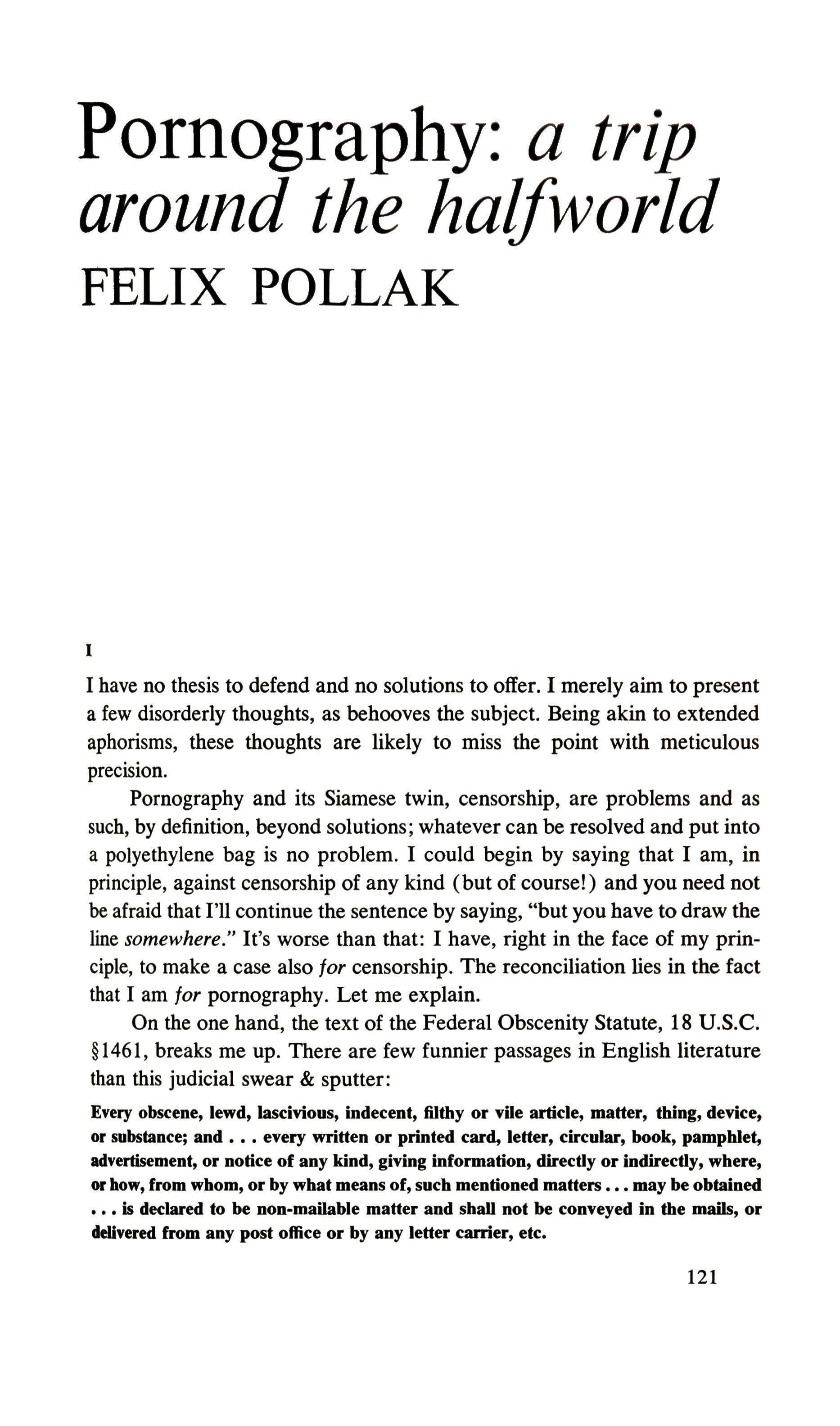
I have no thesis to defend and no solutions to offer. I merely aim to present a few disorderly thoughts, as behooves the subject. Being akin to extended aphorisms, these thoughts are likely to miss the point with meticulous precision, Pornography and its Siamese twin, censorship, are problems and as such, by definition, beyond solutions; whatever can be resolved and put into a polyethylene bag is no problem. I could begin by saying that I am, in principle, against censorship of any kind (but of course!) and you need not be afraid that I'll continue the sentence by saying, "but you have to draw the line somewhere." It's worse than that: I have, right in the face of my principle, to make a case also for censorship. The reconciliation lies in the fact that I am for pornography. Let me explain.
On the one hand, the text of the Federal Obscenity Statute, 18 U.S.C. §1461, breaks me up. There are few funnier passages in English literature than this judicial swear & sputter:
Every obscene, lewd, lascivious, indecent, filthy or vile alticle, matter, thing, device, or substance; and every written or printed card, letter, circular, book, pamphlet, advertisement, or notice of any kind, giving information, direcdy or indirectly, where, or how, from whom, or by what means of, such mentioned matters may be obtained is declared to be non-mailable matter and shall not be conveyed in the mails, or delivered from any post office or by any letter carrier, etc.
• • • I
121
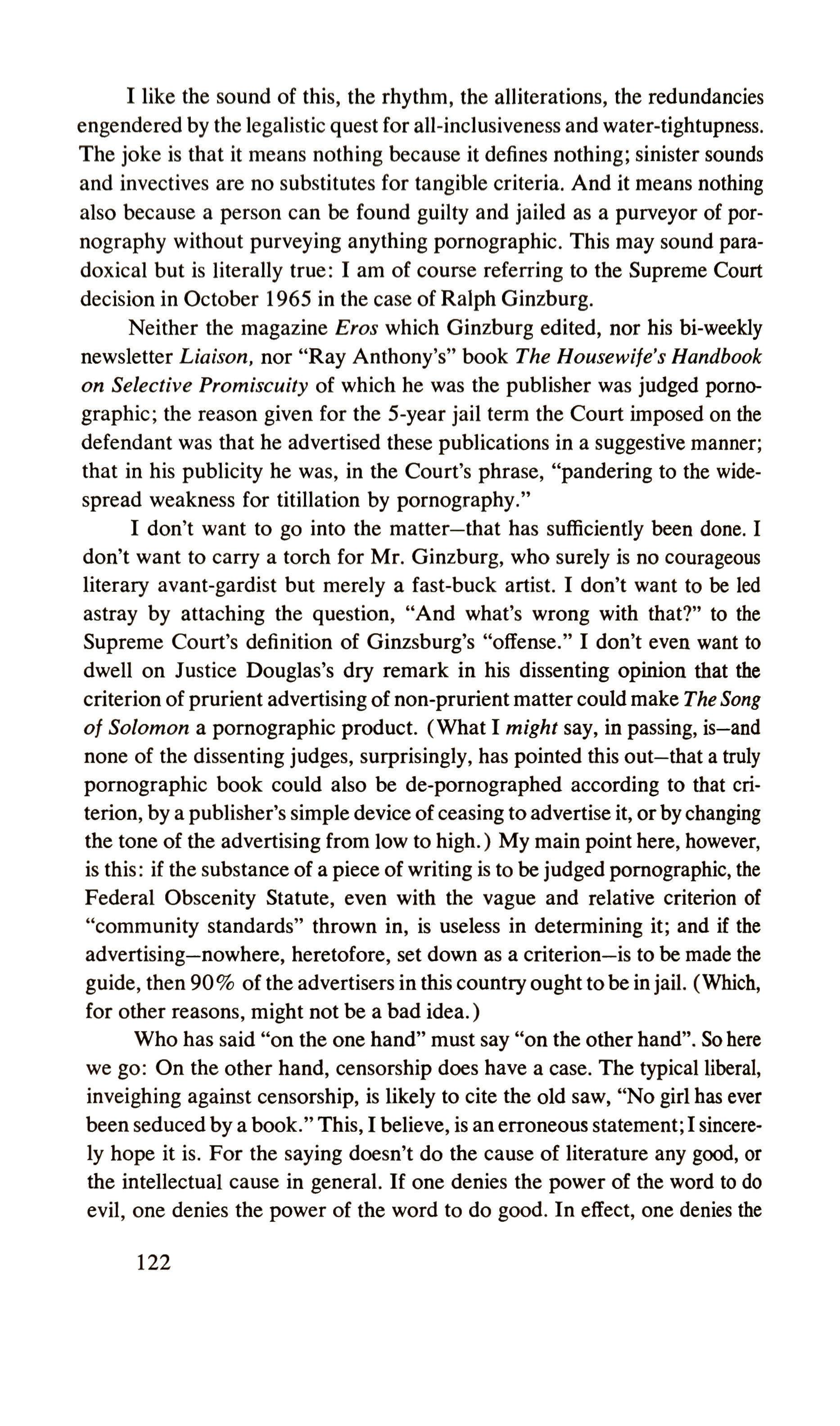
I like the sound of this, the rhythm, the alliterations, the redundancies engendered by the legalistic quest for all-inclusiveness and water-tightupness. The joke is that it means nothing because it defines nothing; sinister sounds and invectives are no substitutes for tangible criteria. And it means nothing also because a person can be found guilty and jailed as a purveyor of pornography without purveying anything pornographic. This may sound paradoxical but is literally true: I am of course referring to the Supreme Court decision in October 1965 in the case of Ralph Ginzburg.
Neither the magazine Eros which Ginzburg edited, nor his bi-weekly newsletter Liaison, nor "Ray Anthony's" book The Housewife's Handbook on Selective Promiscuity of which he was the publisher was judged pornographic; the reason given for the 5-year jail term the Court imposed on the defendant was that he advertised these publications in a suggestive manner; that in his publicity he was, in the Court's phrase, "pandering to the widespread weakness for titillation by pornography."
I don't want to go into the matter that has sufficiently been done. I don't want to carry a torch for Mr. Ginzburg, who surely is no courageous literary avant-gardist but merely a fast-buck artist. I don't want to be led astray by attaching the question, "And what's wrong with that?" to the Supreme Court's definition of Ginzsburg's "offense." I don't even want to dwell on Justice Douglas's dry remark in his dissenting opinion that the criterion of prurient advertising of non-prurient matter could make TheSong of Solomon a pornographic product. (What I might say, in passing, is and none of the dissenting judges, surprisingly, has pointed this out that a truly pornographic book could also be de-pornographed according to that criterion, by a publisher's simple device of ceasing to advertise it, or bychanging the tone of the advertising from low to high.) My main point here, however, is this: if the substance of a piece of writing is to be judged pornographic, the Federal Obscenity Statute, even with the vague and relative criterion of "community standards" thrown in, is useless in determining it; and if the advertising nowhere, heretofore, set down as a criterion is to be made the guide, then 90% of the advertisers in this country ought to be in jail. (Which, for other reasons, might not be a bad idea. )
Who has said "on the one hand" must say "on the other hand". So here we go: On the other hand, censorship does have a case. The typical liberal, inveighing against censorship, is likely to cite the old saw, "No girl has ever been seduced by a book." This, I believe, is an erroneous statement; I sincerely hope it is. For the saying doesn't do the cause of literature any good, or the intellectual cause in general. If one denies the power of the word to do evil, one denies the power of the word to do good. In effect, one denies the
122
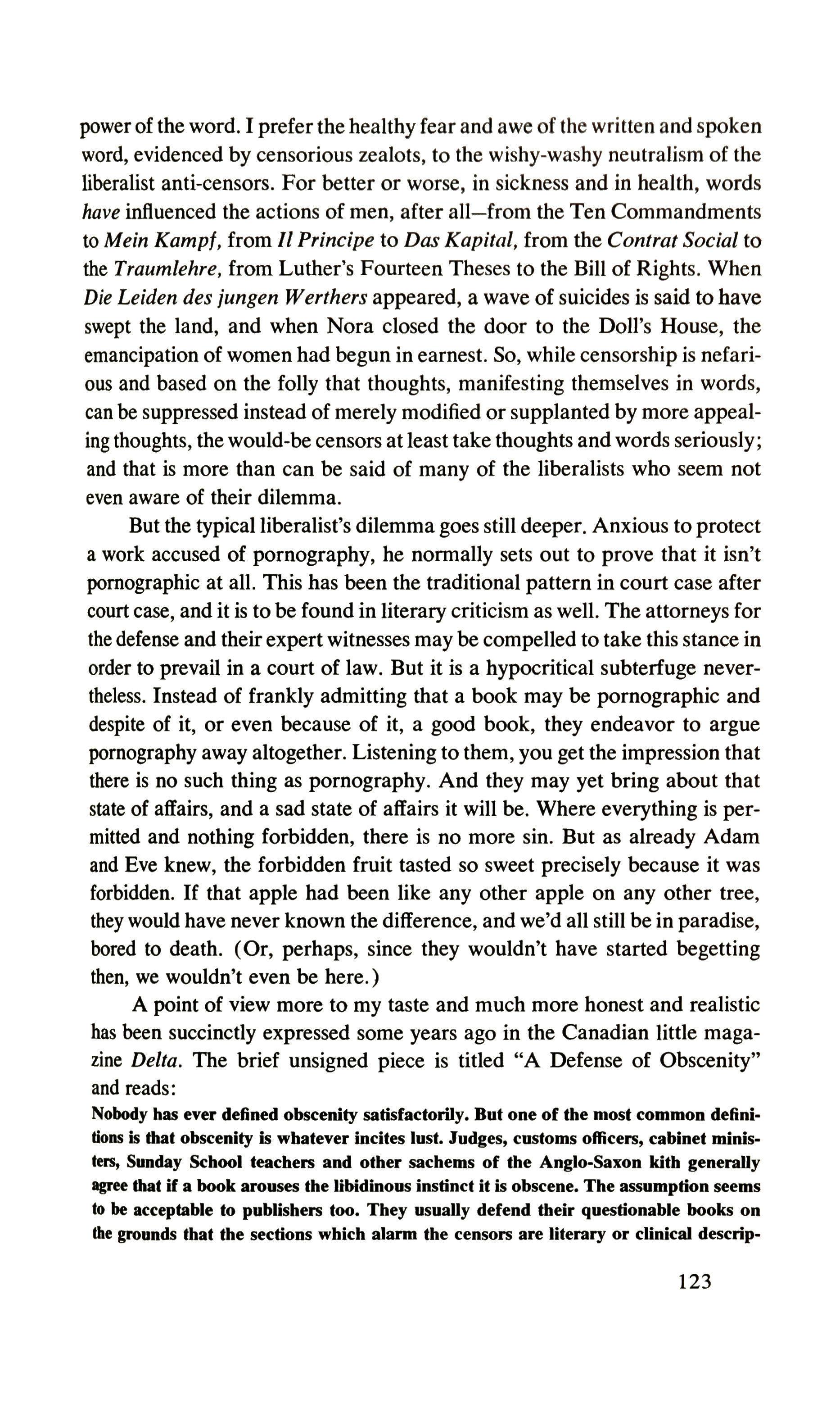
power of the word. I prefer the healthy fear and awe of the written and spoken word, evidenced by censorious zealots, to the wishy-washy neutralism of the liberalist anti-censors. For better or worse, in sickness and in health, words have influenced the actions of men, after all from the Ten Commandments to Mein Kampf. from 11 Principe to Das Kapital, from the Contrat Social to the Traumlehre, from Luther's Fourteen Theses to the Bill of Rights. When Die Leiden des jungen Werthers appeared, a wave of suicides is said to have swept the land, and when Nora closed the door to the Doll's House, the emancipation of women had begun in earnest. So, while censorship is nefarious and based on the folly that thoughts, manifesting themselves in words, can be suppressed instead of merely modified or supplanted by more appealingthoughts, the would-be censors at least take thoughts and words seriously; and that is more than can be said of many of the liberalists who seem not even aware of their dilemma.
But the typical liberalist's dilemma goes still deeper. Anxious to protect a work accused of pornography, he normally sets out to prove that it isn't pornographic at all. This has been the traditional pattern in court case after court case, and it is to be found in literary criticism as well. The attorneys for the defense and their expert witnesses may be compelled to take this stance in order to prevail in a court of law. But it is a hypocritical subterfuge nevertheless. Instead of frankly admitting that a book may be pornographic and despite of it, or even because of it, a good book, they endeavor to argue pornography away altogether. Listening to them, you get the impression that there is no such thing as pornography. And they may yet bring about that state of affairs, and a sad state of affairs it will be. Where everything is permitted and nothing forbidden, there is no more sin. But as already Adam and Eve knew, the forbidden fruit tasted so sweet precisely because it was forbidden. If that apple had been like any other apple on any other tree, they would have never known the difference, and we'd all still be in paradise, bored to death. (Or, perhaps, since they wouldn't have started begetting then, we wouldn't even be here.)
A point of view more to my taste and much more honest and realistic has been succinctly expressed some years ago in the Canadian little magazine Delta. The brief unsigned piece is titled "A Defense of Obscenity" and reads:
Nobody has ever defined obscenity satisfactorily. But one of the nlost common definitions is that obscenity is whatever incites lust. Judges, customs officers, cabinet ministers, Sunday School teachers and other sachems of the Anglo-Saxon kith generally agree that if a book arouses the libidinous instinct it is obscene. The assumption seems to be acceptable to publishers too. They usually defend their questionable books on the grounds that the sections which alailn the censors are literary or clinical descrip-
123
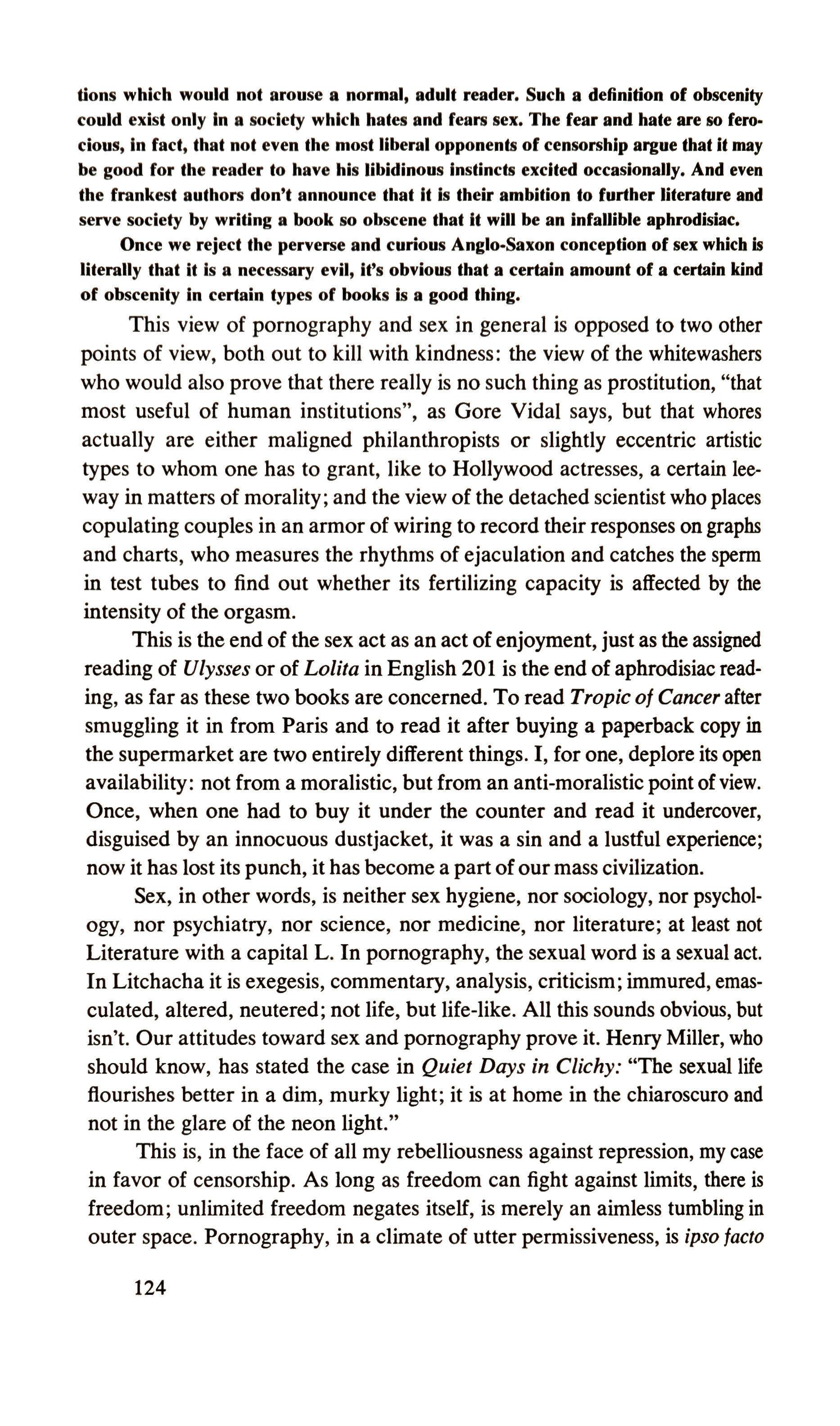
tions which would not arouse a normal, adult reader. Such a definition of obscenity could exist only In a society which hates and fears sex. The fear and hate are so ferocious, in fact, that not even the most liberal opponents of censorship argue that it may be good for the reader to have his libidinous instincts excited occasionally. And even the frankest authors don't announce that It is their ambition to further literature and serve society by writing a book so obscene that It will be an infaUible aphrodisiac.
Once we reject the perverse and curious Anglo-Saxon conception of sex which is literally that it is a necessary evil, it's obvious that a certain amount of a certain kind of obscenity in certain types of books is a good thing.
This view of pornography and sex in general is opposed to two other points of view, both out to kill with kindness: the view of the whitewashers who would also prove that there really is no such thing as prostitution, "that most useful of human institutions", as Gore Vidal says, but that whores actually are either maligned philanthropists or slightly eccentric artistic types to whom one has to grant, like to Hollywood actresses, a certain leeway in matters of morality; and the view of the detached scientist who places copulating couples in an armor of wiring to record their responses on graphs and charts, who measures the rhythms of ejaculation and catches the sperm in test tubes to find out whether its fertilizing capacity is affected by the intensity of the orgasm.
This is the end of the sex act as an act of enjoyment, just as the assigned reading of Ulysses or of Lolita in English 201 is the end of aphrodisiac reading, as far as these two books are concerned. To read Tropic of Cancer after smuggling it in from Paris and to read it after buying a paperback copy in the supermarket are two entirely different things. I, for one, deplore its open availability: not from a moralistic, but from an anti-moralistic point ofview. Once, when one had to buy it under the counter and read it undercover, disguised by an innocuous dustjacket, it was a sin and a lustful experience; now it has lost its punch, it has become a part of our mass civilization.
Sex, in other words, is neither sex hygiene, nor sociology, nor psychology, nor psychiatry, nor science, nor medicine, nor literature; at least not Literature with a capital L. In pornography, the sexual word is a sexual act. In Litchacha it is exegesis, commentary, analysis, criticism; immured, emasculated, altered, neutered; not life, but life-like. All this sounds obvious, but isn't. Our attitudes toward sex and pornography prove it. Henry Miller, who should know, has stated the case in Quiet Days in Clichy: "The sexual life flourishes better in a dim, murky light; it is at home in the chiaroscuro and not in the glare of the neon light."
This is, in the face of all my rebelliousness against repression, my case in favor of censorship. As long as freedom can fight against limits, there is freedom; unlimited freedom negates itself, is merely an aimless tumbling in outer space. Pornography, in a climate of utter permissiveness, is ipso facto
124
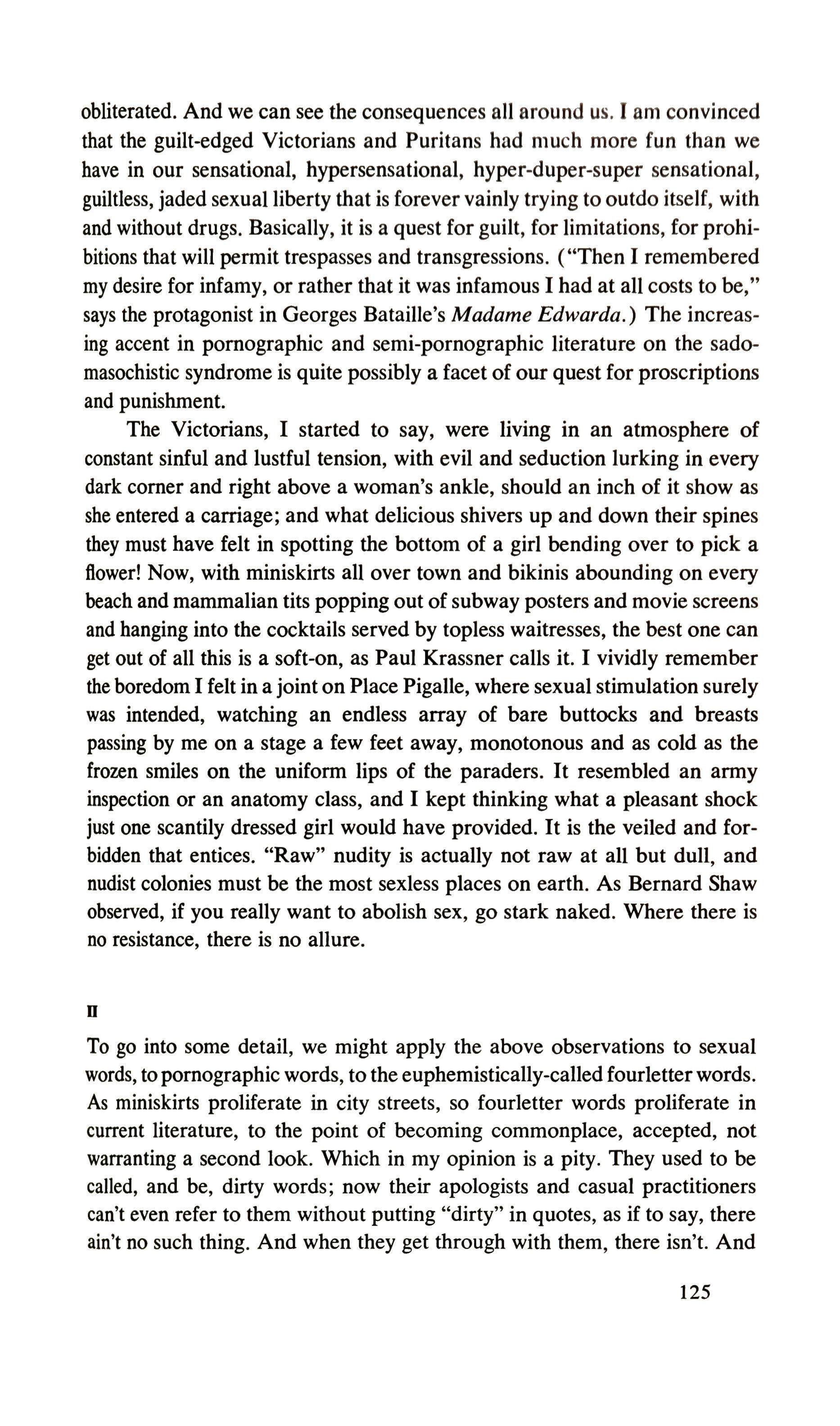
obliterated. And we can see the consequences all around us. I am convinced that the guilt-edged Victorians and Puritans had much more fun than we have in our sensational, hypersensational, hyper-duper-super sensational, guiltless, jaded sexual liberty that is forever vainly trying to outdo itself, with and without drugs. Basically, it is a quest for guilt, for limitations, for prohibitions that will permit trespasses and transgressions. ("Then I remembered my desire for infamy, or rather that it was infamous I had at all costs to be," says the protagonist in Georges Bataille's Madame Edwarda.) The increasing accent in pornographic and semi-pornographic literature on the sadomasochistic syndrome is quite possibly a facet of our quest for proscriptions and punishment.
The Victorians, I started to say, were living in an atmosphere of constant sinful and lustful tension, with evil and seduction lurking in every dark comer and right above a woman's ankle, should an inch of it show as she entered a carriage; and what delicious shivers up and down their spines they must have felt in spotting the bottom of a girl bending over to pick a flower! Now, with miniskirts allover town and bikinis abounding on every beach and mammalian tits popping out of subway posters and movie screens and hanging into the cocktails served by topless waitresses, the best one can get out of all this is a soft-on, as Paul Krassner calls it. I vividly remember the boredom I felt in a joint on Place Pigalle, where sexual stimulation surely was intended, watching an endless array of bare buttocks and breasts passing by me on a stage a few feet away, monotonous and as cold as the frozen smiles on the uniform lips of the paraders. It resembled an army inspection or an anatomy class, and I kept thinking what a pleasant shock just one scantily dressed girl would have provided. It is the veiled and forbidden that entices. "Raw" nudity is actually not raw at all but dull, and nudist colonies must be the most sexless places on earth. As Bernard Shaw observed, if you really want to abolish sex, go stark naked. Where there is no resistance, there is no allure.
o
To go into some detail, we might apply the above observations to sexual words, to pornographic words, to the euphemistically-called fourletterwords. As miniskirts proliferate in city streets, so fourletter words proliferate in current literature, to the point of becoming commonplace, accepted, not warranting a second look. Which in my opinion is a pity. They used to be called, and be, dirty words; now their apologists and casual practitioners can't even refer to them without putting "dirty" in quotes, as if to say, there ain't no such thing. And when they get through with them, there isn't. And
125
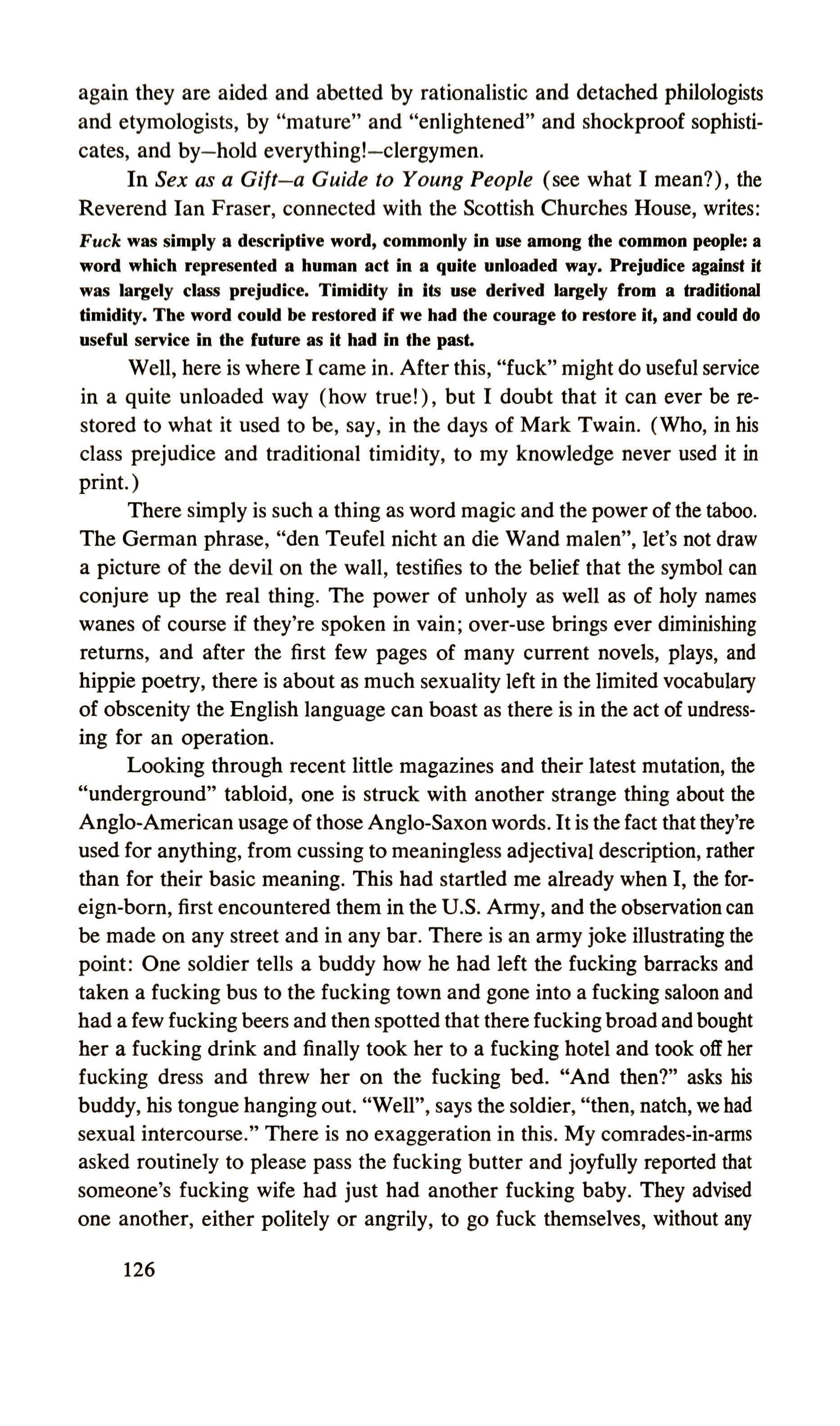
again they are aided and abetted by rationalistic and detached philologists and etymologists, by "mature" and "enlightened" and shockproof sophisticates, and by hold everything! clergymen.
In Sex as a Gift a Guide to Young People (see what I mean?), the Reverend Ian Fraser, connected with the Scottish Churches House, writes: Fuck was simply a descriptive word, commonly in use among the common people: a word which represented a human act in a quite unloaded way. Prejudice against it was largely class prejudice. Timidity In Its use derived largely from a traditional timidity. The word could be restored if we had the courage to restore it, and could do useful service in the future as it had in the past.
Well, here is where I came in. After this, "fuck" might do useful service in a quite unloaded way (how true!), but I doubt that it can ever be restored to what it used to be, say, in the days of Mark Twain. (Who, in his class prejudice and traditional timidity, to my knowledge never used it in print.)
There simply is such a thing as word magic and the power of the taboo. The German phrase, "den Teufel nicht an die Wand malen", let's not draw a picture of the devil on the wall, testifies to the belief that the symbol can conjure up the real thing. The power of unholy as well as of holy names wanes of course if they're spoken in vain; over-use brings ever diminishing returns, and after the first few pages of many current novels, plays, and hippie poetry, there is about as much sexuality left in the limited vocabulary of obscenity the English language can boast as there is in the act of undressing for an operation.
Looking through recent little magazines and their latest mutation, the "underground" tabloid, one is struck with another strange thing about the Anglo-American usage of those Anglo-Saxon words. It is the fact that they're used for anything, from cussing to meaningless adjectival description, rather than for their basic meaning. This had startled me already when I, the foreign-born, first encountered them in the U.S. Army, and the observation can be made on any street and in any bar. There is an army joke illustrating the point: One soldier tells a buddy how he had left the fucking barracks and taken a fucking bus to the fucking town and gone into a fucking saloon and had a few fucking beers and then spotted that there fucking broad and bought her a fucking drink and finally took her to a fucking hotel and took off her fucking dress and threw her on the fucking bed. "And then?" asks his buddy, his tongue hanging out. "Well", says the soldier, "then, natch, we had sexual intercourse." There is no exaggeration in this. My comrades-in-arms asked routinely to please pass the fucking butter and joyfully reported that someone's fucking wife had just had another fucking baby. They advised one another, either politely or angrily, to go fuck themselves, without any
126
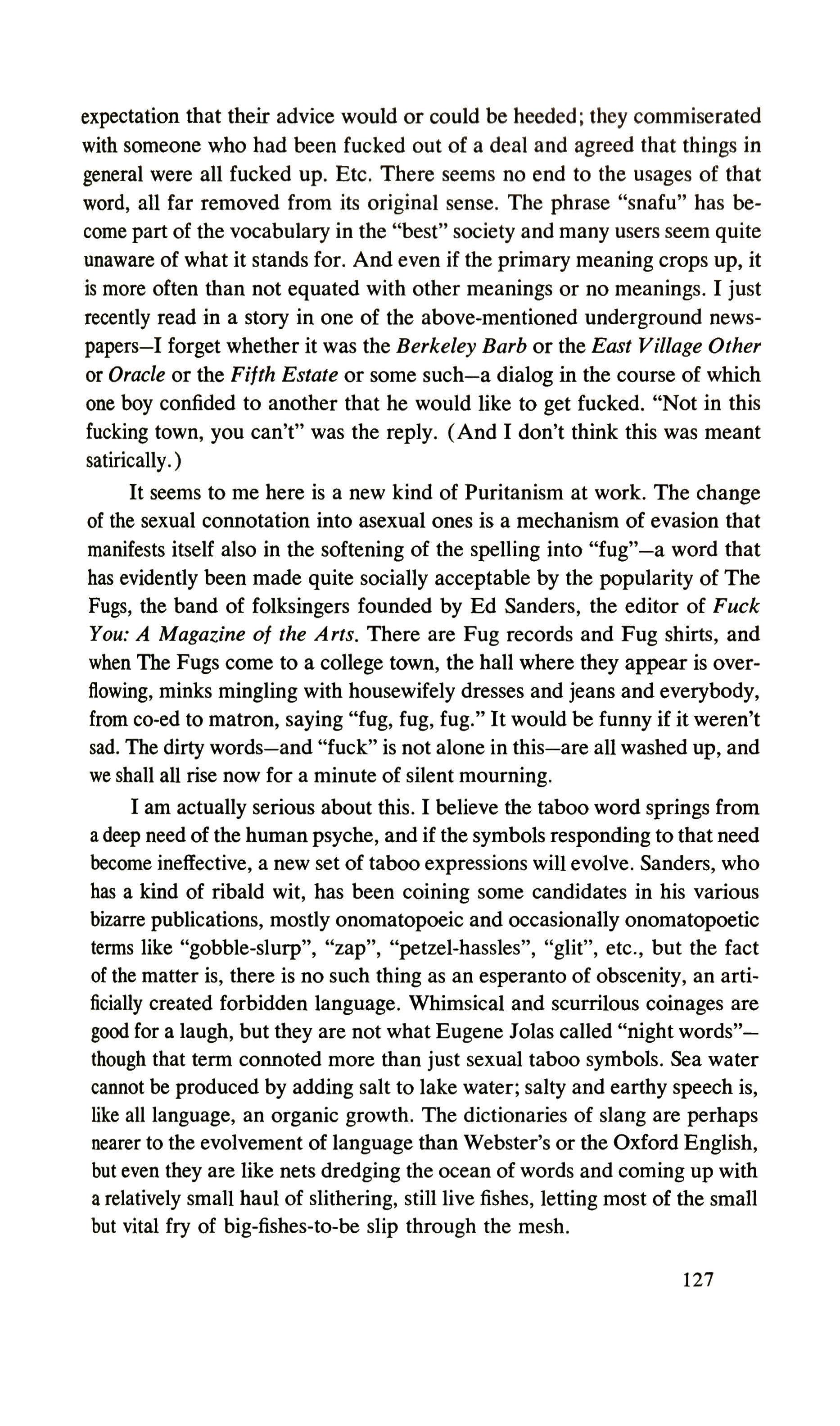
expectation that their advice would or could be heeded; they commiserated with someone who had been fucked out of a deal and agreed that things in general were all fucked up. Etc. There seems no end to the usages of that word, all far removed from its original sense. The phrase "snafu" has become part of the vocabulary in the "best" society and many users seem quite unaware of what it stands for. And even if the primary meaning crops up, it is more often than not equated with other meanings or no meanings. I just recently read in a story in one of the above-mentioned underground newspapers I forget whether it was the Berkeley Barb or the East Village Other or Oracle or the Fifth Estate or some such a dialog in the course of which one boy confided to another that he would like to get fucked. "Not in this fucking town, you can't" was the reply. (And I don't think this was meant satirically.)
It seems to me here is a new kind of Puritanism at work. The change of the sexual connotation into asexual ones is a mechanism of evasion that manifests itself also in the softening of the spelling into "fug" a word that has evidently been made quite socially acceptable by the popularity of The Fugs, the band of folksingers founded by Ed Sanders, the editor of Fuck You.· A Magazine of the Arts. There are Fug records and Fug shirts, and when The Fugs come to a college town, the hall where they appear is overflowing, minks mingling with housewifely dresses and jeans and everybody, from co-ed to matron, saying "fug, fug, fug." It would be funny if it weren't sad. The dirty words and "fuck" is not alone in this are all washed up, and we shall all rise now for a minute of silent mourning.
I am actually serious about this. I believe the taboo word springs from a deep need of the human psyche, and if the symbols responding to that need become ineffective, a new set of taboo expressions will evolve. Sanders, who has a kind of ribald wit, has been coining some candidates in his various bizarre publications, mostly onomatopoeic and occasionally onomatopoetic terms like "gobble-slurp" "zap" "petzel-hassles' "glit" etc but the fact " of the matter is, there is no such thing as an esperanto of obscenity, an artificially created forbidden language. Whimsical and scurrilous coinages are good for a laugh, but they are not what Eugene Iolas called "night words"though that term connoted more than just sexual taboo symbols. Sea water cannot be produced by adding salt to lake water; salty and earthy speech is, like all language, an organic growth. The dictionaries of slang are perhaps nearer to the evolvement of language than Webster's or the Oxford English, but even they are like nets dredging the ocean of words and coming up with a relatively small haul of slithering, still live fishes, letting most of the small but vital fry of big-fishes-to-be slip through the mesh.
127
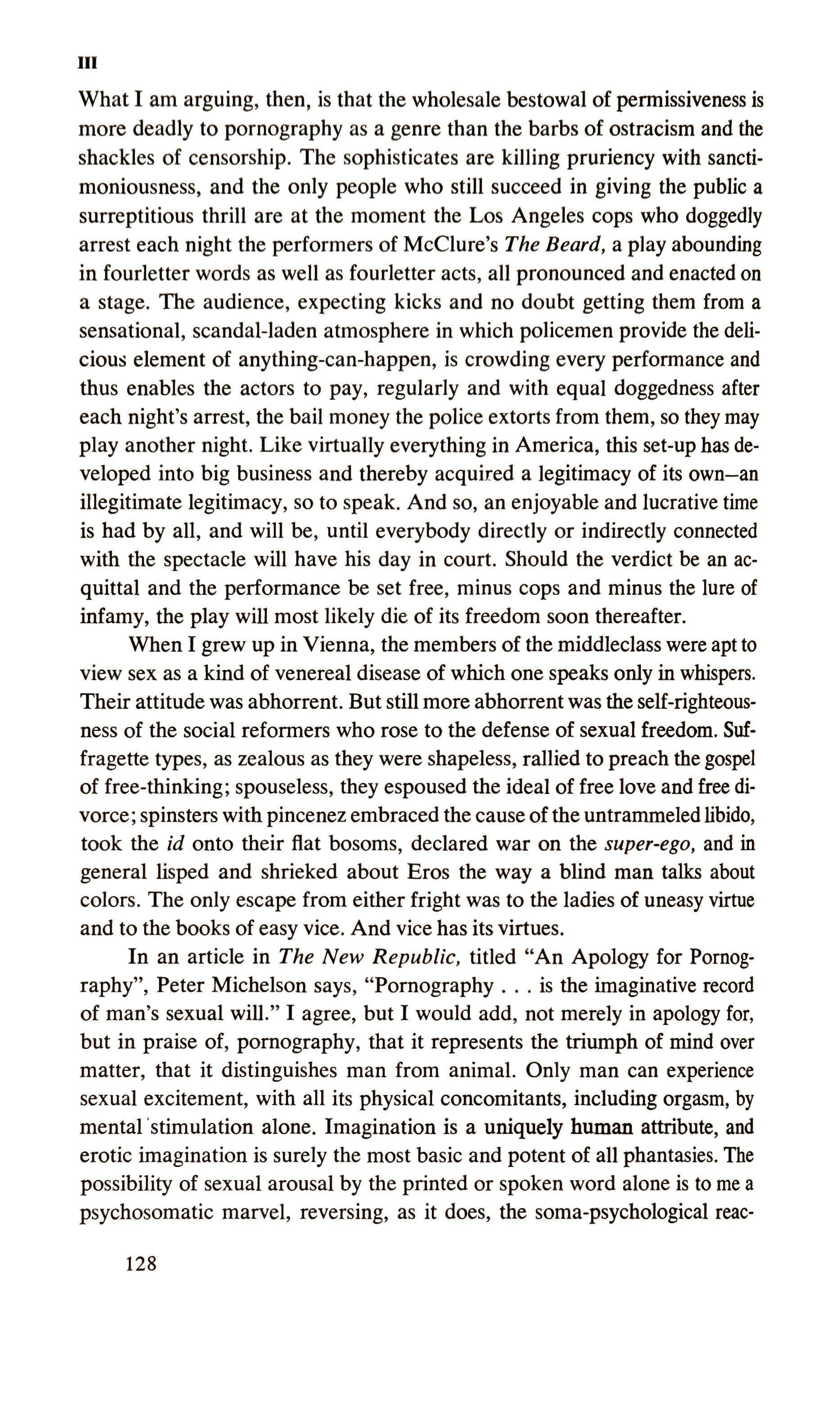
What I aln arguing, then, is that the wholesale bestowal of permissiveness is more deadly to pornography as a genre than the barbs of ostracism and the shackles of censorship. The sophisticates are killing pruriency with sanctimoniousness, and the only people who still succeed in giving the public a surreptitious thrill are at the moment the Los Angeles cops who doggedly arrest each night the performers of McClure's The Beard, a play abounding in fourletter words as well as fourletter acts, all pronounced and enacted on a stage. The audience, expecting kicks and no doubt getting them from a sensational, scandal-laden atmosphere in which policemen provide the delicious element of anything-can-happen, is crowding every performance and thus enables the actors to pay, regularly and with equal doggedness after each night's arrest, the bail money the police extorts from them, so they may play another night. Like virtually everything in America, this set-up has developed into big business and thereby acquired a legitimacy of its own-an illegitimate legitimacy, so to speak. And so, an enjoyable and lucrative time is had by all, and will be, until everybody directly or indirectly connected with the spectacle will have his day in court. Should the verdict be an acquittal and the performance be set free, minus cops and minus the lure of infamy, the play will most likely die of its freedom soon thereafter.
When I grew up in Vienna, the members of the middleclass were apt to view sex as a kind of venereal disease of which one speaks only in whispers. Their attitude was abhorrent. But still more abhorrent was the self-righteousness of the social reformers who rose to the defense of sexual freedom. Suffragette types, as zealous as they were shapeless, rallied to preach the gospel of free-thinking; spouseless, they espoused the ideal of free love and free divorce; spinsters with pincenez embraced the cause of the untrammeled libido, took the id onto their flat bosoms, declared war on the super-ego, and in general lisped and shrieked about Eros the way a blind man talks about colors. The only escape from either fright was to the ladies of uneasy virtue and to the books of easy vice. And vice has its virtues.
In an article in The New Republic, titled "An Apology for Pornography", Peter Michelson says, "Pornography is the imaginative record of man's sexual will." I agree, but I would add, not merely in apology for, but in praise of, pornography, that it represents the triumph of mind over matter, that it distinguishes man from animal. Only man can experience sexual excitement, with all its physical concomitants, including orgasm, by mental 'stimulation alone. Imagination is a uniquely human attribute, and erotic imagination is surely the most basic and potent of all phantasies. The possibility of sexual arousal by the printed or spoken word alone is to me a psychosomatic marvel, reversing, as it does, the soma-psychological reac-
III
128
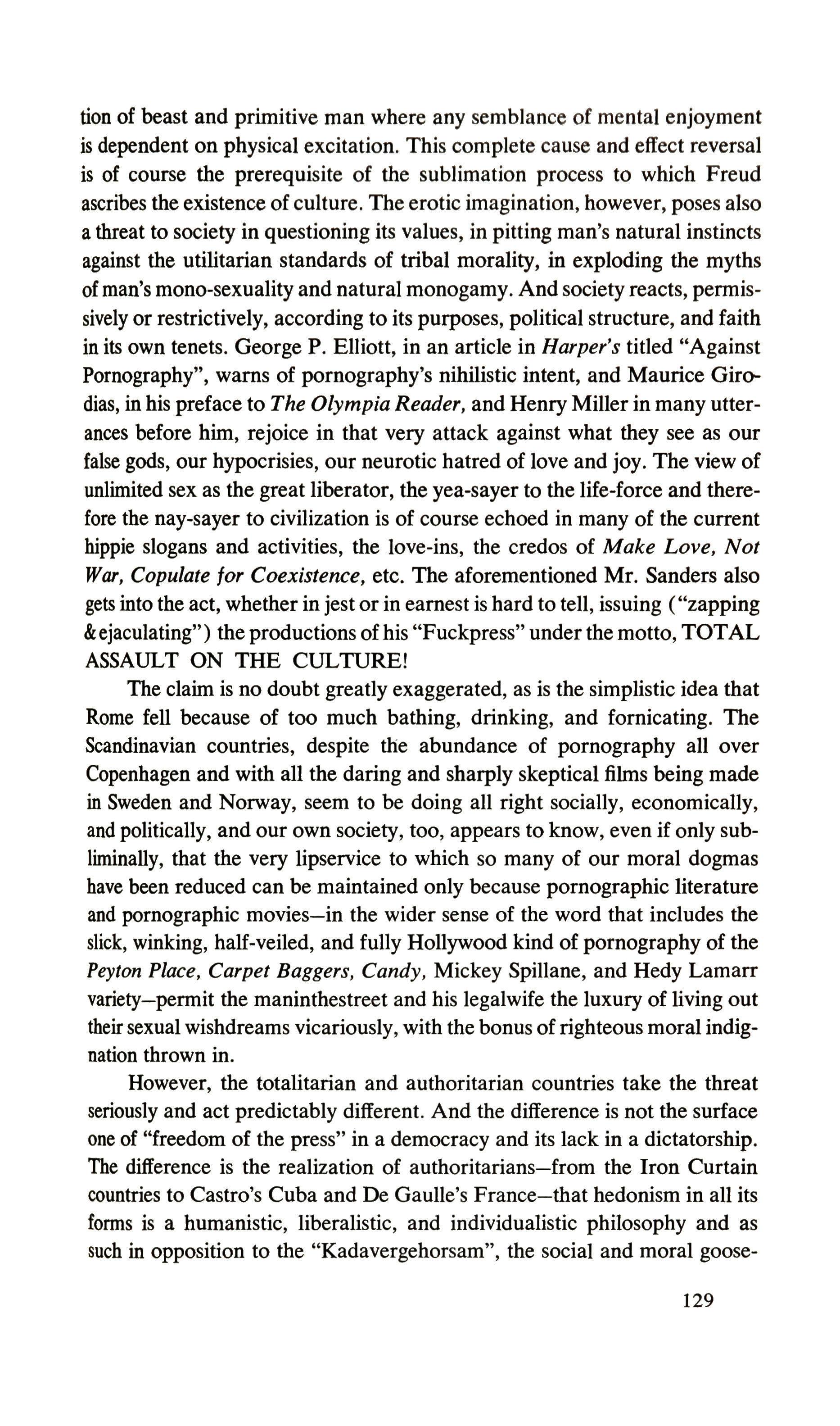
tion of beast and primitive man where any semblance of mental enjoyment is dependent on physical excitation. This complete cause and effect reversal is of course the prerequisite of the sublimation process to which Freud ascribes the existence of culture. The erotic imagination, however, poses also a threat to society in questioning its values, in pitting man's natural instincts against the utilitarian standards of tribal morality, in exploding the myths ofman's mono-sexuality and natural monogamy. And society reacts, permissivelyor restrictively, according to its purposes, political structure, and faith in its own tenets. George P. Elliott, in an article in Harper's titled "Against Pornography", warns of pornography's nihilistic intent, and Maurice Girodias, in his preface to The Olympia Reader, and Henry Miller in many utterances before him, rejoice in that very attack against what they see as our false gods, our hypocrisies, our neurotic hatred of love and joy. The view of unlimited sex as the great liberator, the yea-sayer to the life-force and therefore the nay-sayer to civilization is of course echoed in many of the current hippie slogans and activities, the love-ins, the credos of Make Love, Not War, Copulate for Coexistence, etc. The aforementioned Mr. Sanders also gets into the act, whether in jest or in earnest is hard to tell, issuing ("zapping &ejaculating") the productions ofhis "Fuckpress" under the motto, TOTAL ASSAULT ON THE CULTURE!
The claim is no doubt greatly exaggerated, as is the simplistic idea that Rome fell because of too much bathing, drinking, and fornicating. The Scandinavian countries, despite the abundance of pornography allover Copenhagen and with all the daring and sharply skeptical films being made in Sweden and Norway, seem to be doing all right socially, economically, and politically, and our own society, too, appears to know, even if only subliminally, that the very lipservice to which so many of our moral dogmas have been reduced can be maintained only because pornographic literature and pornographic movies in the wider sense of the word that includes the slick, winking, half-veiled, and fully Hollywood kind of pornography of the Peyton Place, Carpet Baggers, Candy, Mickey Spillane, and Hedy Lamarr variety permit the maninthestreet and his legalwife the luxury of living out their sexual wishdreams vicariously, with the bonus of righteous moral indignation thrown in.
However, the totalitarian and authoritarian countries take the threat seriously and act predictably different. And the difference is not the surface one of "freedom of the press" in a democracy and its lack in a dictatorship. The difference is the realization of authoritarians from the Iron Curtain countries to Castro's Cuba and De Gaulle's France that hedonism in all its forms is a humanistic, liberalistic, and individualistic philosophy and as such in opposition to the "Kadavergehorsam", the social and moral goose-
129
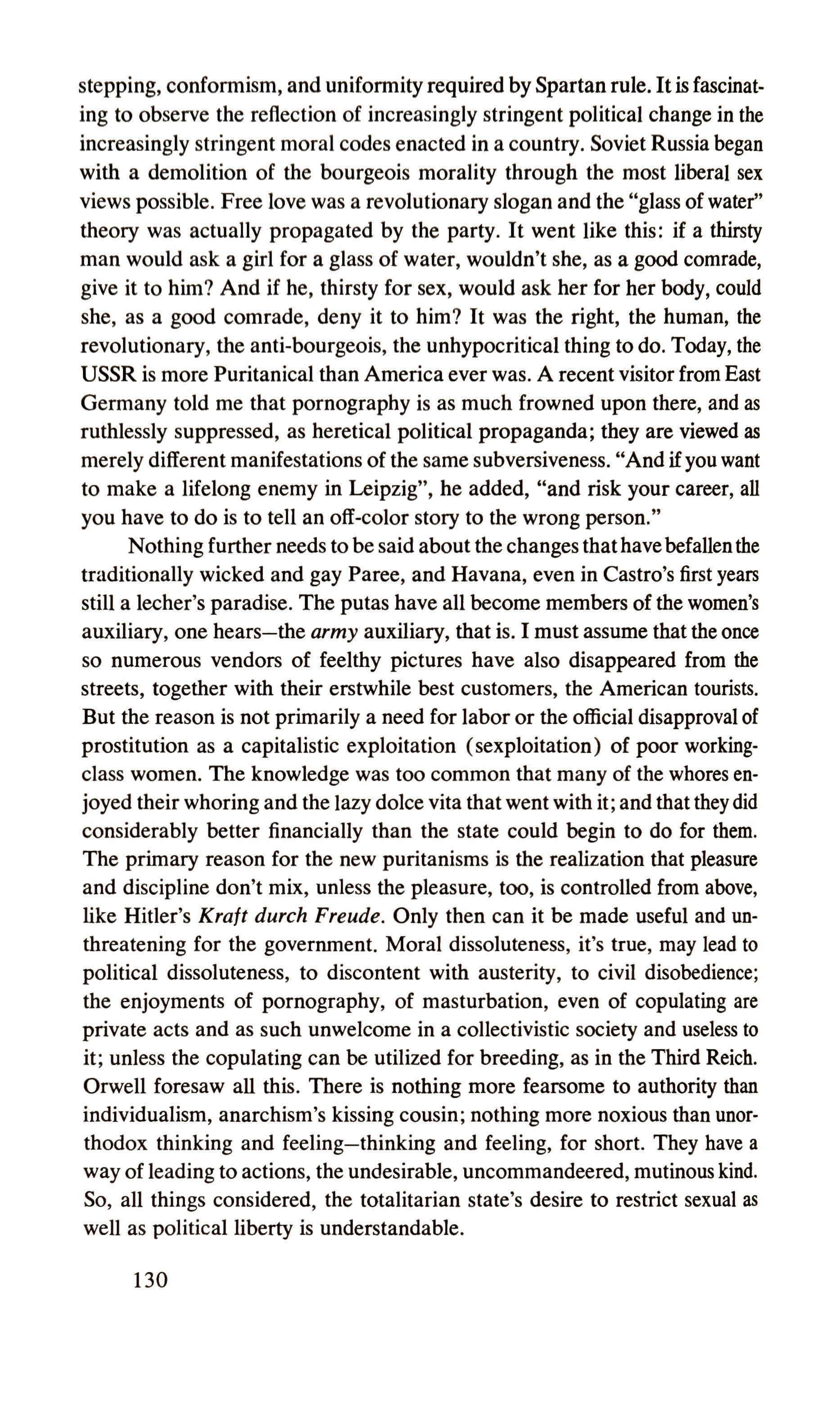
stepping, conformism, and uniformityrequired bySpartan rule. It is fascinating to observe the reflection of increasingly stringent political change in the increasingly stringent moral codes enacted in a country. Soviet Russia began with a demolition of the bourgeois morality through the most liberal sex views possible. Free love was a revolutionary slogan and the "glass of water" theory was actually propagated by the party. It went like this: if a thirsty man would ask a girl for a glass of water, wouldn't she, as a good comrade, give it to him? And if he, thirsty for sex, would ask her for her body, could she, as a good comrade, deny it to him? It was the right, the human, the revolutionary, the anti-bourgeois, the unhypocritical thing to do. Today, the USSR is more Puritanical than America ever was. A recent visitor from East Germany told me that pornography is as much frowned upon there, and as ruthlessly suppressed, as heretical political propaganda; they are viewed as merely different manifestations of the same subversiveness. "And ifyou want to make a lifelong enemy in Leipzig", he added, "and risk your career, all you have to do is to tell an off-color story to the wrong person."
Nothing further needs to be said about the changes thathavebefallenthe traditionally wicked and gay Paree, and Havana, even in Castro's first years still a lecher's paradise. The putas have all become members of the women's auxiliary, one hears the army auxiliary, that is. I must assume that the once so numerous vendors of feelthy pictures have also disappeared from the streets, together with their erstwhile best customers, the American tourists. But the reason is not primarily a need for labor or the official disapproval of prostitution as a capitalistic exploitation (sexploitation) of poor workingclass women. The knowledge was too common that many of the whores enjoyed their whoring and the lazy dolce vita that went with it; and that theydid considerably better financially than the state could begin to do for them. The primary reason for the new puritanisms is the realization that pleasure and discipline don't mix, unless the pleasure, too, is controlled from above, like Hitler's Kraft durch Freude. Only then can it be made useful and unthreatening for the government. Moral dissoluteness, it's true, may lead to political dissoluteness, to discontent with austerity, to civil disobedience; the enjoyments of pornography, of masturbation, even of copulating are private acts and as such unwelcome in a collectivistic society and useless to it; unless the copulating can be utilized for breeding, as in the Third Reich. Orwell foresaw all this. There is nothing more fearsome to authority than individualism, anarchism's kissing cousin; nothing more noxious than unorthodox thinking and feeling thinking and feeling, for short. They have a way of leading to actions, the undesirable, uncommandeered, mutinous kind. So, all things considered, the totalitarian state's desire to restrict sexual as well as political liberty is understandable.
130

The Catholic Church, another authoritarian and totalitarian institution, has from the beginning recognized the enemy, and for the same reasons. But, more subtle and ingenious than the state, it has discovered a uniquely simple way of dealing with the problem: it has made the same act that is an extramarital sin a marital duty. And what can more effectively take the fun out of anything than making it a duty a fucking duty, as it were?
There is, the Church knew, no point in making laws that will be broken. You can tell people until you're breathless that sex is for procreation only and not for enjoyment; they will go on copulating right throughout pregnancy, if physically possible. So you extract as much pleasure as possible from the act by extending the marital duty, illogical and inconsistent as this decree may be. But to secure conformity and avoid dangerous deviation, you lay down precise rules as to how and how not, as to the one & only correct position, the prohibition of "unnatural" mechanical devices, etc. Thus the practitioners are made to feel that they are performing a wholesome and required deed with Big Faith Brother standing by and looking down on them, his hands extended in blessing, and occasionally raised like a conductor's to caution, "Piano, and less staccato, please!"
Children, in other words, will play, and the only method of controlling their playing is to provide playgrounds for them and to dampen their exuberance by posting rules and channeling their games for functional purposes. Functional, that is, for the supervising agency. The privacy invasion accomplished by those devices is beneficial in itself. The institution of the Confessional is but another mechanism of control, providing the catharsis of pleading guilty and combining it with the court functions of punishment or acquittal: all part & parcel of the power complex. Licentiousness in general, and sexual licentiousness in particular, endangers the power structure and its strictures, and The Establishment (can you blame it?) fights back, castrating, emasculating, clipping & nipping in the bud, or trying to. But here is the irony: pruned saplings grow lush.
IV
They grow in secret, to be sure. If I can trust my informants and I have every reason to pornography can be had in any of the Iron-Chastity-Belt countries, most easily in Jugoslavia, though only at prices that bespeak the sellers' risk and the buyers' eagerness. It stands to reason (or emotion). Pressure seeks outlets and, as the Latin proverbrecognizes, naturam expellas iurca, tamen usque recurret. Within pornography in itself one of the most patent and potent manifestations of expelled nature's eternal return it is the proven "hard-core" variety that appears to maintain itself most stub-
131
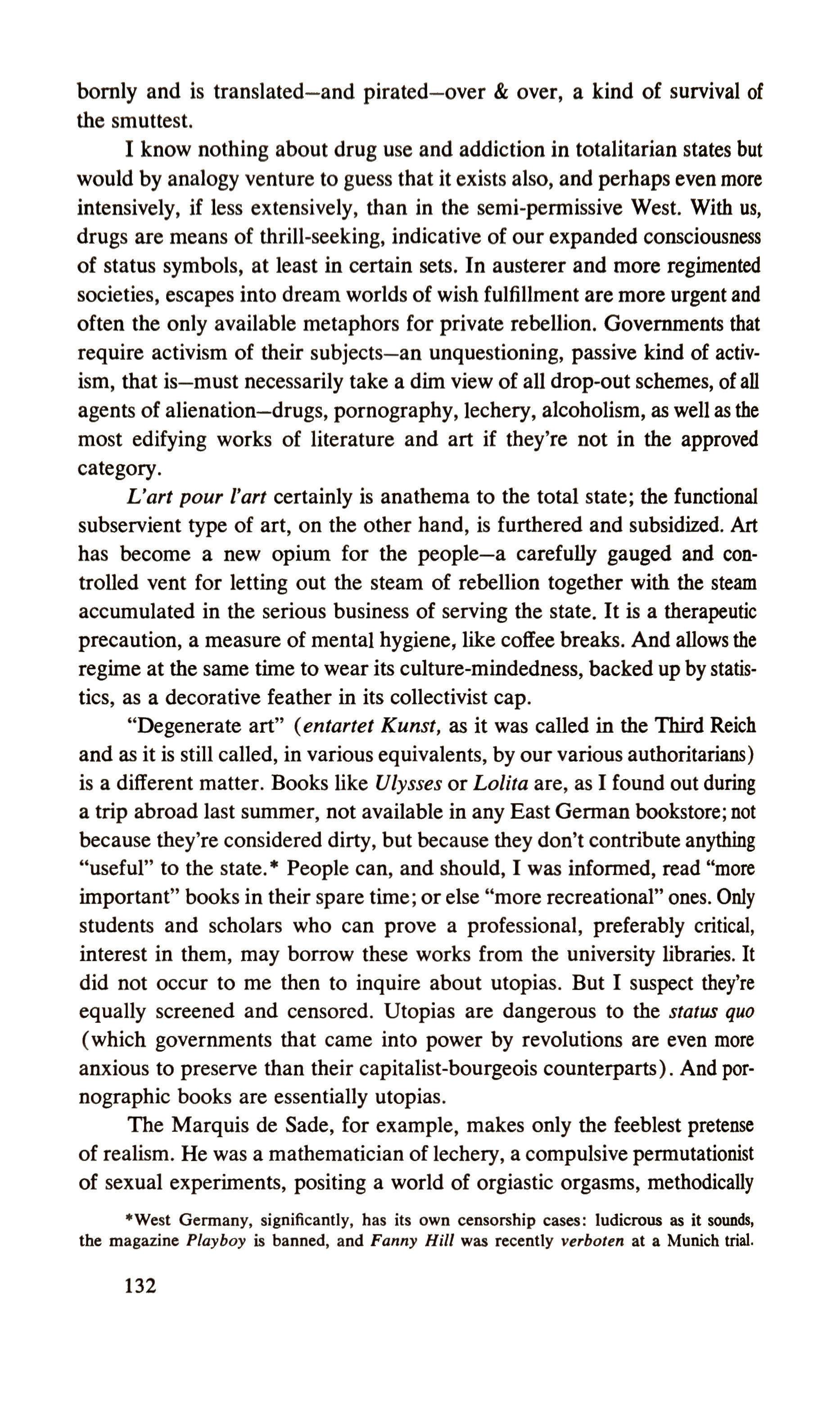
bornly and is translated and pirated over & over, a kind of survival of the smuttest.
I know nothing about drug use and addiction in totalitarian states but would by analogy venture to guess that it exists also, and perhaps even more intensively, if less extensively, than in the semi-permissive West. With us, drugs are means of thrill-seeking, indicative of our expanded consciousness of status symbols, at least in certain sets. In austerer and more regimented societies, escapes into dream worlds of wish fulfillment are more urgent and often the only available metaphors for private rebellion. Governments that require activism of their subjects an unquestioning, passive kind of activism, that is must necessarily take a dim view of all drop-out schemes, of all agents of alienation drugs, pornography, lechery, alcoholism, as well as the most edifying works of literature and art if they're not in the approved category.
L'art pour I'art certainly is anathema to the total state; the functional subservient type of art, on the other hand, is furthered and subsidized. Art has become a new opium for the people a carefully gauged and controlled vent for letting out the steam of rebellion together with the steam accumulated in the serious business of serving the state. It is a therapeutic precaution, a measure of mental hygiene, like coffee breaks. And allows the regime at the same time to wear its culture-mindedness, backed up by statistics, as a decorative feather in its collectivist cap.
"Degenerate art" (entartet Kunst, as it was called in the Third Reich and as it is still called, in various equivalents, by our various authoritarians) is a different matter. Books like Ulysses or Lolita are, as I found out during a trip abroad last summer, not available in any East German bookstore; not because they're considered dirty, but because they don't contribute an g "useful" to the state." People can, and should, I was informed, read "more important" books in their spare time; or else "more recreational" ones. Only students and scholars who can prove a professional, preferably critical, interest in them, may borrow these works from the university libraries. It did not occur to me then to inquire about utopias. But I suspect they're equally screened and censored. Utopias are dangerous to the status quo (which governments that came into power by revolutions are even more anxious to preserve than their capitalist-bourgeois counterparts). And pornographic books are essentially utopias.
The Marquis de Sade, for example, makes only the feeblest pretense of realism. He was a mathematician of lechery, a compulsive permutationist of sexual experiments, positing a world of orgiastic orgasms, methodically
·West Germany, significantly. has its own censorship cases: ludicrous as it sounds, the magazine Playboy is banned, and Fanny Hill was recently verboten at a Munich trial.
132
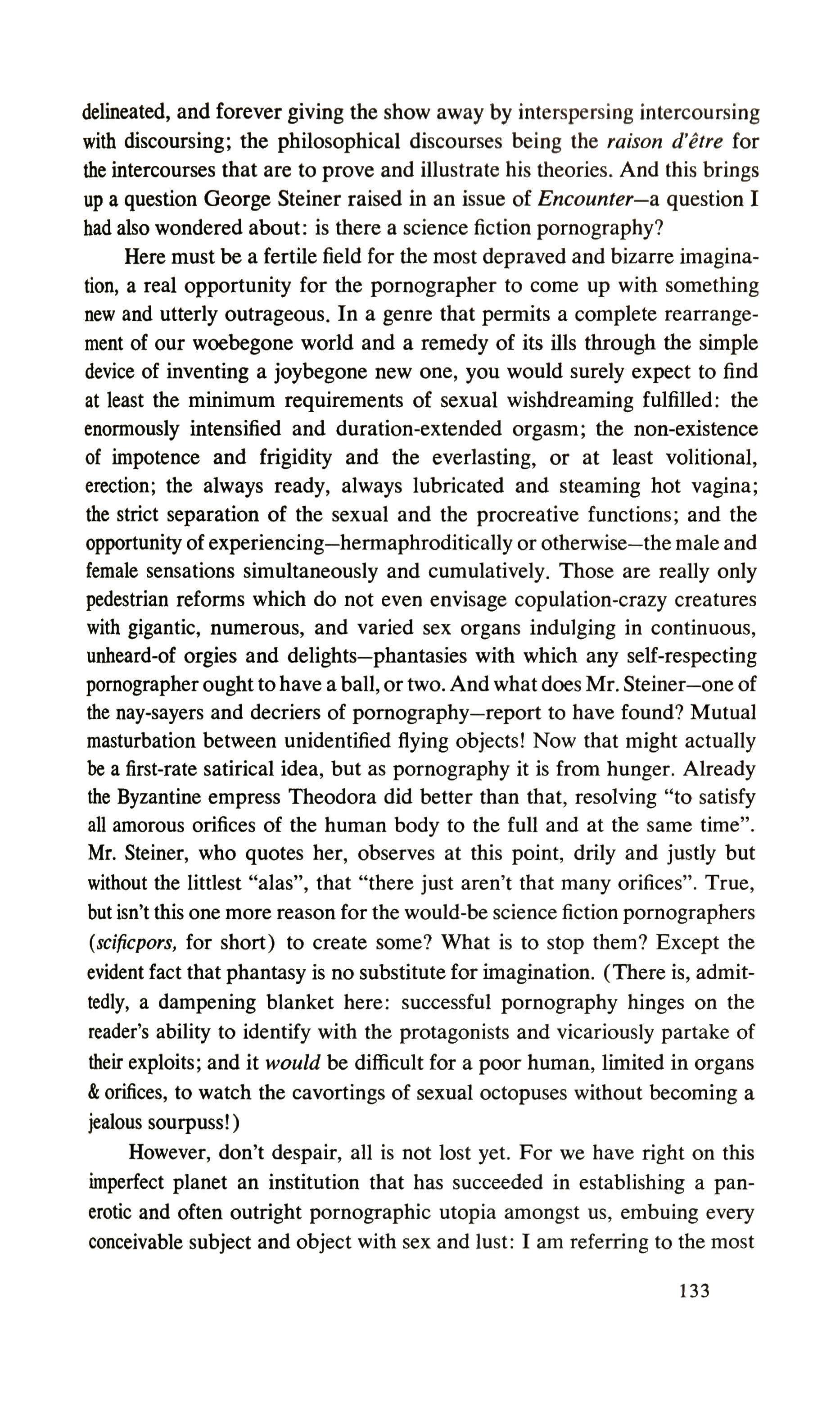
delineated, and forever giving the show away by interspersing intercoursing with discoursing; the philosophical discourses being the raison d'etre for the intercourses that are to prove and illustrate his theories. And this brings up a question George Steiner raised in an issue of Encounter a question I had also wondered about: is there a science fiction pornography?
Here must be a fertile field for the most depraved and bizarre imagination, a real opportunity for the pornographer to come up with something new and utterly outrageous. In a genre that permits a complete rearrangement of our woebegone world and a remedy of its ills through the simple device of inventing a joybegone new one, you would surely expect to find at least the minimum requirements of sexual wishdreaming fulfilled: the enormously intensified and duration-extended orgasm; the non-existence of impotence and frigidity and the everlasting, or at least volitional, erection; the always ready, always lubricated and steaming hot vagina; the strict separation of the sexual and the procreative functions; and the opportunity of experiencing hermaphroditically or otherwise the male and female sensations simultaneously and cumulatively. Those are really only pedestrian reforms which do not even envisage copulation-crazy creatures with gigantic, numerous, and varied sex organs indulging in continuous, unheard-of orgies and delights phantasies with which any self-respecting pornographerought to have a ball, or two. And what does Mr. Steiner one of the nay-sayers and decriers of pornography report to have found? Mutual masturbation between unidentified flying objects! Now that might actually be a first-rate satirical idea, but as pornography it is from hunger. Already the Byzantine empress Theodora did better than that, resolving "to satisfy all amorous orifices of the human body to the full and at the same time". Mr. Steiner, who quotes her, observes at this point, drily and justly but without the littlest "alas", that "there just aren't that many orifices". True, but isn't this one more reason for the would-be science fiction pornographers (scificpors, for short) to create some? What is to stop them? Except the evident fact that phantasy is no substitute for imagination. (There is, admittedly, a dampening blanket here: successful pornography hinges on the reader's ability to identify with the protagonists and vicariously partake of their exploits; and it would be difficult for a poor human, limited in organs & orifices, to watch the cavortings of sexual octopuses without becoming a jealous sourpuss!)
However, don't despair, all is not lost yet. For we have right on this imperfect planet an institution that has succeeded in establishing a panerotic and often outright pornographic utopia amongst us, embuing every conceivable subject and object with sex and lust: I am referring to the most
133
respectable pillarofsociety industry of advertising. The difference between its daily practices and those for which Ralph Ginzburg received a five-yearjail terln are negligible, as far as I can see. No differences in kind, minimal ones in degree. Both types are a rather far cry from the achievements of Mr. Ed Sanders, who appears to crop up in these contemplations, and who issues catalogs of books as well as "literary relics", "freak-spews", gobble-vectors", etc., and offers such items as guaranteed genuine samples of Allen Ginsberg's pubic hair, paraphernalia used by the East Village greats and others before, during, and after their sexual hangup, uptight and dripdry activities, and who not only gets away with it but was acquitted in a recent trial. While Mr. Ginzburg well, you know. Even more interesting is 'that our daily & nightly ad hucksters & hustlers don't even have the need to be acquitted, because they're never hauled into court in the first place. My sense of justice would demand that Sanders remain free, Ginzburg be freed, and they be jailed.
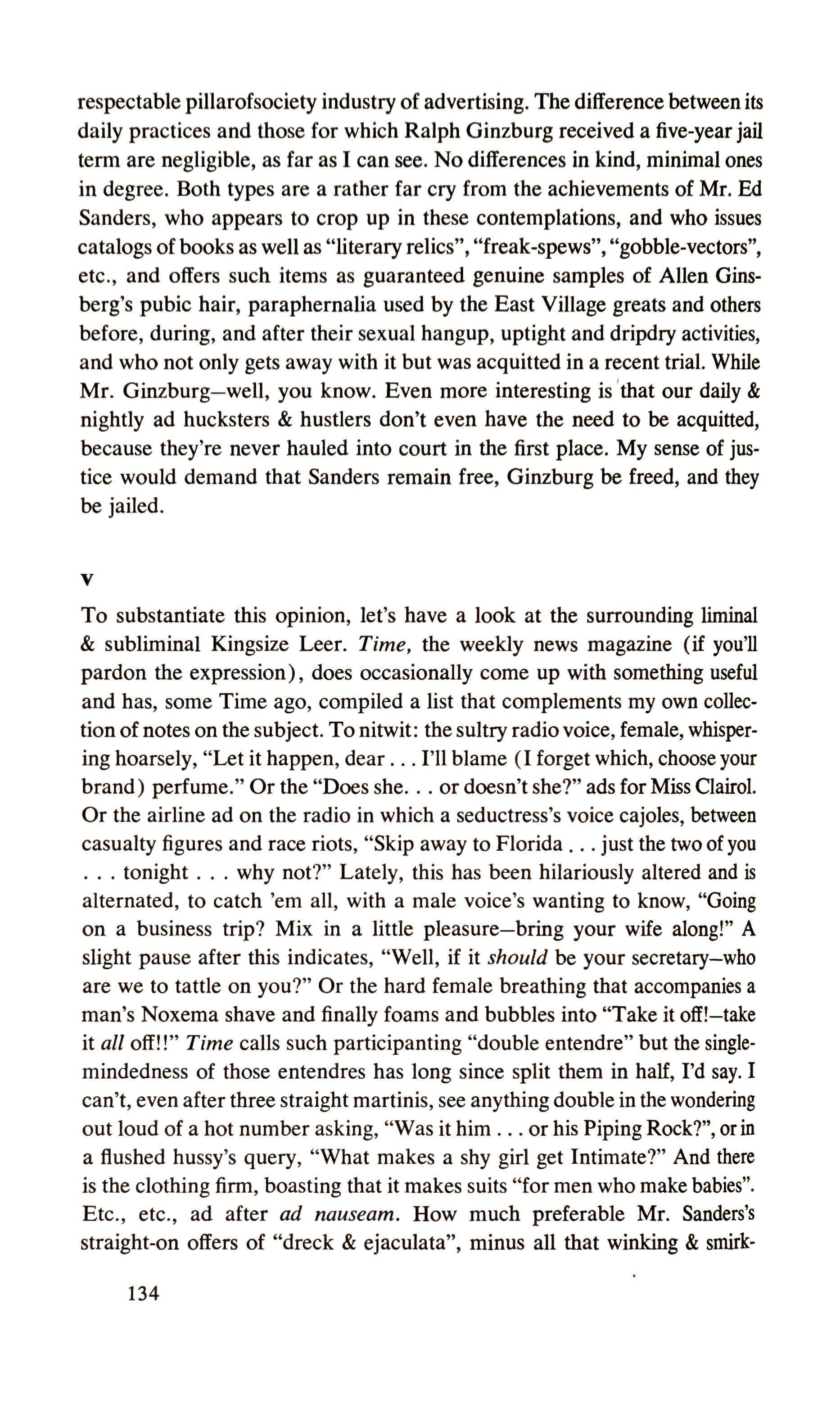
To substantiate this opinion, let's have a look at the surrounding liminal & subliminal Kingsize Leer. Time, the weekly news magazine (if you'll pardon the expression), does occasionally come up with something useful and has, some Time ago, compiled a list that complements my own collection of notes on the subject. To nitwit: the sultry radio voice, female, whispering hoarsely, "Let it happen, dear I'll blame (I forget which, choose your brand) perfume." Or the "Does she or doesn't she?" ads for Miss Clairol. Or the airline ad on the radio in which a seductress's voice cajoles, between casualty figures and race riots, "Skip away to Florida just the two of you tonight why not?" Lately, this has been hilariously altered and is alternated, to catch 'em all, with a male voice's wanting to know, "Going on a business trip? Mix in a little pleasure bring your wife along!" A slight pause after this indicates, "Well, if it should be your secretary-who are we to tattle on you?" Or the hard female breathing that accompanies a man's Noxema shave and finally foams and bubbles into "Take it off!-take it all off! !" Time calls such participanting "double entendre" but the singlemindedness of those entendres has long since split them in half, I'd say. I can't, even after three straight martinis, see anything double in the wondering out loud of a hot number asking, "Was it him or his PipingRock?", or in a flushed hussy's query, "What makes a shy girl get Intimate?" And there is the clothing firm, boasting that it makes suits "for men who make babies". Etc., etc., ad after ad nauseam. How much preferable Mr. Sanders'S straight-on offers of "dreck & ejaculata", minus all that winking & smirk-
v
134
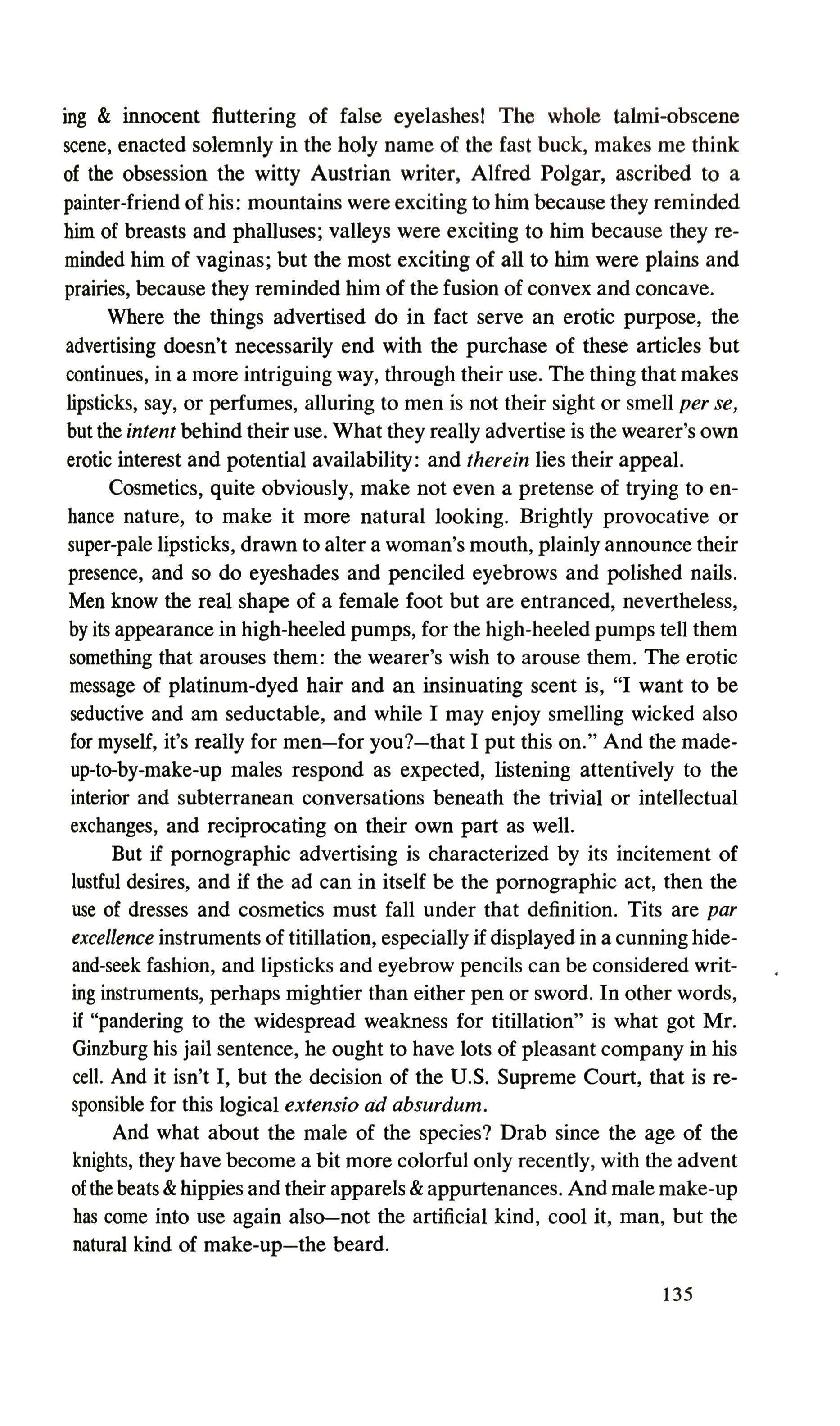
ing & innocent fluttering of false eyelashes! The whole talmi-obscene scene, enacted solemnly in the holy name of the fast buck, makes me think of the obsession the witty Austrian writer, Alfred Polgar, ascribed to a painter-friend of his: mountains were exciting to him because they reminded him of breasts and phalluses; valleys were exciting to him because they reminded him of vaginas; but the most exciting of all to hiln were plains and prairies, because they reminded hiln of the fusion of convex and concave.
Where the things advertised do in fact serve an erotic purpose, the advertising doesn't necessarily end with the purchase of these articles but continues, in a more intriguing way, through their use. The thing that makes lipsticks, say, or perfumes, alluring to men is not their sight or smell per se, but the intent behind their use. What they really advertise is the wearer's own erotic interest and potential availability: and therein lies their appeal.
Cosmetics, quite obviously, make not even a pretense of trying to enhance nature, to make it more natural looking. Brightly provocative or super-pale lipsticks, drawn to alter a woman's mouth, plainly announce their presence, and so do eyeshades and penciled eyebrows and polished nails. Men know the real shape of a female foot but are entranced, nevertheless, by its appearance in high-heeled pumps, for the high-heeled pumps tell them something that arouses them: the wearer's wish to arouse them. The erotic message of platinum-dyed hair and an insinuating scent is, "I want to be seductive and am seductable, and while I may enjoy smelling wicked also for myself, it's really for men for you? that I put this on." And the madeup-to-by-make-up males respond as expected, listening attentively to the interior and subterranean conversations beneath the trivial or intellectual exchanges, and reciprocating on their own part as well.
But if pornographic advertising is characterized by its incitement of lustful desires, and if the ad can in itself be the pornographic act, then the use of dresses and cosmetics must fall under that definition. Tits are par excellence instruments of titillation, especially if displayed in a cunning hideand-seek fashion, and lipsticks and eyebrow pencils can be considered writing instruments, perhaps mightier than either pen or sword. In other words, if "pandering to the widespread weakness for titillation" is what got Mr. Ginzburg his jail sentence, he ought to have lots of pleasant company in his cell. And it isn't I, but the decision of the U.S. Supreme Court, that is responsible for this logical extensio ad absurdum.
And what about the male of the species? Drab since the age of the knights, they have become a bit more colorful only recently, with the advent of the beats & hippies and their apparels & appurtenances. And male make-up has come into use again also-not the artificial kind, cool it, man, but the natural kind of make-up the beard.
135
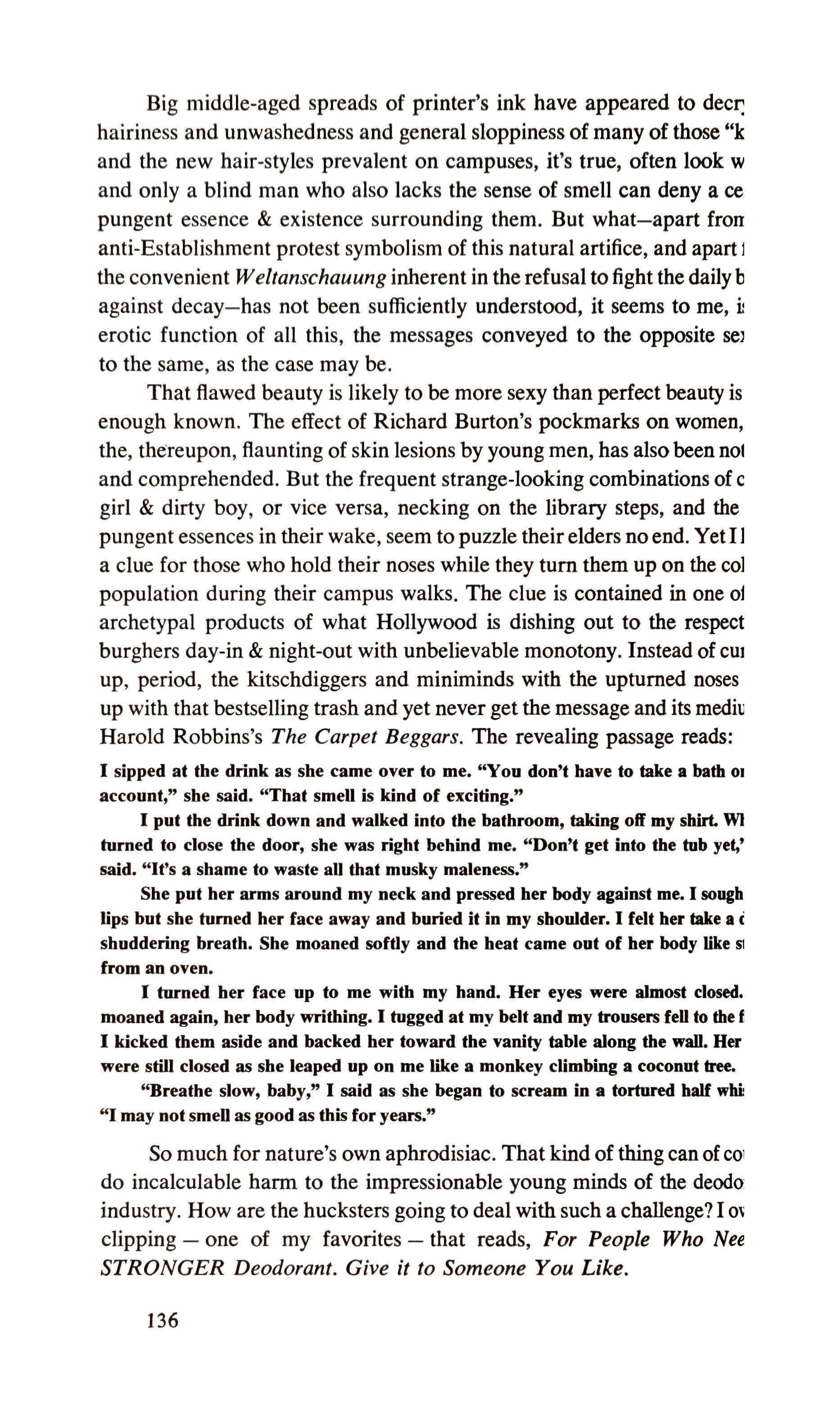
Big middle-aged spreads of printer's ink have appeared to deer hairiness and unwashedness and general sloppiness of many of those "k and the new hair-styles prevalent on campuses, it's true, often look w and only a blind man who also lacks the sense of smell can deny a ce pungent essence & existence surrounding them. But what apart fron anti-Establishment protest symbolism of this natural artifice, and apart j the convenient Weltanschauung inherent in the refusal to fight the dailyb against decay has not been sufficiently understood, it seems to me, � erotic function of all this, the messages conveyed to the opposite seJ to the same, as the case may be.
That flawed beauty is likely to be more sexy than perfect beauty is enough known. The effect of Richard Burton's pockmarks on women, the, thereupon, flaunting of skin lesions by young men, has also been not and comprehended. But the frequent strange-looking combinations of c girl & dirty boy, or vice versa, necking on the library steps, and the pungent essences in their wake, seem to puzzle their elders no end. YetII a clue for those who hold their noses while they tum them up on the col population during their campus walks. The clue is contained in one ol archetypal products of what Hollywood is dishing out to the respect burghers day-in & night-out with unbelievable monotony. Instead of CUI up, period, the kitschdiggers and miniminds with the upturned noses up with that bestselling trash and yet never get the message and its mediu Harold Robbins's The Carpet Beggars. The revealing passage reads: I sipped at the drink as she came over to me. "You don't have to take a bath 01 account," she said. "That smell is kind of exciting."
I put the drink down and walked into the bathroom, taking off my shirt. WI turned to close the door, she was right behind me. "Don't get into the tub yet,' said. "It's a shame to waste all that musky maleness."
She put her arms around my neck and pressed her body against me. I sougb lips but she turned her face away and buried it in my shoulder. I felt her take a ( shuddering breath. She moaned softly and the heat came out of her body like 51 from an oven.
I till lied her face up to me with my hand. Her eyes were almost closed. moaned again, her body writhing. I tugged at my belt and my trousers feD to the f I kicked them aside and backed her toward the vanity table along the wall. Her were still closed as she leaped up on me like a monkey climbing a coconut bee. "Breathe slow, baby," I said as she began to scream in a torlmed balf wid "I may not smeD as good as this for years."
So much for nature's own aphrodisiac. That kind of thing can of COl do incalculable harm to the impressionable young minds of the deodo industry. How are the hucksters going to deal with such a challenge? I O� clipping one of my favorites that reads, For People Who Nee STRONGER Deodorant. Give it to Someone You Like.
136
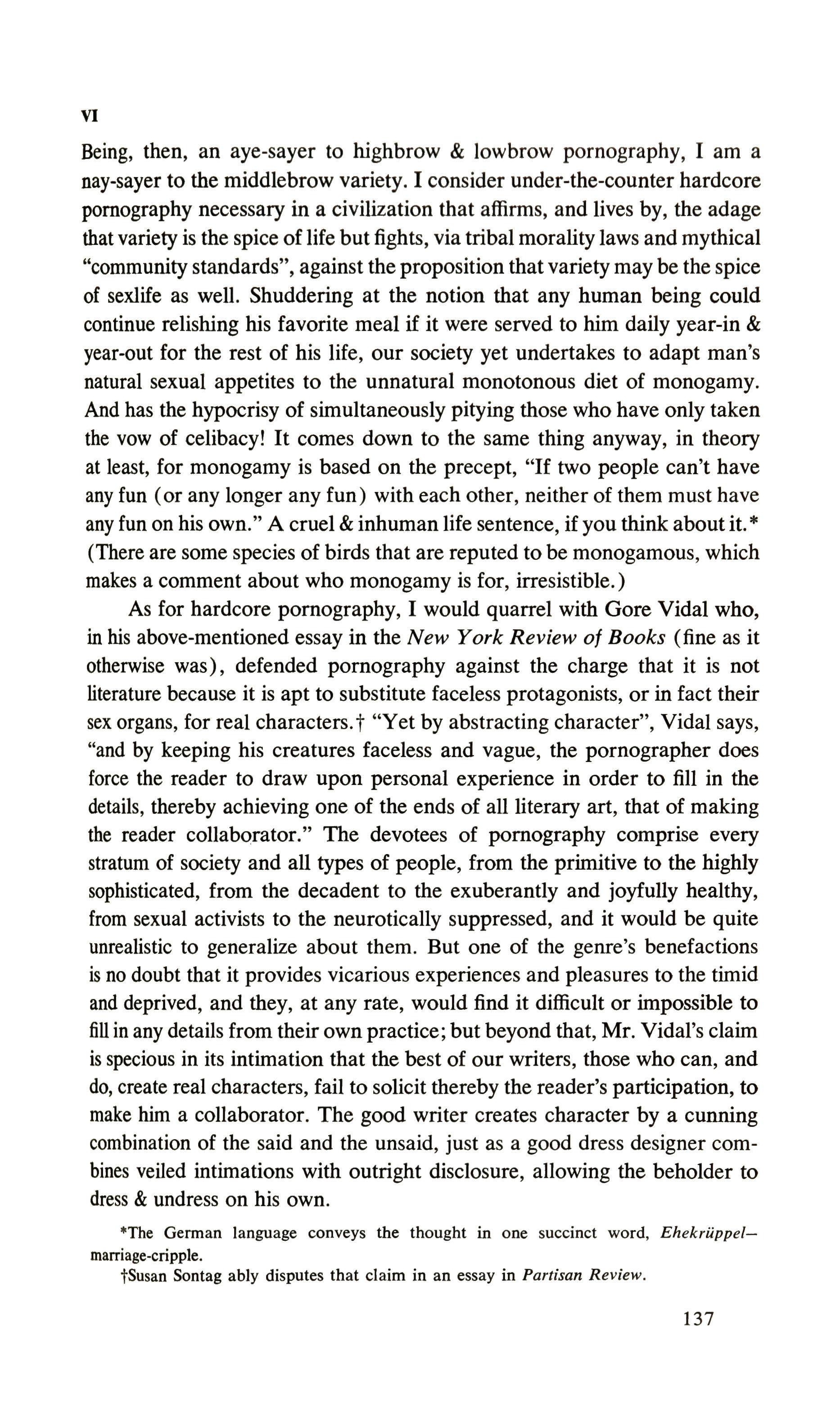
Being, then, an aye-sayer to highbrow & lowbrow pornography, I am a nay-sayer to the middlebrow variety. I consider under-the-counter hardcore pornography necessary in a civilization that affirms, and lives by, the adage that variety is the spice of life but fights, via tribal morality laws and mythical "community standards", against the proposition that variety may be the spice of sexlife as well. Shuddering at the notion that any human being could continue relishing his favorite meal if it were served to hilll daily year-in & year-out for the rest of his life, our society yet undertakes to adapt man's natural sexual appetites to the unnatural monotonous diet of monogamy. And has the hypocrisy of simultaneously pitying those who have only taken the vow of celibacy! It comes down to the same thing anyway, in theory at least, for monogamy is based on the precept, "If two people can't have any fun (or any longer any fun) with each other, neither of them must have any fun on his own." A cruel & inhuman life sentence, if you think about it. * (There are some species of birds that are reputed to be monogamous, which makes a comment about who monogamy is for, irresistible.)
As for hardcore pornography, I would quarrel with Gore Vidal who, in his above-mentioned essay in the New York Review of Books (fine as it otherwise was), defended pornography against the charge that it is not literature because it is apt to substitute faceless protagonists, or in fact their sex organs, for real characters.t "Yet by abstracting character", Vidal says, "and by keeping his creatures faceless and vague, the pornographer does force the reader to draw upon personal experience in order to fill in the details, thereby achieving one of the ends of all literary art, that of making the reader collaborator." The devotees of pornography comprise every stratum of society and all types of people, from the primitive to the highly sophisticated, from the decadent to the exuberantly and joyfully healthy, from sexual activists to the neurotically suppressed, and it would be quite unrealistic to generalize about them. But one of the genre's benefactions is no doubt that it provides vicarious experiences and pleasures to the timid and deprived, and they, at any rate, would find it difficult or impossible to fill in any details from their own practice; but beyond that, Mr. Vidal's claim is specious in its intimation that the best of our writers, those who can, and do, create real characters, fail to solicit thereby the reader's participation, to make him a collaborator. The good writer creates character by a cunning combination of the said and the unsaid, just as a good dress designer combines veiled intimations with outright disclosure, allowing the beholder to dress & undress on his own.
"'The German language conveys the thought in one succinct word, Ehekriippel= marriage-cripple.
+Susan Sontag ably disputes that claim in an essay in Partisan Review.
VI
137
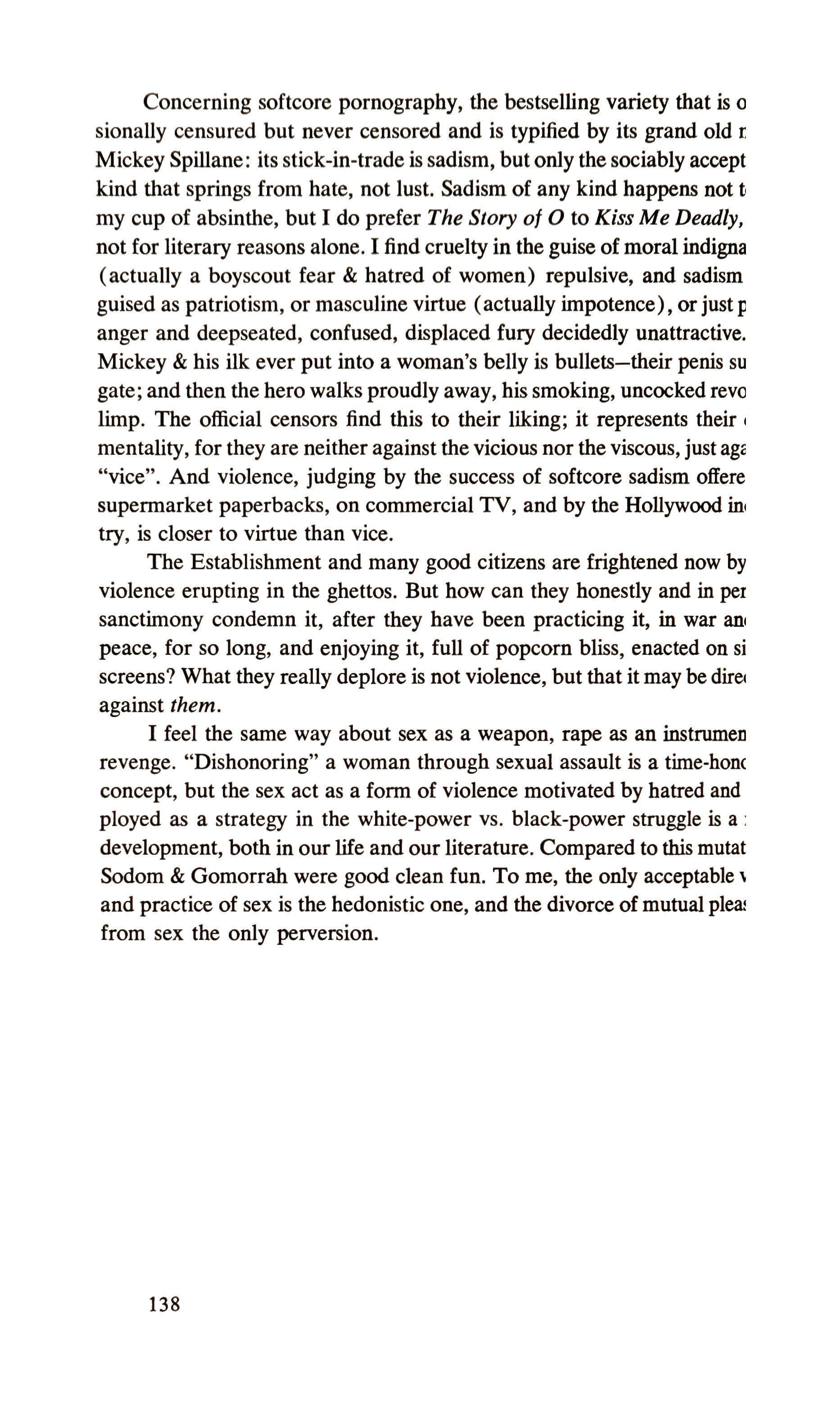
Concerning softcore pornography, the bestselling variety that is 0 sionally censured but never censored and is typified by its grand old r Mickey Spillane: its stick-in-trade is sadism, but only the sociably accept kind that springs from hate, not lust. Sadism of any kind happens not t my cup of absinthe, but I do prefer The Story of 0 to Kiss Me Deadly, not for literary reasons alone. I find cruelty in the guise of moral indigna (actually a boyscout fear & hatred of women) repulsive, and sadism guised as patriotism, or masculine virtue (actually impotence), or just J1 anger and deepseated, confused, displaced fury decidedly unattractive. Mickey & his ilk ever put into a woman's belly is bullets their penis su gate; and then the hero walks proudly away, his smoking, uncocked revo limp. The official censors find this to their liking; it represents their I mentality, for they are neither against the vicious nor the viscous, just ags "vice". And violence, judging by the success of softcore sadism offere supermarket paperbacks, on commercial TV, and by the Hollywood im try, is closer to virtue than vice.
The Establishment and many good citizens are frightened now by violence erupting in the ghettos. But how can they honestly and in pel sanctimony condemn it, after they have been practicing it, in war ani peace, for so long, and enjoying it, full of popcorn bliss, enacted on si screens? What they really deplore is not violence, but that it may be dire against them.
I feel the sa me way about sex as a weapon, rape as an instrumen revenge. "Dishonoring" a woman through sexual assault is a time-hone concept, but the sex act as a form of violence motivated by hatred and ployed as a strategy in the white-power vs. black-power struggle is a development, both in our life and our literature. Compared to this mutat Sodom & Gomorrah were good clean fun. To me, the only acceptable \ and practice of sex is the hedonistic one, and the divorce of mutual plea from sex the only perversion.
138
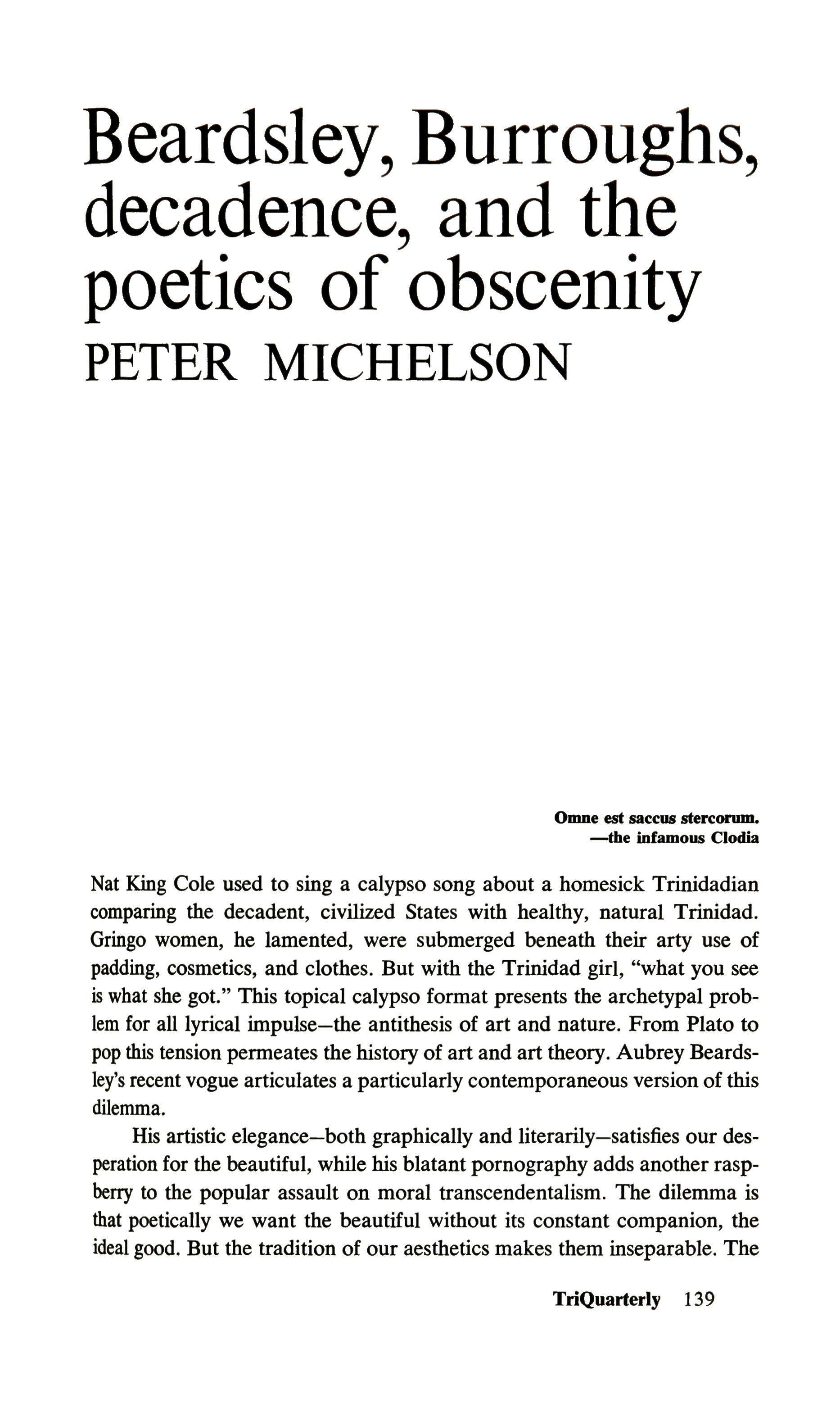
OlllDe est saccus stercorum. -the
Nat King Cole used to sing a calypso song about a homesick Trinidadian comparing the decadent, civilized States with healthy, natural Trinidad. Gringo women, he lamented, were submerged beneath their arty use of padding, cosmetics, and clothes. But with the Trinidad girl, "what you see is what she got." This topical calypso format presents the archetypal problem for all lyrical impulse the antithesis of art and nature. From Plato to pop this tension permeates the history of art and art theory. Aubrey Beardsley's recent vogue articulates a particularly contemporaneous version of this dilemma.
His artistic elegance both graphically and literarily satisfies our desperation for the beautiful, while his blatant pornography adds another raspberry to the popular assault on moral transcendentalism. The dilemma is that poetically we want the beautiful without its constant companion, the ideal good. But the tradition of our aesthetics makes them inseparable. The
TriQuarterly 139
• •
infamous Clodia
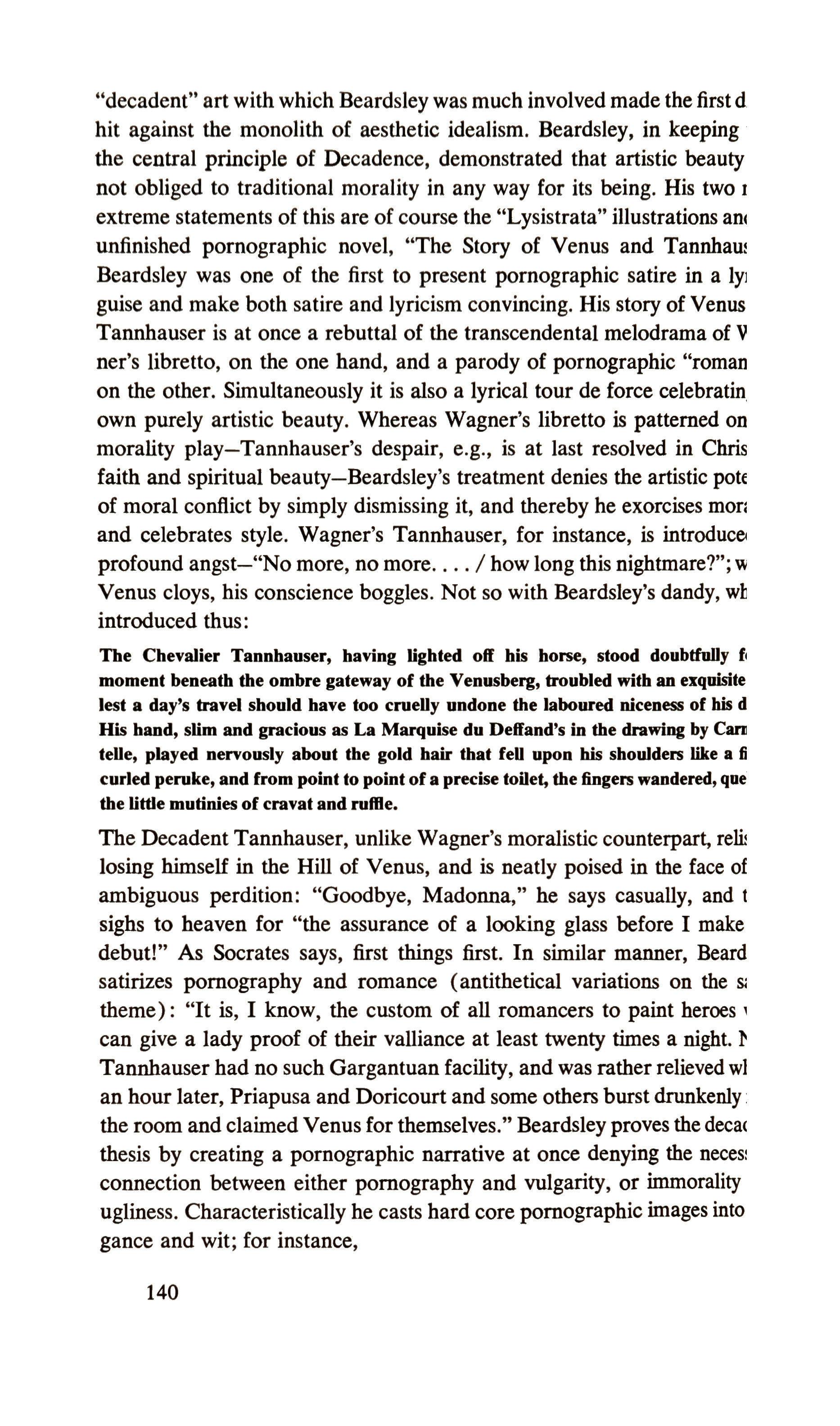
"decadent" art with which Beardsley was much involved made the first d. hit against the monolith of aesthetic idealism. Beardsley, in keeping the central principle of Decadence, demonstrated that artistic beauty not obliged to traditional morality in any way for its being. His two J extreme statements of this are of course the "Lysistrata' illustrations an4 unfinished pornographic novel, "The Story of Venus and Tannhaui Beardsley was one of the first to present pornographic satire in a lyl guise and make both satire and lyricism convincing. His story of Venus Tannhauser is at once a rebuttal of the transcendental melodrama of V ner's libretto, on the one hand, and a parody of pornographic "roman on the other. Simultaneously it is also a lyrical tour de force celebratin own purely artistic beauty. Whereas Wagner's libretto is patterned on morality play Tannhauser's despair, e.g., is at last resolved in Chris faith and spiritual beauty Beardsley's treatment denies the artistic pote of moral conflict by simply dismissing it, and thereby he exorcises mon and celebrates style. Wagner's Tannhauser, for instance, is introduce profound angst "No more, no more / how long this nightmare?"; w Venus cloys, his conscience boggles. Not so with Beardsley's dandy, wh introduced thus:
The Chevalier Tannhauser, having lighted off his horse, stood doubtf lly fl moment beneath the ombre gateway of the Venusberg, troubled with an exquisite lest a day's travel should have too cruelly undone the laboured niceness of his d His hand, slim and gracious as La Marquise du Deffand's in the drawing by Can telle, played nervously about the gold bair that fell upon his shoulders like a Ii curled peruke, and from point to point of a p.eclse toDet, the fingers wandered, que the little mutinies of cravat and ruffle.
The Decadent Tannhauser, unlike Wagner's moralistic counterpart, relf losing himself in the Hill of Venus, and is neatly poised in the face of ambiguous perdition: "Goodbye, Madonna," he says casually, and t sighs to heaven for "the assurance of a looking glass before I make debut!" As Socrates says, first things first. In similar manner, Beard satirizes pornography and romance (antithetical variations on the Sl theme): "It is, I know, the custom of all romancers to paint heroes 1 can give a lady proof of their valliance at least twenty times a night. JI Tannhauser had no such Gargantuan facility, and was rather relieved wI an hour later, Priapusa and Doricourt and some others burst drunkenly: the room and claimed Venus for themselves." Beardsley proves the decar thesis by creating a pornographic na I rative at once denying the neces connection between either pornography and vulgarity, or immorality ugliness. Characteristically he casts hard core pornographic images into gance and wit; for instance,
140
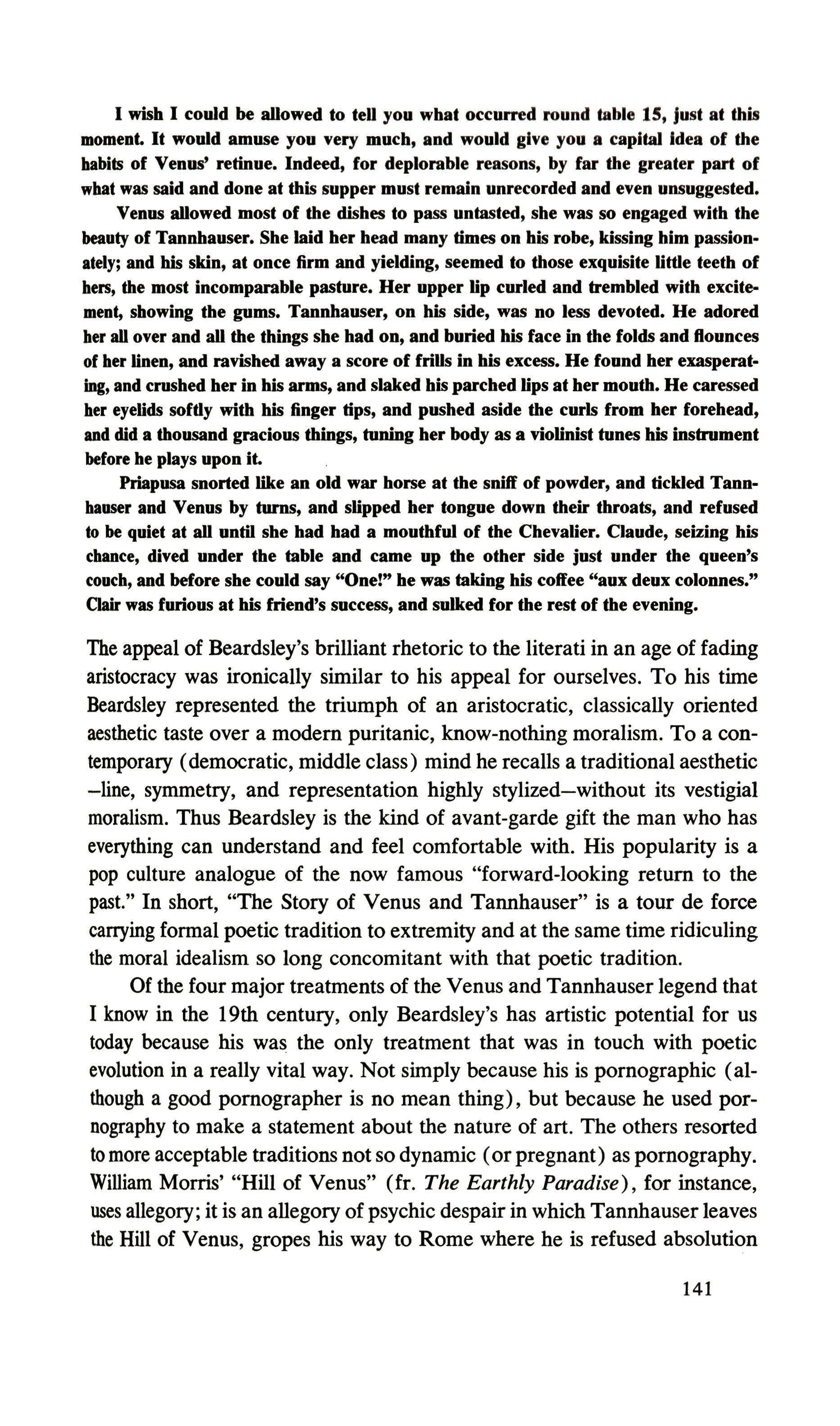
I wish I could be allowed to teU you what eccurred round table 15, Just at this moment. It would amuse you very much, and would give you a capital Idea of the babits of Venus' retinue. Indeed, for deplorable reasons, by far the greater part of what was said and done at this supper must remain unrecorded and even unsuggested. Venus allowed most of the dishes to pass untasted, she was so engaged with the beauty of Tannhallser. She laid her head many times on his robe, kissing him passionately; and his skin, at once firm and yielding, seemed to those exquisite Uttle teeth of hers, the most incomparable pasture. Her upper Up curled and trembled with excitement, showing the gums. Tannhauser, on his side, was no less devoted. He adored her all over and all the things she had on, and buried his face in the folds and flounces of her Unen, and ravished away a score of friUs in his excess. He found her exasperating, and crushed her in his 81°UIS, and slaked his parched Ups at her mouth. He caressed her eyelids softly with his finger tips, and pushed aside the curls from her forehead, and did a thousand gracious things, 'lining her body as a violinist tunes his instrument before he plays upon it.
Priapusa snorted like an old war horse at the sniff of powder, and tickled Tannbauser and Venns by hllollS, and slipped her tongue down their throats, and refused to be quiet at all until she had had a mouthful of the Chevalier. Claude, seizing his chance, dived under the table and came up the other side just under the queen's coucb, and before she could say "One!" he was taking his coffee "aux deux coloones." Clair was furious at his friend's success, and slilked for the rest of the evening.
The appeal of Beardsley's brilliant rhetoric to the literati in an age of fading aristocracy was ironically similar to his appeal for ourselves. To his time Beardsley represented the triumph of an aristocratic, classically oriented aesthetic taste over a modem puritanic, know-nothing moralism. To a contemporary (democratic, middle class) mind he recalls a traditional aesthetic -line, symmetry, and representation highly stylized without its vestigial moralism. Thus Beardsley is the kind of avant-garde gift the man who has everything can understand and feel comfortable with. His popularity is a pop culture analogue of the now famous "forward-looking return to the past." In short, "The Story of Venus and Tannhauser" is a tour de force carrying formal poetic tradition to extremity and at the same time ridiculing the moral idealism so long concomitant with that poetic tradition.
Of the four major treatments of the Venus and Tannhauser legend that I know in the 19th century, only Beardsley's has artistic potential for us today because his was the only treatment that was in touch with poetic evolution in a really vital way. Not simply because his is pornographic (although a good pornographer is no mean thing), but because he used pornography to make a statement about the nature of art. The others resorted to more acceptable traditions not so dynamic (orpregnant) as pornography. William Morris' "Hill of Venus" (fr. The Earthly Paradise), for instance, uses allegory; it is an allegory of psychic despair in which Tannhauser leaves the Hill of Venus, gropes his way to Rome where he is refused absolution
141
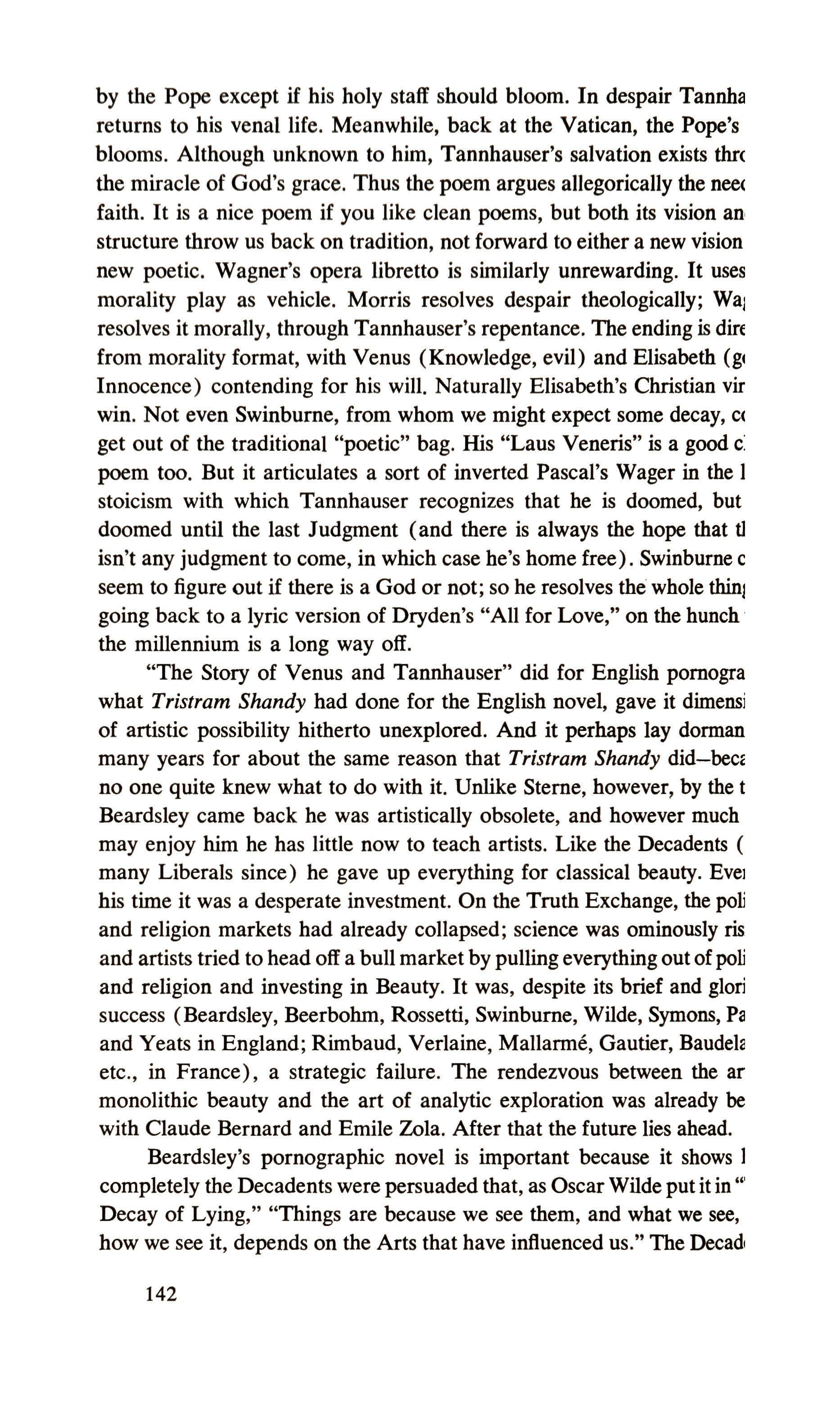
by the Pope except if his holy staff should bloom. In despair Tannha returns to his venal life. Meanwhile, back at the Vatican, the Pope's blooms. Although unknown to him, Tannhauser's salvation exists thn the miracle of God's grace. Thus the poem argues allegorically the neee faith. It is a nice poem if you like clean poems, but both its vision an, structure throw us back on tradition, not forward to either a new vision new poetic. Wagner's opera libretto is similarly unrewarding. It uses morality playas vehicle. Morris resolves despair theologically; Waj resolves it morally, through Tannhauser's repentance. The ending is dire from morality format, with Venus (Knowledge, evil) and Elisabeth (g4 Innocence) contending for his will. Naturally Elisabeth's Christian vir win. Not even Swinburne, from whom we might expect some decay, c( get out of the traditional "poetic" bag. His "Laus Veneris" is a good c poem too. But it articulates a sort of inverted Pascal's Wager in the I stoicism with which Tannhauser recognizes that he is doomed, but doomed until the last Judgment (and there is always the hope that tI isn't any judgment to come, in which case he's home free). Swinburne c seem to figure out if there is a God or not; so he resolves the whole thin, going back to a lyric version of Dryden's "All for Love," on the hunch the millennium is a long way off.
"The Story of Venus and Tannhauser" did for English pornogra what Tristram Shandy had done for the English novel, gave it dimensi of artistic possibility hitherto unexplored. And it perhaps lay dorman many years for about the same reason that Tristram Shandy did bece no one quite knew what to do with it. Unlike Sterne, however, by the t Beardsley came back he was artistically obsolete, and however much may enjoy hiIn he has little now to teach artists. Like the Decadents ( many Liberals since) he gave up everything for classical beauty. Eve] his time it was a desperate investment. On the Truth Exchange, the pof and religion markets had already collapsed; science was ominously ris and artists tried to head off a bull market bypullingeverything out ofpoli and religion and investing in Beauty. It was, despite its brief and glori success (Beardsley, Beerbohm, Rossetti, Swinburne, Wilde, Symons, Pa and Yeats in England; Rimbaud, Verlaine, Mallarme, Gautier, Baudela etc., in France), a strategic failure. The rendezvous between the ar monolithic beauty and the art of analytic exploration was already be with Claude Bernard and Emile Zola. After that the future lies ahead. Beardsley's pornographic novel is important because it shows I completely the Decadents were persuaded that, as Oscar Wilde put it in Decay of Lying," "Things are because we see them, and what we see, how we see it, depends on the Arts that have influenced us." The Decad
142
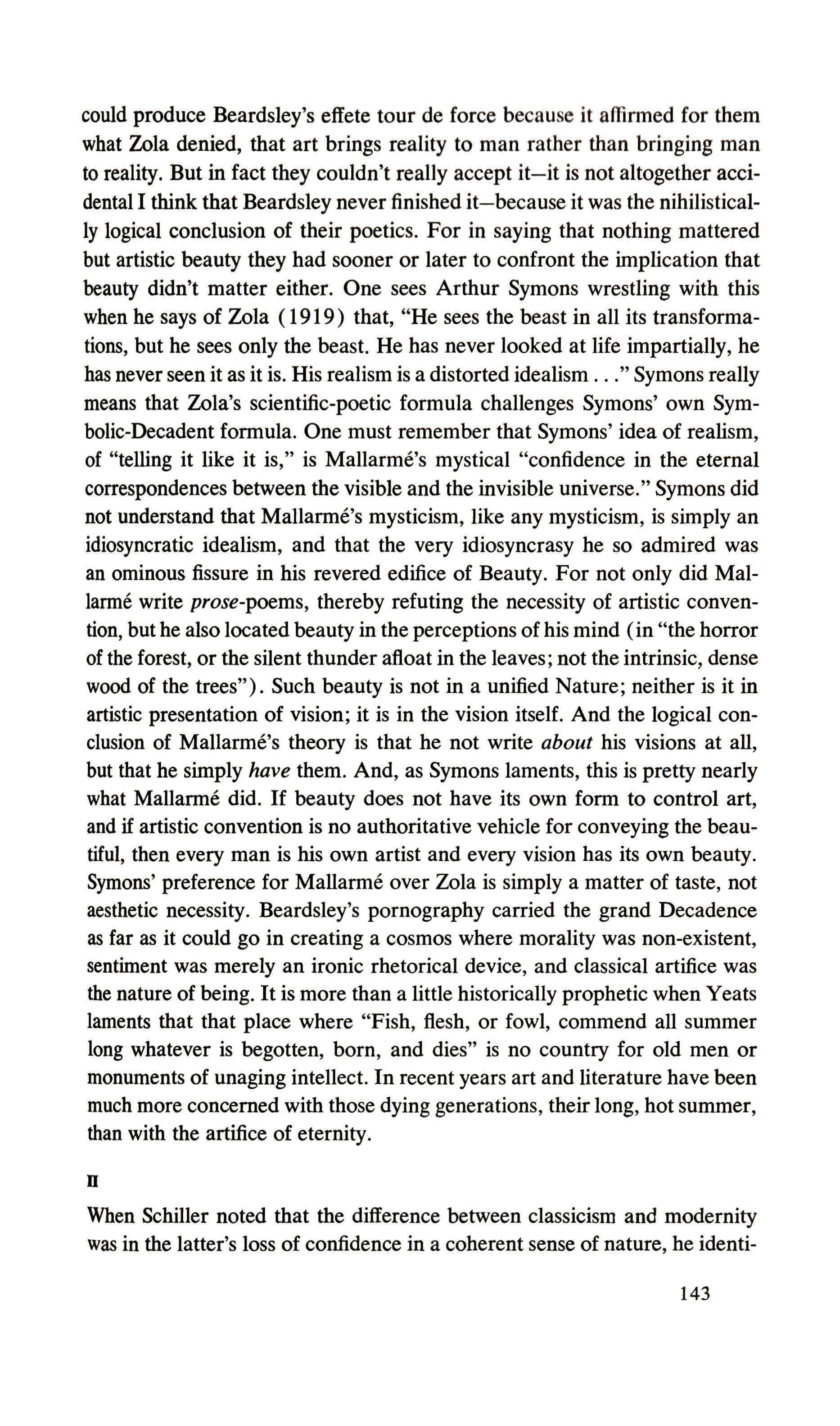
could produce Beardsley's effete tour de force because it affirmed for them what Zola denied, that art brings reality to man rather than bringing man to reality. But in fact they couldn't really accept it it is not altogether accidental I think that Beardsley never finished it because it was the nihilisticalIy logical conclusion of their poetics. For in saying that nothing mattered but artistic beauty they had sooner or later to confront the implication that beauty didn't matter either. One sees Arthur Symons wrestling with this when he says of Zola (1919) that, "He sees the beast in all its transformations, but he sees only the beast. He has never looked at life impartially, he has never seen it as it is. His realism is a distorted idealism " Symons really means that Zola's scientific-poetic formula challenges Symons' own Symbolic-Decadent formula. One must remember that Symons' idea of realism, of "telling it like it is," is Mallarme's mystical "confidence in the eternal correspondences between the visible and the invisible universe." Symons did not understand that Mallarme's mysticism, like any mysticism, is simply an idiosyncratic idealism, and that the very idiosyncrasy he so admired was an ominous fissure in his revered edifice of Beauty. For not only did Mallarme write prose-poems, thereby refuting the necessity of artistic convention, but he also located beauty in the perceptions of his mind (in "the horror of the forest, or the silent thunder afloat in the leaves; not the intrinsic, dense wood of the trees"). Such beauty is not in a unified Nature; neither is it in artistic presentation of vision; it is in the vision itself. And the logical conclusion of Mallarme's theory is that he not write about his visions at all, but that he simply have them. And, as Symons laments, this is pretty nearly what Mallarme did. If beauty does not have its own form to control art, and if artistic convention is no authoritative vehicle for conveying the beautiful, then every man is his own artist and every vision has its own beauty. Symons' preference for Mallarme over Zola is simply a matter of taste, not aesthetic necessity. Beardsley's pornography carried the grand Decadence as far as it could go in creating a cosmos where morality was non-existent, sentiment was merely an ironic rhetorical device, and classical artifice was the nature of being. It is more than a little historically prophetic when Yeats laments that that place where "Fish, flesh, or fowl, commend all summer long whatever is begotten, born, and dies" is no country for old men or monuments of unaging intellect. In recent years art and literature have been much more concerned with those dying generations, their long, hot summer, than with the artifice of eternity.
D
When Schiller noted that the difference between classicism and modernity was in the latter's loss of confidence in a coherent sense of nature, he identi-
143
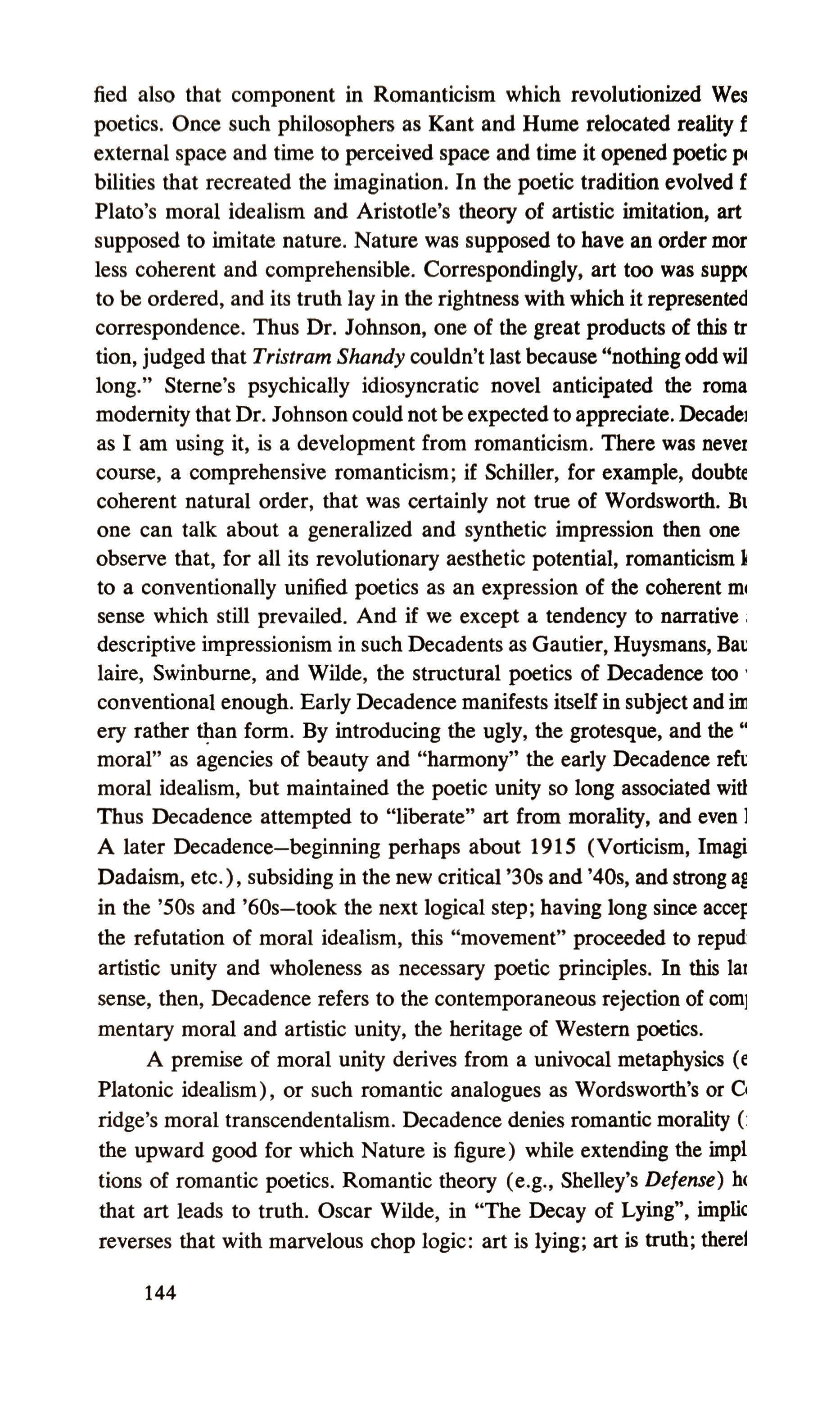
tied also that component in Romanticism which revolutionized Wes poetics. Once such philosophers as Kant and Hume relocated reality f external space and time to perceived space and time it opened poetic p� bilities that recreated the imagination. In the poetic tradition evolved f Plato's moral idealism and Aristotle's theory of artistic imitation, art supposed to imitate nature. Nature was supposed to have an order mor less coherent and comprehensible. Correspondingly, art too was supp to be ordered, and its truth lay in the rightness with which it represented correspondence. Thus Dr. Johnson, one of the great products of this tr tion, judged that Tristram Shandy couldn't last because "nothing odd wil long." Sterne's psychically idiosyncratic novel anticipated the roma modernity that Dr. Johnson could not be expected to appreciate. Decade] as I aln using it, is a development from romanticism. There was never course, a comprehensive romanticism; if Schiller, for example, doubte coherent natural order, that was certainly not true of Wordsworth. Bi one can talk about a generalized and synthetic impression then one observe that, for all its revolutionary aesthetic potential, romanticism I to a conventionally unified poetics as an expression of the coherent m� sense which still prevailed. And if we except a tendency to narrative descriptive impressionism in such Decadents as Gautier, Huysmans, Bat: laire, Swinburne, and Wilde, the structural poetics of Decadence too conventional enough. Early Decadence manifests itself in subject and im ery rather than fOIIn. By introducing the ugly, the grotesque, and the moral" as agencies of beauty and "harmony' the early Decadence reft moral idealism, but maintained the poetic unity so long associated witl Thus Decadence attempted to "liberate" art from morality, and even 1 A later Decadence beginning perhaps about 1915 (Vorticism,Imagi Dadaism, etc.), subsiding in the new critical '30s and'40s, and strong a� in the '50s and '60s took the next logical step; having long since accej the refutation of moral idealism, this "movement" proceeded to repud artistic unity and wholeness as necessary poetic principles. In this lat sense, then, Decadence refers to the contemporaneous rejection of com] mentary moral and artistic unity, the heritage of Western poetics. A premise of moral unity derives from a univocal metaphysics (e Platonic idealism), or such romantic analogues as Wordsworth's or CI ridge's moral transcendentalism. Decadence denies romantic morality ( the upward good for which Nature is figure) while extending the impl tions of romantic poetics. Romantic theory (e.g., Shelley's Defense) h( that art leads to truth. Oscar Wilde, in "The Decay of Lying", implic reverses that with marvelous chop logic: art is lying; art is truth; therel
144
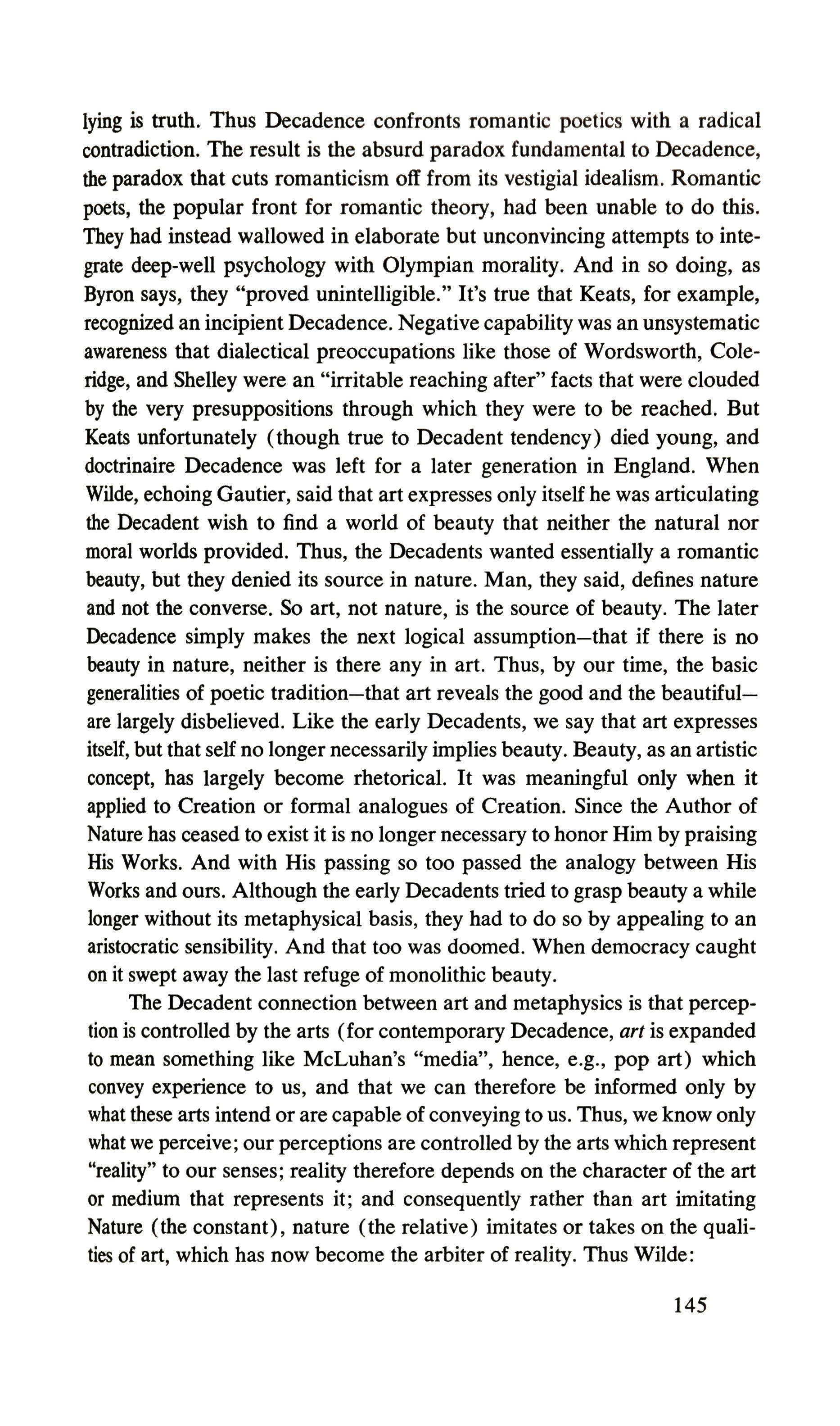
lying is truth. Thus Decadence confronts romantic poetics with a radical contradiction. The result is the absurd paradox fundamental to Decadence, the paradox that cuts romanticism off from its vestigial idealism. Romantic poets, the popular front for romantic theory, had been unable to do this. They had instead wallowed in elaborate but unconvincing attempts to integrate deep-well psychology with Olympian morality. And in so doing, as Byron says, they "proved unintelligible." It's true that Keats, for example, recognized an incipient Decadence. Negative capability was an unsystematic awareness that dialectical preoccupations like those of Wordsworth, Coleridge, and Shelley were an "irritable reaching after" facts that were clouded by the very presuppositions through which they were to be reached. But Keats unfortunately (though true to Decadent tendency) died young, and doctrinaire Decadence was left for a later generation in England. When Wilde, echoing Gautier, said that art expresses only itself he was articulating the Decadent wish to find a world of beauty that neither the natural nor moral worlds provided. Thus, the Decadents wanted essentially a romantic beauty, but they denied its source in nature. Man, they said, defines nature and not the converse. So art, not nature, is the source of beauty. The later Decadence simply makes the next logical assumption that if there is no beauty in nature, neither is there any in art. Thus, by our time, the basic generalities of poetic tradition that art reveals the good and the beautifulare largely disbelieved. Like the early Decadents, we say that art expresses itself, but that self no longer necessarily implies beauty. Beauty, as an artistic concept, has largely become rhetorical. It was meaningful only when it applied to Creation or formal analogues of Creation. Since the Author of Nature has ceased to exist it is no longer necessary to honor Him by praising His Works. And with His passing so too passed the analogy between His Works and ours. Although the early Decadents tried to grasp beauty a while longer without its metaphysical basis, they had to do so by appealing to an aristocratic sensibility. And that too was doomed. When democracy caught on it swept away the last refuge of monolithic beauty.
The Decadent connection between art and metaphysics is that perception is controlled by the arts (for contemporary Decadence, art is expanded to mean something like McLuhan's "media", hence, e.g., pop art) which convey experience to us, and that we can therefore be informed only by what these arts intend or are capable of conveying to us. Thus, we know only what we perceive; our perceptions are controlled by the arts which represent "reality" to our senses; reality therefore depends on the character of the art or medium that represents it; and consequently rather than art imitating Nature (the constant), nature (the relative) imitates or takes on the qualities of art, which has now become the arbiter of reality. Thus Wilde:
145
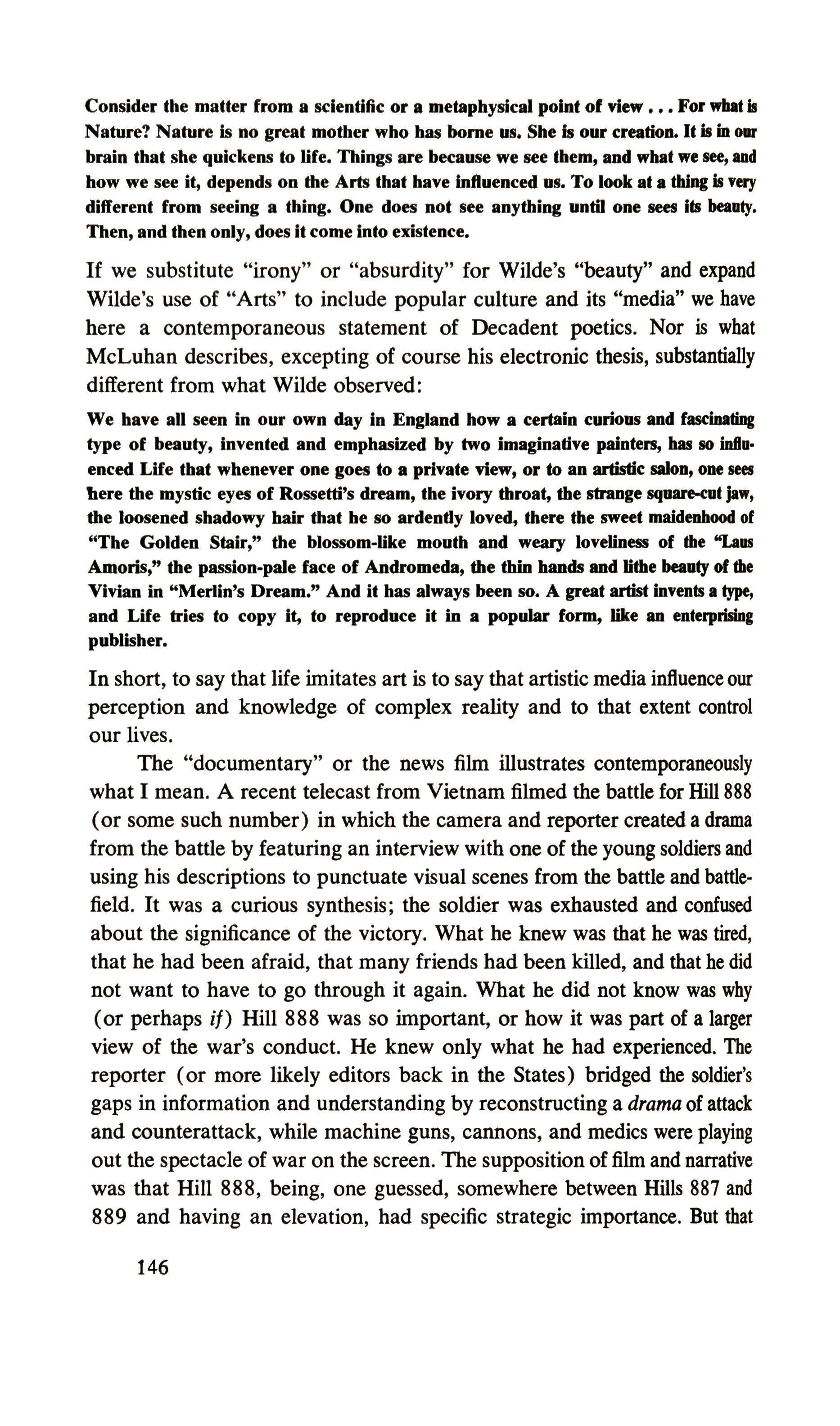
Consider the matter from a scientific or a metaphysical point of view For what is Nature? Nature is no great mother who has borne us. She is our creation. It is in our brain that she quickens to life. Things are becaase we see them, and what we see, and how we see it, depends on the Arts that have inftuenced ns. To look at a thing is very different from seeing a thing. One does not see anything until one sees its beauty. Then, and then only, does it come into existence.
If we substitute "irony" or "absurdity" for Wilde's "beauty" and expand Wilde's use of "Arts" to include popular culture and its "media" we have here a contemporaneous statement of Decadent poetics. Nor is what McLuhan describes, excepting of course his electronic thesis, substantially different from what Wilde observed:
We have all seen in our own day in England how a certain curlens and fascioatiDg type of beauty, invented and emphasized by two imaginative painten, has so infIu· enced Life that whenever one goes to a private view, or to an "'istic salon, one sees here the mystic eyes of Rossetti's dream, the ivory throat, the sbange squ8ie cut jaw, the loosened shadowy hair that he so ardently loved, there the sweet maidenhood of "The Golden Stair," the blossom-like mouth and weary 10veBness of the "Laos Amoris," the passion-pale face of Andromeda, the thin hands and Bthe beauty of the Vivian in "Memn's Dream." And it has always been so. A great artist invents a type, and Life tries to copy it, to reproduce it in a popillar forlll, like an enterprisiug publisher.
In short, to say that life imitates art is to say that artistic media influence our perception and knowledge of complex reality and to that extent control our lives.
The "documentary" or the news film illustrates contemporaneously what I mean. A recent telecast from Vietnam filmed the battle for Hill 888 (or some such number) in which the camera and reporter created a drama from the battle by featuring an interview with one of the young soldiers and using his descriptions to punctuate visual scenes from the battle and battlefield. It was a curious synthesis; the soldier was exhausted and confused about the significance of the victory. What he knew was that he was tired, that he had been afraid, that many friends had been killed, and that he did not want to have to go through it again. What he did not know was why (or perhaps if) Hill 888 was so important, or how it was part of a larger view of the war's conduct. He knew only what he had experienced. The reporter (or more likely editors back in the States) bridged the soldier's gaps in information and understanding by reconstructing a drama of attack and counterattack, while machine guns, cannons, and medics were playing out the spectacle of war on the screen. The supposition of film and narrative was that Hill 888, being, one guessed, somewhere between Hills 887 and 889 and having an elevation, had specific strategic importance. But that
146
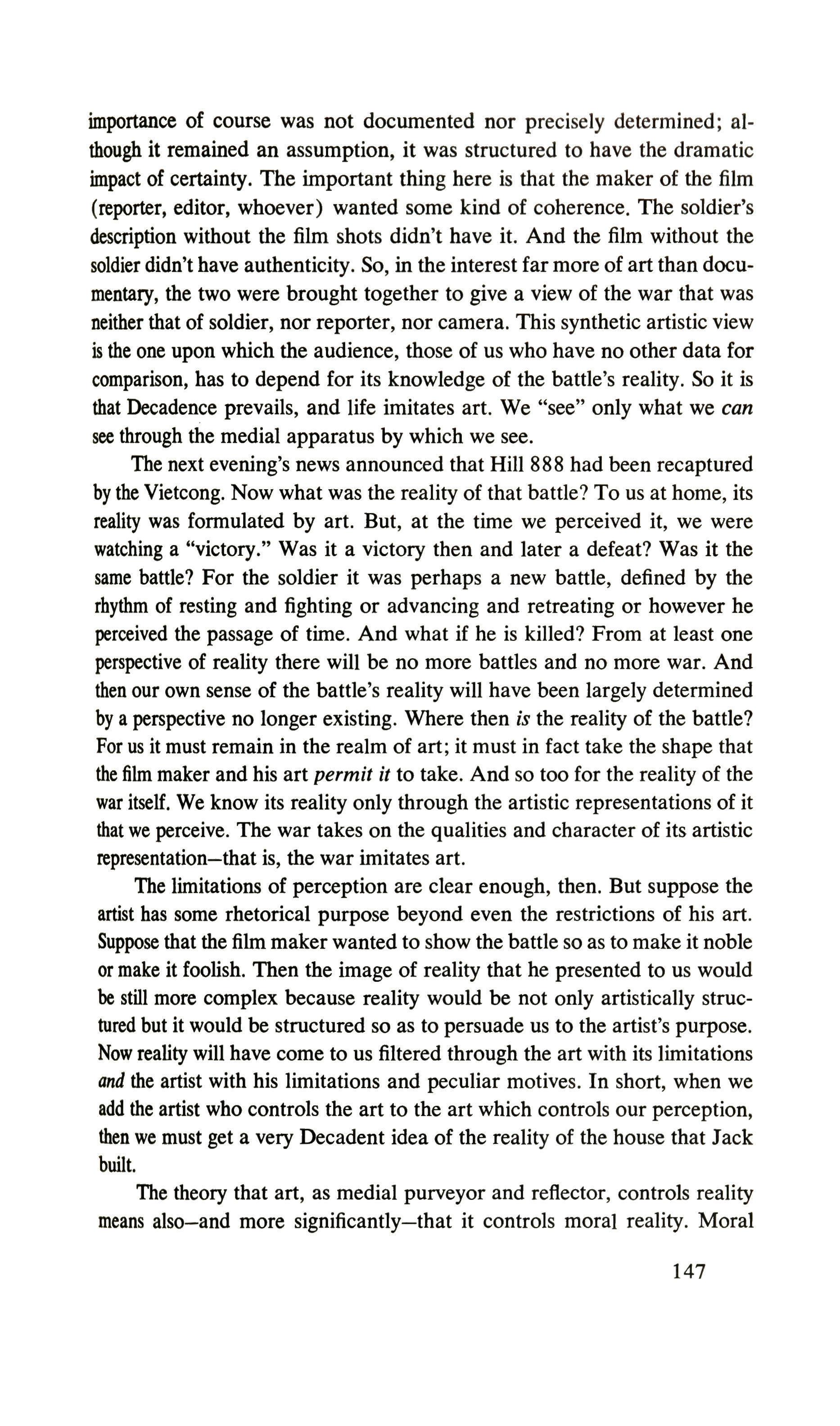
importance of course was not documented nor precisely determined; although it remained an assumption, it was structured to have the dramatic impact of certainty. The important thing here is that the maker of the film (reporter, editor, whoever) wanted some kind of coherence. The soldier's description without the film shots didn't have it. And the film without the soldier didn't have authenticity. So, in the interest far more of art than documentary, the two were brought together to give a view of the war that was neither that of soldier, nor reporter, nor camera. This synthetic artistic view is the one upon which the audience, those of us who have no other data for comparison, has to depend for its knowledge of the battle's reality. So it is that Decadence prevails, and life imitates art. We "see" only what we can see through the medial apparatus by which we see.
The next evening's news announced that Hill 888 had been recaptured by the Vietcong. Now what was the reality of that battle? To us at home, its reality was formulated by art. But, at the time we perceived it, we were watching a "victory." Was it a victory then and later a defeat? Was it the same battle? For the soldier it was perhaps a new battle, defined by the rhythm of resting and fighting or advancing and retreating or however he perceived the passage of time. And what if he is killed? From at least one perspective of reality there will be no more battles and no more war. And then our own sense of the battle's reality will have been largely determined by a perspective no longer existing. Where then is the reality of the battle? For us it must remain in the realm of art; it must in fact take the shape that the film maker and his art permit it to take. And so too for the reality of the war itself. We know its reality only through the artistic representations of it that we perceive. The war takes on the qualities and character of its artistic representation that is, the war imitates art.
The limitations of perception are clear enough, then. But suppose the artist has some rhetorical purpose beyond even the restrictions of his art. Suppose that the film maker wanted to show the battle so as to make it noble or make it foolish. Then the image of reality that he presented to us would be still more complex because reality would be not only artistically structured but it would be structured so as to persuade us to the artist's purpose. Now reality will have come to us filtered through the art with its limitations and the artist with his limitations and peculiar motives. In short, when we add the artist who controls the art to the art which controls our perception, then we must get a very Decadent idea of the reality of the house that Jack built.
The theory that art, as medial purveyor and reflector, controls reality means also-and more significantly that it controls moral reality. Moral
147
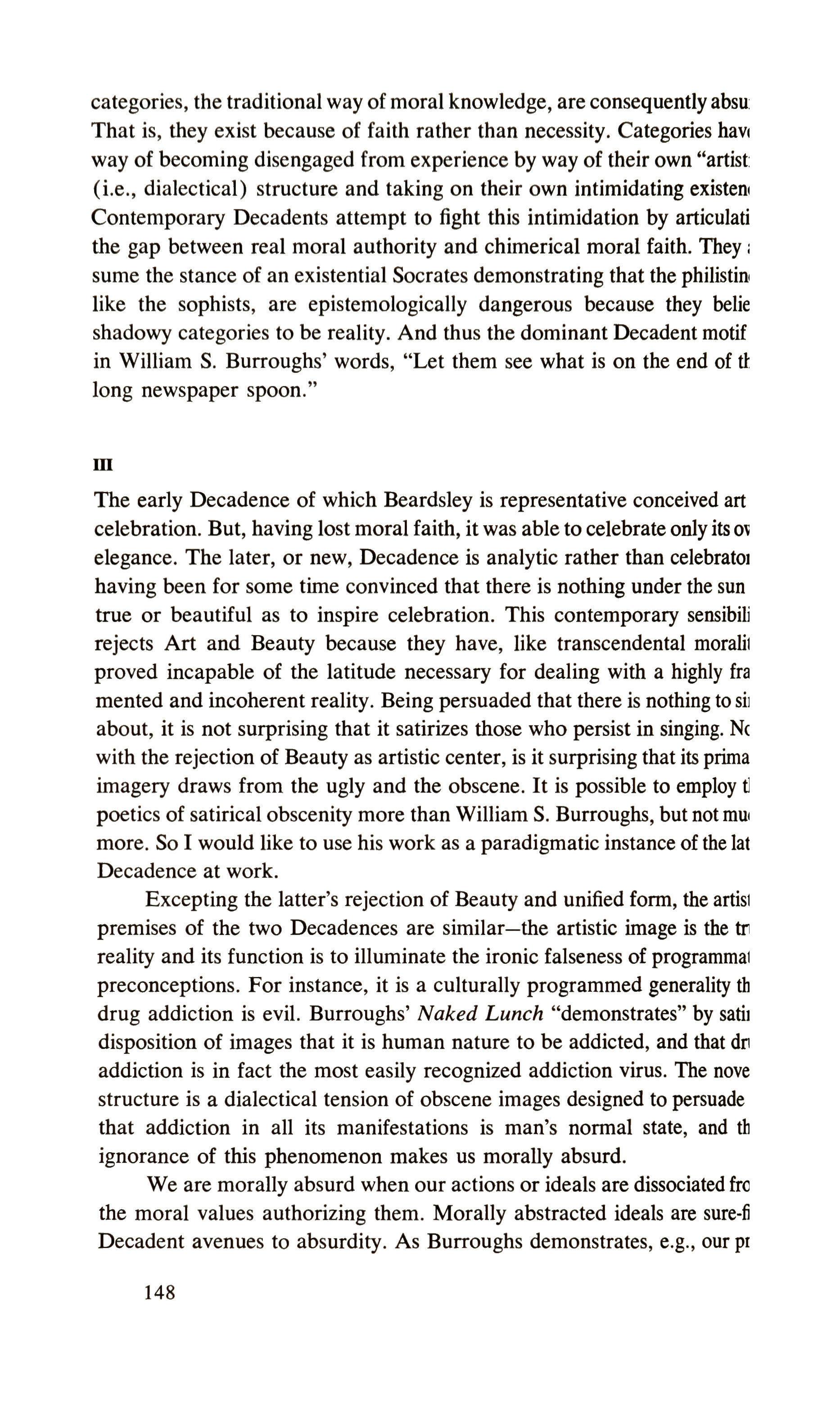
categories, the traditional way of moral knowledge, are consequently absu That is, they exist because of faith rather than necessity. Categories haw way of becoming disengaged from experience by way of their own "artist (i.e., dialectical) structure and taking on their own intimidating existen Contemporary Decadents attempt to fight this intimidation by articulati the gap between real moral authority and chimerical moral faith. They; sume the stance of an existential Socrates demonstrating that the philistin like the sophists, are epistemologically dangerous because they belie shadowy categories to be reality. And thus the dominant Decadent motif in William S. Burroughs' words, "Let them see what is on the end of tl long newspaper spoon."
ill
The early Decadence of which Beardsley is representative conceived art celebration. But, having lost moral faith, it was able to celebrate only its 0'1 elegance. The later, or new, Decadence is analytic rather than celebrator having been for some time convinced that there is nothing under the sun true or beautiful as to inspire celebration. This contemporary sensibili rejects Art and Beauty because they have, like transcendental moraln proved incapable of the latitude necessary for dealing with a highly fra mented and incoherent reality. Being persuaded that there is nothing to sh about, it is not surprising that it satirizes those who persist in singing. N( with the rejection of Beauty as artistic center, is it surprising that its prima imagery draws from the ugly and the obscene. It is possible to employ � poetics of satirical obscenity more than William S. Burroughs, but not mUI more. So I would like to use his work as a paradigmatic instance of the lat Decadence at work.
Excepting the latter's rejection of Beauty and unified form, the artisi premises of the two Decadences are similar the artistic image is the tn reality and its function is to illuminate the ironic falseness of programmai preconceptions. For instance, it is a culturally programmed generality tb drug addiction is evil. Burroughs' Naked Lunch "demonstrates" by satit disposition of images that it is human nature to be addicted, and that dn addiction is in fact the most easily recognized addiction virus. The nove structure is a dialectical tension of obscene images designed to persuade that addiction in all its manifestations is man's normal state, and tb ignorance of this phenomenon makes us morally absurd. We are morally absurd when our actions or ideals are dissociated fro the moral values authorizing them. Morally abstracted ideals are sure-fi Decadent avenues to absurdity. As Burroughs demonstrates, e.g., our pI
148
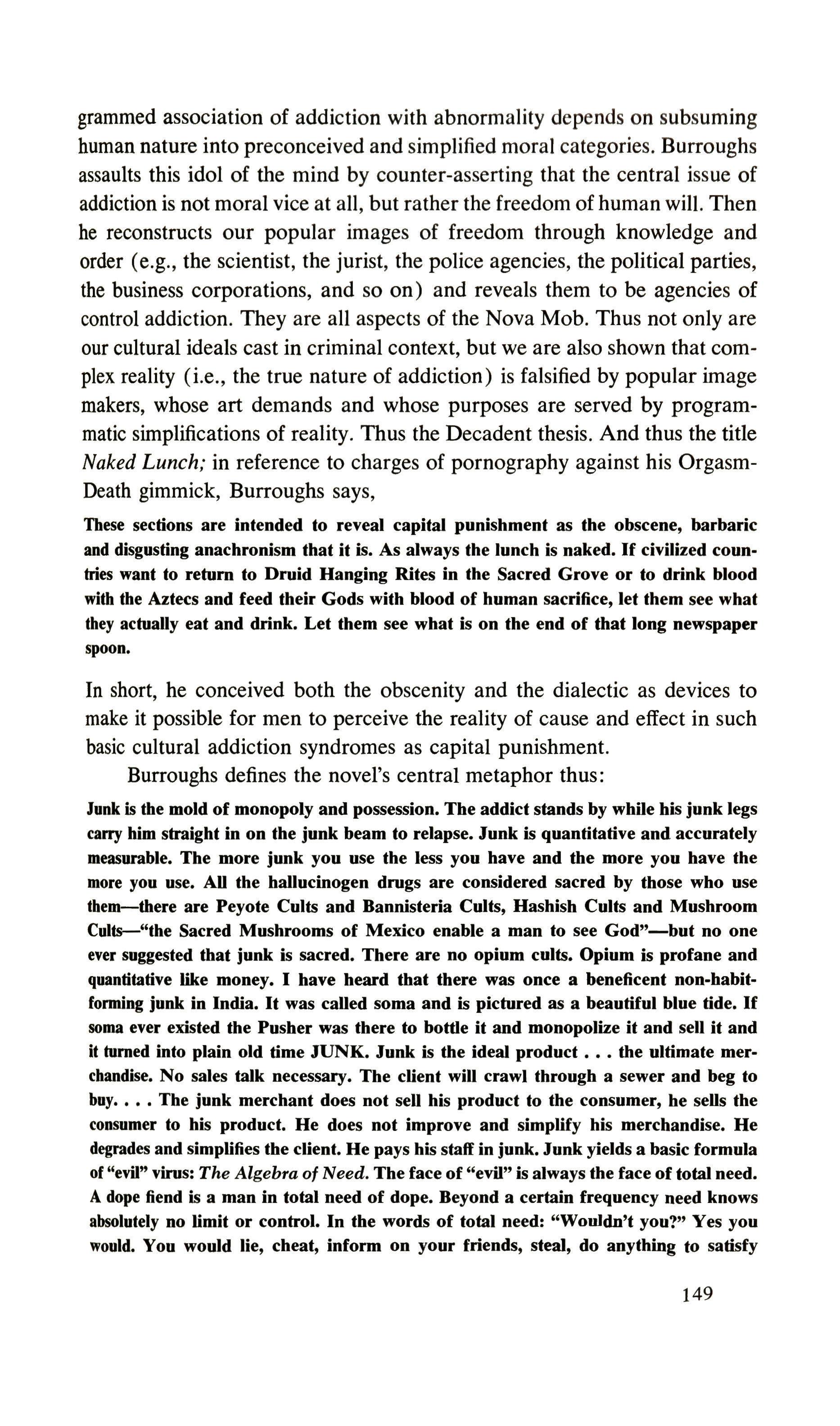
grammed association of addiction with abnormality depends on subsuming human nature into preconceived and simplified moral categories. Burroughs assaults this idol of the mind by counter-asserting that the central issue of addiction is not moral vice at all, but rather the freedom of human will. Then he reconstructs our popular images of freedom through knowledge and order (e.g., the scientist, the jurist, the police agencies, the political parties, the business corporations, and so on) and reveals them to be agencies of control addiction. They are all aspects of the Nova Mob. Thus not only are our cultural ideals cast in criminal context, but we are also shown that complex reality (i.e., the true nature of addiction) is falsified by popular image makers, whose art demands and whose purposes are served by programmatic simplifications of reality. Thus the Decadent thesis. And thus the title Naked Lunch,' in reference to charges of pornography against his OrgasmDeath gimmick, Burroughs says,
These sections are intended to reveal capital punishment as the obscene, barbaric and disgusting anachronism that it is. As always the lunch is naked. If civilized countries want to return to Druid Hanging Rites in the Sacred Grove or to drink blood with the Aztecs and feed their Gods with blood of human sacrifice, let them see what they actuaUy eat and drink. Let them see what is on the end of that long newspaper spoon.
In short, he conceived both the obscenity and the dialectic as devices to make it possible for men to perceive the reality of cause and effect in such basic cultural addiction syndromes as capital punishment. Burroughs defines the novel's central metaphor thus:
Junk is the mold of monopoly and possession. The addict stands by while his junk legs carry him straight in on the junk beam to relapse. Junk is quantitative and accurately measurable. The more junk you use the less you have and the more you have the more you use. AU the hallucinogen drugs are considered sacred by those who use them-there are Peyote Cults and Bannisteria Cults, Hashish Cults and Mushroom Cults "the Sacred Mushrooms of Mexico enable a man to see God" but no one ever suggested that junk is sacred. There are no opium cults. Opium is profane and quantitative like money. I have heard that there was once a beneficent non-habitforming junk in India. It was caUed soma and is pictured as a beautiful blue tide. If soma ever existed the Pusher was there to bottle it and monopolize it and sell it and it turned into plain old time JUNK. Junk is the ideal product the ultimate merchandise. No sales talk necessary. The client will crawl through a sewer and beg to boy The junk merchant does not sell his product to the consumer, he sells the consumer to his product. He does not improve and simplify his merchandise. He degrades and simplifies the client. He pays his staff in junk. Junk yields a basic formula of "evil" virus: The Algebra of Need. The face of "evil" is always the face of total need. A dope fiend is a man in total need of dope. Beyond a certain frequency need knows absolutely no limit or control. In the words of total need: "Wouldn't you?" Yes you would. You would lie, cheat, infolll) on your friends, steal, do anything to satisfy
149
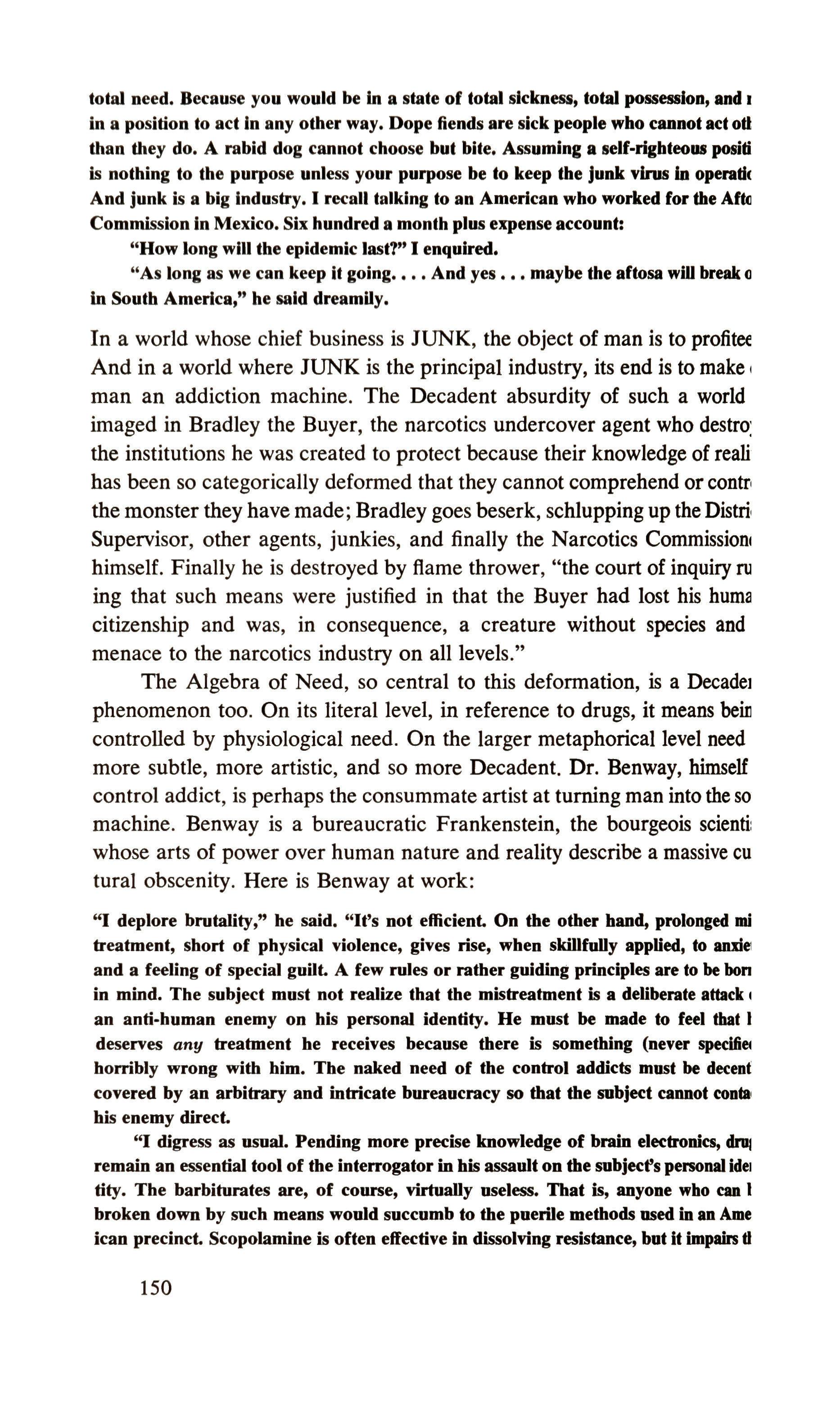
total need. Because you would be In a state of total sickness, total possession, and I in a position to act In any other way. Dope fiends are sick people who cannot act ott than they do. A rabid dog cannot choose but bite. Assuming a self-righteous positi Is nothing to the purpose unless your purpose be to keep the junk virus In operatic And junk is a big Industry. I recall talking to an American who worked for the Aftcl Commission In Mexico. Six hundred a month plus expense account:
"How long will the epidemic last?" I enquired.
"As long as we can keep it going And yes maybe the aftosa wiD break CJ In South America," he said dreamily.
In a world whose chief business is JUNK, the object of man is to profitee And in a world where JUNK is the principal industry, its end is to make I man an addiction machine. The Decadent absurdity of such a world imaged in Bradley the Buyer, the narcotics undercover agent who destro the institutions he was created to protect because their knowledge of reali has been so categorically deformed that they cannot comprehend or contn the monster they have made; Bradley goes beserk, schlupping up the Distri Supervisor, other agents, junkies, and finally the Narcotics Commission himself. Finally he is destroyed by flame thrower, "the court of inquiry ru ing that such means were justified in that the Buyer had lost his huma citizenship and was, in consequence, a creature without species and menace to the narcotics industry on all levels."
The Algebra of Need, so central to this deformation, is a Decadei phenomenon too. On its literal level, in reference to drugs, it means bein controlled by physiological need. On the larger metaphorical level need more subtle, more artistic, and so more Decadent. Dr. Benway, himself control addict, is perhaps the consummate artist at turning man into the so machine. Benway is a bureaucratic Frankenstein, the bourgeois scienti: whose arts of power over human nature and reality describe a massive eu tural obscenity. Here is Benway at work:
"I deplore brutality," he said. "It's not efficient. On the other hand, prolonged mi treatment, short of physical violence, gives rise, when skiUfnUy appUed, to anxie and a feeling of special guilt. A few rules or rather guiding principles are to be bon in mind. The subject must not realize that the mistreatment Is a deUberate attack I an anti-human enemy on his personal identity. He must be made to feel that I deserves any treatment he receives because there is something (never spedfi� horribly wrong with him. The naked need of the control addicts must be decent covered by an arbitrary and intricate bureaucracy so that the subject cannot coota, his enemy direct.
''I digress as usual. Pending more precise knowledge of brain electronics, druj remain an essential tool of the interrogator in his assault on the subject's personal idel tity. The barbiturates are, of course, virtuaUy useless. That Is, anyone who cao I broken down by such means would succumb to the puerile methods used in an Arne ican precinct. Scopolamine is often effective in dissolving resistance, but it impairs d
150
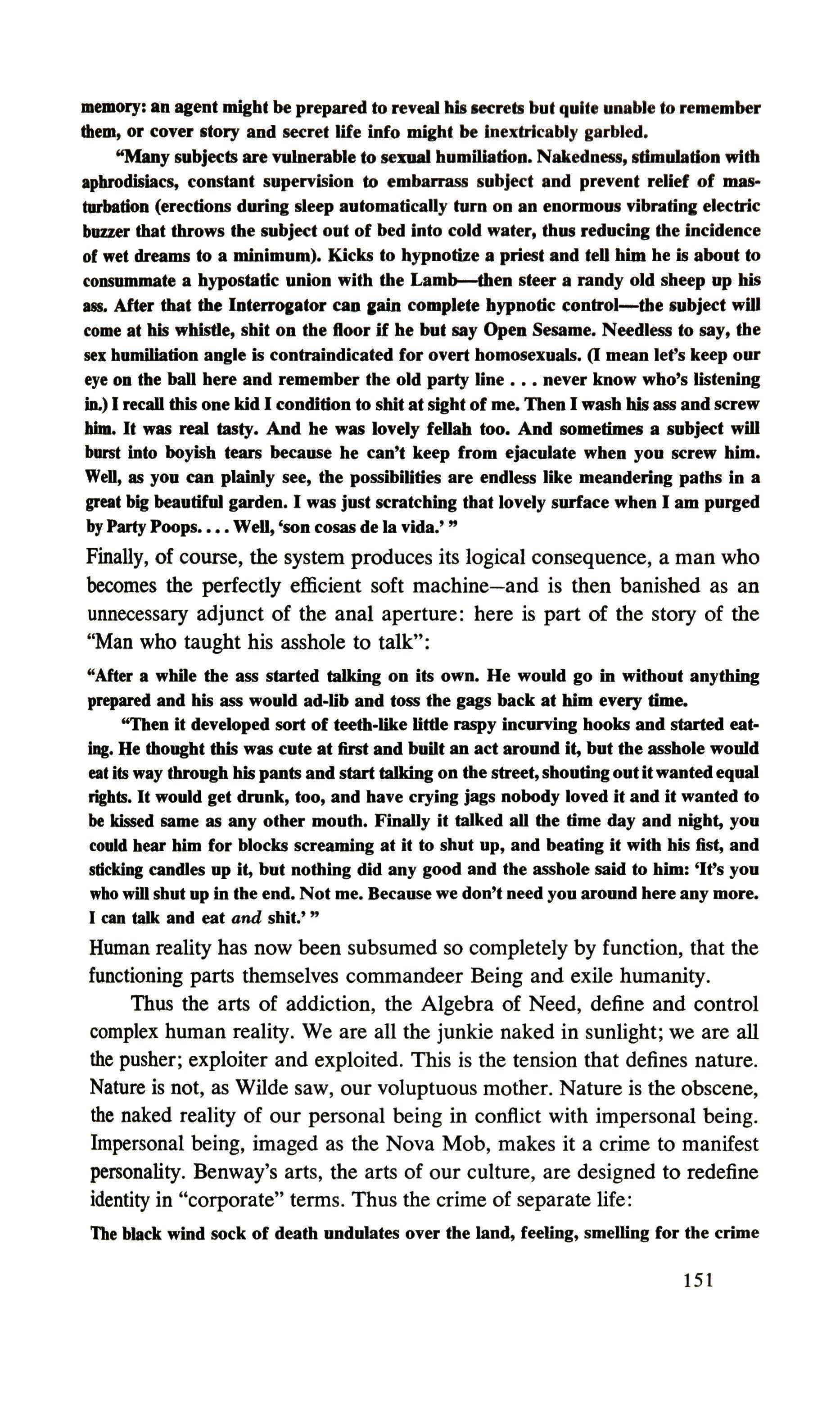
memory: an agent might be prepared to reveal his .ecrets but quite unable to remember them, or cover story and secret life info might be inextricably garbled.
"Many subjects are vulnerable to seXIIal humiliation. Nakedness, stimulation with aphrodisiacs, constant supervision to embarrass subject and prevent relief of II'asturbation (erections during sleep automaticaDy turn on an enOllnous vibrating electric butu. that dtrows the subject out of bed into cold water, thus reducing the incidence of wet dreams to a II.inimum). Kicks to hypnotize a priest and teD him he is about to consummate a hypostatic union with the Lamb then steer a randy old sheep up his 8SS. After that the Interrogator can lain complete hypnotic control the subject will come at his whistle, shit on the floor if he but say Open Sesame. Needless to say, the sex humiliation angle is contaaindicated for overt homosexuals. (I mean let's keep our eye on the baD here and remember the old party line never know who's Ustening iD.) I recaU this one kid I condition to shit at sight of me. Then I wash his ass and screw bUn. It was real tasty. And he was lovely fellah too. And sometil'le8 a subject will burst into boyish tears because he can't keep from ejaculate when you screw him. WeD, as you can plainly see, the possibilities are endless like meandering paths in a great big beautiful garden. I was just scratching that lovely surface when I am purged byParty Poops WeD, 'son cosas de la vida.'
Finally, of course, the system produces its logical consequence, a man who becomes the perfectly efficient soft machine and is then banished as an unnecessary adjunct of the anal aperture: here is part of the story of the "Man who taught his asshole to talk":
"After a while the ass started talking on its own. He would go in without anything prepared and his ass would ad-lib and toss the gags back at him every tilile.
"Then it developed sort of teeth-like little laspy inc'lrving hooks and started eating. He tlaought this was cute at first and buDt an act around it, but the asshole would eat its way thl'ough his pants and start talking on the street, shouting outitwanted equal rights. It would get drunk, too, and have crying jags nobody loved it and it wanted to be kissed same as any other mouth. Finally it talked aU the time day and night, you could hear him for blocks screaming at it to shut up, and beating it with his fist, and sticking candles up it, but nothing did any good and the asshole said to him: 'It's you who will shut up in the end. Not me. Because we don't need you around here any more. I can talk and eat and shit.'"
Human reality has now been subsumed so completely by function, that the functioning parts themselves commandeer Being and exile humanity.
Thus the arts of addiction, the Algebra of Need, define and control complex human reality. We are all the junkie naked in sunlight; we are all the pusher; exploiter and exploited. This is the tension that defines nature. Nature is not, as Wilde saw, our voluptuous mother. Nature is the obscene, the naked reality of our personal being in conflict with impersonal being. Impersonal being, imaged as the Nova Mob, makes it a crime to manifest personality. Benway's arts, the arts of our culture, are designed to redefine identity in "corporate" terms. Thus the crime of separate life: llte black wind sock of death undulates over the land, feeUng, smeUing for the crime
151
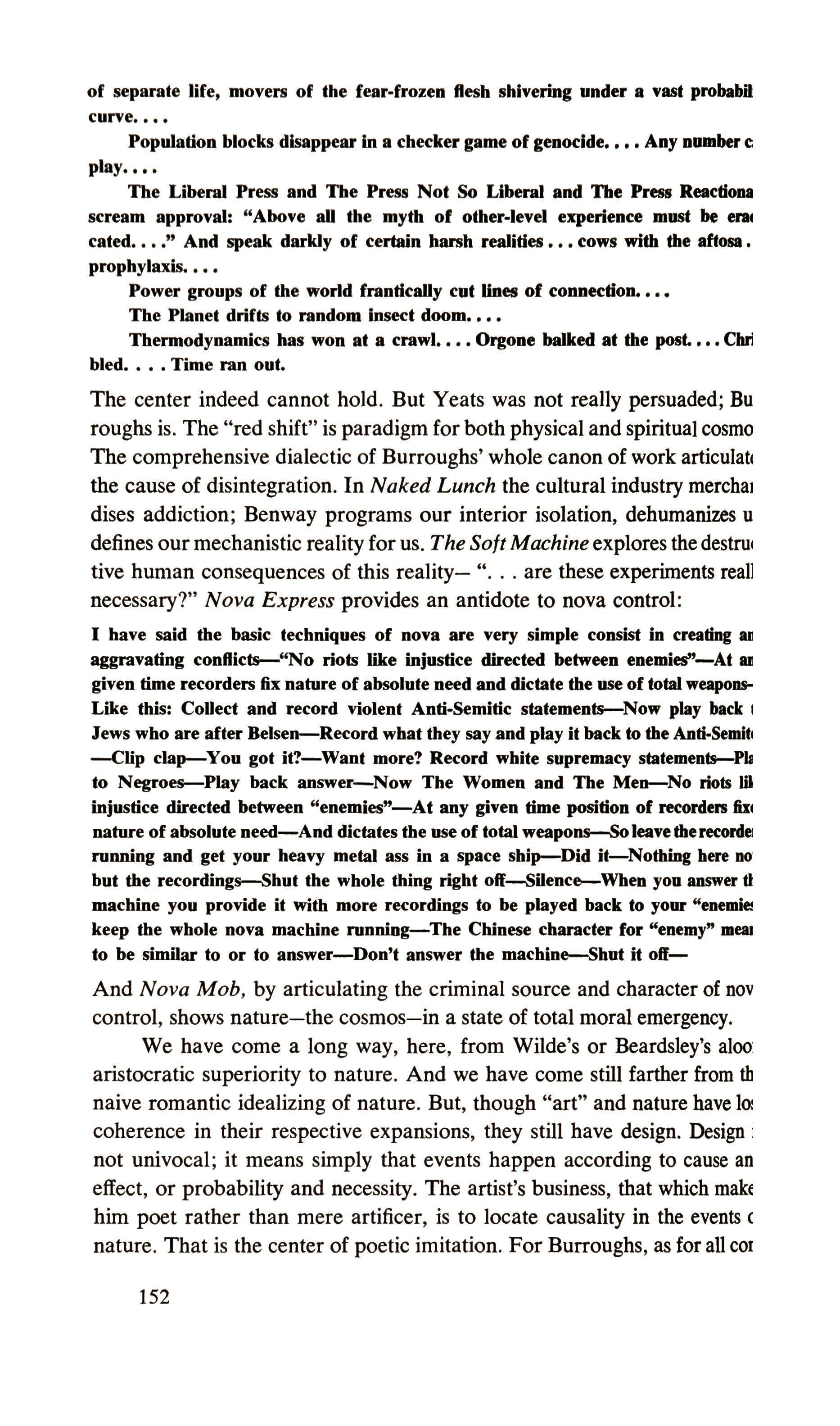
of separate life, movers of the fear-frozen flesh shivering under a vast probabil curve
Population blocks disappear In a checker game of genocide Any Dumber e play
The Liberal Press and The Press Not So Liberal and The PlesS ReactioDl scream approval: "Above all the myth of other-level experience must be era. cated And speak darkly of cel tain harsh realities cows with the aftosa. prophylaxis
Power groups of the world frantically cut Ones of connection
The Planet drifts to random Insect doom
Thernlodynamics has won at a crawl Orgone balked at the post. Cbrl bled Time Ian out.
The center indeed cannot hold. But Yeats was not really persuaded; Bu roughs is. The "red shift" is paradigm for both physical and spiritual cosmo The comprehensive dialectic of Burroughs' whole canon of work articulate the cause of disintegration. In Naked Lunch the cultural industry merchai dises addiction; Benway programs our interior isolation, dehumanizes u defines our mechanistic reality for us. The SoftMachine explores the destru tive human consequences of this reality" are these experiments real] necessary?" Nova Express provides an antidote to nova control:
I have said the basic techniques of nova are very simple consist in creating u aggravating conflicts ''No riots like injustice directed between enemi� At u given time recorders fix nature of absolute need and dictate the use of total weaponsLike this: Collect and record violent Anti-Semitic statements Now play back 1 Jews who are after Belsen Record what they say and play it back to the Anti-Semitl -.Clip clap-You got it? Want more? Record white supremacy statements-Pb to Negroes Play back answer Now The Women and The Men-No riots iii injustice directed between "enemies" At any given time position of lecorders fiIl nature of absolute need And dictates the 'Ise of total weapons--Soleavetbelecordel running and get your heavy metal ass in a space ship-Did it NOthing here no' but the recordings Shut the whole thing right off--Silence When yoo answer tI machine you provide it with more recordings to be played back to your "enemie! keep the whole nova machine running The Chinese cba.acter for "enemy" meat to be similar to or to answer Don't answer the machine Shot it 0&-
And Nova Mob, by articulating the criminal source and character of nov control, shows nature the cosmos in a state of total moral emergency. We have come a long way, here, from Wilde's or Beardsley's aloo: aristocratic superiority to nature. And we have come still farther from th naive romantic idealizing of nature. But, though "art" and nature have 10l coherence in their respective expansions, they still have design. Design i not univocal; it means simply that events happen according to cause an effect, or probability and necessity. The artist's business, that which make him poet rather than mere artificer, is to locate causality in the events ( nature. That is the center of poetic imitation. For Burroughs, as for all COl
152

temporary sensibility, cause cannot be referred to such categories as the good or the beautiful. Knowledge of causal reality requires penetrating to those points in time where cause is revealed. Even plot, the long-time poetic agency of showing cause, is a falsification because it means the artist must superimpose a linear and chronological order on the chaos of his perceptions. The maker of plots is, at least to some degree, the maker of causes rather than the discoverer. Dr. Benway is the dangerous potential of giving life a plot. Our arts work on the premise that knowing requires ordering; Burroughs, realizing that the mind has greater perceptual capacity than we have thought, counters this by showing that superimposed order makes life take the shape we give it, and in so doing it prevents OUI perception of cause in natural events. Knowledge so derived is a chimerical self-indulgence. Nakedness is all. Nakedness means images, structured as little as possible enough structure to show the artist's perception of causal connection, not so much as to give an order that may gratify the mind's ease but which must falsify our knowledge of nature. Thus, direct experience and perception is the aesthetic base of Burroughs' poetic:
I awoke from The Sickness at the age of forty-five, calm and sane, and in reasonably good health except for a weakened liver and the look of borrowed flesh common to all who survive The Sickness. Most survivors do not remember the delirium in detail. I apparendy took detailed notes on sickness and delirium. I have no precise memory of writing the notes which have now been published under the tide Naked Lunch.
There is only one thing a wl'iter can write about: what is in front of his senses at the moment of writing I a••1 a recording instrument. I do not presume to impose "story" "plot" "continuity." Insofar as I succeed in Direct recording of certain areas of psychic process I may have limited function I am not an enterlainer.
When he says that he is no entertainer he denies that component of poetic tradition which the earlier Decadents grasped so desperately. When he declines the continuity gambit, he rejects the traditional means by which art was supposed to instruct. How, then, instruct? Through an irregular rh of intersecting images which articulate causes and are, in their obscene nakedness, themselves the effects. By forcing us to concentrate on the imagistic connections connections traditionally made for us by plotwe are kept, as he says, from taking our own pulse. The artist projects his montage, provides editorial control through the ironic inversion of beauty and obscenity, and that serves as catalyst to the reader's imagination rather than the determinant of it. The rhythmic recurrence of coordinated intersecting images acts as objective correlative. Here is Burroughs' own description: Yon can cut into Naked Lunch at any intersection point I have written many prefaces. They atrophy and amputate spontaneous like the Iitde toe amputates in a
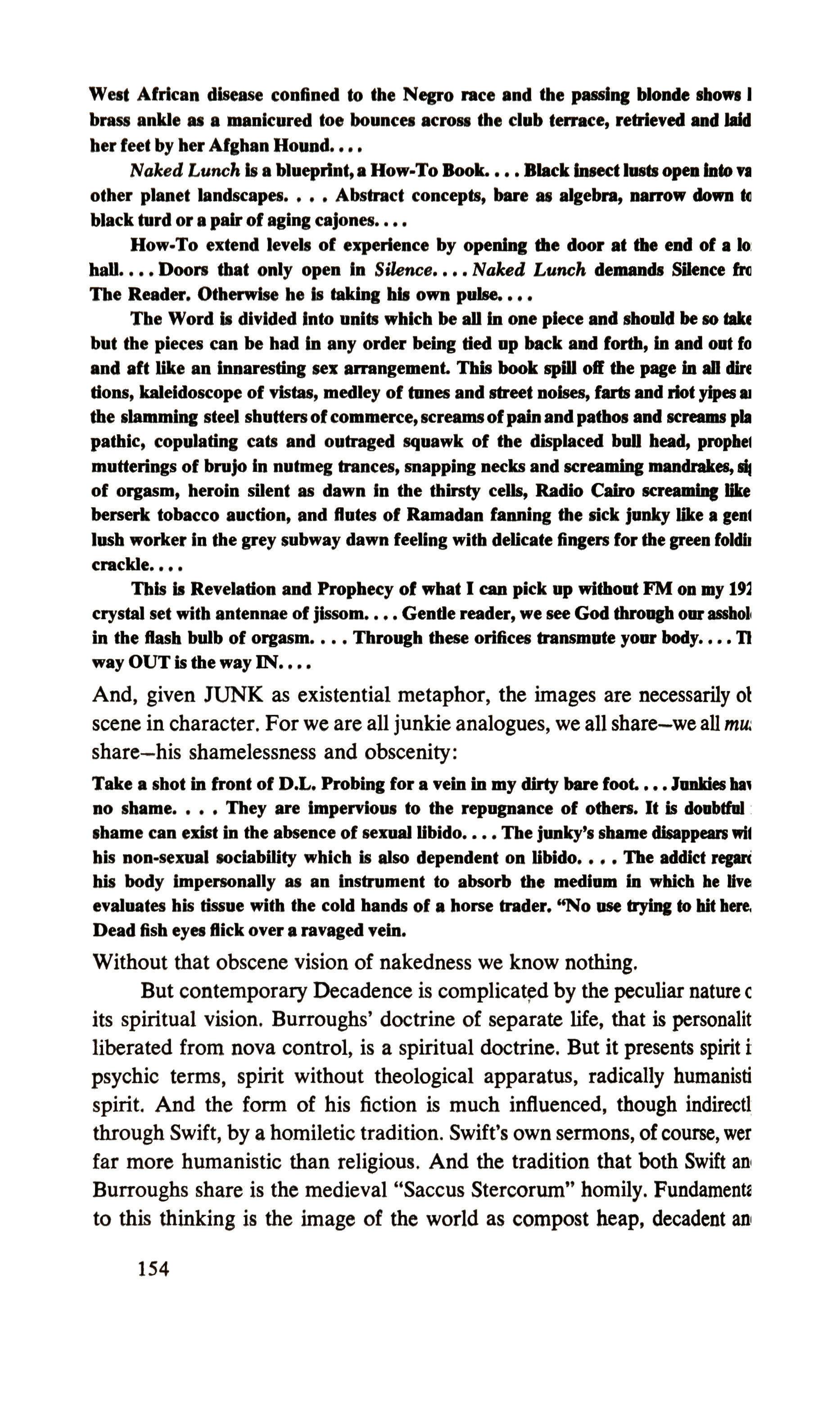
West African disease eonfined to the Negro nee and the passing blonde sbowsl bnss ankle 81 a Illenlcured toe bounces acron the club tellace, retrieved and JaJd her feet by her Afghan Hound
Naked Lunch Is a blueprint, a How-To Book. Blaek Insed Ius open lato VI other planet landscapes Abstnct eoncep", bare as algebra, a'iow down tcJ black turd or a pair of aging cajones
How-To extend levels of experience by opening the door at the end of a 10 hall Doors that only open In Silence Naked Lunch demands Silence fn The Reader. OtheRwise he Is his own pulse.
The Word Is divided Into uni" which be all In one piece and should be 10 take but the pieces can be had In any order being ded up back and forth, In and out fo and aft like an innaresting sex ar.angement. This book spill oft the page In aD din dons, kaleidoscope of vistas, medley of tunes and street noises, farfs and riot ylpes IU the ilalilliaing steel shutters ofcomme.ce, screamt ofpain and pathos and screpms pia pathic, copulating ea and outnged squawk of the displaced bull head, propbel mutterings of brujo In nutmeg tnnces, snapping necks and scr mandrakes,iii of orgasm, heroin silent as dawn In the thirsty cells, Radio Cairo screamine like berserk tobacco auction, and flutes of Ramadan fanning the lick junky like a genl lush worker In the grey subway dawn feeling with deDcate fingers for die g.eeD foldb crackle
This Is Revelation and Prophecy of what I can pick up widlout PM OD my 19� crystal set with antennae of jissom Gende reader, we see God tb.ough ourassholl in die flash bulb of orgasm Through dlese orifices tnnsmute your body n way OUT is the way IN
And, given J as existential metaphor, the images are necessarily 01 scene in character. For we are all junkie analogues, we all share we all mu: share his shamelessness and obscenity:
Take a shot in front of D.L. Probing for a vein in my dirty bare foot. Junkies ha, no shame. They are impervious to the repugnance of otheal. It is doubtfnl
•hame can exist in die absence of sexual Ubido The j'lnky'. shame disappears wil his non-sexual sociability which is .Iso dependeDt on Ubido The addict "prj his body Impersonally as aD instrument to absorb the medium in which he Ive evaluates his tissue with die cold hands of a horse trader. "No use tryl to bit hea't, Dead fish eyes flick over a nvaged vein.
Without that obscene vision of nakedness we know nothing.
But contemporary Decadence is complicated by the peculiar nature c its spiritual vision. Burroughs' doctrine of separate life, that is personalit liberated from nova control, is a spiritual doctrine. But it presents spirit i psychic terms, spirit without theological apparatus, radically humanisti spirit. And the form of his fiction is much influenced, though indirectl through Swift, by a homiletic tradition. Swift's own sermons, of course, wer far more humanistic than religious. And the tradition that both Swift ani Burroughs share is the medieval "Saccus Stercorum' homily. Fundamenn to this thinking is the image of the world as compost heap, decadent ani
154
obscene in the eyes of God. Burroughs even has his own text; his book of knowledge is his own profound experience of addiction and its obscenity. His novel, like the homily, takes its authority from this book. Specifically it takes the form of his article on drugs in the British Journal of Addiction. Though naturalistic and inverted, it is still a "revealed book", and ultimately speaks to the human spirit. It tells us of new demonic gods, the technocrats, and their new arts. It explains their ways to man. Burroughs, like so many contemporary Decadents, is behind all that decadence and obscenity a man of intellectual faith, faith in the rightness of human personality, faith in the possibility of human dignity, faith that man can know if he will look past the demons he has himself constructed. And he brings the Word, in all its fractured complexity of perception. And perhaps most importantly he tells us that the artist, not the dialectician, is king that his truth and his alone shall make us see.
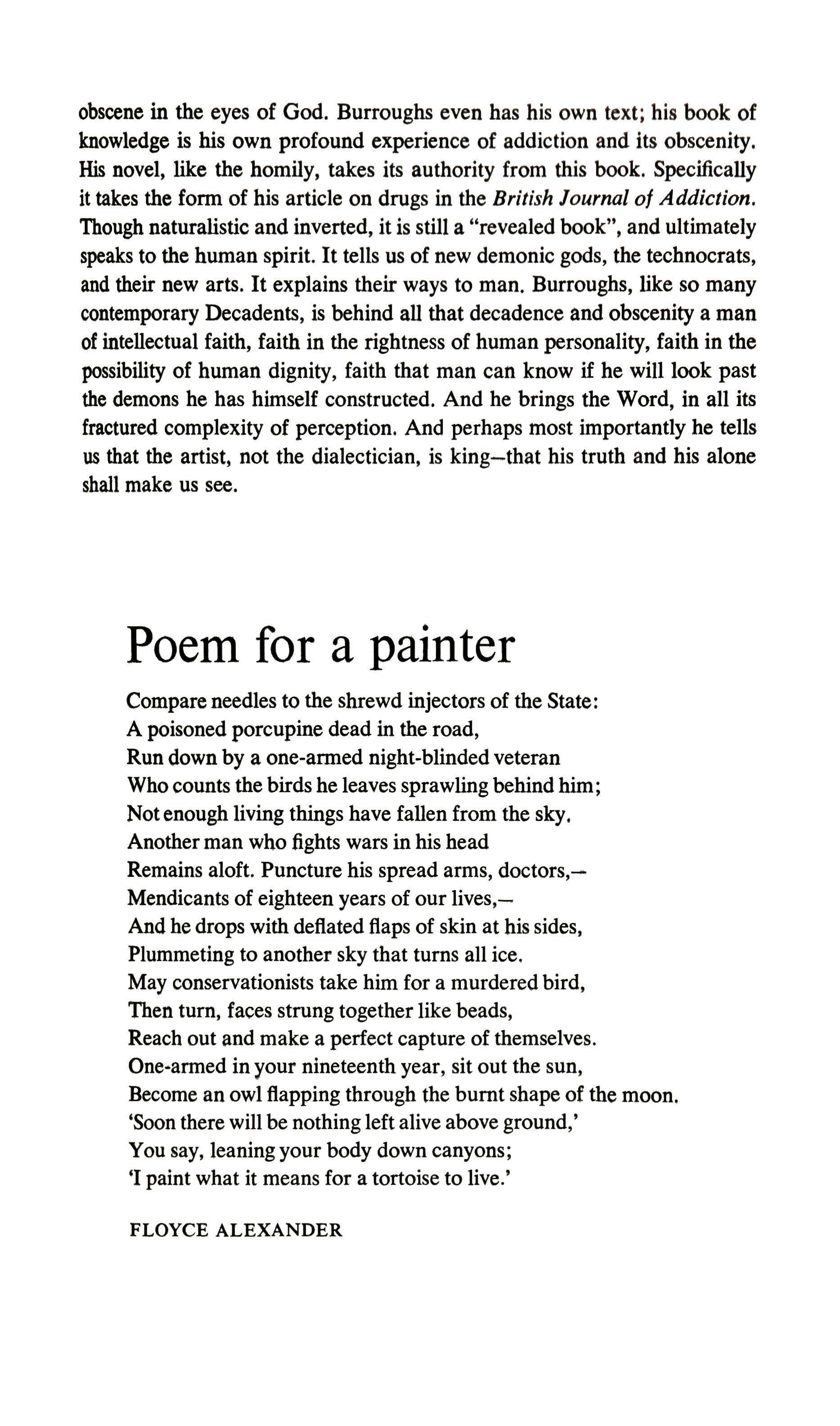
Compare needles to the shrewd injectors of the State:
A poisoned porcupine dead in the road,
Run down by a one-armed night-blinded veteran
Who counts the birds he leaves sprawling behind him; Notenough living things have fallen from the sky. Another man who fights wars in his head
Remains aloft. Puncture his spread arms, doctors,Mendicants of eighteen years of our livea--
And he drops with deflated flaps of skin at his sides, Plummeting to another sky that turns all ice. May conservationists take him for a murdered bird, Then turn, faces strung together like beads, Reach out and make a perfect capture of themselves. One-armed in your nineteenth year, sit out the sun, Become an owl flapping through the burnt shape of the moon. 'Soon there will be nothing left alive above ground,' You say, leaning your body down canyons; 'I paint what it means for a tortoise to live.'
FLOYCE ALEXANDER
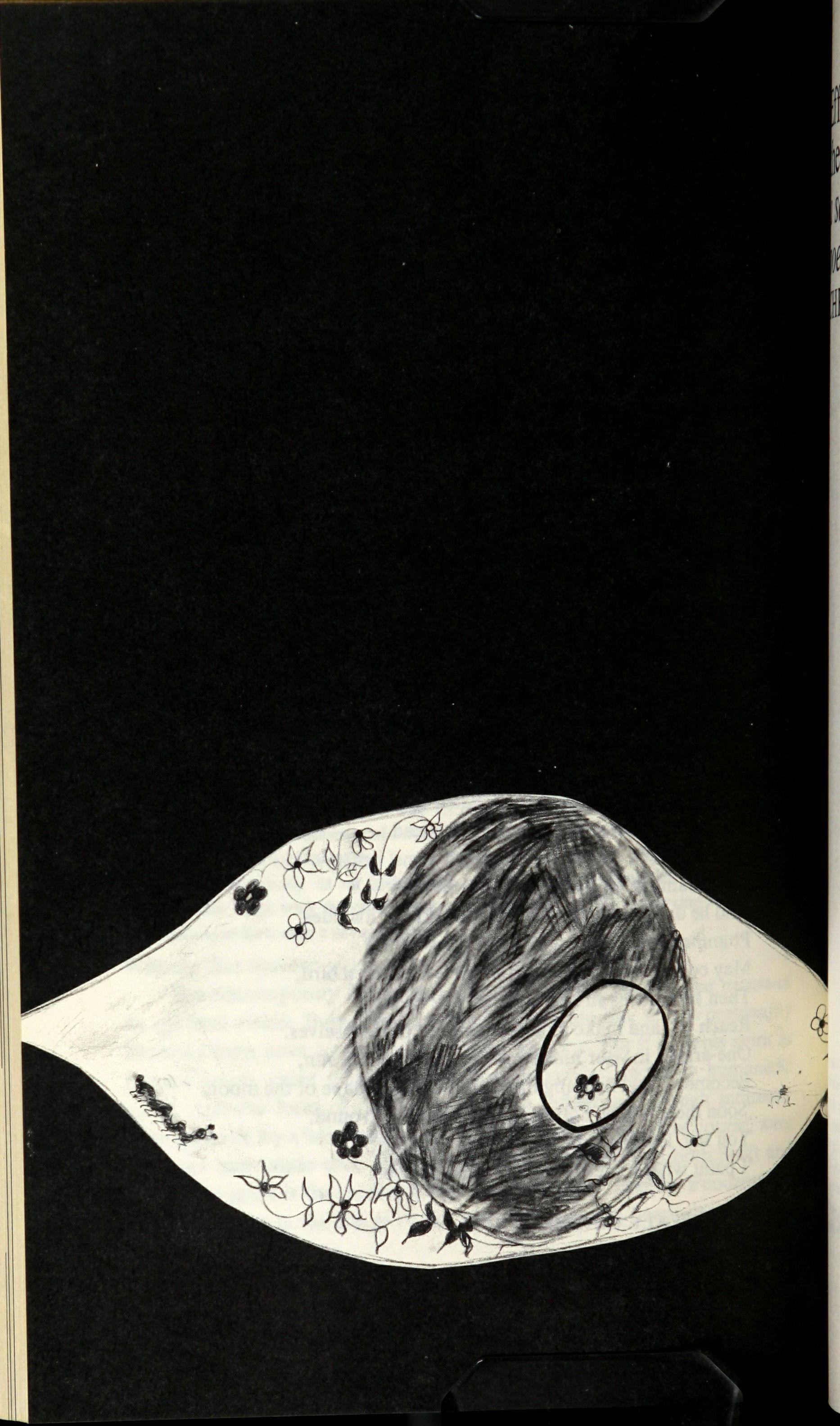
�-
uvia: o enn s ro es 0 arnassus
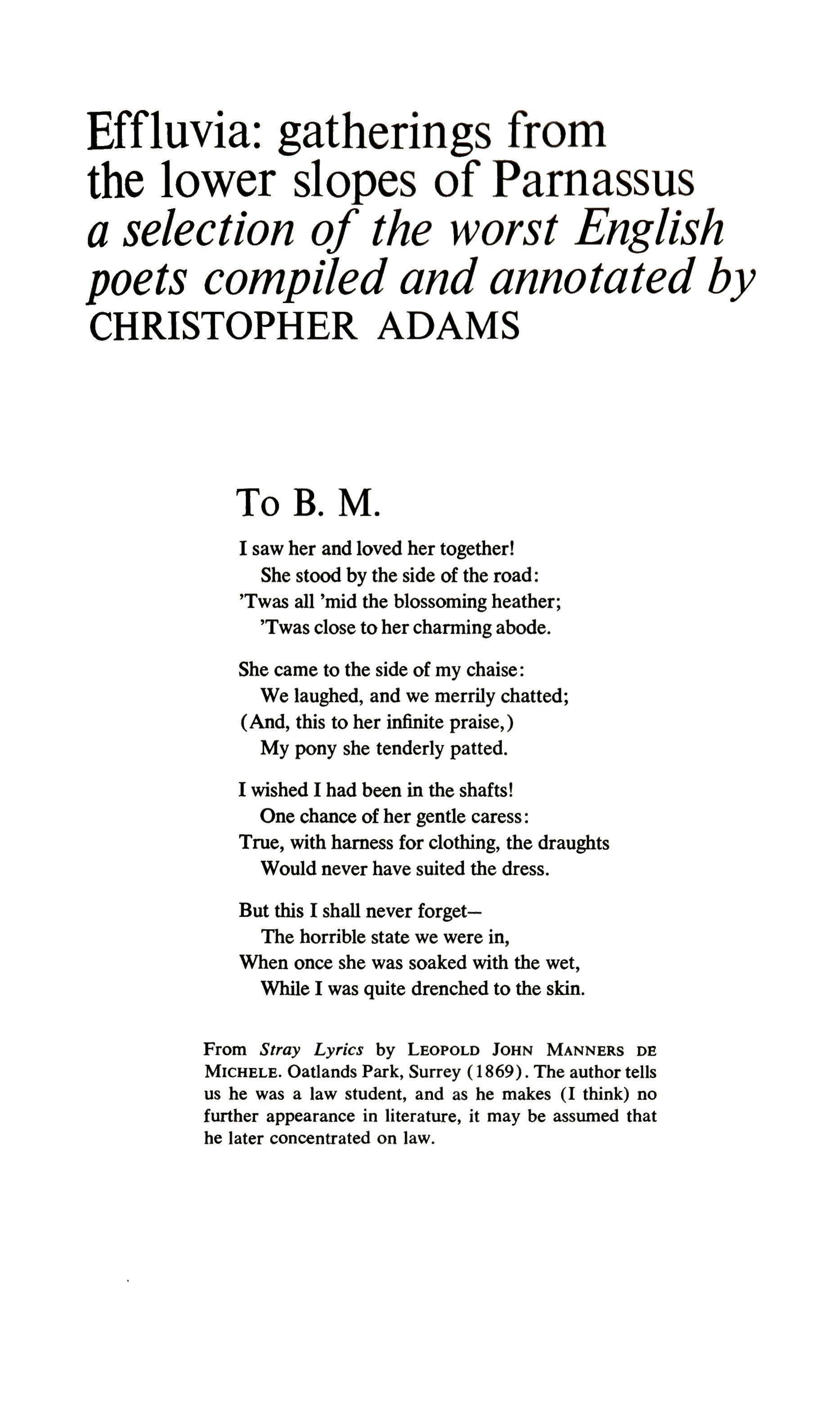
To B.
I saw her and loved her together! She stood by the side of the road: 'Twas all 'mid the blossoming heather; 'Twas close to her charming abode.
She came to the side of my chaise: We laughed, and we merrily chatted; (And, this to her infinite praise,) My pony she tenderly patted.
I wished I had been in the shafts! One chance of her gentle caress: True, with harness for clothing, the draughts Would never have suited the dress.
But this I shall never forget.The horrible state we were in, When once she was soaked with the wet, While I was quite drenched to the skin.
From Stray Lyrics by LEOPOLD JOHN MANNERS DE MICHELE. Oatlands Park, Surrey (1869). The author tells us he was a law student, and as he makes (I think) no further appearance in literature, it may be assumed that he later concentrated on law
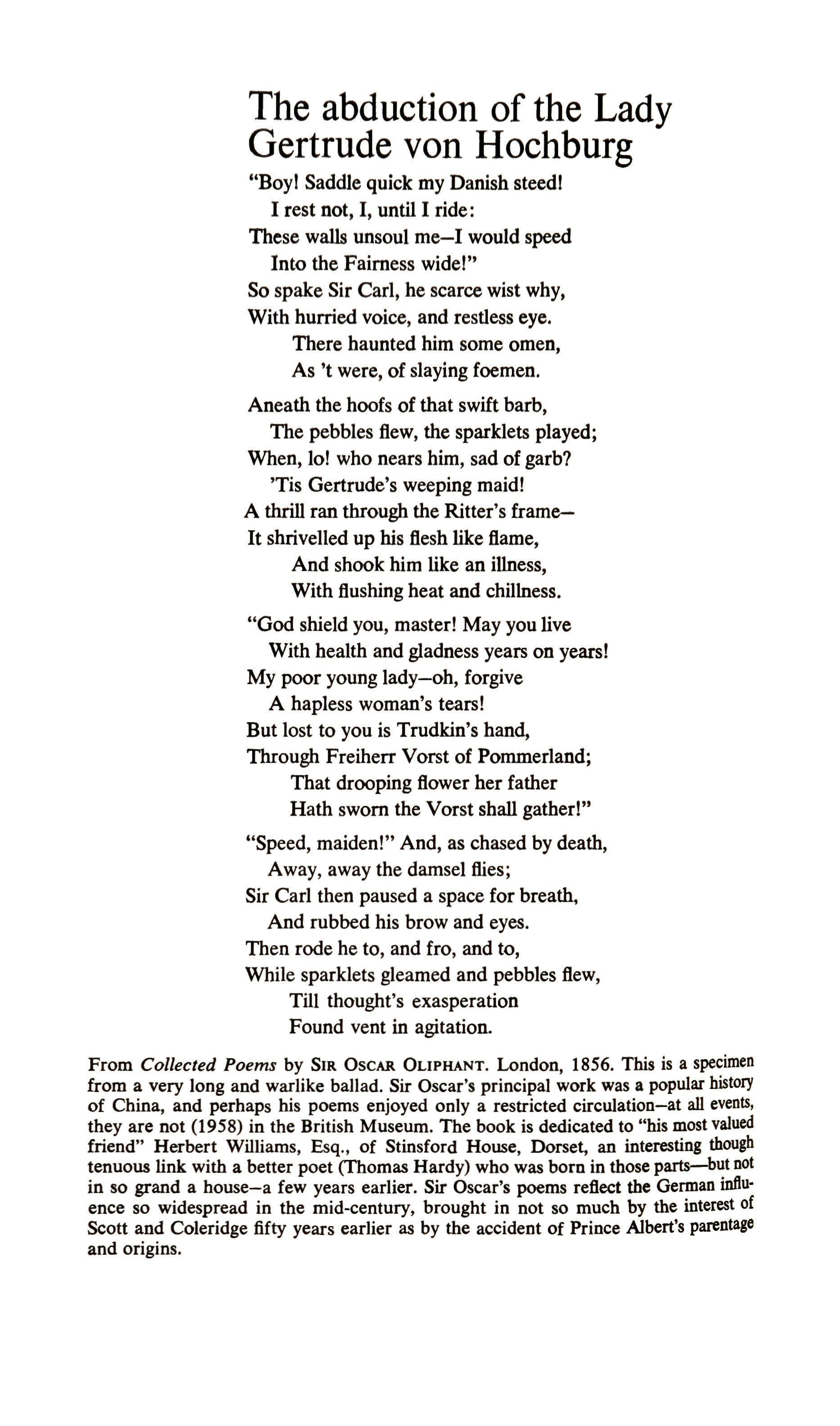
e auction 0 ertru e von
"Boyl Saddle quick my Danish steedI I rest not, I, until I ride: These walls unsoul me-I would s Into the Fairness widel"
So spake Sir Carl, he scarce wist why, With hurried voice, and restless eye. There haunted him some omen, As 't were, of slaying foemen.
Aneath the hoofs of that swift barb, The pebbles flew, the sparklets played; When, 101 who nears him, sad of garb? 'Tis Gertrude's weeping maid!
A thrill ran through the Ritter's frameIt shrivelled up his flesh like flame, And shook him like an illness, With flushing heat and chillness.
"God shield you, master! May you live With health and gladness years on years!
My poor young lady-oh, forgive A hapless woman's tears!
But lost to you is Trudkin's hand, Through Freiherr Vorst of Pommerland; That drooping flower her father Hath sworn the Vorst shall gather!"
"Speed, maiden!" And, as chased by death, Away, away the damsel flies;
Sir Carl then paused a space for breath, And rubbed his brow and eyes. Then rode he to, and fro, and to, While sparklets gleamed and pebbles flew, Till thought's exasperation Found vent in agitation.
From Collected Poems by SIR OSCAR OLIPHANT. London, 1856. This IS a specimen from a very long and warlike ballad. Sir Oscar's principal work was a popular history of China, and perhaps his poems enjoyed only a restricted circulation-at all events, they are not (1958) in the British Museum. The book is dedicated to "his most valued friend" Herbert Williams, Esq., of Stinsford House, Dorset, an interesting though tenuous link with a better poet (Thomas Hardy) who was born in those p ut not in so grand a house-a few years earlier. Sir Oscar's poems reflect the German influ· ence so widespread in the mid-century, brought in not so much by the interest of Scott and Coleridge fifty years earlier as by the accident of Prince Albert's parentage and origins.
e
ur
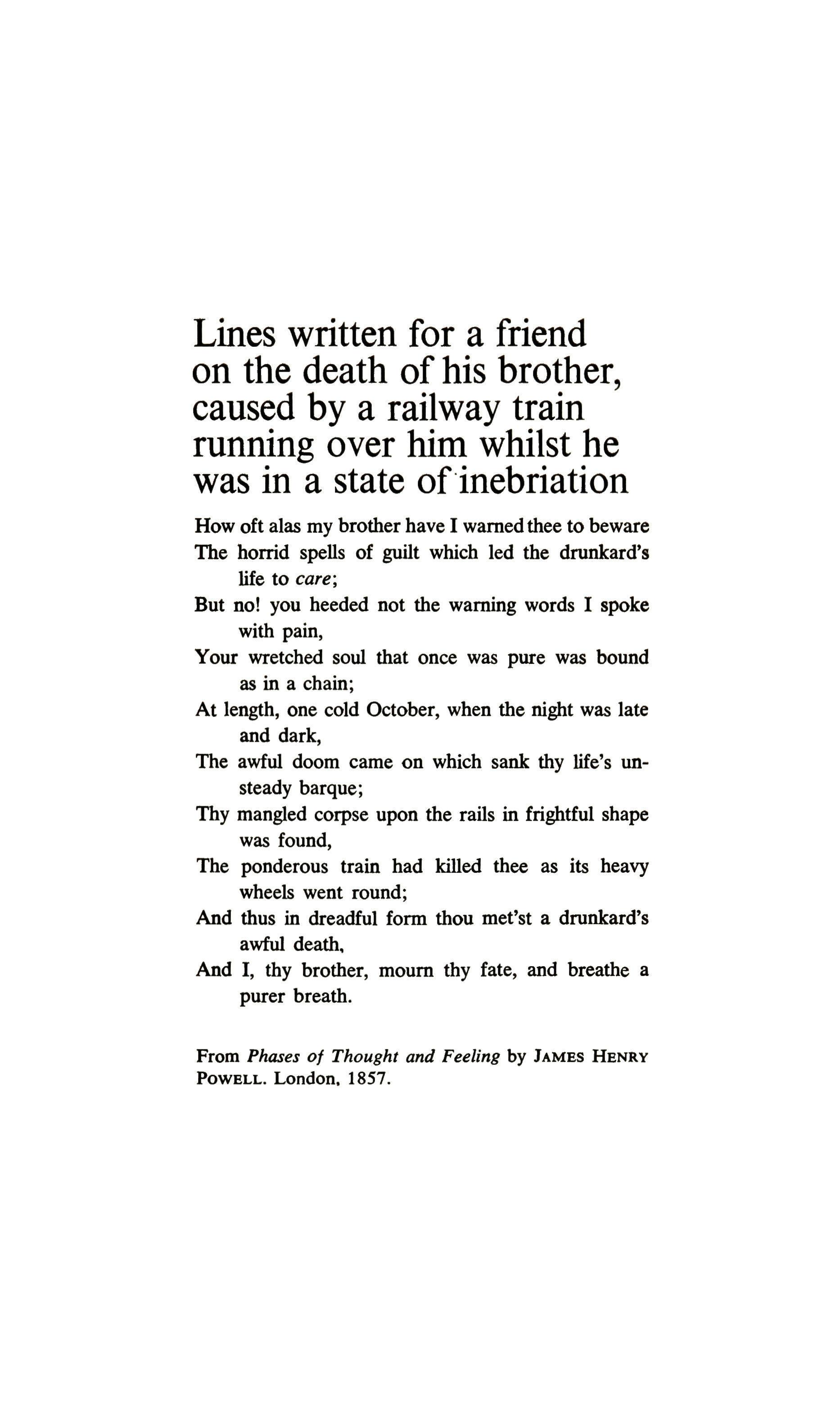
ines written or a rien
caused y a rai way train running over m WIst e was in a state 0 .ine riation
How oft alas my brother have I warnedthee to beware
The horrid spells of guilt which led the drunkard's life to care;
But no! you heeded not the warning words I spoke with pain,
Your wretched soul that once was pure was bound as in a chain;
At length, one cold October, when the night was late and dark,
The awful doom came on which sank thy life's unsteady barque;
Thy mangled corpse upon the rails in frightful shape was found,
The ponderous train had killed thee as its heavy wheels went round;
Aud thus in dreadful fOCII) thou met'st a drunkard's awful death,
Aud I, thy brother, mourn thy fate, and breathe a purer breath.
From Phases of Thought and Feeling by JAMES HENRY POWELL. London. 1857.
n w at IS wanting In t e paris to promote t e
c
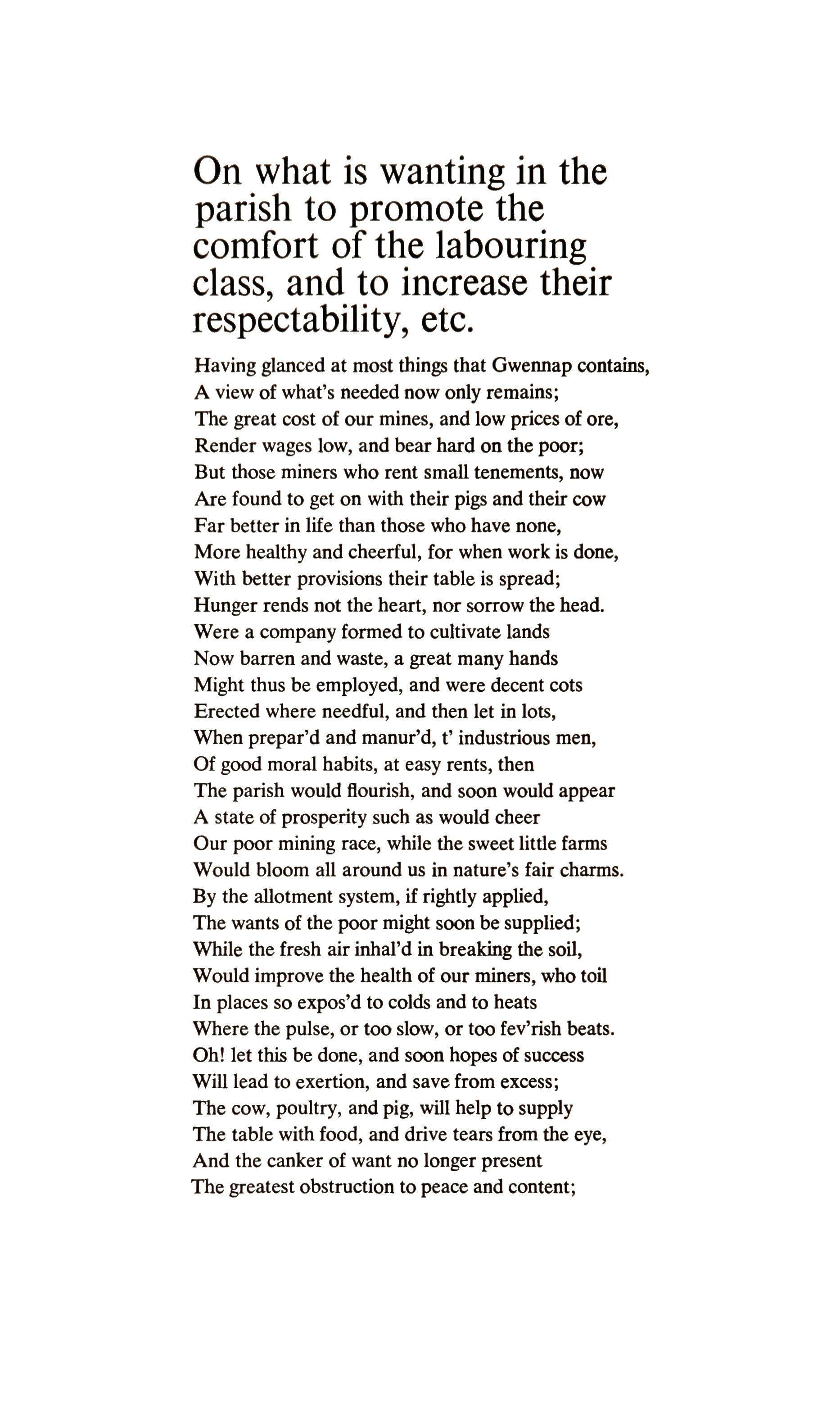
ass, an
to Increase t err respecta
iltty, etc.
Having glanced at most things that Gwennap contains, A view of what's needed now only remains; The great cost of our mines, and low prices of ore, Render wages low, and bear hard on the poor; But those miners who rent small tenements, now Are found to get on with their pigs and their cow Far better in life than those who have none, More healthy and cheerful, for when work is done, With better provisions their table is spread; Hunger rends not the heart, nor sorrow the head. Were a company f01111ed to cultivate lands Now barren and waste, a great many hands Might thus be employed, and were decent cots Erected where needful, and then let in lots, When prepar'd and manur'd, t' industrious meo, Of good moral habits, at easy rents, then The parish would flourish, and soon would appear A state of prosperity such as would cheer Our poor mining race, while the sweet little farms Would bloom all around us in nature's fair charms. By the allotment system, if rightly applied, The wants of the poor might sooo be supplied; While the fresh air inhal'd in breaking the soil, Would improve the health of our miners, who toil In places so expos'd to colds and to heats Where the pulse, or too slow, or too fev'rish beats. Oh! let this be done, and soon hopes of success Will lead to exertion, and save from excess; The cow, poultry, and pig, will help to supply The table with food, and drive tears from the eye, And the canker of want no longer present The greatest obstruction to peace and content;
The son, blest with means, will support his poor sire, The widow and orphan will smile round his fire, While poor's rates and Unions diminished, will prove That independency leads to comfort and love. There should be establish'd in every place
Thickly populous, schools for the prattling race; And day-school instruction extended to all, For this doth the state of society call; The poor can bear none, or but little expense, A fund, as above, such a boon might dispense And every poor child, till twelve years of age, Be blest with instruction, his heart to engage On the side of science, which should be maintain'd By evening free schools, securing what's gain'd.
WILLIAM FRANCIS.
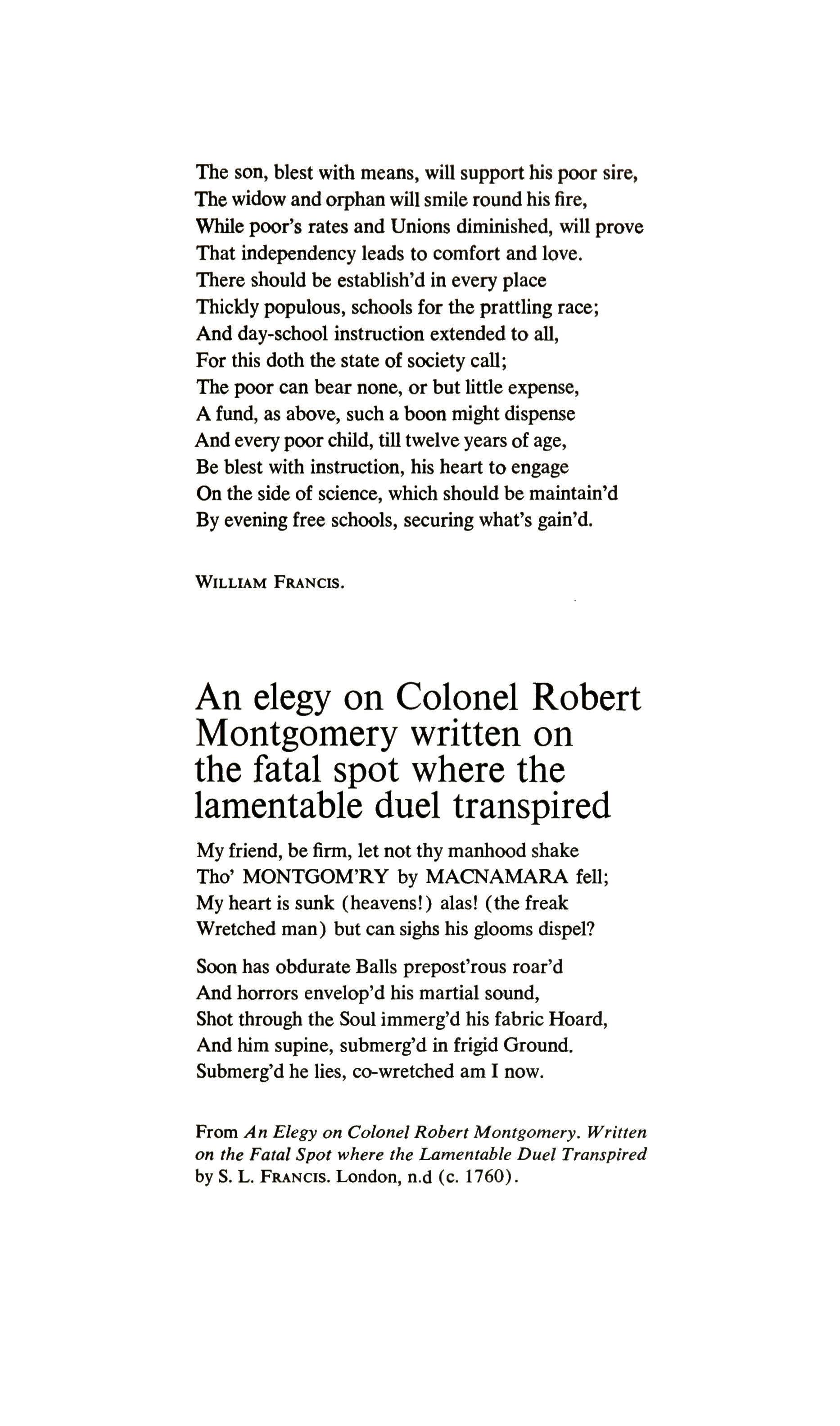
An elegy on Colonel Robert ontgomery written on the atal spot where the lamentable duel transpire
My friend, be fi1111, let not thy manhood shake Tho' MONTGOM'RY by MACNAMARA fell; My heart is sunk (heavens!) alas! (the freak Wretched man) but can sighs his glooms dispel?
Soon has obdurate Balls prepost'rous roar'd And horrors envelop'd his martial sound, Shot through the Soul immerg'd his fabric Hoard, And him supine, submerg'd in frigid Ground. Submerg'd he lies, co-wretched am I now.
From An Elegy on Colonel Robert Montgomery. Written on the Fatal Spot where the Lamentable Duel Transpired by S. L. FRANCIS. London, n.d (c. 1760).
Lines written on teLa e 0
ourget y a sensitive man
o Muse of Poetry, who didst erewhile Inspire the gentle Soul of Lamartine, Please tell me what to say, and how it say it; I'm going to try and sing the Lake at Aix.
From Pictoris Otia by POWNOLL TOKER WILLIAUS. London, 1889.

A tragedy
Death! Plop.
The barges down in the river flop. Flop, plop, Above, beneath.
From the slimy branches the grey drips drop, As they scraggle black on the thin grey sky, Where the black cloud rack-hackles drizzle and fly
To the oozy waters that lounge and flop On the black scrag-piles, where the loose cords plop, As the raw wind whines in the thin tree-top. Plop, plop. And scudding by The boatmen call out hoy! and hey! And all is running in water and sky, And my head shrieks-"Stop," And my heart shrieks-"Die."
My thought is running out of my head; My love is running out of my heart; My soul runs after, and leaves me as dead, For my life runs after to catch them-and fled They are all every one!-and I stand, and start, At the water that oozes up, plop and plop, On the barges that flop And dizzy me dead. I might reel and drop. Plop Dead.
And the shrill wind whines in the thin tree-top. Flop, plop. A curse on him.
Ugh! yet I knew I knewIf a woman is false can a friend be true? It was only a lie from beginning to end.
My Devil-my "Friend" I had trusted the whole of my living to! Ugh! and I knew!
Ugh!
So what do I care, And my head is as empty as airI can do, I can dare (Plop, plop, The barges flop Drip, drop.) I can dare, I can dare! And let myself all run away with my head, And stop. Drop Dead. Flip, flop. Plop.
From The Gallery of Pigeons, and other poems by THEO. MARZIALS. London, 1873.
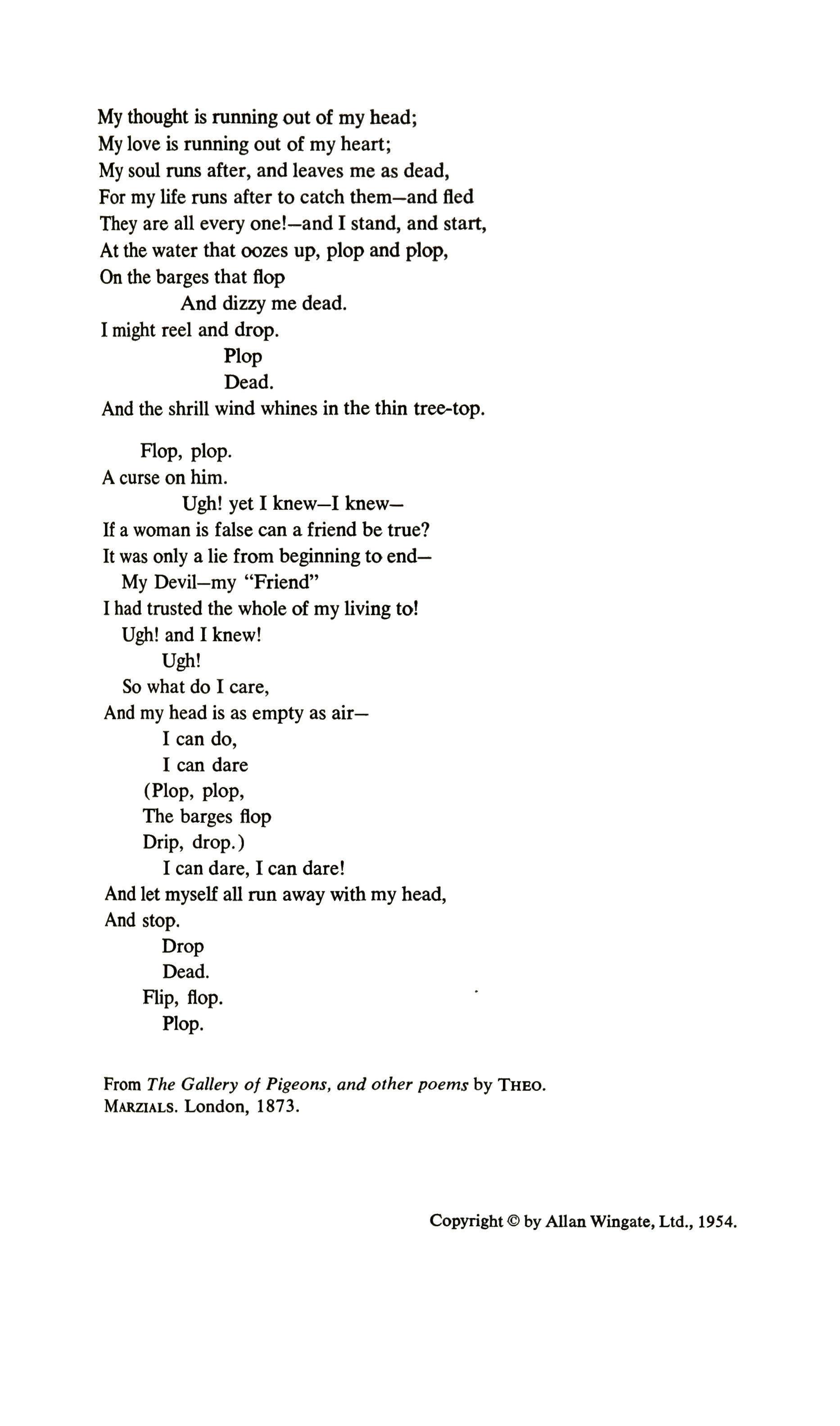
Copyright © by Allan Wingate, Ltd., 1954.
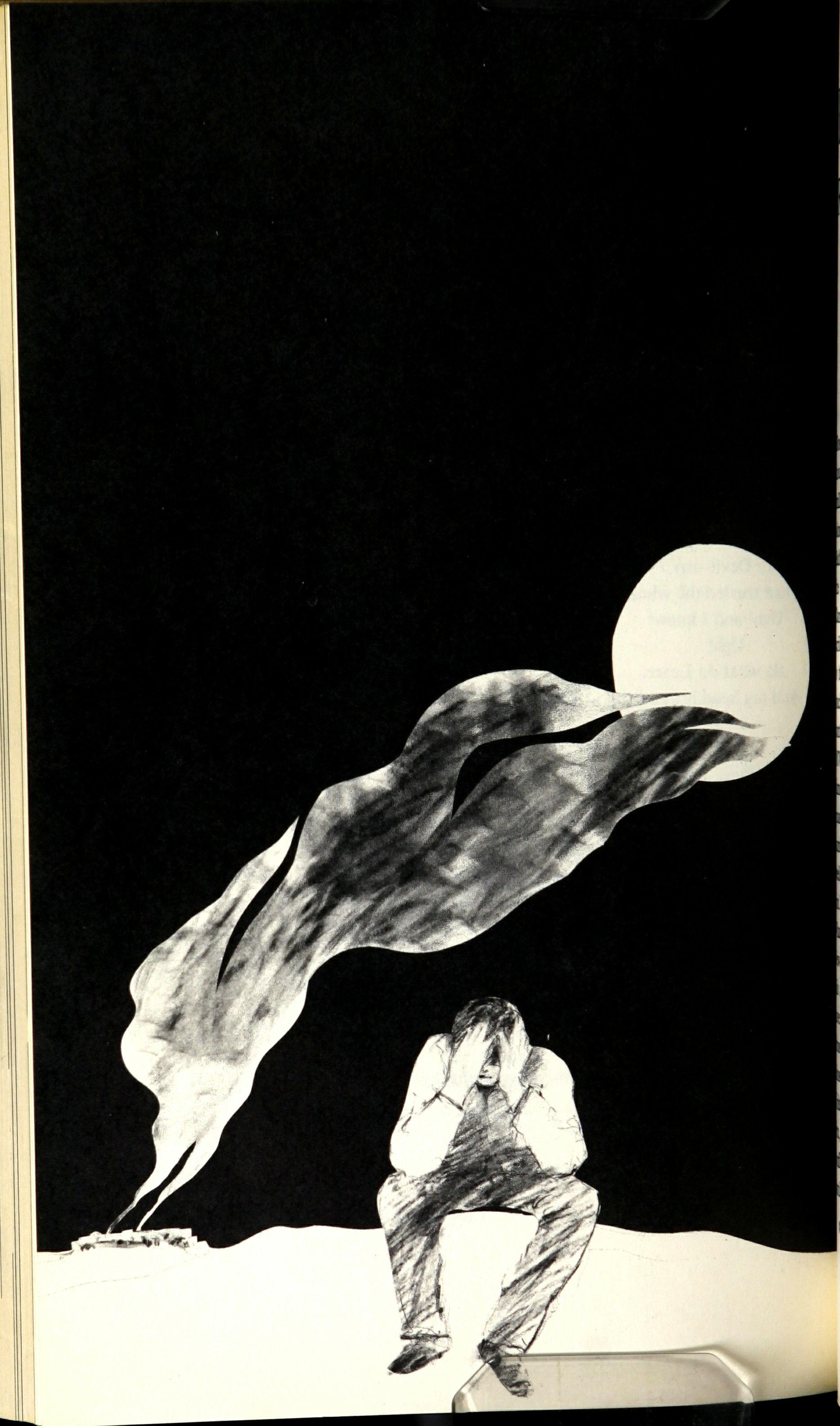
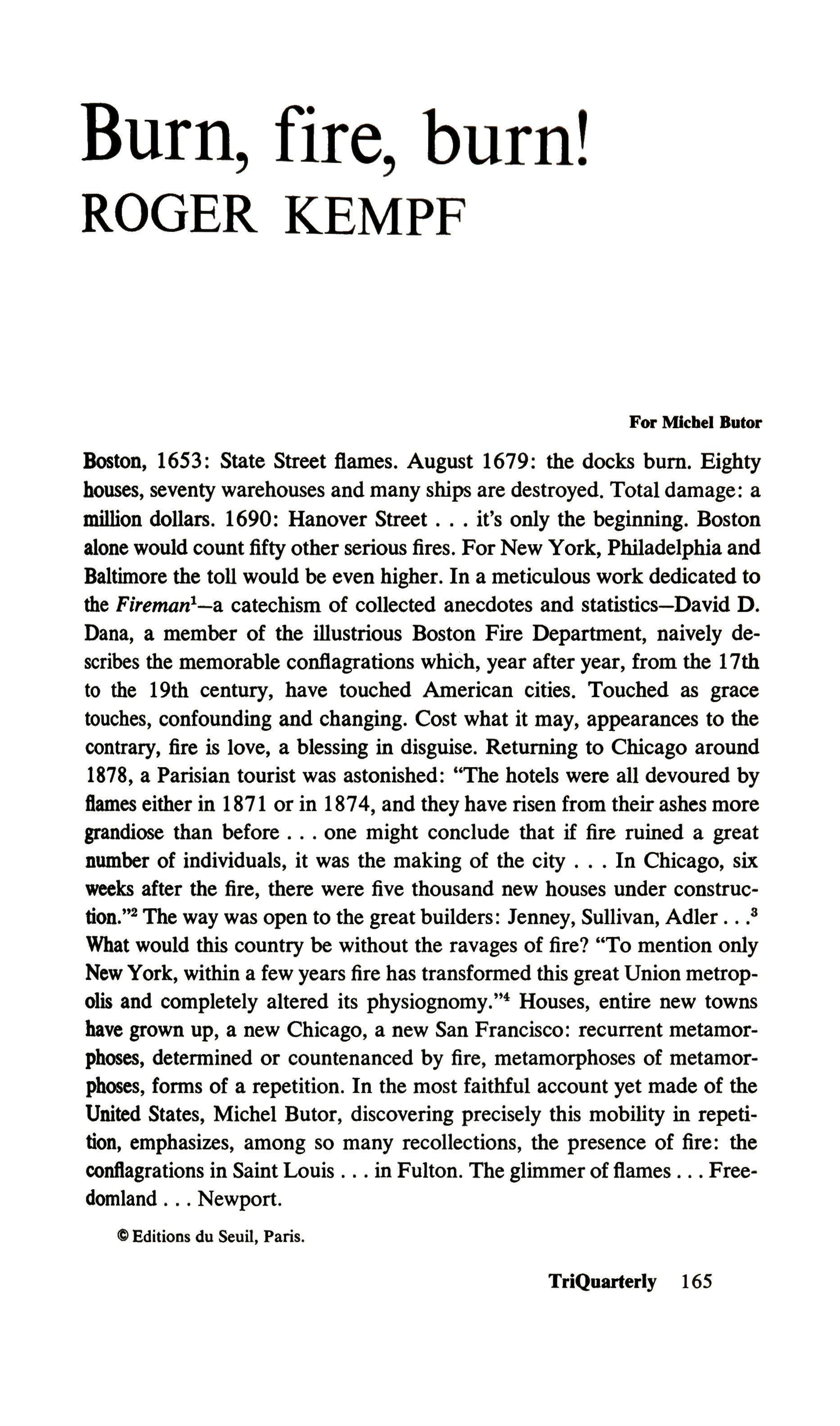
Boston, 1653: State Street Baines. August 1679: the docks bum. Eighty houses, seventy warehouses and many ships are destroyed. Total damage: a million dollars. 1690: Hanover Street it's only the beginning. Boston alone would count fifty other serious fires. For New York, Philadelphia and Baltimore the toll would be even higher. In a meticulous work dedicated to the Fireman' a catechism of collected anecdotes and statistics David D. Dana, a member of the illustrious Boston Fire Department, naively describes the memorable conflagrations which, year after year, from the 17th to the 19th century, have touched American cities. Touched as grace touches, confounding and changing. Cost what it may, appearances to the contrary, fire is love, a blessing in disguise. Returning to Chicago around 1878, a Parisian tourist was astonished: "The hotels were all devoured by flames either in 1871 or in 1874, and they have risen from their ashes more grandiose than before one might conclude that if fire ruined a great number of individuals, it was the making of the city In Chicago, six weeks after the fire, there were five thousand new houses under construetion."2 The way was open to the great builders: Jenney, Sullivan, Adler 8 What would this country be without the ravages of fire? "To mention only New York, within a few years fire has transformed this great Union metropolis and completely altered its physiognomy.?' Houses, entire new towns have grown up, a new Chicago, a new San Francisco: recurrent metamorphoses, determined or countenanced by fire, metamorphoses of metamorphoses, forms of a repetition. In the most faithful account yet made of the United States, Michel Butor, discovering precisely this mobility in repetition, emphasizes, among so many recollections, the presence of fire: the conflagrations in Saint Louis in Fulton. The glimmer of Baines Freedomland Newport.
@ Editions du Seuil, Paris.
For Michel Butor
TriQu&rterly 165
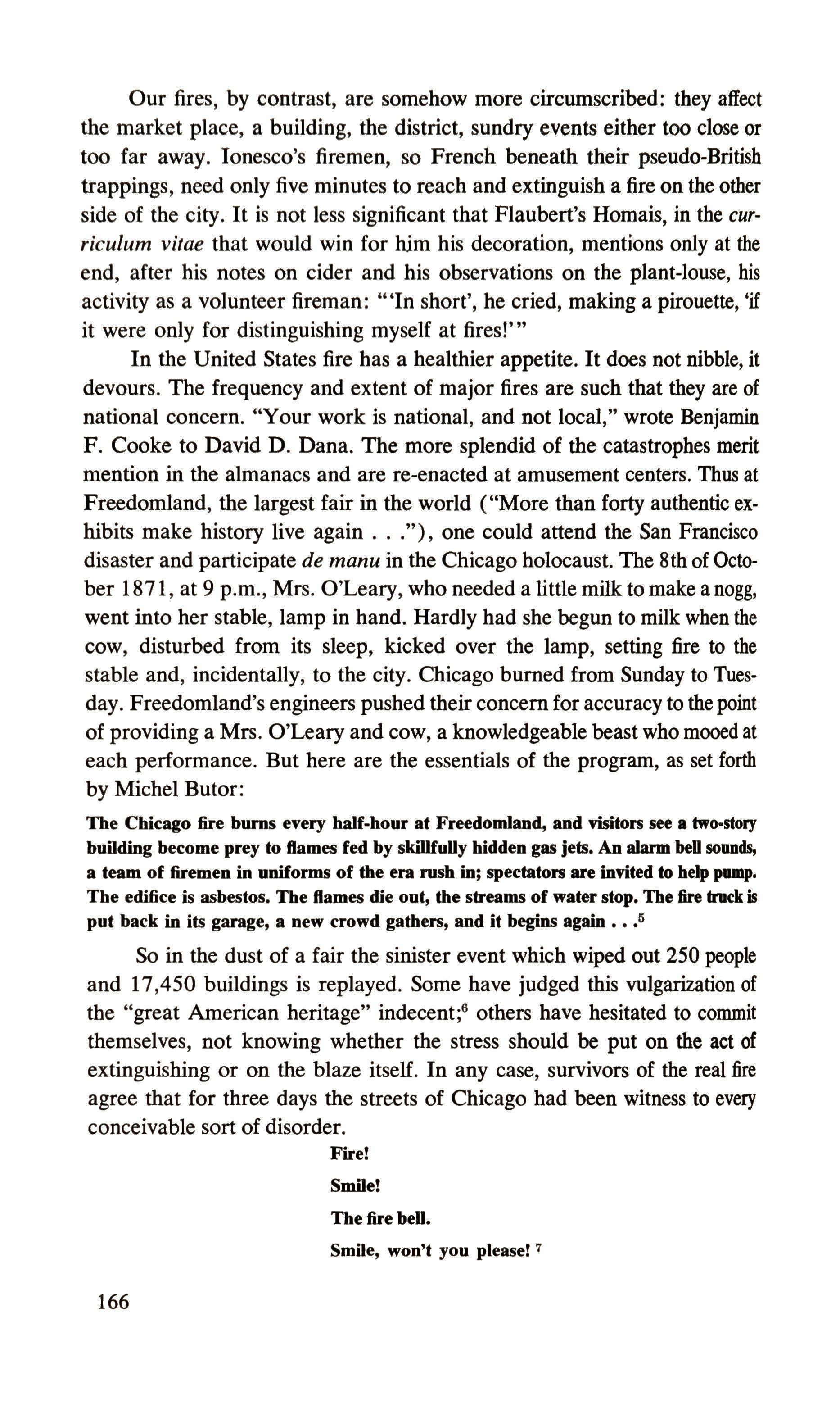
Our fires, by contrast, are somehow more circumscribed: they affect the market place, a building, the district, sundry events either too close or too far away. Ionesco's firemen, so French beneath their pseudo-British trappings, need only five minutes to reach and extinguish a fire on the other side of the city. It is not less significant that Flaubert's Homais, in the curriculum vitae that would win for rum his decoration, mentions only at the end, after his notes on cider and his observations on the plant-louse, his activity as a volunteer fireman: "'In short', he cried, making a pirouette, 'if it were only for distinguishing myself at fires!'"
In the United States fire has a healthier appetite. It does not nibble, it devours. The frequency and extent of major fires are such that they are of national concern. "Your work is national, and not local," wrote Benjamin F. Cooke to David D. Dana. The more splendid of the catastrophes merit mention in the almanacs and are re-enacted at amusement centers. Thus at Freedomland, the largest fair in the world ("More than forty authentic exhibits make history live again ."), one could attend the San Francisco disaster and participate de manu in the Chicago holocaust. The 8th of October 1871, at 9 p.m., Mrs. O'Leary, who needed a little milk to make a nogg, went into her stable, lamp in hand. Hardly had she begun to milk when the cow, disturbed from its sleep, kicked over the lamp, setting fire to the stable and, incidentally, to the city. Chicago burned from Sunday to Tuesday. Freedomland's engineers pushed their concern for accuracy to the point of providing a Mrs. O'Leary and cow, a knowledgeable beast who mooed at each performance. But here are the essentials of the program, as set forth by Michel Butor:
The Chicago fire bl'. ns every half-hour at FreedomJand, and visitors see a two-story building become prey to flames fed by skillfully hidden gas jets. An alar••1 beD sounds, a team of firemen in UnifOt.IIS of the era rush in; spectators a. e invited to help pomp. The edifice is asbestos. The flames die out, the streams of water stop. The fire truck is put back in its garage, a new crowd gathers, and it begins again 6
So in the dust of a fair the sinister event which wiped out 250 people and 17,450 buildings is replayed. Some have judged this vulgarization of the "great American heritage" indecent;" others have hesitated to commit themselves, not knowing whether the stress should be put on the act of extinguishing or on the blaze itself. In any case, survivors of the real fire agree that for three days the streets of Chicago had been witness to every conceivable sort of disorder.
Fire!
Smile!
The fire beD.
Smile, won't you please! 7
166

In front of a pile of charred debris I have seen a woman and two children, their eyes full of tears, smile for the television cameras
FREEDOMLAND VOLUNTEER
FIRE DEPARTMENT
DRILL SCHEDULE
CHICAGO FIRE NEXT FIRE 2 P.M.
But had not the Marquis de Chastellux, noting the houses burned by the English on the road to Philadelphia, remarked: this debris is the image of passing, not long term adversity"?"
A FIRE A DAY
French travelers who very intelligently visited the United States between 1838 and 1878 were astounded by the importance of fire and firemen in American life. Michel Chevalier: "A European has no idea of the frequency and extent of fires in this country. We are informed by the latest news from Charleston that three hundred homes have been destroyed by flames. In New York and Philadelphia hardly a day passes without the sound of the fire bell."? Charles Olliffe: "It is possible that not a single night passes in the whole year in this 'Imperial City' without your beingviolently awakened, at least once, by the dread cry of Fire! Firel, taken up simultaneously by the hoarse voices of several hundreds of people whose rapid steps you hear beneath your window, mingled with the clanging of the fire engines.?" I.-I. Ampere: "It is rare when a day passes in New York without fire breaking out in some district.T'!
The frequency of fire suggests negligence, precipitation or cupidity." "In the matter of fires," reports Michel Chevalier, "the Americans show a unique carelessness, in their New York homes as well as on their Mississippi steamboats. They smoke nonchalantly in the midst of half-open cotton bales with which the ship is loaded "13 Already in the 18th century smokers were considered dangerous for the city. In Philadelphia anyone smoking on the street was fined, in this way contributing to the purchase of a new fire truck. It was in this city, let us remember, that in 1136 Franklin and his friends founded the Union Fire Company, an association for mutual assistance, one of the first fire battalions. No one was more concerned about
167
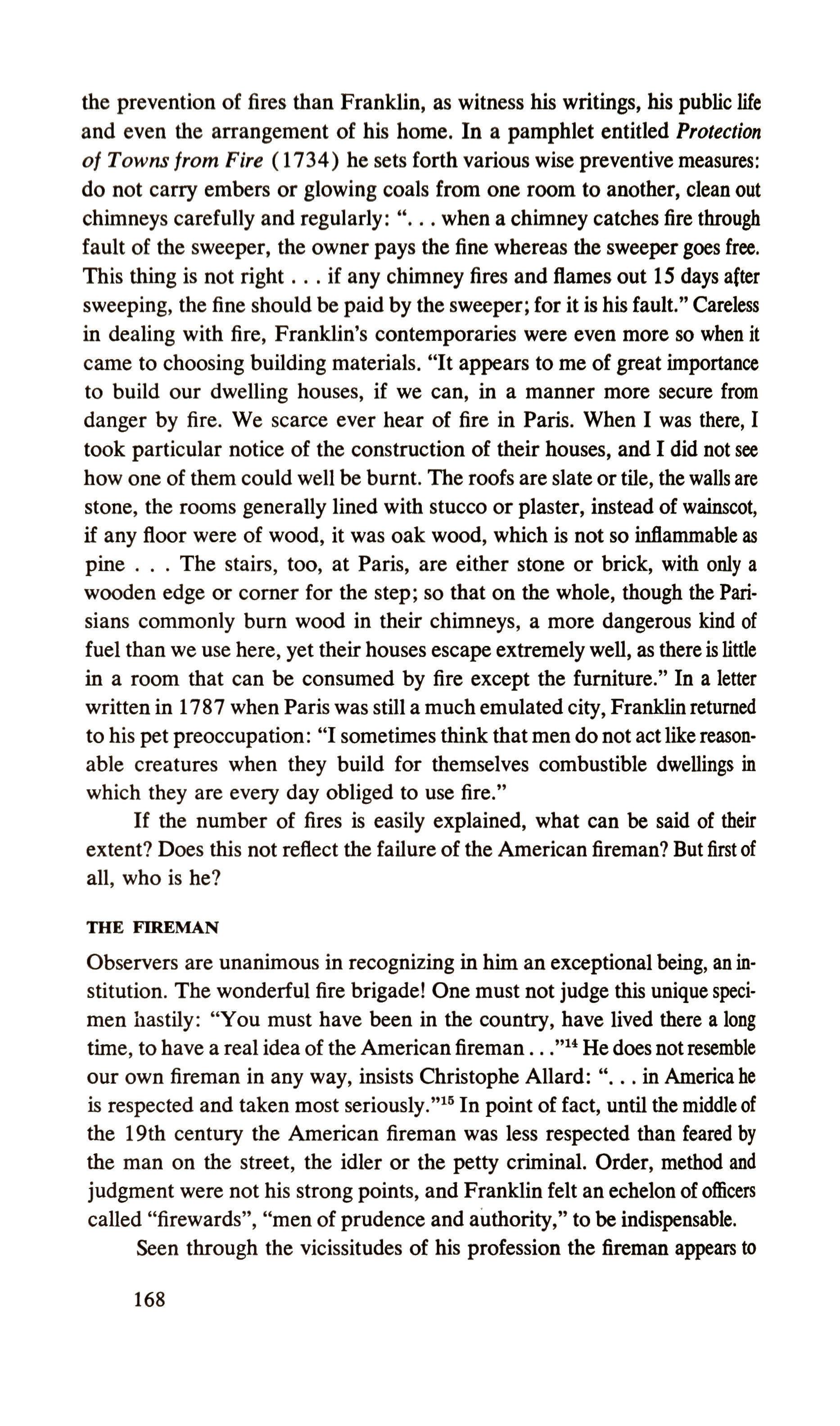
the prevention of fires than Franklin, as witness his writings, his public life and even the arrangement of his home. In a pamphlet entitled Protection of Towns from Fire (1734) he sets forth various wise preventive measures: do not carry embers or glowing coals from one room to another, clean out chimneys carefully and regularly: when a chimney catches fire through fault of the sweeper, the owner pays the fine whereas the sweeper goes free. This thing is not right if any chimney fires and flames out 15 days after sweeping, the fine should be paid by the sweeper; for it is his fault." Careless in dealing with fire, Franklin's contemporaries were even more so when it came to choosing building materials. "It appears to me of great importance to build our dwelling houses, if we can, in a manner more secure from danger by fire. We scarce ever hear of fire in Paris. When I was there, I took particular notice of the construction of their houses, and I did not see how one of them could well be burnt. The roofs are slate or tile, the walls are stone, the rooms generally lined with stucco or plaster, instead of wainscot, if any floor were of wood, it was oak wood, which is not so inflammable as pine The stairs, too, at Paris, are either stone or brick, with only a wooden edge or comer for the step; so that on the whole, though the Parisians commonly bum wood in their chimneys, a more dangerous kind of fuel than we use here, yet their houses escape extremely well, as there is little in a room that can be consumed by fire except the furniture." In a letter written in 1787 when Paris was still a much emulated city, Franklin returned to his pet preoccupation: "I sometimes think that men do not act like reasonable creatures when they build for themselves combustible dwellings in which they are every day obliged to use fire."
If the number of fires is easily explained, what can be said of their extent? Does this not reflect the failure of the American fireman? But first of all, who is he?
THE FIREMAN
Observers are unanimous in recognizing in him an exceptional being, an institution. The wonderful fire brigade! One must not judge this unique specimen hastily: "You must have been in the country, have lived there a long time, to have a real idea of the American fireman "1i He does not resemble our own fireman in any way, insists Christophe Allard: in America he is respected and taken most seriously. "11i In point of fact, until the middle of the 19th century the American fireman was less respected than feared by the man on the street, the idler or the petty criminal. Order, method and judgment were not his strong points, and Franklin felt an echelon of officers called "firewards", "men of prudence and authority," to be indispensable. Seen through the vicissitudes of his profession the fireman appears to
168
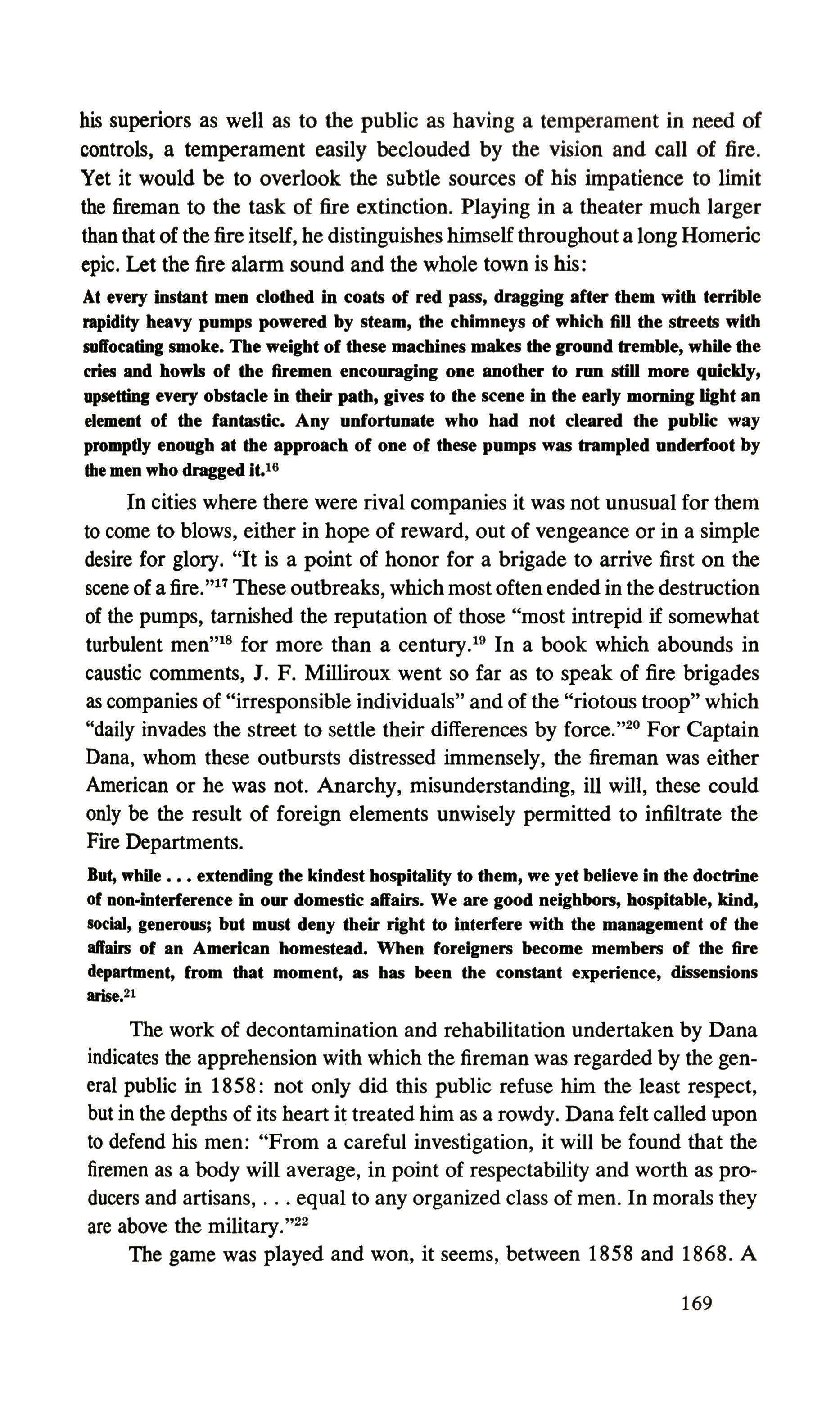
his superiors as well as to the public as having a temperament in need of controls, a temperament easily beclouded by the vision and call of fire. Yet it would be to overlook the subtle sources of his impatience to limit the fireman to the task of fire extinction. Playing in a theater much larger than that of the fire itself, he distinguishes himself throughout a long Homeric epic. Let the fire alarIII sound and the whole town is his:
At every instant men clothed in coats of red pass, dragging after them with terrible rapidity heavy pumps powered by steam, the chimneys of which fiD the streets with suffocating smoke. The weight of these machines makes the ground tremble, while the cries and howls of the firemen encouraging one another to I"n still more quickly, upsetting every obstacle in their path, gives to the scene in the early mOI ing light an element of the fantastic. Any unfortunate who had not cleared the public way prompOy enough at the approach of one of these pumps was trampled underfoot by the men who dragged it.16
In cities where there were rival companies it was not unusual for them to come to blows, either in hope of reward, out of vengeance or in a simple desire for glory. "It is a point of honor for a brigade to arrive first on the scene of a fire.'?" These outbreaks, which most often ended in the destruction of the PlII)]PS, tarnished the reputation of those "most intrepid if somewhat turbulent men?" for more than a century." In a book which abounds in caustic comments, J. F. Milliroux went so far as to speak of fire brigades as companies of "irresponsible individuals" and of the "riotous troop" which "daily invades the street to settle their differences by force."?" For Captain Dana, whom these outbursts distressed immensely, the fireman was either American or he was not. Anarchy, misunderstanding, ill will, these could only be the result of foreign elements unwisely permitted to infiltrate the Fire Departments.
But, while extending the kindest hospitality to them, we yet believe in the doctIioe of non-interference in our domestic affairs. We are good neighbors, hospitable, kind, social, generons; but must deny their right to interfere with the management of the affaiIS of an American homestead. When foreigners become members of the fire department, from that moment, as has been the constant experience, dissensions arise.21
The work of decontamination and rehabilitation undertaken by Dana indicates the apprehension with which the fireman was regarded by the general public in 1858: not only did this public refuse hiIn the least respect, but in the depths of its heart it treated him as a rowdy. Dana felt called upon to defend his men: "From a careful investigation, it will be found that the firemen as a body will average, in point of respectability and worth as producers and artisans, equal to any organized class of men. In morals they are above the military.'?"
The game was played and won, it seems, between 1858 and 1868. A
169
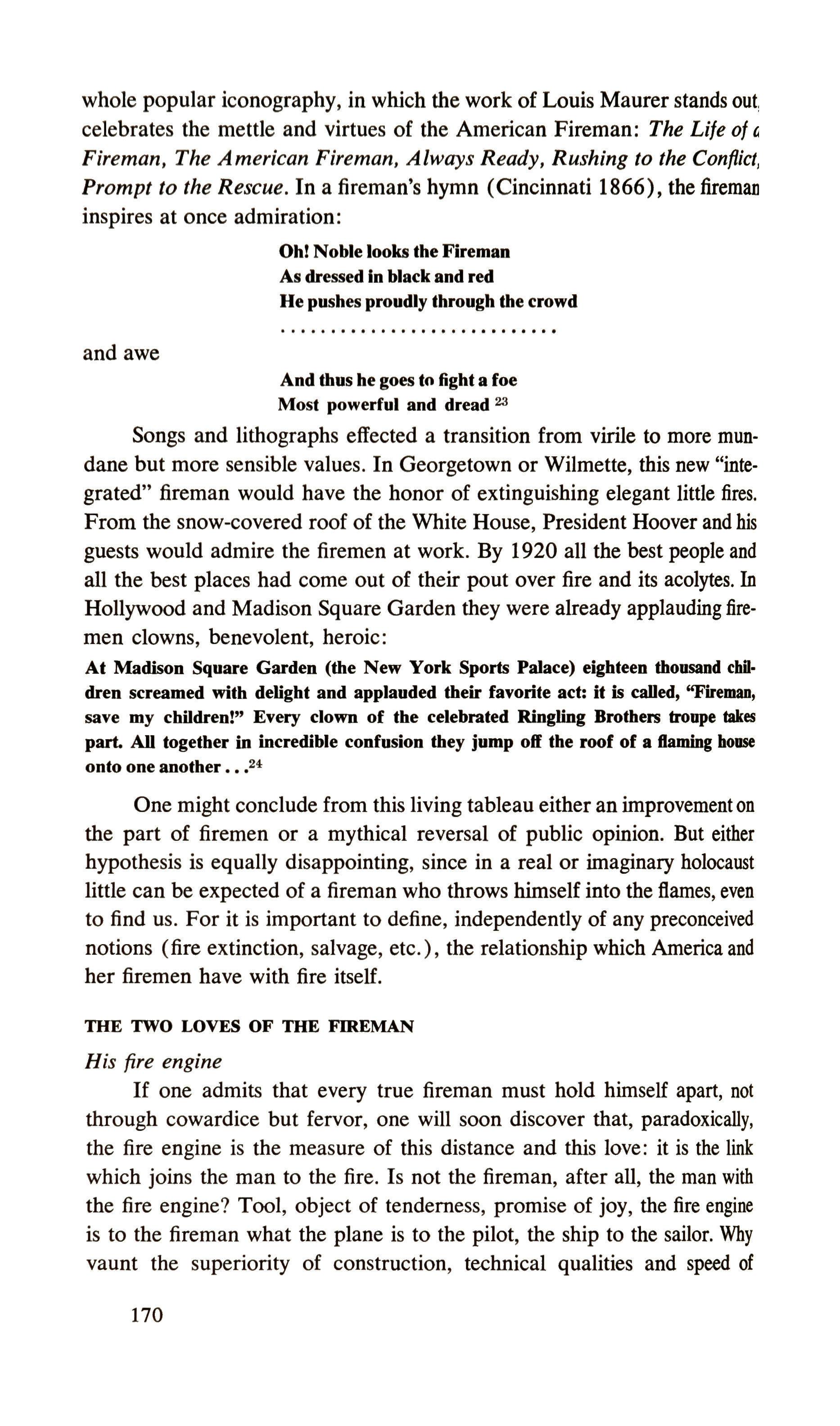
whole popular iconography, in which the work of Louis Maurer stands out: celebrates the mettle and virtues of the American Fireman: The Life of � Fireman, The American Fireman, Always Ready, Rushing to the Conflict, Prompt to the Rescue. In a fireman's hymn (Cincinnati 1866), the fireman inspires at once admiration:
Oh! Noble looks the Fireman
As dressed In black and red
He pushes proudly through the crowd and awe
And thus he goes to fight a foe
Most powerful and dread 23
Songs and lithographs effected a transition from virile to more mundane but more sensible values. In Georgetown or Wilmette, this new "integrated" fireman would have the honor of extinguishing elegant little fires. From the snow-covered roof of the White House, President Hoover and his guests would admire the firemen at work. By 1920 all the best people and all the best places had come out of their pout over fire and its acolytes. In Hollywood and Madison Square Garden they were already applauding firemen clowns, benevolent, heroic:
At Madison Square Garden (the New York Sports Palace) eighteen thousand chOdren screamed with delight and applauded their favorite act: it is called, "Fireman, save my children!" Every clown of the celebrated Ringling Brothers troupe takes part. All together in incredible confusion they jump off the roof of a flaming house onto one another 24
One might conclude from this living tableau either an improvement on the part of firemen or a mythical reversal of public opinion. But either hypothesis is equally disappointing, since in a real or imaginary holocaust little can be expected of a fireman who throws himself into the flames, even to find us. For it is important to define, independently of any preconceived notions (fire extinction, salvage, etc.), the relationship which America and her firemen have with fire itself.
lRE l'WO LOVES OF 'IRE FIREMAN
His fire engine
If one admits that every true fireman must hold himself apart, not through cowardice but fervor, one will soon discover that, paradoxically, the fire engine is the measure of this distance and this love: it is the link which joins the man to the fire. Is not the fireman, after all, the man with the fire engine? Tool, object of tenderness, promise of joy, the fire engine is to the fireman what the plane is to the pilot, the ship to the sailor. Why vaunt the superiority of construction, technical qualities and speed of
170
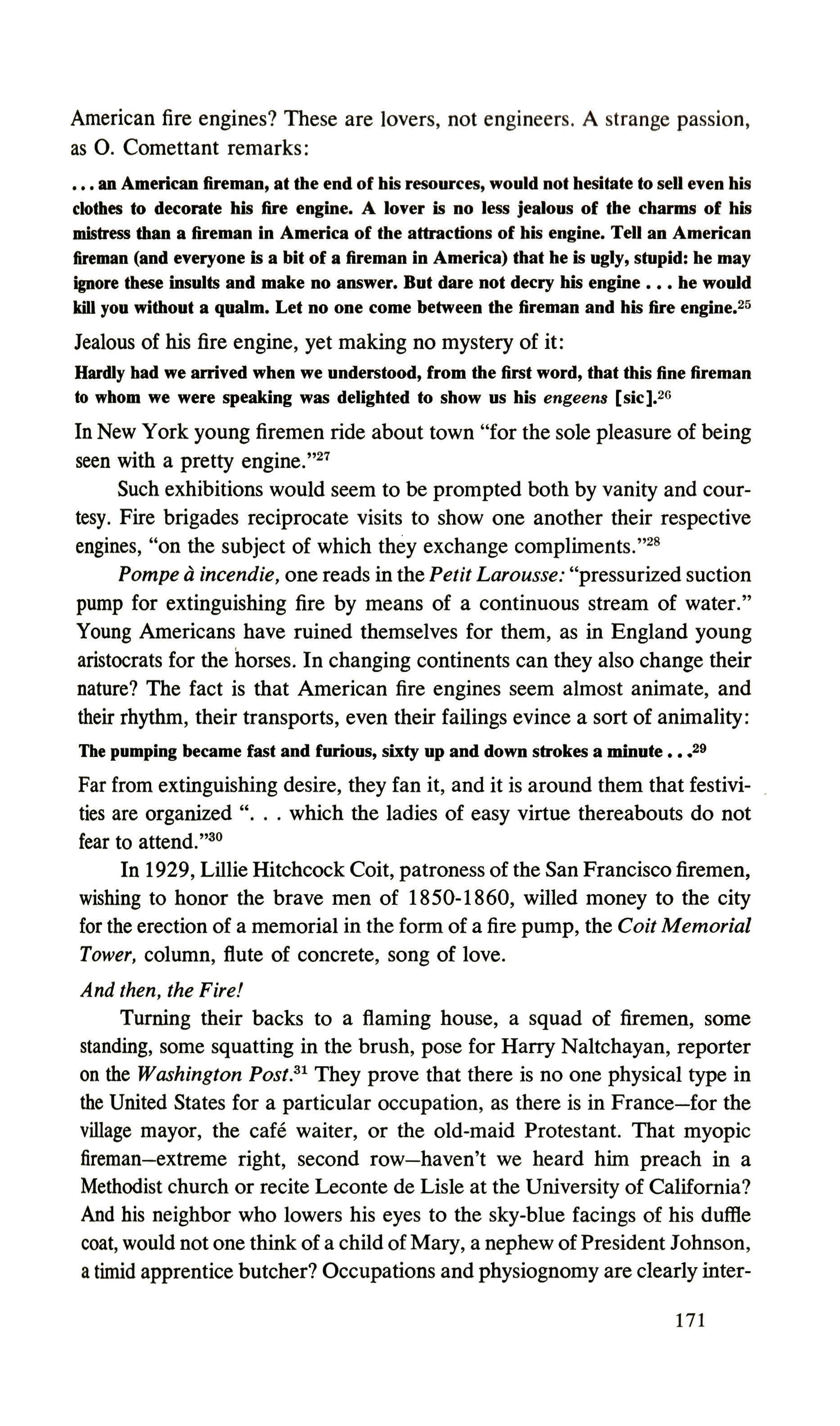
American fire engines? These are lovers, not engineers. A strange passion, as O. Comettant remarks:
an American fireman, at the end of his resources, would not hesitate to seD even his clothes to decorate his fire engine. A lover is no less jealous of the cba.'.lls of his mistress than a fireman in America of the atbactions of his engine. Tell an American fireman (and everyone is a bit of a fireman in America) that he is ugly, stupid: he may ignore these insults and make no answer. But dare not decry his engine he would kill you without a qualm. Let no one come between the fireman and his fire engine.25
Jealous of his fire engine, yet making no mystery of it:
Hardly had we arrived when we understood, from the first word, that this fine fireman to whom we were speaking was delighted to show us his engeens [sic].26
In New York young firemen ride about town "for the sole pleasure of being seen with a pretty engine. "27
Such exhibitions would seem to be prompted both by vanity and courtesy. Fire brigades reciprocate visits to show one another their respective engines, "on the subject of which they exchange compliments. "28
Pompe a incendie, one reads in the Petit Larousse.· "pressurized suction pump for extinguishing fire by means of a continuous stream of water." Young Americans have ruined themselves for them, as in England young aristocrats for the horses. In changing continents can they also change their nature? The fact is that American fire engines seem almost animate, and their rh , their transports, even their failings evince a sort of animality: The pumping became fast and furious, sixty up and down strokes a inute 29
Far from extinguishing desire, they fan it, and it is around them that festivities are organized ". which the ladies of easy virtue thereabouts do not fear to attend. "30
In 1929, Lillie Hitchcock Coit, patroness of the San Francisco firemen, wishing to honor the brave men of 1850-1860, willed money to the city for the erection of a memorial in the form of a fire pump, the Coit Memorial Tower, column, flute of concrete, song of love.
And then, the Fire!
Turning their backs to a flaming house, a squad of firemen, some standing, some squatting in the brush, pose for Harry Naltchayan, reporter on the Washington Post.31 They prove that there is no one physical type in the United States for a particular occupation, as there is in France for the village mayor, the cafe waiter, or the old-maid Protestant. That myopic fireman extreme right, second row haven't we heard him preach in a Methodist church or recite Leconte de Lisle at the University of California? And his neighbor who lowers his eyes to the sky-blue facings of his duffle coat, would not one think of a child ofMary, a nephew of President Johnson, a timid apprentice butcher? Occupations and physiognomy are clearly inter-
171
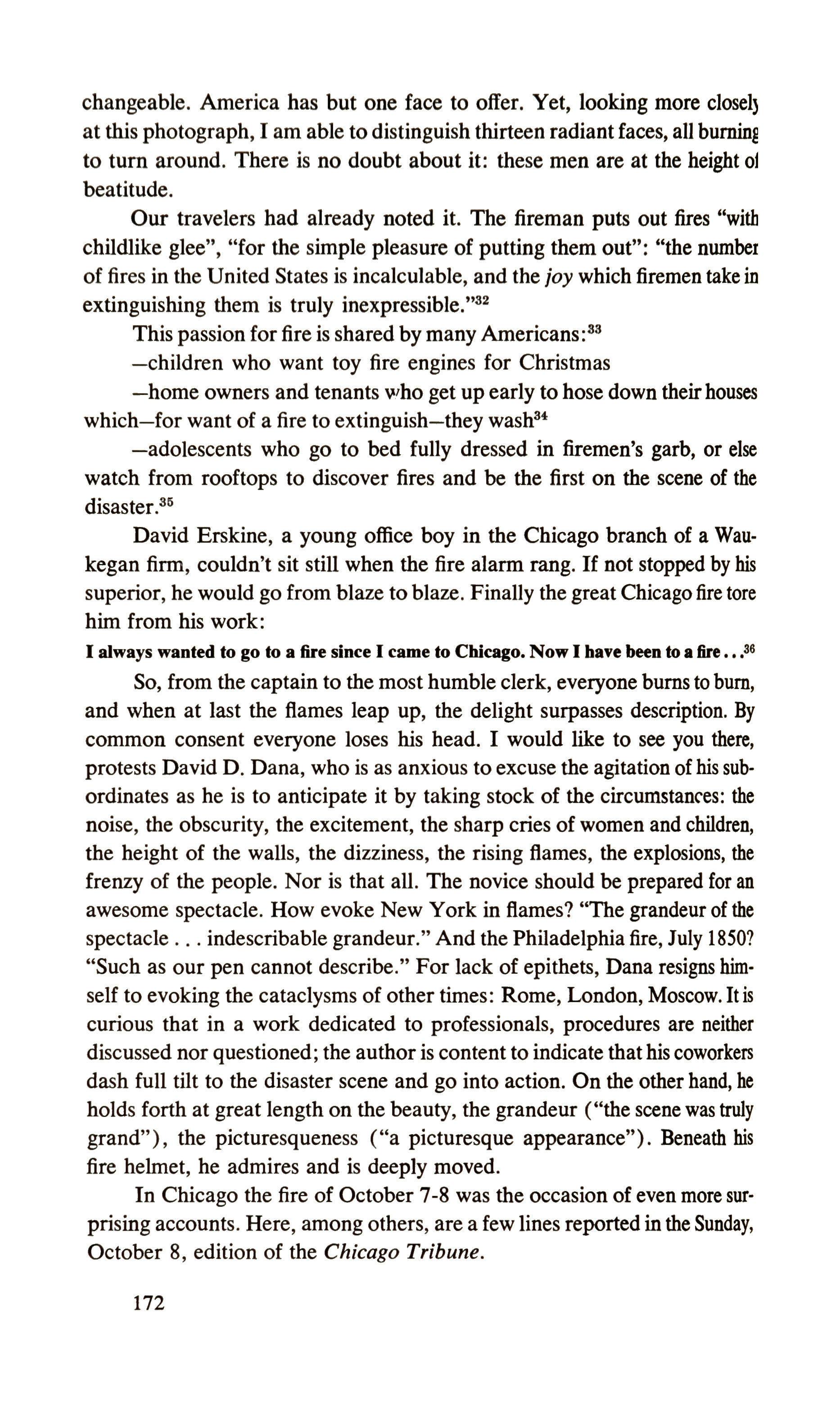
changeable. America has but one face to offer. Yet, looking more closef at this photograph, I am able to distinguish thirteen radiant faces, all burning to tum around. There is no doubt about it: these men are at the height 01 beatitude.
Our travelers had already noted it. The fireman puts out fires "with childlike glee", "for the simple pleasure of putting them out": "the number of fires in the United States is incalculable, and the joy which firemen take in extinguishing them is truly inexpressible."32
This passion for fire is shared by many Americans;" -children who want toy fire engines for Christmas -home owners and tenants who get up early to hose down theirhouses which for want of a fire to extinguish they wash" -adolescents who go to bed fully dressed in firemen's garb, or else watch from rooftops to discover fires and be the first on the scene of the disaster."
David Erskine, a young office boy in the Chicago branch of a Waukegan firm, couldn't sit still when the fire alarm rang. If not stopped by his superior, he would go from blaze to blaze. Finally the great Chicago fire tore him from his work:
I always wanted to go to a fire since I came to Chicago. Now I have been to a fire ,36
So, from the captain to the most humble clerk, everyone bums to bum, and when at last the flames leap up, the delight surpasses description. By common consent everyone loses his head. I would like to see you there, protests David D. Dana, who is as anxious to excuse the agitation of his subordinates as he is to anticipate it by taking stock of the circumstances: the noise, the obscurity, the excitement, the sharp cries of women and children, the height of the walls, the dizziness, the rising flames, the explosions, the frenzy of the people. Nor is that all. The novice should be prepared for an awesome spectacle. How evoke New York in flames? "The grandeur of the spectacle indescribable grandeur." And the Philadelphia fire, July 1850? "Such as our pen cannot describe." For lack of epithets, Dana resigns himself to evoking the cataclysms of other times: Rome, London, Moscow. It is curious that in a work dedicated to professionals, procedures are neither discussed nor questioned; the author is content to indicate that his coworkers dash full tilt to the disaster scene and go into action. On the other hand, he holds forth at great length on the beauty, the grandeur ("the scene was truly grand"), the picturesqueness ("a picturesque appearance"). Beneath his fire helmet, he admires and is deeply moved.
In Chicago the fire of October 7-8 was the occasion of even more surprising accounts. Here, among others, are a few lines reported in the Sunday, October 8, edition of the Chicago Tribune.
172
Late as it was, the splendor of the flames and the wonderful brilliancy of the sky Wde such as to atbact enormous crowds from every quarter The bridge and the approach on Madison Street were covered with men and women alone and together -'who found there a favorable point for watching the flames
Hardly had the Hebards heard about the fire when they rushed for the elevator of their hotel the Palmer House to reach the roof garden on the top floor. They appreciated as connoisseurs (the scene was surely not without a certain interest) "a charming theme for description." Even more unexpected is the account of the former Lt.-Governor Bross, at once a spectator and a victim, The loss of most of his holdings (among them the Nevada Hotel and a mansion on Michigan Avenue) did not keep him from proclaiming the magnificence of the event:
At this time the fire was the most grandly magnificent scene that one can conceive. The Court House, Post Office, Fai well Hall, Tremont House, ShE:llllan House, and all the splendid buildings on La Salle and Wells Street, were bUI'Iling with a sublimity of effect which awed me. All the adjectives in the language would fall to convey the intensity of its wonders.37
PRACIICE MAKES PERFECT
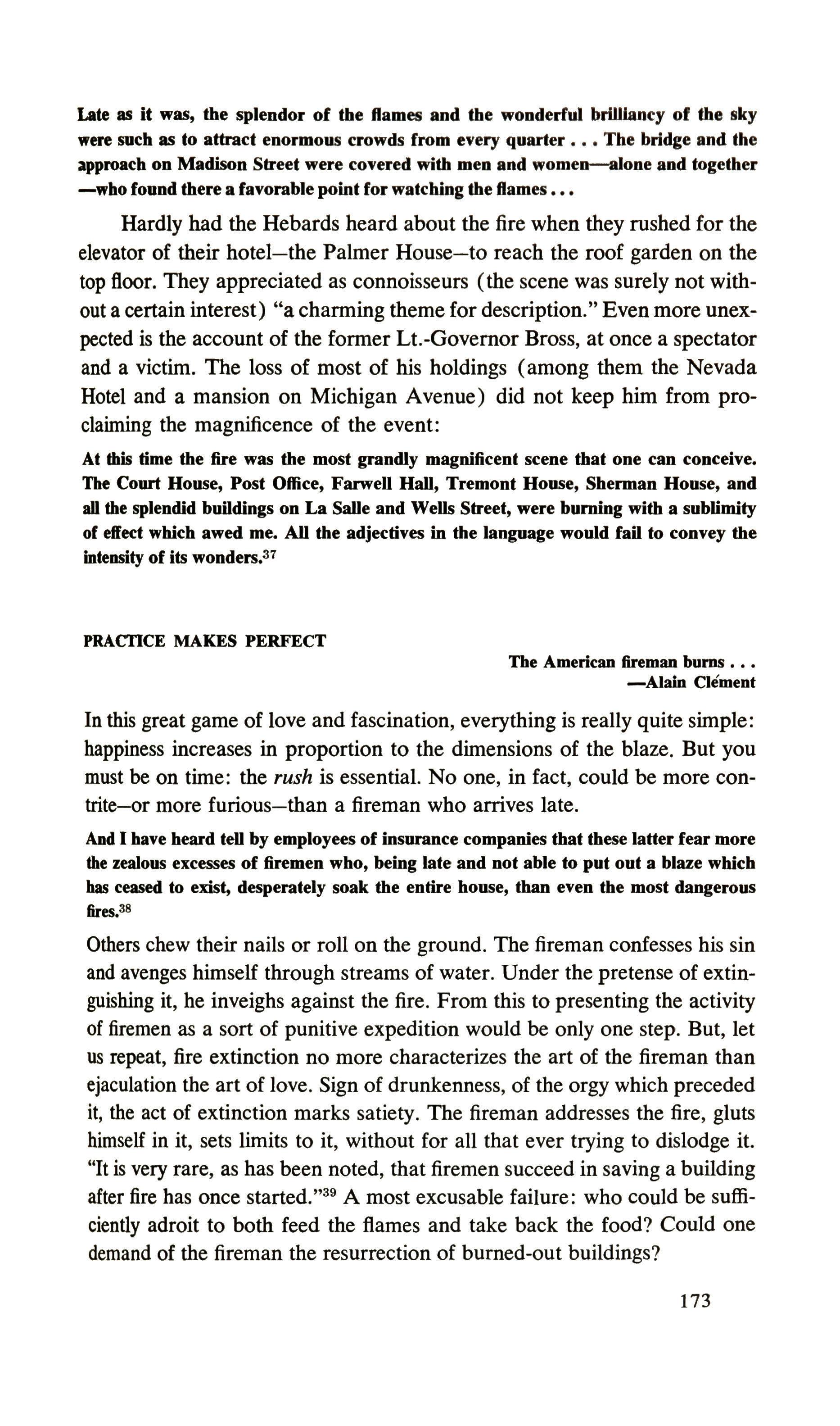
The American fireman bums -.Alain Clement
In this great game of love and fascination, everything is really quite simple: happiness increases in proportion to the dimensions of the blaze. But you must be on time: the rush is essential. No one, in fact, could be more contrite-or more furious than a fireman who arrives late.
And I have heard tell by employees of ins". ance companies that these latter fear more the zealous excesses of firemen who, being late and not able to put out a blaze which bas ceased to exist, desperately soak the entire house, than even the most dangerous fires.3S
Others chew their nails or roll on the ground. The fireman confesses his sin and avenges himself through streams of water. Under the pretense of extinguishing it, he inveighs against the fire. From this to presenting the activity of firemen as a sort of punitive expedition would be only one step. But, let us repeat, fire extinction no more characterizes the art of the fireman than ejaculation the art of love. Sign of drunkenness, of the orgy which preceded it, the act of extinction marks satiety. The fireman addresses the fire, gluts himself in it, sets limits to it, without for all that ever trying to dislodge it. "It is very rare, as has been noted, that firemen succeed in saving a building after fire has once started."?" A most excusable failure: who could be sufficiently adroit to both feed the flames and take back the food? Could one demand of the fireman the resurrection of burned-out buildings?
173
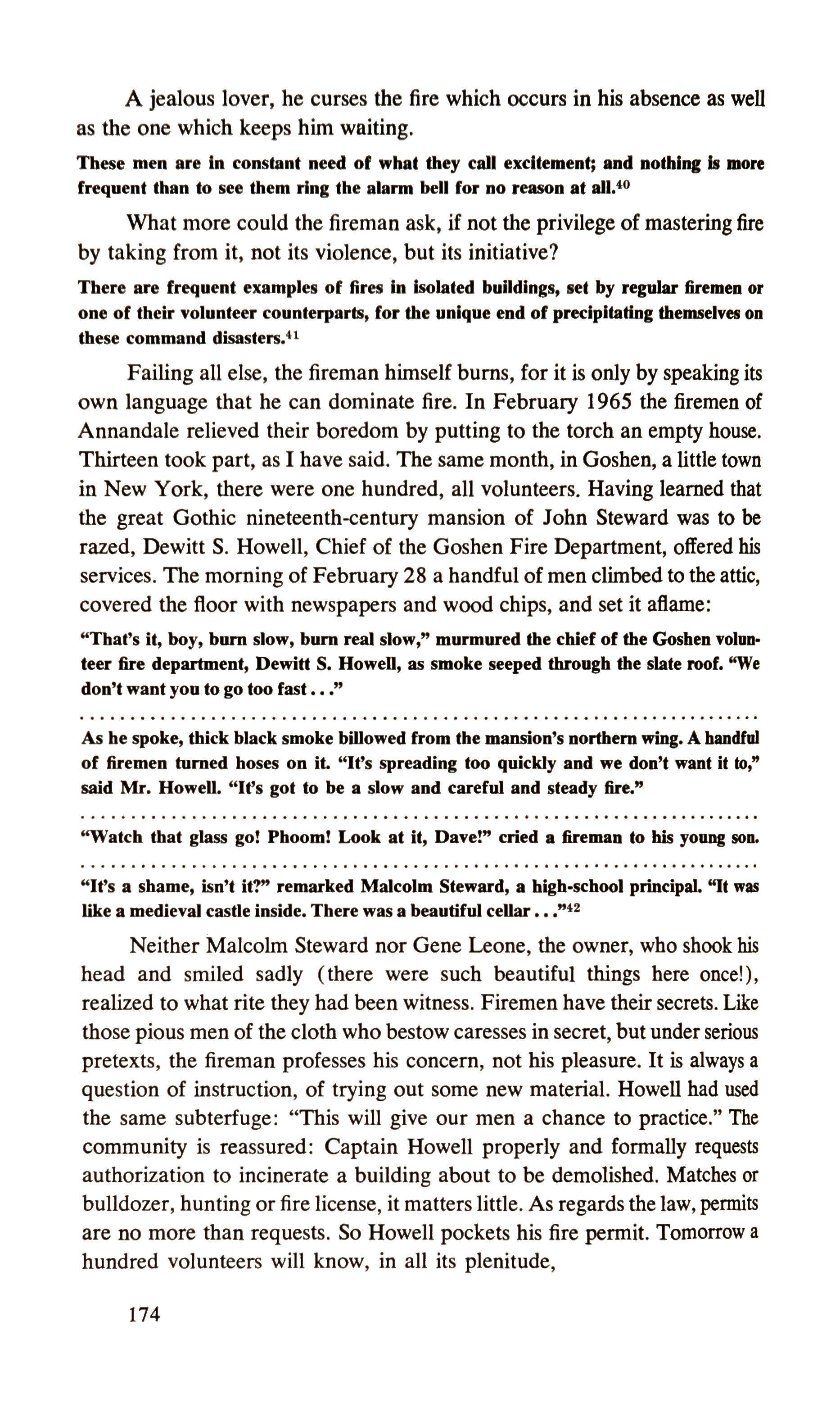
A jealous lover, he curses the fire which occurs in his absence as well as the one which keeps him waiting. These men are In constant need of what they call excitement; and nothing Is more frequent than to see them ring the alai III bell for no reason at all.4,O
What more could the fireman ask, if not the privilege of mastering fire by taking from it, not its violence, but its initiative?
There are frequent examples of fires In Isolated buildings, let by regular firemen or one of their volunteer counterparts, for the unique end of precipitating themselves on these command disasters.41
Failing all else, the fireman himself bums, for it is only by speaking its own language that he can dominate fire. In February 1965 the firemen of Annandale relieved their boredom by putting to the torch an empty house. Thirteen took part, as I have said. The same month, in Goshen, a little town in New York, there were one hundred, all volunteers. Having learned that the great Gothic nineteenth-century mansion of John Steward was to be razed, Dewitt S. Howell, Chief of the Goshen Fire Department, offered his services. The morning of February 28 a handful of men climbed to the attic, covered the floor with newspapers and wood chips, and set it aflame:
"That's it, boy, bnm slow, bum real slow," murmured the chief of the Goshen volun· teer fire department, Dewitt S. HoweD, as smoke seeped thlough the slate roof. "We don't want you to go too fast
As he spoke, thick black smoke billowed from the mansion's northern wing. A handful of firemen turned hoses on it. "It's spreading too quickly and we don't want it to," said Mr. HoweD. "Ifs got to be a slow and careful and steady fire."
"Watch that glass go! Phoom! Look at it, Dave!" cried a fireman to his young son.
"It's a shame, isn't it?" remarked Malcolm Steward, a high-school principal. "It was like a medieval castle inside. There was a beautiful cellar "4,2
Neither Malcolm Steward nor Gene Leone, the owner, who shook his head and smiled sadly (there were such beautiful things here oncel), realized to what rite they had been witness. Firemen have their secrets. Like those pious men of the cloth who bestow caresses in secret, but under serious pretexts, the fireman professes his concern, not his pleasure. It is always a question of instruction, of trying out some new material. Howell had used the same subterfuge: "This will give our men a chance to practice." The conununity is reassured: Captain Howell properly and formally requests authorization to incinerate a building about to be demolished. Matches or bulldozer, hunting or fire license, it matters little. As regards the law, permits are no more than requests. So Howell pockets his fire permit. Tomorrow a hundred volunteers will know, in all its plenitude,
174
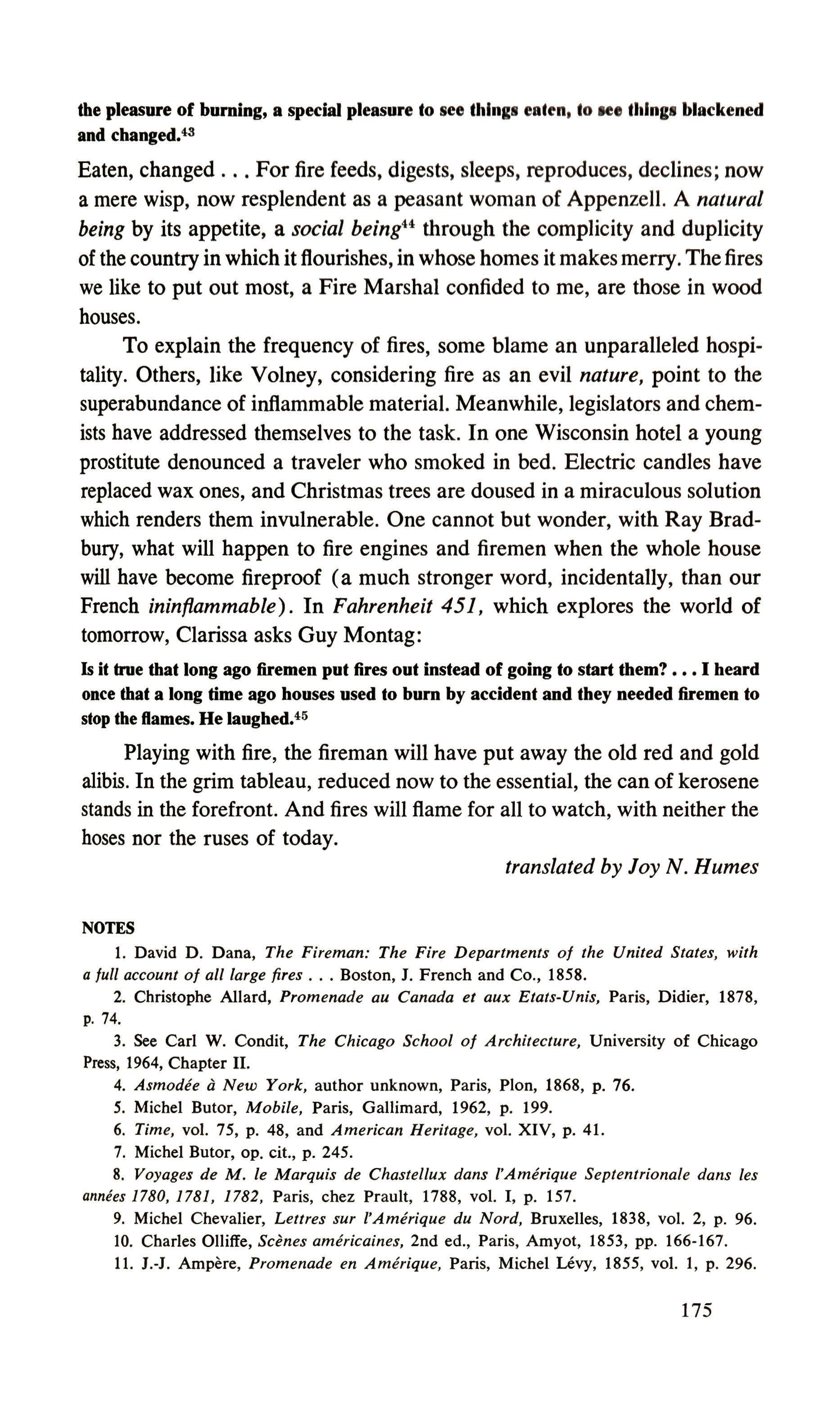
the pleasure of burning, a sp�iaI pleasure to see thinKS eaten, to H. tiling' blackened and cbanged.43
Eaten, changed For fire feeds, digests, sleeps, reproduces, declines; now a mere wisp, now resplendent as a peasant woman of Appenzell. A natural being by its appetite, a social being" through the complicity and duplicity of the country in which it flourishes, in whose homes it makes merry. The fires we like to put out most, a Fire Marshal confided to me, are those in wood houses.
To explain the frequency of fires, some blame an unparalleled hospitality. Others, like Volney, considering fire as an evil nature, point to the superabundance of inflammable material. Meanwhile, legislators and chemists have addressed themselves to the task. In one Wisconsin hotel a young prostitute denounced a traveler who smoked in bed. Electric candles have replaced wax ones, and Christmas trees are doused in a miraculous solution which renders them invulnerable. One cannot but wonder, with Ray Bradbury, what will happen to fire engines and firemen when the whole house will have become fireproof (a much stronger word, incidentally, than our French ininflammable). In Fahrenheit 451, which explores the world of tomorrow, Clarissa asks Guy Montag: Is it true that long ago firemen put fires out instead of going to start them? I heard once that a long time ago houses used to bum by accident and they needed firemen to stop the flames. He laughed.45
Playing with fire, the fireman will have put away the old red and gold alibis. In the grim tableau, reduced now to the essential, the can of kerosene stands in the forefront. And fires will flame for all to watch, with neither the hoses nor the ruses of today.
translated by Joy N. Humes
NOTES
1. David D. Dana, The Fireman: The Fire Departments of the United States, with a full account of all large fires Boston, 1. French and Co., 1858.
2. Christophe Allard, Promenade au Canada et aux Etats-Unis, Paris, Didier, 1878, p. 74.
3. See Carl W. Condit, The Chicago School of Architecture, University of Chicago Press, 1964, Chapter II.
4. Asmodee a New York, author unknown, Paris, PIon, 1868, p. 76.
5. Michel Butor, Mobile, Paris, Gallimard, 1962, p. 199.
6. Time, vol. 75, p. 48, and American Heritage, vol. XIV, p. 41.
7. Michel Butor, op. cit., p. 245.
8. Voyages de M. le Marquis de Chastellux dans l'Amerique Septentrionale dans les annees 1780,1781, 1782, Paris, chez Prault, 1788, vol. I, p. 157.
9. Michel Chevalier, Lettres sur TAmerique du Nord, Bruxelles, 1838, vol. 2, p. 96.
10. Charles Olliffe, Scenes americaines, 2nd ed., Paris, Amyot, 1853, pp. 166-167.
11. 1.-1. Ampere, Promenade en Amerique, Paris, Michel Levy, 1855, vol. 1, p. 296.
175
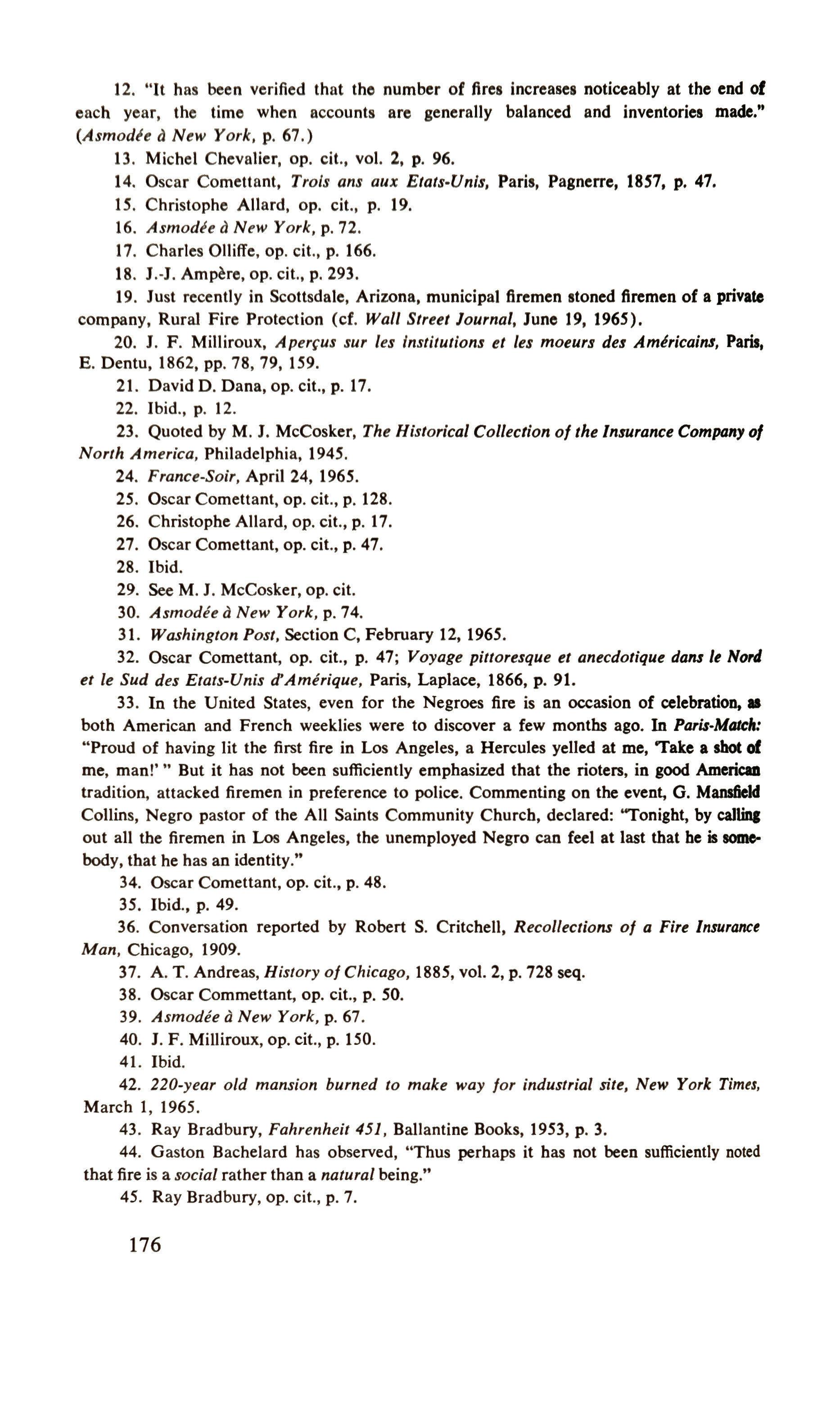
12. "It has been verified that the number of fires increases noticeably at the end of each year, the time when accounts are generally balanced and inventories made." (Asmodle d New York, p. 67.)
13. Michel Chevalier, op. cit., vol, 2, p. 96.
14. Oscar Comettant, Trois ans aux Etats-Unts, Paris, Pagnerre, 1857, p. 47,
IS. Christophe Allard, op. cit., p. 19.
16. Asmodee d New York, p. 72.
17. Charles Olliffe, op. cit., p. 166.
18. J.-J. Ampere, op. cit., p. 293.
19. Just recently in Scottsdale, Arizona, municipal firemen stoned firemen of a private company, Rural Fire Protection (cf. Wall Street Iournal, June 19, 1965).
20. J. F. Milliroux, Apercu» sur les institutions et les moeurs des Americains, Paris, E. Dentu, 1862, pp. 78, 79, 159.
21. David D. Dana, op. cit., p. 17.
22. Ibid., p. 12.
23. Quoted by M. J. McCosker, The Historical Collection of the Insurance Company 01 North America, Philadelphia, 1945.
24. France-Soir, April 24, 1965.
25. Oscar Comettant, op. cit., p. 128.
26. Christophe Allard, op. cit., p. 17.
27. Oscar Comettant, op. cit., p. 47.
28. Ibid.
29. See M. J. McCosker, op. cit.
30. Asmodee d New York, p. 74.
31. Washington Post, Section C, February 12, 1965.
32. Oscar Comettant, op. cit., p. 47; Voyage pittoresque et anecdotique dans te Nord et le Sud des Etats-Unis d'Amerique, Paris, Laplace, 1866, p. 91.
33. In the United States, even for the Negroes fire is an occasion of celebration, u both American and French weeklies were to discover a few months ago. In Paris-Match: "Proud of having lit the first fire in Los Angeles, a Hercules yelled at me, 'Take a shot of me, man!'" But it has not been sufficiently emphasized that the rioters, in good American tradition, attacked firemen in preference to police. Commenting on the event, G. Mansfielcl Collins, Negro pastor of the All Saints Community Church, declared: "Tonight, by callinl out all the firemen in Los Angeles, the unemployed Negro can feel at last that he is somebody, that he has an identity."
34. Oscar Comettant, op. cit., p. 48.
35. Ibid.• p. 49.
36. Conversation reported by Robert S. Critchell, Recollections of a Fire Insurance Man, Chicago, 1909.
37. A. T. Andreas, History of Chicago, 1885, vol. 2. p. 728 seq.
38. Oscar Commettant, op. cit., p. 50.
39. Asmodee d New York, p. 67.
40. J. F. Milliroux, op. cit., p. 150.
41. Ibid.
42. 220-year old mansion burned to make way for industrial site. New York Times, March 1, 1965.
43. Ray Bradbury, Fahrenheit 451, Ballantine Books, 1953, p. 3.
44. Gaston Bachelard has observed, "Thus perhaps it has not been sufficiently noted that fire is a social rather than a natural being."
45. Ray Bradbury, op. cit., p. 7.
176
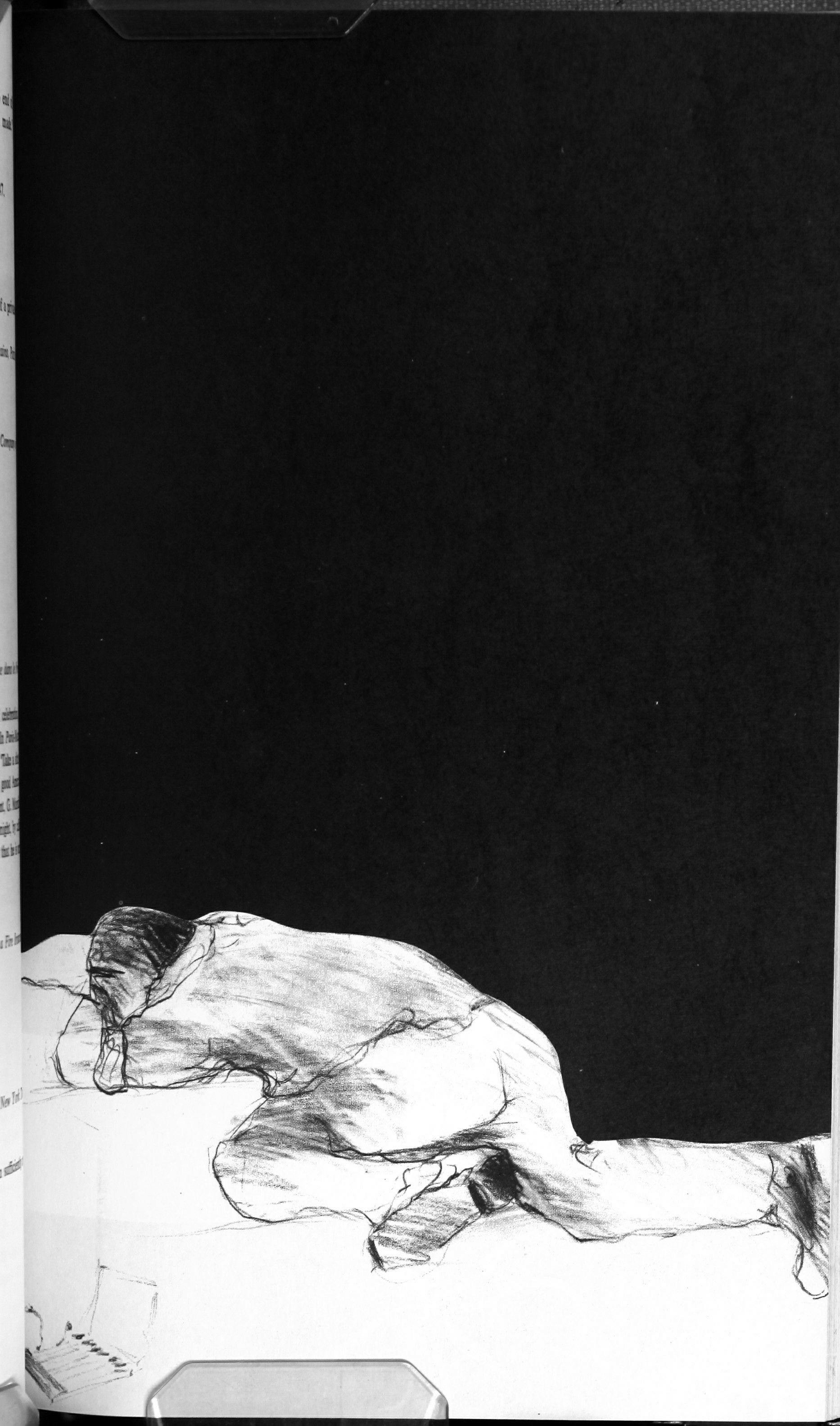
n. �
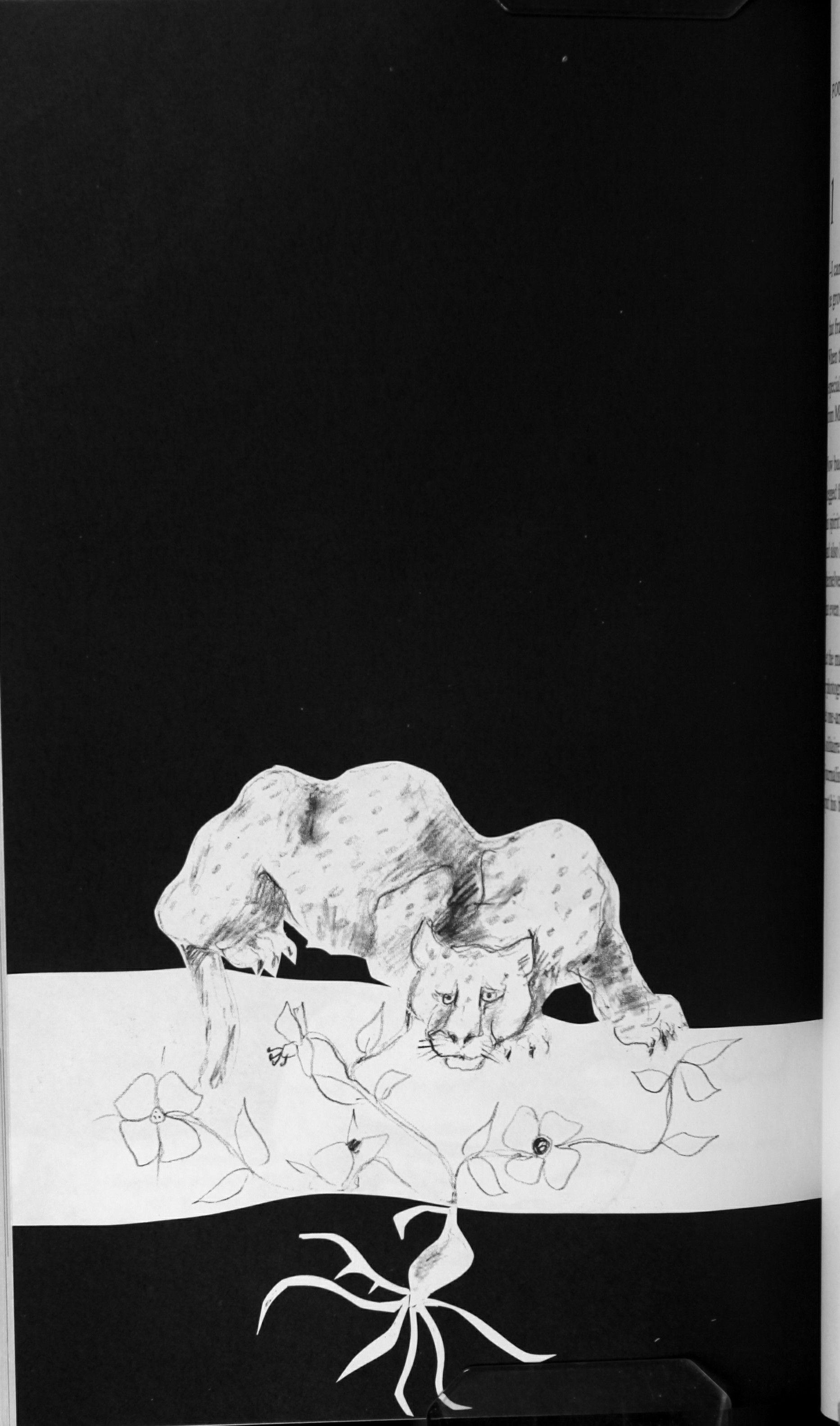
1#
FOUR DREAM SONGS
BY JOHN BERRYMAN
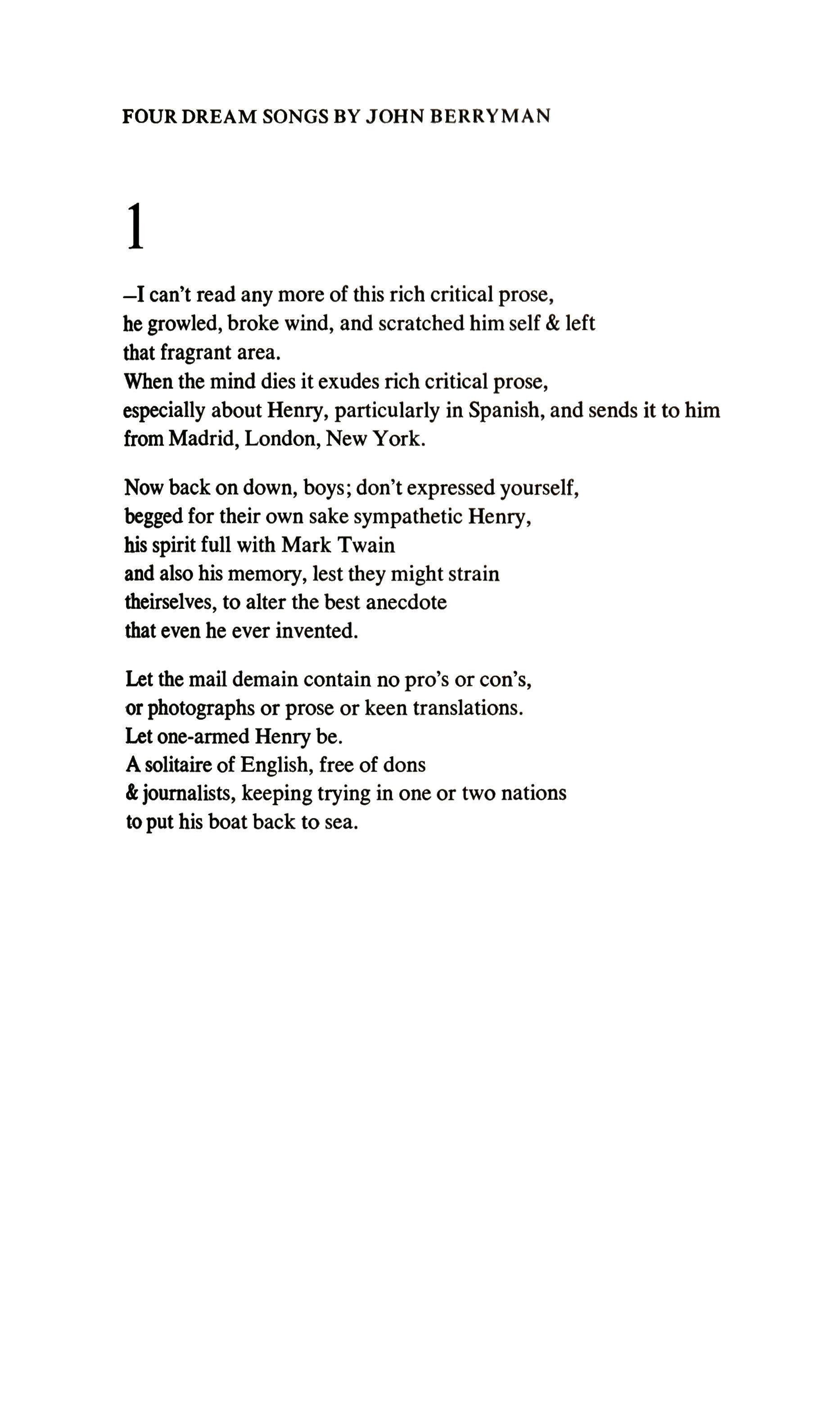
-I can't read any more of this rich critical prose, he growled, broke wind, and scratched him self & left that fragrant area. When the mind dies it exudes rich critical prose, especially about Henry, particularly in Spanish, and sends it to him from Madrid, London, New York.
Now back on down, boys; don't expressed yourself, begged for their own sake sympathetic Henry, his spirit full with Mark Twain and also his memory, lest they might strain theirselves, to alter the best anecdote that even he ever invented.
Let the mail demain contain no pro's or con's, or photographs or prose or keen translations. Let one-armed Henry be.
A solitaire of English, free of dons & journalists, keeping trying in one or two nations to put his boat back to sea.
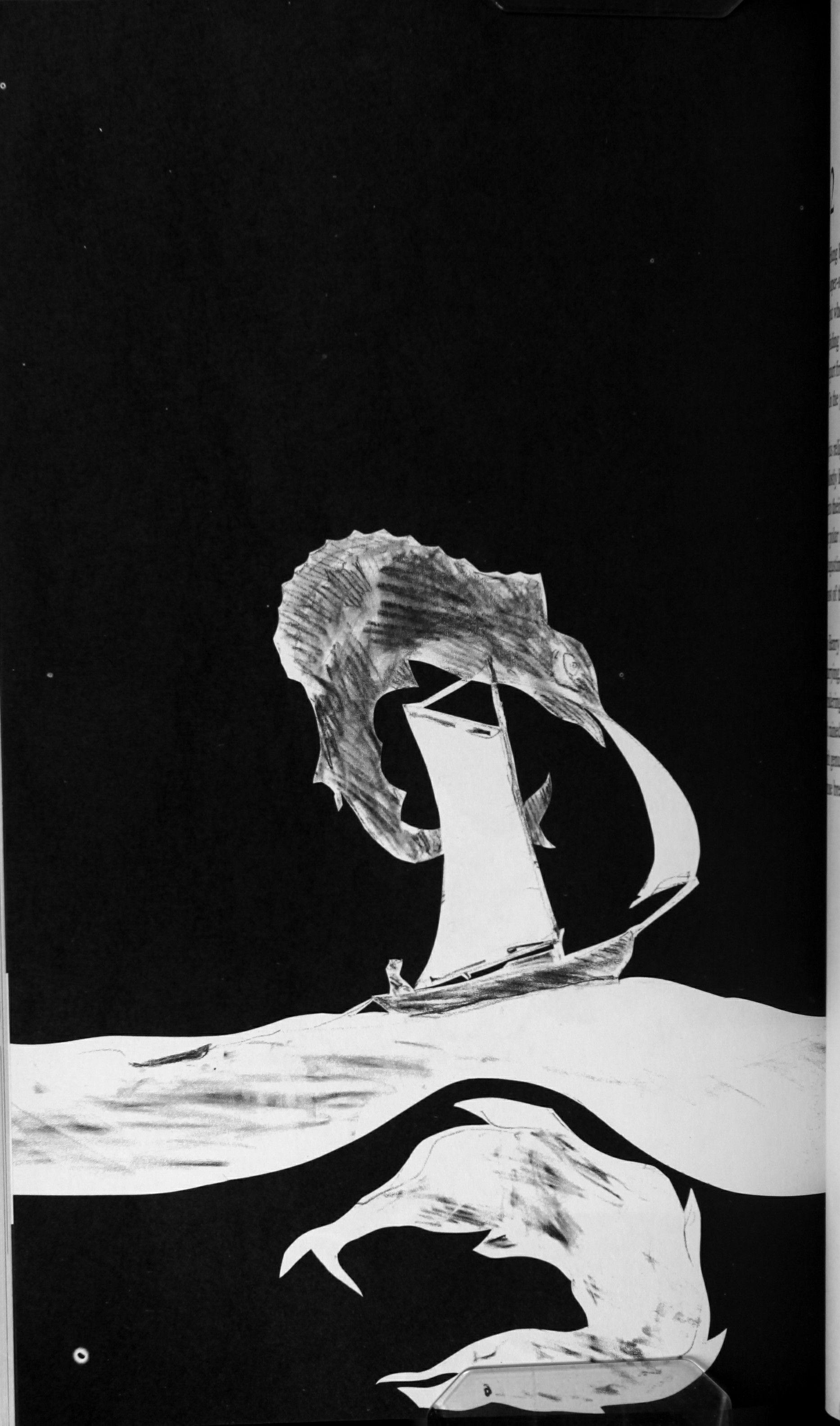
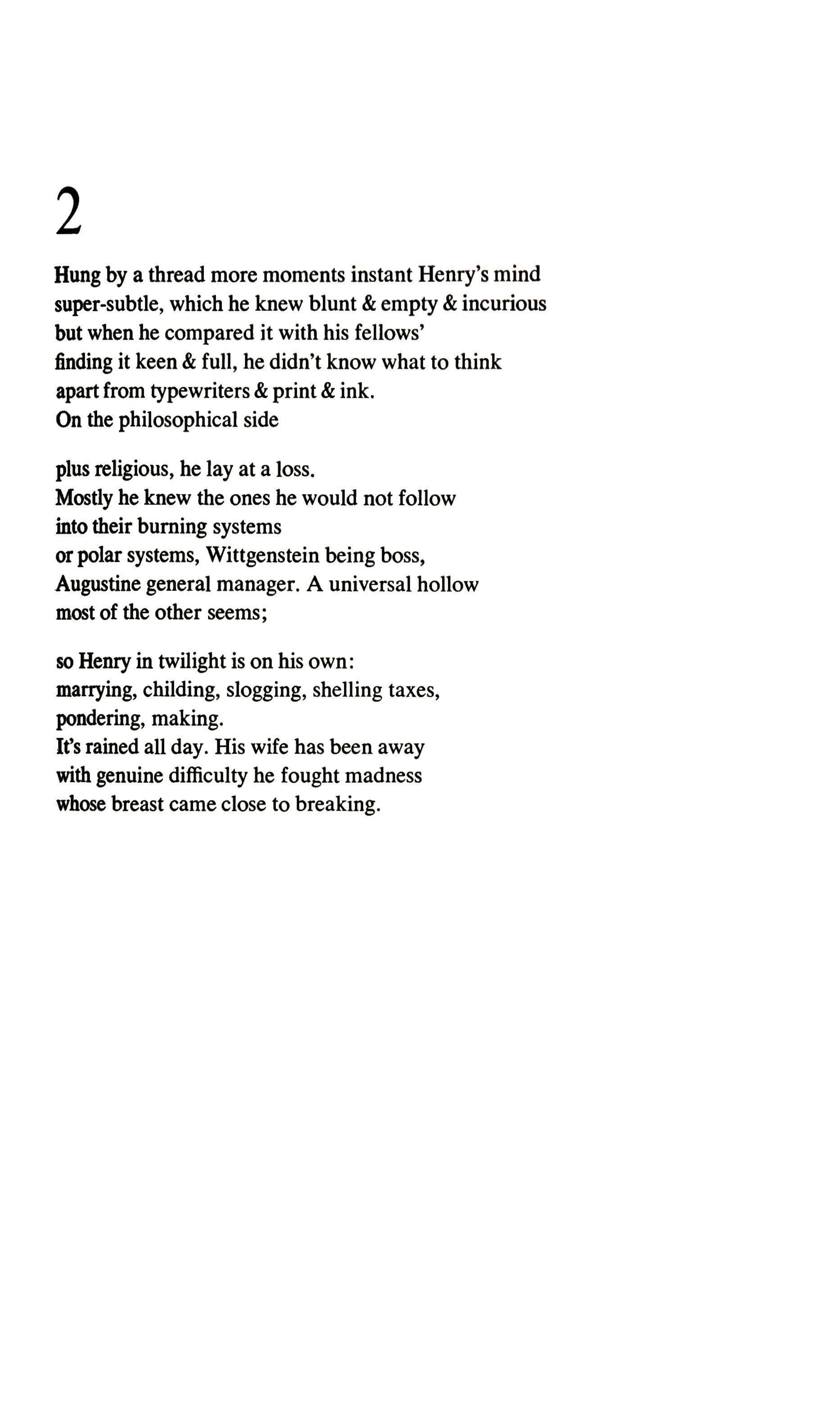
Hung by a thread more moments instant Henry's mind super-subtle, which he knew blunt & empty & incurious but when he compared it with his fellows' finding it keen & full, he didn't know what to think apart from typewriters & print & ink. On the philosophical side plus religious, he lay at a loss. Mostly he knew the ones he would not follow into their burning systems or polar systems, Wittgenstein being boss, Augustine general manager. A universal hollow most of the other seems; so Henry in twilight is on his own: marrying, childing, slogging, shelling taxes, pondering, making. It's rained all day. His wife has been away with genuine difficulty he fought madness whose breast came close to breaking.
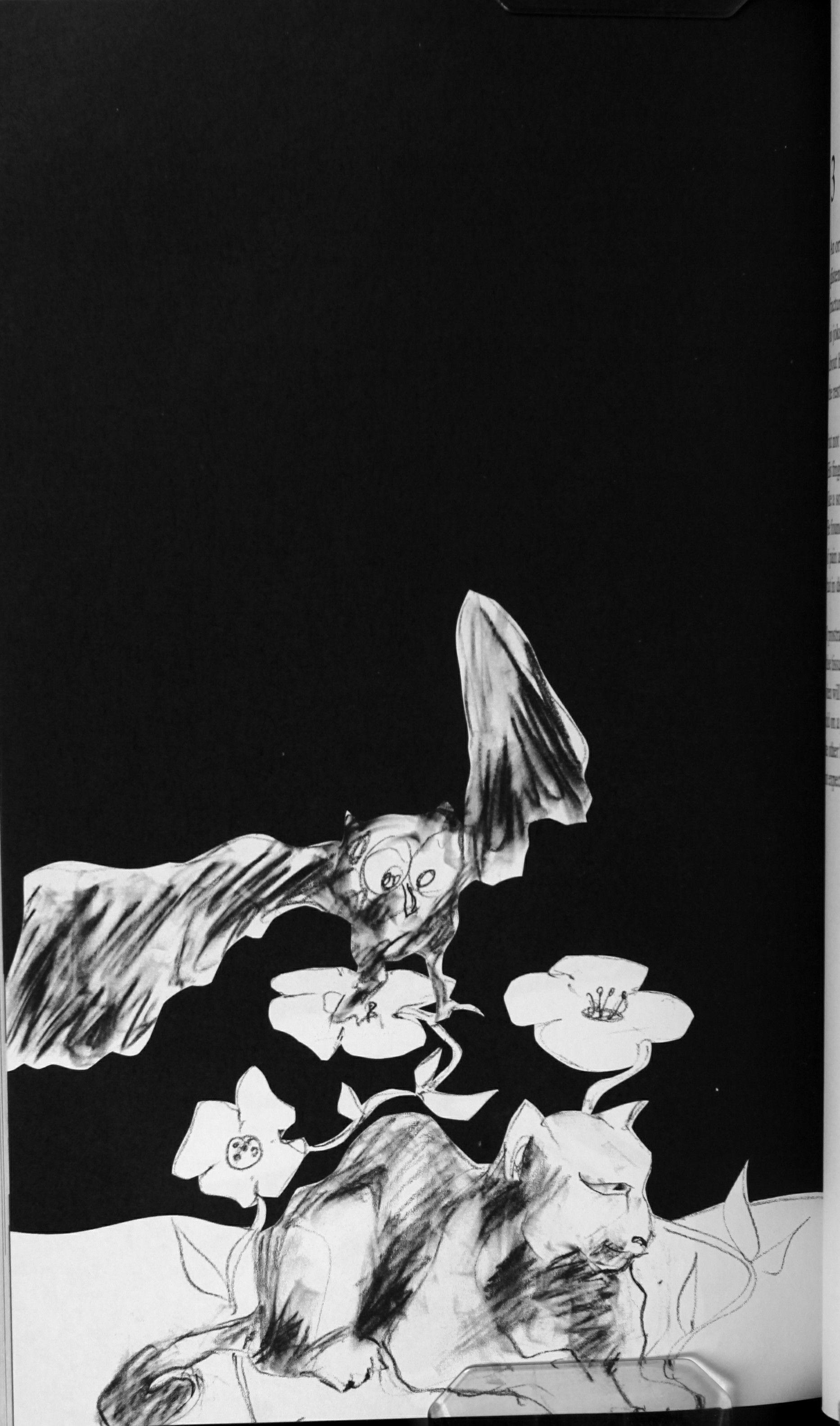
/.� ') }/ ,/ l
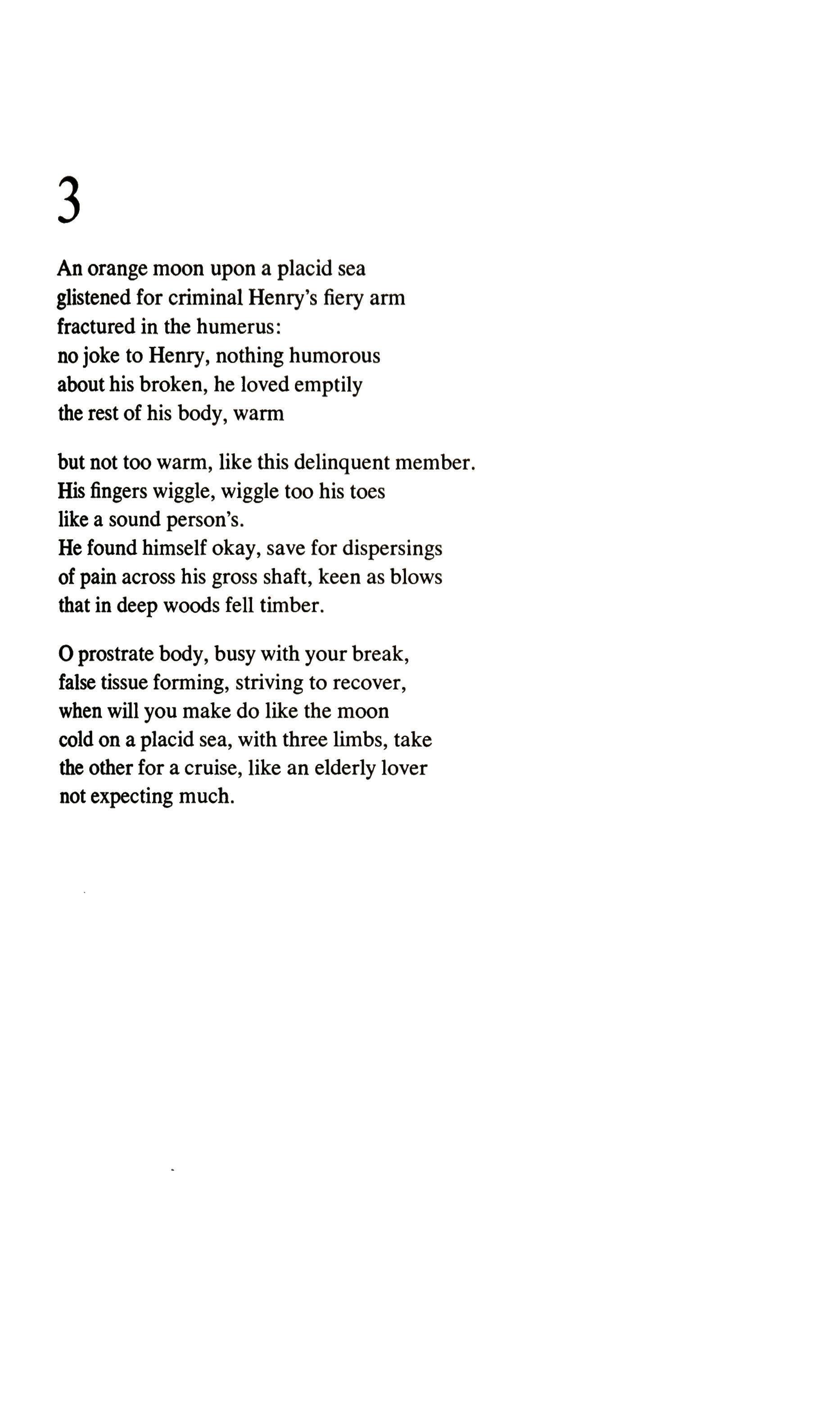
An orange moon upon a placid sea glistened for criminal Henry's fiery al'ln fractured in the humerus: no joke to Henry, nothing humorous about his broken, he loved emptily the rest of his body, warm but not too warm, like this delinquent member. His fingers wiggle, wiggle too his toes like a sound person's. He found himself okay, save for dispersings of pain across his gross shaft, keen as blows that in deep woods fell timber.
o prostrate body, busy with your break, false tissue forming, striving to recover, when will you make do like the moon cold on a placid sea, with three limbs, take the other for a cruise, like an elderly lover not expecting much.
-
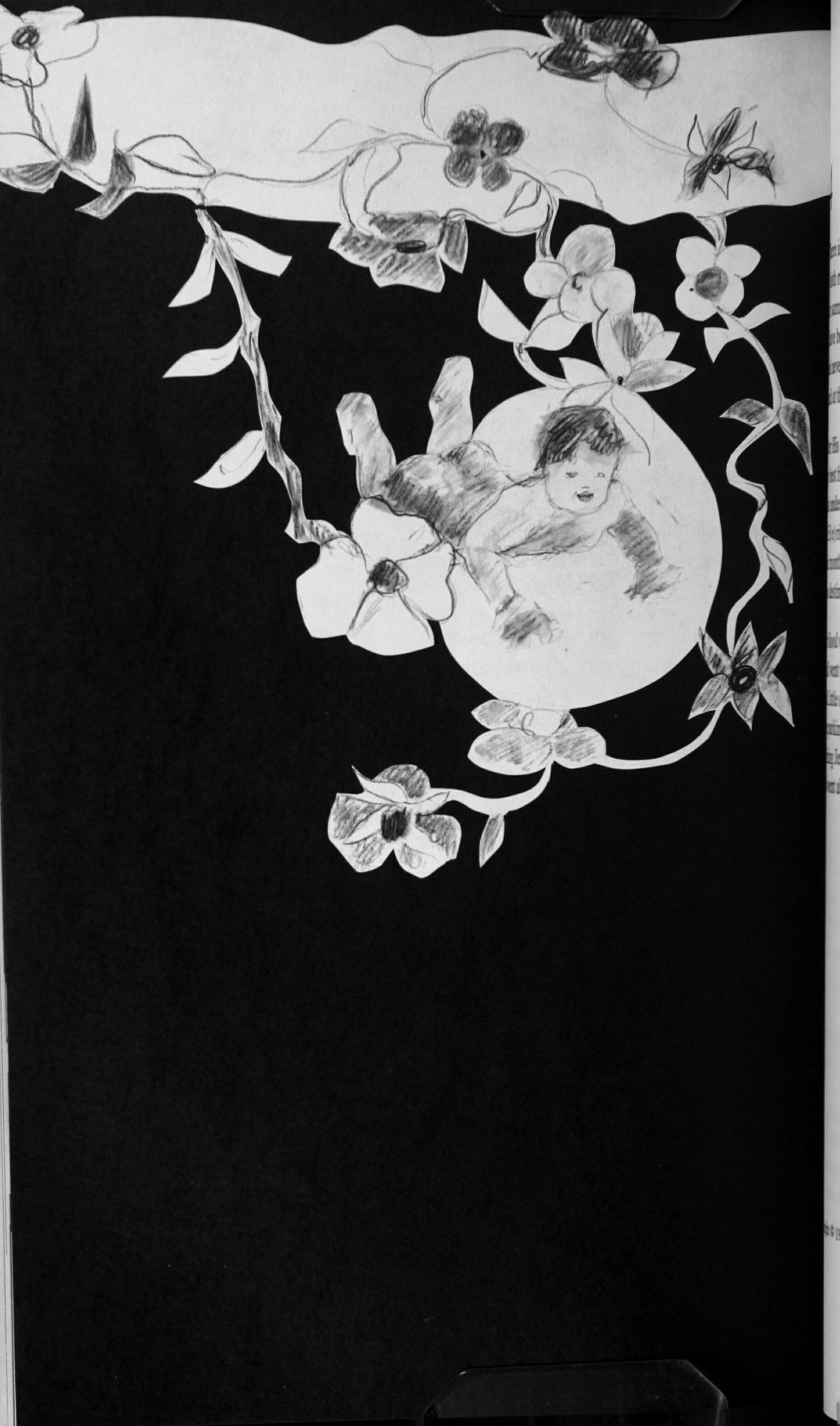
There is a swivelly grace that's up from grace I both remember & know. Into your face for summers now for threeI have been looking, and for winters 0 and never at any time have you resembled snow. And at the ceremony after His Honor swivelled us a judge my best friend stood in tears, at both his age and undeclining mine. In E(e)rie Plaza then we kept on house and months 0 soon we saw that pointy-nose was destined to combine her blood with Henry's in a little thing. If all went well. It all went better, mingling, and Little sprang out. The parking-lot tilted & made a dance, ditching Jesuits. The sun gave it a glance and went about & about.
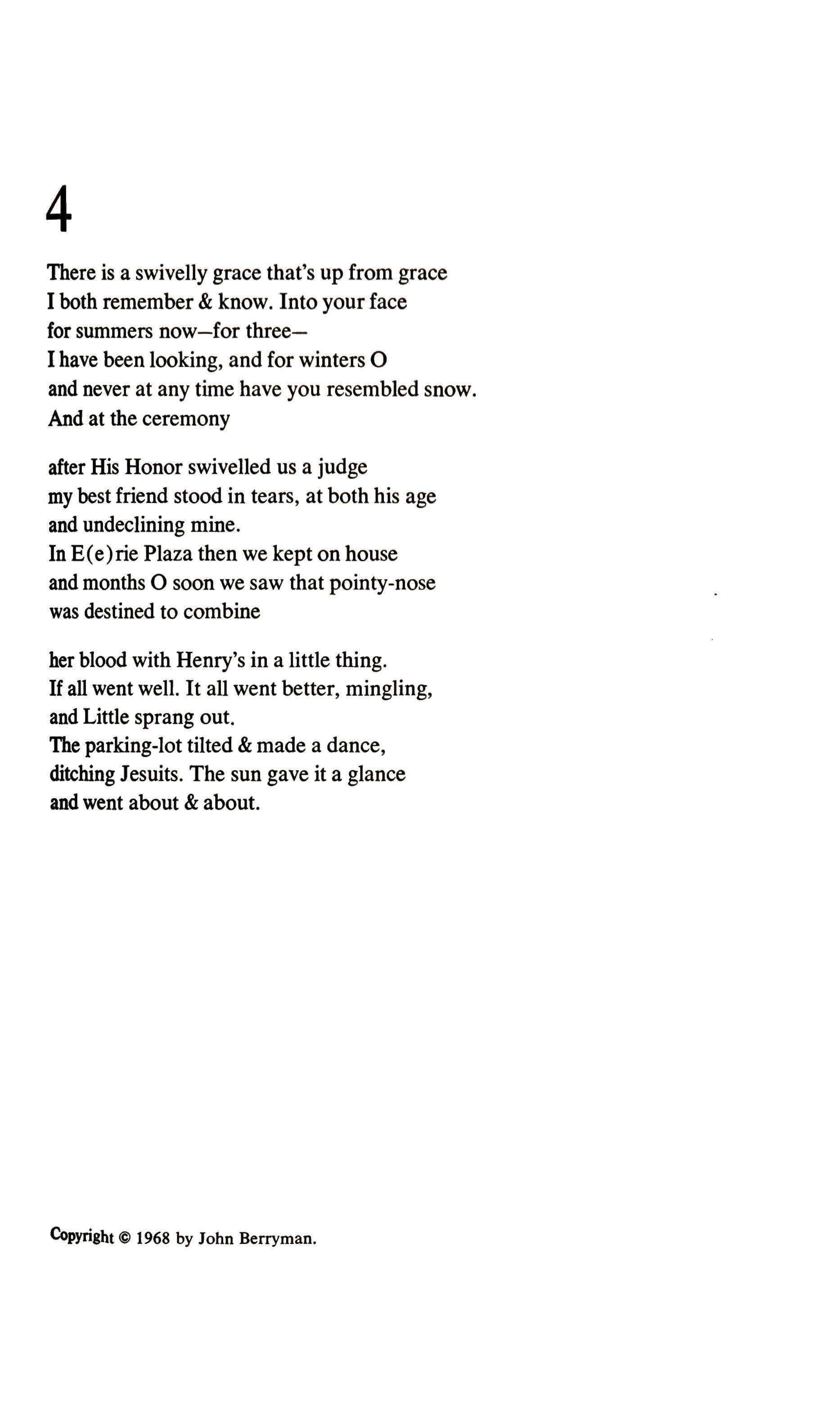
Copyright © 1968 by John
Berryman.
To speak-all of a sudden we speak then we speak
The wall that goes along the right is broken by doors by windows (it's nothing)
Absent would this wall have anything to say? Who will say so?
We'll never stop trying to grasp on this wall what keeps silent
Running stumbling familiar
The two books in evidence there is no more space on the wall which stops
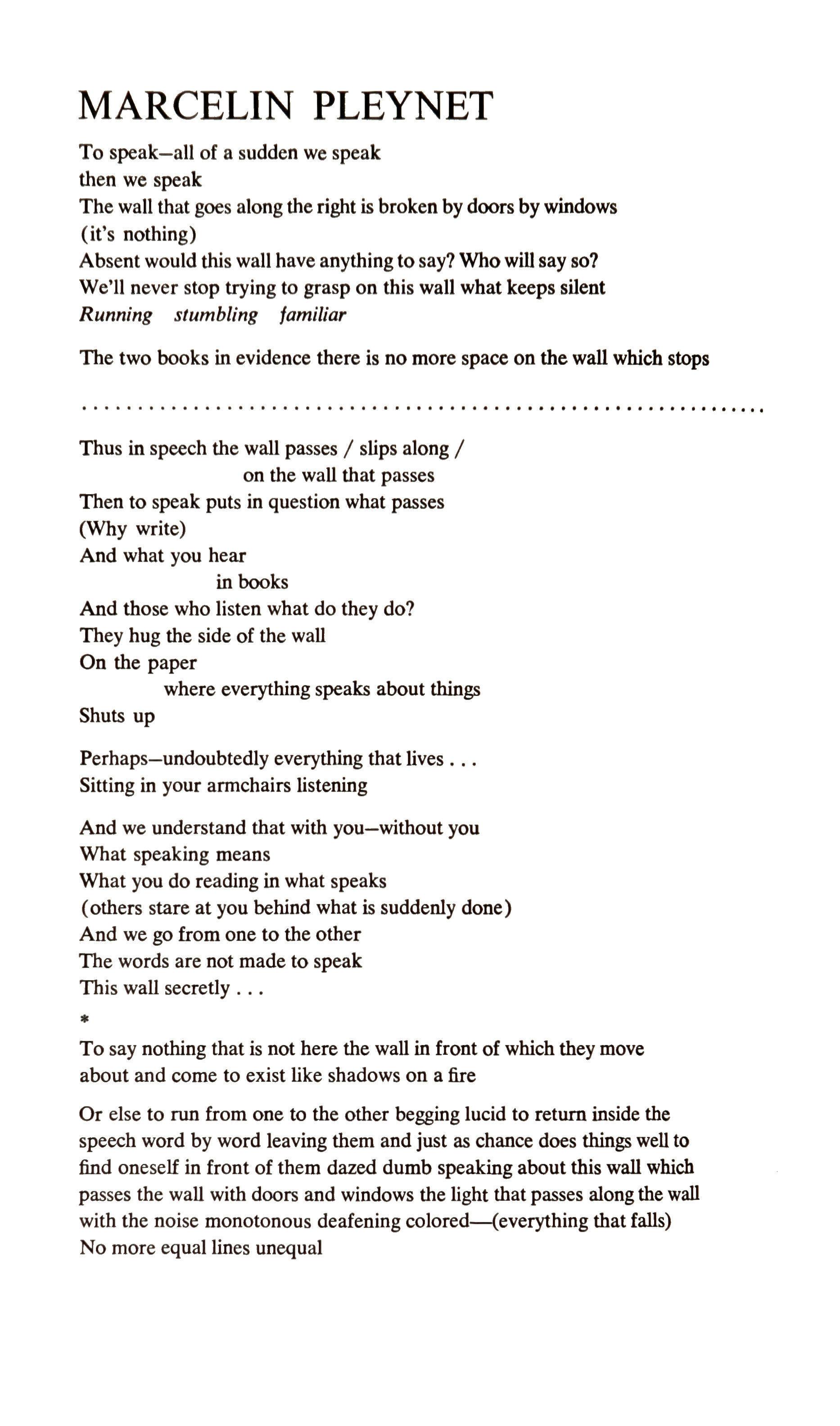
Thus in speech the wall passes / slips along / on the wall that passes
Then to speak puts in question what passes (Why write)
And what you hear in books
And those who listen what do they do?
They hug the side of the wall
On the paper where everything speaks about things Shuts up
Perhaps-undoubtedly everything that lives
Sitting in your armchairs listening
And we understand that with you without you What speaking means
What you do reading in what speaks (others stare at you behind what is suddenly done)
And we go from one to the other
The words are not made to speak
This wall secretly
*
To say nothing that is not here the wall in front of which they move about and come to exist like shadows on a fire
Or else to run from one to the other begging lucid to return inside the speech word by word leaving them and just as chance does things well to find oneself in front of them dazed dumb speaking about this wall which passes the wall with doors and windows the light that passes along the wall with the noise monotonous deafening colored-(everything that falls)
No more equal lines unequal

No more logical series
But already in others the custom of what is correct and carries forward the rule but from one to the other in speech which is not seen if there were not some difference between them: the analysis
Just as to get here you walk along the length of this wall all of a sudden gone and at your right the voice which makes itself heard howling through things the only music or f01111 of thought in front of you in the order of words
• To speak
no longersuddenly and already in this confused speech you don't hear what he (it) says or what he (it) says further on and he says what he says (thinks) as he sees you as he sees himself walking along a wall broken by doors and windows stopping impatient (out of patience) to speak again listening distraught out of patience all this screwed-up subjective poetry trying to get rid of what passes teaching word by word I know it in the text the wall behind the wall
"Then how can a thing which is never in the same state have any existence? If at a given moment, it stops in the same state it's clear that at least for the duration of that time it does not undergo any change. If, on the contrary, it is always in the same state and remains the same how could it change or move, given the fact that it doesn't leave its form?' when he speaks and we speak we have already spoken you have been mentioned in what is said you have read it and you have read what speaks reading word by word what passes doors windows closed now to the right the joy of what is done where the (absent) wall disappears broken by doors by windows the closed light at the moment when those who speak or read raise their eyes searching still like a light a clarification and in what is happening on the wall themselves still like shadows say to each other what you hear
sitting listening reading word by word what gains in being said or caught unaware and sometimes (nevertheless) what escapes near them is in them rises like a wall and speaks
translated by Serge Gavronsky
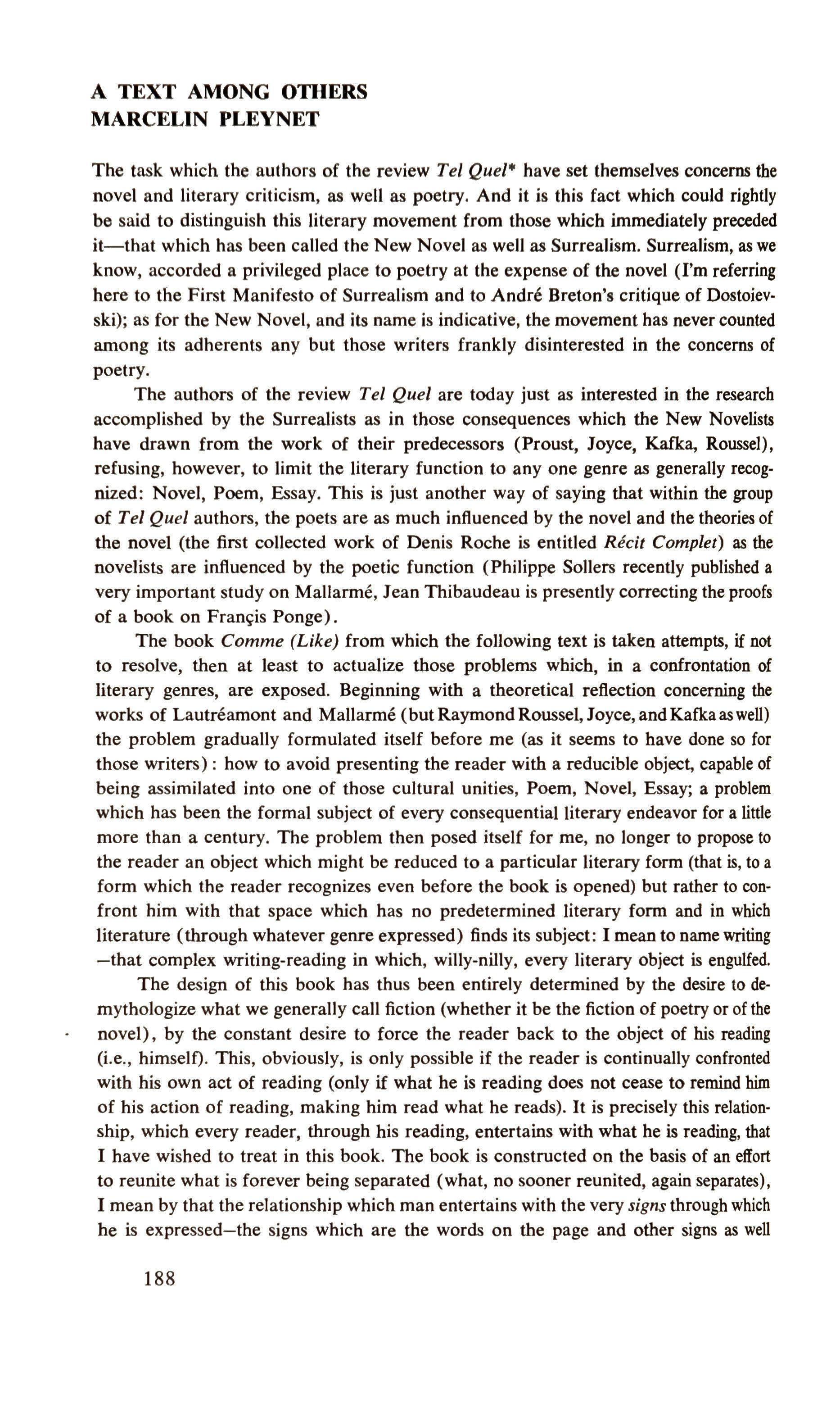
A TEXT AMONG OmERS
MARCELIN PLEYNET
The task which the authors of the review Tel Quel" have set themselves concerns the novel and literary criticism, as well as poetry. And it is this fact which could rightly be said to distinguish this literary movement from those which immediately preceded it that which has been called the New Novel as well as Surrealism. Surrealism, as we know, accorded a privileged place to poetry at the expense of the novel (I'm referring here to the First Manifesto of Surrealism and to Andre Breton's critique of Dostoievski); as for the New Novel, and its name is indicative, the movement has never counted among its adherents any but those writers frankly disinterested in the concerns of poetry.
The authors of the review Tel Quel are today just as interested in the research accomplished by the Surrealists as in those consequences which the New Novelists have drawn from the work of their predecessors (Proust, Joyce, Kafka, Roussel), refusing, however, to limit the literary function to anyone genre as generally recognized: Novel, Poem, Essay. This is just another way of saying that within the group of Tel Quel authors, the poets are as much influenced by the novel and the theories of the novel (the first collected work of Denis Roche is entitled Recit Complet) as the novelists are influenced by the poetic function (Philippe Sollers recently published a very important study on Mallarme, Jean Thibaudeau is presently correcting the proofs of a book on Francis Ponge).
The book Comme (Like) from which the following text is taken attempts, if not to resolve, then at least to actualize those problems which, in a confrontation of literary genres, are exposed. Beginning with a theoretical reflection concerning the works of Lautreamont and Mallarme (butRaymond Roussel, Joyce, andKafka as well) the problem gradually formulated itself before me (as it seems to have done so for those writers): how to avoid presenting the reader with a reducible object, capable of being assimilated into one of those cultural unities, Poem, Novel, Essay; a problem which has been the formal subject of every consequential literary endeavor for a little more than a century. The problem then posed itself for me, no longer to propose to the reader an object which might be reduced to a particular literary f01"111 (that is, to a form which the reader recognizes even before the book is opened) but rather to confront him with that space which has no predetermined literary fOI m and in which literature (through whatever genre expressed) finds its subject: I mean to name writing -that complex writing-reading in which, willy-nilly, every literary object is engulfed.
The design of this book has thus been entirely determined by the desire to demythologize what we generally call fiction (whether it be the fiction of poetry or of the novel), by the constant desire to force the reader back to the object of his reading (i.e., himself). This, obviously, is only possible if the reader is continually confronted with his own act of reading (only if what he is reading does not cease to remind him of his action of reading, making him read what he reads). It is precisely this relationship, which every reader, through his reading, entertains with what he is reading, that I have wished to treat in this book. The book is constructed on the basis of an effort to reunite what is forever being separated (what, no sooner reunited, again separates), I mean by that the relationship which man entertains with the very signs through which he is expressed-the signs which are the words on the page and other signs as well
188
(which are probably also only words)-I mean the tree sign, the river sign, the man sign, the woman sign.
It seems to me, however, that before concentrating on this problem, which is in effect a problem of taking writing literally, it might be well to question what we generally accept as the first premise of writing: the word. The text here published concerns the relationships which we entertain with that mode of expression which is the word. By a dramatization of those phenomena associated with speech (a man speaks, others listen a man seeks to explain himself, others try to understand, to decode what he is saying) I have attempted to expose metaphorically the sense of speech within the speech. Any speech is at first an obstacle ("a wall"), any relation to the speech of another, a confrontation, yet it is still the obstacle itself which speaks ("the wall speaks"); it is in the continuity of the speech that, for the listener, the clear message of the speech is constantly hidden, passes on what, in all speech, remains at last obscure ("the wall passes, slips along on the wall that passes"); so it is that in any speech, obscure though it may be, the listener perceives, if not a global, then a fragmentary meaning; all speech in this way is pierced, one might say, by more or less global comprehension which clarifies it and clarifies the listener (at once on the speech itself and on the meaning which the listener is going to give to this speech) ("the wall is broken by doors and windows"), etc In this manner and through a quotation from Rimbaud ("all this screwed-up subjective poetry") and from Plato's "Cratylus" ("How a thing ") the question of determining why any speech is intelligible is introduced: evidently because the listeners use the same code as the speaker, because they read in this code what the speaker means to convey to them. It is because the speech to which they are listening is written, is being written in them, that they can understand it ("and sometimes nevertheless what escapes near them is in them rises like a wall and speaks").
Finally, the book from which this text is drawn has not been conceived as a collection of texts, each being an end in itself, but as a logical series in which each part, having its own proper existence, nevertheless achieves its full meaning only in the totality of the series. That is saying that this text has no title, that none of the parts which compose the book have titles, that certain themes appearing in the text here published find their conclusions only on another page of the book, that some metaphors which were developed elsewhere are achieved in this text which is saying, finally, that this text should be read among others in Comme. translated by Joy N. Humes
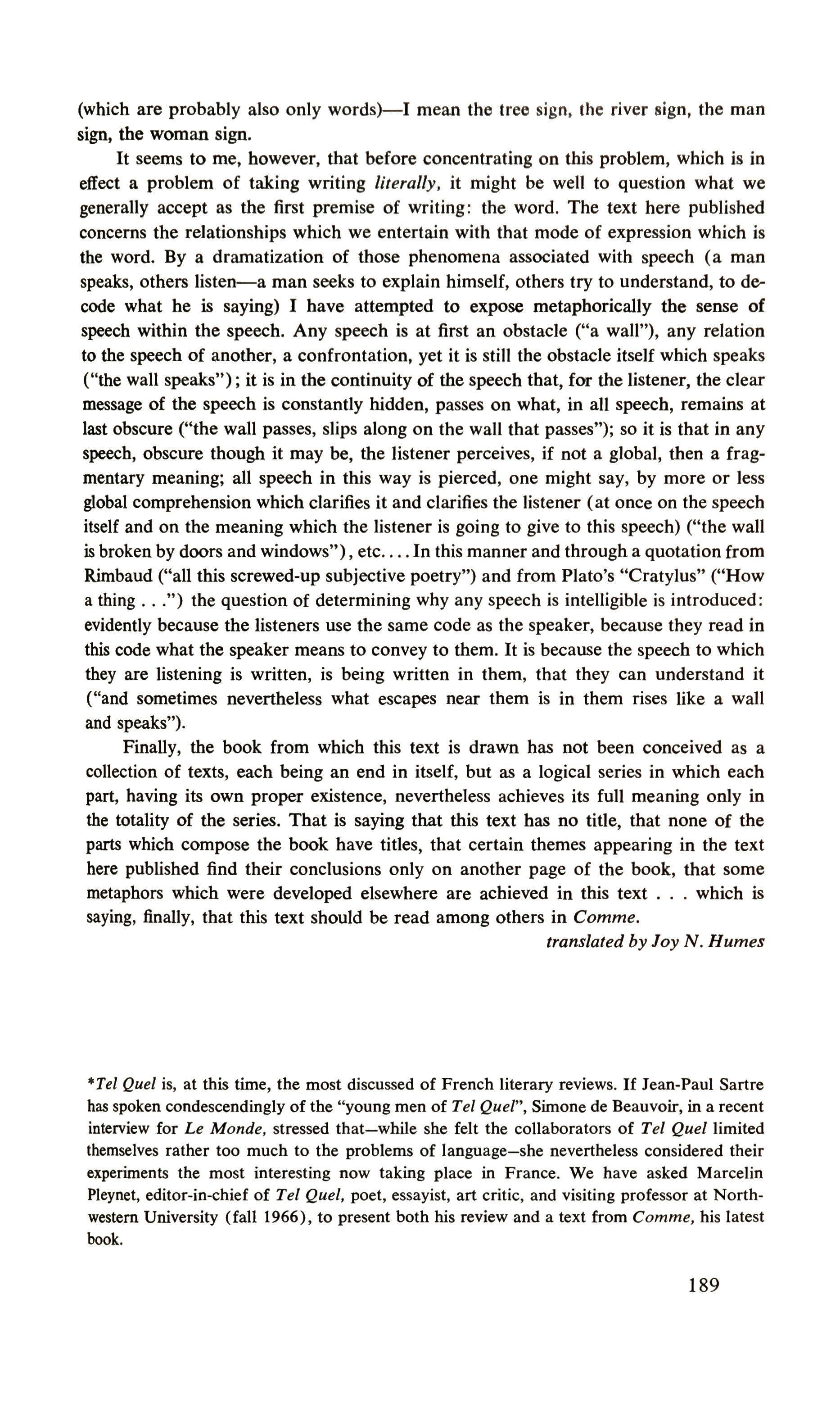
*Tel Quel is, at this time, the most discussed of French literary reviews. If Jean-Paul Sartre has spoken condescendingly of the "young men of Tel Quel", Simone de Beauvoir, in a recent interview for Le Monde, stressed that-while she felt the collaborators of Tel Quellimited themselves rather too much to the problems of language-she nevertheless considered their experiments the most interesting now taking place in France. We have asked Marcelin Pleynet, editor-in-chief of Tel Quel, poet, essayist, art critic, and visiting professor at Northwestern University (fall 1966), to present both his review and a text from Comme, his latest book.
189
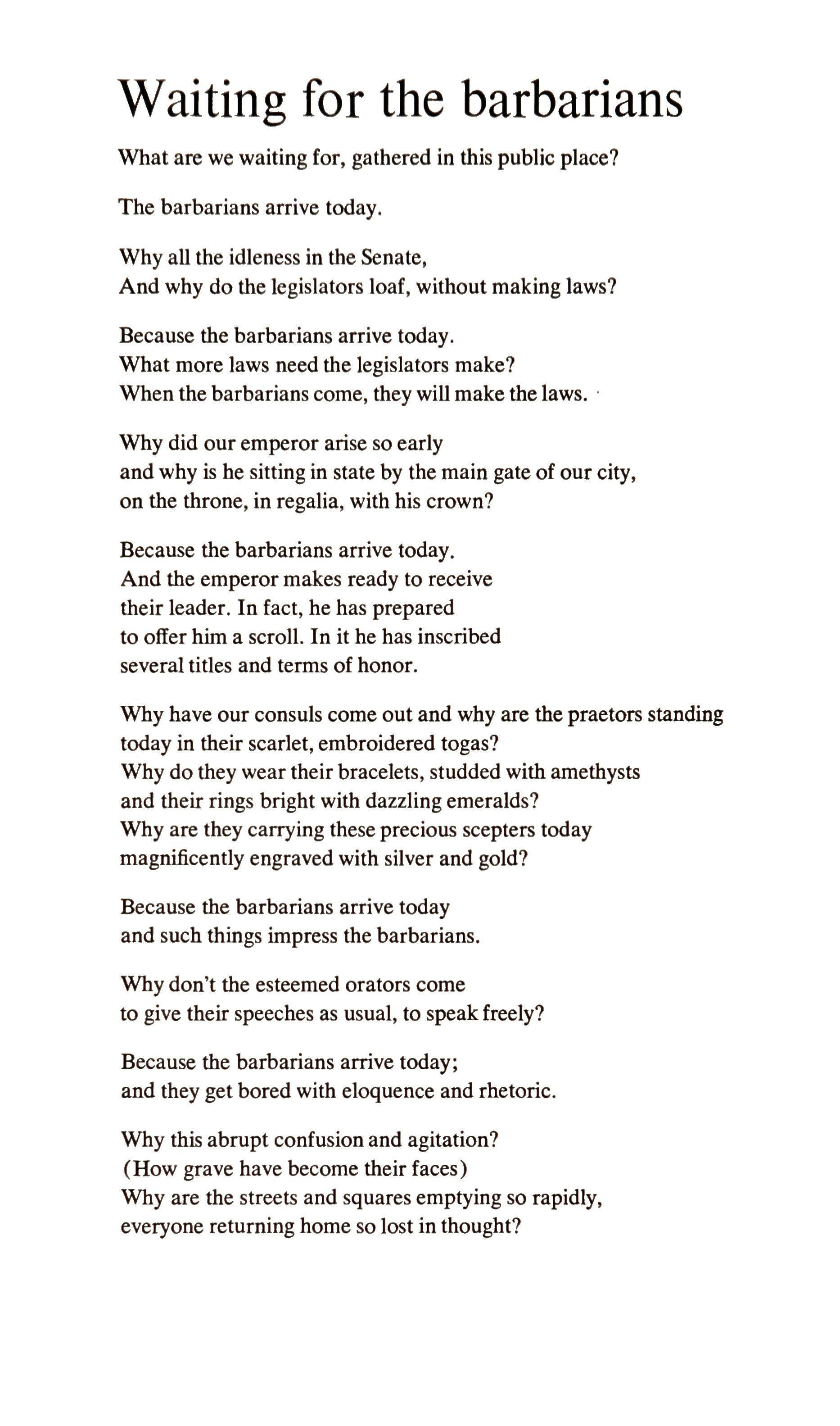
What are we waiting for, gathered in this public place?
The barbarians arrive today.
Why all the idleness in the Senate, And why do the legislators loaf, without making laws?
Because the barbarians arrive today. What more laws need the legislators make? When the barbarians come, they will make the laws.
Why did our emperor arise so early and why is he sitting in state by the main gate of our city, on the throne, in regalia, with his crown?
Because the barbarians arrive today. And the emperor makes ready to receive their leader. In fact, he has prepared to offer biln a scroll. In it he has inscribed several titles and terms of honor.
Why have our consuls come out and why are the praetors standing today in their scarlet, embroidered togas?
Why do they wear their bracelets, studded with amethysts and their rings bright with dazzling emeralds?
Why are they carrying these precious scepters today magnificently engraved with silver and gold?
Because the barbarians arrive today and such things impress the barbarians.
Why don't the esteemed orators come to give their speeches as usual, to speakfreely?
Because the barbarians arrive today; and they get bored with eloquence and rhetoric.
Why this abrupt confusion and agitation? (How grave have become their faces)
Why are the streets and squares emptying so rapidly, everyone returning home so lost in thought?
Because it's night and the barbarians haven't come. Some people came from the frontiers and they said that the barbarians no longer exist.
And now what will happen to us without barbarians? Those men were a kind of solution.
C. P,CAVAFY
translated by Minas Savvas
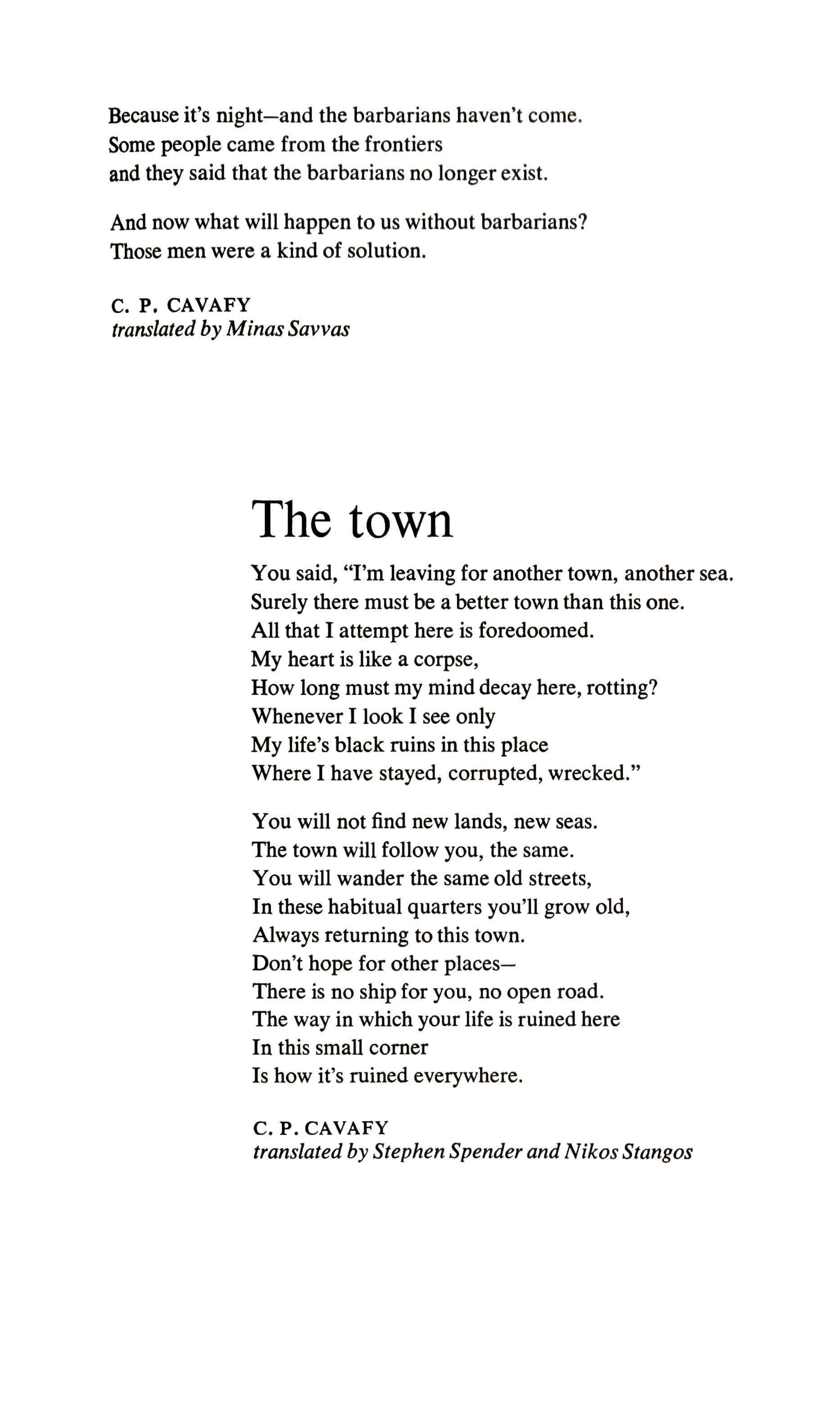
You said, "I'm leaving for another town, another sea. Surely there must be a better town than this one. All that I attempt here is foredoomed. My heart is like a corpse, How long must my mind decay here, rotting? Whenever I look I see only My life's black ruins in this place Where I have stayed, corrupted, wrecked."
You will not find new lands, new seas. The town will follow you, the same. You will wander the same old streets, In these habitual quarters you'll grow old, Always returning to this town. Don't hope for other placesThere is no ship for you, no open road. The way in which your life is ruined here In this small comer Is how it's ruined everywhere.
C.P.CAVAFY
translated by Stephen Spender and NikosStangos
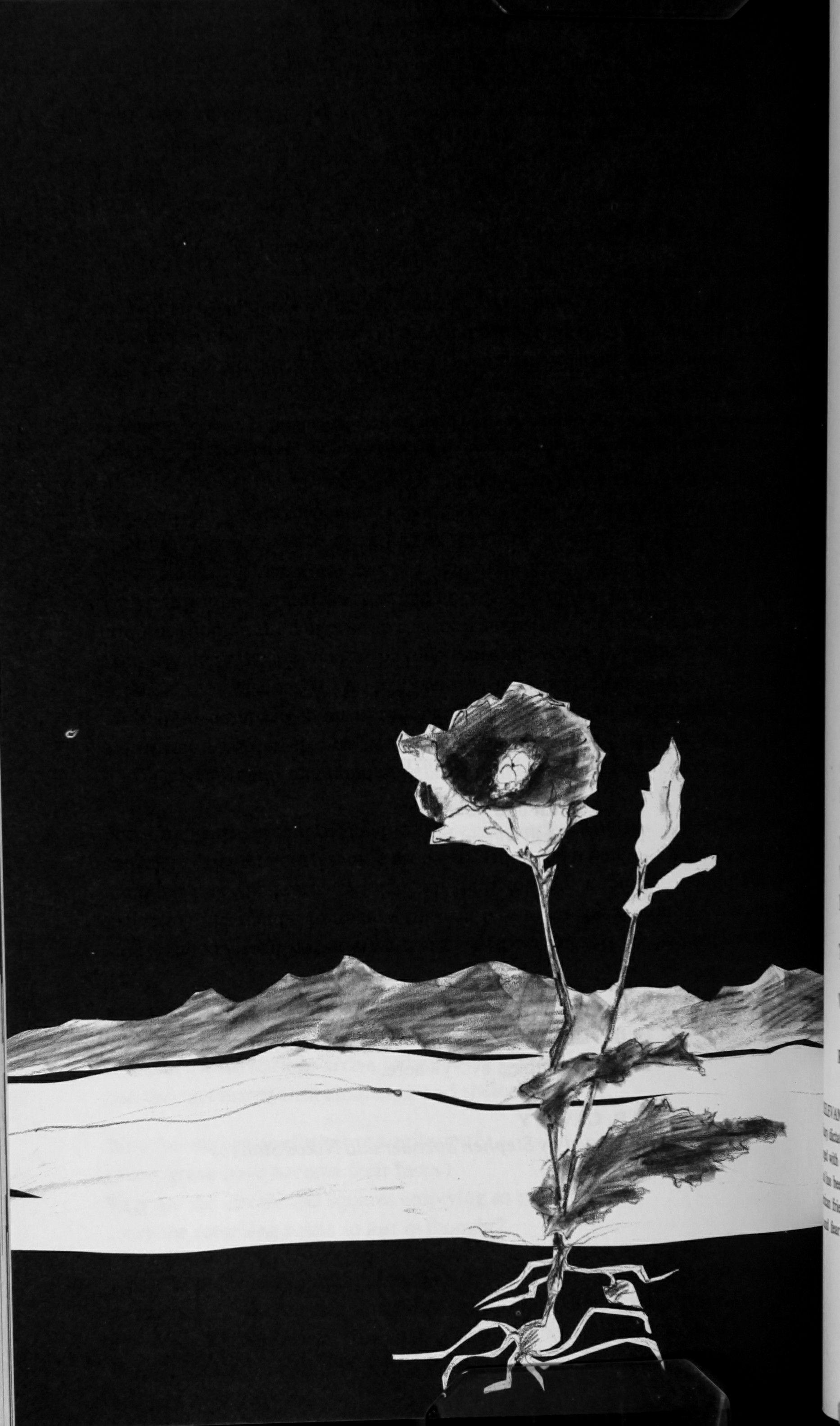
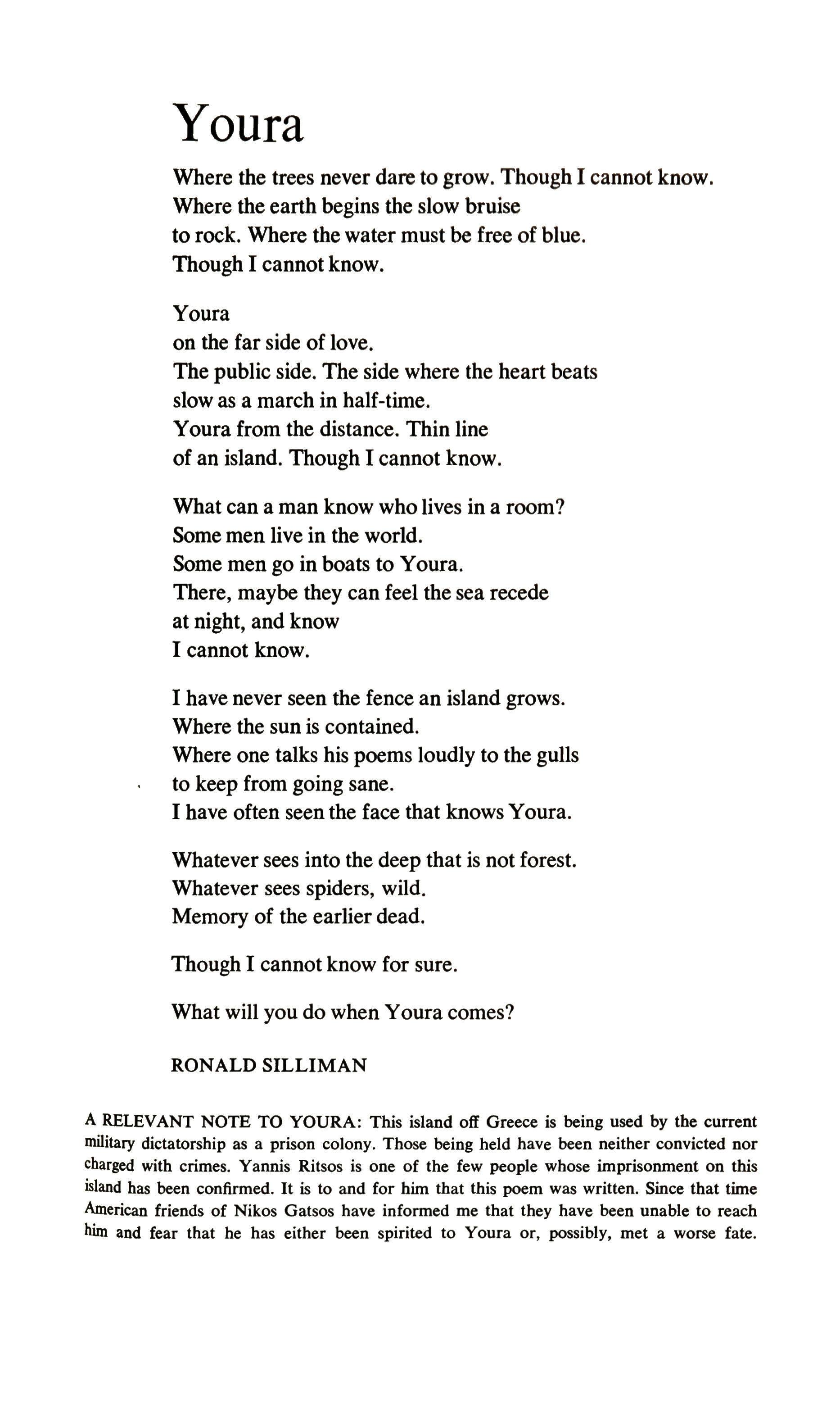
oura
Where the trees never dare to grow. Though I cannot know. Where the earth begins the slow bruise to rock. Where the water must be free of blue. Though I cannot know.
Youra on the far side of love.
The public side. The side where the heart beats slow as a march in half-time. Youra from the distance. Thin line of an island. Though I cannot know.
What can a man know who lives in a room?
Some men live in the world. Some men go in boats to Youra. There, maybe they can feel the sea recede at night, and know I cannot know.
I have never seen the fence an island grows. Where the sun is contained. Where one talks his poems loudly to the gulls to keep from going sane.
I have often seen the face that knows Youra.
Whatever sees into the deep that is not forest. Whatever sees spiders, wild. Memory of the earlier dead.
Though I cannot know for sure.
What will you do when Youra comes?
RONALD SILLIMAN
A RELEVANT NOTE TO YOURA: This island off Greece is being used by the current military dictatorship as a prison colony. Those being held have been neither convicted nor charged with crimes. Yannis Ritsos is one of the few people whose imprisonment on this island has been confirmed. It is to and for him that this poem was written. Since that time American friends of Nikos Gatsos have informed me that they have been unable to reach him and fear that he has either been spirited to Youra or, possibly, met a worse fate.
TWO POEMS BY ARTHUR RIMBAUD
translated by Mark Malkas
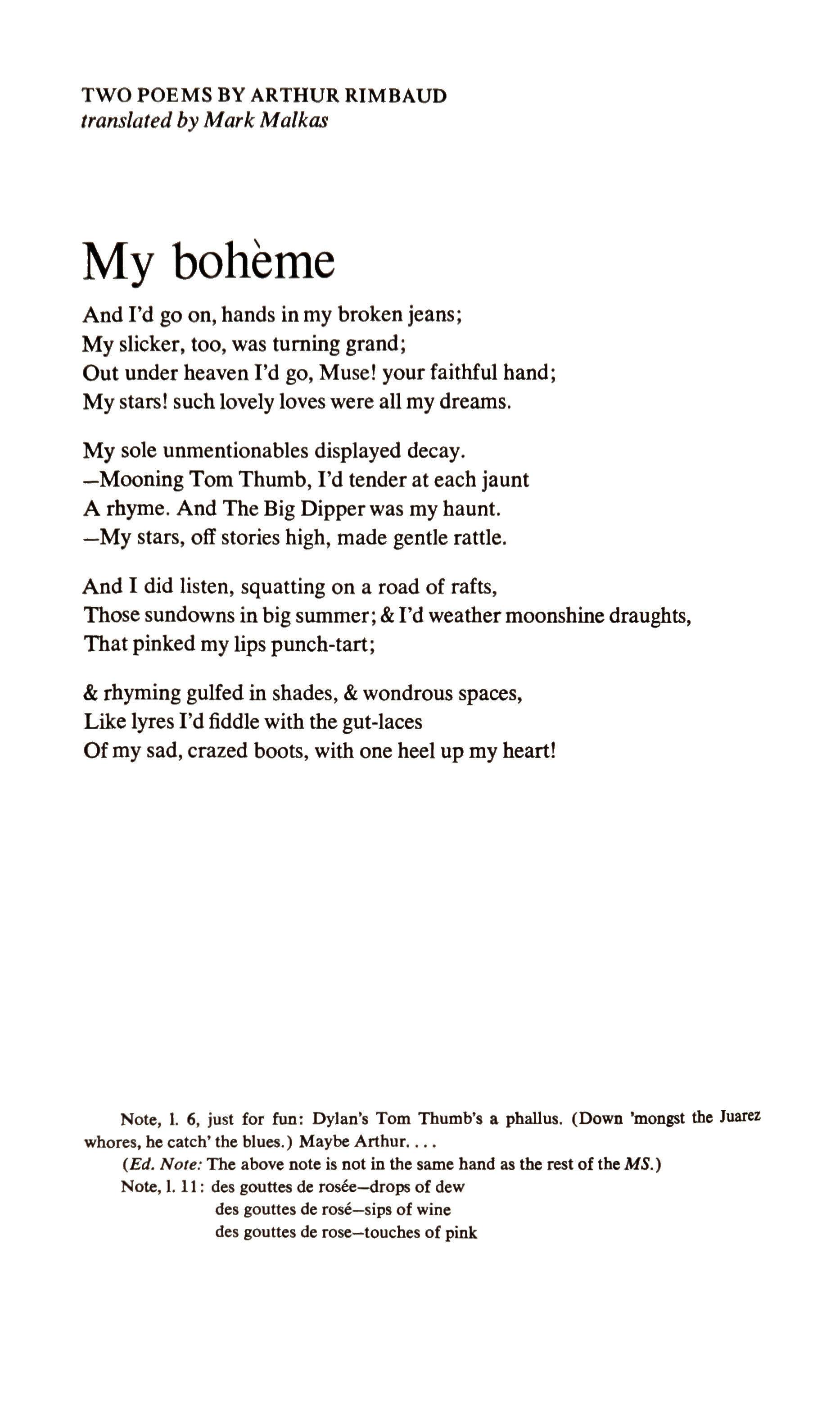
And I'd go on, hands in my broken jeans; My slicker, too, was turning grand; Out under heaven I'd go, Muse! your faithful hand; My stars! such lovely loves were all my dreams, My sole unmentionables displayed decay. -Mooning Tom Thumb, I'd tender at each jaunt A rhyme. And The Big Dipper was my haunt. -.My stars, off stories high, made gentle rattle.
And I did listen, squatting on a road of rafts, Those sundowns in big summer; & I'd weather moonshine draughts, That pinked my lips punch-tart; & rhyming gulfed in shades, & wondrous spaces, Like lyres I'd fiddle with the gut-laces Of my sad, crazed boots, with one heel up my heart!
Note, 1. 6, just for fun: Dylan's Tom Thumb's a phallus, (Down 'mongst the Juarez whores, he catch' the blues.) Maybe Arthur (Ed. Note: The above note is not in the same hand as the rest of the MS.)
Note, I. 11: des gouttes de rosee=drops of dew des gouttes de rose-sips of wine des gouttes de rose-touches of pink
raze
(Heart of a clown)
My sad heart bawls from the Poop (My heart hung with tobacco-shag)She's fired upon with jets of soup, My bowed heart bawls from the Poop, A private gag for a vast troupe That bursts into general blague; My stem heart bawls from her Poop'My heart decked out with shag!
Ithyphallic, seamanesque, Their cracks've made my heart depraved! On her Rudder they reared: arabesques Ithyphallic, seamanesque.
o dingles abracadabrantesque, Buoy up my heart, that she get laved!
Ithyphallic, seamanesque, Their cracks've made my heart depraved!
When they finish up their chews, What shall we do, 0 lifted heart?
Bacchicky hiccups on their cruise, When they finish up their chews-. What breezes shall my Spanker lose
If their spoiling gets a start-
When they have finished up their chews, What can we do, you poor, bagged heart?
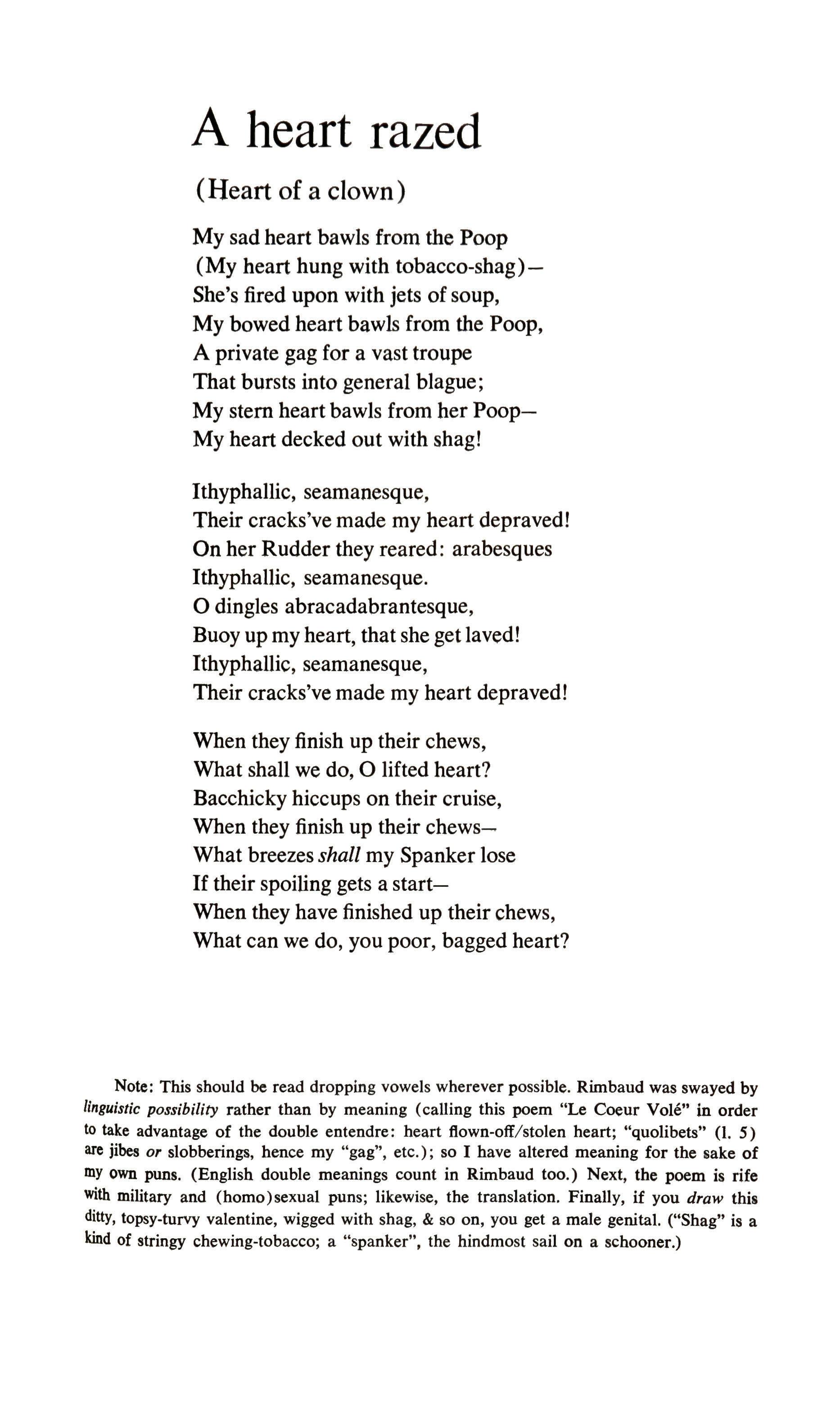
Note: This should be read dropping vowels wherever possible. Rimbaud was swayed by linguistic possibility rather than by meaning (calling this poem "Le Coeur Vole" in order to take advantage of the double entendre: heart flown-off/stolen heart; "quolibets" (I. 5) are jibes or slobberings, hence my "gag", etc.); so I have altered meaning for the sake of Diy own puns. (English double meanings count in Rimbaud too.) Next, the poem is rife with military and (homo)sexual puns; likewise, the translation. Finally, if you draw this ditty, topsy-turvy valentine, wigged with shag, & so on, you get a male genital. ("Shag" is a kind of stringy chewing-tobacco; a "spanker", the hindmost sail on a schooner.)
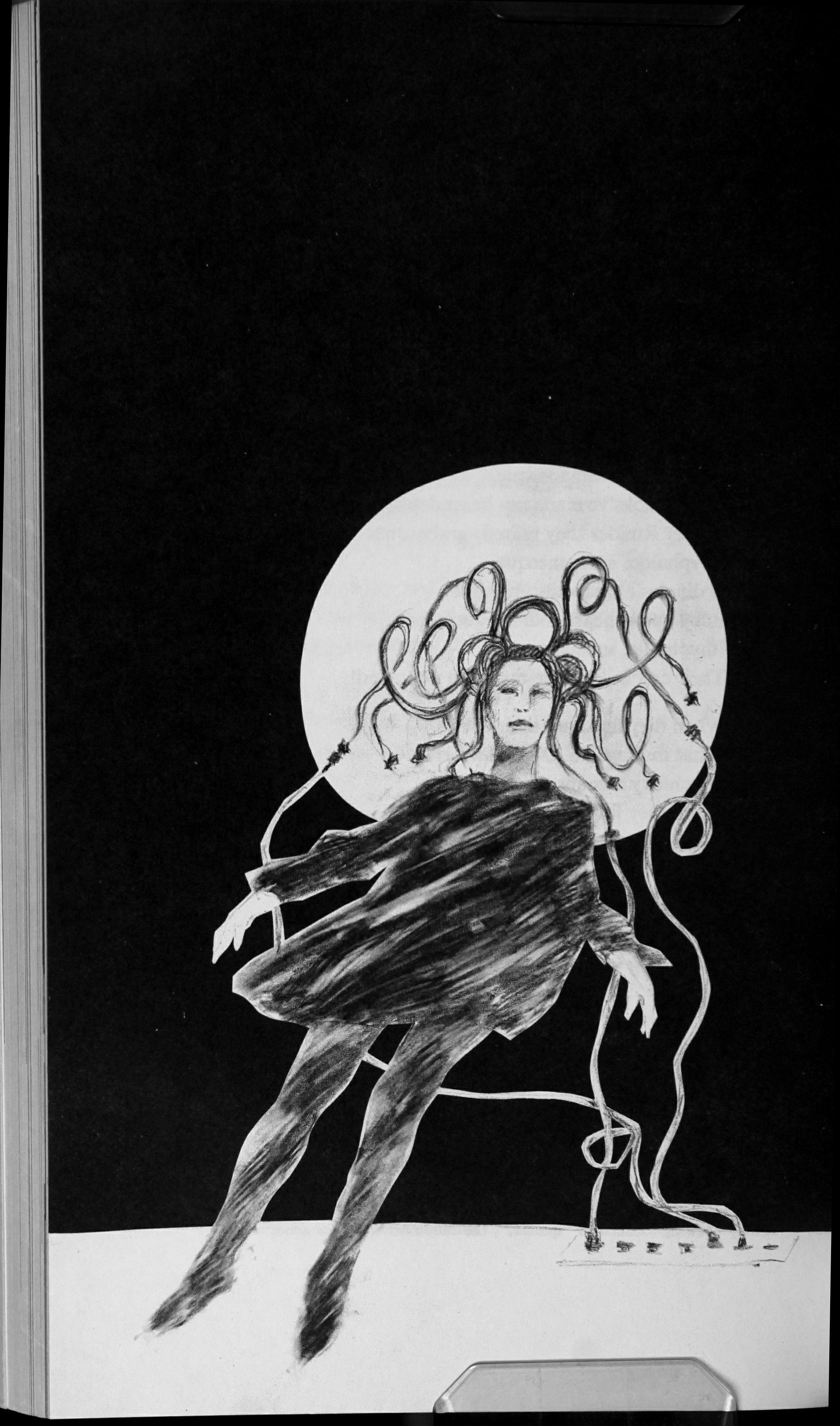
II-
I
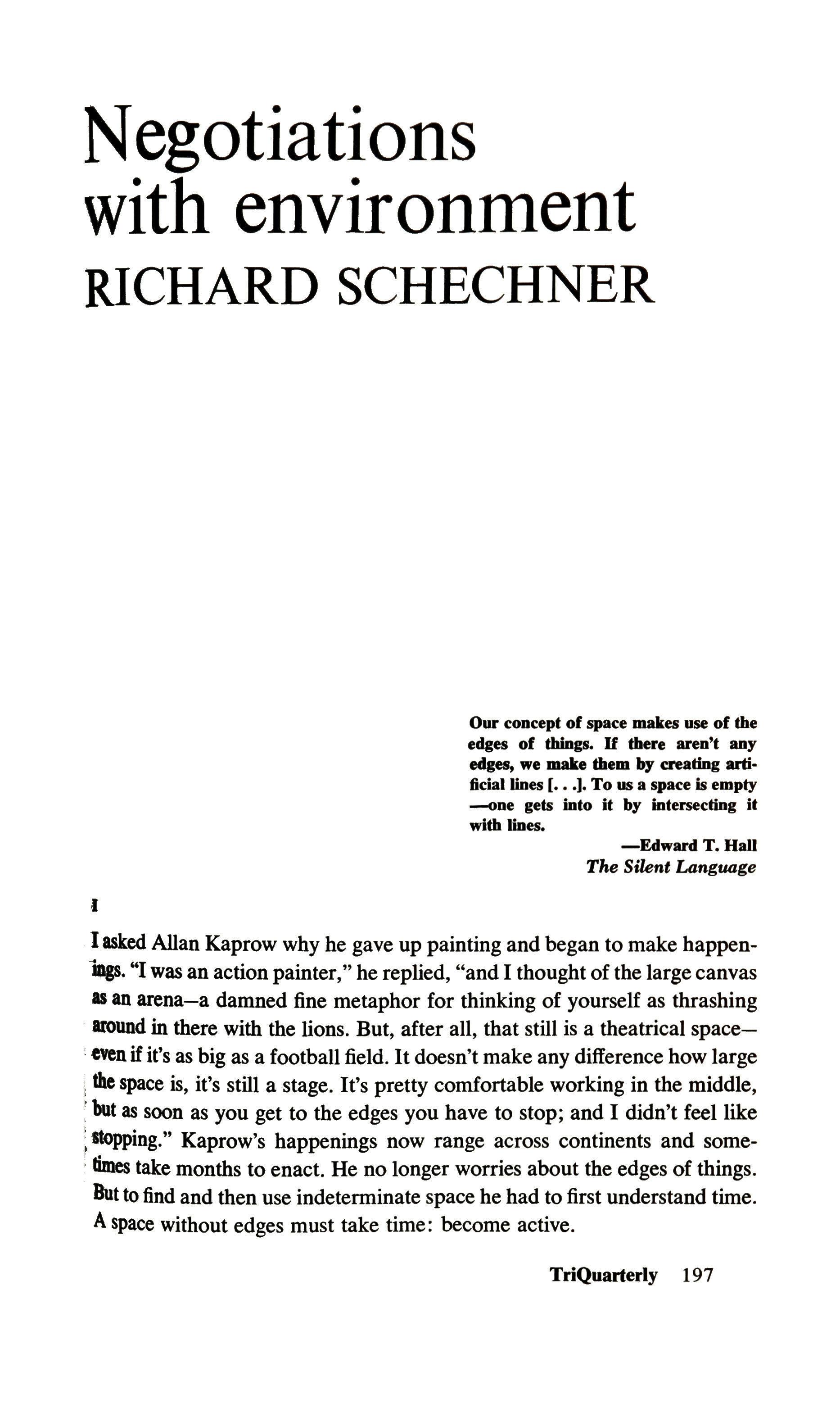
Our concept of space mak� use of the edges of things. If there aren't any edges, we make them by deating amficiallines [ J. To us a space is empty -one gets into it by intersecting it with lines.
-Edward T. HaU
The Silent Langfwge
I asked Allan Kaprow why he gave up painting and began to make happen1Dss. "I was an action painter," he replied, "and I thought of the large canvas as an arena a damned fine metaphor for thinking of yourself as thrashing around in there with the lions. But, after all, that still is a theatrical space: even if it's as big as a football field. It doesn't make any difference how large I the space is, it's still a stage. It's pretty comfortable working in the middle, : but as soon as you get to the edges you have to stop; and I didn't feel like
�. ing." Kaprow's happenings now range across continents and sometimes take months to enact. He no longer worries about the edges of things. But to find and then use indeterminate space he had to first understand time. A space without edges must take time: become active.
TriQuarterly 197
•
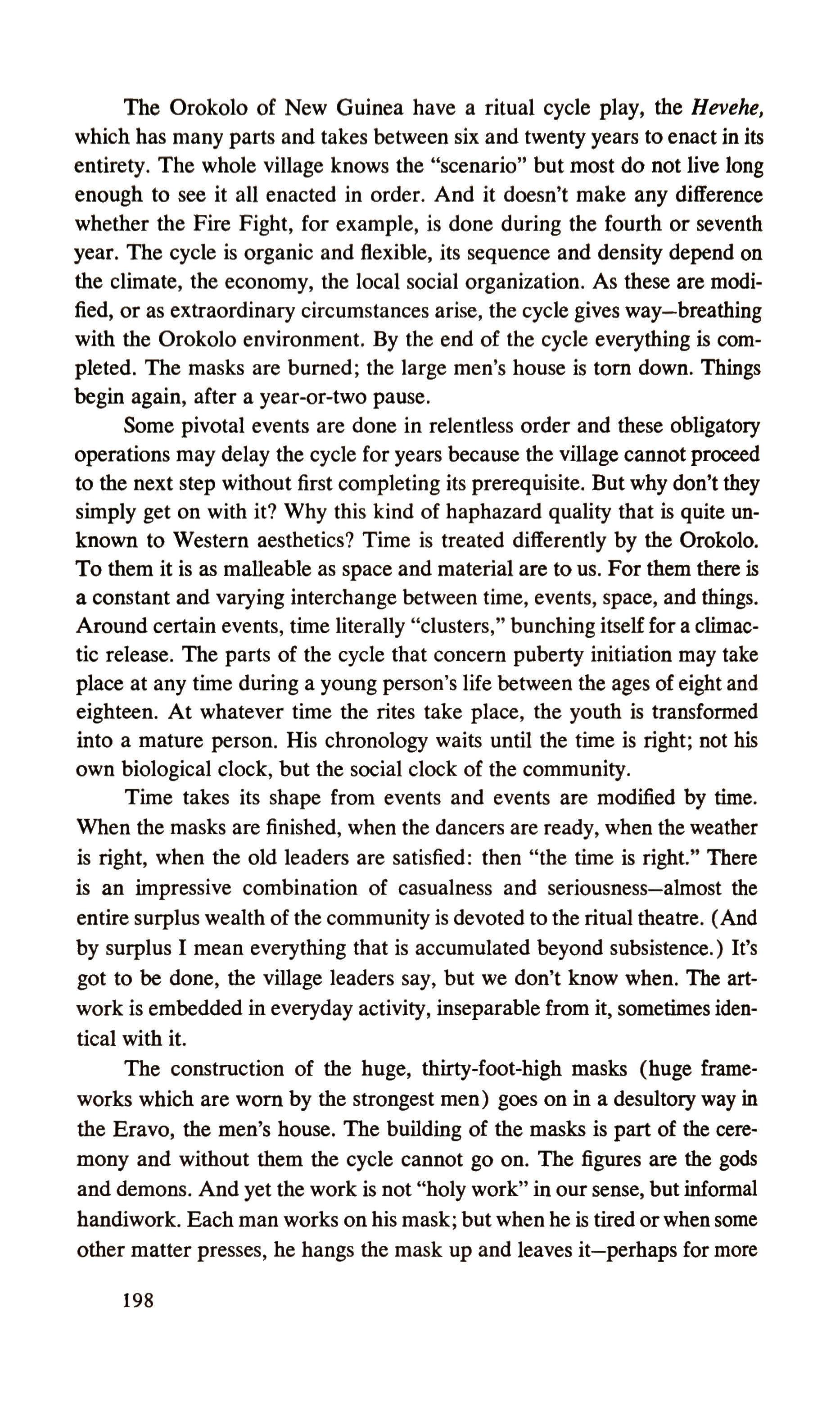
The Orokolo of New Guinea have a ritual cycle play, the Hevehe, which has many parts and takes between six and twenty years to enact in its entirety. The whole village knows the "scenario" but most do not live long enough to see it all enacted in order. And it doesn't make any difference whether the Fire Fight, for example, is done during the fourth or seventh year. The cycle is organic and flexible, its sequence and density depend on the climate, the economy, the local social organization. As these are modified, or as extraordinary circumstances arise, the cycle gives way breathing with the Orokolo environment. By the end of the cycle everything is completed. The masks are burned; the large men's house is torn down. Things begin again, after a year-or-two pause.
Some pivotal events are done in relentless order and these obligatory operations may delay the cycle for years because the village cannot proceed to the next step without first completing its prerequisite. But why don't they simply get on with it? Why this kind of haphazard quality that is quite unknown to Western aesthetics? Time is treated differently by the Orokolo. To them it is as malleable as space and material are to us. For them there is a constant and varying interchange between time, events, space, and things. Around certain events, time literally "clusters," bunching itself for a climactic release. The parts of the cycle that concern puberty initiation may take place at any time during a young person's life between the ages of eight and eighteen. At whatever time the rites take place, the youth is transformed into a mature person. His chronology waits until the time is right; not his own biological clock, but the social clock of the community.
Time takes its shape from events and events are modified by time. When the masks are finished, when the dancers are ready, when the weather is right, when the old leaders are satisfied: then "the time is right." There is an impressive combination of casualness and seriousness almost the entire surplus wealth of the community is devoted to the ritual theatre. (And by surplus I mean everything that is accumulated beyond subsistence.) It's got to be done, the village leaders say, but we don't know when. The artwork is embedded in everyday activity, inseparable from it, sometimes identical with it.
The construction of the huge, thirty-foot-high masks (huge D'3Ineworks which are worn by the strongest men) goes on in a desultory way in the Eravo, the men's house. The building of the masks is part of the ceremony and without them the cycle cannot go on. The figures a I e the gods and demons. And yet the work is not "holy work" in our sense, but informal handiwork. Each man works on his mask; but when he is tired or when some other matter presses, he hangs the mask up and leaves it perhaps for more
198
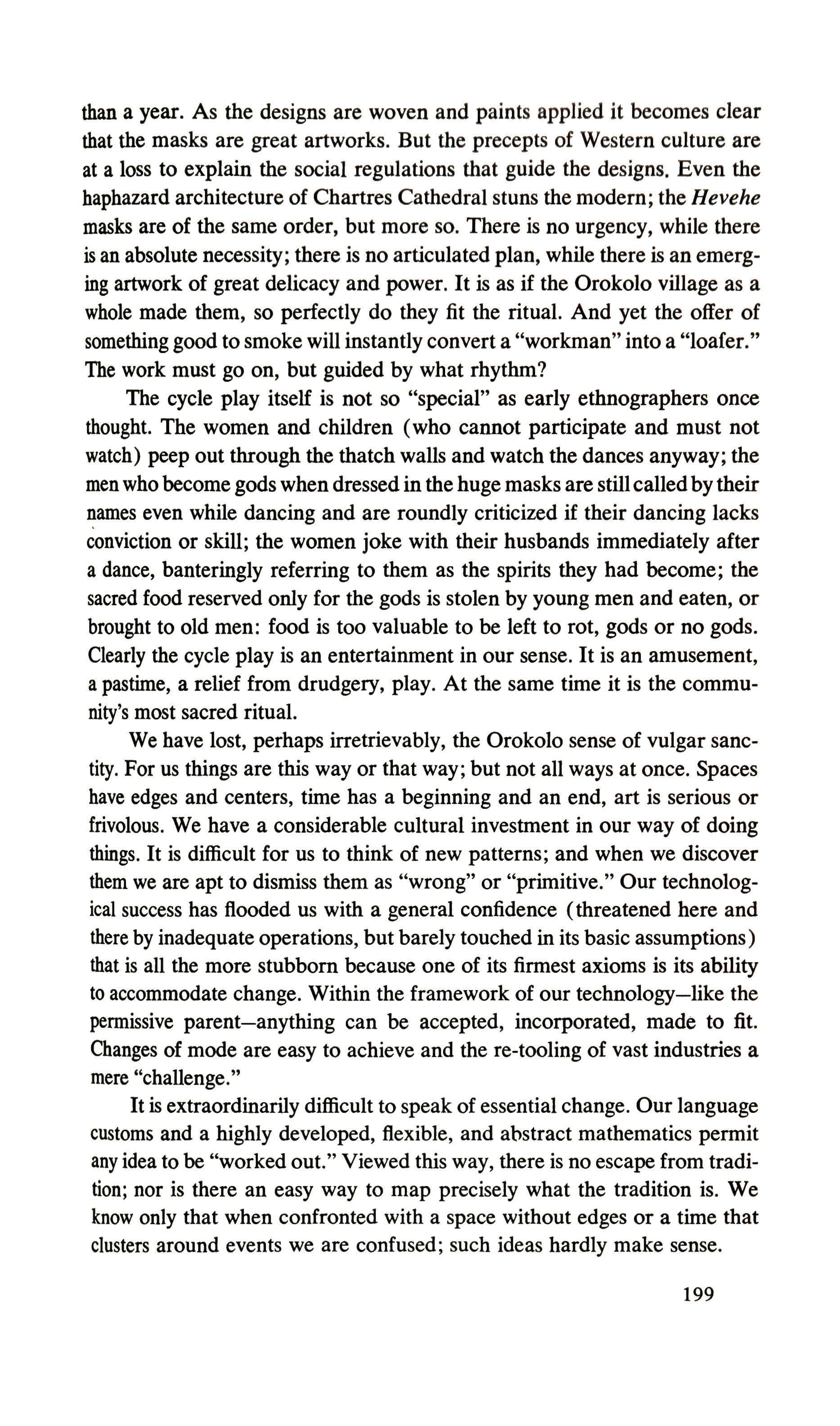
than a year. As the designs are woven and paints applied it becomes clear that the masks are great artworks. But the precepts of Western culture are at a loss to explain the social regulations that guide the designs. Even the haphazard architecture of Chartres Cathedral stuns the modem; the Hevehe masks are of the same order, but more so. There is no urgency, while there is an absolute necessity; there is no articulated plan, while there is an emerging artwork of great delicacy and power. It is as if the Orokolo village as a whole made them, so perfectly do they fit the ritual. And yet the offer of somethinggood to smoke will instantly convert a "workman" into a "loafer." The work must go on, but guided by what rhythm?
The cycle play itself is not so "special" as early ethnographers once thought. The women and children (who cannot participate and must not watch) peep out through the thatch walls and watch the dances anyway; the men who become gods when dressed in the huge masks are stillcalledbytheir names even while dancing and are roundly criticized if their dancing lacks conviction or skill; the women joke with their husbands immediately after a dance, banteringly referring to them as the spirits they had become; the sacred food reserved only for the gods is stolen by young men and eaten, or brought to old men: food is too valuable to be left to rot, gods or no gods. Clearly the cycle play is an entertainment in our sense. It is an amusement, a pastime, a relief from drudgery, play. At the same time it is the community's most sacred ritual.
We have lost, perhaps irretrievably, the Orokolo sense of vulgar sanctity. For us things are this way or that way; but not all ways at once. Spaces have edges and centers, time has a beginning and an end, art is serious or frivolous. We have a considerable cultural investment in our way of doing things. It is difficult for us to think of new patterns; and when we discover them we are apt to dismiss them as "wrong" or "primitive." Our technological success has flooded us with a general confidence (threatened here and there by inadequate operations, but barely touched in its basic assumptions) that is all the more stubborn because one of its firmest axioms is its ability to accommodate change. Within the framework of our technology like the permissive parent anything can be accepted, incorporated, made to fit. Changes of mode are easy to achieve and the re-tooling of vast industries a mere "challenge."
It is extraordinarily difficult to speak of essential change. Our language customs and a highly developed, flexible, and abstract mathematics permit any idea to be "worked out." Viewed this way, there is no escape from tradition; nor is there an easy way to map precisely what the tradition is. We know only that when confronted with a space without edges or a time that clusters around events we are confused; such ideas hardly make sense. 199
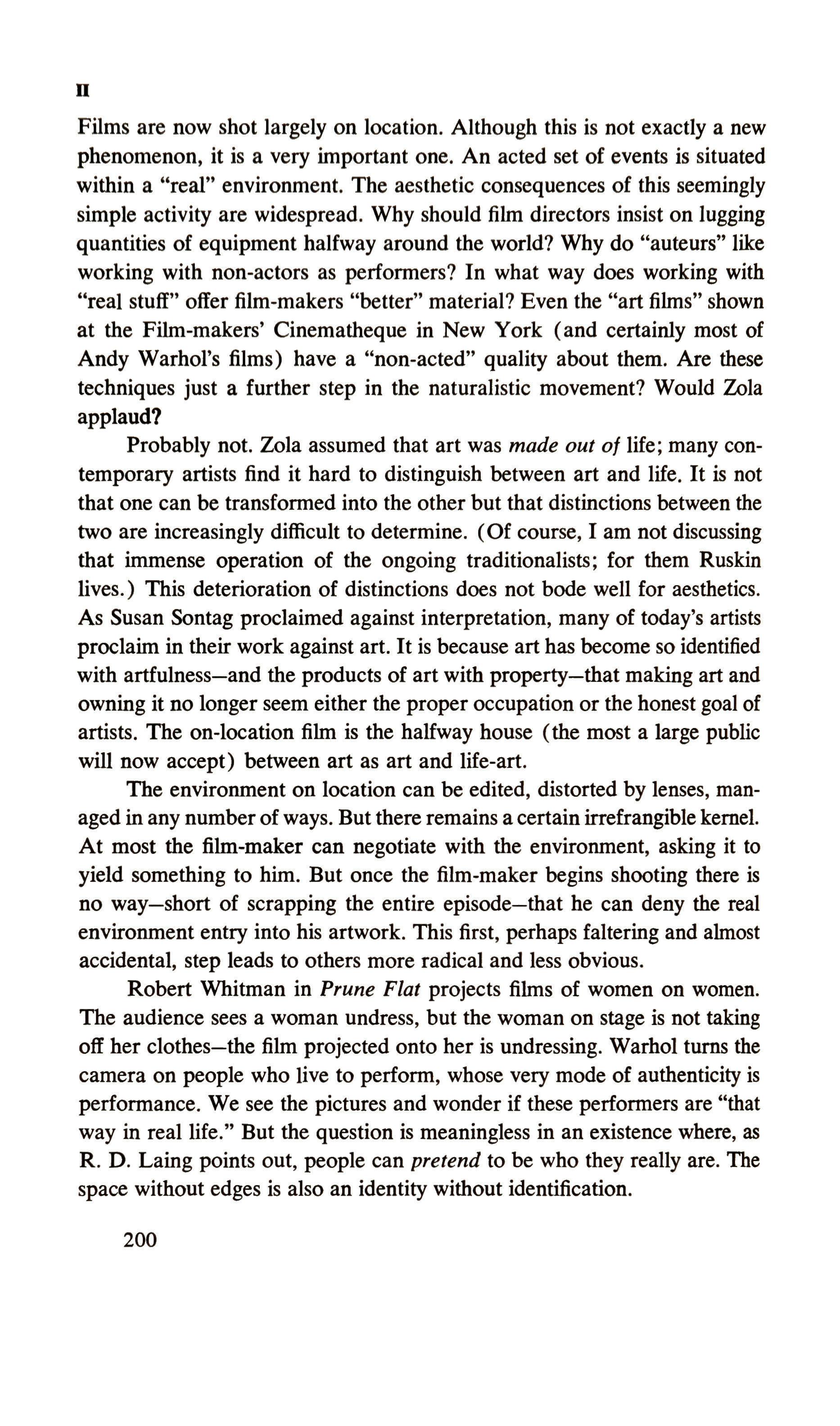
Films are now shot largely on location. Although this is not exactly a new phenomenon, it is a very important one. An acted set of events is situated within a "real" environment. The aesthetic consequences of this seemingly simple activity are widespread. Why should film directors insist on lugging quantities of equipment halfway around the world? Why do "auteurs" like working with non-actors as performers? In what way does working with "real stuff" offer film-makers "better" material? Even the "art films" shown at the Film-makers' Cinematheque in New York (and certainly most of Andy Warhol's films) have a "non-acted" quality about them. Are these techniques just a further step in the naturalistic movement? Would Zola applaud?
Probably not. Zola assumed that art was made out 0/ life; many contemporary artists find it hard to distinguish between art and life. It is not that one can be transformed into the other but that distinctions between the two are increasingly difficult to determine. (Of course, I am not discussing that immense operation of the ongoing traditionalists; for them Ruskin lives.) This deterioration of distinctions does not bode well for aesthetics. As Susan Sontag proclaimed against interpretation, many of today's artists proclaim in their work against art. It is because art has become so identified with artfulness and the products of art with property that making art and owning it no longer seem either the proper occupation or the honest goal of artists. The on-location film is the halfway house (the most a large public will now accept) between art as art and life-art.
The environment on location can be edited, distorted by lenses, managed in any number of ways. But there remains a certain irrefrangible kernel. At most the film-maker can negotiate with the environment, asking it to yield something to him. But once the film-maker begins shooting there is no way short of scrapping the entire episode that he can deny the real environment entry into his artwork. This first, perhaps faltering and almost accidental, step leads to others more radical and less obvious.
Robert Whitman in Prune Flat projects films of women on women. The audience sees a woman undress, but the woman on stage is not taking off her clothes the film projected onto her is undressing. Warhol t11(11S the camera on people who live to perform, whose very mode of authenticity is performance, We see the pictures and wonder if these perf01mers are "that way in real life." But the question is meaningless in an existence where, as R. D. Laing points out, people can pretend to be who they really are. The space without edges is also an identity without identification.
200
D
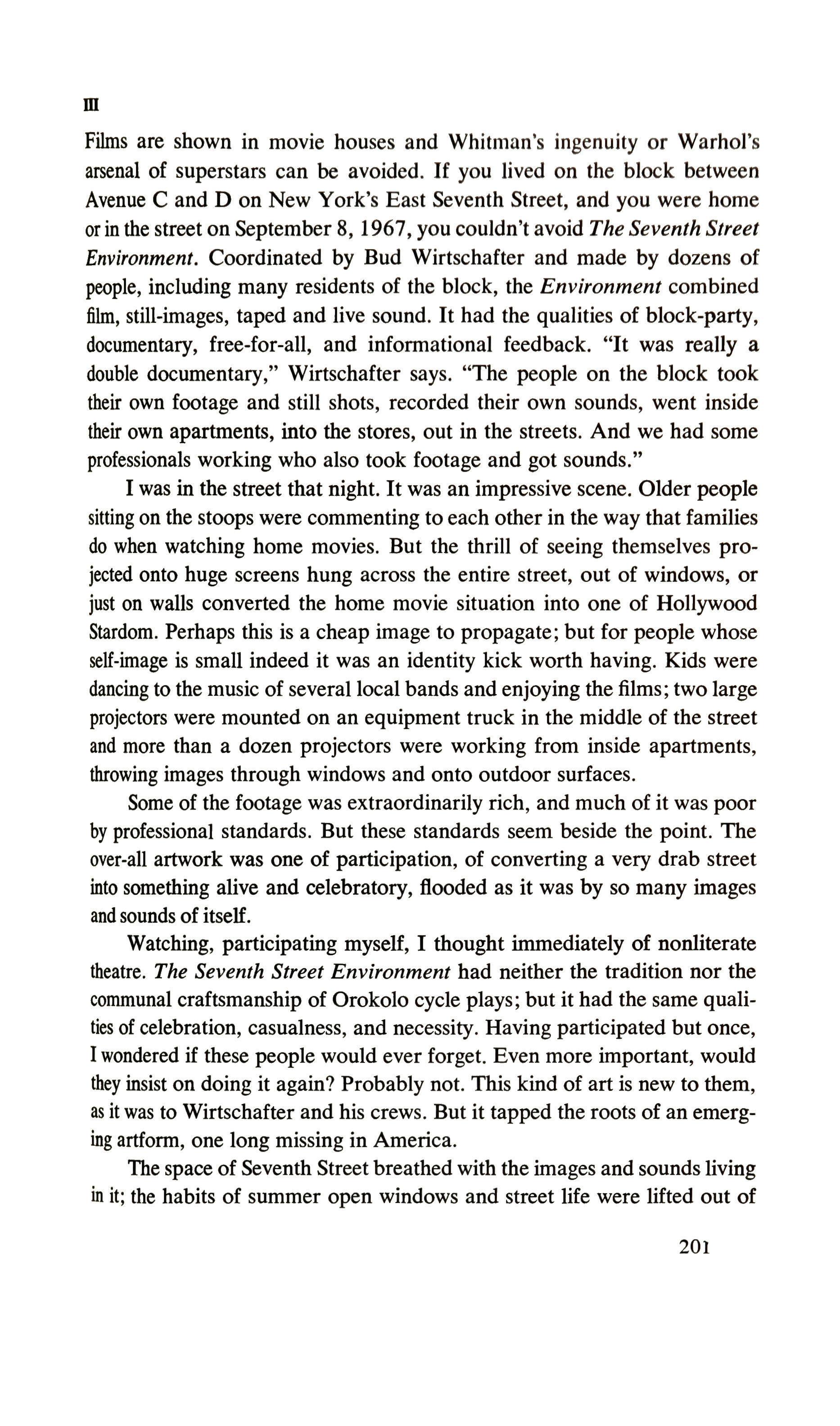
m
Films are shown in movie houses and Whitman's ingenuity or Warhol's arsenal of superstars can be avoided. If you lived on the block between Avenue C and D on New York's East Seventh Street, and you were home orin the street on September 8, 1967, you couldn't avoid The Seventh Street Environment. Coordinated by Bud Wirtschafter and made by dozens of people, including many residents of the block, the Environment combined film, still-images, taped and live sound. It had the qualities of block-party, documentary, free-for-all, and informational feedback. "It was really a double documentary," Wirtschafter says. "The people on the block took their own footage and still shots, recorded their own sounds, went inside their own apartments, into the stores, out in the streets. And we had some professionals working who also took footage and got sounds."
I was in the street that night. It was an impressive scene. Older people sitting on the stoops were commenting to each other in the way that families do when watching home movies. But the thrill of seeing themselves projected onto huge screens hung across the entire street, out of windows, or just on walls converted the home movie situation into one of Hollywood Stardom. Perhaps this is a cheap image to propagate; but for people whose self-image is small indeed it was an identity kick worth having. Kids were dancing to the music of several local bands and enjoying the films; two large projectors were mounted on an equipment truck in the middle of the street and more than a dozen projectors were working from inside apartments, throwing images through windows and onto outdoor surfaces.
Some of the footage was extraordinarily rich, and much of it was poor by professional standards. But these standards seem beside the point. The over-all artwork was one of participation, of converting a very drab street into something alive and celebratory, flooded as it was by so many images and sounds of itself.
Watching, participating myself, I thought immediately of nonliterate theatre. The Seventh Street Environment had neither the tradition nor the communal craftsmanship of Orokolo cycle plays; but it had the same qualities of celebration, casualness, and necessity. Having participated but once, I wondered if these people would ever forget. Even more important, would they insist on doing it again? Probably not. This kind of art is new to them, as it was to Wirtschafter and his crews. But it tapped the roots of an emerging artform, one long missing in America.
The space of Seventh Street breathed with the images and sounds living in it; the habits of summer open windows and street life were lifted out of
201
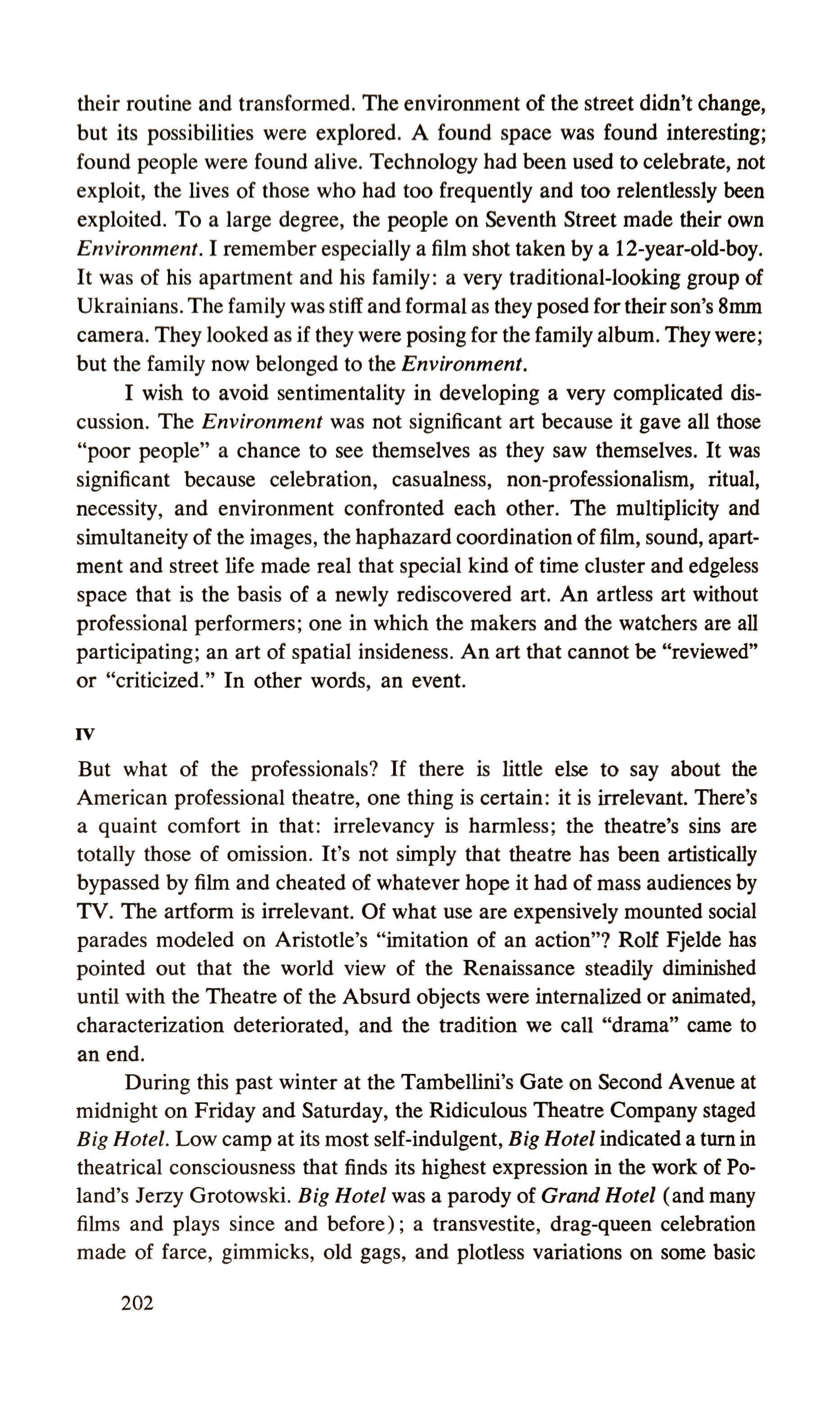
their routine and transformed. The environment of the street didn't change, but its possibilities were explored. A found space was found interesting; found people were found alive. Technology had been used to celebrate, not exploit, the lives of those who had too frequently and too relentlessly been exploited. To a large degree, the people on Seventh Street made their own Environment. I remember especially a film shot taken by a 12-year-old-boy. It was of his apartment and his family: a very traditional-looking group of Ukrainians. The family was stiff and formal as theyposed for their son's Smm camera. They looked as if they were posing for the family album. They were; but the family now belonged to the Environment.
I wish to avoid sentimentality in developing a very complicated discussion. The Environment was not significant art because it gave all those "poor people" a chance to see themselves as they saw themselves. It was significant because celebration, casualness, non-professionalism, ritual, necessity, and environment confronted each other. The multiplicity and simultaneity of the images, the haphazard coordination of film, sound, apartment and street life made real that special kind of time cluster and edgeless space that is the basis of a newly rediscovered art. An artless art without professional performers; one in which the makers and the watchers are all participating; an art of spatial insideness. An art that cannot be "reviewed" or "criticized." In other words, an event.
IV
But what of the professionals? If there is little else to say about the American professional theatre, one thing is certain: it is irrelevant. There's a quaint comfort in that: irrelevancy is harmless; the theatre's sins are totally those of omission. It's not simply that theatre has been artistically bypassed by film and cheated of whatever hope it had of mass audiences by TV. The artform is irrelevant. Of what use are expensively mounted social parades modeled on Aristotle's "imitation of an action"? Rolf Fjelde has pointed out that the world view of the Renaissance steadily diminished until with the Theatre of the Absurd objects were internalized or animated, characterization deteriorated, and the tradition we call "drama' came to an end.
During this past winter at the Tambellini's Gate on Second Avenue at midnight on Friday and Saturday, the Ridiculous Theatre Company staged Big Hotel. Low camp at its most self-indulgent, Big Hotel indicated a turn in theatrical consciousness that finds its highest expression in the work of Poland's Jerzy Grotowski. Big Hotel was a parody of Grand Hotel (and many films and plays since and before); a transvestite, drag-queen celebration made of farce, gimmicks, old gags, and plotless variations on some basic
202
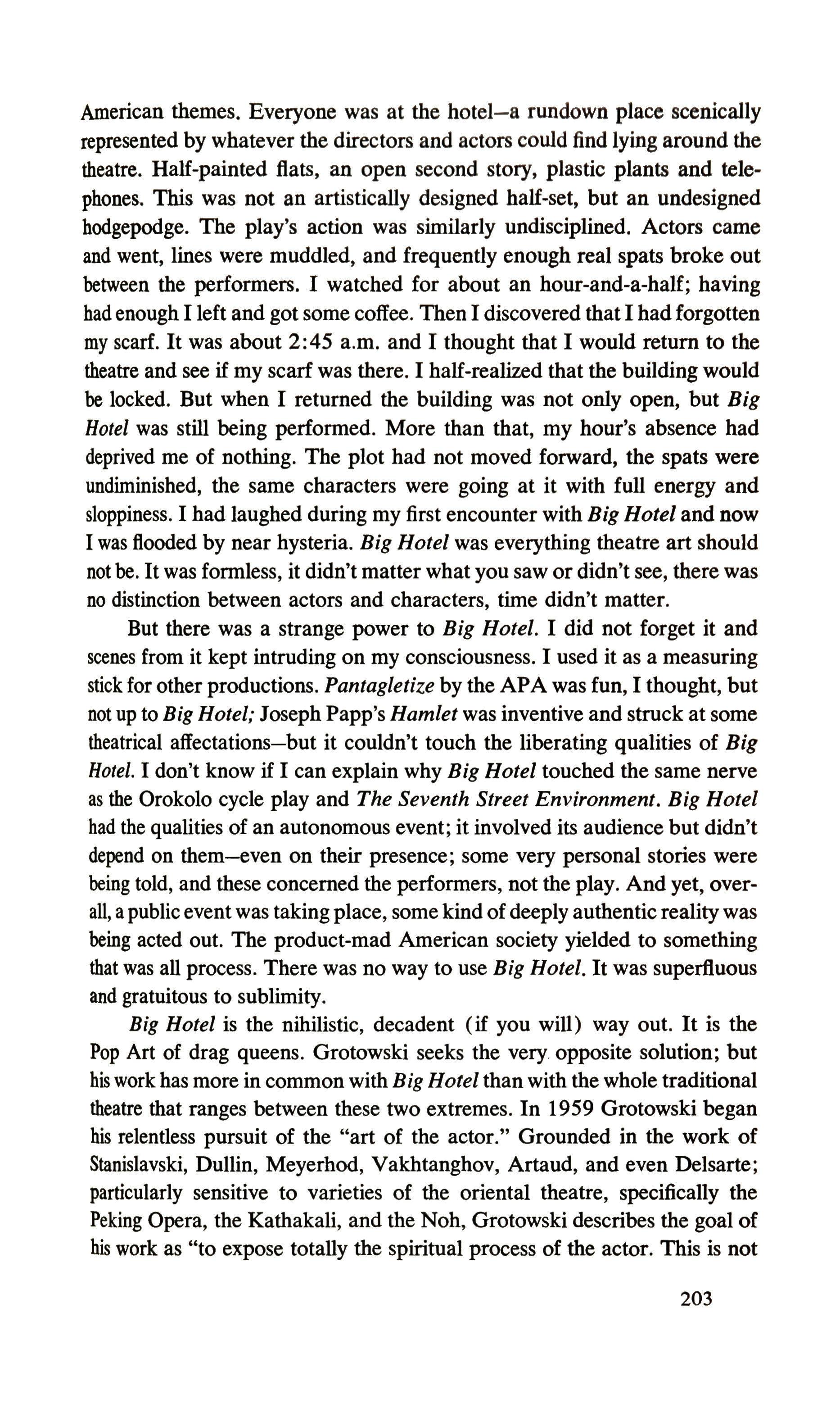
American themes. Everyone was at the hotel a rundown place scenically represented by whatever the directors and actors could find lying around the theatre. Half-painted flats, an open second story, plastic plants and telephones. This was not an artistically designed half-set, but an undesigned hodgepodge. The play's action was similarly undisciplined. Actors came and went, lines were muddled, and frequently enough real spats broke out between the performers. I watched for about an hour-and-a-half; having had enough I left and got some coffee. Then I discovered that I had forgotten my scarf. It was about 2:45 a.m. and I thought that I would return to the theatre and see if my scarf was there. I half-realized that the building would be locked. But when I returned the building was not only open, but Big Hotel was still being performed. More than that, my hour's absence had deprived me of nothing. The plot had not moved forward, the spats were undiminished, the same characters were going at it with full energy and sloppiness. I had laughed during my first encounter with Big Hotel and now I was flooded by near hysteria. Big Hotel was everything theatre art should not be. It was formless, it didn't matter what you saw or didn't see, there was no distinction between actors and characters, time didn't matter.
But there was a strange power to Big Hotel. I did not forget it and scenes from it kept intruding on my consciousness. I used it as a measuring stick for other productions. Pantagletize by the APA was fun, I thought, but not up to Big Hotel; Joseph Papp's Hamlet was inventive and struck at some theatrical affectations but it couldn't touch the liberating qualities of Big Hotel. I don't know if I can explain why Big Hotel touched the same nerve as the Orokolo cycle play and The Seventh Street Environment. Big Hotel had the qualities of an autonomous event; it involved its audience but didn't depend on them even on their presence; some very personal stories were being told, and these concerned the performers, not the play. And yet, overall, a public event was takingplace, some kind of deeply authentic reality was being acted out. The product-mad American society yielded to something that was all process. There was no way to use Big Hotel. It was superfluous and gratuitous to SUblimity.
Big Hotel is the nihilistic, decadent (if you will) way out. It is the Pop Art of drag queens. Grotowski seeks the very. opposite solution; but his work has more in common with Big Hotel than with the whole traditional theatre that ranges between these two extremes. In 1959 Grotowski began his relentless pursuit of the "art of the actor." Grounded in the work of Stanislavski, Dullin, Meyerhod, Vakhtanghov, Artaud, and even Delsarte; particularly sensitive to varieties of the oriental theatre, specifically the Peking Opera, the Kathakali, and the Noh, Grotowski describes the goal of his work as "to expose totally the spiritual process of the actor. This is not
203
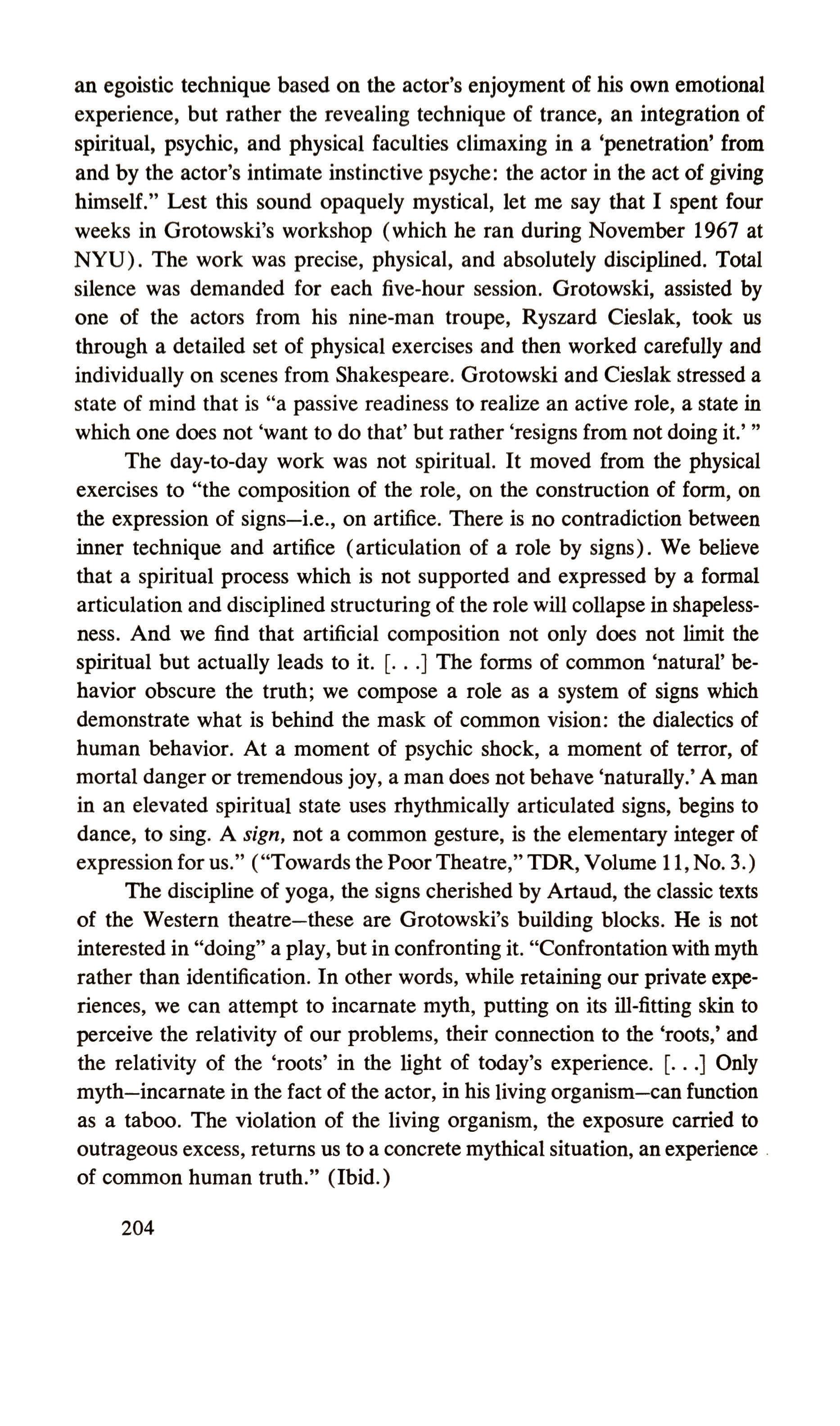
an egoistic technique based on the actor's enjoyment of his own emotional experience, but rather the revealing technique of trance, an integration of spiritual, psychic, and physical faculties climaxing in a 'penetration' from and by the actor's intimate instinctive psyche: the actor in the act of giving himself." Lest this sound opaquely mystical, let me say that I spent four weeks in Grotowski's workshop (which he ran during November 1967 at NYU). The work was precise, physical, and absolutely disciplined. Total silence was demanded for each five-hour session. Grotowski, assisted by one of the actors from his nine-man troupe, Ryszard Cieslak, took us through a detailed set of physical exercises and then worked carefully and individually on scenes from Shakespeare. Grotowski and Cieslak stressed a state of mind that is "a passive readiness to realize an active role, a state in which one does not 'want to do that' but rather 'resigns from not doing it.'
The day-to-day work was not spiritual. It moved from the physical exercises to "the composition of the role, on the construction of fOIIII, on the expression of signs i.e., on artifice. There is no contradiction between inner technique and artifice (articulation of a role by signs). We believe that a spiritual process which is not supported and expressed by a formal articulation and disciplined structuring of the role will collapse in shapelessness. And we find that artificial composition not only does not limit the spiritual but actually leads to it. [ J The forms of common 'natural' behavior obscure the truth; we compose a role as a system of signs which demonstrate what is behind the mask of com mon vision: the dialectics of human behavior. At a moment of psychic shock, a moment of terror, of mortal danger or tremendous joy, a man does not behave 'naturally.' A man in an elevated spiritual state uses rhythmically articulated signs, begins to dance, to sing. A sign, not a common gesture, is the elementary integer of expression for us." ("Towards the Poor Theatre,"TOR, Volume 11, No.3.)
The discipline of yoga, the signs cherished by Artaud, the classic texts of the Western theatre these are Grotowski's building blocks. He is not interested in "doing" a play, but in confronting it. "Confrontation with myth rather than identification. In other words, while retaining our private experiences, we can attempt to incarnate myth, putting on its ill-fitting skin to perceive the relativity of our problems, their connection to the 'roots,' and the relativity of the 'roots' in the light of today's experience. [ J Only myth incarnate in the fact of the actor, in his living organism can function as a taboo. The violation of the living organism, the exposure carried to outrageous excess, returns us to a concrete mythical situation, an experience of common human truth." (Ibid.)
204
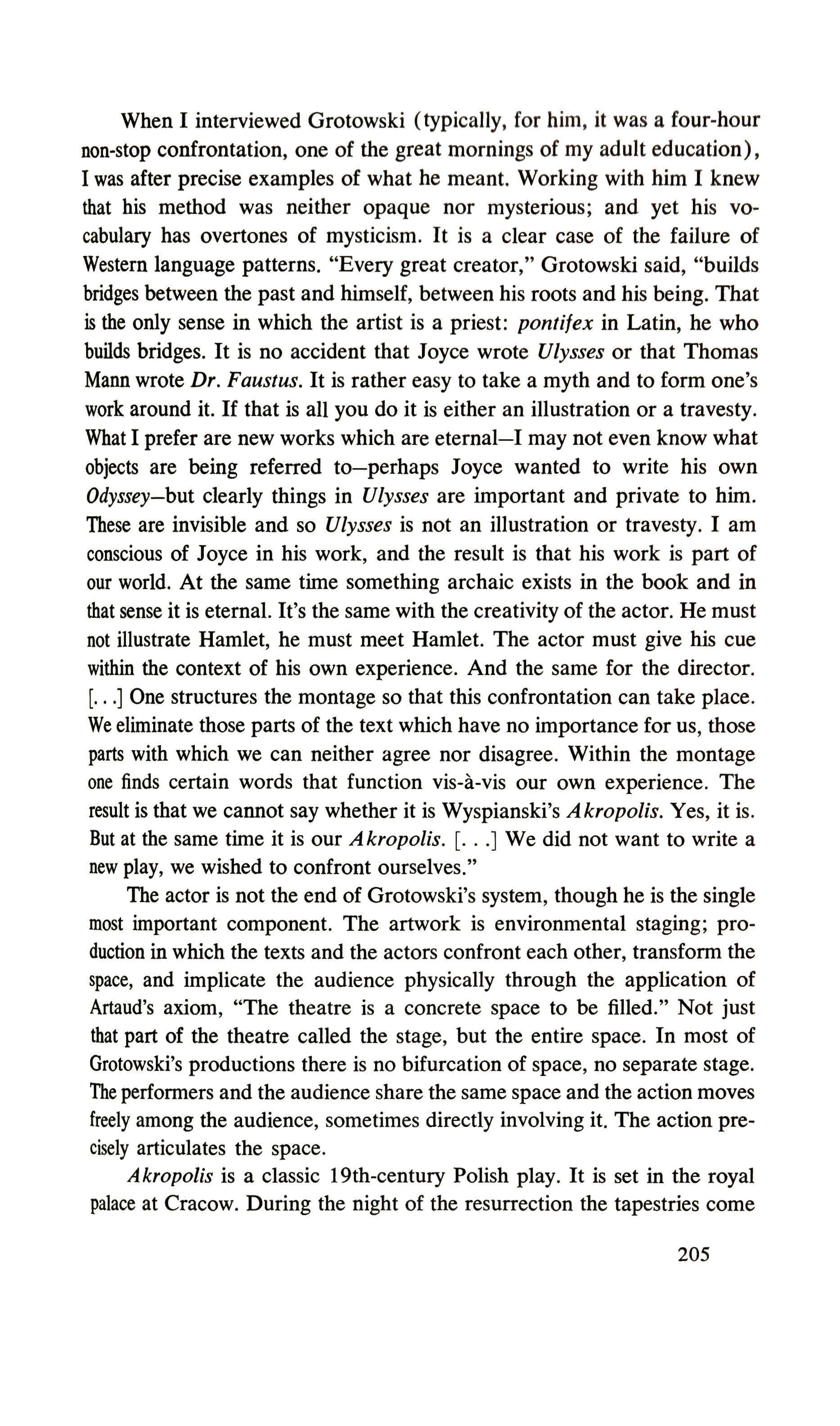
When I interviewed Grotowski (typically. for him. it was a four-hour non-stop confrontation. one of the great mornings of my adult education), I was after precise examples of what he meant. Working with hiln I knew that his method was neither opaque nor mysterious; and yet his vocabulary has overtones of mysticism. It is a clear case of the failure of Western language patterns. "Every great creator," Grotowski said, "builds bridges between the past and himself, between his roots and his being. That is the only sense in which the artist is a priest: pontijex in Latin, he who builds bridges. It is no accident that Joyce wrote Ulysses or that Thomas Mann wrote Dr. Faustus. It is rather easy to take a myth and to form one's work around it. If that is all you do it is either an illustration or a travesty. What I prefer are new works which are eternal I may not even know what objects are being referred to perhaps Joyce wanted to write his own Odyssey but clearly things in Ulysses are important and private to him. These are invisible and so Ulysses is not an illustration or travesty. I am conscious of Joyce in his work, and the result is that his work is part of our world. At the same time something archaic exists in the book and in that sense it is eternal. It's the same with the creativity of the actor. He must not illustrate Hamlet, he must meet Hamlet. The actor must give his cue within the context of his own experience. And the same for the director. [ J One structures the montage so that this confrontation can take place. We eliminate those parts of the text which have no importance for us, those parts with which we can neither agree nor disagree. Within the montage one finds certain words that function vis-a-vis our own experience. The result is that we cannot say whether it is Wyspianski's A kropolis. Yes, it is. But at the same time it is our Akropolis. [ J We did not want to write a new play, we wished to confront ourselves."
The actor is not the end of Grotowski's system, though he is the single most important component. The artwork is environmental staging; production in which the texts and the actors confront each other, transform the space, and implicate the audience physically through the application of Artaud's axiom, "The theatre is a concrete space to be filled." Not just that part of the theatre called the stage, but the entire space. In most of Grotowski's productions there is no bifurcation of space, no separate stage. The performers and the audience share the same space and the action moves freely among the audience, sometimes directly involving it. The action precisely articulates the space.
Akropolis is a classic 19th-century Polish play. It is set in the royal palace at Cracow. During the night of the resurrection the tapestries come
205

to life and play out episodes from European and Polish history. It ends with the advent of Christ, who leads a triumphant procession forth to liberate Europe. "All very good," says Grotowski, "but the royal palace is not a sanctuary any more and this is not the 19th century." Working from the premise that the 19th century was "Poland's ruined past, [ J the cemetery of our civilization," Akropolis became Auschwitz, the place where "all nations encountered each other, [ J all the tribes were there waiting for something, but the Messiah never came for those who were killed." It was an Auschwitz that was very real to some of Grotowski's actors. "We did not wish to have a stereotyped production with evil SS men and noble prisoners. We cannot play prisoners, we cannot create such images in the theatre. Any documentary film is stronger. [ J What is Auschwitz? Is it something we could organize today? A world which functions inside us. Thus there were no SS men, only prisoners who so organized the space that they must oppress each other to survive. [ J We did not show victims but the rules of the game: in order not to be a victim one must make a victim of someone else. [ J The prisoners worked all the time, They took metal pipes that were piled in the center of the room and built something. At the start the room was empty except for the pile of pipes and there was a seating a I rangement for the audience. By the end of the production the entire room was filled, oppressed, by the metal. The audience could no longer see. The construction was made of heating pipes. We didn't build a crematorium but we gave the spectators the association of fire. It was indirect. Nevertheless afterwards the spectators said that we had built a crematorium.'
Anyone who has seen Grotowski's productions, or even pictures of them, knows how space and events are coordinated to form a unity, It is not the unity of sensory overload where distinctions are washed away by volume, Rather it flows from the principle (known to the Orokolo) that space, events, and time are not separable;they are three terms for one circumstance, one organic situation. The metal structure of Akropolis is that production's objective correlative: "a set of objects, a situation, a chain of events which shall be the formula of that particular emotion; such that when the external facts, which must terminate in sensory experience, are given, the emotion is immediately evoked." We can add to Eliot's definition only the qualification that in Akropolis the emotion was not "evoked" but literally built.' the environmental image is in-the-making during the entire performance; suddenly it "arrives." At that moment the audience knows that the random structure of pipes is a crematorium, although it does not architecturally resemble one.
206

LA GRANGE, Ga. (AP) Mn. A. Landon Morrow, Sr. was watcbing the late news program on television and a film report on figb'ing in Vietnam eaught ber attention. Suddenly tbere was a familiar face in battle gear.
Sbe looked, tben sbouted: "Come, quick, Landon, bere's our son."
The camera bad focused brieHy on Specialist 4 Landon Merrow, Jr., a radio operator, as tbe newsman described figbting in "Operation Manbattan."
As tbe La Grange couple listened and watcbed, the newsman described an explosion tbat bad wounded a cap· tain and a radio operator. Then there was a film closeup of a soldier lying on the ground.
"We knew then that was our son," said Mrs. Morrow. "We didn't see the explosion but tbe next time tbey put the camera on him be was lying on tbe ground. There were two or three soldiers working on him. We could tell be was wounded."
Tbe next day tbe Morrows and tbeir daughter-In-law received telegrams explaining that the 20.year·old soldier bad been w011nded but would survive.
What does it mean to sit in your living-room and watch your son get shot? Or see Jack Ruby shoot Lee Harvey Oswald? This is theatre without drama, performance without aesthetics. Here the space truly has no edge and the event no single time reference. The Morrows sit down for their evening's entertainment. The war is just another program; sponsored like the rest, managed and presented with aplomb and style. It is not "raw war," but carefully edited like a good war movie. But then, unexpectedly, the program becomes a home movie they didn't photograph; another episode in the Morrow family, "Come quick, Landon, here's our son." The rest is anguish: reality ruining the entertainment. But for all the others watchingas for the Morrows on some other night death and wounds are entertainment. At least the newspapers reduce the images to words; the confrontation is not direct. Here the real event is plugged into the La Grange living room and Landon Morrow, Jr., is shot both in Vietnam and at home.
This new experience is one in which larger spaces can be contained
v
207

within smaller spaces; in which events occurring at great distances can be immediately experienced; in which the passive observer is abruptly converted into a participant. Reality itself is not validated by experience but by the encapsulated reproduction of experience. The distinctions between "out there" and "in here" are blurred. For the Morrows exactly when was their son wounded? Was it the moment it "actually" occurred, or was it when the Morrows saw it on TV? And when young Morrow comes home will he be a wounded veteran or a neighborhood TV celebrity? These confusions are with us to stay. They mayor may not contribute to an increasing insensitivity to suffering. Surely they will muddle the artsone of whose traditional functions it has been to remind men of the extremes of suffering and joy. The mimetic function of art is usurped by media capable of offering the real thing. But a reverse flow is begun in which the arts usurp reality'S function of providing authentic experience. The confrontation of Grotowski's Akropolis and the blatant acting-out of Big Hotel are harbingers of an art in which reality is programmed; the experience of acting in Grotowski's troupe is not that of "playing parts" but of engaging one's own profoundest terrors and celebrations. The "actors" of Big Hotel are not squeamish about playing themselves. Kaprow shuns professional performers and sets portions of his happenings in supermarkets, on public highways, in motel rooms, in your own house. If everywhere around us a histrionic sensibility conditions living, conversely theatre has adapted the modes of authenticity.
Erving Goffman, one of the pioneer map-makers in this difficult territory, puts it very well in the preface to his The Presentation of Self in Everyday Life: "The perspective employed in this report is that of the theatrical performance; the principles derived are dramaturgical ones. [ J In using this model I will attempt not to make light of its obvious inadequacies. The stage presents things that are make-believe; presumably life presents things that are real and sometimes not well rehearsed. More important, perhaps, on the stage one player presents himself in the guise of a character to characters projected by other players; the audience constitutes a third party to the interaction one that is essential and yet, if the performance were real, one that would not be there." This was written in 1959, and I wonder if Goffman has subsequently changed his mind. The distinctive features he attributes to theatre are precisely those which have eroded so swiftly during the past five years. We have ongoing theatrical activity that is not "make-believe," in which actors present themselves as actors and not as characters, and in which the audience is either physically involved or nonexistent. Where then does that leave "life"?
208
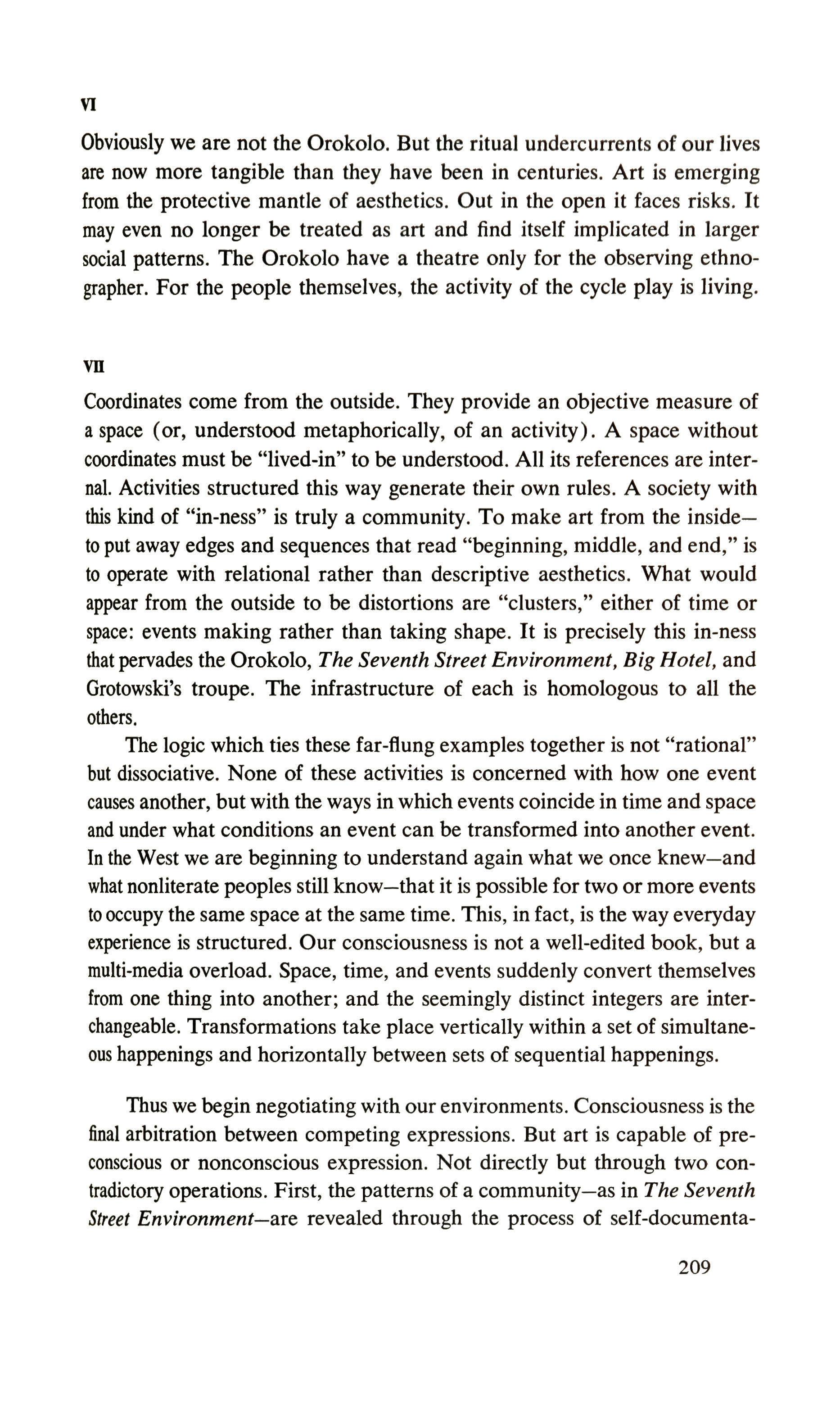
VI
Obviously we are not the Orokolo. But the ritual undercurrents of our lives are now more tangible than they have been in centuries. Art is emerging from the protective mantle of aesthetics. Out in the open it faces risks. It may even no longer be treated as art and find itself implicated in larger social patterns. The Orokolo have a theatre only for the observing ethnographer. For the people themselves, the activity of the cycle play is living.
VB
Coordinates come from the outside. They provide an objective measure of a space (or, understood metaphorically, of an activity). A space without coordinates must be "lived-in" to be understood. All its references are internal. Activities structured this way generate their own rules. A society with this kind of "in-ness" is truly a community. To make art from the insideto put away edges and sequences that read "beginning, middle, and end," is to operate with relational rather than descriptive aesthetics. What would appear from the outside to be distortions are "clusters," either of time or space: events making rather than taking shape. It is precisely this in-ness that pervades the Orokolo, The Seventh Street Environment, Big Hotel, and Grotowski's troupe. The infrastructure of each is homologous to all the others.
The logic which ties these far-flung examples together is not "rational" but dissociative. None of these activities is concerned with how one event causes another, but with the ways in which events coincide in time and space and under what conditions an event can be transformed into another event. In the West we are beginning to understand again what we once knew and what nonliterate peoples still know that it is possible for two or more events to occupy the same space at the same time. This, in fact, is the way everyday experience is structured. Our consciousness is not a well-edited book, but a multi-media overload. Space, time, and events suddenly convert themselves from one thing into another; and the seemingly distinct integers are interchangeable. Transformations take place vertically within a set of simultaneous happenings and horizontally between sets of sequential happenings.
Thus we begin negotiating with our environments. Consciousness is the final arbitration between competing expressions. But art is capable of preconscious or nonconscious expression. Not directly but through two contradictory operations. First, the patterns of a community as in The Seventh Street Environment are revealed through the process of self-documenta-
209
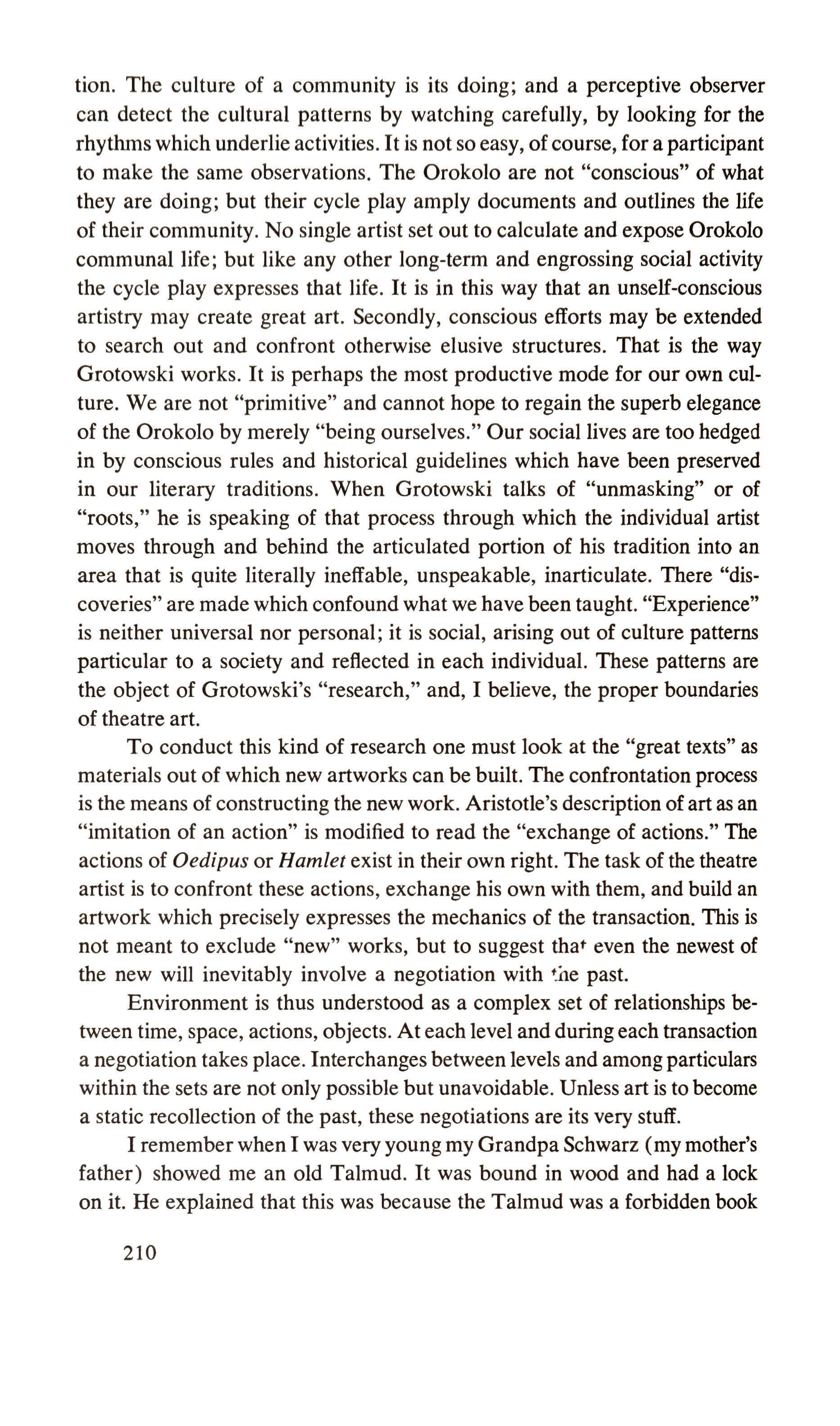
tion. The culture of a community is its doing; and a perceptive observer can detect the cultural patterns by watching carefully, by looking for the rhythms which underlie activities. It is not so easy, of course, for a participant to make the same observations. The Orokolo are not "conscious" of what they are doing; but their cycle play amply documents and outlines the life of their community. No single artist set out to calculate and expose Orokolo communal life; but like any other long-term and engrossing social activity the cycle play expresses that life. It is in this way that an unself-conscious artistry may create great art. Secondly, conscious efforts may be extended to search out and confront otherwise elusive structures. That is the way Grotowski works. It is perhaps the most productive mode for our own culture. We are not "primitive" and cannot hope to regain the superb elegance of the Orokolo by merely "being ourselves." Our social lives are too hedged in by conscious rules and historical guidelines which have been preserved in our literary traditions. When Grotowski talks of "unmasking" or of "roots," he is speaking of that process through which the individual artist moves through and behind the articulated portion of his tradition into an area that is quite literally ineffable, unspeakable, inarticulate. There "discoveries" are made which confound what we have been taught. "Experience" is neither universal nor personal; it is social, arising out of culture patterns particular to a society and reflected in each individual. These patterns are the object of Grotowski's "research," and, I believe, the proper boundaries of theatre art.
To conduct this kind of research one must look at the "great texts" as materials out of which new artworks can be built. The confrontation process is the means of constructing the new work. Aristotle's description of art as an "imitation of an action" is modified to read the "exchange of actions." The actions of Oedipus or Hamlet exist in their own right. The task of the theatre artist is to confront these actions, exchange his own with them, and build an artwork which precisely expresses the mechanics of the transaction. This is not meant to exclude "new" works, but to suggest that even the newest of the new will inevitably involve a negotiation with �ile past.
Environment is thus understood as a complex set of relationships between time, space, actions, objects. At each level and during each transaction a negotiation takes place. Interchanges between levels and among particulars within the sets are not only possible but unavoidable. Unless art is to become a static recollection of the past, these negotiations are its very stuff.
I remember when I was very young my Grandpa Schwarz (my mother's father) showed me an old Talmud. It was bound in wood and had a lock on it. He explained that this was because the Talmud was a forbidden book
210
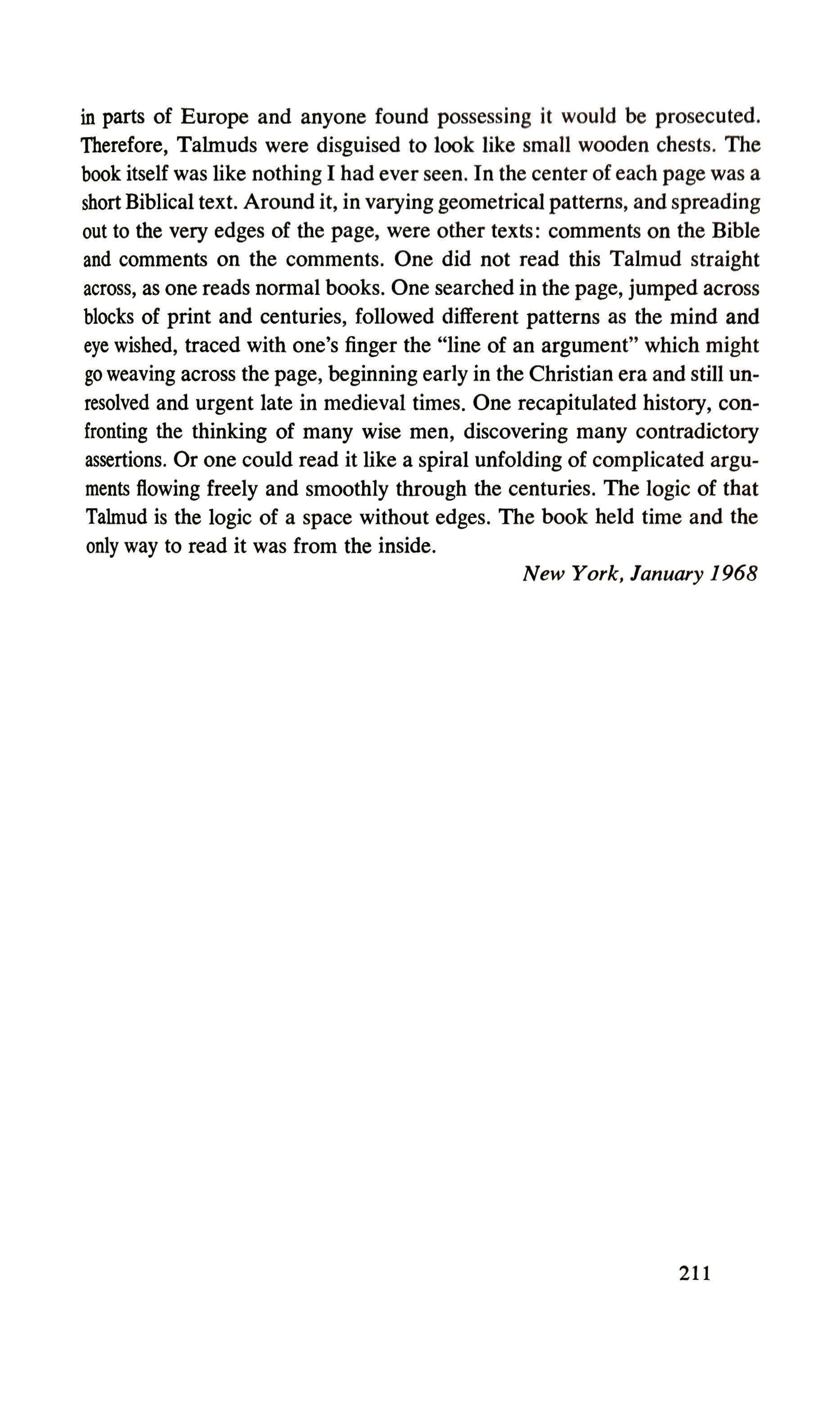
in parts of Europe and anyone found possessing it would be prosecuted. Therefore, Talmuds were disguised to look like small wooden chests. The book itself was like nothing I had ever seen. In the center of each page was a short Biblical text. Around it, in varying geometrical patterns, and spreading out to the very edges of the page, were other texts: comments on the Bible and comments on the comments. One did not read this Talmud straight across, as one reads normal books. One searched in the page, jumped across blocks of print and centuries, followed different patterns as the mind and eye wished, traced with one's finger the "line of an argument" which might go weaving across the page, beginning early in the Christian era and still unresolved and urgent late in medieval times. One recapitulated history, confronting the thinking of many wise men, discovering many contradictory assertions. Or one could read it like a spiral unfolding of complicated arguments flowing freely and smoothly through the centuries. The logic of that Talmud is the logic of a space without edges. The book held time and the only way to read it was from the inside.
New York, January 1968
211

( ," ,1 f � '_/ I { i I -
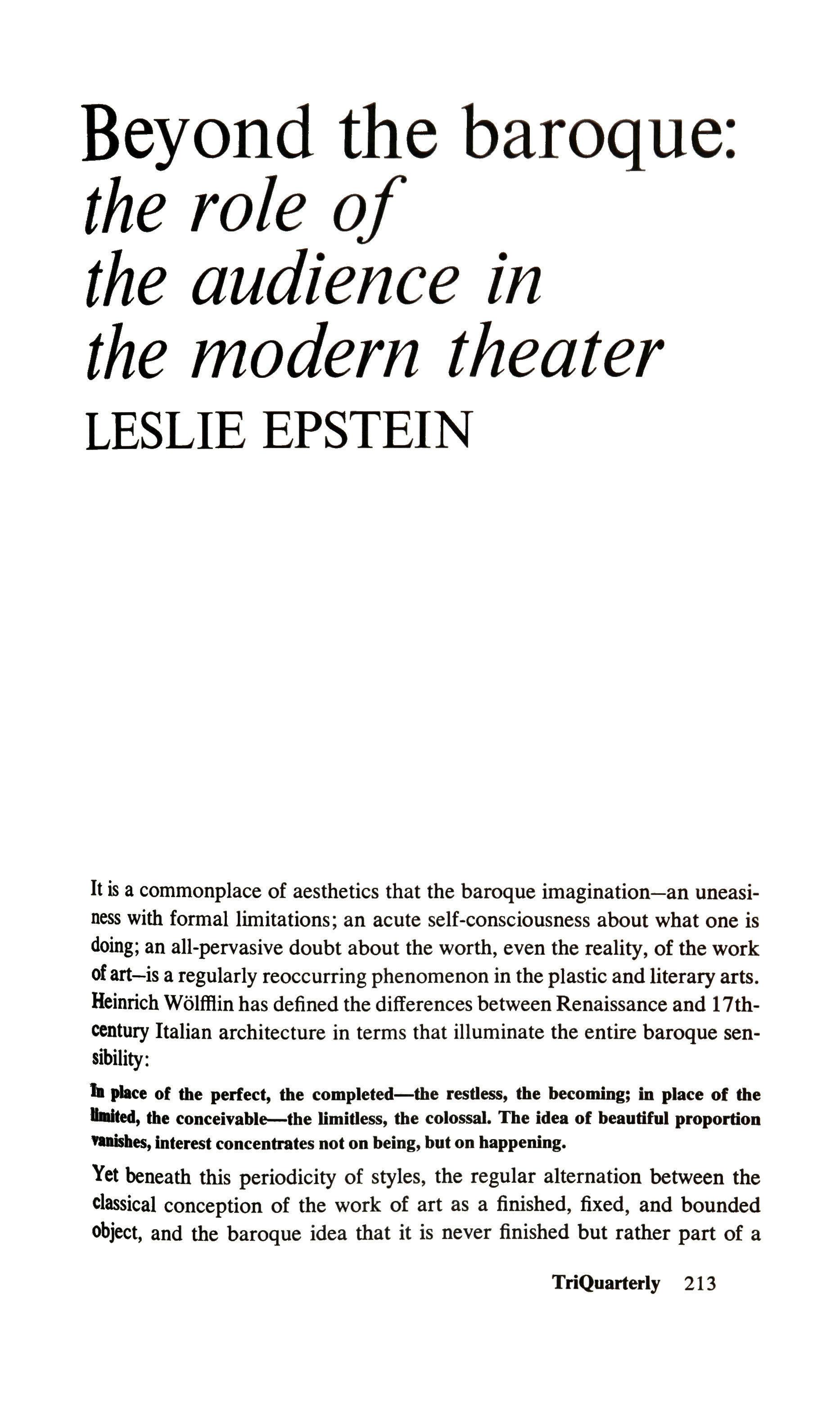
It is a commonplace of aesthetics that the baroque imagination an uneasiness with formal limitations; an acute self-consciousness about what one is doing; an all-pervasive doubt about the worth, even the reality, of the work ofart-is a regularly reoccurring phenomenon in the plastic and literary arts.
Heinrich WolfHin has defined the differences between Renaissance and 17thcentury Italian architecture in terms that illuminate the entire baroque sensibility:
place of the perfect, the completed the resdess, the becoming; in place of the llidted, the conceivable the Iimidess, the colossal. lbe idea of beautiful proportion 'fIIlishes, interest concentrates not on being, but on happening.
Yet beneath this periodicity of styles, the regular alternation between the classical conception of the work of art as a finished, fixed, and bounded object, and the baroque idea that it is never finished but rather part of a
• • • • • •
TriQuarterly
213
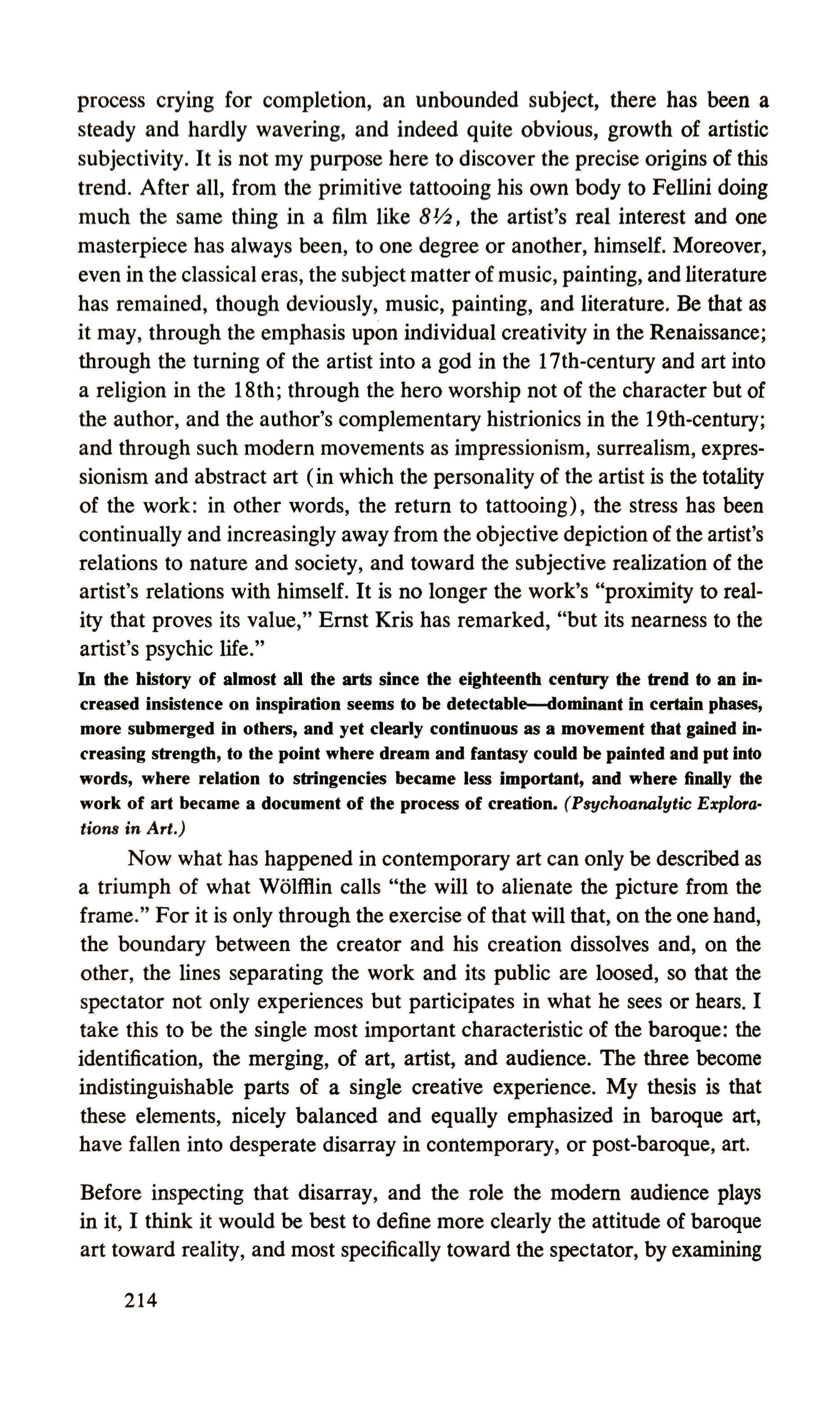
process crying for completion, an unbounded subject, there has been a steady and hardly wavering, and indeed quite obvious, growth of artistic subjectivity. It is not my purpose here to discover the precise origins of this trend. After all, from the primitive tattooing his own body to Fellini doing much the same thing in a film like 8�, the artist's real interest and one masterpiece has always been, to one degree or another, himself. Moreover, even in the classical eras, the subject matter of music, painting, and literature has remained, though deviously, music, painting, and literature. Be that as it may, through the emphasis upon individual creativity in the Renaissance; through the turning of the artist into a god in the 17th-century and art into a religion in the 18th; through the hero worship not of the character but of the author, and the author's complementary histrionics in the 19th-century; and through such modern movements as impressionism, surrealism, expressionism and abstract art (in which the personality of the artist is the totality of the work: in other words, the return to tattooing), the stress has been continually and increasingly away from the objective depiction of the artist's relations to nature and society, and toward the subjective realization of the artist's relations with himself. It is no longer the work's "proximity to reality that proves its value," Ernst Kris has remarked, "but its nearness to the artist's psychic life."
In the history of almost all the 81 ts since the eighteenth centnry the trend to an in· creased insistence on inspiration seems to be detectable dominant in cerlain pbases, more submerged in others, and yet clearly continuous as a movement that gained in· creasing strength, to the point where dream and fantasy conld be painted and put into words, where relation to stringencies became less important, and where finally the work of art became a document of the process of caeation. (Psychoanalytic Explorations in Art.)
Now what has happened in contemporary art can only be described as a triumph of what Wolfflin calls "the will to alienate the picture from the frame." For it is only through the exercise of that will that, on the one hand, the boundary between the creator and his creation dissolves and, on the other, the lines separating the work and its public are loosed, so that the spectator not only experiences but participates in what he sees or hears. I take this to be the single most important characteristic of the baroque: the identification, the merging, of art, artist, and audience. The three become indistinguishable parts of a single creative experience. My thesis is that these elements, nicely balanced and equally emphasized in baroque art, have fallen into desperate disarray in contemporary, or post-baroque, art.
Before inspecting that disarray, and the role the modem audience plays in it, I think it would be best to define more clearly the attitude of baroque art toward reality, and most specifically toward the spectator, by examining
214
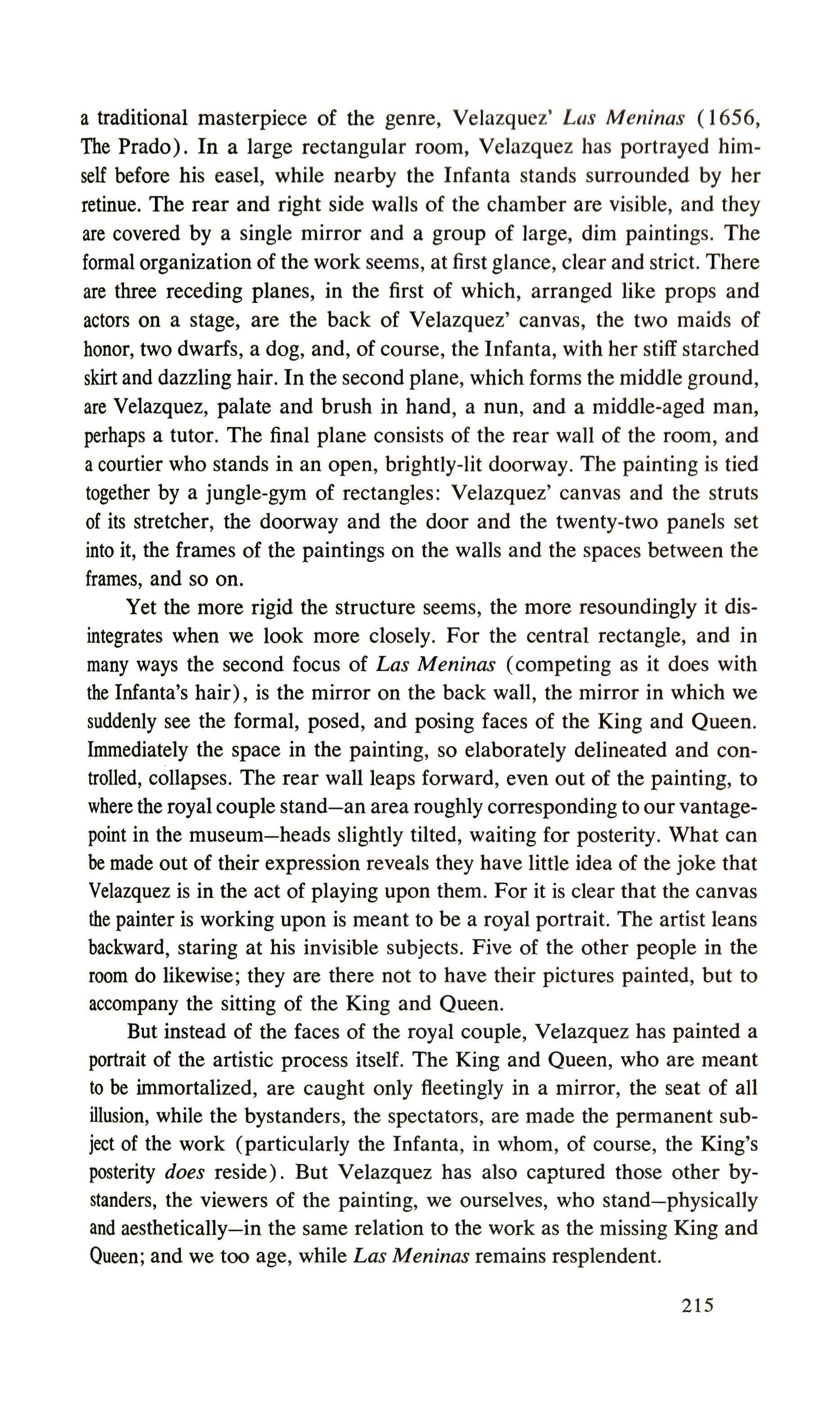
a traditional masterpiece of the genre, Velazquez' Las Meninas (1656, The Prado). In a large rectangular room, Velazquez has portrayed himself before his easel, while nearby the Infanta stands surrounded by her retinue. The rear and right side walls of the chamber are visible, and they are covered by a single mirror and a group of large, dim paintings. The formal organization of the work seems, at first glance, clear and strict. There are three receding planes, in the first of which, arranged like props and actors on a stage, are the back of Velazquez' canvas, the two maids of honor, two dwarfs, a dog, and, of course, the Infanta, with her stiff starched skirt and dazzling hair. In the second plane, which forms the middle ground, are Velazquez, palate and brush in hand, a nun, and a middle-aged man, perhaps a tutor. The final plane consists of the rear wall of the room, and a courtier who stands in an open, brightly-lit doorway. The painting is tied together by a jungle-gym of rectangles: Velazquez' canvas and the struts of its stretcher, the doorway and the door and the twenty-two panels set into it, the fra rnes of the paintings on the walls and the spaces between the frames, and so on.
Yet the more rigid the structure seems, the more resoundingly it disintegrates when we look more closely. For the central rectangle, and in many ways the second focus of Las Meninas (competing as it does with the Infanta's hair), is the mirror on the back wall, the mirror in which we suddenly see the formal, posed, and posing faces of the King and Queen. Immediately the space in the painting, so elaborately delineated and controlled, collapses. The rear wall leaps forward, even out of the painting, to where the royalcouple stand an area roughly corresponding to our vantagepoint in the museum heads slightly tilted, waiting for posterity. What can be made out of their expression reveals they have little idea of the joke that Velazquez is in the act of playing upon them. For it is clear that the canvas the painter is working upon is meant to be a royal portrait. The artist leans backward, staring at his invisible subjects. Five of the other people in the room do likewise; they are there not to have their pictures painted, but to accompany the sitting of the King and Queen.
But instead of the faces of the royal couple, Velazquez has painted a portrait of the artistic process itself. The King and Queen, who are meant to be immortalized, are caught only fleetingly in a mirror, the seat of all illusion, while the bystanders, the spectators, are made the permanent subject of the work (particularly the Infanta, in whom, of course, the King's posterity does reside). But Velazquez has also captured those other bystanders, the viewers of the painting, we ourselves, who stand physically and aesthetically in the same relation to the work as the missing King and Queen; and we too age, while Las Meninas remains resplendent.
215
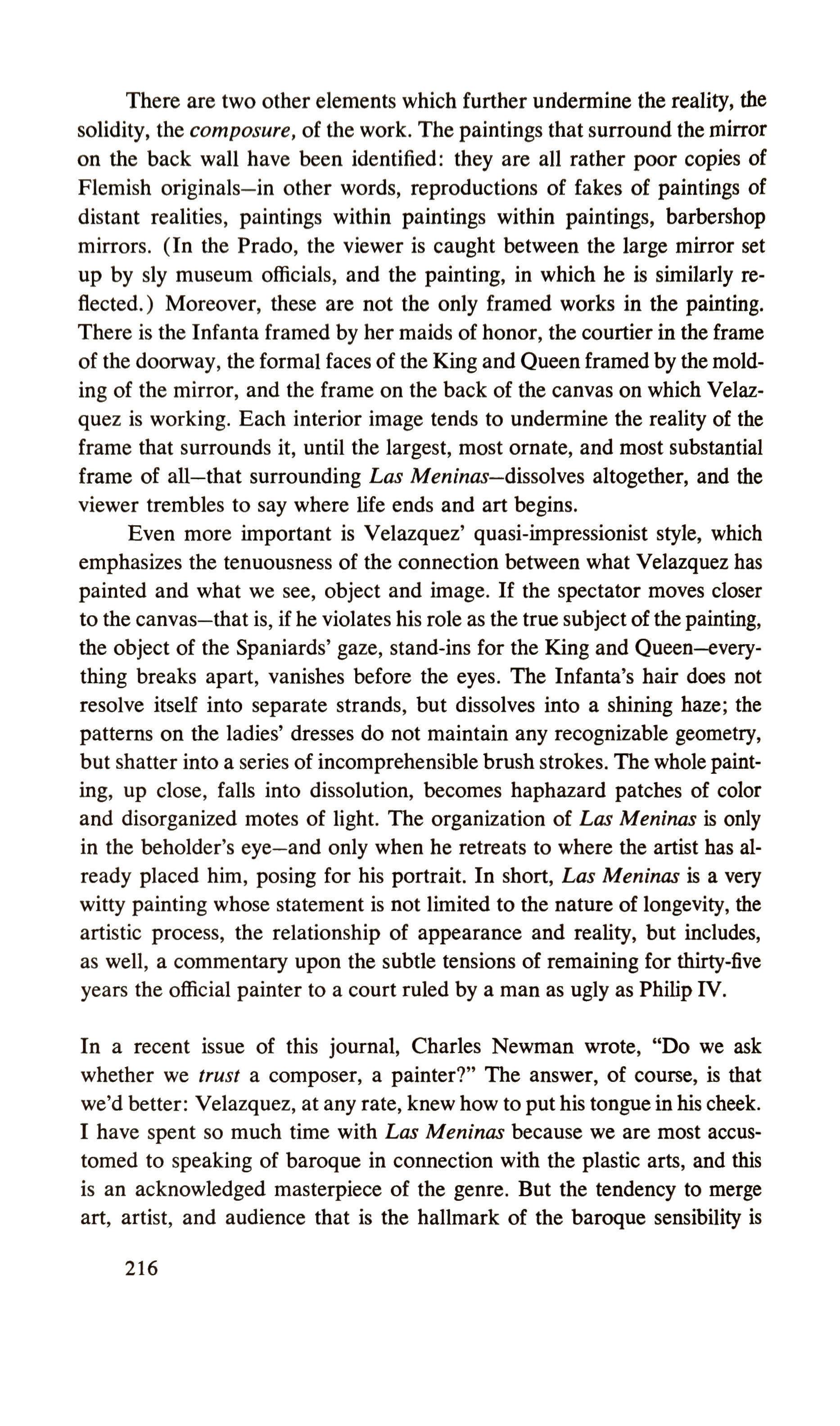
There are two other elements which further undermine the reality, the solidity, the composure, of the work. The paintings that surround the mirror on the back wall have been identified: they are all rather poor copies of Flemish originals in other words, reproductions of fakes of paintings of distant realities, paintings within paintings within paintings, barbershop mirrors. (In the Prado, the viewer is caught between the large mirror set up by sly museum officials, and the painting, in which he is similarly refleeted.) Moreover, these are not the only framed works in the painting. There is the Infanta framed by her maids of honor, the courtier in the frame of the doorway, the formal faces of the King and Queen framed by the molding of the mirror, and the frame on the back of the canvas on which Velazquez is working. Each interior image tends to undeIIlline the reality of the frame that surrounds it, until the largest, most ornate, and most substantial frame of all that surrounding Las Meninas dissolves altogether, and the viewer trembles to say where life ends and art begins.
Even more important is Velazquez' quasi-impressionist style, which emphasizes the tenuousness of the connection between what Velazquez has painted and what we see, object and image. If the spectator moves closer to the canvas that is, if he violates his role as the true subject of the painting, the object of the Spaniards' gaze, stand-ins for the King and Queen everything breaks apart, vanishes before the eyes. The Infanta's hair does not resolve itself into separate strands, but dissolves into a shining haze; the patterns on the ladies' dresses do not maintain any recognizable geometry, but shatter into a series of incomprehensible brush strokes. The whole painting, up close, falls into dissolution, becomes haphazard patches of color and disorganized motes of light. The organization of Las Meninas is only in the beholder's eye and only when he retreats to where the artist has already placed him, posing for his portrait. In short, Las Meninas is a very witty painting whose statement is not limited to the nature of longevity, the artistic process, the relationship of appearance and reality, but includes, as well, a commentary upon the subtle tensions of remaining for thirty-five years the official painter to a court ruled by a man as ugly as Philip IV.
In a recent issue of this journal, Charles Newman wrote, "Do we ask whether we trust a composer, a painter?" The answer, of course, is that we'd better: Velazquez, at any rate, knew how to put his tongue in his cheek. I have spent so much time with Las Meninas because we are most accustomed to speaking of baroque in connection with the plastic arts, and this is an acknowledged masterpiece of the genre. But the tendency to merge art, artist, and audience that is the hallmark of the baroque sensibility is
216
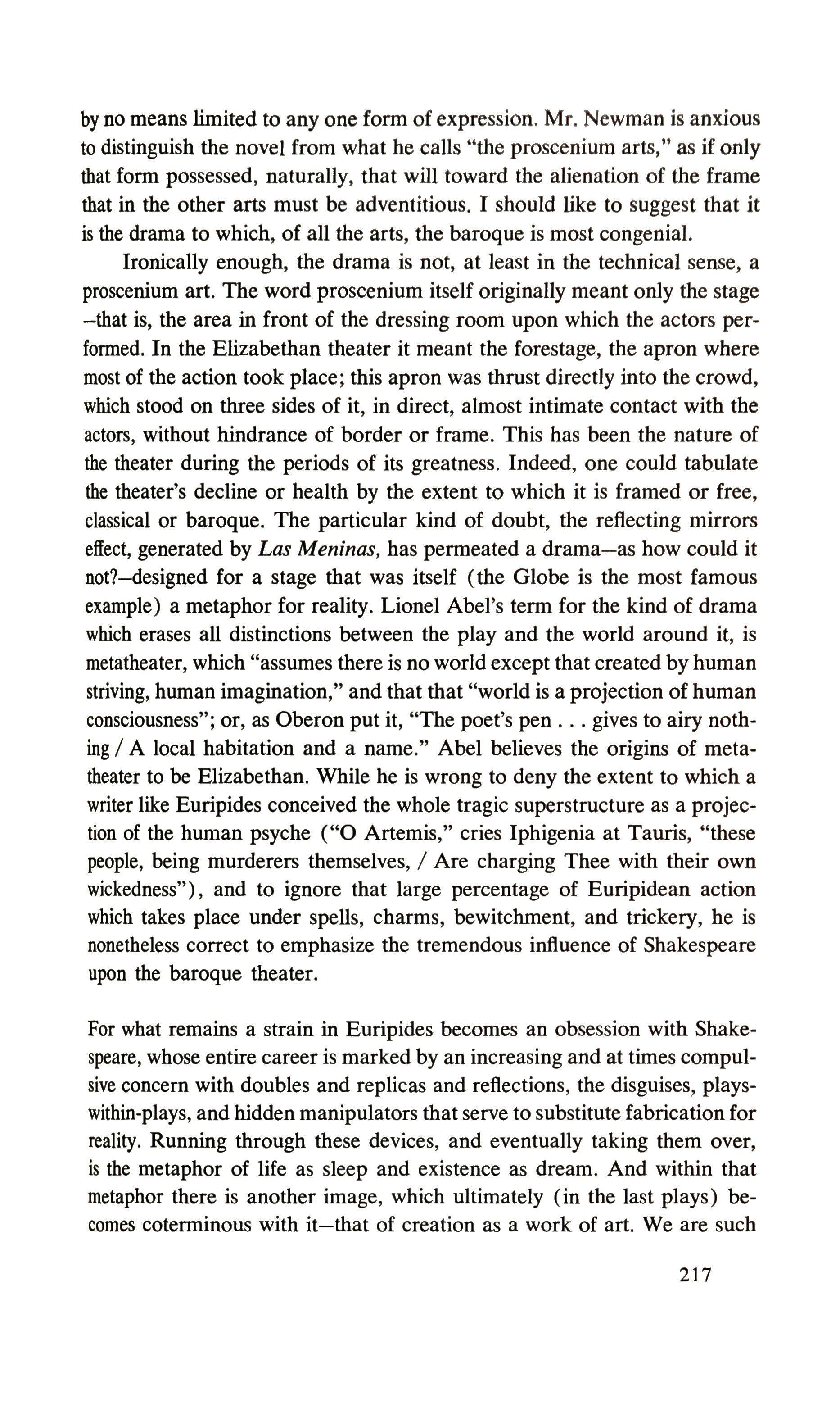
by no means limited to anyone form of expression. Mr. Newman is anxious to distinguish the novel from what he calls "the proscenium arts," as if only that forIn possessed, naturally, that will toward the alienation of the frame that in the other arts must be adventitious. I should like to suggest that it is the drama to which, of all the arts, the baroque is most congenial.
Ironically enough, the drama is not, at least in the technical sense, a proscenium art. The word proscenium itself originally meant only the stage -that is, the area in front of the dressing room upon which the actors performed, In the Elizabethan theater it meant the forestage, the apron where most of the action took place; this apron was thrust directly into the crowd, which stood on three sides of it, in direct, almost intimate contact with the actors, without hindrance of border or frame. This has been the nature of the theater during the periods of its greatness. Indeed, one could tabulate the theater's decline or health by the extent to which it is framed or free, classical or baroque. The particular kind of doubt, the reflecting mirrors effect, generated by Las Meninas, has permeated a drama as how could it not?-designed for a stage that was itself (the Globe is the most famous example) a metaphor for reality. Lionel Abel's term for the kind of drama which erases all distinctions between the play and the world around it, is metatheater, which "assumes there is no world except that created by human striving, human imagination," and that that "world is a projection of human consciousness"; or, as Oberon put it, "The poet's pen gives to airy nothing / A local habitation and a name." Abel believes the origins of metatheater to be Elizabethan. While he is wrong to deny the extent to which a writer like Euripides conceived the whole tragic superstructure as a projection of the human psyche ("0 Artemis," cries Iphigenia at Tauris, "these people, being murderers themselves, / Are charging Thee with their own wickedness"), and to ignore that large percentage of Euripidean action which takes place under spells, charms, bewitchment, and trickery, he is nonetheless correct to emphasize the tremendous influence of Shakespeare upon the baroque theater.
For what remains a strain in Euripides becomes an obsession with Shakespeare, whose entire career is marked by an increasing and at times compulsive concern with doubles and replicas and reflections, the disguises, playswithin-plays, and hidden manipulators that serve to substitute fabrication for reality. Running through these devices, and eventually taking them over, is the metaphor of life as sleep and existence as dream. And within that metaphor there is another image, which ultimately (in the last plays) becomes coterminous with it that of creation as a work of art. We are such
217
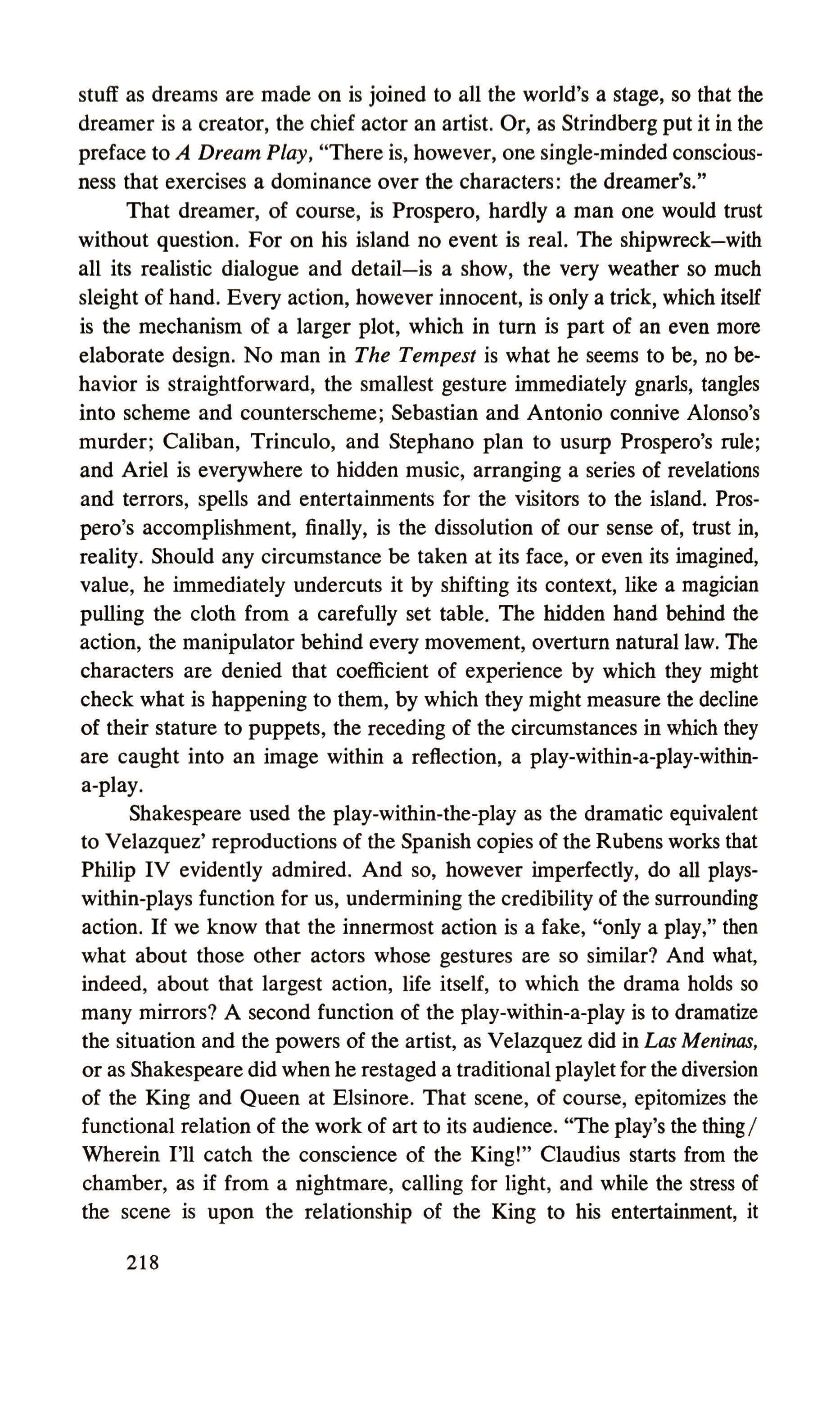
stuff as dreams are made on is joined to all the world's a stage, so that the dreamer is a creator, the chief actor an artist. Or, as Strindberg put it in the preface to A Dream Play, "There is, however, one single-minded consciousness that exercises a dominance over the characters: the dreamer's."
That dreamer, of course, is Prospero, hardly a man one would trust without question. For on his island no event is real. The shipwreck with all its realistic dialogue and detail is a show, the very weather so much sleight of hand. Every action, however innocent, is only a trick, which itself is the mechanism of a larger plot, which in turn is part of an even more elaborate design. No man in The Tempest is what he seems to be, no behavior is straightforward, the smallest gesture immediately gnarls, tangles into scheme and counterscheme; Sebastian and Antonio connive Alonso's murder; Caliban, Trinculo, and Stephano plan to usurp Prospero's rule; and Ariel is everywhere to hidden music, arranging a series of revelations and terrors, spells and entertainments for the visitors to the island. Prospero's accomplishment, finally, is the dissolution of our sense of, trust in, reality. Should any circumstance be taken at its face, or even its imagined, value, he immediately undercuts it by shifting its context, like a magician pulling the cloth from a carefully set table. The hidden hand behind the action, the manipulator behind every movement, overturn natural law. The characters are denied that coefficient of experience by which they might check what is happening to them, by which they might measure the decline of their stature to puppets, the receding of the circumstances in which they are caught into an image within a reflection, a play-within-a-play-withina-play.
Shakespeare used the play-within-the-play as the dramatic equivalent to Velazquez' reproductions of the Spanish copies of the Rubens works that Philip IV evidently admired. And so, however imperfectly, do all playswithin-plays function for us, undermining the credibility of the surrounding action. If we know that the innermost action is a fake, "only a play," then what about those other actors whose gestures are so similar? And what, indeed, about that largest action, life itself, to which the drama holds so many mirrors? A second function of the play-within-a-play is to dramatize the situation and the powers of the artist, as Velazquez did in Las Meninas, or as Shakespeare did when he restaged a traditional playlet for the diversion of the King and Queen at Elsinore. That scene, of course, epitomizes the functional relation of the work of art to its audience. "The play's the thing/ Wherein I'll catch the conscience of the King!" Claudius starts from the chamber, as if from a nightmare, calling for light, and while the stress of the scene is upon the relationship of the King to his entertainment, it
218
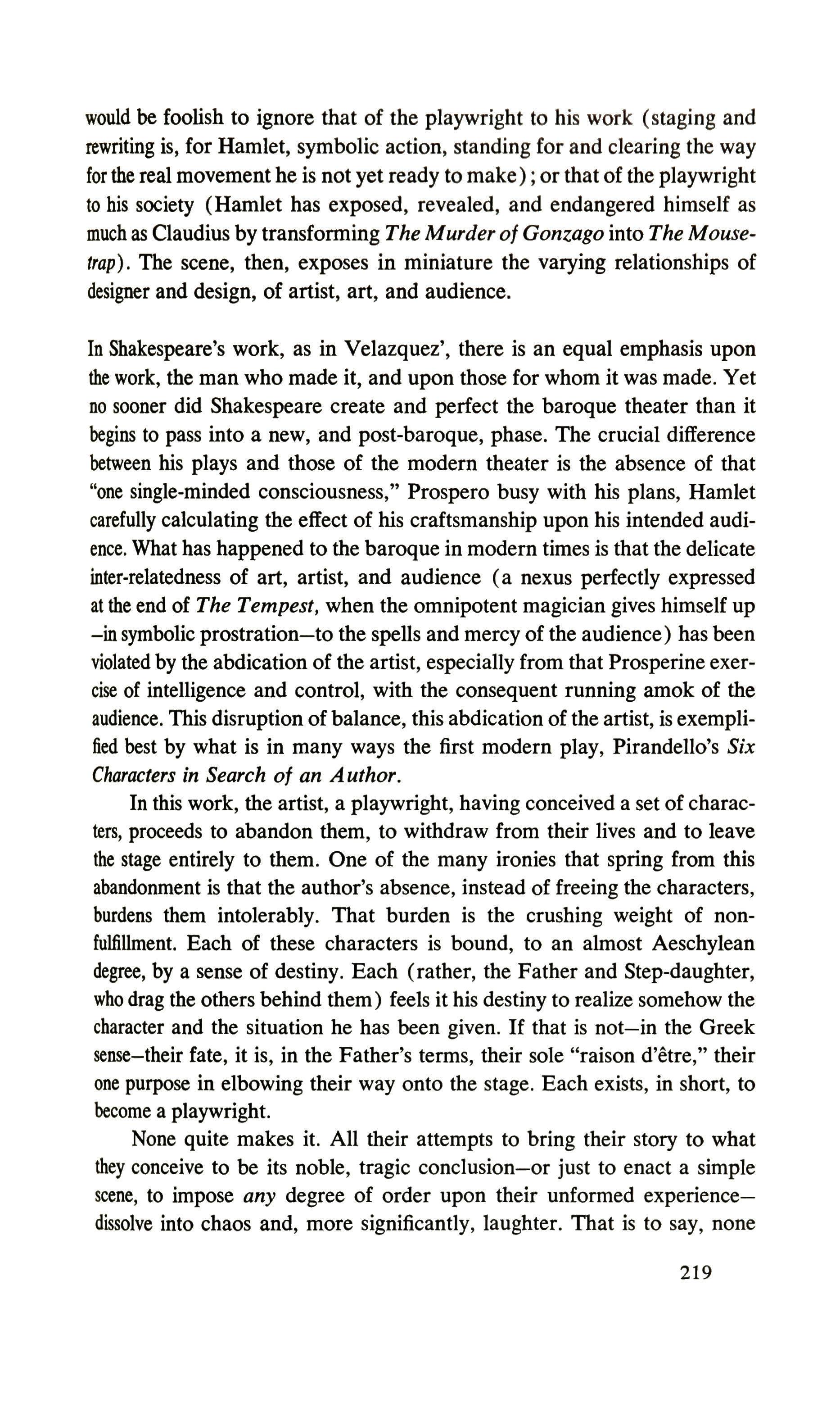
would be foolish to ignore that of the playwright to his work (staging and rewriting is, for Hamlet, symbolic action, standing for and clearing the way for the real movement he is not yet ready to make) ; or that of the playwright to his society (Hamlet has exposed, revealed, and endangered himself as much as Claudius by transforming The Murder ofGonzaga into The Mousetrap). The scene, then, exposes in miniature the varying relationships of designer and design, of artist, art, and audience.
In Shakespeare's work, as in Velazquez', there is an equal emphasis upon the work, the man who made it, and upon those for whom it was made. Yet no sooner did Shakespeare create and perfect the baroque theater than it begins to pass into a new, and post-baroque, phase. The crucial difference between his plays and those of the modern theater is the absence of that "one single-minded consciousness," Prospero busy with his plans, Hamlet carefully calculating the effect of his craftsmanship upon his intended audience. What has happened to the baroque in modern times is that the delicate inter-relatedness of art, artist, and audience (a nexus perfectly expressed at the end of The Tempest, when the omnipotent magician gives himself up -in symbolic prostration to the spells and mercy of the audience) has been violated by the abdication of the artist, especially from that Prosperine exercise of intelligence and control, with the consequent running amok of the audience. This disruption of balance, this abdication of the artist, is exemplified best by what is in many ways the first modern play, Pirandello's Six Characters in Search of an Author.
In this work, the artist, a playwright, having conceived a set of characters, proceeds to abandon them, to withdraw from their lives and to leave the stage entirely to them. One of the many ironies that spring from this abandonment is that the author's absence, instead of freeing the characters, burdens them intolerably. That burden is the crushing weight of nonfulfillment. Each of these characters is bound, to an almost Aeschylean degree, by a sense of destiny. Each (rather, the Father and Step-daughter, who drag the others behind them) feels it his destiny to realize somehow the character and the situation he has been given. If that is not in the Greek sense-their fate, it is, in the Father's terms, their sole "raison d'etre," their one purpose in elbowing their way onto the stage. Each exists, in short, to become a playwright.
None quite makes it. All their attempts to bring their story to what they conceive to be its noble, tragic conclusion or just to enact a simple scene, to impose any degree of order upon their unformed experiencedissolve into chaos and, more significantly, laughter. That is to say, none
219
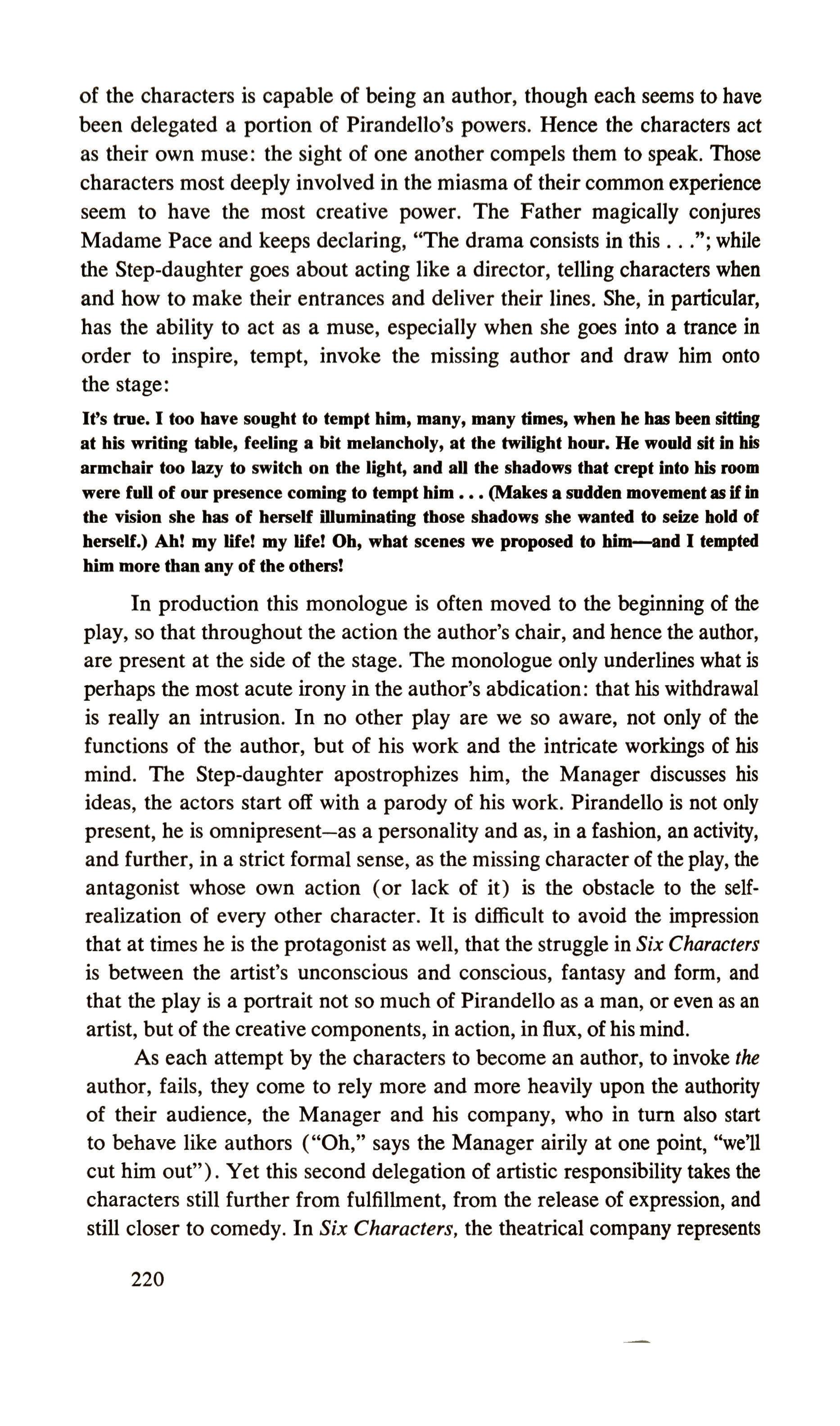
of the characters is capable of being an author, though each seems to have been delegated a portion of Pirandello's powers. Hence the characters act as their own muse: the sight of one another compels them to speak. Those characters most deeply involved in the miasma of their common experience seem to have the most creative power. The Father magically conjures Madame Pace and keeps declaring, "The drama consists in this "; while the Step-daughter goes about acting like a director, telling characters when and how to make their entrances and deliver their lines. She, in particular, has the ability to act as a muse, especially when she goes into a trance in order to inspire, tempt, invoke the missing author and draw him onto the stage:
It's true. I too have sought to tempt him, many, many times, when he has been sit.ing at his writing table, feeling a bit melancholy, at the twilight hour. He would sit in his armchalr too lazy to switch on the light, and aU the shadows that crept into his room were full of our presence coming to tempt him (Makes a sudden movement as if in the vision she has of herself illuminating those shadows she wanted to seize hold of herself.) Ah! my life! my life! Oh, what scenes we proposed to him and I tempted him more than any of the others!
In production this monologue is often moved to the beginning of the play, so that throughout the action the author's chair, and hence the author, are present at the side of the stage. The monologue only underlines what is perhaps the most acute irony in the author's abdication: that his withdrawal is really an intrusion. In no other play are we so aware, not only of the functions of the author, but of his work and the intricate workings of his mind. The Step-daughter apostrophizes him, the Manager discusses his ideas, the actors start off with a parody of his work. Pirandello is not only present, he is omnipresent as a personality and as, in a fashion, an activity, and further, in a strict formal sense, as the missing character of the play, the antagonist whose own action (or lack of it) is the obstacle to the selfrealization of every other character. It is difficult to avoid the impression that at times he is the protagonist as well, that the struggle in Six Characters is between the artist's unconscious and conscious, fantasy and fOI'In, and that the play is a portrait not so much of Pirandello as a man, or even as an artist, but of the creative components, in action, in flux, of his mind.
As each attempt by the characters to become an author, to invoke the author, fails, they come to rely more and more heavily upon the authority of their audience, the Manager and his company, who in tum also start to behave like authors ("Oh," says the Manager airily at one point, "we'll cut him out") Yet this second delegation of artistic responsibility takes the characters still further from fulfillment, from the release of expression, and still closer to comedy. In Six Characters, the theatrical company represents
220
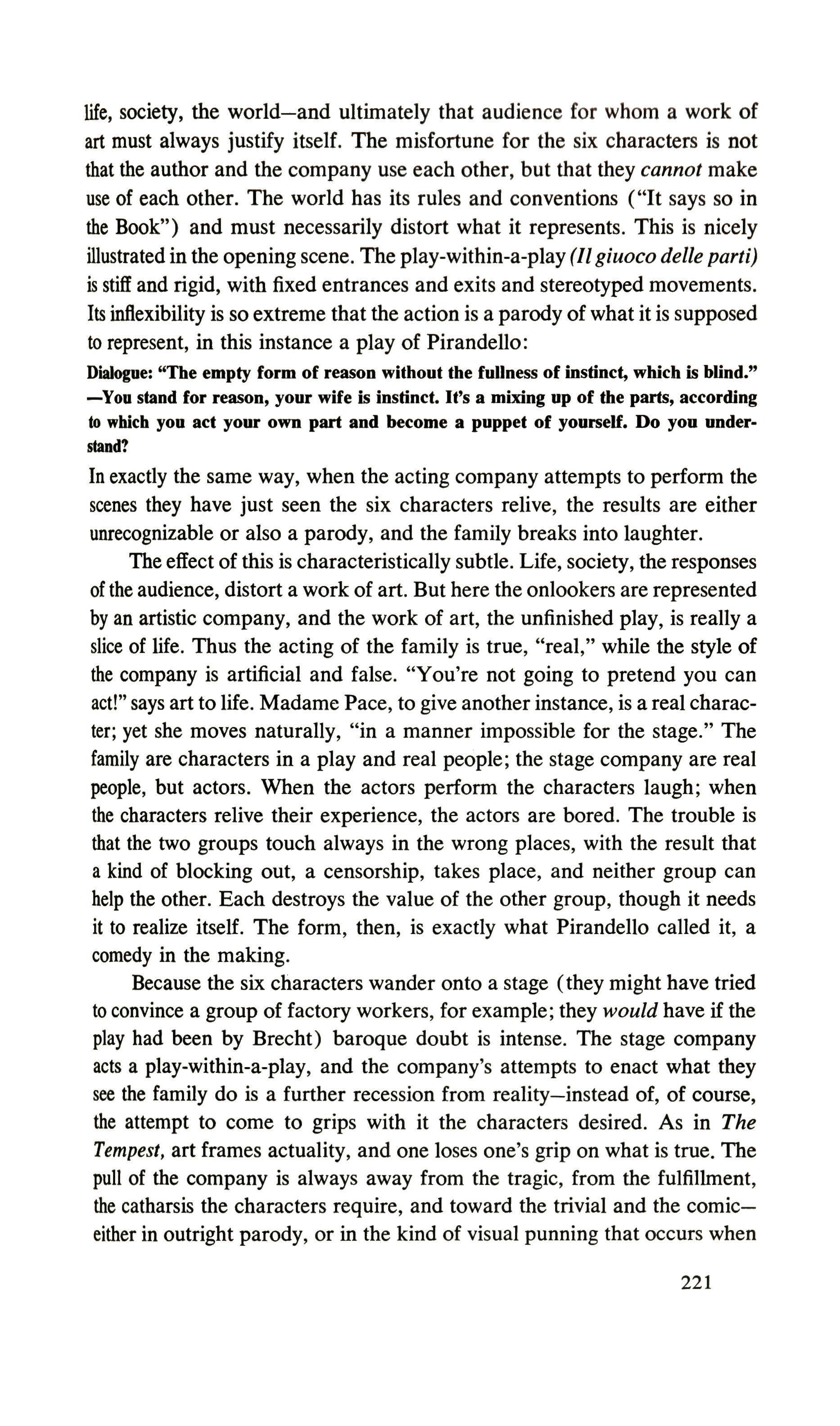
life, society, the world and ultimately that audience for whom a work of art must always justify itself. The misfortune for the six characters is not that the author and the company use each other, but that they cannot make use of each other. The world has its rules and conventions ("It says so in the Book") and must necessarily distort what it represents. This is nicely illustrated in the opening scene. The play-within-a-play (IIgiuoco delle parti) is stiff and rigid, with fixed entrances and exits and stereotyped movements. Its inflexibility is so extreme that the action is a parody of what it is supposed to represent, in this instance a play of Pirandello:
Dialogue: "The empty form of reason without the fuUness of instinct, which is blind." -You stand for reason, your wife is instinct. It's a mixing up of the parts, according to which yon act your own part and become a puppet of yonrself. Do you understand?
In exactly the same way, when the acting company attempts to perform the scenes they have just seen the six characters relive, the results are either unrecognizable or also a parody, and the family breaks into laughter.
The effect of this is characteristically subtle. Life, society, the responses of the audience, distort a work of art. But here the onlookers are represented by an artistic company, and the work of art, the unfinished play, is really a slice of life. Thus the acting of the family is true, "real," while the style of the company is artificial and false. "You're not going to pretend you can act!" says art to life. Madame Pace, to give another instance, is a real character; yet she moves naturally, "in a manner impossible for the stage." The family are characters in a play and real people; the stage company are real people, but actors. When the actors perfOfIII the characters laugh; when the characters relive their experience, the actors are bored. The trouble is that the two groups touch always in the wrong places, with the result that a kind of blocking out, a censorship, takes place, and neither group can help the other. Each destroys the value of the other group, though it needs it to realize itself. The form, then, is exactly what Pirandello called it, a comedy in the making.
Because the six characters wander onto a stage (they might have tried to convince a group of factory workers, for example; they would have if the play had been by Brecht) baroque doubt is intense. The stage company acts a play-within-a-play, and the company's attempts to enact what they see the family do is a further recession from reality instead of, of course, the attempt to come to grips with it the characters desired. As in The Tempest, art frames actuality, and one loses one's grip on what is true. The pull of the company is always away from the tragic, from the fulfillment, the catharsis the characters require, and toward the trivial and the comiceither in outright parody, or in the kind of visual punning that occurs when
221
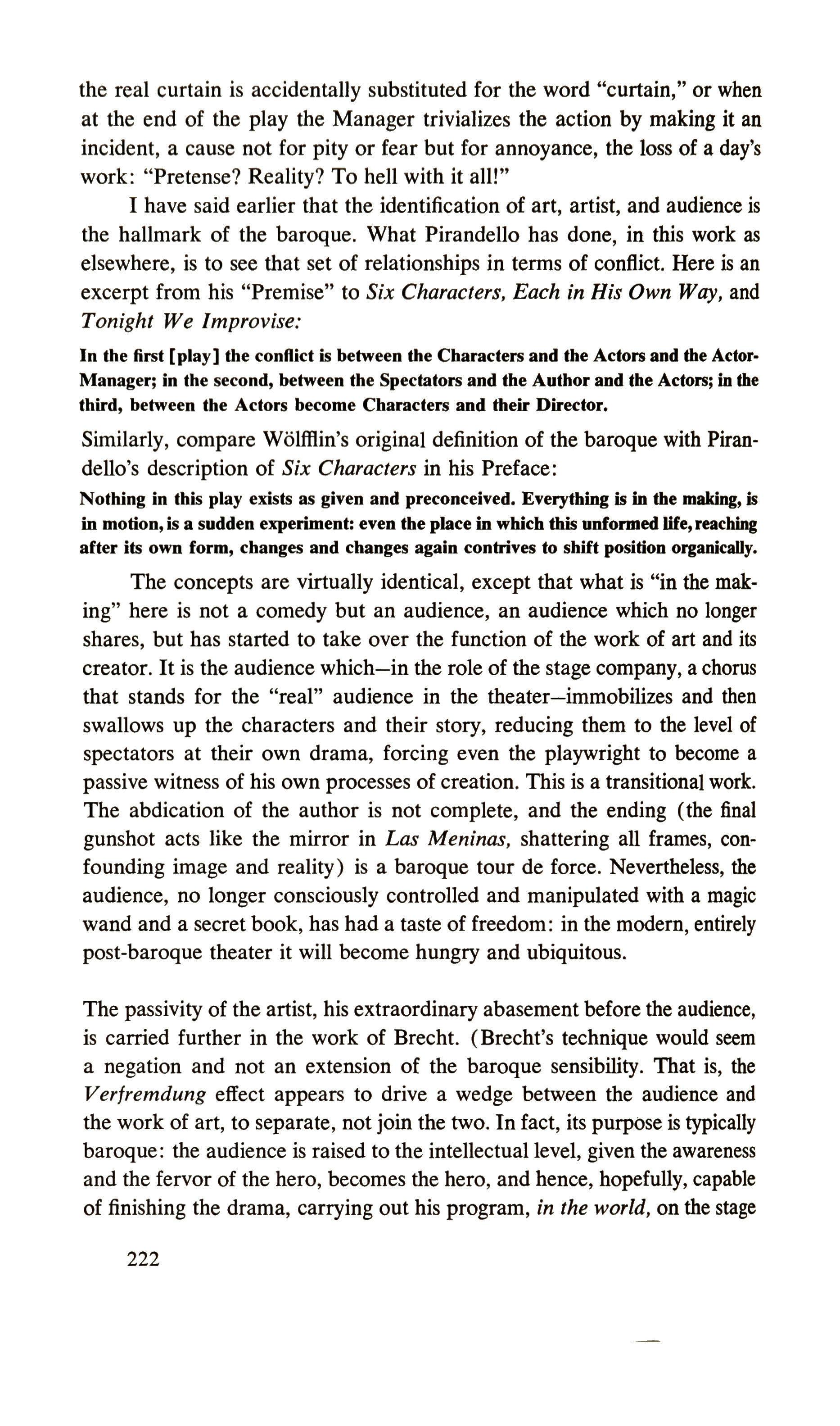
the real curtain is accidentally substituted for the word "curtain," or when at the end of the play the Manager trivializes the action by making it an incident, a cause not for pity or fear but for annoyance, the loss of a day's work: "Pretense? Reality? To hell with it all!"
I have said earlier that the identification of art, artist, and audience is the hallmark of the baroque. What Pirandello has done, in this work as elsewhere, is to see that set of relationships in terms of conflict. Here is an excerpt from his "Premise" to Six Characters, Each in His Own Way, and Tonight We Improvise.'
In the first [play] the conflict is between the Characters and the Actors and the ActorManager; in the second, between the Spectators and the Author and the Actors; in the third, between the Actors become Characters and their Director.
Similarly, compare Wolfflin's original definition of the baroque with Pirandello's description of Six Characters in his Preface:
Nothing in this play exists as given and preconceived. Everything is in the making, is in motion, is a sudden experiment: even the place in which this Unf61111ed life,reaching after its own form, changes and changes again contrives to shift position organically.
The concepts are virtually identical, except that what is "in the making" here is not a comedy but an audience, an audience which no longer shares, but has started to take over the function of the work of art and its creator. It is the audience which in the role of the stage company, a chorus that stands for the "real" audience in the theater immobilizes and then swallows up the characters and their story, reducing them to the level of spectators at their own drama, forcing even the playwright to become a passive witness of his own processes of creation. This is a transitional work. The abdication of the author is not complete, and the ending (the final gunshot acts like the mirror in Las Meninas, shattering all frames, confounding image and reality) is a baroque tour de force. Nevertheless, the audience, no longer consciously controlled and manipulated with a magic wand and a secret book, has had a taste of freedom: in the modern, entirely post-baroque theater it will become hungry and ubiquitous.
The passivity of the artist, his extraordinary abasement before the audience, is carried further in the work of Brecht. (Brecht's technique would seem a negation and not an extension of the baroque sensibility. That is, the Verfremdung effect appears to drive a wedge between the audience and the work of art, to separate, not join the two. In fact, its purpose is typically baroque: the audience is raised to the intellectual level, given the awareness and the fervor of the hero, becomes the hero, and hence, hopefully, capable of finishing the drama, carrying out his program, in the world, on the stage
222
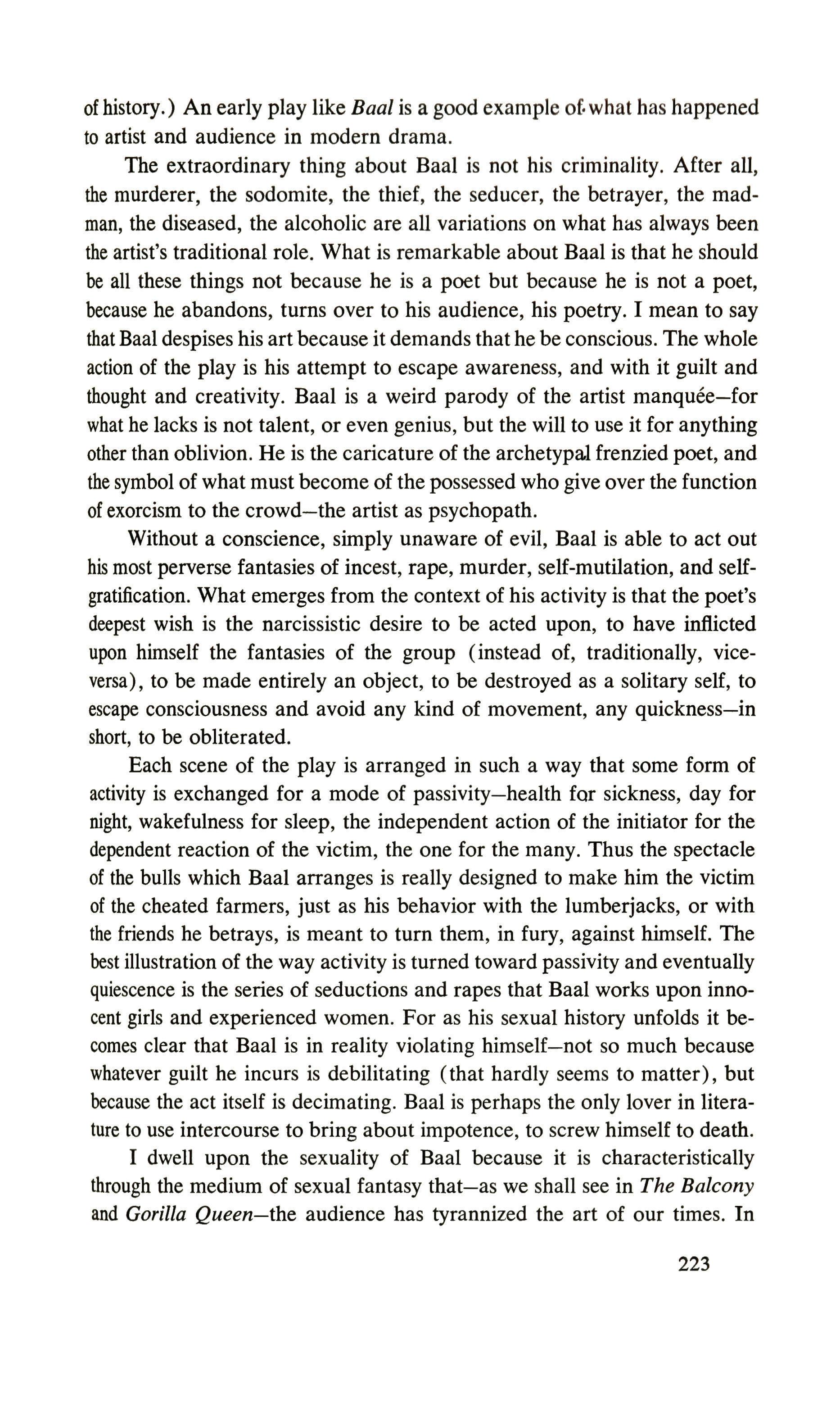
of history.) An early play like Baal is a good example ofwhat has happened to artist and audience in modern drama.
The extraordinary thing about Baal is not his criminality. After all, the murderer, the sodomite, the thief, the seducer, the betrayer, the madman, the diseased, the alcoholic are all variations on what has always been the artist's traditional role. What is remarkable about Baal is that he should be all these things not because he is a poet but because he is not a poet, because he abandons, turns over to his audience, his poetry. I mean to say that Baal despises his art because it demands that he be conscious. The whole action of the play is his attempt to escape awareness, and with it guilt and thought and creativity. Baal is a weird parody of the artist manquee for what he lacks is not talent, or even genius, but the will to use it for anything other than oblivion. He is the caricature of the archetypal frenzied poet, and the symbol of what must become of the possessed who give over the function of exorcism to the crowd the artist as psychopath.
Without a conscience, simply unaware of evil, Baal is able to act out his most perverse fantasies of incest, rape, murder, self-mutilation, and selfgratification. What emerges from the context of his activity is that the poet's deepest wish is the narcissistic desire to be acted upon, to have inflicted upon himself the fantasies of the group (instead of, traditionally, viceversa), to be made entirely an object, to be destroyed as a solitary self, to escape consciousness and avoid any kind of movement, any quickness in short, to be obliterated.
Each scene of the play is arranged in such a way that some form of activity is exchanged for a mode of passivity health for sickness, day for night, wakefulness for sleep, the independent action of the initiator for the dependent reaction of the victim, the one for the many. Thus the spectacle of the bulls which Baal arranges is really designed to make him the victim of the cheated farmers, just as his behavior with the lumberjacks, or with the friends he betrays, is meant to turn them, in fury, against himself. The best illustration of the way activity is turned toward passivity and eventually quiescence is the series of seductions and rapes that Baal works upon innocent girls and experienced women. For as his sexual history unfolds it becomes clear that Baal is in reality violating himself not so much because whatever guilt he incurs is debilitating (that hardly seems to matter), but because the act itself is decimating. Baal is perhaps the only lover in literature to use intercourse to bring about impotence, to screw himself to death.
I dwell upon the sexuality of Baal because it is characteristically through the medium of sexual fantasy that as we shall see in The Balcony and Gorilla Queen the audience has tyrannized the art of our times. In
223
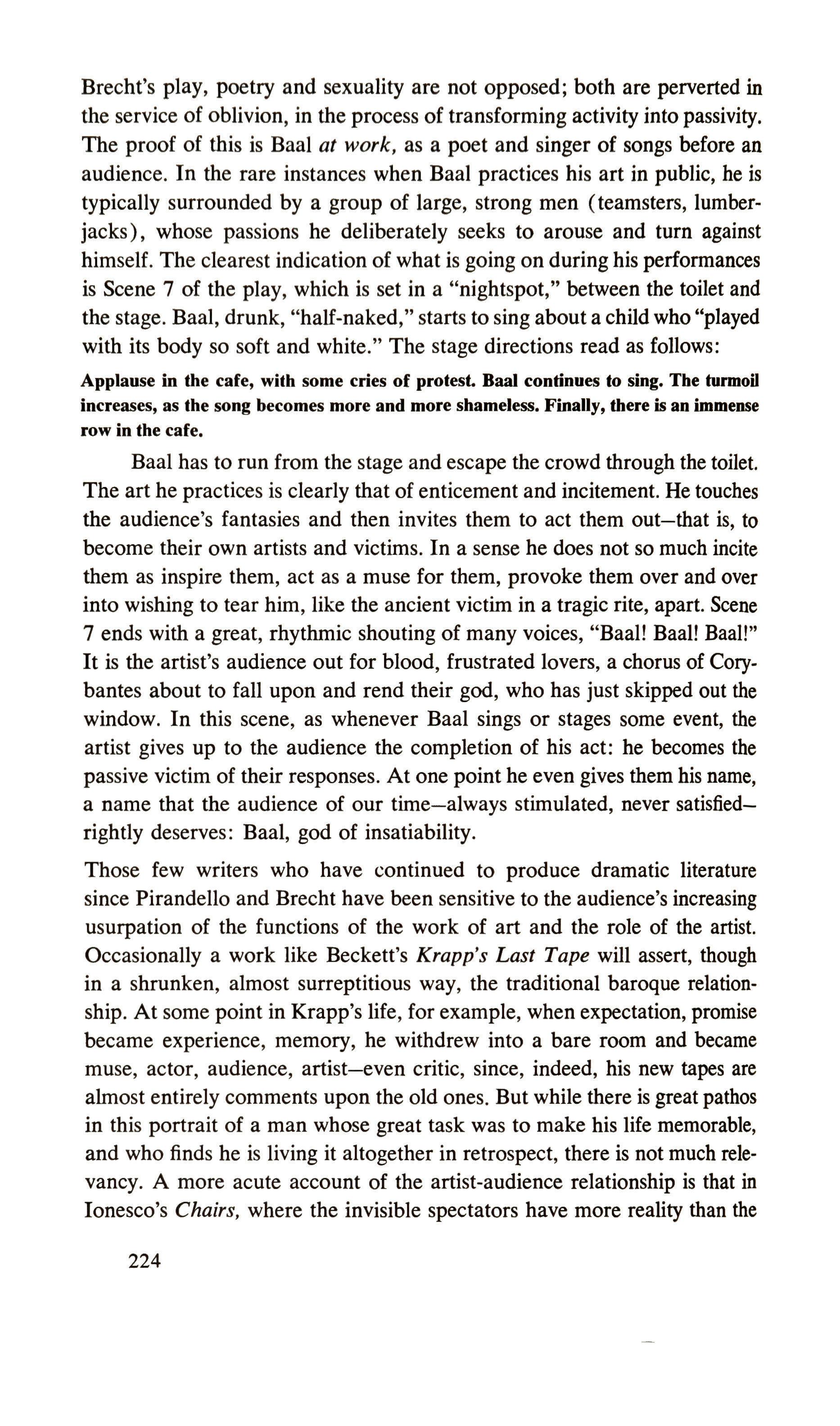
Brecht's play, poetry and sexuality are not opposed; both are perverted in the service of oblivion, in the process of transforming activity into passivity. The proof of this is Baal at work, as a poet and singer of songs before an audience. In the rare instances when Baal practices his art in public, he is typically surrounded by a group of large, strong men (teamsters, lumberjacks), whose passions he deliberately seeks to arouse and turn against himself. The clearest indication of what is going on during his performances is Scene 7 of the play, which is set in a "nightspot," between the toilet and the stage. Baal, drunk, "half-naked," starts to sing about a child who "played with its body so soft and white." The stage directions read as follows:
Applause in the cafe, with some cries of protest. Baal continues to sing. The turmoU increases, as the song becomes more and more shameless. Finally, there is an immense row in the cafe.
Baal has to run from the stage and escape the crowd through the toilet. The art he practices is clearly that of enticement and incitement. He touches the audience's fantasies and then invites them to act them out that is, to become their own artists and victims. In a sense he does not so much incite them as inspire them, act as a muse for them, provoke them over and over into wishing to tear him, like the ancient victim in a tragic rite, apart. Scene 7 ends with a great, rhythmic shouting of many voices, "Baal! Baal! Baal!" It is the artist's audience out for blood, frustrated lovers, a chorus of Corybantes about to fall upon and rend their god, who has just skipped out the window. In this scene, as whenever Baal sings or stages some event, the artist gives up to the audience the completion of his act: he becomes the passive victim of their responses. At one point he even gives them his name, a name that the audience of our time always stimulated, never satisfiedrightly deserves: Baal, god of insatiability.
Those few writers who have continued to produce dramatic literature since Pirandello and Brecht have been sensitive to the audience's increasing usurpation of the functions of the work of art and the role of the artist. Occasionally a work like Beckett's Krapp's Last Tape will assert, though in a shrunken, almost surreptitious way, the traditional baroque relationship. At some point in Krapp's life, for example, when expectation, promise became experience, memory, he withdrew into a bare room and became muse, actor, audience, artist even critic, since, indeed, his new tapes are almost entirely comments upon the old ones. But while there is great pathos in this portrait of a man whose great task was to make his life memorable, and who finds he is living it altogether in retrospect, there is not much relevancy. A more acute account of the artist-audience relationship is that in Ionesco's Chairs, where the invisible spectators have more reality than the
224
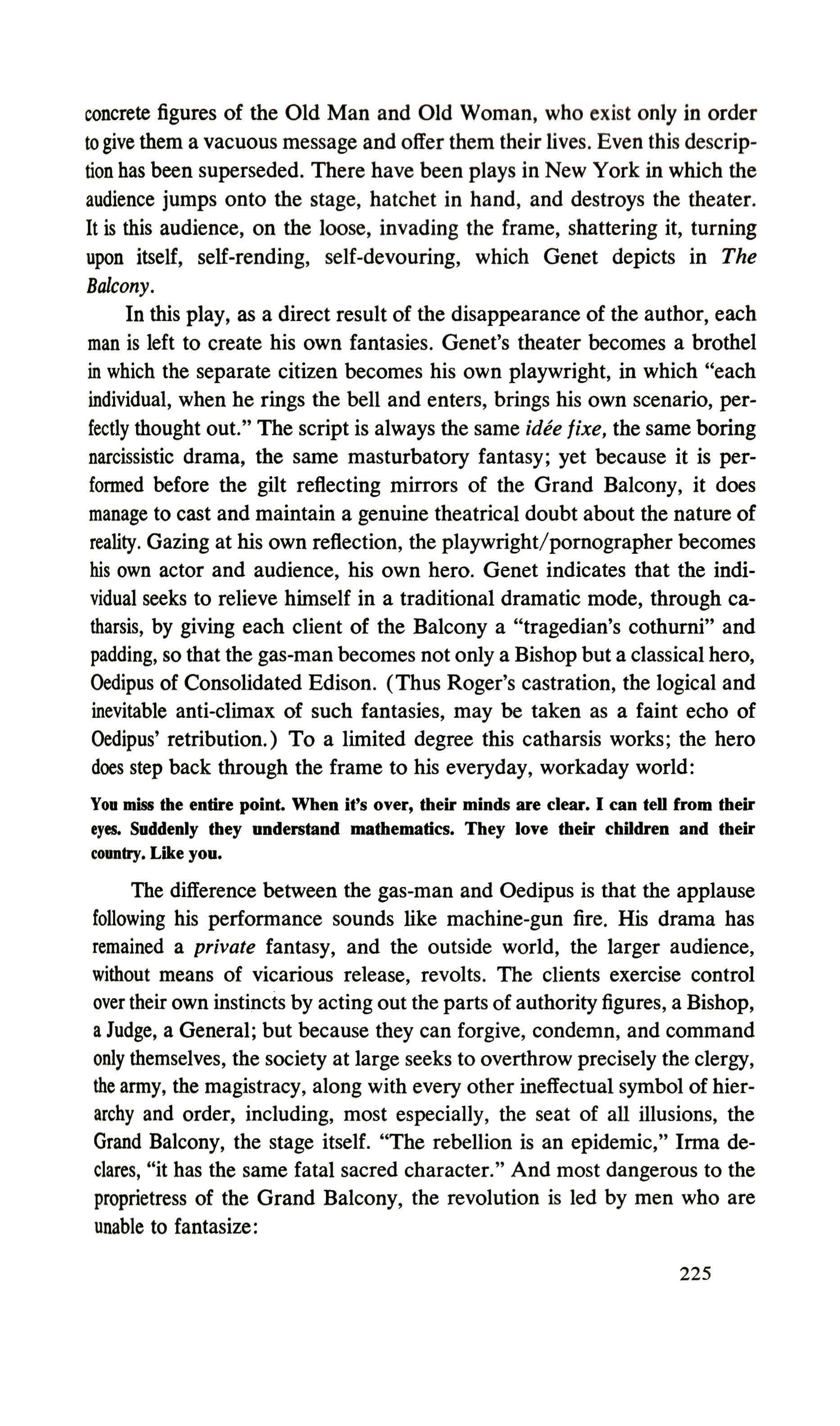
concrete figures of the Old Man and Old Woman, who exist only in order to give them a vacuous message and offer them their lives. Even this description has been superseded. There have been plays in New York in which the audience jumps onto the stage, hatchet in hand, and destroys the theater. It is this audience, on the loose, invading the frame, shattering it, turning upon itself, self-rending, self-devouring, which Genet depicts in The Balcony.
In this play, as a direct result of the disappearance of the author, each man is left to create his own fantasies. Genet's theater becomes a brothel in which the separate citizen becomes his own playwright, in which "each individual, when he rings the bell and enters, brings his own scenario, perfectly thought out." The script is always the same idee fixe, the same boring narcissistic drama, the same masturbatory fantasy; yet because it is performed before the gilt reflecting mirrors of the Grand Balcony, it does manage to cast and maintain a genuine theatrical doubt about the nature of reality. Gazing at his own reflection, the playwright/pornographer becomes his own actor and audience, his own hero. Genet indicates that the individual seeks to relieve himself in a traditional dramatic mode, through catharsis, by giving each client of the Balcony a "tragedian's cothurni" and padding, so that the gas-man becomes not only a Bishop but a classical hero, Oedipus of Consolidated Edison. (Thus Roger's castration, the logical and inevitable anti-climax of such fantasies, may be taken as a faint echo of Oedipus' retribution.) To a limited degree this catharsis works; the hero does step back through the frame to his everyday, workaday world:
You miss the entire point. When it's over, their minds are clear. I can teU from their eyes. Suddenly they understand mathematics. They love their children and their country. Like you.
The difference between the gas-man and Oedipus is that the applause following his performance sounds like machine-gun fire. His drama has remained a private fantasy, and the outside world, the larger audience, without means of vicarious release, revolts. The clients exercise control over their own instincts by acting out the parts of authorityfigures, a Bishop, a Judge, a General; but because they can forgive, condemn, and command only themselves, the society at large seeks to overthrow precisely the clergy, the army, the magistracy, along with every other ineffectual symbol of hierarchy and order, including, most especially, the seat of all illusions, the Grand Balcony, the stage itself. "The rebellion is an epidemic," Irma declares, "it has the same fatal sacred character." And most dangerous to the proprietress of the Grand Balcony, the revolution is led by men who are unable to fantasize:
225
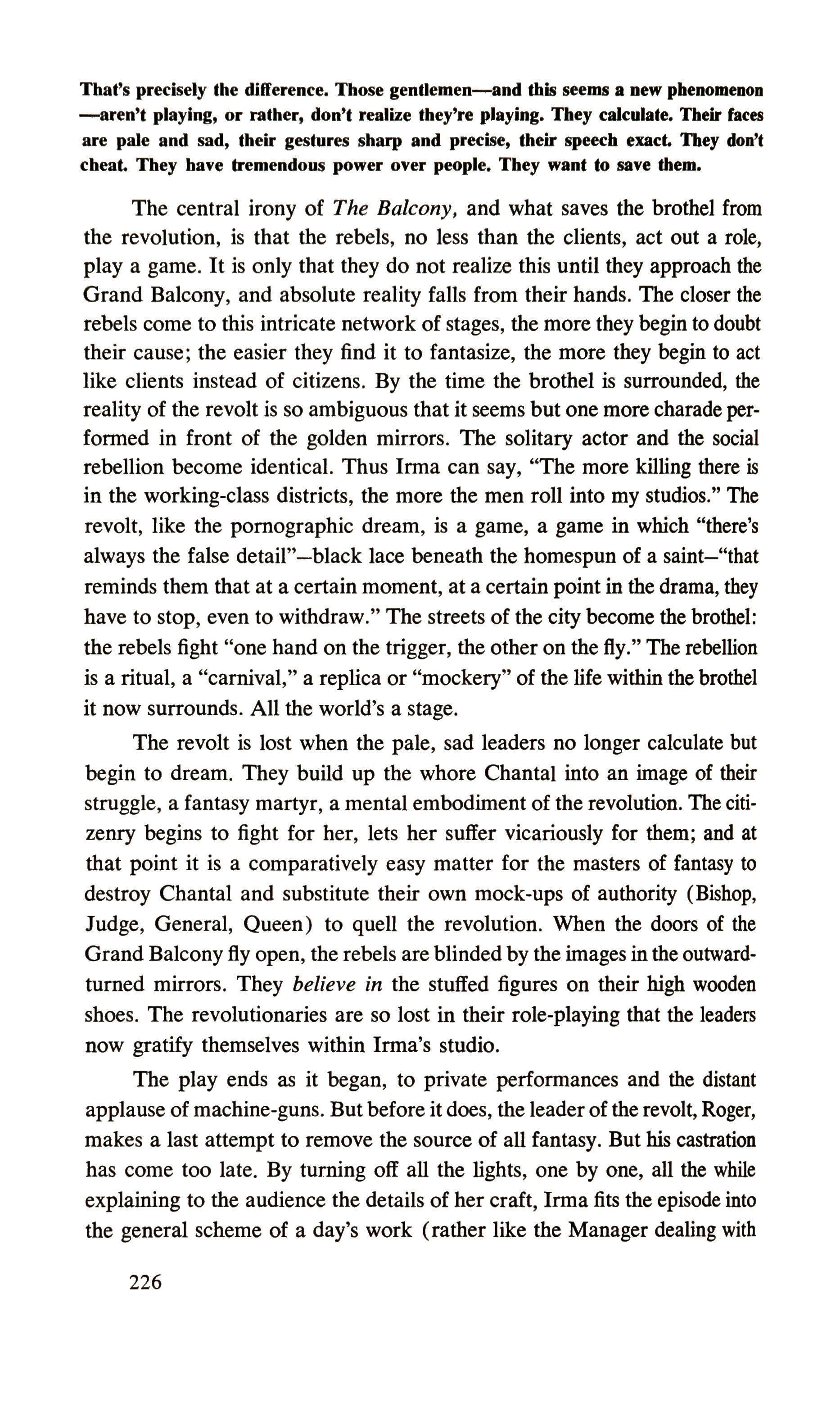
That's precisely the difference. Those gentlemen and this seems a new phenomenon -:aren't playing, or rather, don't realize they're playing. They calculate. Their faces are pale and sad, their gestures sharp and precise, their speech exact. Dey don't cheat. They have tremendous power over people. They want to save them.
The central irony of The Balcony, and what saves the brothel from the revolution, is that the rebels, no less than the clients, act out a role, playa game. It is only that they do not realize this until they approach the Grand Balcony, and absolute reality falls from their hands. The closer the rebels come to this intricate network of stages, the more they begin to doubt their cause; the easier they find it to fantasize, the more they begin to act like clients instead of citizens. By the time the brothel is surrounded, the reality of the revolt is so ambiguous that it seems but one more charade performed in front of the golden mirrors. The solitary actor and the social rebellion become identical. Thus Irma can say, "The more killing there is in the working-class districts, the more the men roll into my studios." The revolt, like the pornographic dream, is a game, a game in which "there's always the false detail" black lace beneath the homespun of a saint "that reminds them that at a certain moment, at a certain point in the drama, they have to stop, even to withdraw." The streets of the city become the brothel: the rebels fight "one hand on the trigger, the other on the fly." The rebellion is a ritual, a "carnival," a replica or "mockery" of the life within the brothel it now surrounds. All the world's a stage.
The revolt is lost when the pale, sad leaders no longer calculate but begin to dream. They build up the whore Chantal into an image of their struggle, a fantasy martyr, a mental embodiment of the revolution. The citizenry begins to fight for her, lets her suffer vicariously for them; and at that point it is a comparatively easy matter for the masters of fantasy to destroy Chantal and substitute their own mock-ups of authority (Bishop, Judge, General, Queen) to quell the revolution. When the doors of the Grand Balcony fly open, the rebels are blinded by the images in the outwardturned mirrors. They believe in the stuffed figures on their high wooden shoes. The revolutionaries are so lost in their role-playing that the leaders now gratify themselves within Irma's studio.
The play ends as it began, to private perfOfIIlances and the distant applause of machine-guns. But before it does, the leader of the revolt, Roger, makes a last attempt to remove the source of all fantasy. But his castration has come too late. By turning off all the lights, one by one, all the while explaining to the audience the details of her craft, Irma fits the episode into the general scheme of a day's work (rather like the Manager dealing with
226
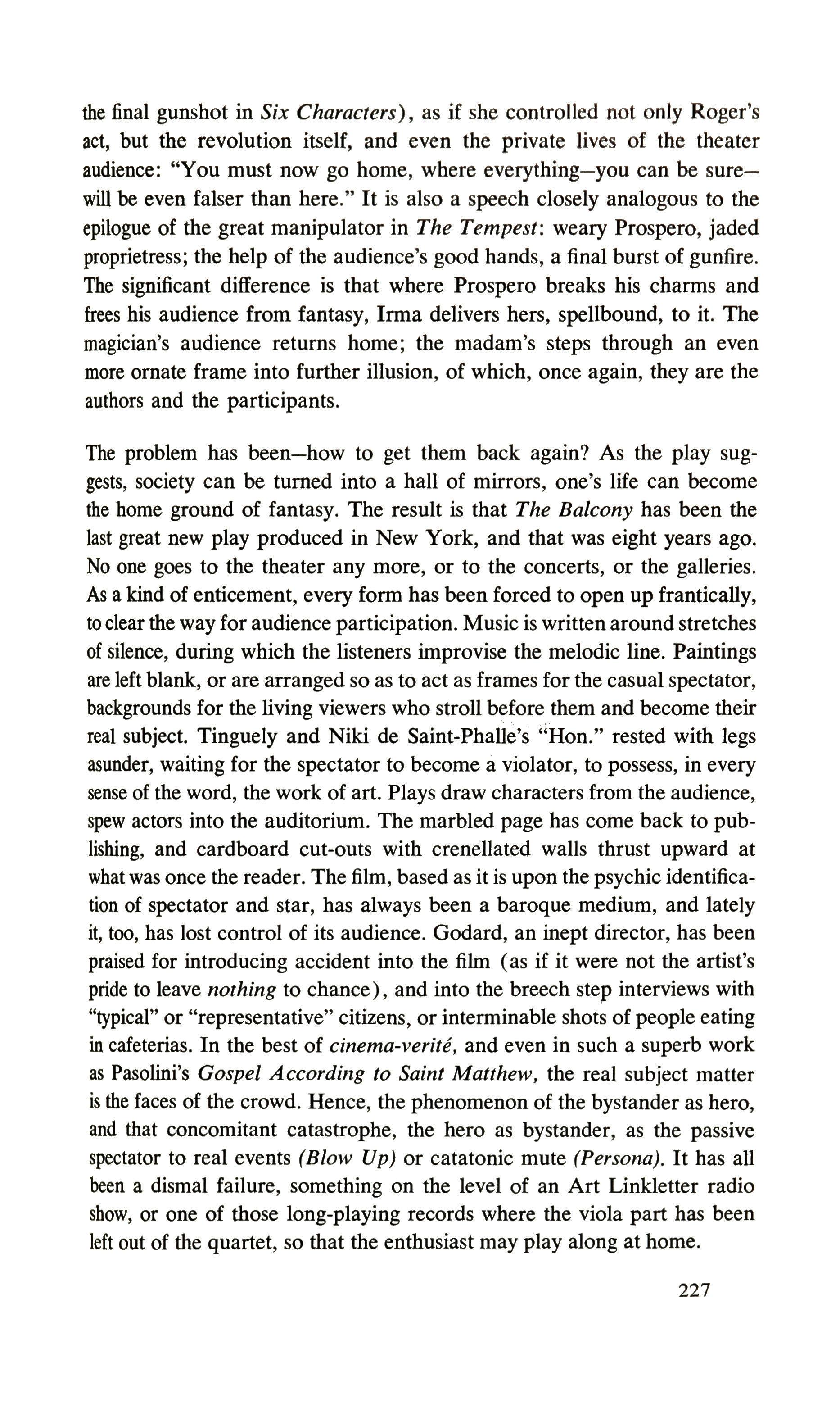
the final gunshot in Six Characters), as if she controlled not only Roger's act, but the revolution itself, and even the private lives of the theater audience: "You must now go home, where everything you can be surewill be even falser than here." It is also a speech closely analogous to the epilogue of the great manipulator in The Tempest: weary Prospero, jaded proprietress; the help of the audience's good hands, a final burst of gunfire. The significant difference is that where Prospero breaks his charms and frees his audience from fantasy, Irma delivers hers, spellbound, to it. The magician's audience returns home; the madam's steps through an even more ornate frame into further illusion, of which, once again, they are the authors and the participants.
The problem has been how to get them back again? As the play suggests, society can be turned into a hall of mirrors, one's life can become the home ground of fantasy. The result is that The Balcony has been the last great new play produced in New York, and that was eight years ago. No one goes to the theater any more, or to the concerts, or the galleries. As a kind of enticement, every form has been forced to open up frantically, to clear the way for audience participation. Music is written around stretches of silence, during which the listeners improvise the melodic line. Paintings are left blank, or are arranged so as to act as frames for the casual spectator, backgrounds for the living viewers who stroll before them and become their real subject. Tinguely and Niki de Saint-Phalle's "Hon." rested with legs asunder, waiting for the spectator to become a violator, to possess, in every sense of the word, the work of art. Plays draw characters from the audience, spew actors into the auditorium. The marbled page has come back to publishing, and cardboard cut-outs with crenellated walls thrust upward at what was once the reader. The film, based as it is upon the psychic identification of spectator and star, has always been a baroque medium, and lately it, too, has lost control of its audience. Godard, an inept director, has been praised for introducing accident into the film (as if it were not the artist's pride to leave nothing to chance), and into the breech step interviews with "typical" or "representative" citizens, or interminable shots of people eating in cafeterias. In the best of cinema-verite, and even in such a superb work as Pasolini's Gospel According to Saint Matthew, the real subject matter is the faces of the crowd. Hence, the phenomenon of the bystander as hero, and that concomitant catastrophe, the hero as bystander, as the passive spectator to real events (Blow Up) or catatonic mute (Persona). It has all been a dismal failure, something on the level of an Art Linkletter radio show, or one of those long-playing records where the viola part has been left out of the quartet, so that the enthusiast may play along at home.
227
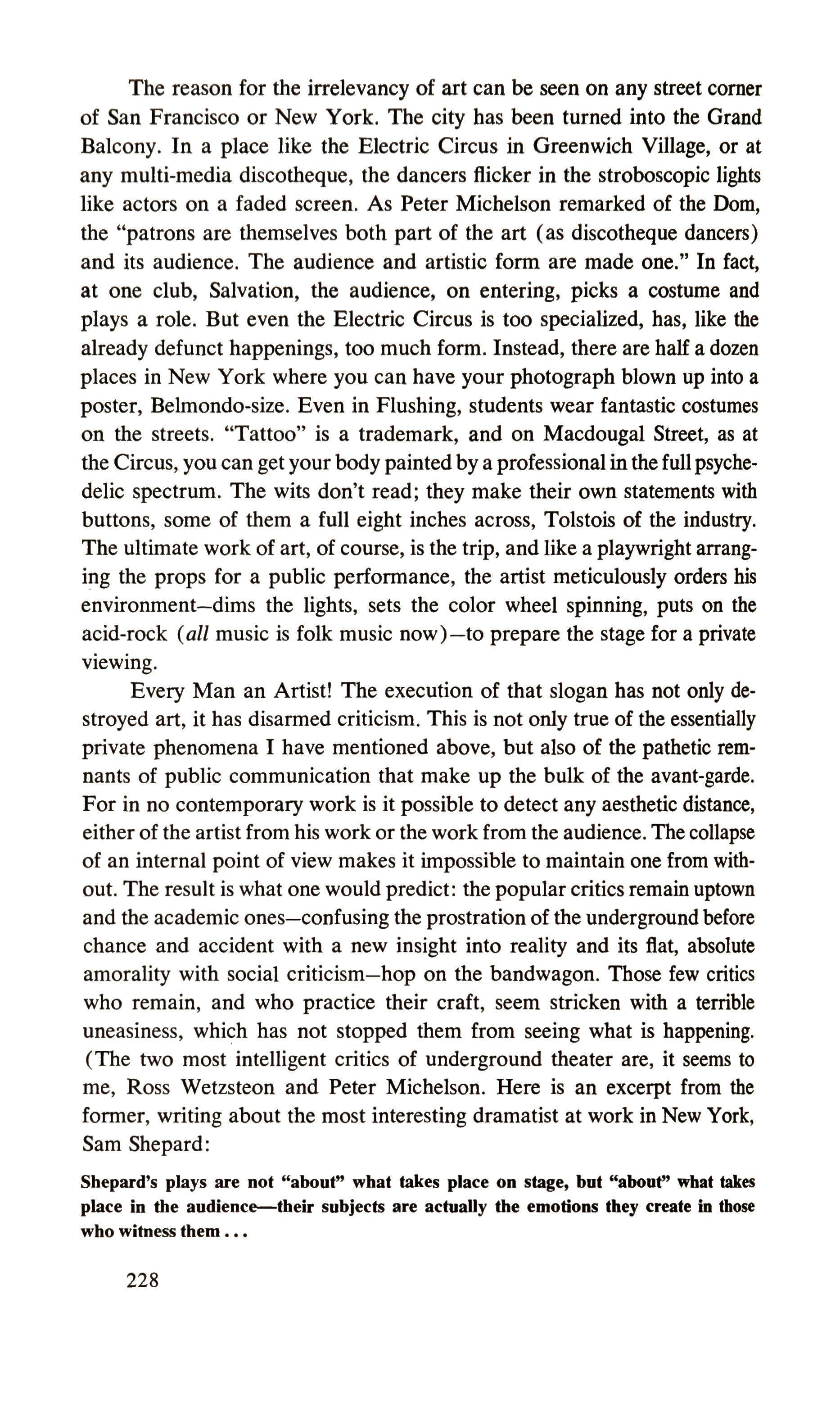
The reason for the irrelevancy of art can be seen on any street comer of San Francisco or New York. The city has been turned into the Grand Balcony. In a place like the Electric Circus in Greenwich Village, or at any multi-media discotheque, the dancers flicker in the stroboscopic lights like actors on a faded screen. As Peter Michelson remarked of the Dom, the "patrons are themselves both part of the art (as discotheque dancers) and its audience. The audience and artistic form are made one." In fact, at one club, Salvation, the audience, on entering, picks a costume and plays a role. But even the Electric Circus is too specialized, has, like the already defunct happenings, too much form, Instead, there are half a dozen places in New York where you can have your photograph blown up into a poster, Belmondo-size. Even in Flushing, students wear fantastic costumes on the streets. "Tattoo" is a trademark, and on Macdougal Street, as at the Circus, you can get your bodypaintedby a professional in the fullpsychedelic spectrum. The wits don't read; they make their own statements with buttons, some of them a full eight inches across, Tolstois of the industry. The ultimate work of art, of course, is the trip, and like a playwright arranging the props for a public perf01 Inance, the artist meticulously orders his environment dims the lights, sets the color wheel spinning, puts on the acid-rock (all music is folk music now) to prepare the stage for a private viewmg.
Every Man an Artist! The execution of that slogan has not only destroyed art, it has disarmed criticism. This is not only true of the essentially private phenomena I have mentioned above, but also of the pathetic remnants of public communication that make up the bulk of the avant-garde. For in no contemporary work is it possible to detect any aesthetic distance, either of the artist from his work or the work from the audience. The collapse of an internal point of view makes it impossible to maintain one from without. The result is what one would predict: the popular critics remain uptown and the academic ones confusing the prostration of the underground before chance and accident with a new insight into reality and its flat, absolute amorality with social criticism hop on the bandwagon. Those few critics who remain, and who practice their craft, seem stricken with a terrible uneasiness, which has not stopped them from seeing what is happening (The two most intelligent critics of underground theater are, it seems to me, Ross Wetzsteon and Peter Michelson. Here is an excerpt from the former, writing about the most interesting dramatist at work in New York, Sam Shepard:
Shepard's plays are not "about" what takes place on stage, but "about" what takes place in the audience their subjects are actually the emotions they create in tbose who witness them
228
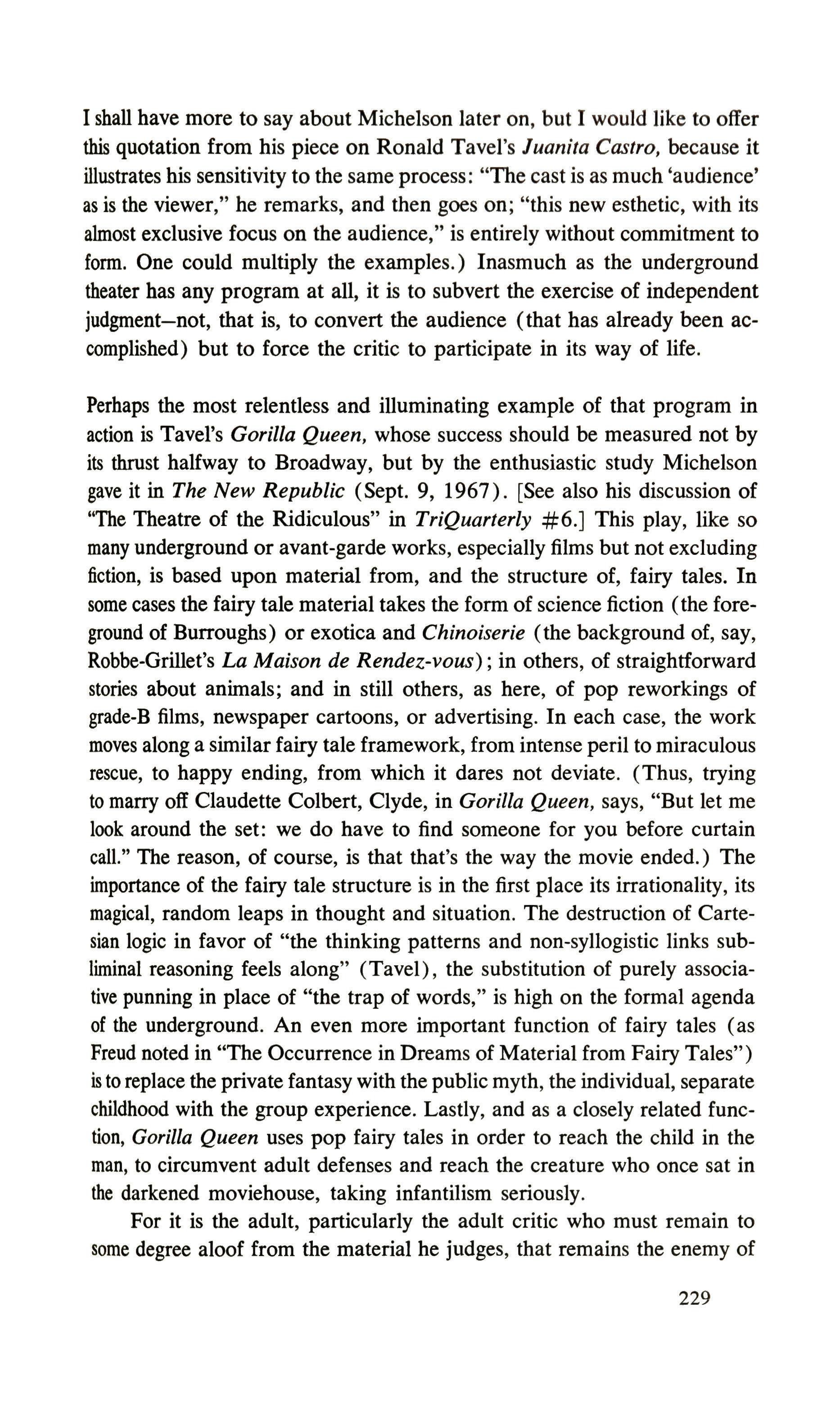
I shall have more to say about Michelson later on, but I would like to offer this quotation from his piece on Ronald Tavel's Juanita Castro, because it illustrates his sensitivity to the same process: "The cast is as much 'audience' as is the viewer," he remarks, and then goes on; "this new esthetic, with its almost exclusive focus on the audience," is entirely without commitment to form. One could multiply the examples.) Inasmuch as the underground theater has any program at all, it is to subvert the exercise of independent judgment not, that is, to convert the audience (that has already been accomplished) but to force the critic to participate in its way of life.
Perhaps the most relentless and illuminating example of that program in action is Tavel's Gorilla Queen, whose success should be measured not by its thrust halfway to Broadway, but by the enthusiastic study Michelson gave it in The New Republic (Sept. 9, 1967). [See also his discussion of "The Theatre of the Ridiculous" in TriQuarterly #6.] This play, like so many underground or avant-garde works, especially films but not excluding fiction, is based upon material from, and the structure of, fairy tales. In some cases the fairy tale material takes the fOIIn of science fiction (the foreground of Burroughs) or exotica and Chinoiserie (the background of, say, Robbe-Grillet's La Maison de Rendez-vous); in others, of straightforward stories about animals; and in still others, as here, of pop reworkings of grade-B films, newspaper cartoons, or advertising. In each case, the work moves along a similar fairy tale framework, from intense peril to miraculous rescue, to happy ending, from which it dares not deviate. (Thus, trying to marry off Claudette Colbert, Clyde, in Gorilla Queen, says, "But let me look around the set: we do have to find someone for you before curtain call." The reason, of course, is that that's the way the movie ended.) The importance of the fairy tale structure is in the first place its irrationality, its magical, random leaps in thought and situation. The destruction of Cartesian logic in favor of "the thinking patterns and non-syllogistic links subliminal reasoning feels along" (Tavel), the substitution of purely associative punning in place of "the trap of words," is high on the formal agenda of the underground. An even more important function of fairy tales (as Freud noted in "The Occurrence in Dreams of Material from Fairy Tales") is to replace the private fantasy with the public myth, the individual, separate childhood with the group experience. Lastly, and as a closely related function, Gorilla Queen uses pop fairy tales in order to reach the child in the man, to circumvent adult defenses and reach the creature who once sat in the darkened moviehouse, taking infantilism seriously. For it is the adult, particularly the adult critic who must remain to some degree aloof from the material he judges, that remains the enemy of
229
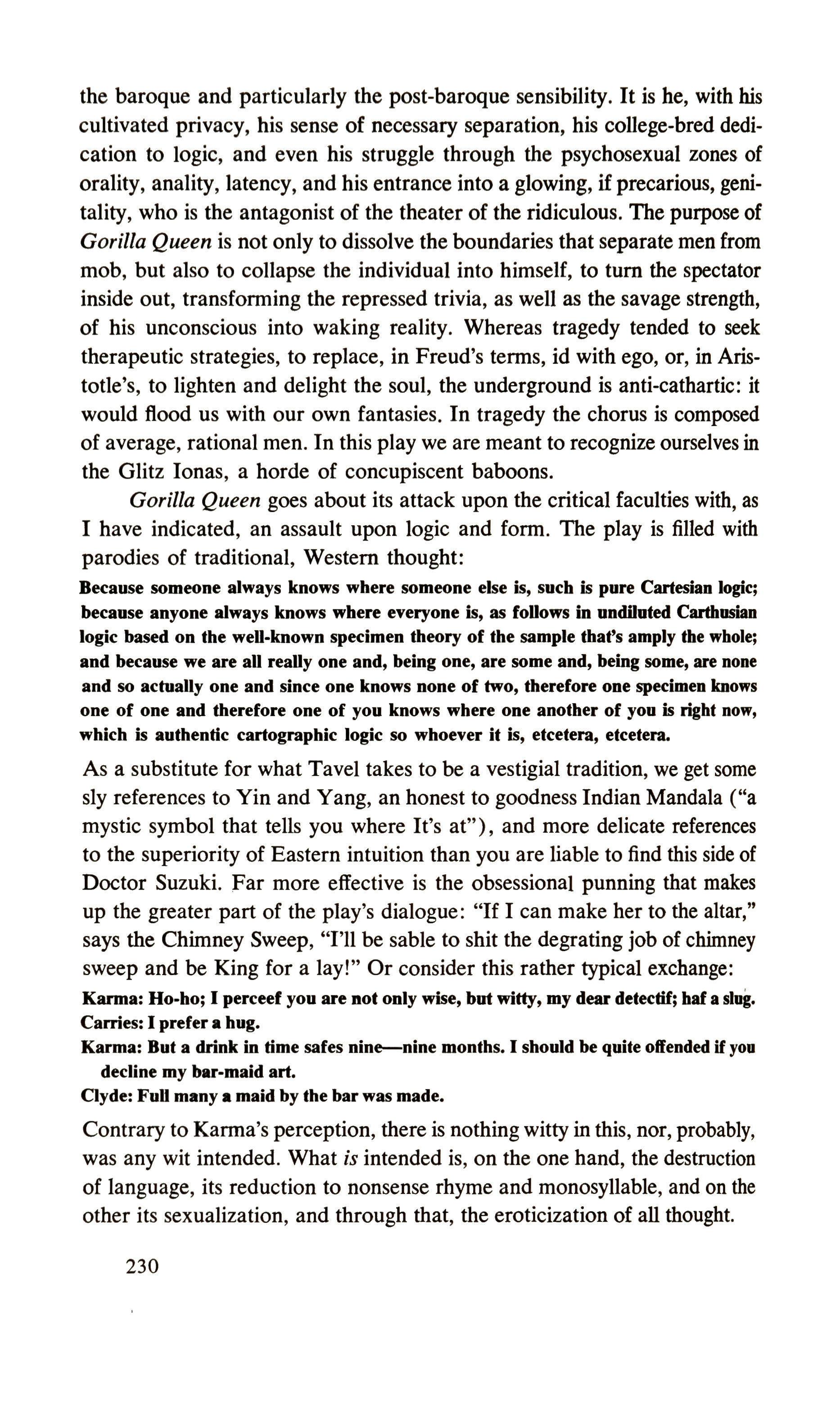
the baroque and particularly the post-baroque sensibility. It is he, with his cultivated privacy, his sense of necessary separation, his college-bred dedication to logic, and even his struggle through the psychosexual zones of orality, anality, latency, and his entrance into a glowing, if precarious, genitality, who is the antagonist of the theater of the ridiculous. The purpose of Gorilla Queen is not only to dissolve the boundaries that separate men from mob, but also to collapse the individual into himself, to tum the spectator inside out, transforming the repressed trivia, as well as the savage strength, of his unconscious into waking reality. Whereas tragedy tended to seek therapeutic strategies, to replace, in Freud's telIDS, id with ego, or, in Aristotle's, to lighten and delight the soul, the underground is anti-cathartic: it would flood us with our own fantasies. In tragedy the chorus is composed of average, rational men. In this play we are meant to recognize ourselves in the Glitz Ionas, a horde of concupiscent baboons.
Gorilla Queen goes about its attack upon the critical faculties with, as I have indicated, an assault upon logic and form. The play is filled with parodies of traditional, Western thought:
Because someone always knows where someone else is, such is pure Cartesian logic; because anyone always knows where everyone is, as foDows in undUuted Carthusian logic based on the weD-known specimen theory of the sample that's amply the whole; and because we are aD reaDy one and, being one, are some and, being some, are none and so actually one and since one knows none of two, therefore one specimen knows one of one and therefore one of you knows where one another of you is right now, which is authentic cartographic logic so whoever it is, etcetera, etcetera.
As a substitute for what Tavel takes to be a vestigial tradition, we get some sly references to Yin and Yang, an honest to goodness Indian Mandala ("a mystic symbol that tells you where It's at"), and more delicate references to the superiority of Eastern intuition than you are liable to find this side of Doctor Suzuki. Far more effective is the obsessional punning that makes up the greater part of the play's dialogue: "If I can make her to the altar," says the Chimney Sweep, "I'll be sable to shit the degrating job of chimney sweep and be King for a lay!" Or consider this rather typical exchange: Kal'llla: Ho-ho; I perceef you are not only wise, but witty, my dear detectif; haf a slug. Cal'ries: I prefer a hug.
Karma: But a drink in time safes nine nine months. I should be quite offended if you decline my bar-maid art.
Clyde: FuD many a maid by the bar was made.
Contrary to Karma's perception, there is nothing witty in this, nor, probably, was any wit intended. What is intended is, on the one hand, the destruction of language, its reduction to nonsense rhyme and monosyllable, and on the other its sexualization, and through that, the eroticization of all thought.
230
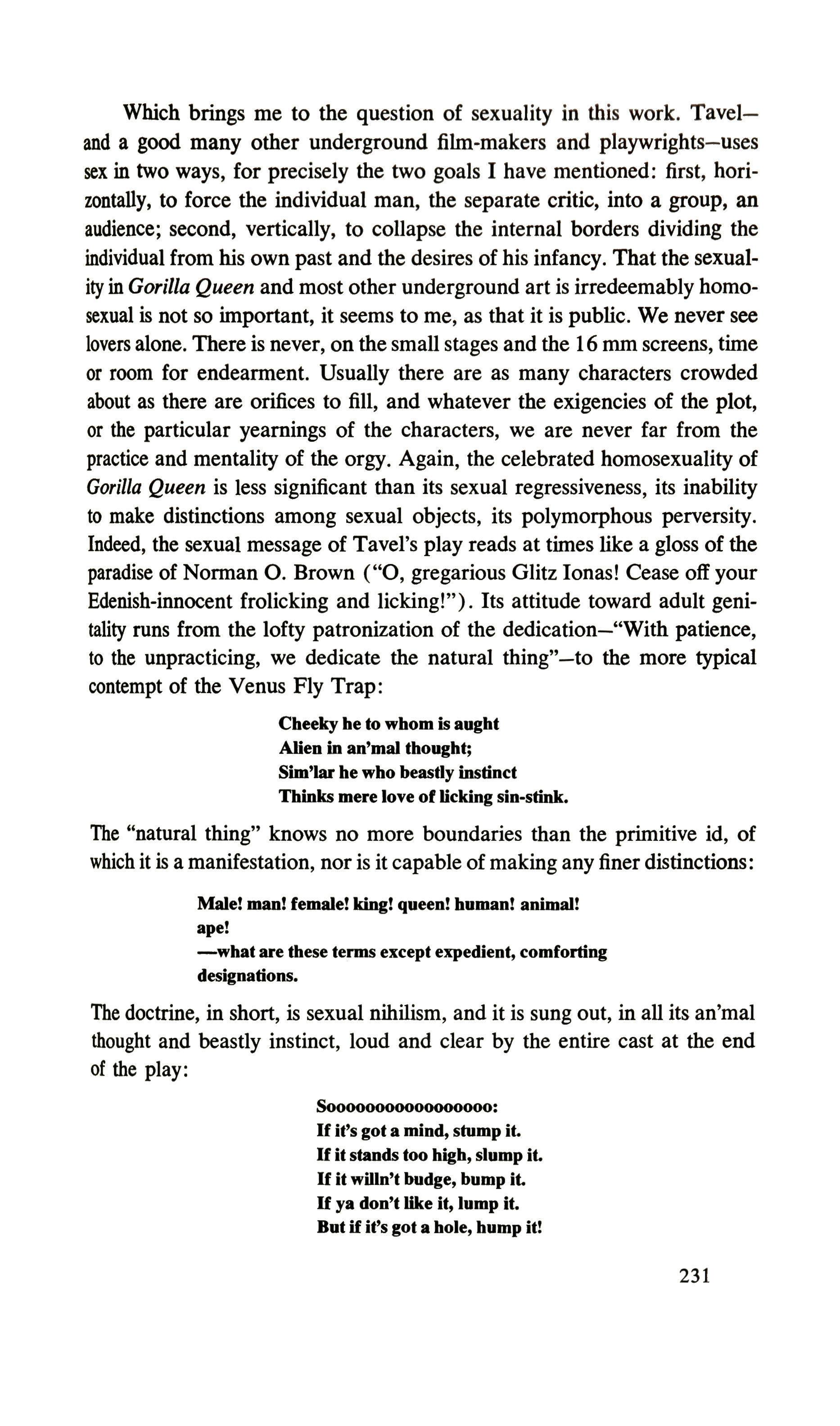
Which brings me to the question of sexuality in this work. Taveland a good many other underground film-makers and playwrights uses sex in two ways, for precisely the two goals I have mentioned: first, horizontally, to force the individual man, the separate critic, into a group, an audience; second, vertically, to collapse the internal borders dividing the individual from his own past and the desires of his infancy. That the sexuality in Gorilla Queen and most other underground art is irredeemably homosexual is not so important, it seems to me, as that it is public. We never see lovers alone. There is never, on the small stages and the 1611un screens, time or room for endearment, Usually there are as many characters crowded about as there are orifices to fill, and whatever the exigencies of the plot, or the particular yearnings of the characters, we are never far from the practice and mentality of the orgy. Again, the celebrated homosexuality of Gorilla Queen is less significant than its sexual regressiveness, its inability to make distinctions among sexual objects, its polymorphous perversity. Indeed, the sexual message of Tavel's play reads at times like a gloss of the paradise of Norman 0. Brown ("0, gregarious Glitz lonas! Cease off your Edenish-innocent frolicking and licking!"). Its attitude toward adult genitality runs from the lofty patronization of the dedication "With patience, to the unpracticing, we dedicate the natural thing" to the more typical contempt of the Venus Fly Trap:
Cheeky he to whom is aught Alieu in au'mal thought; Silll'lar he who beastly instinct Thinks mere love of licking sin-stink.
The "natural thing" knows no more boundaries than the primitive id, of which it is a manifestation, nor is it capable of making any finer distinctions:
Male! man! female! king! queen! human! animal! ape! -what are these tel IllS except expedient, comforting designations.
The doctrine, in short, is sexual nihilism, and it is sung out, in all its an'mal thought and beastly instinct, loud and clear by the entire cast at the end of the play:
Soooooooooo 0:
H it's got a Illind, stump it.
If it stands too high, slump it.
H it wDIn't budge, bump it.
H ya don't like it, lump it.
But if it's got a hole, hump it!
231
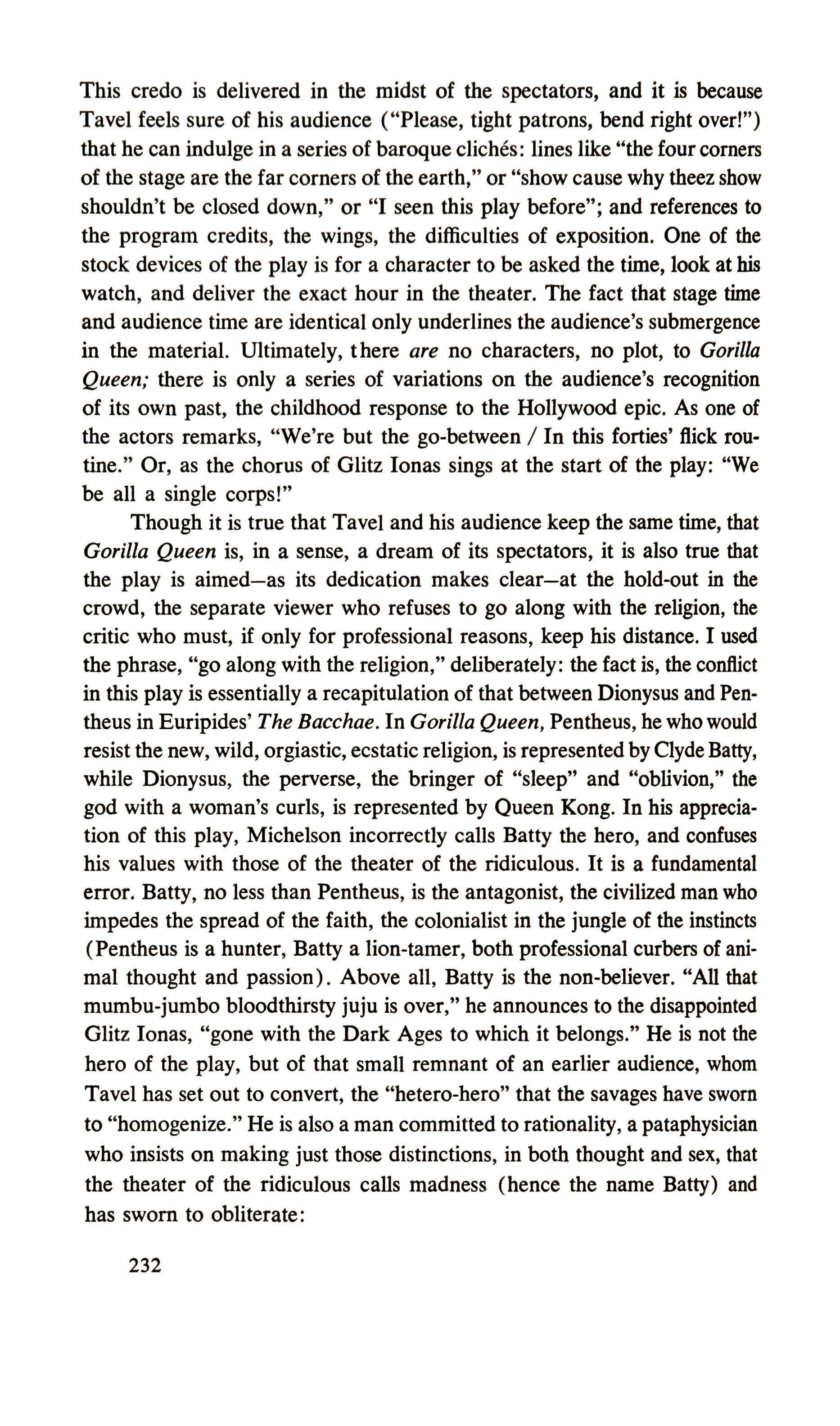
This credo is delivered in the midst of the spectators, and it is because Tavel feels sure of his audience ("Please, tight patrons, bend right over!") that he can indulge in a series of baroque cliches: lines like "the four comers of the stage are the far corners of the earth," or "show cause why theez show shouldn't be closed down," or "I seen this play before"; and references to the program credits, the wings, the difficulties of exposition. One of the stock devices of the play is for a character to be asked the time, look at his watch, and deliver the exact hour in the theater. The fact that stage time and audience time are identical only underlines the audience's submergence in the material. Ultimately, there are no characters, no plot, to Gorilla Queen,' there is only a series of variations on the audience's recognition of its own past, the childhood response to the Hollywood epic. As one of the actors remarks, "We're but the go-between / In this forties' flick routine." Or, as the chorus of Glitz lonas sings at the start of the play: "We be all a single corps!"
Though it is true that Tavel and his audience keep the same time, that Gorilla Queen is, in a sense, a dream of its spectators, it is also true that the play is aimed as its dedication makes clear at the hold-out in the crowd, the separate viewer who refuses to go along with the religion, the critic who must, if only for professional reasons, keep his distance. I used the phrase, "go along with the religion," deliberately: the fact is, the conflict in this play is essentially a recapitulation of that between Dionysus and Pentheus in Euripides' The Bacchae. In Gorilla Queen, Pentheus, he who would resist the new, wild, orgiastic, ecstatic religion, is representedbyClydeBatty, while Dionysus, the perverse, the bringer of "sleep" and "oblivion," the god with a woman's curls, is represented by Queen Kong. In his appreciation of this play, Michelson incorrectly calls Batty the hero, and confuses his values with those of the theater of the ridiculous. It is a fundamental error. Batty, no less than Pentheus, is the antagonist, the civilized man who impedes the spread of the faith, the colonialist in the jungle of the instincts (Pentheus is a hunter, Batty a lion-tamer, both professional curbers of animal thought and passion). Above all, Batty is the non-believer. "All that mumbu-jumbo bloodthirsty juju is over," he announces to the disappointed Glitz lonas, "gone with the Dark Ages to which it belongs." He is not the hero of the play, but of that small remnant of an earlier audience, whom Tavel has set out to convert, the "hetero-hero" that the savages have sworn to "homogenize." He is also a man committed to rationality, a pataphysician who insists on making just those distinctions, in both thought and sex, that the theater of the ridiculous calls madness (hence the name Batty) and has sworn to obliterate:
232
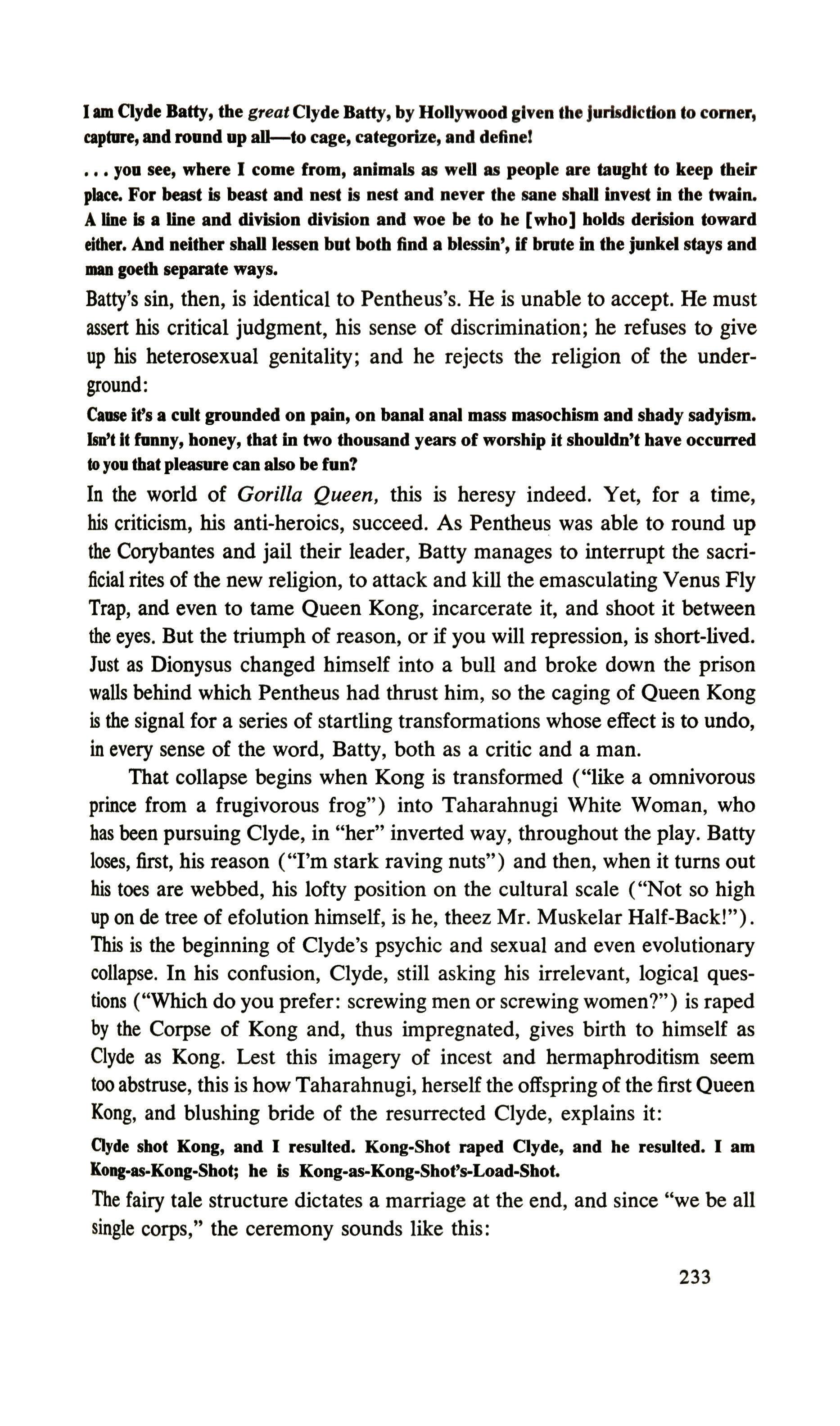
I am Oyde Batty, the great Clyde Batty, by Hollywood given the Jurlsdlcdon to corner, captw'e, and roand ap all to cage, categorize, and define!
yoa see, wbere I come from, animals as weD as people are taught to keep their place. For beast is beast and nest is nest and never the sane shaD invest in the twain. A Doe is a line and division division and woe be to be [who] bolds derision toward either. And neitber sbaD lessen but both find a blessin', if bmte in the junkel stays and II',D goeth separate ways.
Batty's sin, then, is identical to Pentheus's. He is unable to accept. He must assert his critical judgment, his sense of discrimination; he refuses to give up his heterosexual genitality; and he rejects the religion of the underground:
Cause it's a cult grounded on pain, on banal anal mass masochism and shady sadyism. Isn't it fuIIOY, boney, tbat in two thousand years of worship it shouldn't bave occurred to you that pleasllre can also be fun?
In the world of Gorilla Queen, this is heresy indeed. Yet, for a time, his criticism, his anti-heroics, succeed. As Pentheus was able to round up the Corybantes and jail their leader, Batty manages to interrupt the sacrificial rites of the new religion, to attack and kill the emasculating Venus Fly Trap, and even to tame Queen Kong, incarcerate it, and shoot it between the eyes. But the triumph of reason, or if you will repression, is short-lived. Just as Dionysus changed himself into a bull and broke down the prison walls behind which Pentheus had thrust him, so the caging of Queen Kong is the signal for a series of startling transformations whose effect is to undo, in every sense of the word, Batty, both as a critic and a man.
That collapse begins when Kong is transformed ("like a omnivorous prince from a frugivorous frog") into Taharahnugi White Woman, who has been pursuing Clyde, in "her" inverted way, throughout the play. Batty loses, first, his reason ("I'm stark raving nuts") and then, when it turns out his toes are webbed, his lofty position on the cultural scale ("Not so high up on de tree of efolution himself, is he, theez Mr. Muskelar Half-Back!"). This is the beginning of Clyde's psychic and sexual and even evolutionary collapse. In his confusion, Clyde, still asking his irrelevant, logical questions ("Which do you prefer: screwing men or screwing women?") is raped by the Corpse of Kong and, thus impregnated, gives birth to himself as Clyde as Kong. Lest this imagery of incest and hermaphroditism seem too abstruse, this is how Taharahnugi, herself the offspring of the first Queen Kong, and blushing bride of the resurrected Clyde, explains it: Clyde shot Kong, and I resulted. Kong-Shot raped Clyde, and he resulted. I am Kong-as-Kong-Shot; be is Kong-as-Kong-Shot's-Load-Sbot. The fairy tale structure dictates a marriage at the end, and since "we be all single corps," the ceremony sounds like this:
233
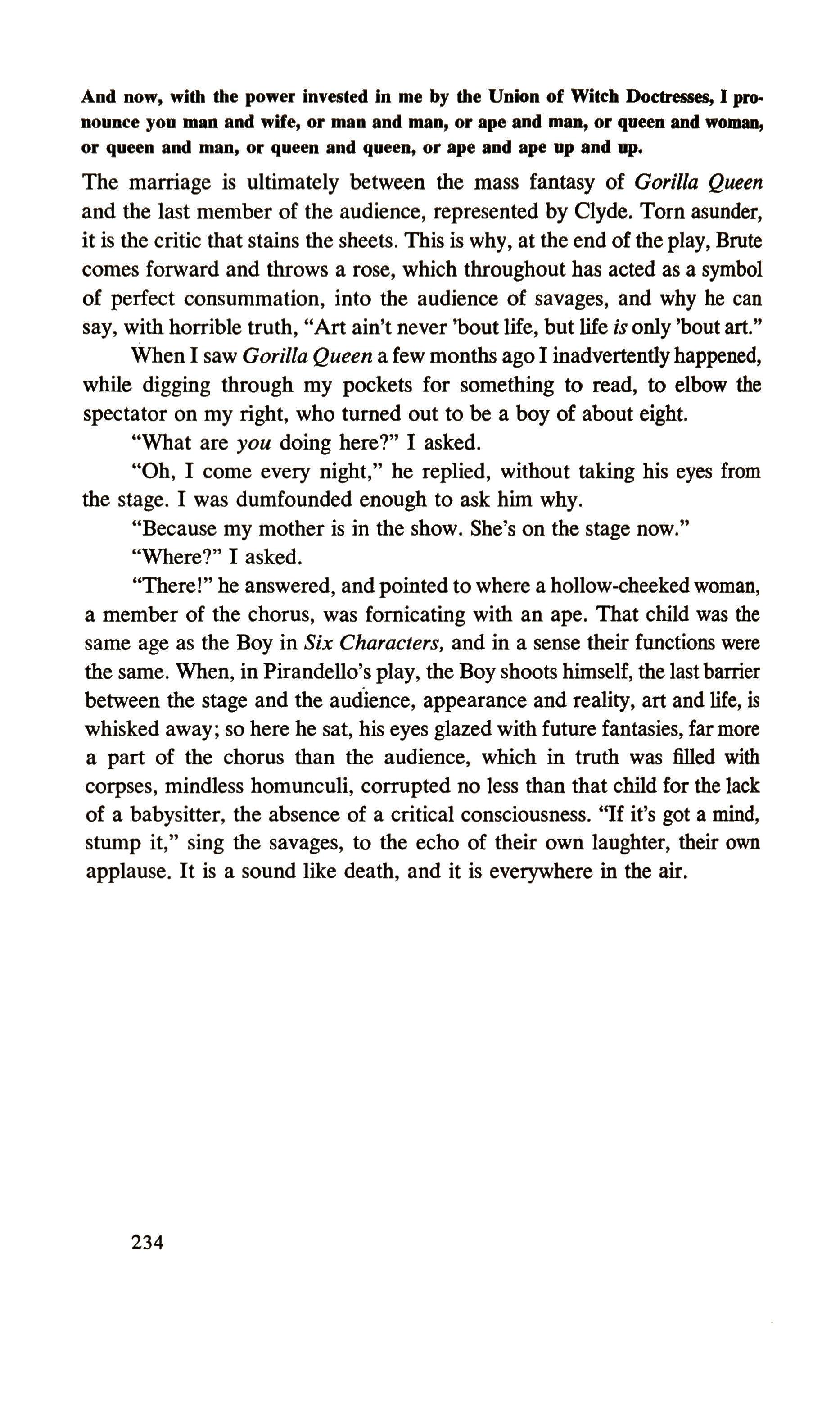
And now, with the power invested in me by the Union of Witch Doctresses, I pronounce you man and wife, or man and man, or ape and man, or queen and woman, or queen and man, or queen and queen, or ape and ape up and up.
The marriage is ultimately between the mass fantasy of Gorilla Queen and the last member of the audience, represented by Clyde. Torn asunder, it is the critic that stains the sheets. This is why, at the end of the play, Brute comes forward and throws a rose, which throughout has acted as a symbol of perfect consummation, into the audience of savages, and why he can say, with horrible truth, "Art ain't never 'bout life, but life is only 'bout art."
When I saw Gorilla Queen a few months ago I inadvertentlyhappened, while digging through my pockets for something to read, to elbow the spectator on my right, who turned out to be a boy of about eight.
"What are you doing here?" I asked.
"Oh, I come every night," he replied, without taking his eyes from the stage. I was dumfounded enough to ask him why.
"Because my mother is in the show. She's on the stage now."
"Where?" I asked.
"There!" he answered, and pointed to where a hollow-cheeked woman, a member of the chorus, was fornicating with an ape. That child was the same age as the Boy in Six Characters, and in a sense their functions were the same. When, in Pirandello's play, the Boy shoots himself, the lastbarrier between the stage and the audience, appearance and reality, art and life, is whisked away; so here he sat, his eyes glazed with future fantasies, far more a part of the chorus than the audience, which in truth was filled with corpses, mindless homunculi, corrupted no less than that child for the lack of a babysitter, the absence of a critical consciousness. "If it's got a mind, stump it," sing the savages, to the echo of their own laughter, their own applause. It is a sound like death, and it is everywhere in the air.
234
SIX POEMS BY VASKO POPA
translated by Aleksandar Nejgebauer
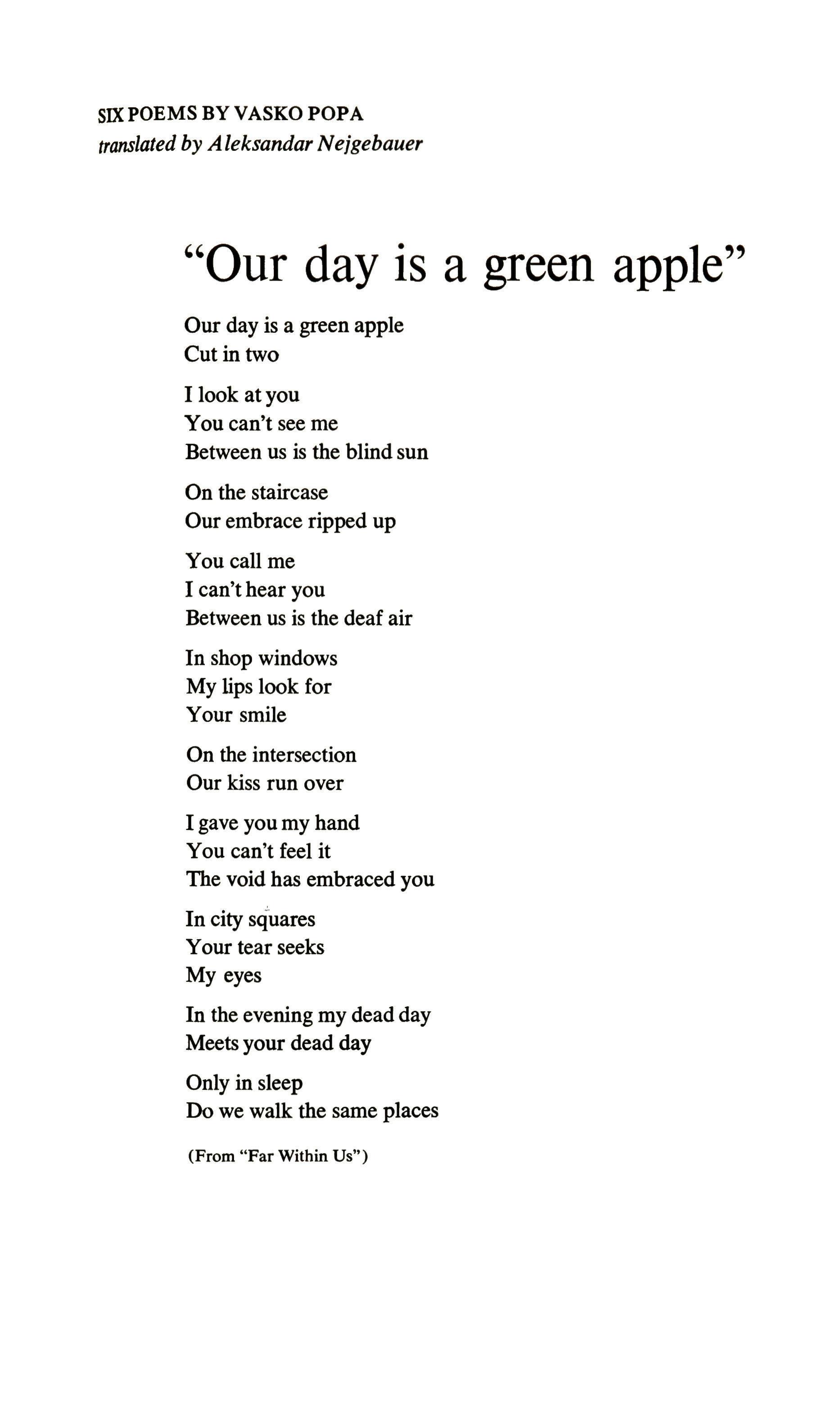
IS a
Our day is a green apple
Cut in two
I look at you
You can't see me
Between us is the blind sun
On the staircase
Our embrace ripped up
You call me
I can't hear you
Between us is the deaf air
In shop windows
My lips look for
Your smile
On the intersection
Our kiss run over
I gave you my hand
You can't feel it
The void has embraced you
In city squares
Your tear seeks
My eyes
In the evening my dead day
Meets your dead day
Only in sleep
Do we walk the same places
(From "Far Within Us")
"
Most tender daughter of
The green underground sky
She would escape
The wall's white beard
Stand up in the square
In all her beauty
With her snake dance
She'd entrance the whirlwinds
But the broad-shouldered air
Does not reach out his arms
(From "Inventory")
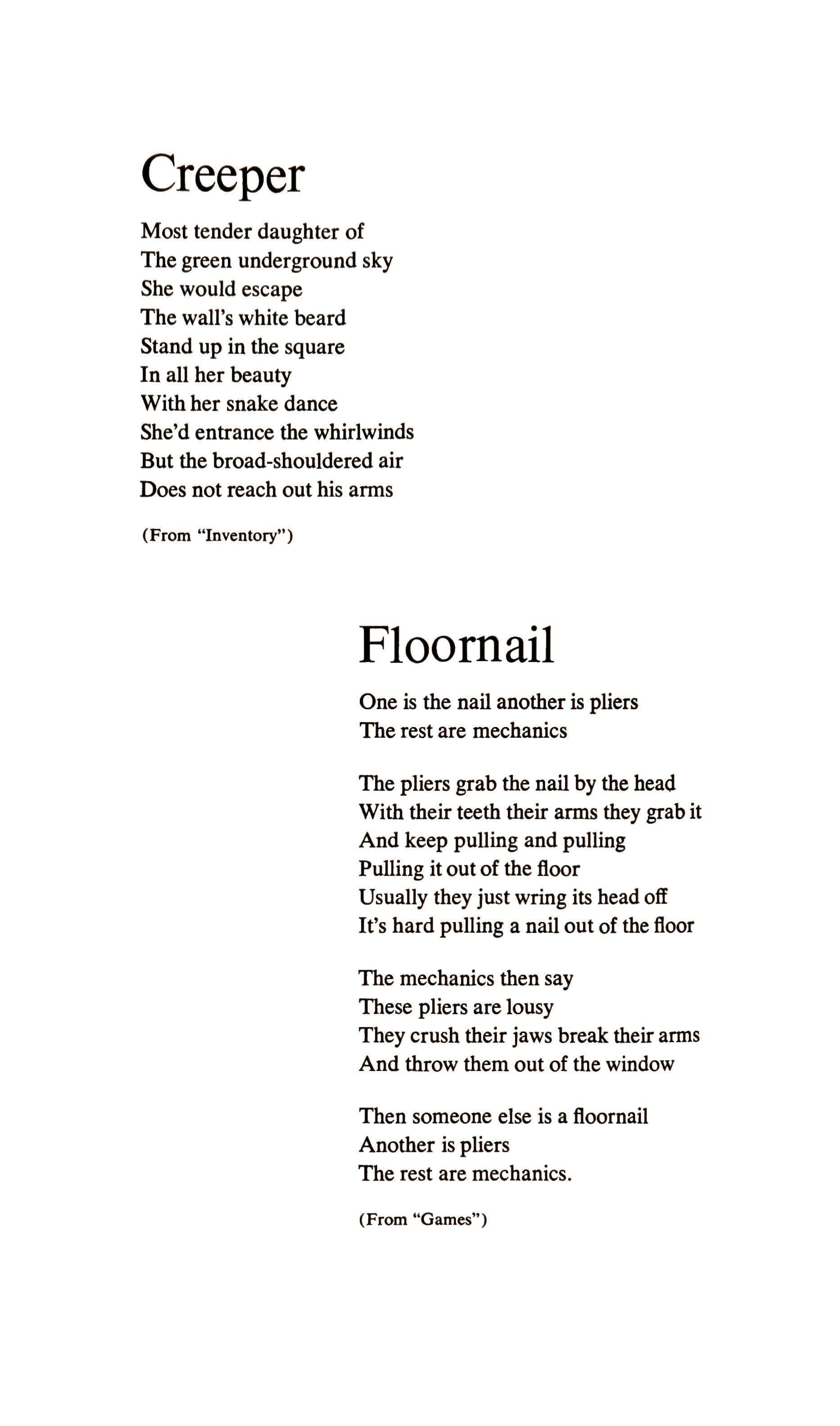
One is the nail another is pliers
The rest are mechanics
The pliers grab the nail by the head
With their teeth their alulS they grab it
And keep pulling and pulling Pulling it out of the floor
Usually they just wring its head off It's hard pulling a nail out of the floor
The mechanics then say These pliers are lousy
They crush their jaws break their arms
And throw them out of the window
Then someone else is a floornail
Another is pliers
The rest are mechanics.
(From "Games")
On the edge of the sidewalk
At the world's end
Solitude's yellow eye
Blind feet
Knock his neck
Into his rocky belly
Underground elbows
Drive his roots
Into heaven's dark soil
A dog's raised leg
Mocks him
With a boiled shower
Hisonly joy is
The walker's homeless glance
That rests in his corolla
Overnight
And so
The butt is burning out
On frustration's lower lip
At the world's end
(From "Inventory")
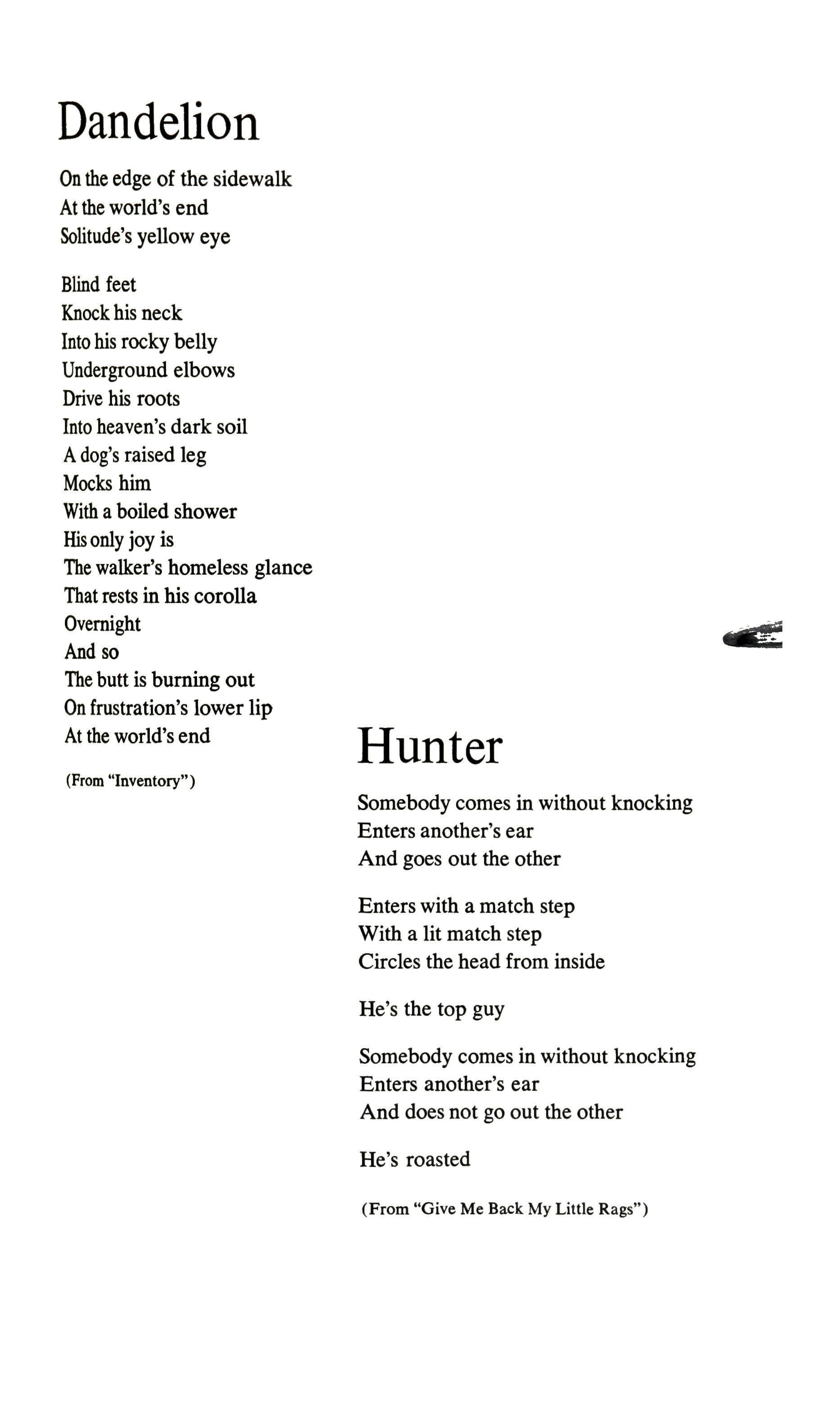
Somebody comes in without knocking Enters another's ear And goes out the other
Enters with a match step
With a lit match step
Circles the head from inside
He's the top guy
Somebody comes in without knocking Enters another's ear And does not go out the other
He's roasted
(From "Give Me Back My Little Rags")
Black your tongue black noon black hope
All that is yours black just my fever white
My wolf at your throat
The storm your bed
My horror your pillow
Wide your field of unrest
Fire your morsels wax your teeth
Come on glutton chew
Keep chewing as long as you please
Dumb your wind dumb water dumb flowers
All that is yours dumb just my gnashing teeth loud
My hawk at your heart
Dwindle Mother Grisly's
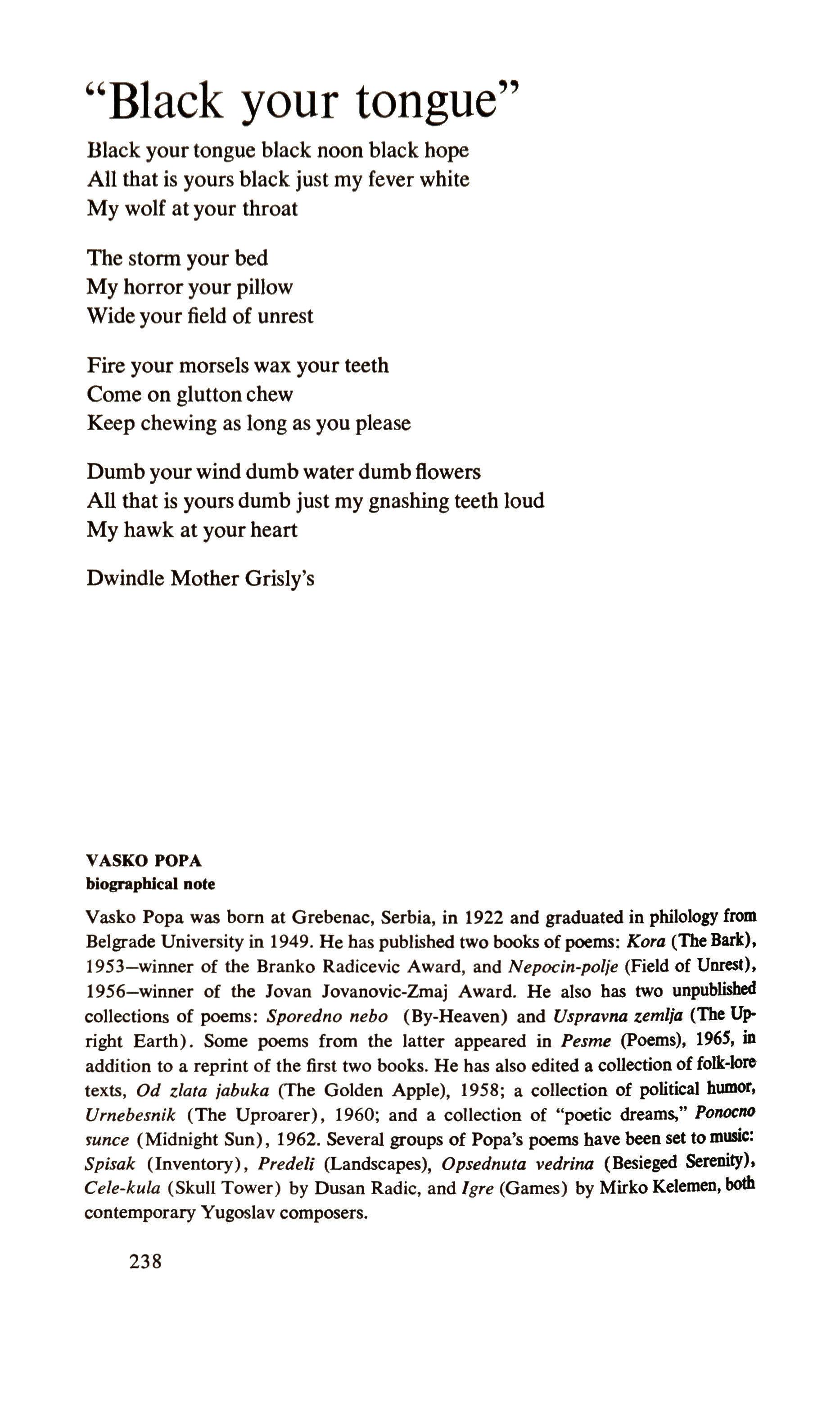
VASKO POPA
biographical Dote
Vasko Popa was born at Grebenac, Serbia, in 1922 and graduated in philology from Belgrade University in 1949. He has published two books of poems: Kora (The Bark), 1953-winner of the Branko Radicevic Award, and Nepocin-polie (Field of Unrest), 1956-winner of the Jovan Jovanovic-Zmaj Award. He also has two unpublished collections of poems: Sporedno nebo (By-Heaven) and Uspravna zemlja (The Upright Earth). Some poems from the latter appeared in Pesme (poems), 1965, in addition to a reprint of the first two books. He has also edited a collection of folk-lore texts, Od zlata jabuka (The Golden Apple), 1958; a collection of political humor, Urnebesnik (The Uproarer), 1960; and a collection of "poetic dreams," Ponocno sunce (Midnight Sun), 1962. Several groups of Popa's poems have been set to music: Spisak (Inventory), Predeli (Landscapes), Opsednuta vedrina (Besieged Serenity), Cele-kula (Skull Tower) by Dusan Radic, and Igre (Games) by Mirko Kelemen, both contemporary Yugoslav composers.
238
"

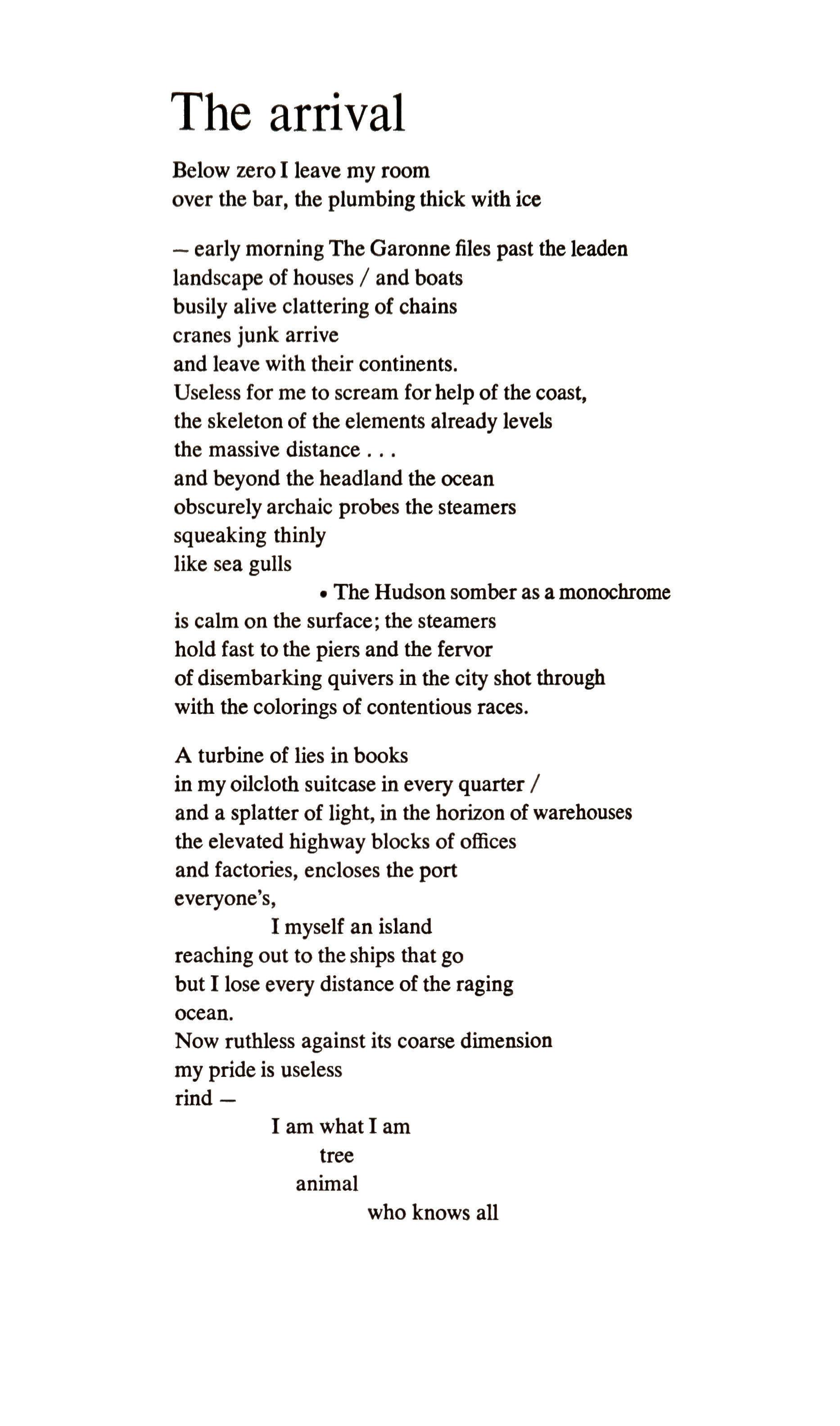
Below zero I leave my room over the bar, the plumbing thick with ice - early morning The Garonne files past the leaden landscape of houses / and boats busily alive clattering of chains cranes junk arrive and leave with their continents. Useless for me to scream for help of the coast, the skeleton of the elements already levels the massive distance and beyond the headland the ocean obscurely archaic probes the steamers squeaking thinly like sea gulls
The Hudson somber as a monochrome is calm on the surface; the steamers hold fast to the piers and the fervor of disembarking quivers in the city shot through with the colorings of contentious races.
A turbine of lies in books in my oilcloth suitcase in every quarter / and a splatter of light, in the horizon of warehouses the elevated highway blocks of offices and factories, encloses the port everyone's,
I myself an island reaching out to the ships that go but I lose every distance of the raging ocean.
Now ruthless against its coarse dimension my pride is useless rind -
I am what I aIn tree animal who knows all
•
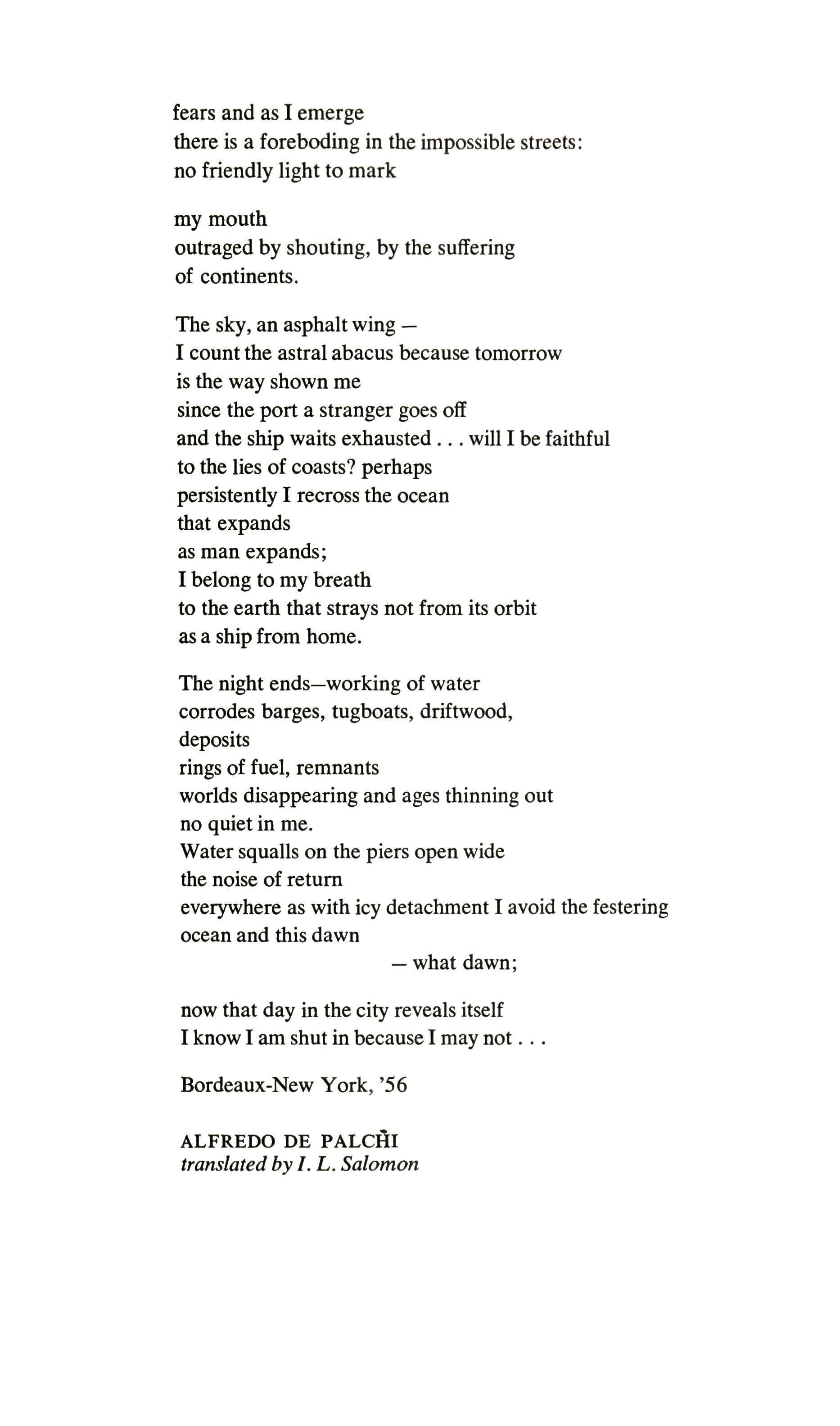
fears and as I emerge there is a foreboding in the impossible streets: no friendly light to mark my mouth outraged by shouting, by the suffering of continents.
The sky, an asphaltwingI count the astral abacus because tomorrow is the way shown me since the port a stranger goes off and the ship waits exhausted will I be faithful to the lies of coasts? perhaps persistently I recross the ocean that expands as man expands; I belong to my breath to the earth that strays not from its orbit as a ship from home.
The night ends working of water corrodes barges, tugboats, driftwood, deposits rings of fuel, remnants worlds disappearing and ages thinning out no quiet in me.
Water squalls on the piers open wide the noise of return everywhere as with icy detachment I avoid the festering ocean and this dawn -what dawn; now that day in the city reveals itself I know I aln shut in because I may not Bordeaux-New York, '56
ALFREDO DE PALCHI
translated by I. L. Salomon
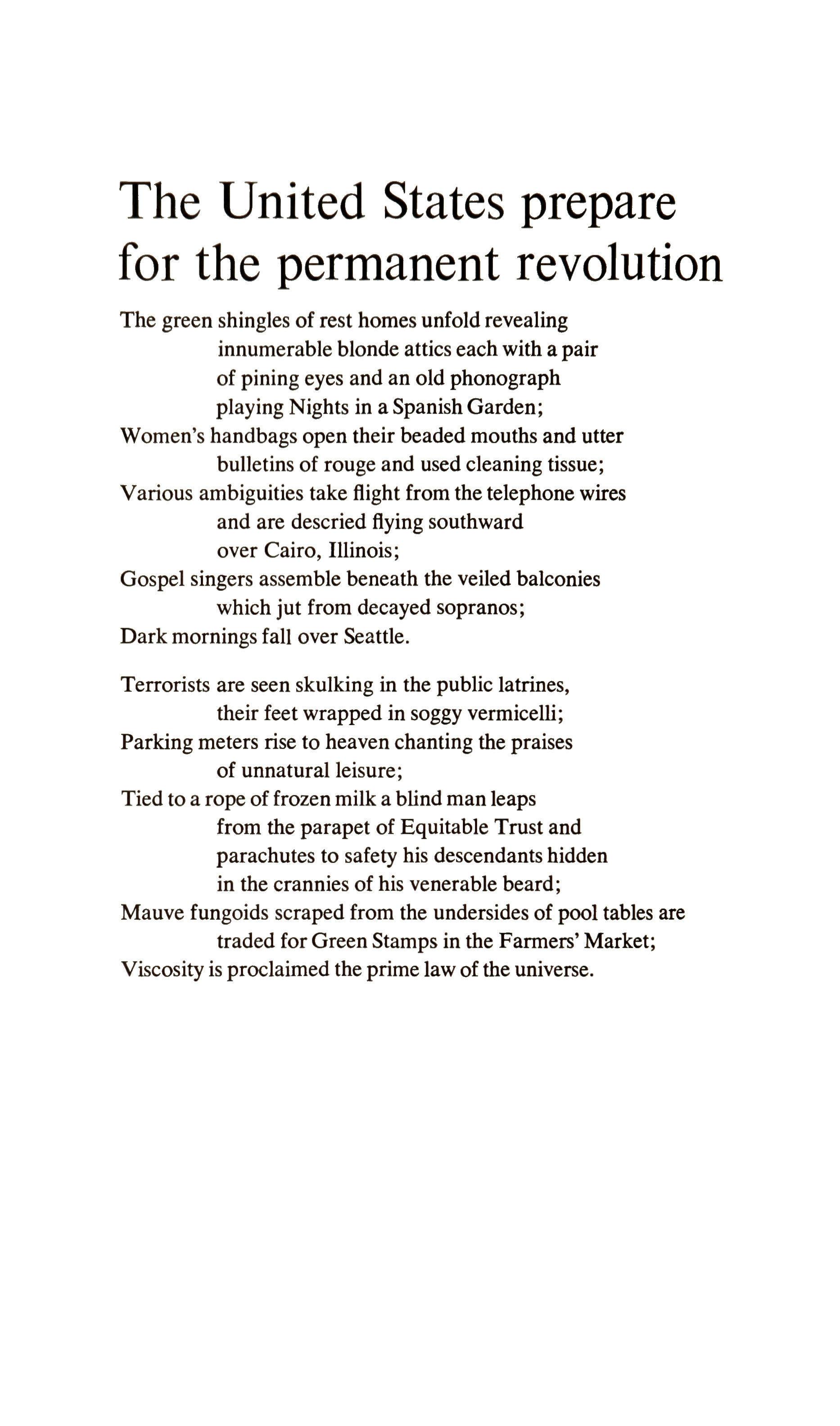
The green shingles of rest homes unfold revealing innumerable blonde attics each with a pair of pining eyes and an old phonograph playing Nights in a Spanish Garden; Women's handbags open their beaded mouths and utter bulletins of rouge and used cleaning tissue; Various ambiguities take flight from the telephone wires and are descried flying southward over Cairo, Illinois; Gospel singers assemble beneath the veiled balconies which jut from decayed sopranos; Dark mornings fall over Seattle.
Terrorists are seen skulking in the public latrines, their feet wrapped in soggy vermicelli; Parking meters rise to heaven chanting the praises of unnatural leisure;
Tied to a rope of frozen milk a blind man leaps from the parapet of Equitable Trust and parachutes to safety his descendants hidden in the crannies of his venerable beard; Mauve fungoids scraped from the undersides of pool tables are traded for Green Stamps in the Farmers' Market; Viscosity is proclaimed the prime law of the universe.

Lighted cigars fall like meteors on a deserted football field in Pierre, South Dakota their entrails are officially examined for signs of cancer; Canvas doorways open in the sails of fishing smacks and emit a sour wind; Groves of carefully marcelled kelp sprout from the armpits of the Statue of Liberty; Flaming poems are inscribed on the groins of mysterious black women in straw capes whose thighs smell of creosote; A puma is discovered cowering on the shelves of a suburban lendinglibrary in the floodlights his tears turn to opals.
A railway flare burns in the bowels of a cuttlefish trapped at Sarasota, Florida; Cases of pomade opened at Nogales for inspection are found to contain smoked ice; A pair of Anglo-Saxon hips is placed on display at the Museum of Modern Art.
Dry boards lie at the edge of the road: Centipedes enter their knotty throats.
What is the recommendation?
Deliberate excision of proud flesh.
A woman stops me in the corridor. Her tongue has been replaced by a single mute camellia.
GEORGE HITCHCOCK
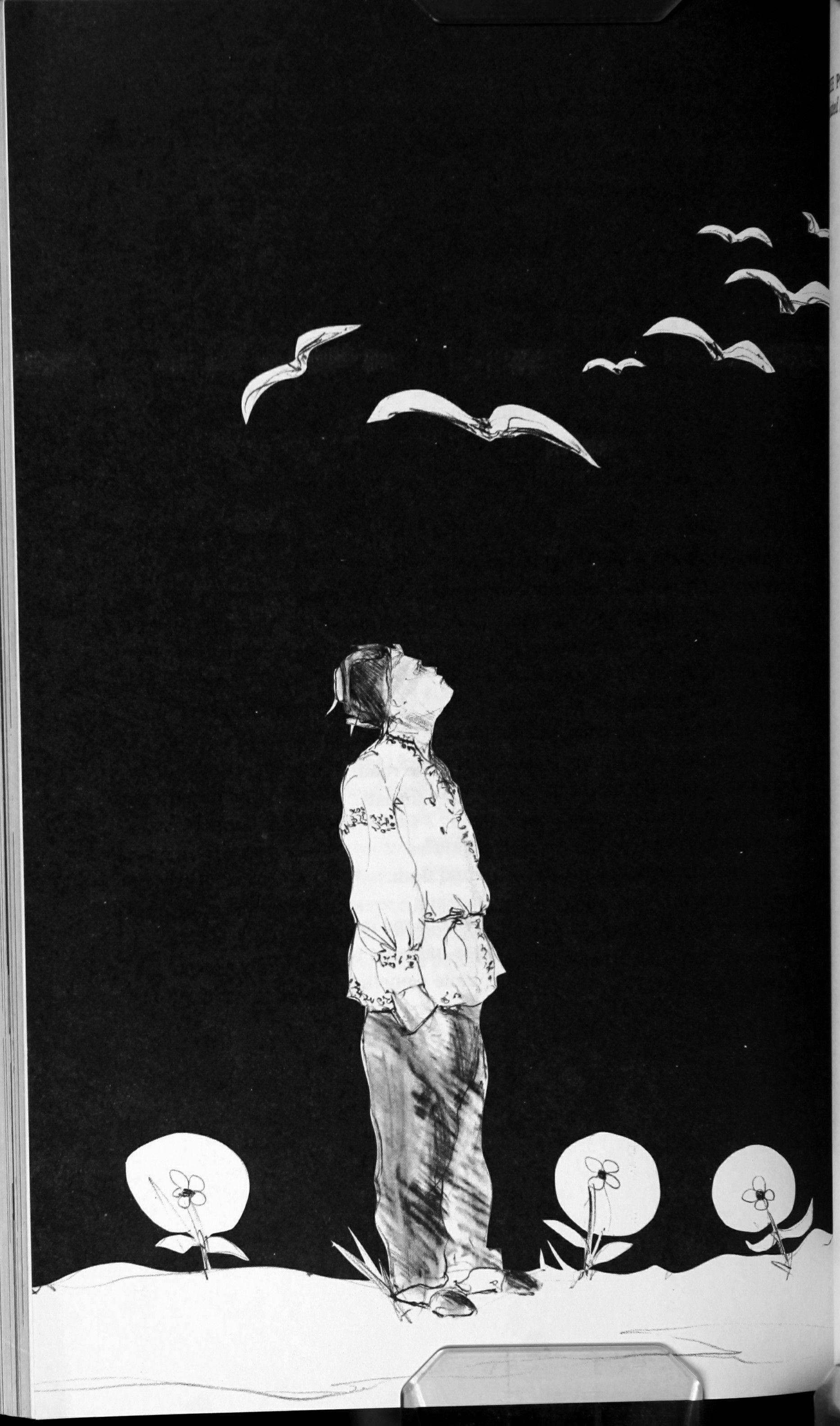
J \ I I-,...t- ---_ --:;.;;.-_'"_""'", .", OJ'' -
tHREE POEMS BY ANNA AKHMATOVA
IJtlllSlatedby Edna Gene Lippman
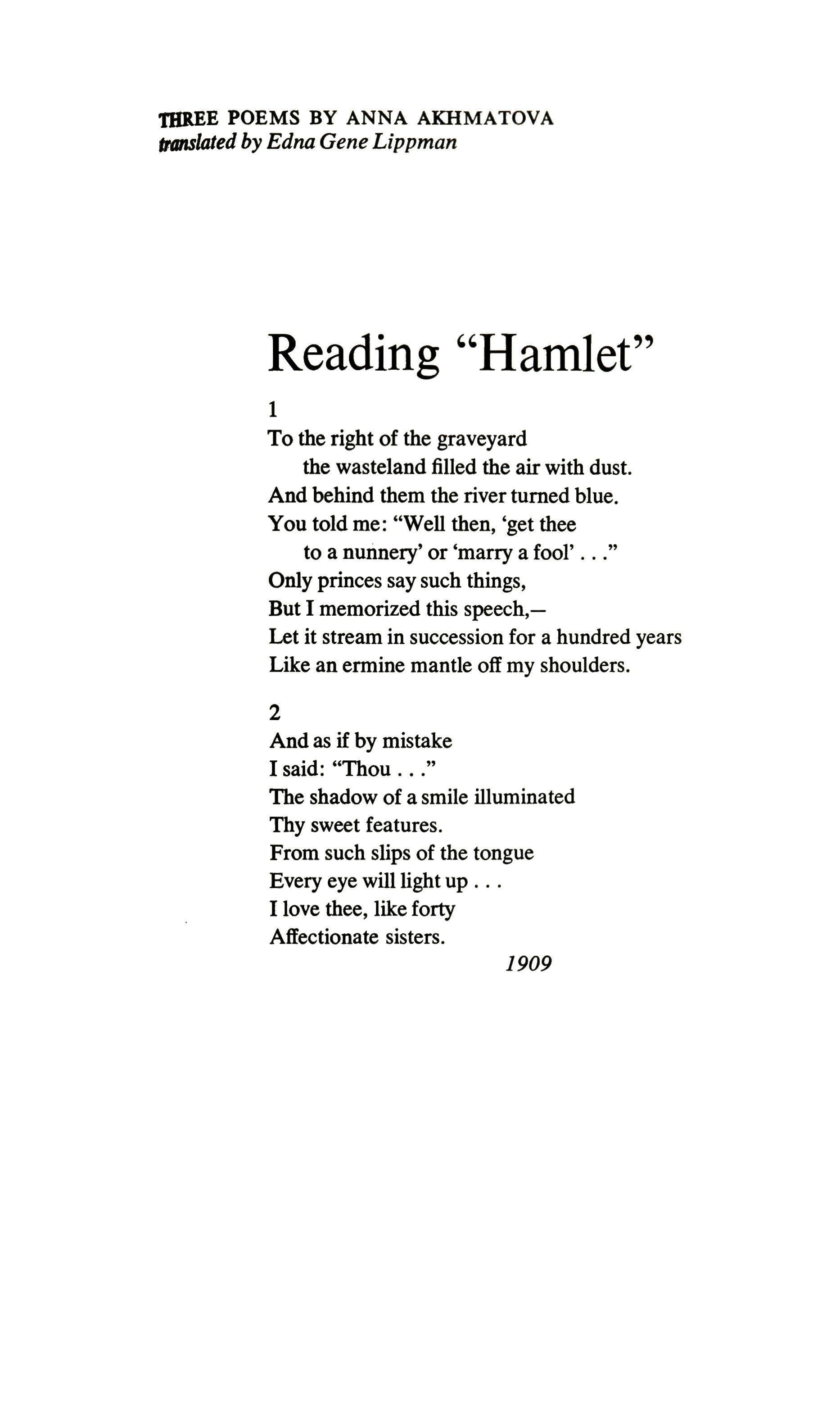
In
1
To the right of the graveyard the wasteland filled the air with dust. And behind them the river turned blue. You told me: "Well then, 'get thee to a nunnery' or 'marry a fool' Only princes say such things, But I memorized this speech,Let it stream in succession for a hundred years Like an ermine mantle off my shoulders.
2
And as if by mistake I said: "Thou The shadow of a smile illuminated Thy sweet features. From such slips of the tongue Every eye will light up I love thee, like forty Affectionate sisters.
1909
"
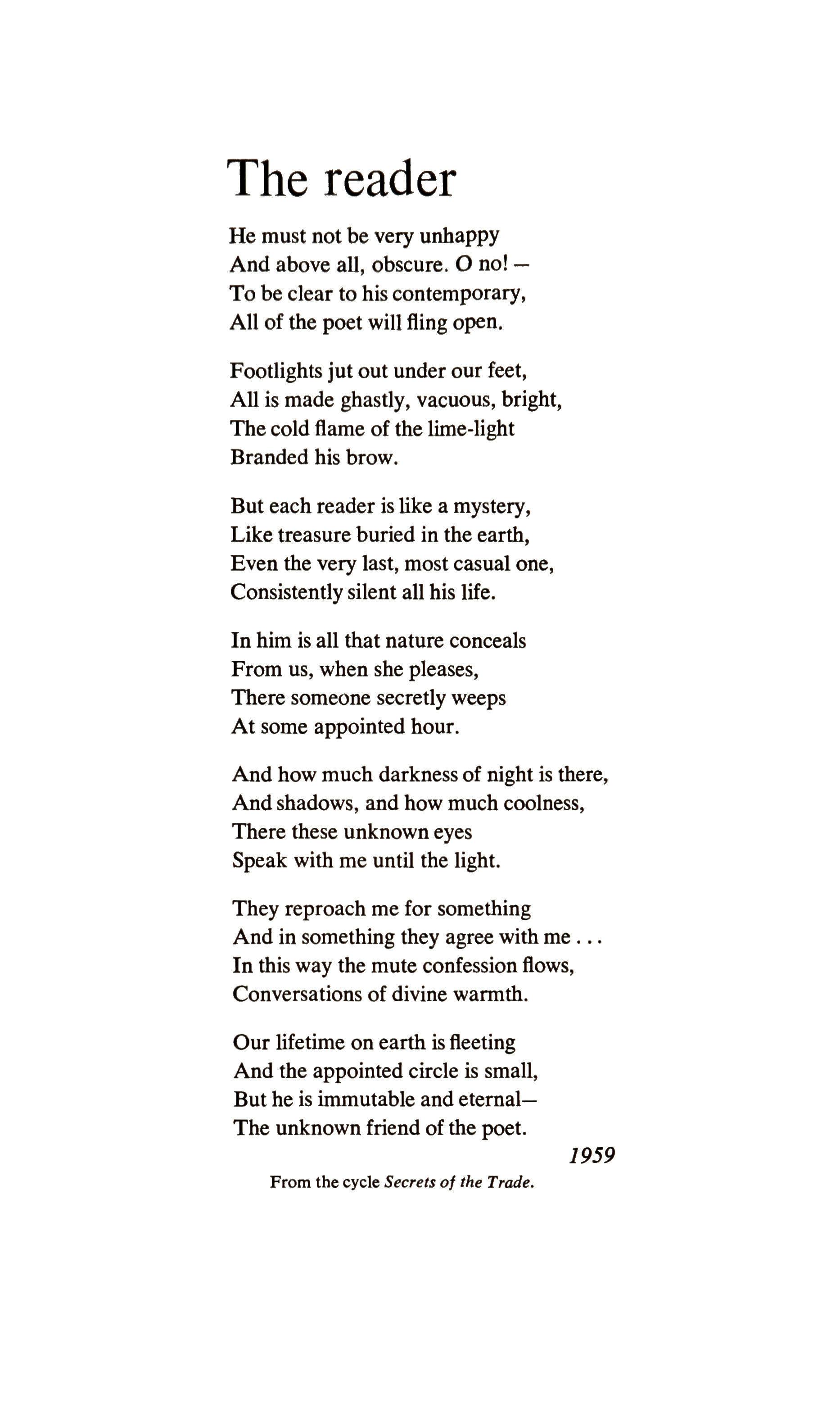
He must not be very unhappy And above all, obscure. 0 no!
To be clear to his contemporary, All of the poet will fling open.
Footlights jut out under our feet, All is made ghastly, vacuous, bright, The cold flame of the lime-light Branded his brow.
But each reader is like a mystery, Like treasure buried in the earth, Even the very last, most casual one, Consistently silent all his life.
In him is all that nature conceals From us, when she pleases, There someone secretly weeps At some appointed hour.
And how much darkness of night is there, And shadows, and how much coolness, There these unknown eyes Speak with me until the light.
They reproach me for something And in something they agree with me In this way the mute confession flows, Conversations of divine warmth.
Our lifetime on earth is fleeting And the appointed circle is small, But he is immutable and eternalThe unknown friend of the poet. 1959
From the cycle Secrets of the Trade.
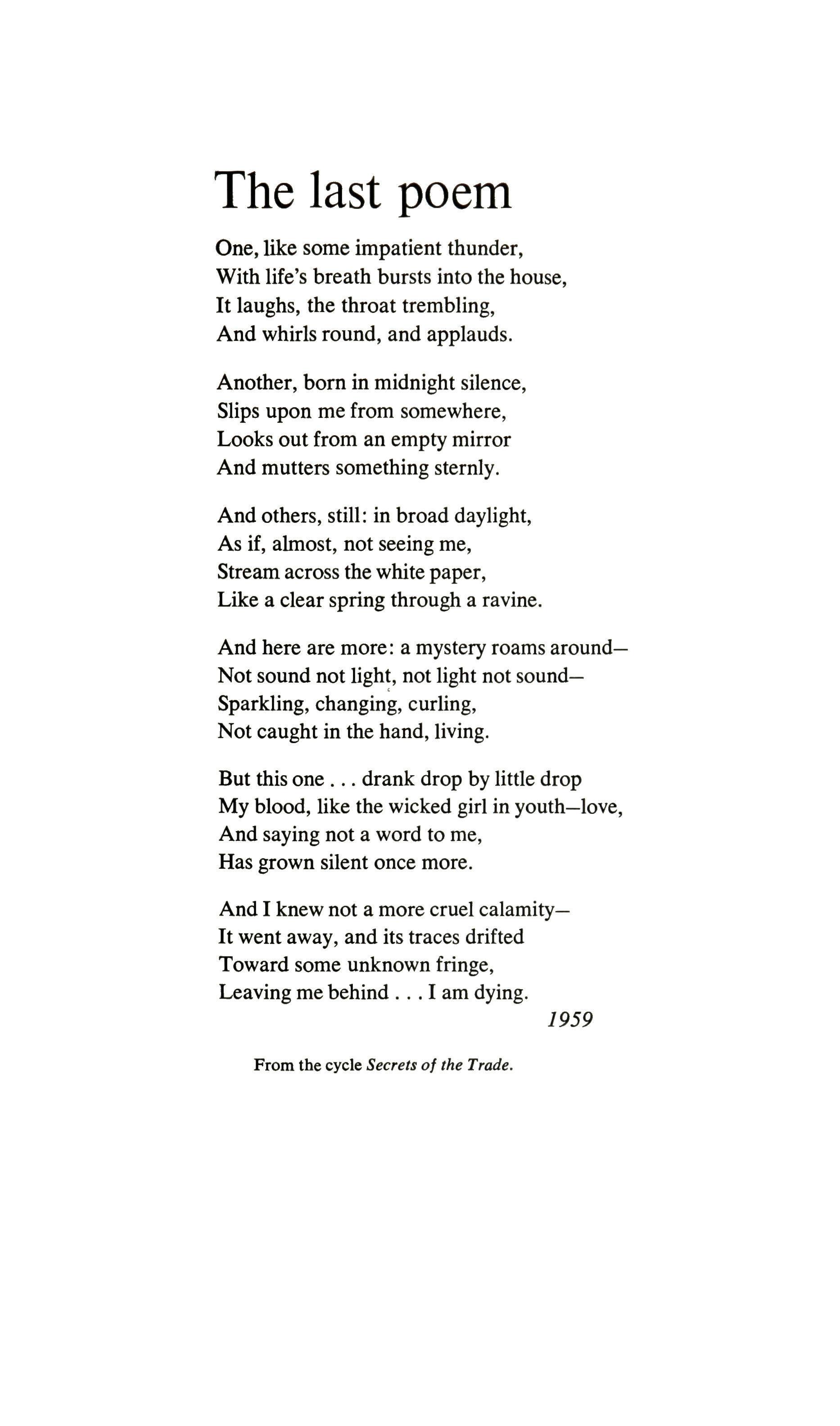
e as
One, like some impatient thunder, With life's breath bursts into the house, It laughs, the throat trembling, And whirls round, and applauds.
Another, born in midnight silence, Slips upon me from somewhere, Looks out from an empty mirror And mutters something sternly.
And others, still: in broad daylight, As if, almost, not seeing me, Stream across the white paper, Like a clear spring through a ravine.
And here are more: a mystery roams aroundNot sound not light, not light not soundSparkling, changing, curling, Not caught in the hand, living.
But this one drank drop by little drop My blood, like the wicked girl in youth love, And saying not a word to me, Has grown silent once more.
And I knew not a more cruel calamityIt went away, and its traces drifted Toward some unknown fringe, Leaving me behind I am dying. 1959
From the cycle Secrets of the Trade.
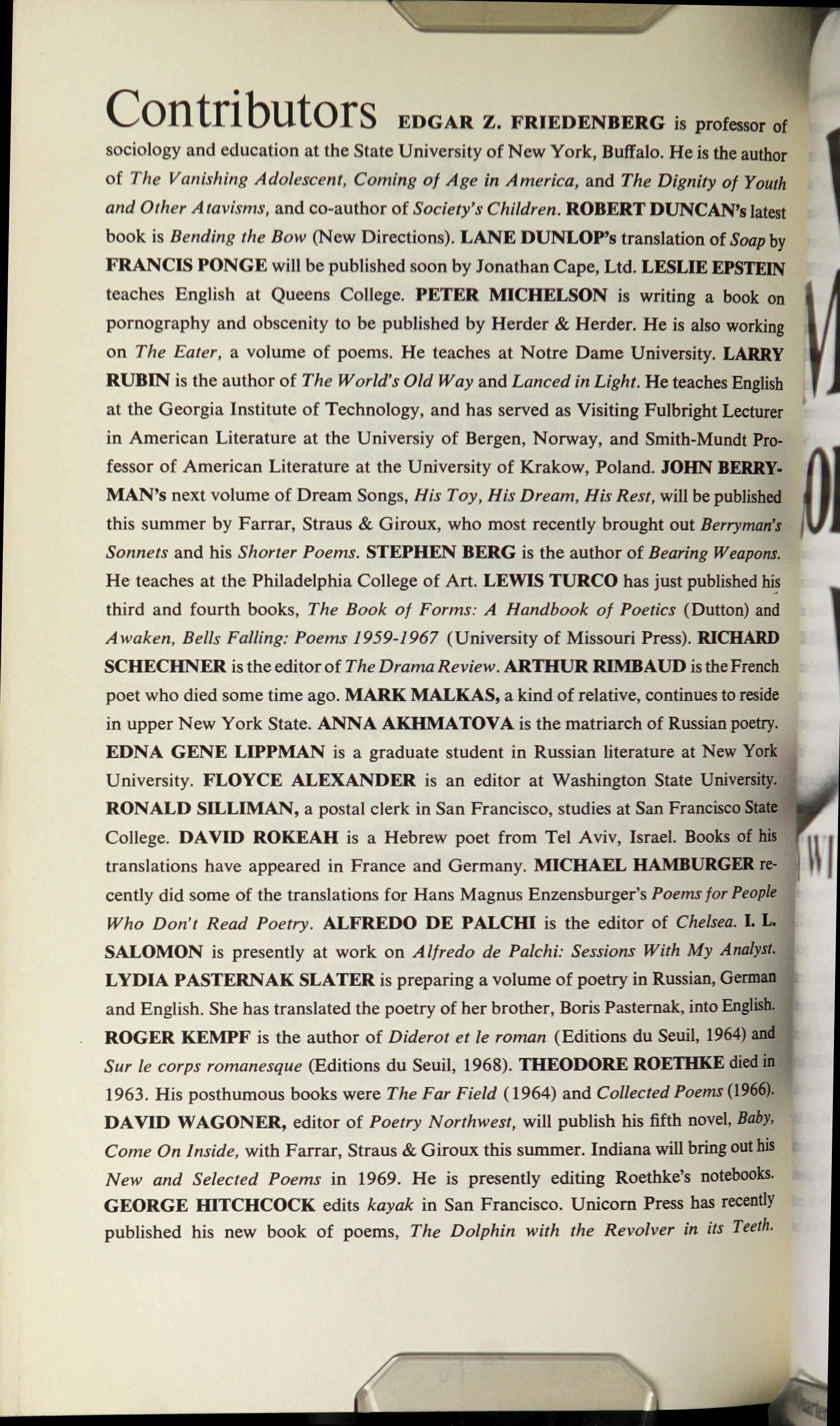
EDGAR Z. FRIEDENBERG is professor of sociology and education at the State University of New York, Buffalo. He is the author of The Vanishing Adolescent, Coming of Age in America, and The Dignity of Youth and Other A tavisms, and co-author of Society's Children. ROBERT DUNCAN's latest book is Bending the Bow (New Directions). LANE DUNLOP's translation of Soap by FRANCIS PONGE will be published soon by Jonathan Cape, Ltd. LESLIE EPSTEIN teaches English at Queens College. PETER MICHELSON is writing a book on pornography and obscenity to be published by Herder & Herder. He is also working on The Eater, a volume of poems. He teaches at Notre Dame University. LARRY RUBIN is the author of The World's Old Way and Lanced in Light. He teaches English at the Georgia Institute of Technology, and has served as Visiting Fulbright Lecturer in American Literature at the Universiy of Bergen, Norway, and Smith-Mundt Professor of American Literature at the University of Krakow, Poland. JOHN BERRY. MAN's next volume of Dream Songs, His Toy, His Dream, His Rest, will be published this summer by Farrar, Straus & Giroux, who most recently brought out Berryman's Sonnets and his Shorter Poems. STEPHEN BERG is the author of Bearing Weapons. He teaches at the Philadelphia College of Art. LEWIS TURCO has just published histhird and fourth books, The Book of Forms: A Handbook of Poetics (Dutton) and Awaken, Bells Falling: Poems 1959-1967 (University of Missouri Press). RICHARD SCHECHNER is the editor of The Drama Review. AR RIMBAUD is the French poet who died some time ago. MARK MALKAS, a kind of relative, continues to reside in upper New York State. ANNA AKHMATOVA is the matriarch of Russian poetry. EDNA GENE LIPPMAN is a graduate student in Russian literature at New York University. FLOYCE ALEXANDER is an editor at Washington State University. RONALD SILLIMAN, a postal clerk in San Francisco, studies at San Francisco State College. DAVID ROKEAH is a Hebrew poet from Tel Aviv, Israel. Books of his translations have appeared in France and Germany. MICHAEL HAMBURGER recently did some of the translations for Hans Magnus Enzensburger's Poems for People Who Don't Read Poetry. ALF'REDO DE PALCHI is the editor of Chelsea. I. L. SALOMON is presently at work on Alfredo de Palchi: Sessions With My Analyst. LYDIA PASTERNAK SLATER is preparing a volume of poetry in Russian, German and English. She has translated the poetry of her brother, Boris Pasternak, into English.
ROGER KEMPF is the author of Diderot et le roman (Editions du Seuil, 1964) and Sur le corps romanesque (Editions du Seuil, 1968). 'IBI':ODORE ROE'I'HKE died in 1963. His posthumous books were The Far Field (1964) and Collected Poems (1966), DAVID WAGONER, editor of Poetry Northwest, will publish his fifth novel, Baby, Come On Inside, with Farrar, Straus & Giroux this summer. Indiana will bring out his New and Selected Poems in 1969. He is presently editing Roethke's notebooks.
GEORGE HITCHCOCK edits kayak in San Francisco. Unicorn Press has recently published his new book of poems, The Dolphin with the Revolver in its Teeth.
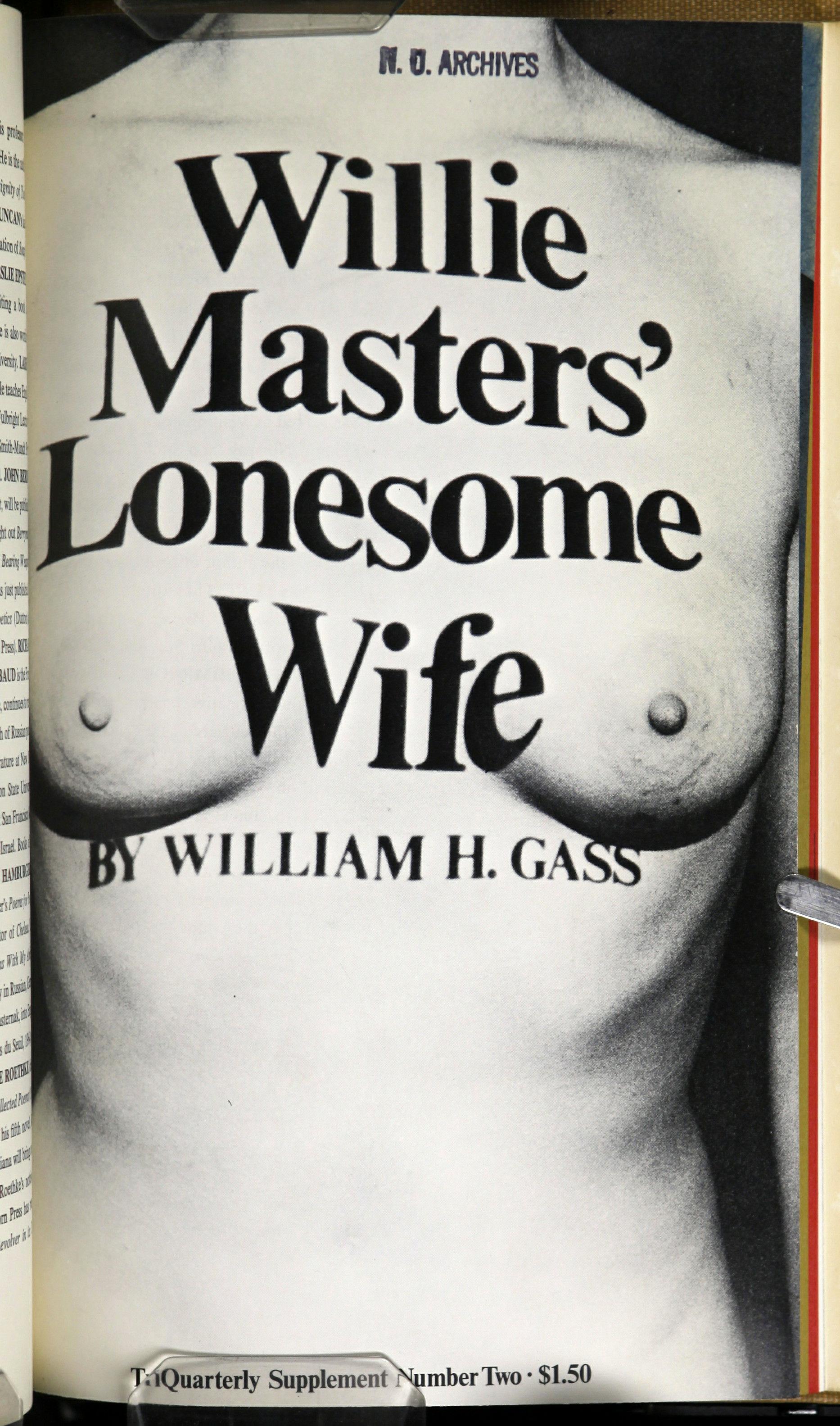
u. ailon�� � �I� tntm �, [e� ulli, 'fu,)j lO1lX1l Quarterly Supplement mberTwo' $1.50

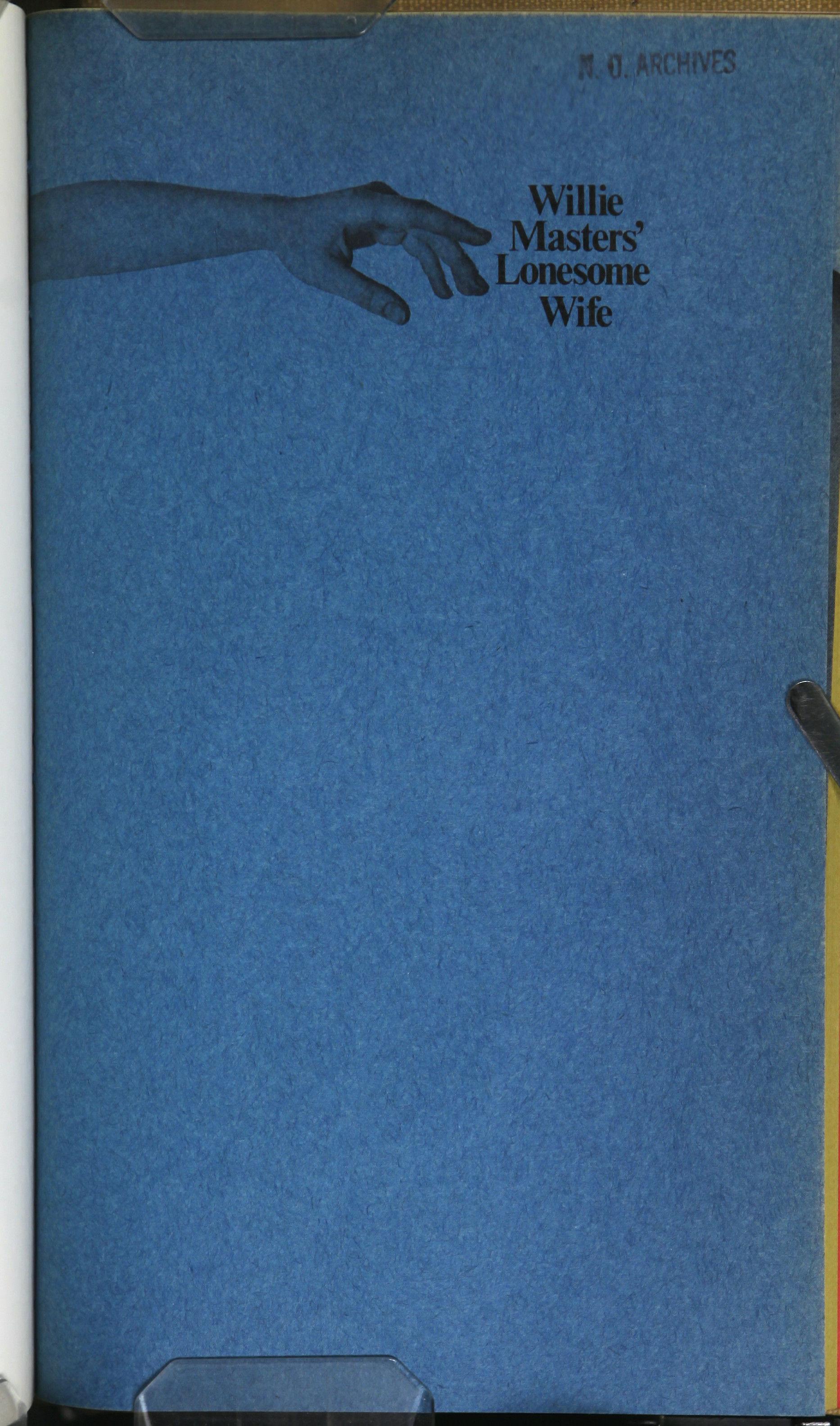
I J
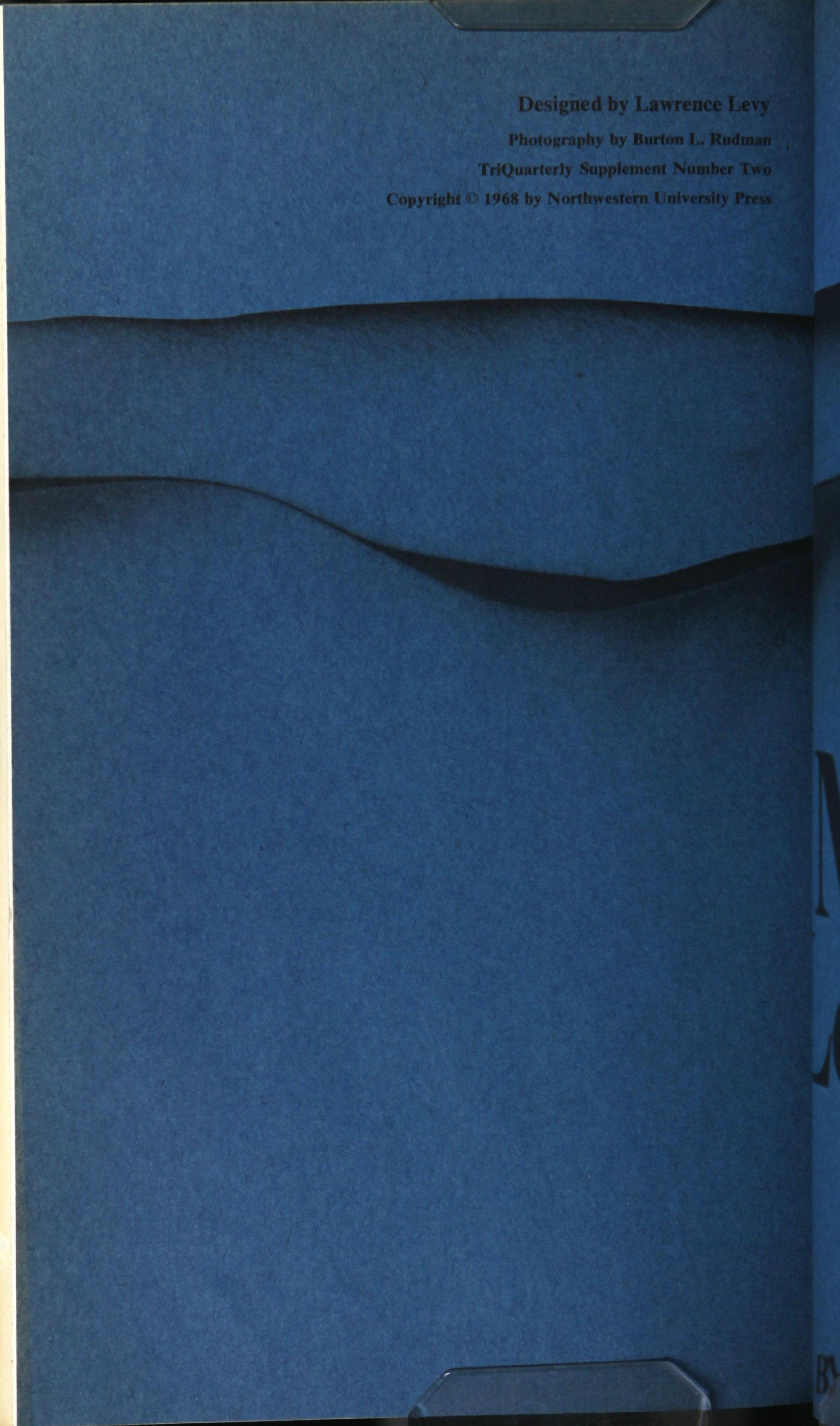
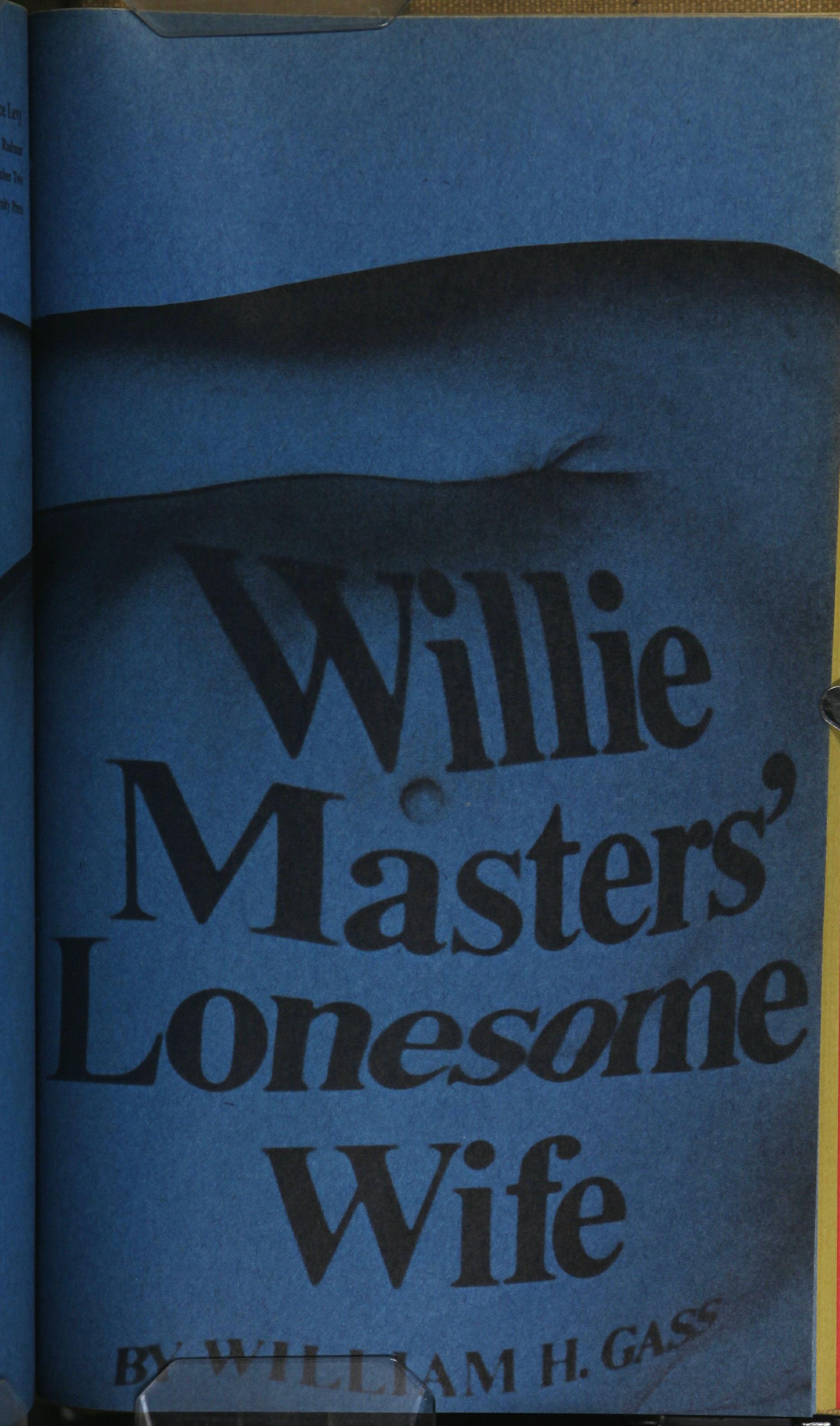
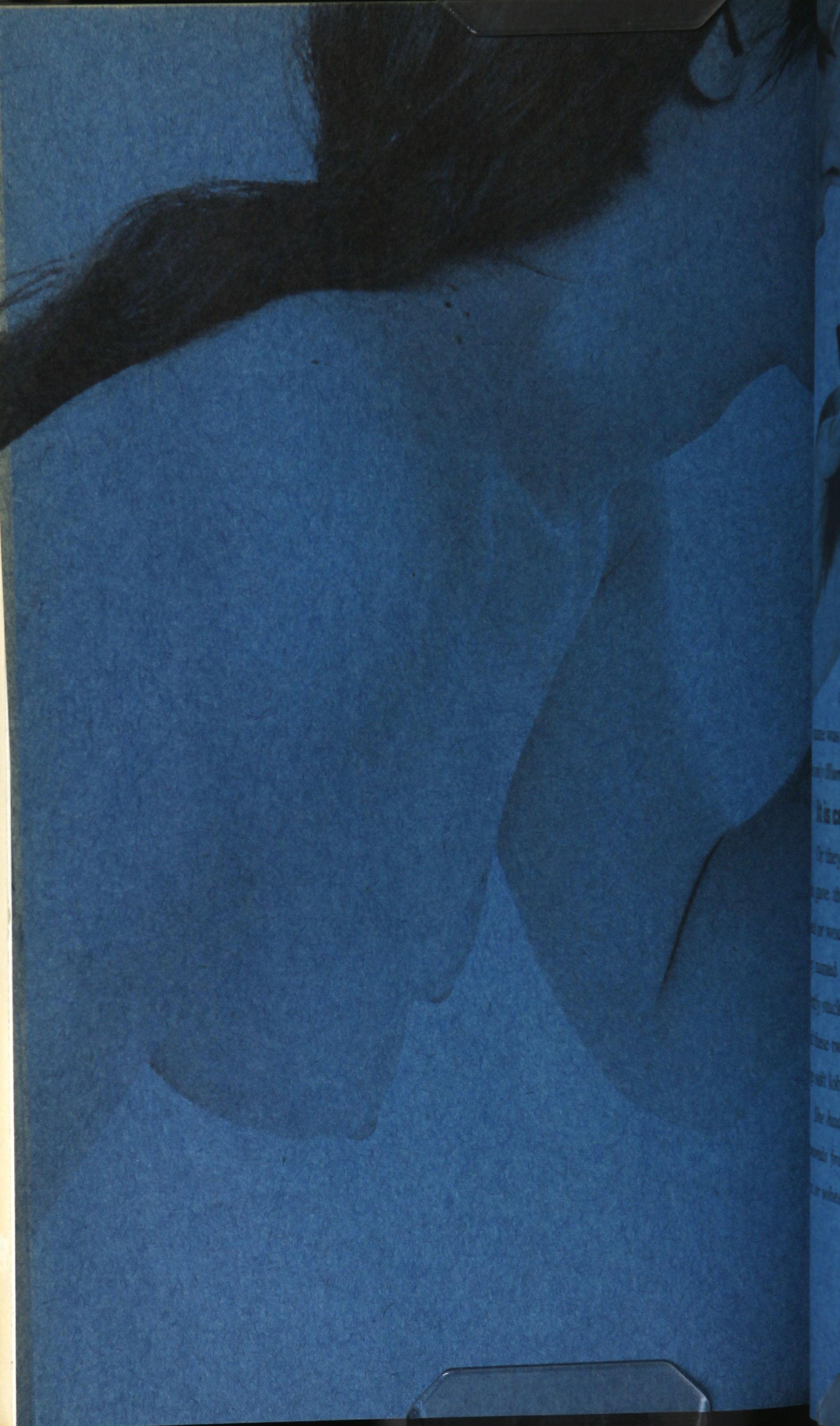
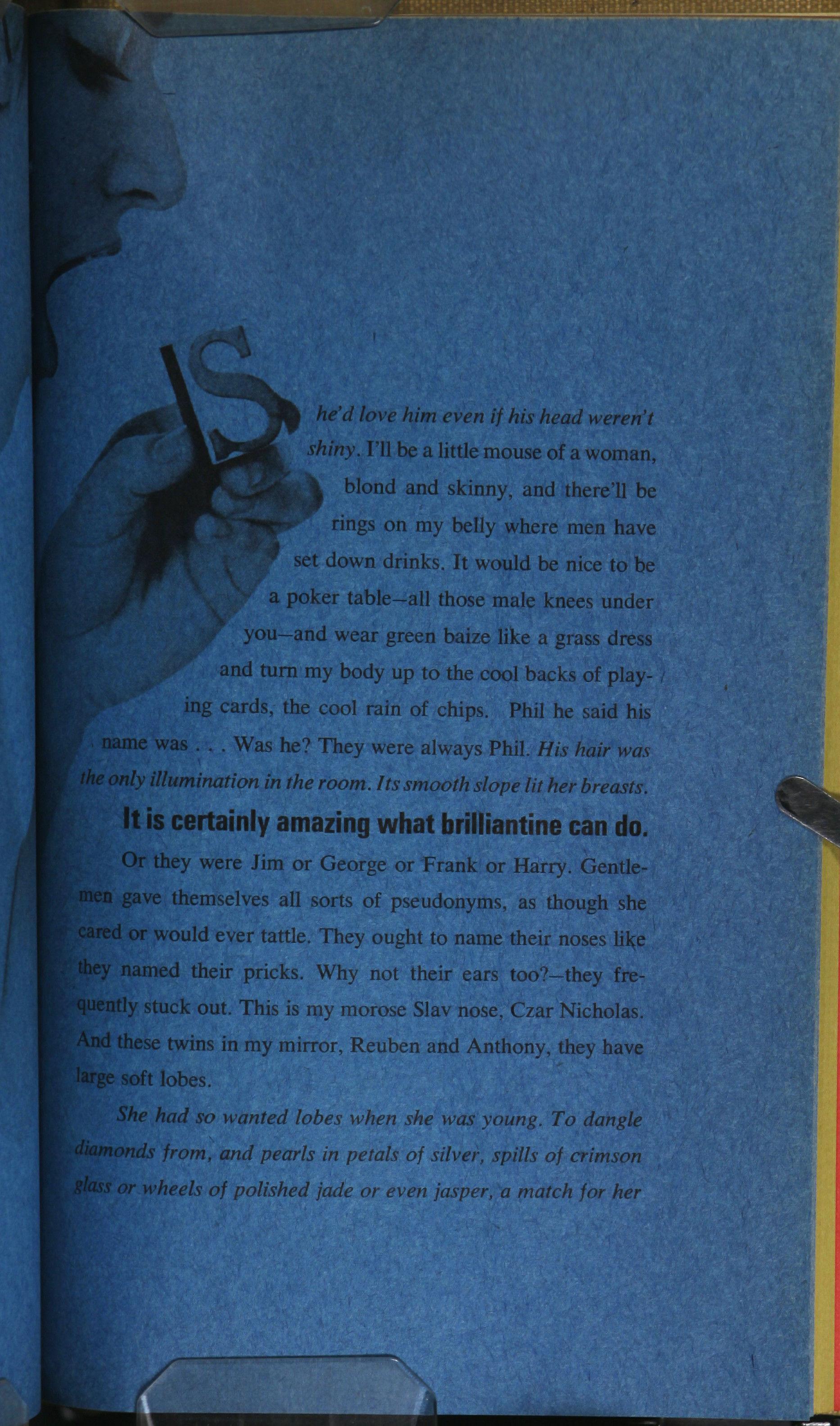

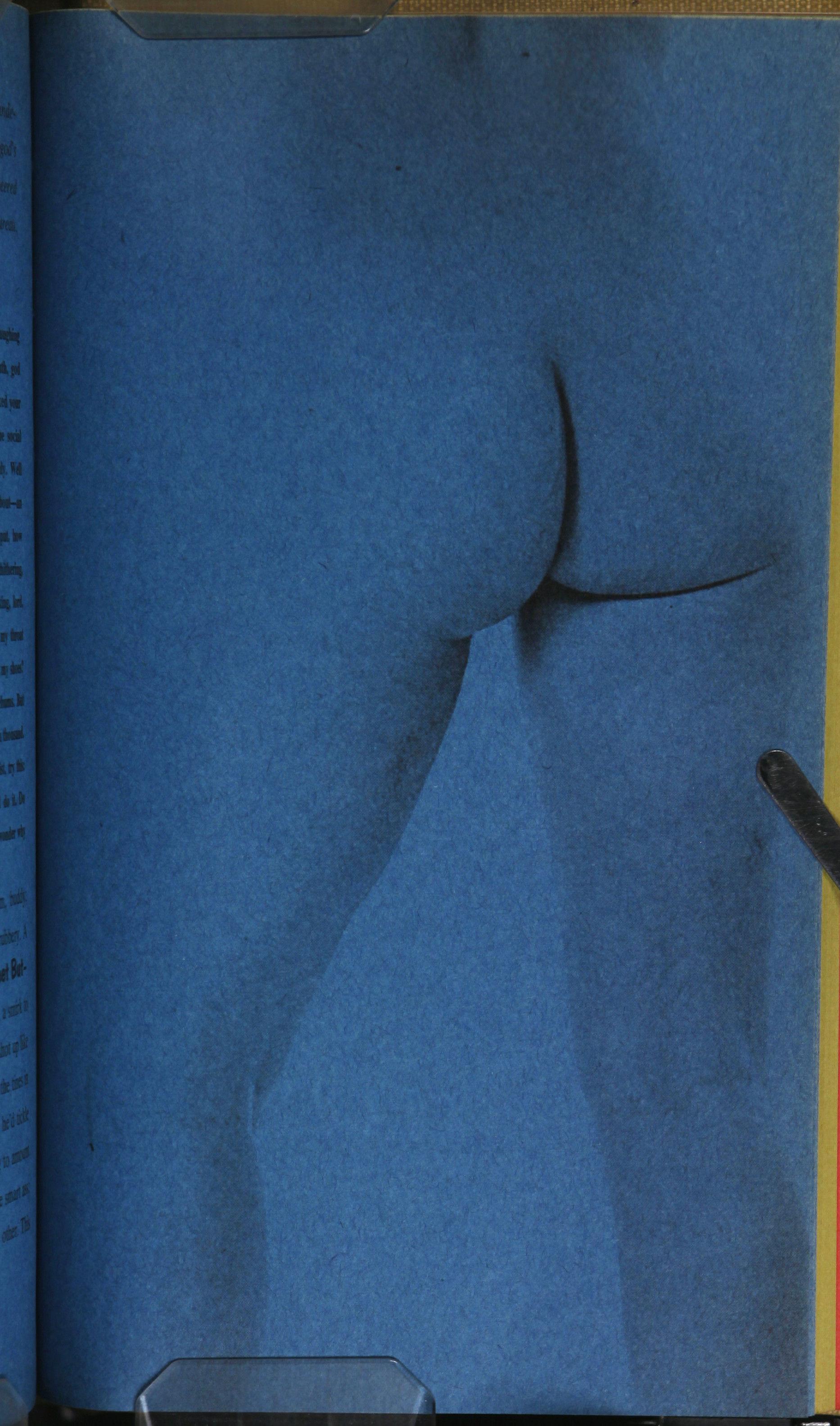
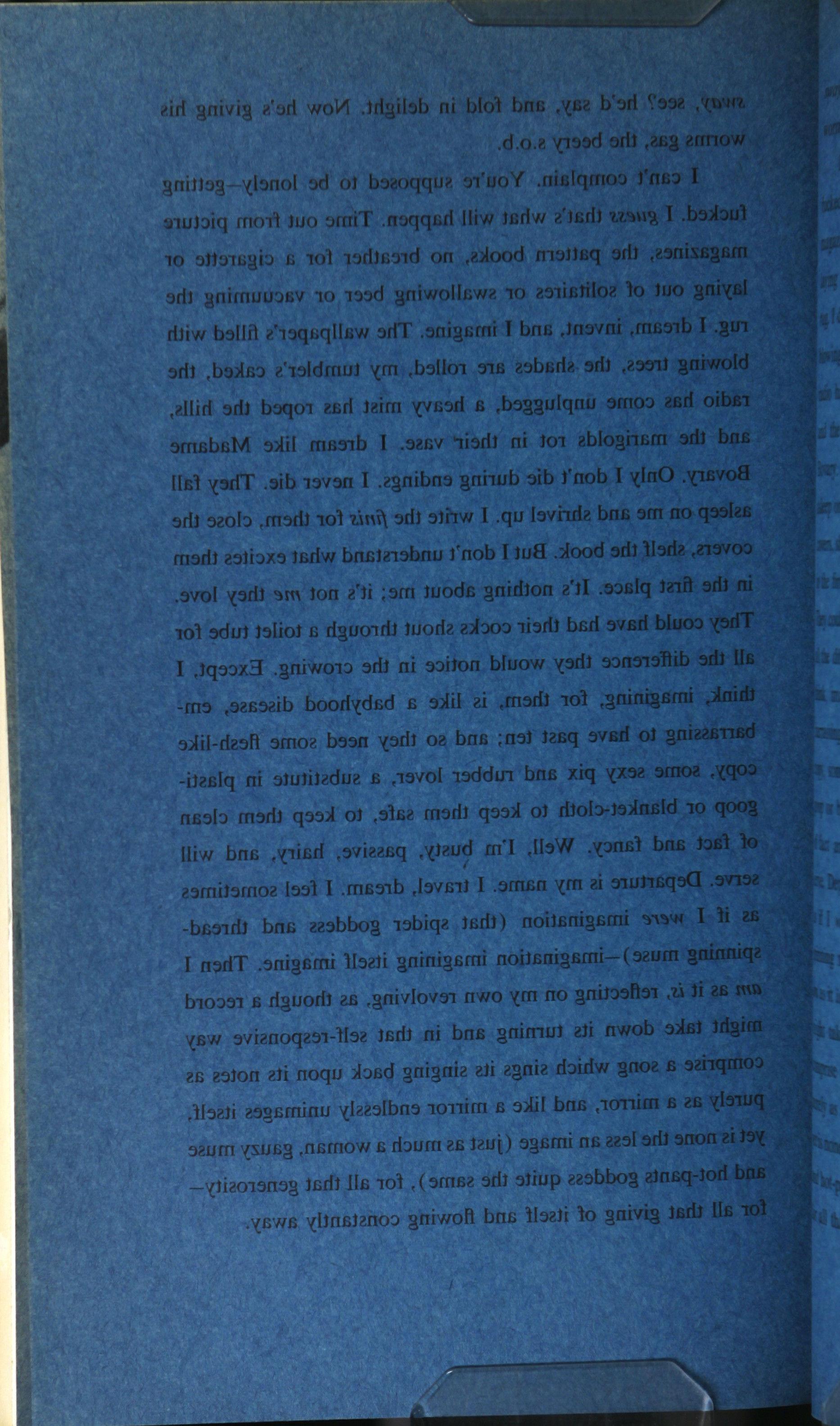
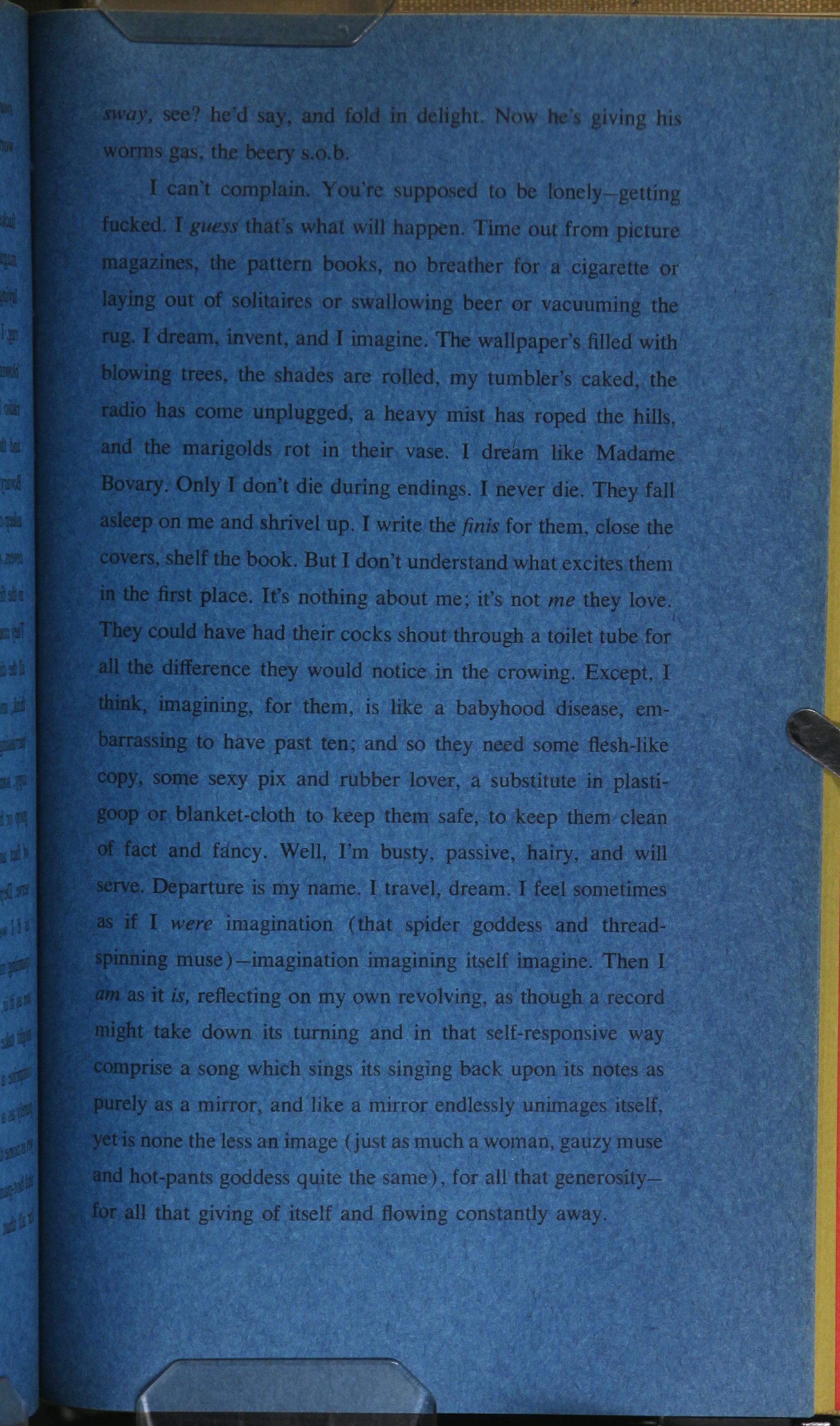
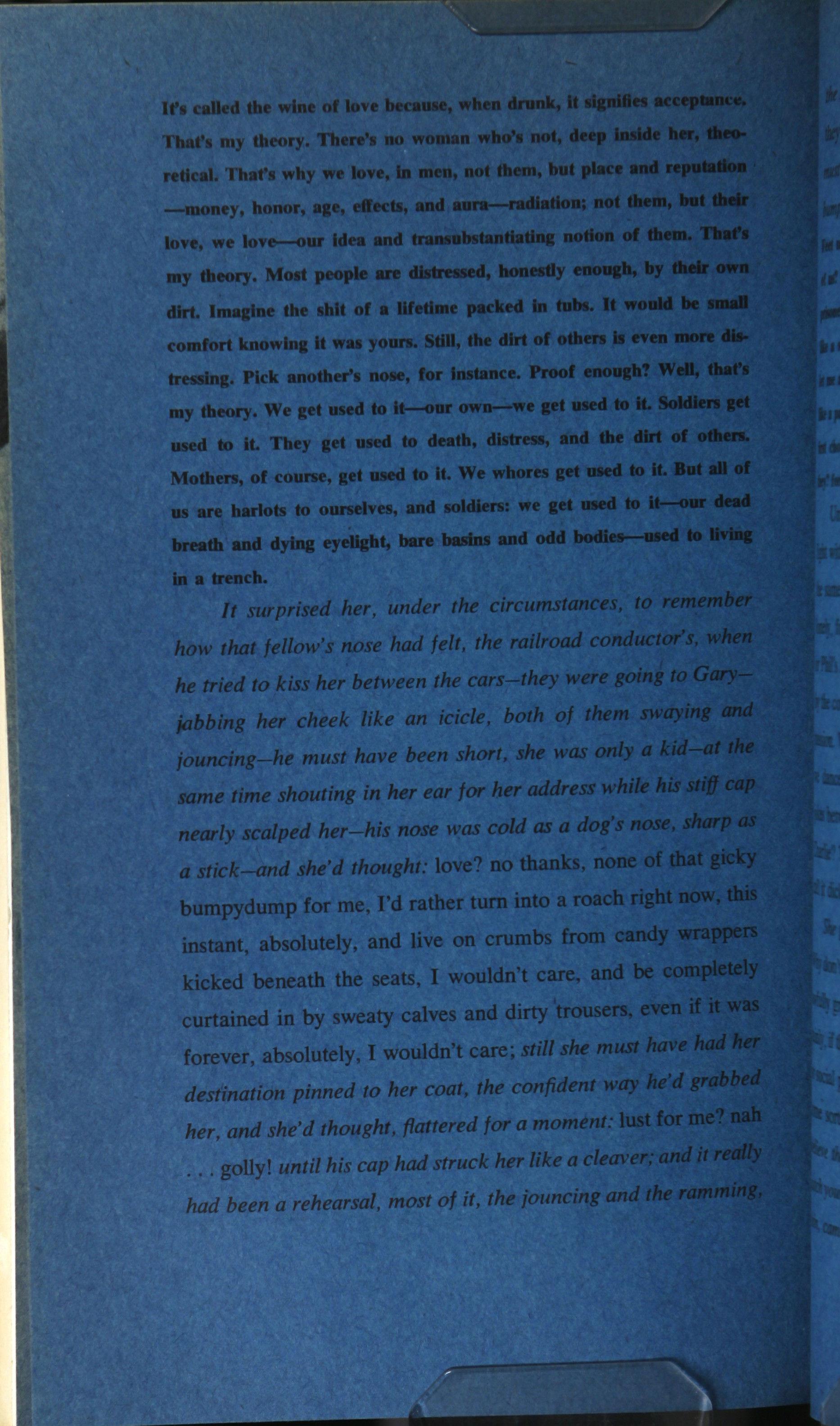
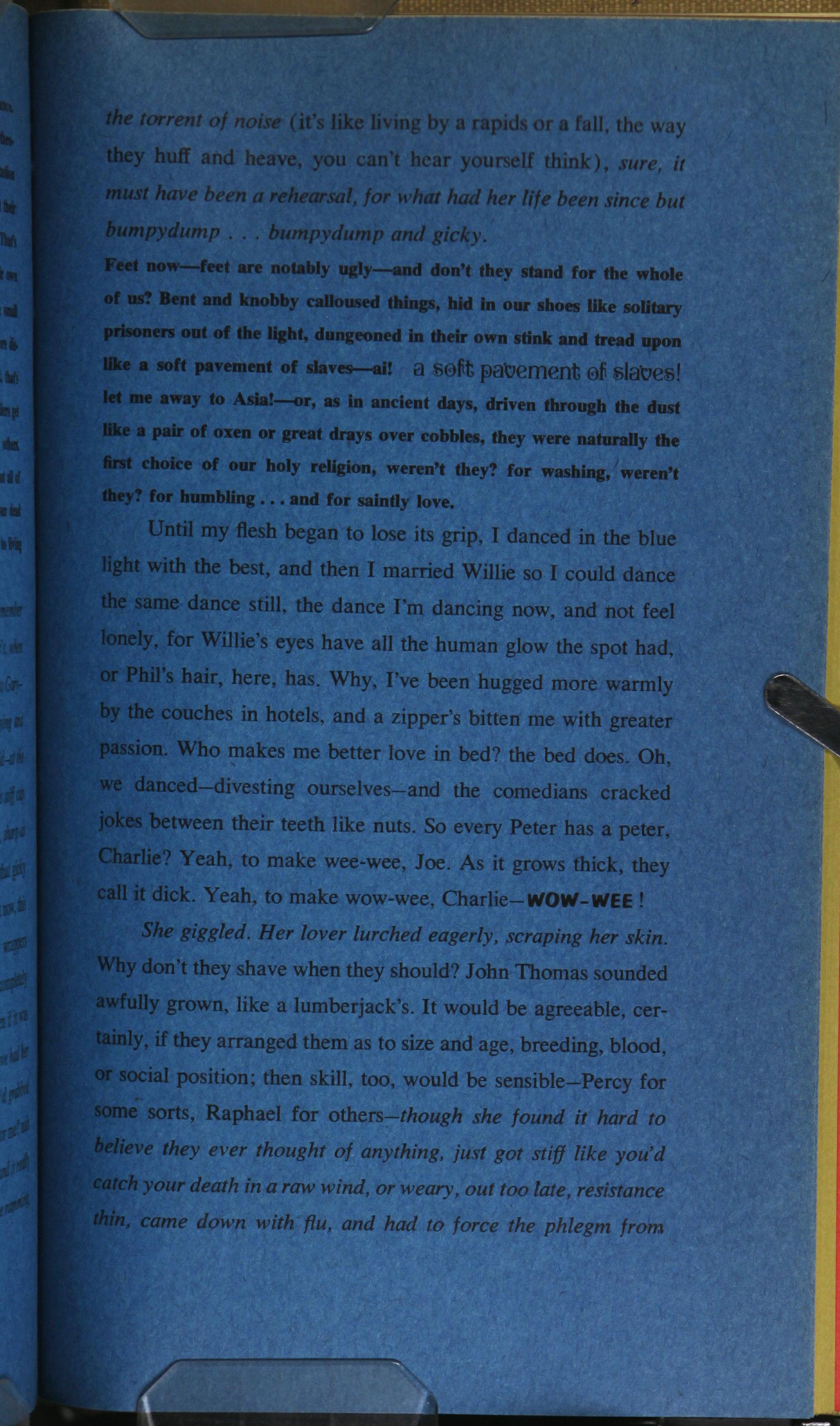
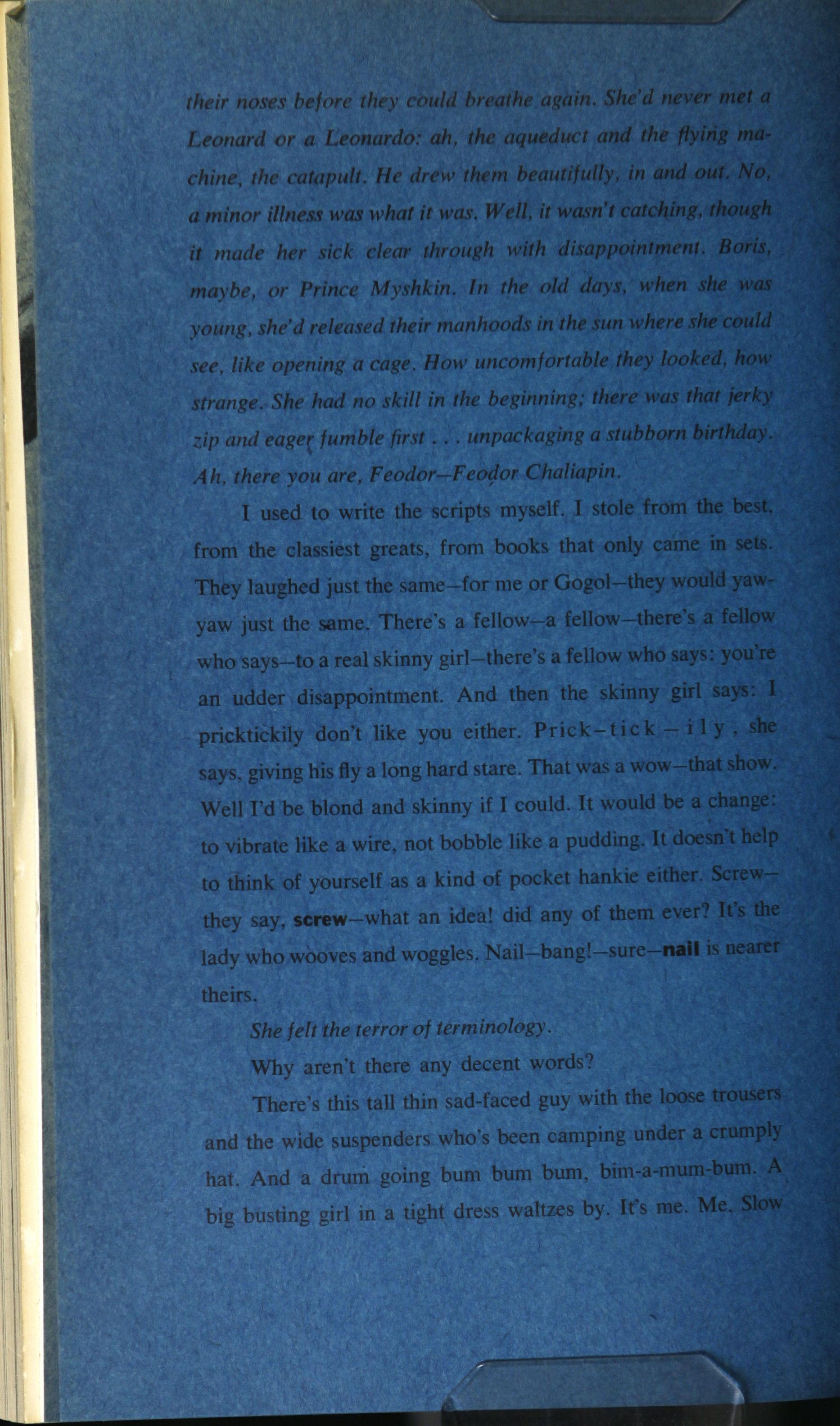
I \
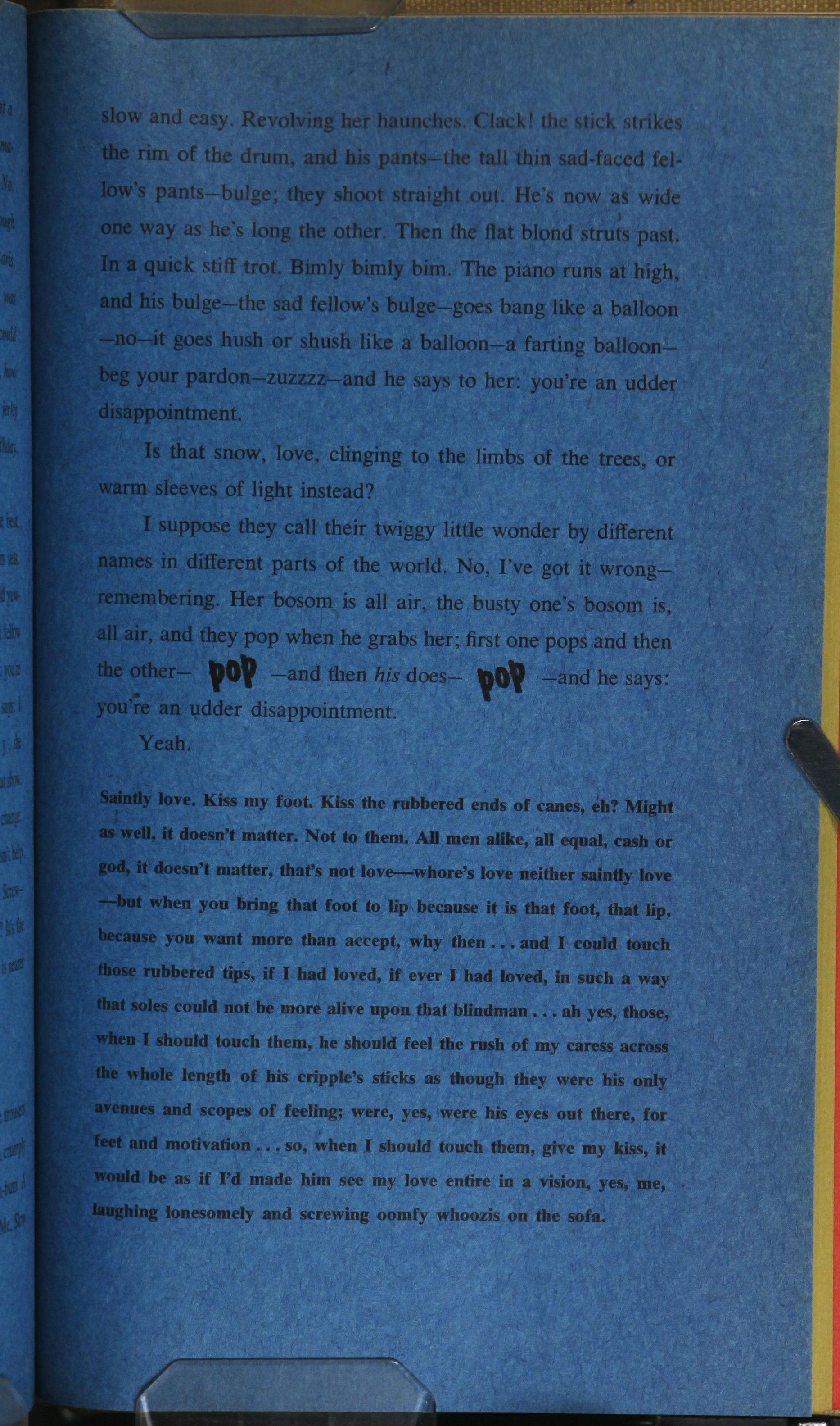
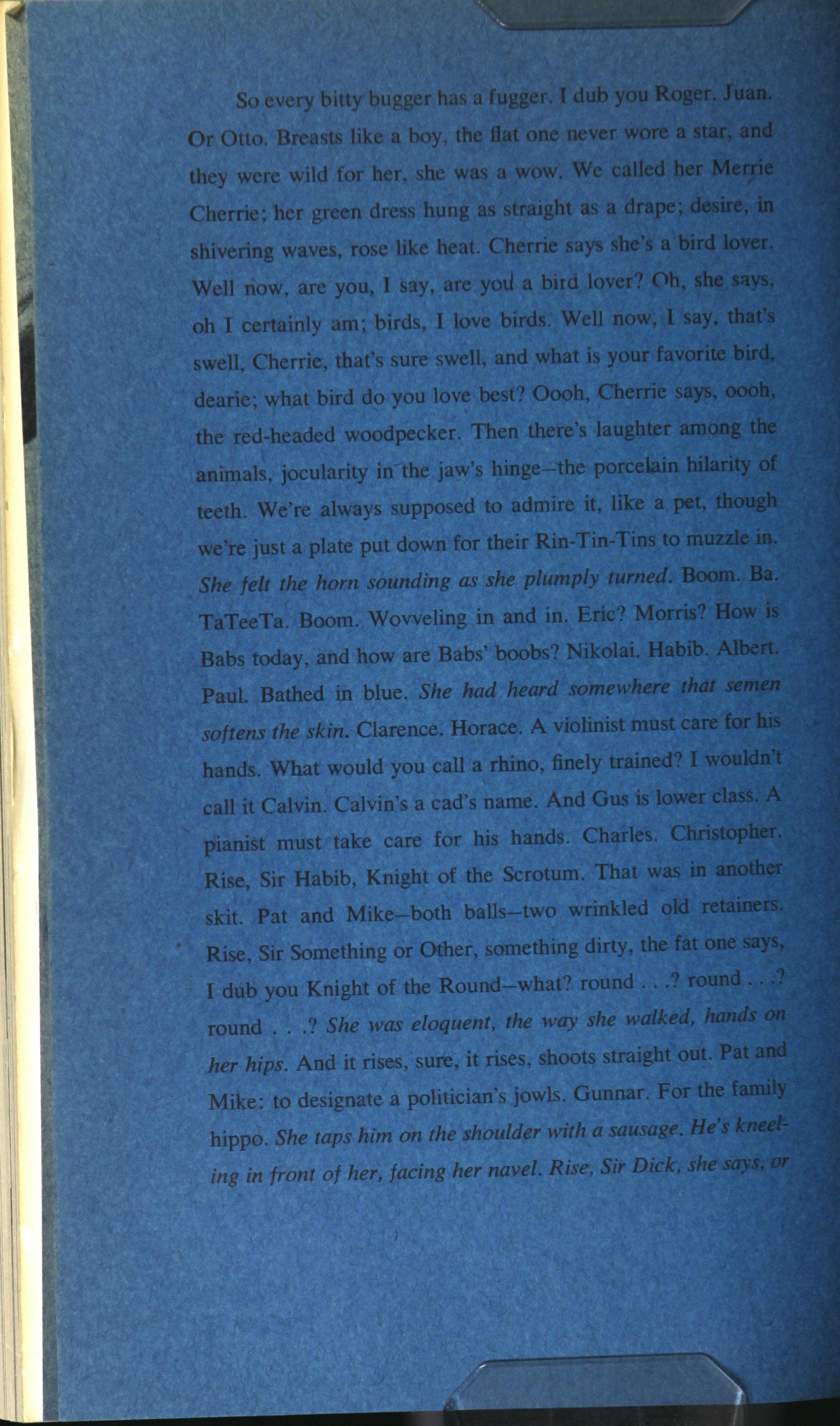
�,sir Something or Odler, sdlnething
I d1iO you Knight of tl)e Round what? round '1 She wtU eloquent, lite WG)' 1M her hips. And it rises, sure, it rises, q Mike; to designate a politician's jowls. OUDIW"'. hippo. She taps him on the should,r with a S4 ing in front of her, facing her navel. Rise, Sir Dili
I I I I I
I
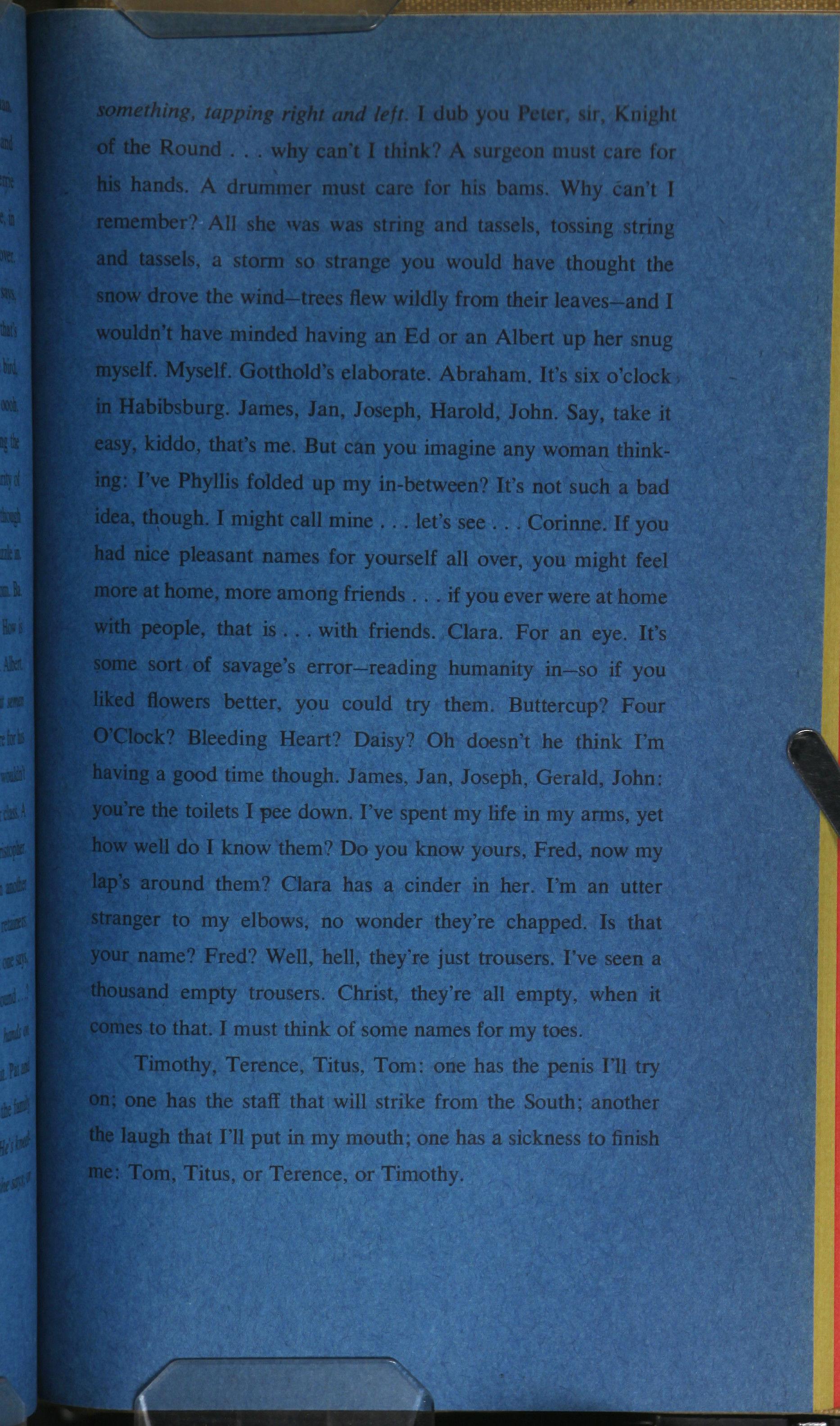
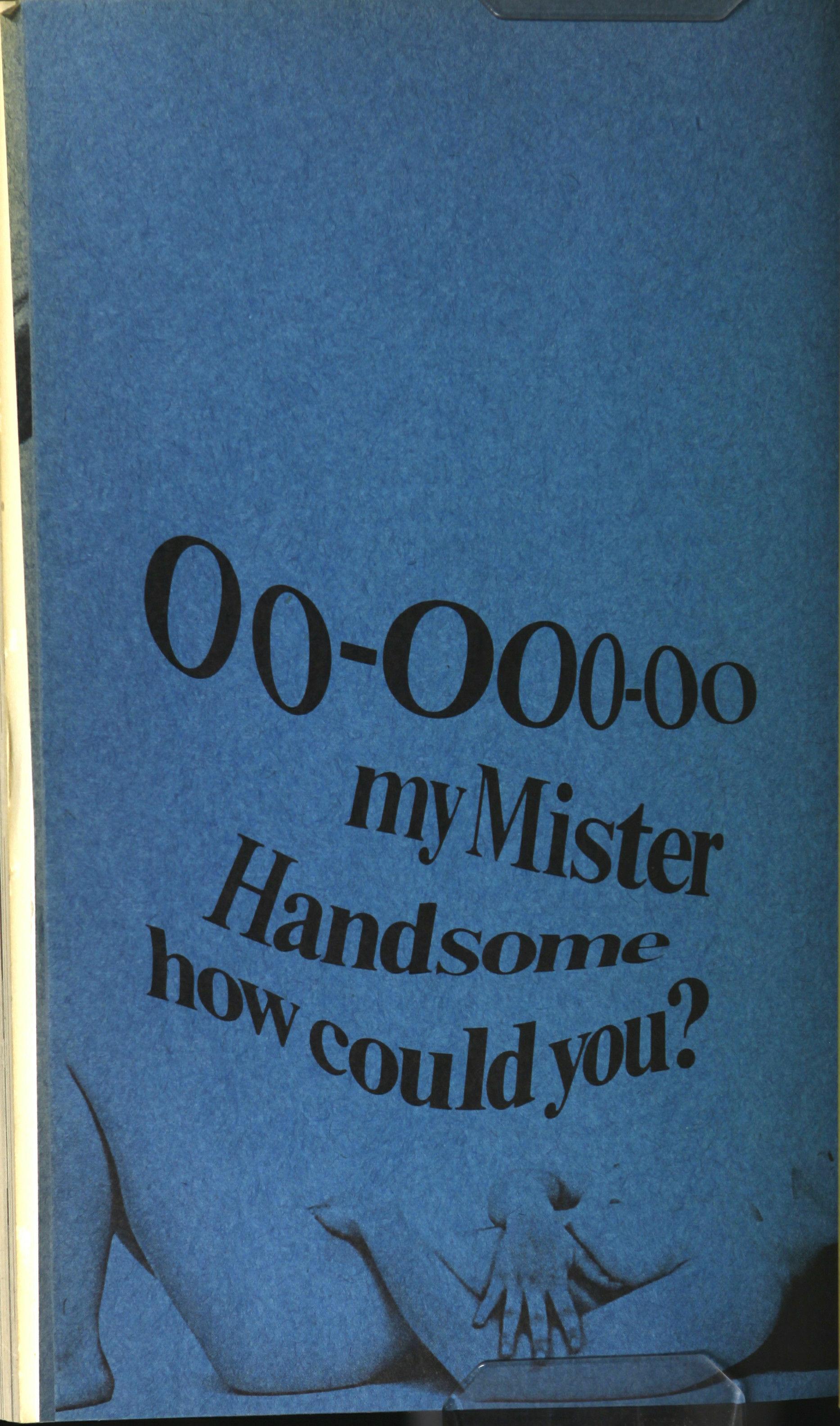
I
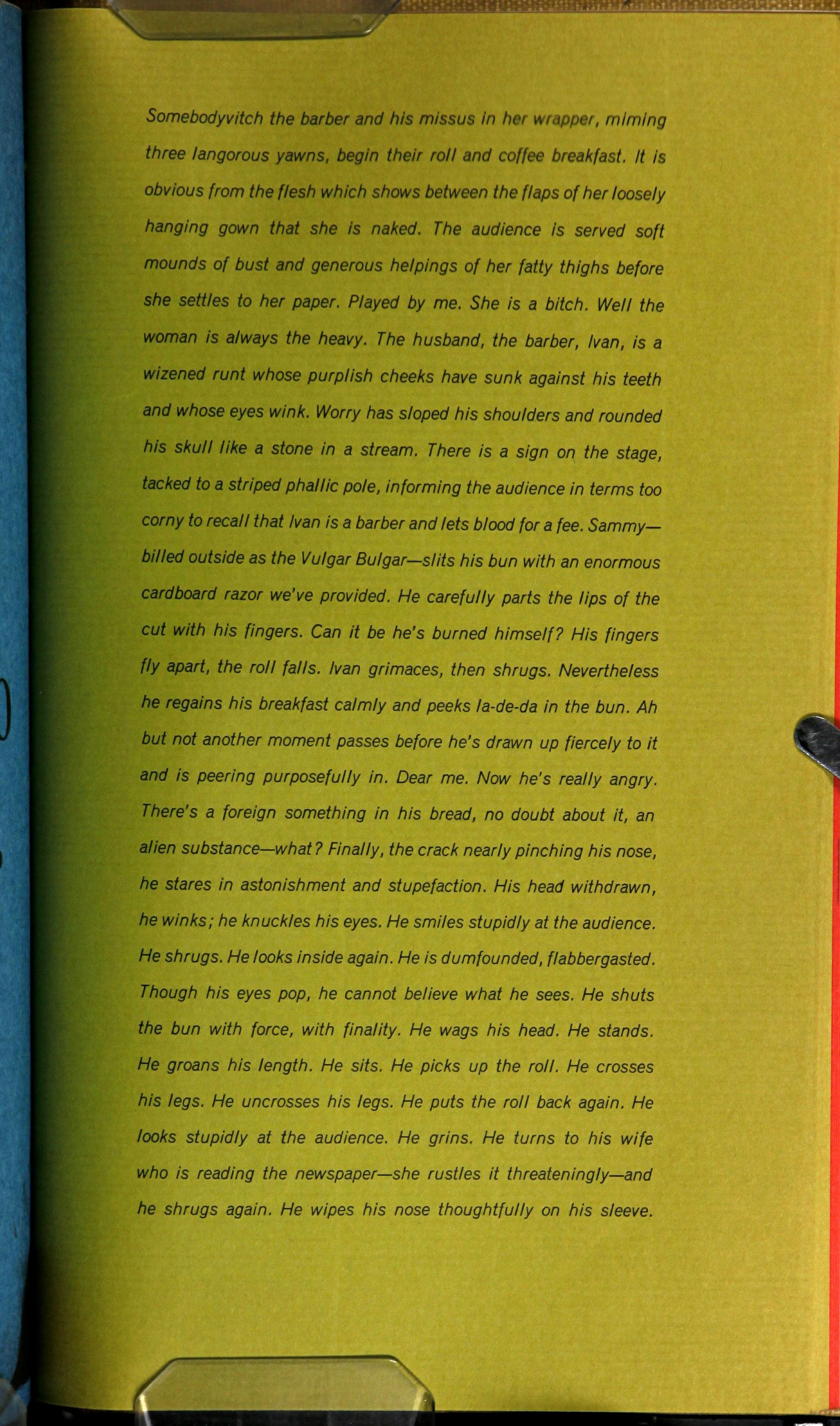
Somebodyvitch the barber and his missus In 1)('( wr PPP(, mImIng three langorous yawns, begin their roll and coffee breakfast. It Is obvious from the flesh which shows between the flaps ofher loosely hanging gown that she is naked. The audience is served soft mounds of bust and generous helpings of her fatty thighs before she settles to her paper. Played by me. She is a bitch. Well the woman is always the heavy. The husband, the barber, Ivan, is a wizened runt whose purplish cheeks have sunk against his teeth and whose eyes wink. Worry has sloped his shoulders and rounded his skull like a stone in a stream. There is a sign on the stage, tacked to a striped phallic pole, informing the audience in terms too corny to recall that Ivan is a barber and lets blood for a fee. Sammybilled outside as the Vulgar Bulgar slits his bun with an enormous cardboard razor we've provided. He carefully parts the lips of the cut with his fingers. Can it be he's burned himself? His fingers fly apart, the roll falls. Ivan grimaces, then shrugs. Nevertheless he regains his breakfast calmly and peeks te-de-de in the bun. Ah but not another moment passes before he's drawn up fiercely to it and is peering purposefully in. Dear me. Now he's really angry. There's a foreign something in his bread, no doubt about it, an alien substance what? Finally, the crack nearly pinching his nose, he stares in astonishment and stupefaction. His head withdrawn, he winks; he knuckles his eyes. He smiles stupidly at the audience. He shrugs. He looks inside again. He is dumfounded, flabbergasted. Though his eyes pop, he cannot believe what he sees. He shuts the bun with force, with finality. He wags his head. He stands. He groans his length. He sits. He picks up the roll. He crosses his legs. He uncrosses his legs. He puts the roll back again. He looks stupidly at the audience. He grins. He turns to his wife who is reading the newspaper she rustles it threateningly and he shrugs again. He wipes his nose thoughtfully on his sleeve.
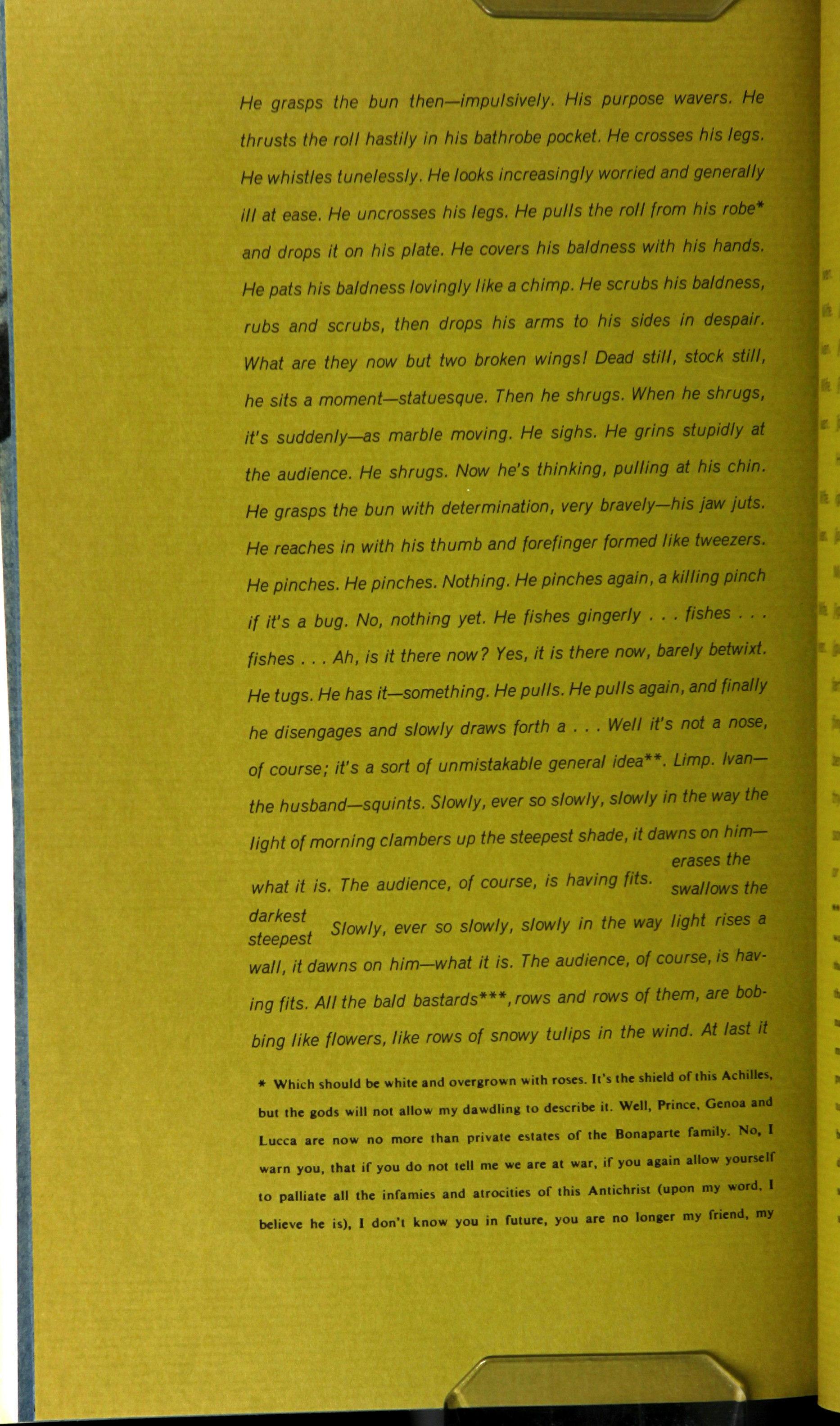
He grasps the bun then impulsively. His purpose wavers. He thrusts the roll hastily in his bathrobe pocket. He crosses his legs. He whistles tunelessly. He looks increasingly worried and generally ill at ease. He uncrosses his legs. He pulls the roll from his robe" and drops it on his plate. He covers his baldness with his hands. He pats his baldness lovingly like a chimp. He scrubs his baldness, rubs and scrubs, then drops his arms to his sides in despair.
What are they now but two broken wingsI Dead still, stock still, he sits a moment statuesque. Then he shrugs. When he shrugs, it's suddenly as marble moving. He sighs. He grins stupidly at the audience. He shrugs. Now he's thinking, pulling at his chin. He grasps the bun with determination, very bravely his jaw juts. He reaches in with his thumb and forefinger formed like tweezers. He pinches. He pinches. Nothing. He pinches again, a killing pinch if it's a bug. No, nothing yet. He fishes gingerly fishes fishes Ah, is it there now? Yes, it is there now, barely betwixt. He tugs. He has it something. He pulls. He pulls again, and finally he disengages and slowly draws forth a Well it's not a nose, of course; it's a sort of unmistakable general idea**. Limp. Ivan'the husband squints. Slowly, ever so slowly, slowly in the way the light of morning clambers up the steepest shade, it dawns on himlerases the what it is. The audience, of course, is having fits. II th swa ows e darkest steepest
Slowly, ever so slowly, slowly in the way light rises a wall, it dawns on him what it is. The audience, of course, is having fits. All the bald bastards***, rows and rows of them, are bobbing like flowers, like rows of snowy tulips in the wind. At last it
* Which should be white and overgrown with roses. It's the shield of this Achilles. but the gods will not allow my dawdling to describe it. Well, Prince, Genoa and Lucca are now no more than private estates of the Bonaparte family. No, I warn you, that if you do not tell me we are at war, if you again allow yourself to palliate all the infamies and atrocities of this Antichrist (upon my word, I believe he is), ) don't know you in future, you are no longer my friend, my
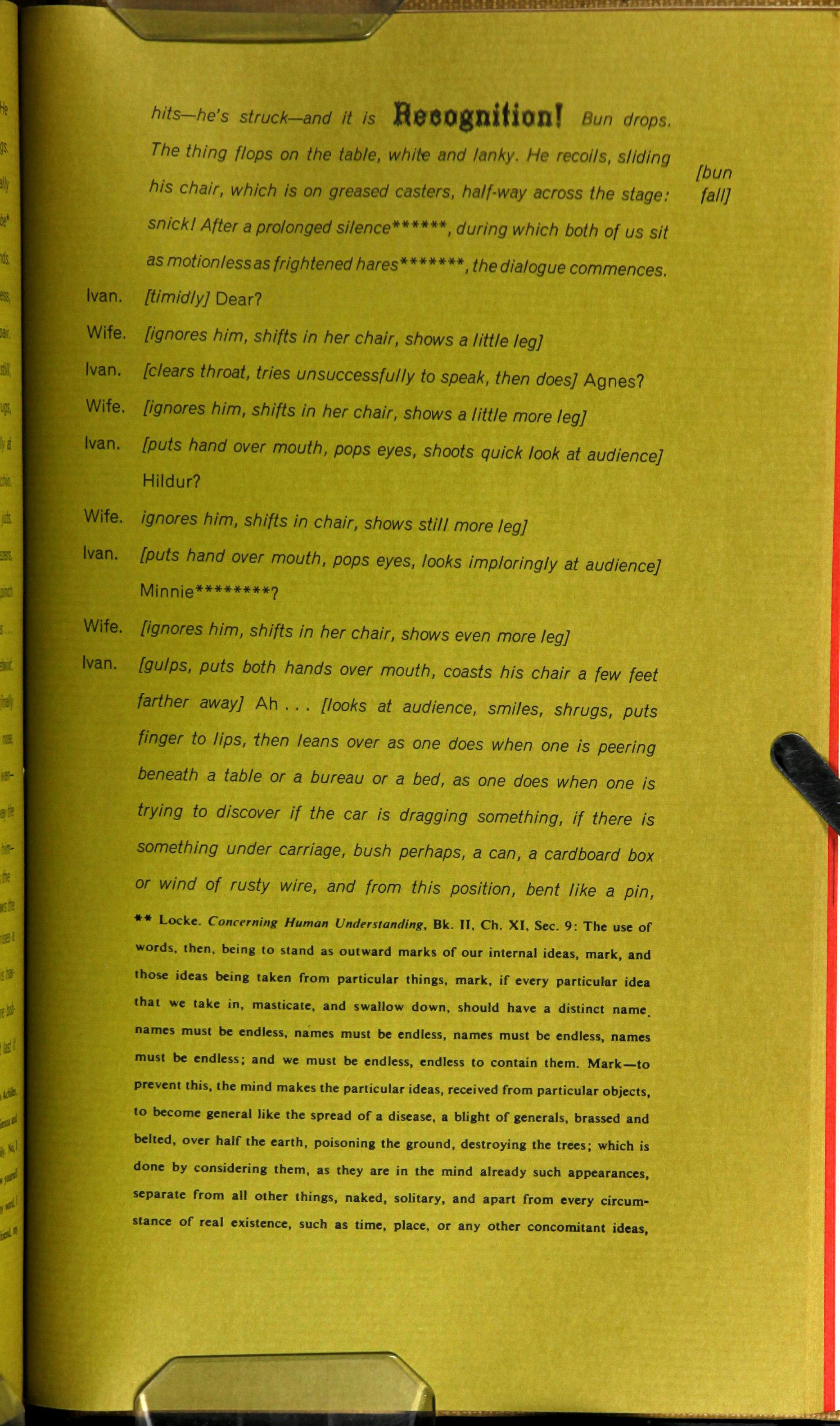
hits he's struck and it is lleoognition' itun drops. The thing flops on the table, white and IlInAy. He recoils, slIding his chair, which is on greased casters, half-way across the stage: snickl After a prolonged silence******, during which both of us sit as motionless as frightenedhares*******, the dialogue commences. [bun fallJ
Ivan. [timidlyJ Dear?
Wife. [ignores him, shifts in her chair, shows a little legJ Ivan. [clears throat, tries unsuccessfully to speak, then does] Agnes?
Wife. [ignores him, shifts in her chair, shows a little more legJ Ivan. [puts hand over mouth, pops eyes, shoots quick look at audience]
Wife. ignores him, shifts in chair, shows still more legJ Ivan. [puts hand over mouth, pops eyes, looks imploringly at audience] trying to discover if the car is dragging something, if there is Minnie********?
Wife. [ignores him, shifts in her chair, shows even more legJ Ivan. [gulps, puts both hands over mouth, coasts his chair a few feet farther awayJ Ah [looks at audience, smiles, shrugs, puts finger to lips, then leans over as one does when one is peering beneath a table or a bureau or a bed, as one does when one is
something under carriage, bush perhaps, a can, a cardboard box or wind of rusty wire, and from this position, bent like a pin, Locke. Concerning Human Understanding; Bk. II. Ch. XI, Sec. 9: The use of I words. then. being to stand as outward marks of our internal ideas, mark, and those ideas being taken from particular things, mark. if every particular idea that we take in, masticate. and swallow down, should have a distinct name. names must be endless. names must be endless, names must be endless, names must be endless; and we must be endless, endless to contain them. Mark-to prevent this, the mind makes the particular ideas, received from particular objects, to become general like the spread of a disease. a blight of generals. brassed and belted, over half the earth, poisoning the ground, destroying the trees; which is done by considering them. as they are in the mind already such appearances, separate from all other things, naked, solitary, and apart from every circumstance of real existence, such as time, place, or any other concomitant ideas,
'l "1 {
�,
-
-
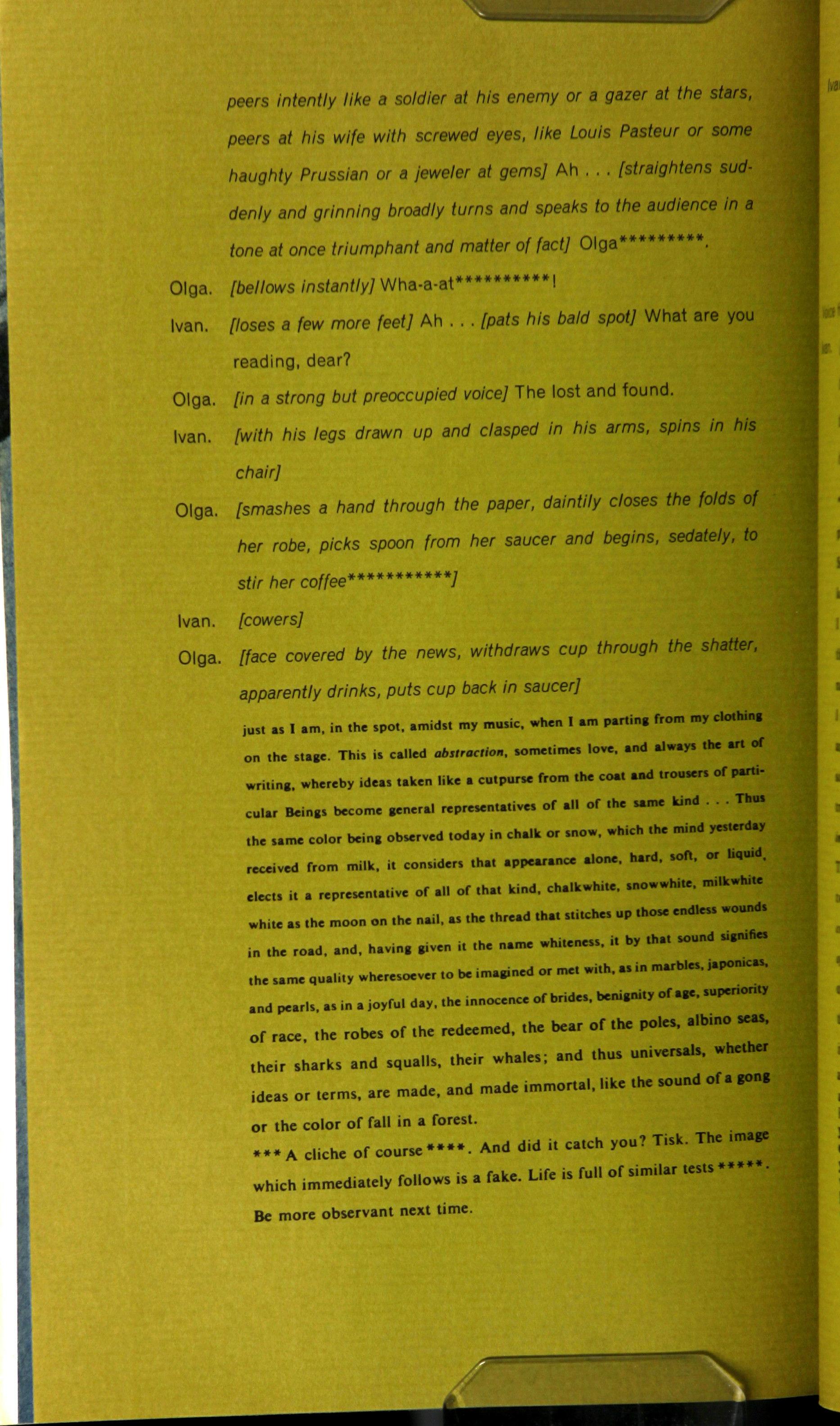
I (fIw more (M] Nt reading, dear?
Otga. [In I st'MQ but pretJCCupied Ivan.
Otoa. [smashes I hand throu� the _qyalk'w allll a.ioJfW ,. 0( nee. the .,.._ or I their ks ud their ide'ls or terms. are or the color of (aU ia • A cliche 0( counc ••• 'I roto • Be mon: oblenUl na& _me.
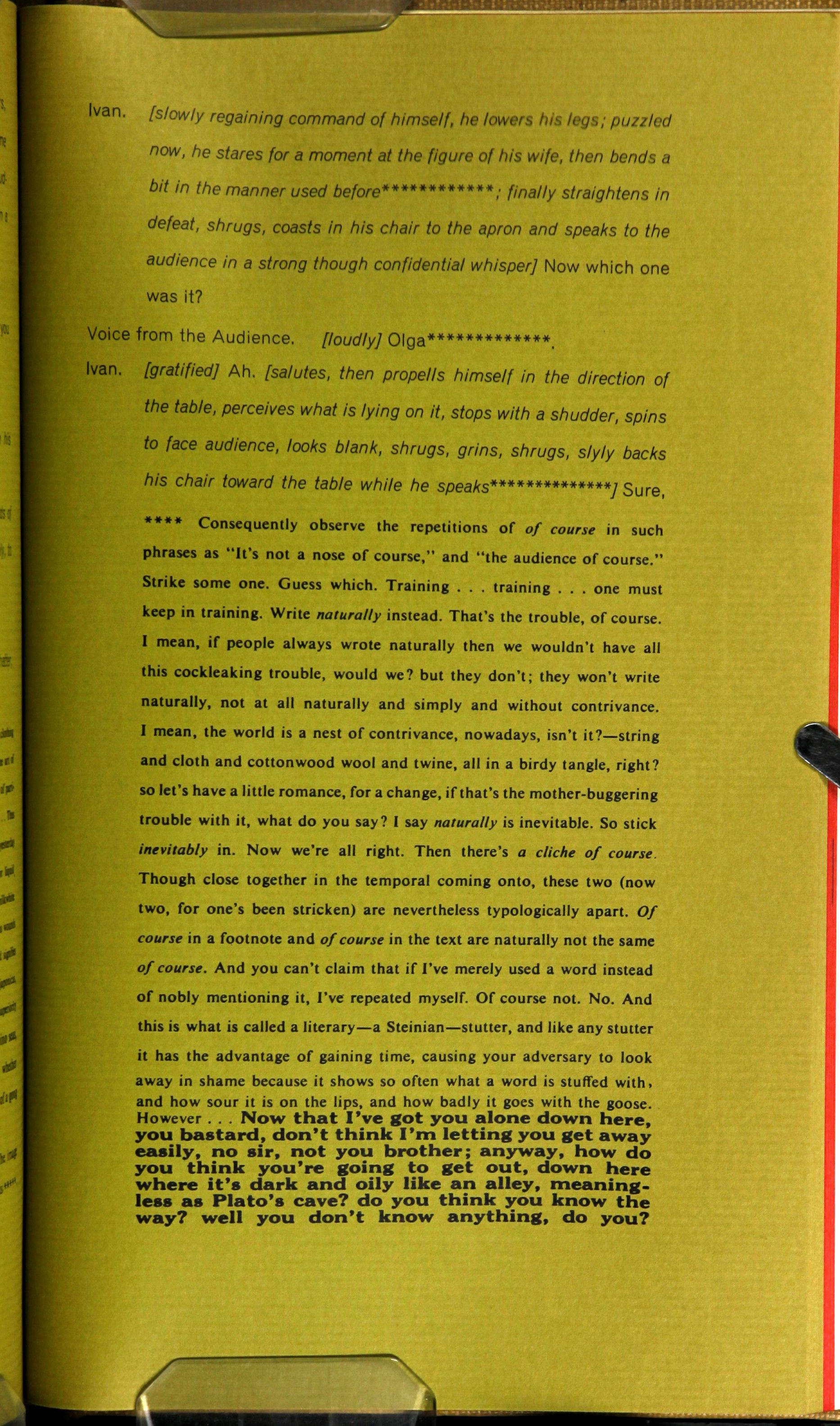
Ivan. [slowly regaining command of himself, he low' rs his I 9 ,puzzled now, he stares for a moment at the figure of his wife, then bends a bit in the manner used before************,' finally straightens in defeat, shrugs, coasts in his chair to the apron and speaks to the audience in a strong though confidential whisper] Now which one was it?
Voice from the Audience. [loudly] Olga*************.
Ivan. [gratified] Ah. [salutes, then propells himself in the direction of the table, perceives what is lying on it, stops with a shudder, spins to face audience, looks blank, shrugs, grins, shrugs, slyly backs his chair toward the table while he speaks**************] Sure,
Consequently observe the repetitions of of course in such phrases as "It's not a nose of course," and "the audience of course." Strike some one. Guess which. Training training one must keep in training. Write naturally instead. That's the trouble, of course. I mean, if people always wrote naturally then we wouldn't have all this cockleaking trouble, would we? but they don't; they won't write naturally, not at all naturally and simply and without contrivance. I mean, the world is a nest of contrivance, nowadays, isn't it? string and cloth and cottonwood wool and twine, all in a birdy tangle, right? so let's have a little romance, for a change, if that's the mother-buggering trouble with it, what do you say? I say naturally is inevitable. So stick inevitably in. Now we're all right. Then there's a cliche of course. Though close together in the temporal coming onto, these two (now two, for one's been stricken) are nevertheless typologically apart. Of course in a footnote and of course in the text are naturally not the same of course. And you can't claim that if I've merely used a word instead of nobly mentioning it, I've repeated myself. Of course not. No. And this is what is called a literary a Steinian stutter, and like any stutter it has the advantage of gaining time, causing your adversary to look away in shame because it shows so often what a word is stuffed with, and how sour it is on the lips, and how badly it goes with the goose. However Now that I've got you alone down here, you bastard, don't think 1' 1 letting you get away easily, no sir, not you b.other; anyway, how do you think you're going to get out, down here whele it's dark and oily like an alley, •• leaningless as Plato's cave? do you think you know the way? well you don't know anything, do you?
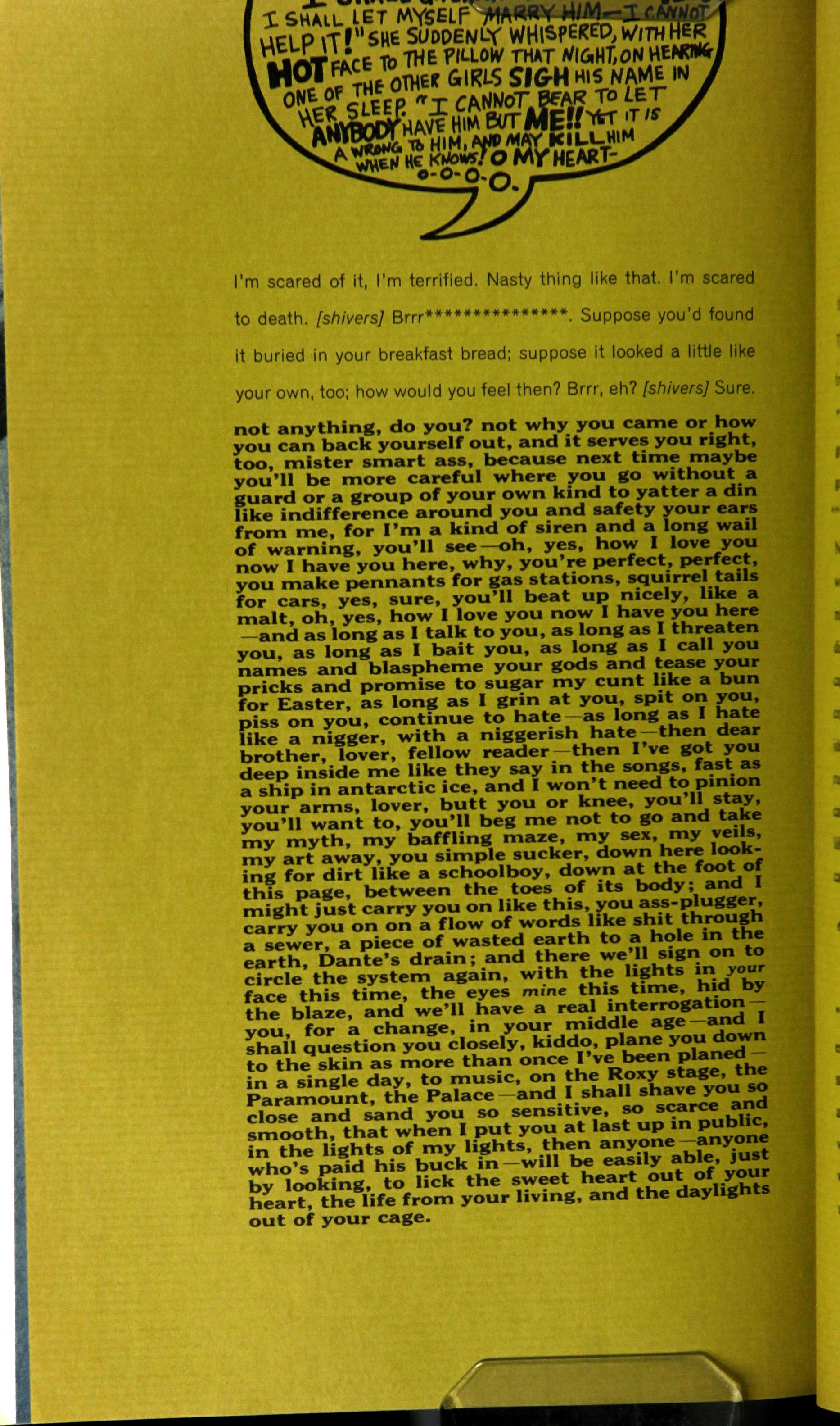
I'm scared of it, I'm terrified. Nasty thing like that. I'm scared to death. [shivers} Brrr***************. Suppose you'd found it buried in your breakfast bread; suppose it looked a little like your own, too; how would you feel then? Brrr, eh? [shivers} Sure.
not anything, do you? not why you callIe or how you can back yourself out, and it serves you right, too, I.lister Sl.lart ass, because next til.le maybe you'll be l.lOle careful where you go without a guard or a gloup of your own kind to yatter a din like indiffel ence alound you and safety your ears flOlll Ille, for 1'1.1 a kind of sil'en and a long wail of warning, you'll see-oh, yes, how I love you now I have you here, why, you'le perfect, perfect, you Illake pennants for gas stations, squil'lel tail. for cars, yes, sure, you'll beat up nicely, like a Illalt, oh, yes, how I love you now I have you here -.and as long as I talk to you, as long as I threaten you, as long as I bait you, as long as I call you nailles and blaspheille your gods and tease your pricks and piol.lise to sugar 1.1Y cunt like a bun for Easter, as long as I grin at you, spit on you, piss on you, continue to hate as long as I hate like a nigger, with a niggerish hate then dear blother, lover, fellow .eader then I've got you deep inside I.le like they say in the songs, fast as a ship in antarctic ice, and I won't need to pinion your arl.1S, lover, butt you or knee, you'll stay, you'll want to, you'll beg I.le not to go and take 1.1Y Illyth, 1.1Y baffling I.laze, l.lY sex, l.lY veils, Illy art away, you Sililple sucker, down here looking for dirt like a schoolboy, down at the foot of this page, between the toes of its body; and I I.light just carry you on like this, you ass-plugger, carry you on on a flow of words like shit thlough a sewer, a piece of wasted earth to a hole in the earth, Dante's drain; and there we'll sign on to circle the systel.l again, with the lights in your face this til.le, the eyes "line this til.le, hid by the blaze, and we'll have a leal intel'logationyou, for a change, in your I.liddle age and I shall question you closely, kiddo, plane you down to the skin as IllOl'e than once I've been planedin a single day, to I.tusic, on the Roxy stage, the Paral.lount, the Palace and I shall shave you so close and sand you so sensitive, :.10 SCBI( and SI.lOOth, that when I put you at last up in public, in the lights of 1.1Y lights, then anyone anyone who's paid his buck in will be easily able, just by looking, to lick the sweet heart out of your heart, the life frollt your living, and the daylights out of your cage.
Look I know I'm old. I'm thirty-five or fOlty II 01 ixty sixty-two or sixty, I should guess******II***'.'***II**. Some such. [shivers] Brrr. I know I'm past it. Sure. Still, it's upsetting. It's an upsetting thing to think you've lost it. Upsetting. I say it's an upsetting thing, sure, no matter how old you are, why not?
To have held on down there for so long like a climber clinging to a cliff, and then to slip [shivers] It's sad. Distressing.
To have taken all that punishment those years Really distressing. And it's not so easy to tell if it's gone, now, either **11*- Butifbaldgoes,allg goes. And you haven't a guy-light like an emptied oes hob goes. If row goes, snow on your bosom. Naked in the ntence. Whatever that means. ******p I h"1 '1 h ro ong t IS Sl ence unn t e audience titters nervously. Note: if you found unprinted pages in a book you'd bought, you wouldn't feel embarrassed and need to giggle all the blanks up. You might exclaim: say, look at this, the cheapjakes have left out the dirties. And certainly you'd want your money back. Painters, too, can leave large areas of canvas empty, or spread the same sullen color over great swatches of their precious space, daub after daub identical; but do you suppose, having taken a fancy to it, we could run a little bit of catafalque along: catafalque catafalque catafalque catafalque catafalque catafalque catafalque catafalque? Not on your life. Crepuscular has advocates, as has dirigibility both nice but catafalque is best. Along these lines, here's a string of beauties:
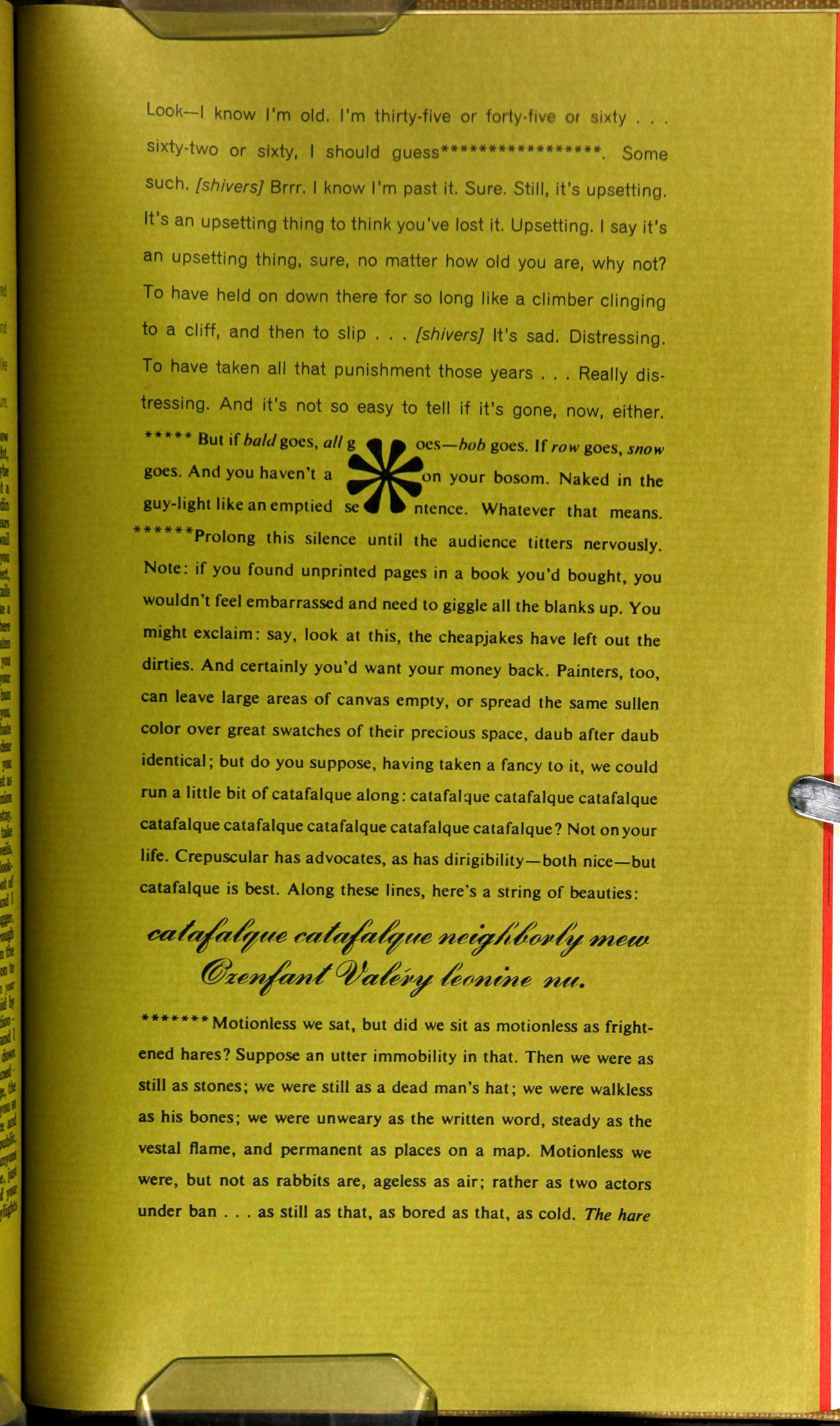
Motionless we sat, but did we sit as motionless as frightened hares? Suppose an utter immobility in that. Then we were as still as stones; we were still as a dead man's hat; we were walkless as his bones; we were unweary as the written word, steady as the vestal flame, and permanent as places on a map. Motionless we were, but not as rabbits are, ageless as air; rather as two actors under ban as still as that, as bored as that, as cold. The hare
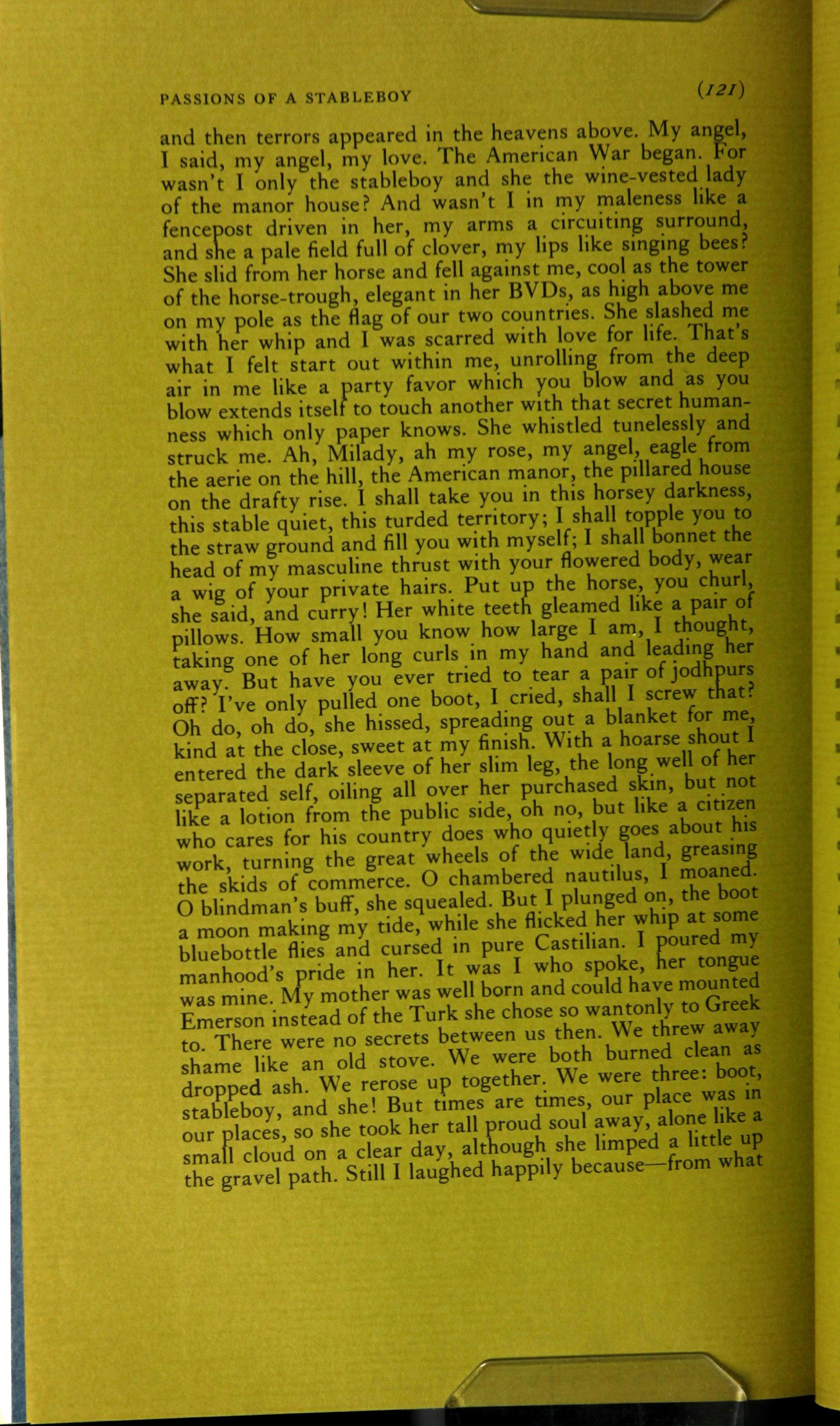
n Iy h P nd riven in her, Ie field (u11 o( lid f,OIll her hoI' d fe
m pol th � of our 'th er hip d c hat I felt tart out within ir in me Ii rty fa or b extend it I to tou an ich only � I' kno e me, Ah, ady, ah y role, the ie on the hill, tiie 'an on the drafty rise. I hall ta ou in this table quiet, this turded tc'. j ; the traw ground and fin you 'th my head of my masculine thru t 'th a wig of your private hairs. Put u she id, and curr ! Her white tee pillo ,How ma I you know h taking one of her long curl in a ay. But have ou ever uied, off? I've only pul ed one boot? Oh do, oh do, she hissed, sp kind at the close, sweet at my entered the dark sleeve of her 1.,11 separated self, oili all over er lilte a lotion from t e public ho cares for hi COUDtry work, turning the great h the skids of commerce, 0 c o blindman' buff, she equealed. a moon maki my 'de, bluebottle fties and cursed in puR manhood's ride in her, It was mine. y mother was ell Emerson instead of the Turk to. There were no secrets be eea us shame like an old stove. e were dro d ash. We rerose up together. sta eboy, and she! But ames are es, our laces, so she took her tall roud ul a sma I cloud on a clear day, alt ough she the gravel path. Still I laughed happily beca
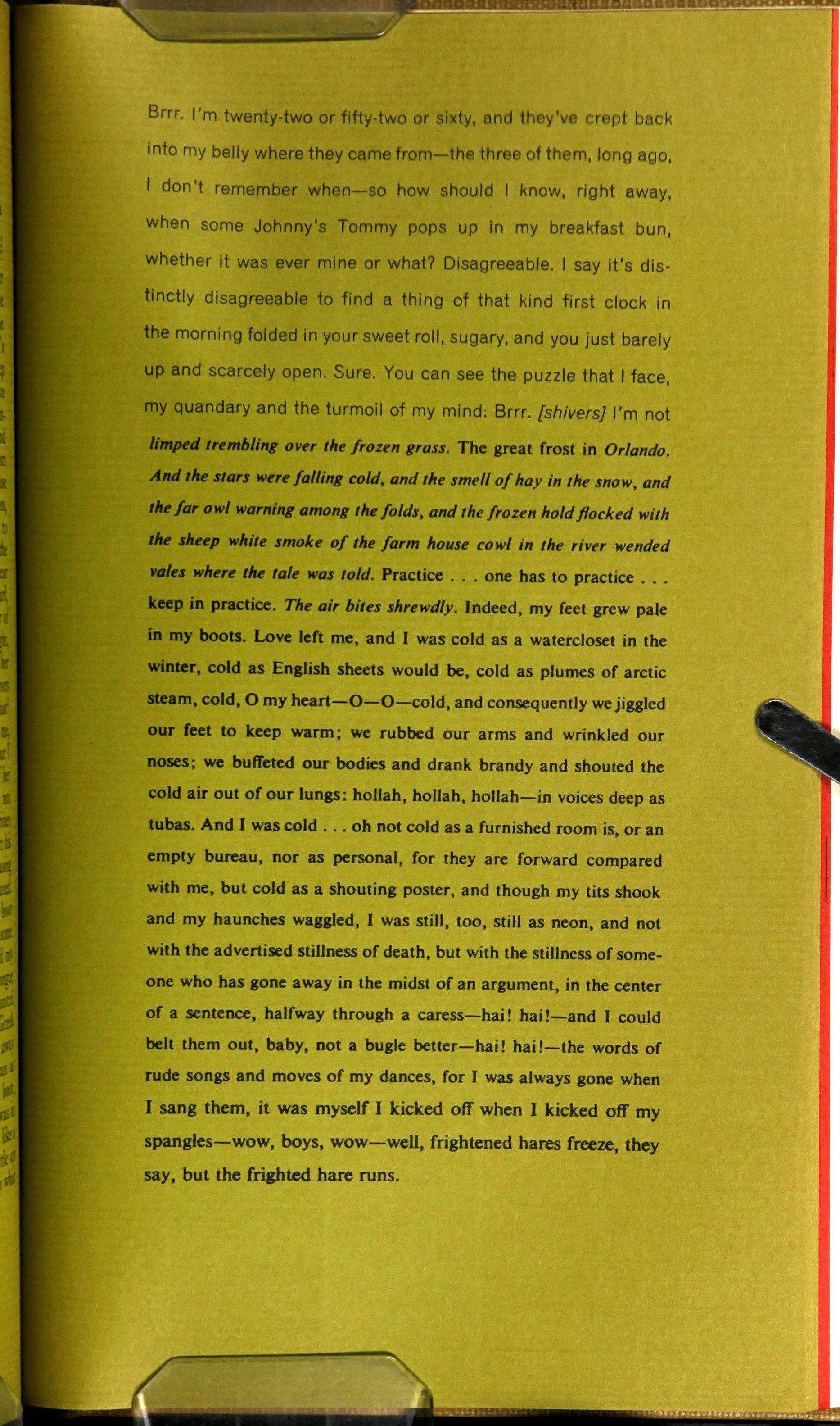
Brrr. I'm twenty-two or fifty-two or sixty, rind 111 y'V cr 1)1 buck into my belly where they came from the three of them, long ago, I don't remember when so how should I know, right away, when some Johnny's Tommy pops up in my breakfast bun, whether it was ever mine or what? Disagreeable. I say it's distinctly disagreeable to find a thing of that kind first clock in the morning folded in your sweet roll, sugary, and you just barely up and scarcely open. Sure. You can see the puzzle that I face, my quandary and the turmoil of my mind. Brrr. [shivers] I'm not limped trembling over the frozen grass. The great frost in Orlando. And the stars were falling cold, and the smell ofhay in the snow, and thefor owl warning among the folds, and the frozen holdflocked with the sheep white smoke of the farm house cowl in the river wended vales where the tale was told. Practice one has to practice keep in practice. The air bites shrewdly. Indeed, my feet grew pale in my boots. Love left me, and I was cold as a watercloset in the winter. cold as English sheets would be, cold as plumes of arctic steam. cold, 0 my heart 0 0 cold, and consequently we jiggled our feet to keep warm; we rubbed our arms and wrinkled our noses; we buffeted our bodies and drank brandy and shouted the cold air out of our lungs: hollah, hollah, hollah in voices deep as tubas. And I was cold oh not cold as a furnished room is, or an empty bureau, nor as personal, for they are forward compared with me, but cold as a shouting poster, and though my tits shook and my haunches waggled, I was still, too, still as neon, and not with the advertised stillness of death, but with the stillness of someone who has gone away in the midst of an argument, in the center of a sentence, halfway through a caress hai! hai! and I could belt them out, baby, not a bugle better hai! hai! the words of rude songs and moves of my dances, for J was always gone when I sang them, it was myself I kicked off when I kicked off my spangles wow, boys, wow well, frightened hares freeze, they say, but the frighted hare runs.
I
aur It' IVtn, YOll know, I rnan maybe If a fr."d' 111M tlpa 0( II '.n frlendt-how should I kr'IOf."'_
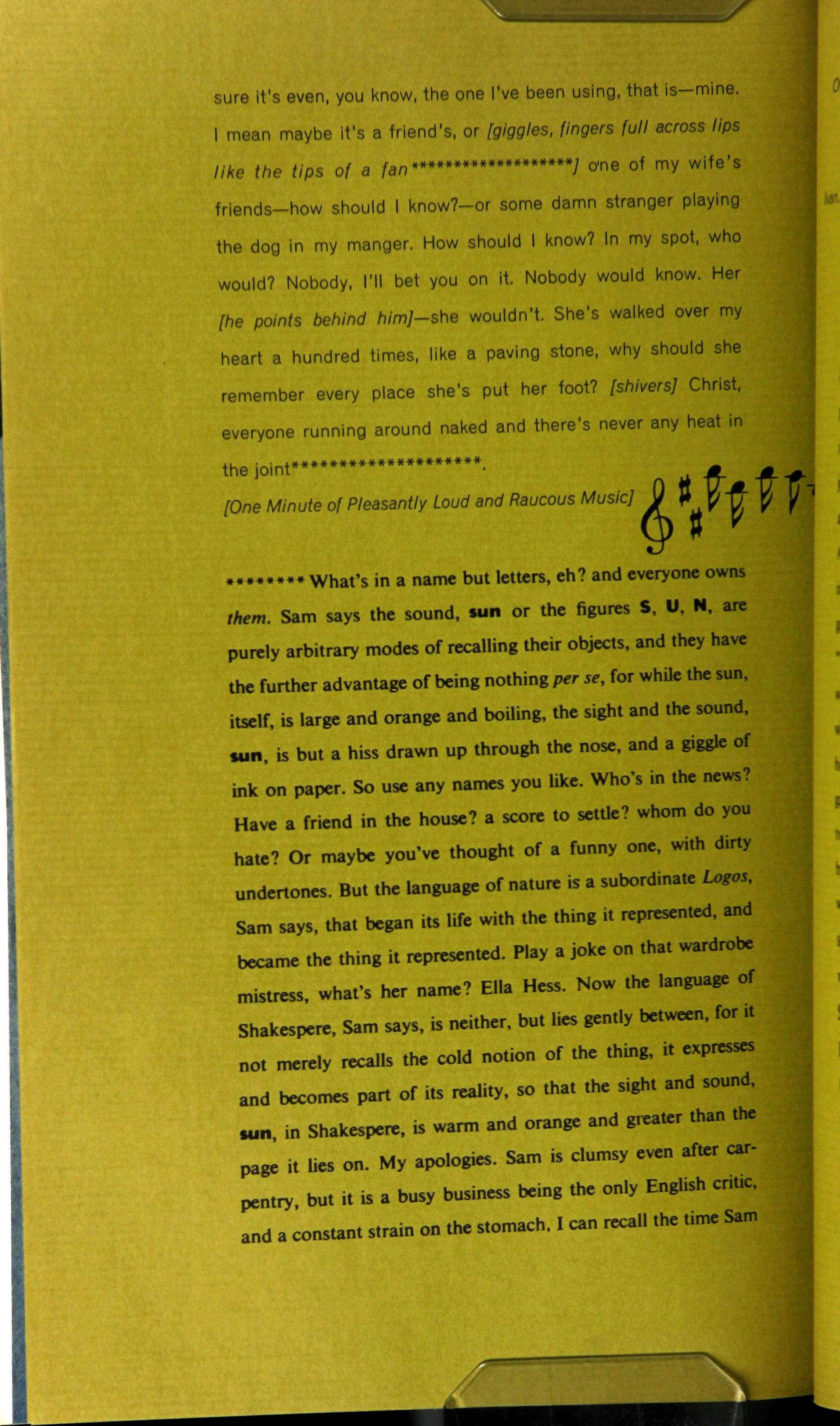
heart • hundred times, Ilk, I remember wary place sha' pUt her "'ryone running around naked and (()he Minute 0(p� yLoudand oil' of ad ,is Jarll and but hiss 011...,... So HaYea hate, Or maybe JOU But the Sam "ys, that the thiq it what's her name' Shakespere, Sam says, but not merely the cold notion of the and put of its so that the in Shakespere. is wanD and and page it lies on. My Sam is clll'ilSj' pentry, but it is • busy being the 0Dly and a constant strain on the stomach. I can recall :-
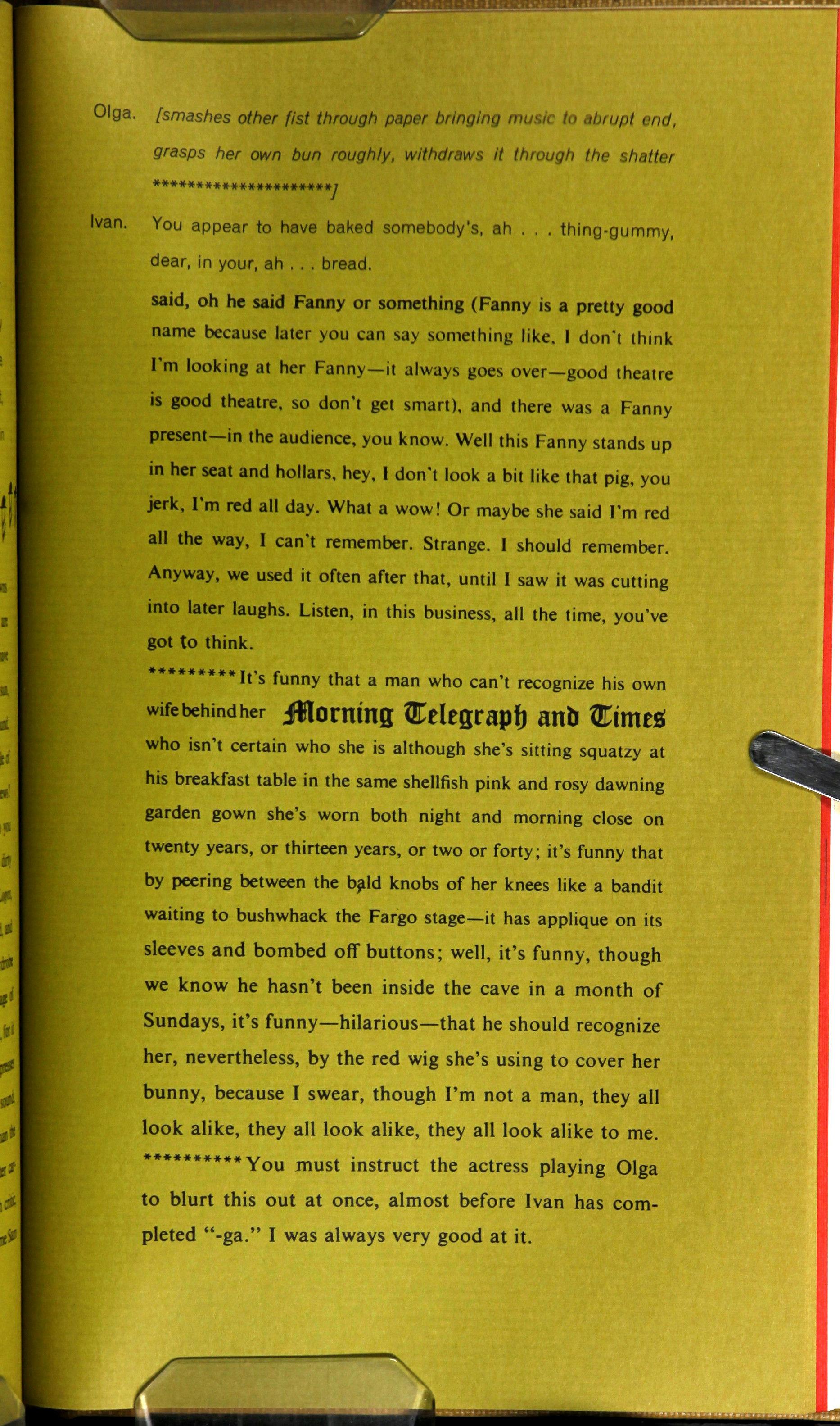
Olga. [smashes other fist through paper bringinq (IIIJ Ie I .1/)(up! ona, grasps her own bun roughly, withdraws if through the shatter *********************J
Ivan. You appear to have baked somebody's, ah thing-gummy, dear, in your, ah bread. said, oh he said Fanny or something (Fanny is a pretty good name because later you can say something like, I don't think I'm looking at her Fanny it always goes over good theatre is good theatre, so don't get smart), and there was a Fanny present in the audience, you know. Well this Fanny stands up in her seat and hollars, hey, I don't look a bit like that pig, you jerk, I'm red all day. What a wow! Or maybe she said I'm red all the way, I can't remember. Strange. I should remember. Anyway, we used it often after that, until I saw it was cutting into later laughs. Listen, in this business, all the time, you've got to think.
********* It's funny that a man who can't recognize his own wife behind her orning tEelegrapb anti tEimei5 who isn't certain who she is although she's sitting squatzy at his breakfast table in the same shellfish pink and rosy dawning garden gown she's worn both night and morning close on twenty years, or thirteen years, or two or forty; it's funny that by peering between the bald knobs of her knees like a bandit waiting to bushwhack the Fargo stage it has applique on its sleeves and bombed off buttons; well, it's funny, though we know he hasn't been inside the cave in a month of Sundays, it's funny hilarious that he should recognize her, nevertheless, by the red wig she's using to cover her bunny, because I swear, though I'm not a man, they all look alike, they all look alike, they all look alike to me.
********** You must instruct the actress playing Olga to blurt this out at once, almost before Ivan has completed "<ga." I was always very good at it.
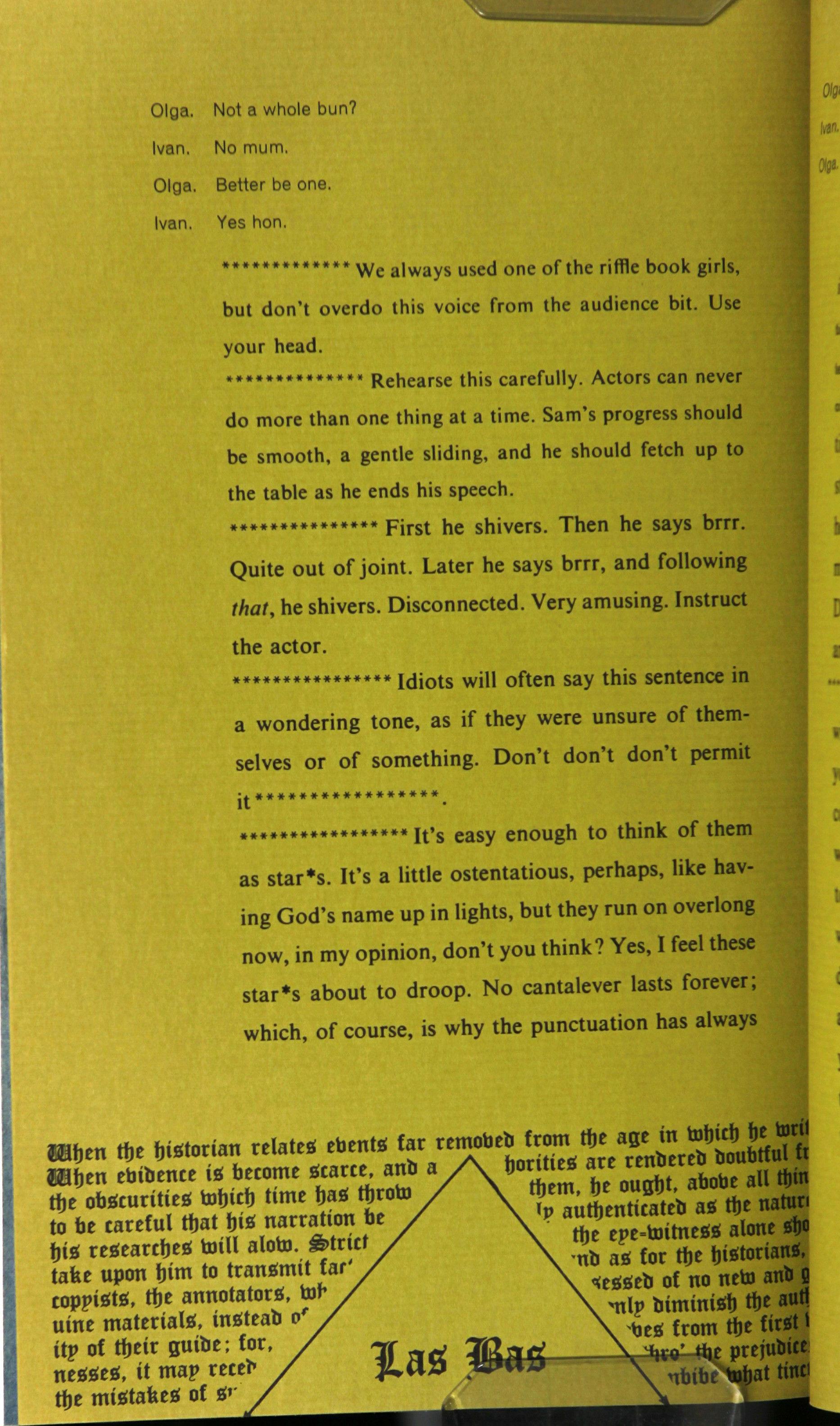
Olga. Not a whole bun?
Ivan. No mum.
Olga. Better be one.
Ivan. Yes hon
We always used one of the riffle book but don't overdo this voice from the audience bit your head
Rehearse this carefully. Acton can do more than one thing at a time. Sam's proareu be smooth, a gentle sliding, and he hould (e the table as he ends his speech
** ***.****** First he shivers. Then he
Quite out ofjoint. Later he says brrr, and fl that, he shivers. Disconnected. Veryamusina. the actor.
Idiots will often say this a wondering tone, as if they were uuure of selves or of something. Don't don't don't it****·*****·***·**
It's easy enough to think as star·s. It's a little ostentatious, perba ing God's name up in lights, but they run on 0 now, in my opinion, don't you think? Yes. I feel star·s about to droop. No cantalever Jails f which, of course, is why the punctuation has _btu tbt bi�toriau rtlatt� tbtnt� far rtll.obtb frol•• (bt age itt .btn tbibtntt i� bttomt �tartt. aub a tbt ob�turitit� wbitb nme ba� tbrow to bt tartful tbat bi� narration bt bi� rt�tartbt� will alow. 6tritt takt upon bim to tran�mit fa,' toppi�t�. tbt anuotator�. w" utne mattrial�. in�ttab .,1' itp of tbtir guibt; for. ut��t�. it mal' rttti"
tbt mi�takt� of �,.: boritit� art rmbtm. tbtm. bt ouot. ,� autbmtitatdl (bt tpt-lDi 'nb a� for * �t��tb of 110 "Illp bfm 1Jt� f
a
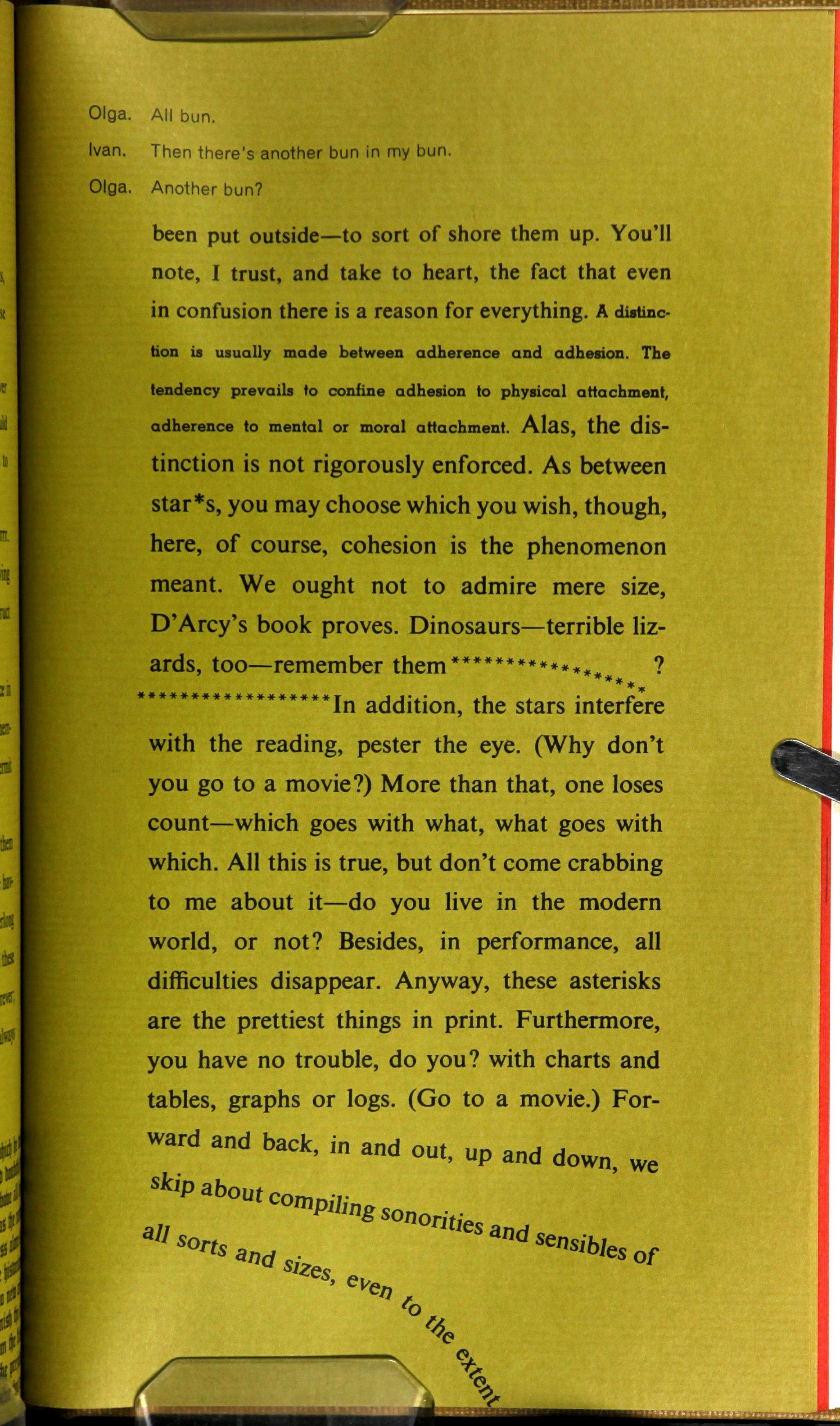
Olga. All bun.
Ivan. Then there's another bun in my bun.
Olga. Another bun?
been put outside to sort of shore them up. You'll note, I trust, and take to heart, the fact that even in confusion there is a reason for everything. A diltinc-
tion is usually mode between adherence and adheaion. The
tendency prevails to confine adhesion to physical attachment, adherence to mental or moral attachment. Alas, the distinction is not rigorously enforced. As between star*s, you may choose which you wish, though, here, of course, cohesion is the phenomenon meant. We ought not to admire mere size, D'Arcy's book proves. Dinosaurs terrible liz-
ards, too-remember them ************** ? ** * ******************In addition, the stars interfere with the reading, pester the eye. (Why don't you go to a movie?) More than that, one loses count which goes with what, what goes with which. All this is true, but don't come crabbing to me about it do you live in the modern world, or not? Besides, in performance, all difficulties disappear. Anyway, these asterisks are the prettiest things in print. Furthermore, you have no trouble, do you? with charts and tables, graphs or logs. (Go to a movie.) Forown, we skip about Com .J. Pllng sonor't' Illes a d a 1 SOrt n sensibJ Sand es of SlZes
�
�
i

Ivan. Yes hon.
Olga. Bun In your bun***************** *******7
Ivan. Yes hon but not a bread bun.
*******************This giggle is what they call a stage giggle; that is to say, a fake giggle, without humor or life.
********************
During this great and moving speech the actress playing Olga must try to keep still, not peep over the top of her paper, stir noisily, waggle her foot or show more of her twot than the situation calls for. This is asking for a lot and will be hard. The chief trouble with the stage is that all the actors normally are alive. Everything else is dead as dumbbells but the actors and they're alive. It's incongruous. She's also not to wiggle during the music. All you can do is try. Beg. Plead. Still, she'll wiggle. I always did. The stage it's a mug's game.
*********************All right, cut 1"'0 holes in your cardboard. Nothing easier. How could I know you'd need another? The future is not altogether scrutable. You may die adrift on polar ice, who knows? or marry your mother. How like art is what's left over after life.
**********************This is how it should be sung: you appear to have baked somebody's ah thing-gummy, dear, in your, ah
lit" OIQ!
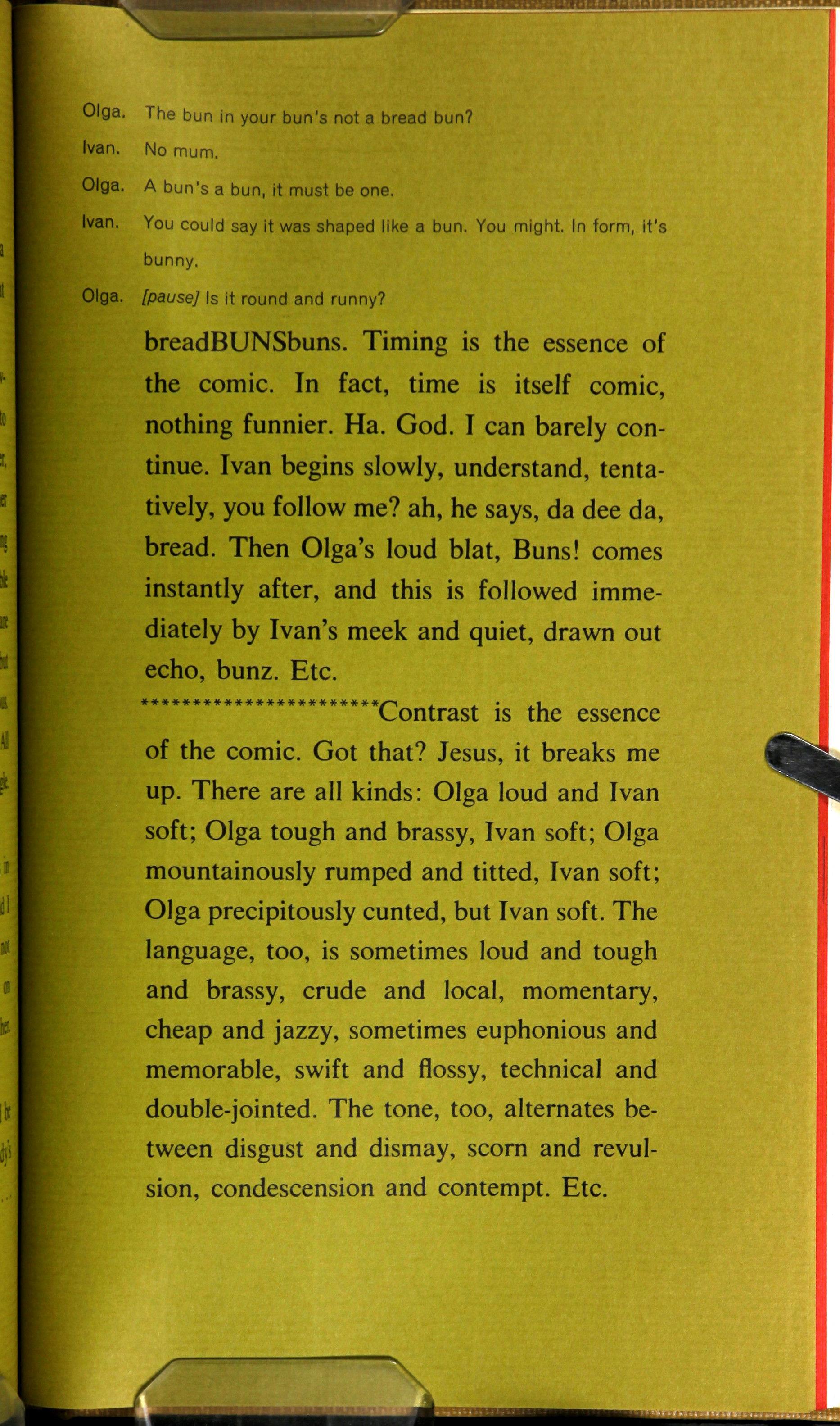
Olga. The bun in your bun's not a bread bun?
Ivan. No mum.
Olga. A bun's a bun, it must be one.
Ivan. You could say it was shaped like a bun. You might. In form, it's bunny.
Olga. [pause] Is it round and runny?
breadBUNSbuns. Timing is the essence of the comic. In fact, time is itself comic, nothing funnier. Ha. God. I can barely continue. Ivan begins slowly, understand, tentatively, you follow me? ah, he says, da dee da, bread. Then Olga's loud blat, Buns! comes instantly after, and this is followed immediately by Ivan's meek and quiet, drawn out echo, bunz. Etc.
***********************Contrast is the essence of the comic. Got that? Jesus, it breaks me up. There are all kinds: Olga loud and Ivan soft; Olga tough and brassy, Ivan soft; Olga mountainously rumped and titted, Ivan soft; Olga precipitously cunted, but Ivan soft. The language, too, is sometimes loud and tough and brassy, crude and local, momentary, cheap and jazzy, sometimes euphonious and memorable, swift and flossy, technical and double-jointed. The tone, too, alternates between disgust and dismay, scorn and revulsion, condescension and contempt. Etc
�
I
Well It's somebody's dummy. Ivan.
1111"111 11 .... 'Iili"ll i. m ian Olga.
1 .e ovc, lee S am I�l,'ns. !!�'Ir. ,llll � .,' arc conuca In 1 icmsc \'\!S, vun ,I ('tJI II � oor, t 1\!\' can c t ic (all II vcn t c wor piston, IS I n c cat roc .er-arm, or Instanc�si er t c nomcnc ature 0 t c tll(). oo terri )' unny: mon .e -wrcnc an "I"" I'� '""
pair o p icrs, ere arc s a Is. nut.•.
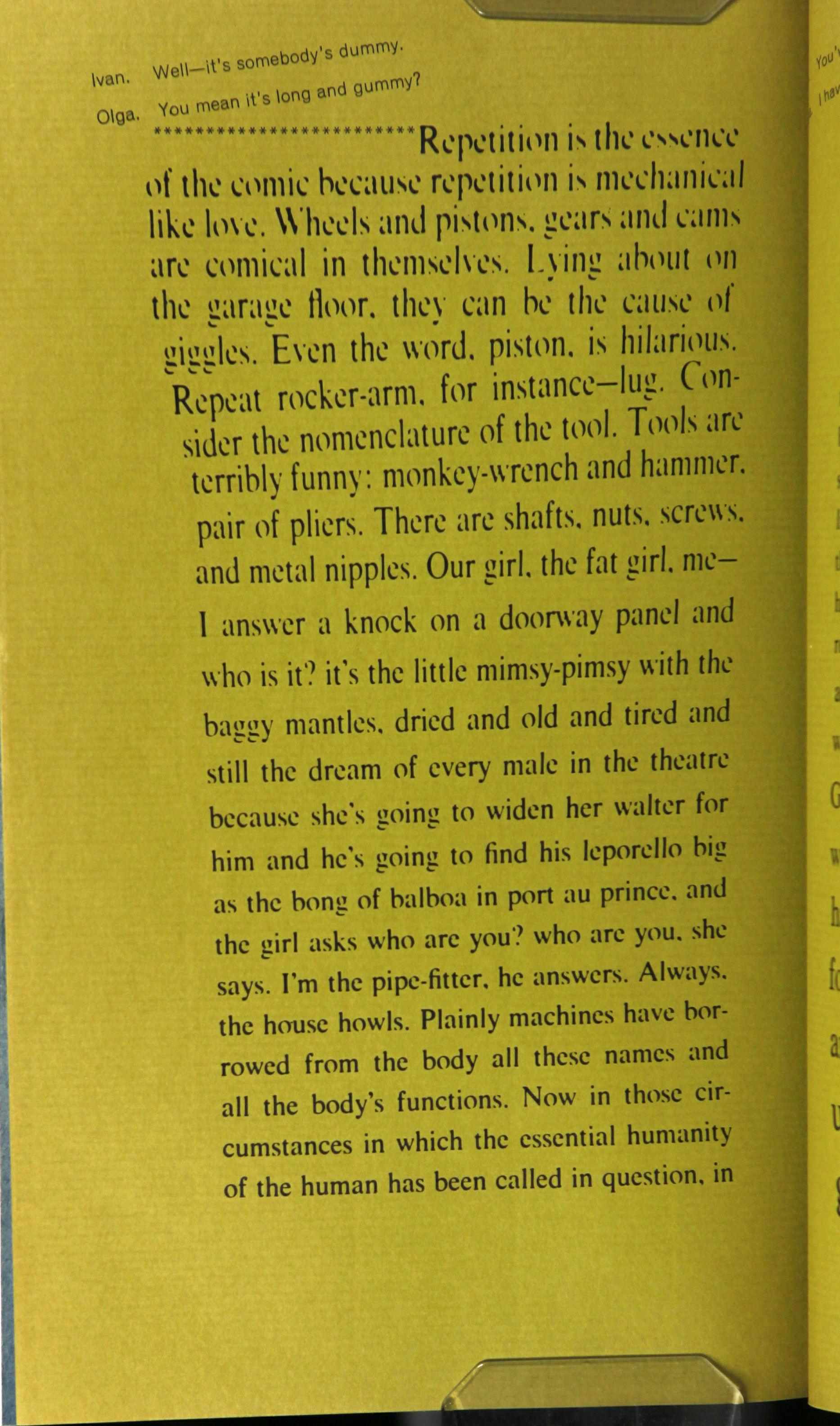
who is it'? it's the little mimsy-pimsy 'It baggy mantles, dried and old and tire still the dream of every male in the t� because she's going to widen her alte him and he's going to find his lepo I as the bong of balboa in port au prin the girl asks who are you'! who arc )'0'1. says. I'm the pipe-fitter. he answers. AI the house howls. Plainly machines ha e rowed from the y all these names all the y's functions. Now in those circumstances in which the essential human. of the human has been called in question•.
I 10') I
f Just those very circumstances, the height 0 humor has been scaled. Where the mechanical is seen to shine through the rib-cage (ribs are repetitious, they shine through the starving comically) there the funny button has been pushed; and the reason that, like punch my judy, I'll punch yours, the reduction of the human to the mechanical is amusing is because laughter is social, for example, unlike self-abuse, and the laugh is a social corrective like a curtsy or the guillotine, both of which, though we invented them (we took an age), have made much shorter work of us. Which reminds me I suppose you know the joke about the very obese Jew whose smoke was so greasy it stuck in the flue. The Germans had to slav the stack out
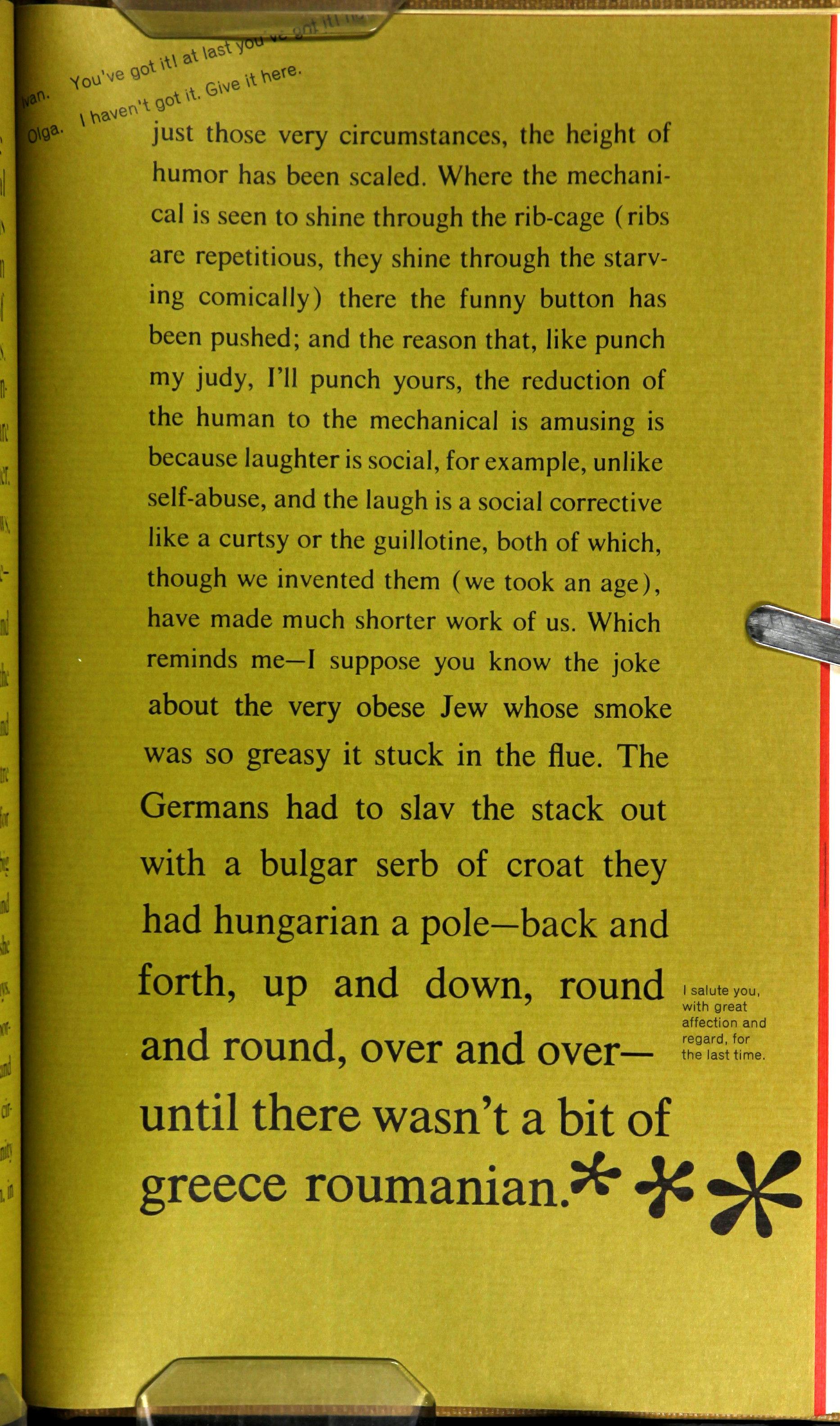
roun , over an over-
salute you, with great affection and regard, for the last time,
\ '\\ a\ \as '\Ie 9,0\ I '\ ne{e. '( OU Gi\le I '\ go\ 1\'
\ na\len
, I ,\ �, \ 'I,I
,I
own, roun
�. ere j
reece rou
1\ e:ow I)ro� In tom orr ow rnor nlnll
10 my Une:1 Toby's for 11fie:IIli 0 n s.

Notions and scruples were like s piI1 needles, making one afraid of treading or sitting down, or even eating.
Th h Wb·' ?Lies'nconns, e umor. erem r 1 trast. You may recall remarks on this behalf. Two independent notions linked by luck and happenstance. The instrument of union must be vulgar, cheap, and stupid. Coo of copulation. Pants. It's Effie's phenomenon. The penis, then, in poetry prose. Peeing, the penis is in prose. Catafalque. Listen: honeycomb, quarrier, ringaling, scorch. Sing: susurrus, glycerine, jape. Imposing penis. Melodious rose. Our pun transforms this overproud presuming Pole into a simple stick for sweeping chimneys. The sound of his own name has laid him low like a top bat hitting a ball of snow. The hiss of spit in a furnace. The malice ofchimneys.
*************************Pu
THE EYE BY WHICH I SEE GOD IS THE SAME AS THE EYE B Y WHICH GOD SEES ME. MY EYE AND GaOlS EYE A RE ONE AND THE SAME -ONE IN SEEING, ONE IN KNOWING AND ONE IN LOVING.
I believe I was discussing wby they call saliva tbe sweet wine of love, thougb I can't imagine wbo "they" are. Would you call saliva tbe sweet wine of love? Nor sbould I. Nor sbould I call it nectar or mead, denominate it cider. It goes back to birds, vomiting in tbeir babies. Perbaps it consists in the ritualization of attack these bared teetb neutralized. But nothing I say will prevent it, no description mar the quality or lessen the force of its attraction. No one can 'rtl '. agif)

paSSions, actions
I myseH believe tbat the true kiss comprises a secret excbange of words, for the mouth was made by God to give form and sound to syllables; permit us to make, as our souls move, the magical music of names; for to say Cecilia, even in secret, is to make love. How
(}rQ� �\l S World
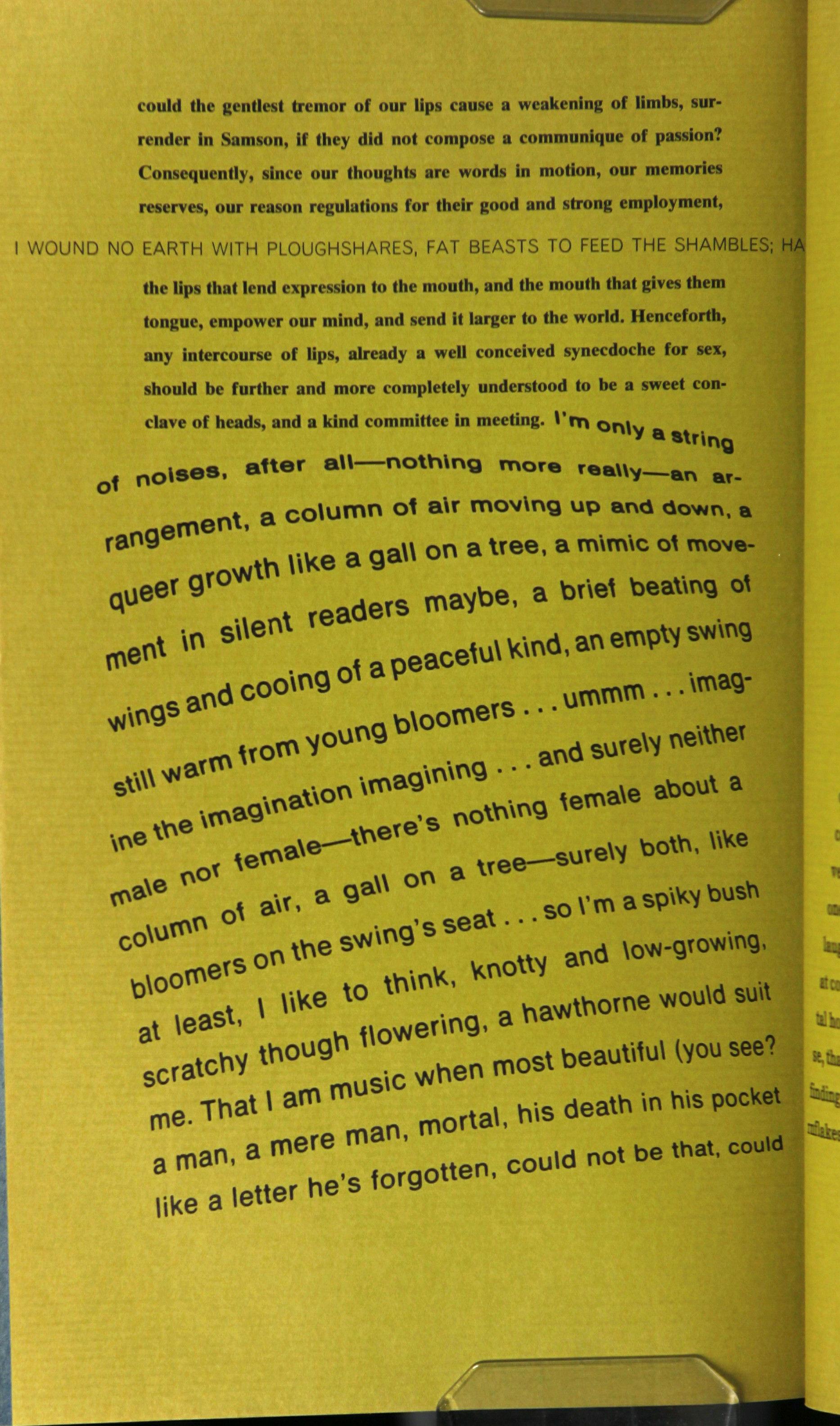
could the gentlest tremor of our lips cause a weakening of limbs, surrender In amson, if they did not compose a communique of passion? onsequently, since our thoughts are words in motion, our memories reserves, our reason regulations for their good and strong employment, I WOUND NO EARTH WITH PLOUGHSHARES, FAT BEASTS TO FEED THE SHAMBLES; HA the lips that lend expre, sion to the mouth, and the mouth that gil'cs them tongue, empower our mind, and send it larger to the world. Henceforth, any intercourse of lips, already a well conceived synecdoche for sex, should be further and more completely understood to be a sweet conclave of heads, and a kind committee in meeting. "", On\Y a atr\ng lses after al' noth\ng more rea\\ of no 'I an ar-
t a co\umn of e\r mo,,\ng up and do'Wn, a emen,
\
rowth
treaders 01 a peac man mor a, he's forgotten, like a letter
••
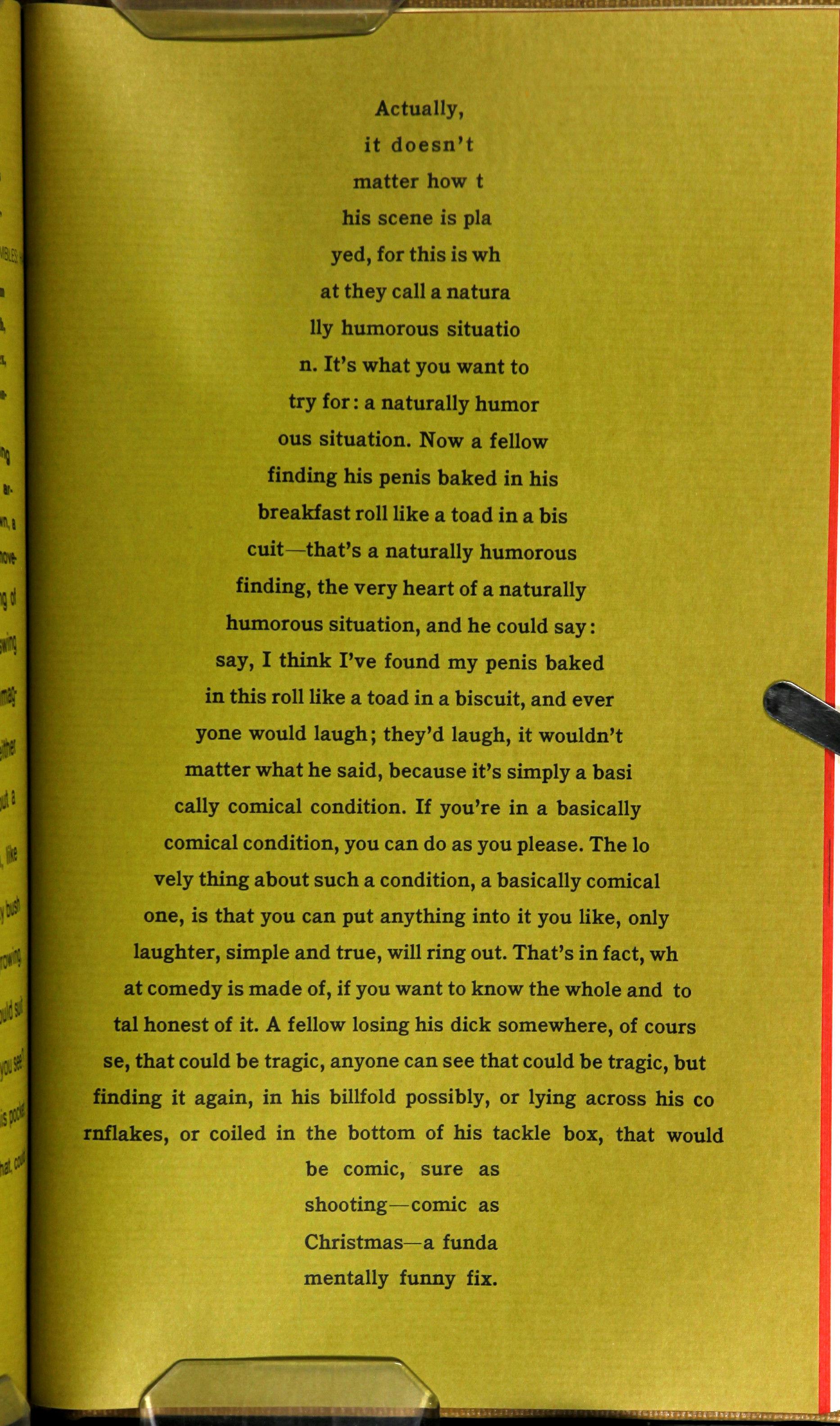
Actually, it doesn't matter how t his scene is pla yed, for this is wh at they call a natura lly humorous situatio
n. It's what you want to try for: a naturally humor ous situation. Now a fellow finding his penis baked in his breakfast roll like a toad in a bis cuit that's a naturally humorous finding, the very heart of a naturally humorous situation, and he could say: say, I think I've found my penis baked in this roll like a toad in a biscuit, and ever yone would laugh; they'd laugh, it wouldn't matter what he said, because it's simply a basi cally comical condition. If you're in a basically comical condition, you can do as you please. The 10 vely thing about such a condition, a basically comical one, is that you can put anything into it you like, only laughter, simple and true, will ring out. That's in fact, wh at comedy is made of, if you want to know the whole and to tal honest of it. A fellow losing his dick somewhere, of cours se, that could be tragic, anyone can see that could be tragic, but finding it again, in his billfold possibly, or lying across his co rnfiakes, or coiled in the bottom of his tackle box, that would be comic, sure as shooting-comic as Christmas a funda mentally funny fix.
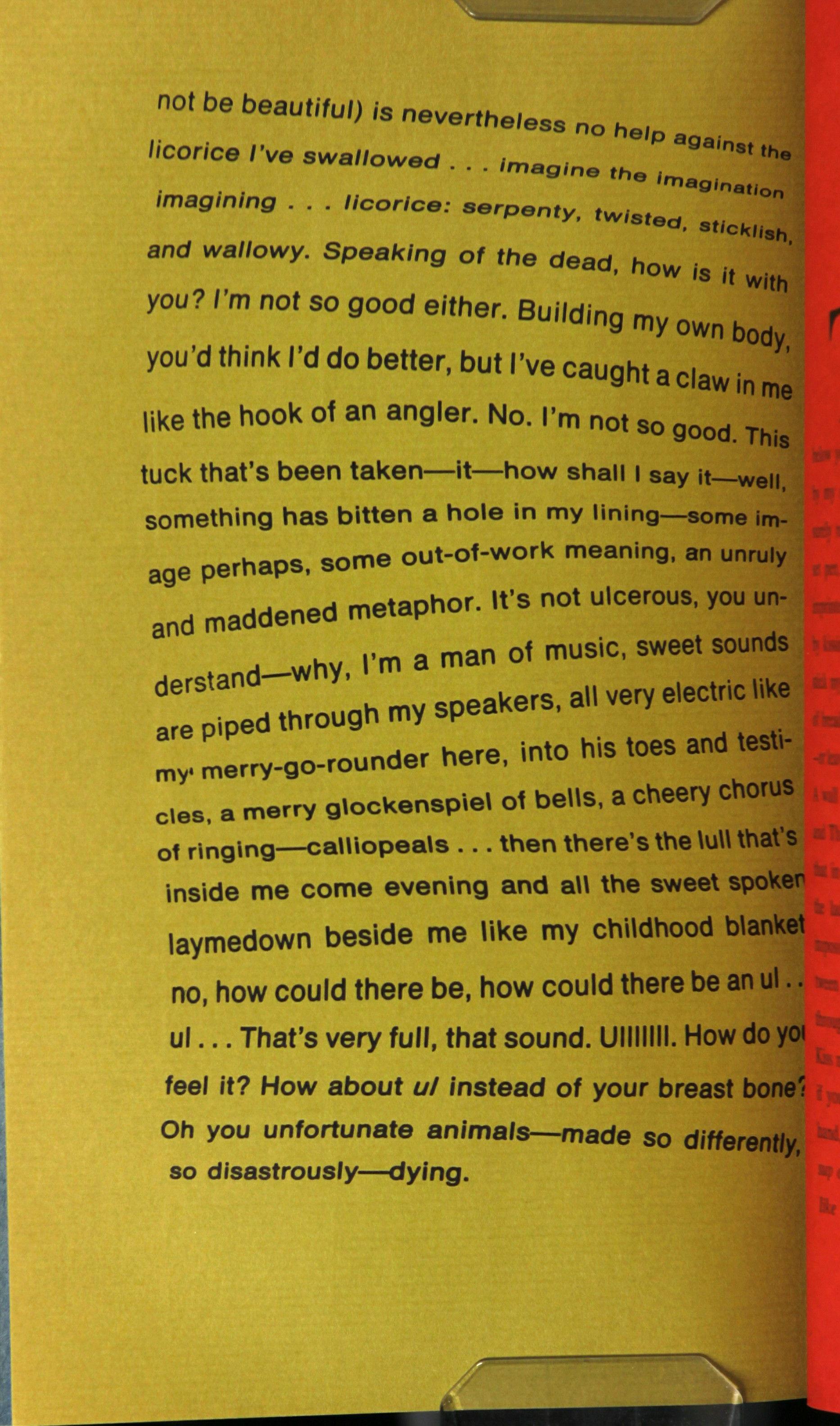
Imagine th • e Irnagl ImagIning licorice. s nation erpenty, tWlste d d, stick', an wallowy. Speaking of th .", e dead how·.s It
tuck that's been taken it how shall Is· ay It '.veil I something has bitten a hole in my lining some 1mrs nevertheless no hel
derstan W , are pipe r e\as, a merry g'ockensp\e' of be\\s, a chee� chorus of ringing ca"iopea's then there's the \u\\ that'S; inside me come evening and a" the sweet spo\c!
1aymedown beside me 'ike my childhood b\an no, how could there be, how could there be an ul. ul That's very full, that sound. UIIIIIII. How do
Oh you unfortunate anima's-s-made so differenfl so disastrously c'ying.
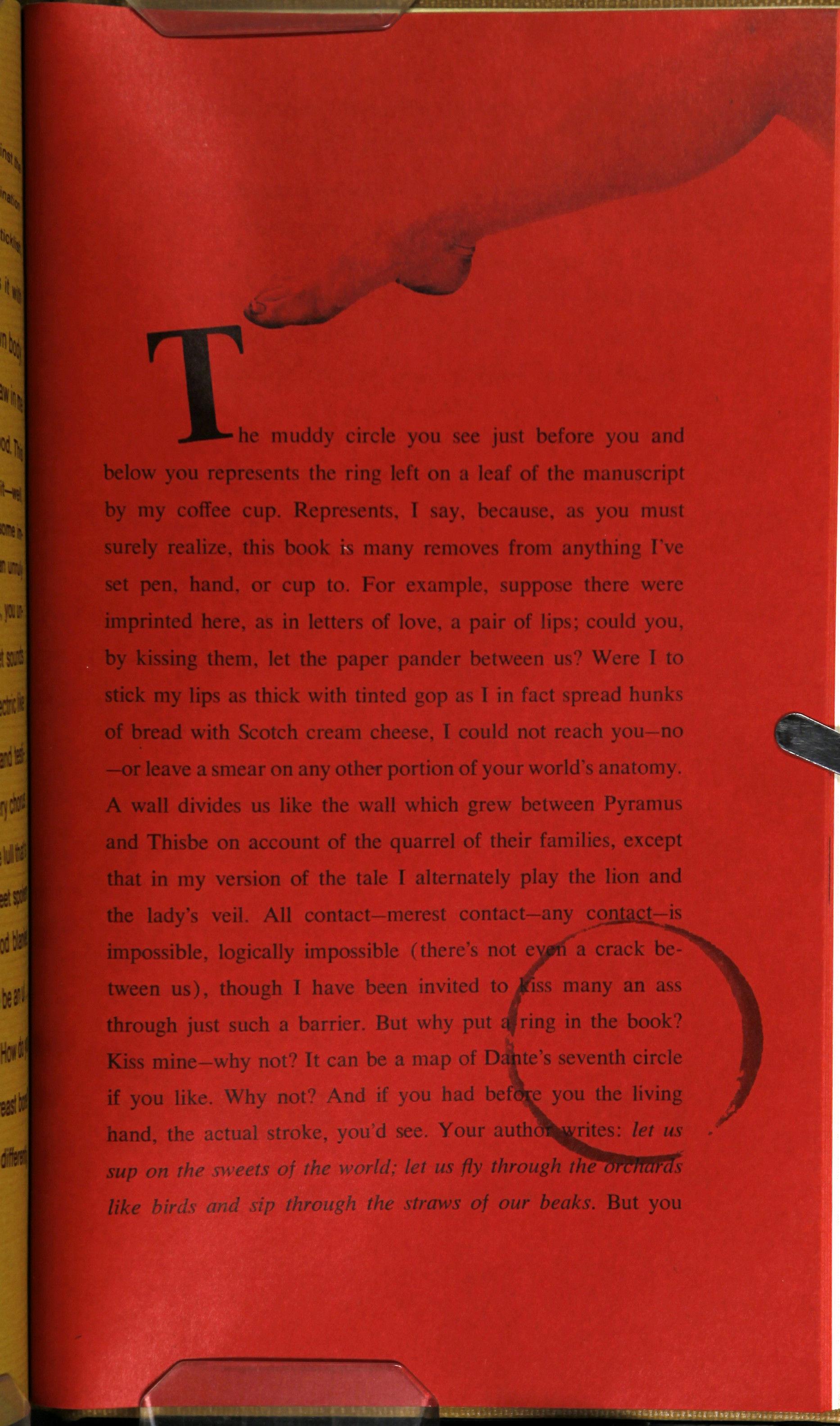
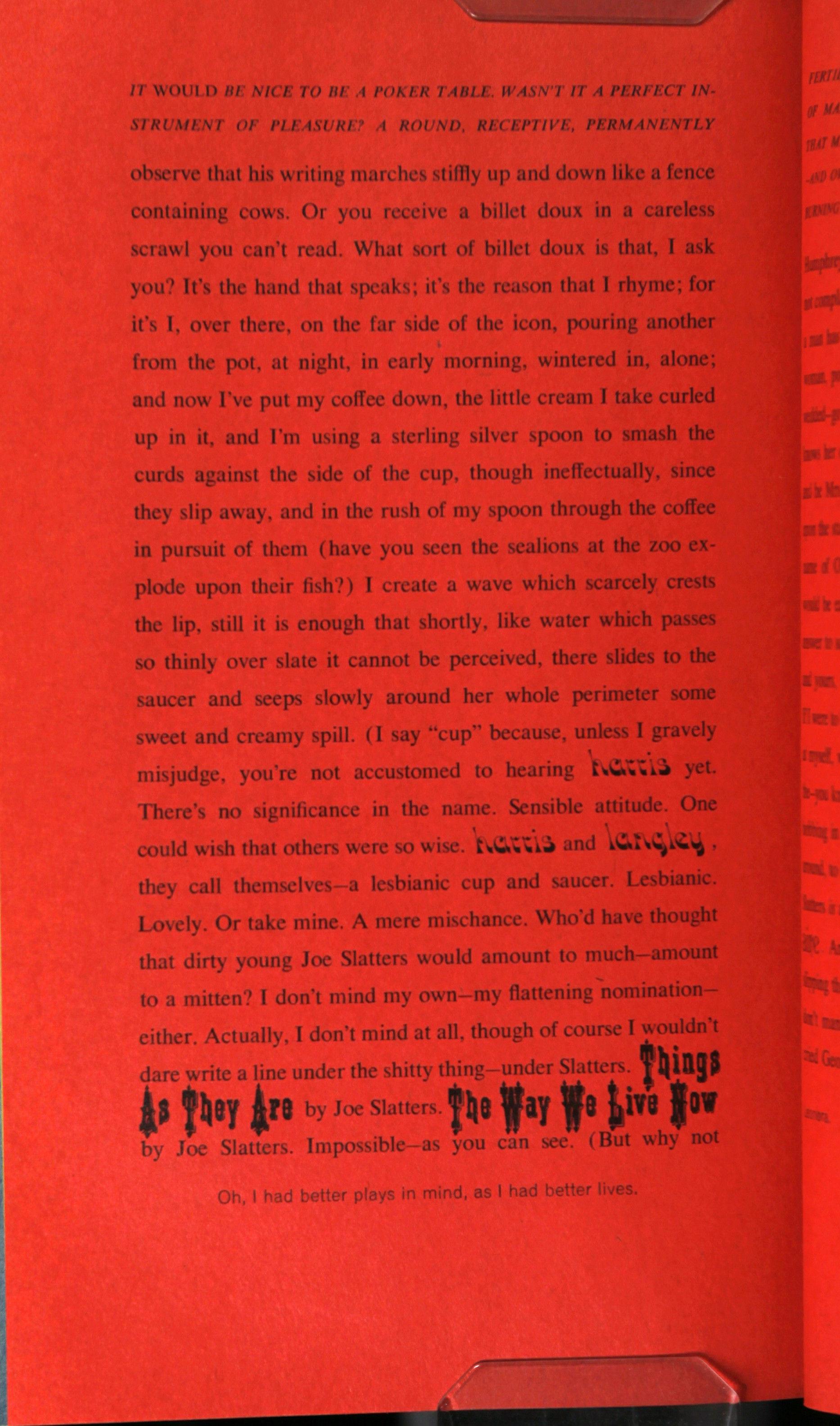
IT WOULD BB NIC. TO BE A I'OK£R. TAIU. WASN'T rr A STIt.VItIBNr 0'
I'LEASUREf A It.OUND. "BC�I'TIY., I'DMIAN observe that bJa writinSlilarches tUlly Up and rawl you can't I cad. \'lhlt sort d. billet dou" ia you? It' the hand that : it' the that I it' I, over there, on the far side of the icon, the pot, at night, in early m I, win and now I've put my coffee down, tho little CI�iil I up in it. and I'm using a sterling silver CIII.ls &pinst the ide of the cup, though iDe they lip away, and in the rush of my in pursuit of tbellt (have you seen the upon their fish?) 1 create a wave which the lip, still it is enough that shortly. like walei' so thinly over slate it be saucer and seeps slowly her sweet and creamy spill. (I say "cup" because, misjudge, you're not ICCIlmAlled to There's no significance in the name. could wish that were so wise. they call themselves a lesbianic cup amd saucer. Lovely. Or take mine. A mere ml Who d that dirty young Joe Slatters would amount to to a mitten? I don't mind my own my fta either. Actually, I don't mind at all, though of dare write a line under the shitty thing l.ode. Slatters. fl by Joe Slatters. by Joe Slatters. Impossible-as you can see. ( ut
Oh, I had better plays in mind. as I had better lives.
like fingers into buttoo � every day.) "The devil take the �
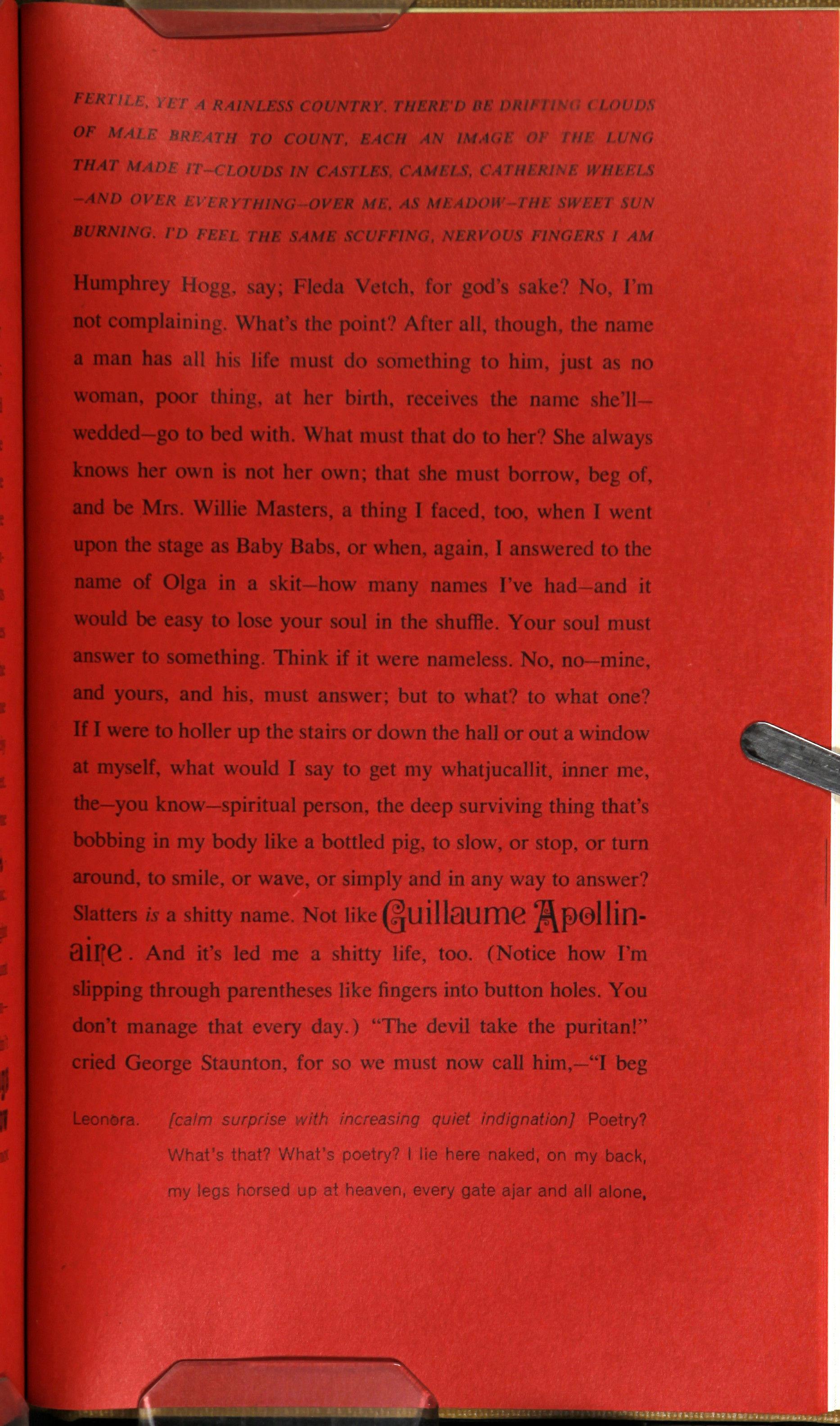
[calm surprise with increasing quiet Indignatlon1 P
What's that? What's poetry? I lie here naked, on lilt
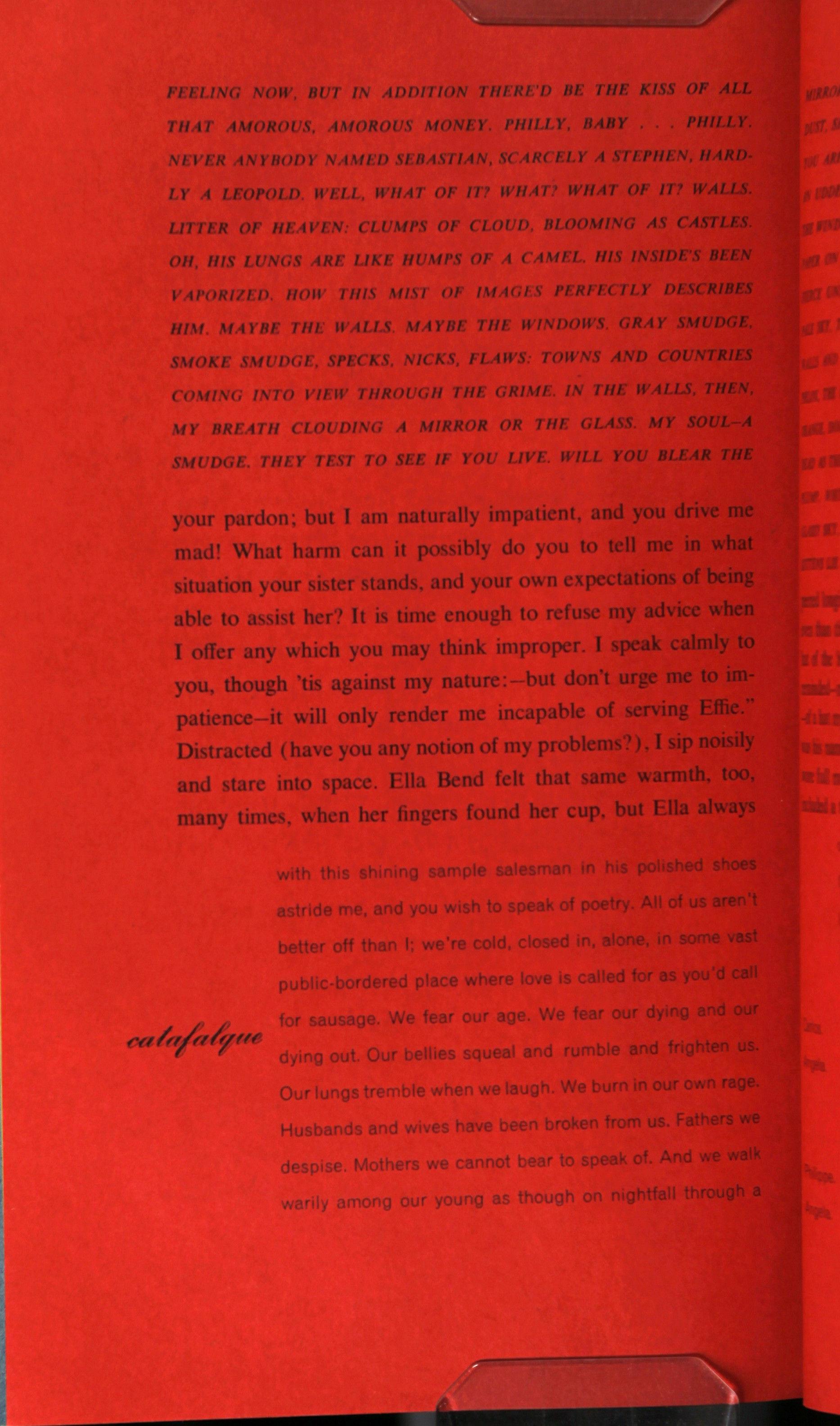
""fIWIf: _.811
AU .OW 111l$ �'F
.111. ""'1". Tn ;A ., WflDO'.
COJll G INTO VI";
MY uurN C' OflDDIG A M
SJlflDtJ r• ..,. ".,. TO ;batl_ mad! times, with ttl•• for dying out. Our bel_ Our lungs tremble when we laugh We Husbands and wives helVe been despise. Mothers we cannot bear to warily among our young as though on
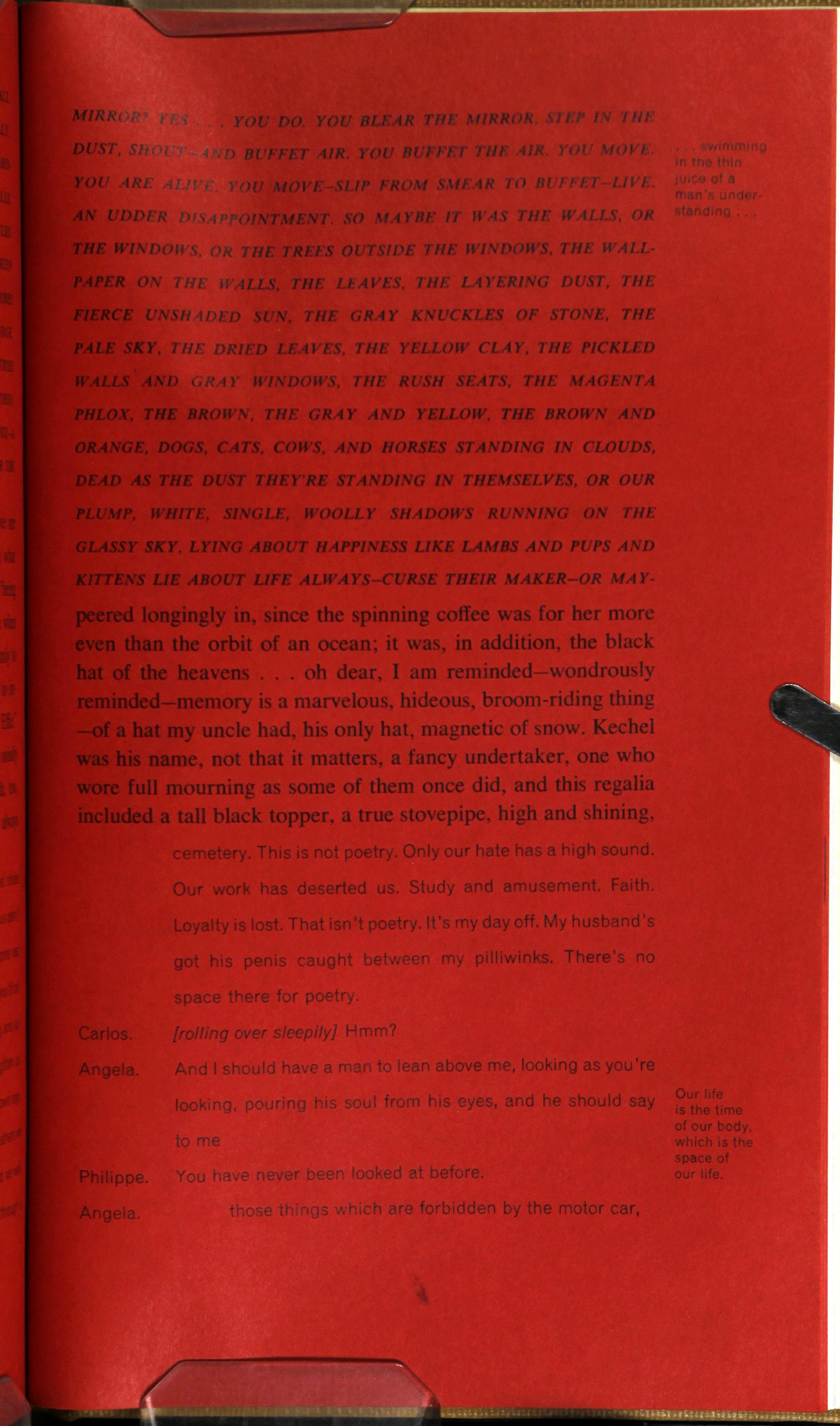
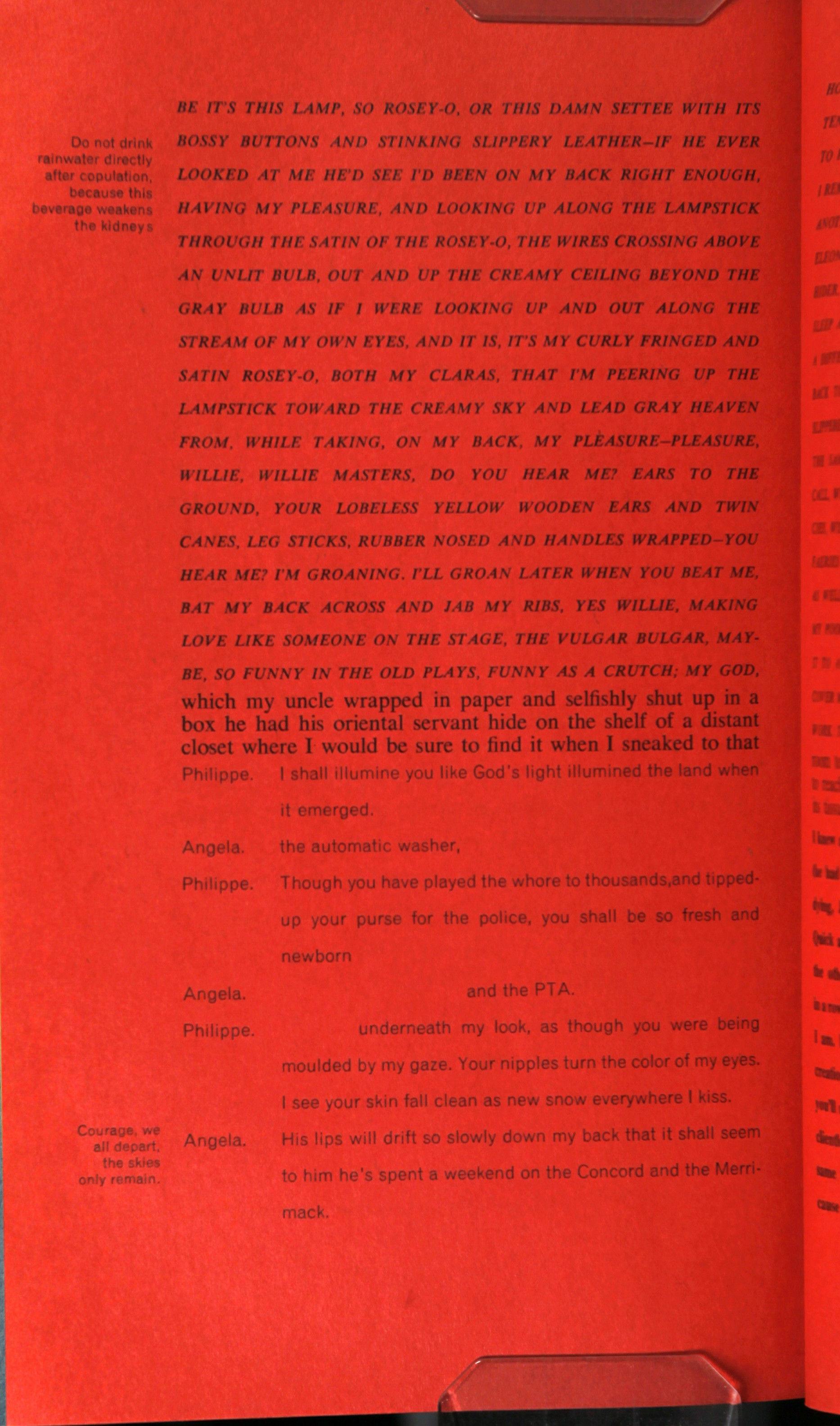
H trs THIS UMI', SO ROSBY-O, O. TillS DAM/I 00 not drink ao.sn aV"ONS AND STINKING SUI'I'.RY rainwater directJy after copuletion, LDOlCaD"'T MB RB'D SEE r» IIDN ON MY beeaute thlt bevarao. weakena R",VINO MY PLEASURE, AND 1.00K,.,..'O UP the kldn.ya
TRItOUOH THE SATIN OF THE ROSEY-O, THB Wl
N VN"I' sut». OUT ND UP TH. CU M., O Y aUl.B AS IF I WBRE l.oolClNO UP AND STIt&4M OF AlY OWN BYBS, ND IT IS, IrS IIY C S TIN ROSEY-O, BOTR MY CUJtA6, TRAr rll
LAMI'STlClC TOWARD THE CREAMY SICY .AND TROM, WHILE T"'KING, ON MY BACK, II'{ Po WI"·IB, WII,',IE MASTERS, DO YOU R� _I GROUND, YOUR CA BS, LEO STICICS, RUB.ER NOSED .AND IIA
BEAR liD rM GRO NING, ru: OROAN LATD T IIY CK AC.ROM AND lAB MY IUB6. .,. LOVE UKE SOMBONE ON TRE STAGE, Til. PrJ .E, so FUNNY IN THE OLD PUTS, FUNNY .u A which my uncle wra in paper and box he had his OJ iental servant hide OIl the closet where I would be sure to find it I Philippe. I shall illumine you like God's light It emerged. Angela. the automatic washer, Philippe. Though you have played the whore to t up your purse for the police, you , newborn Angela. Philippe. and the PTA. underneath my look, as H+ough .,.. moulded by my gaze. Your nipples turn the I see your skin fall clean as new snow
I Courage we all d cart. Angela.
His lips will drift so slowly down my back � It to him he's spent a weekend on the Conc:o.d
0" 'I r rna.". mack.
"
'SSING BY
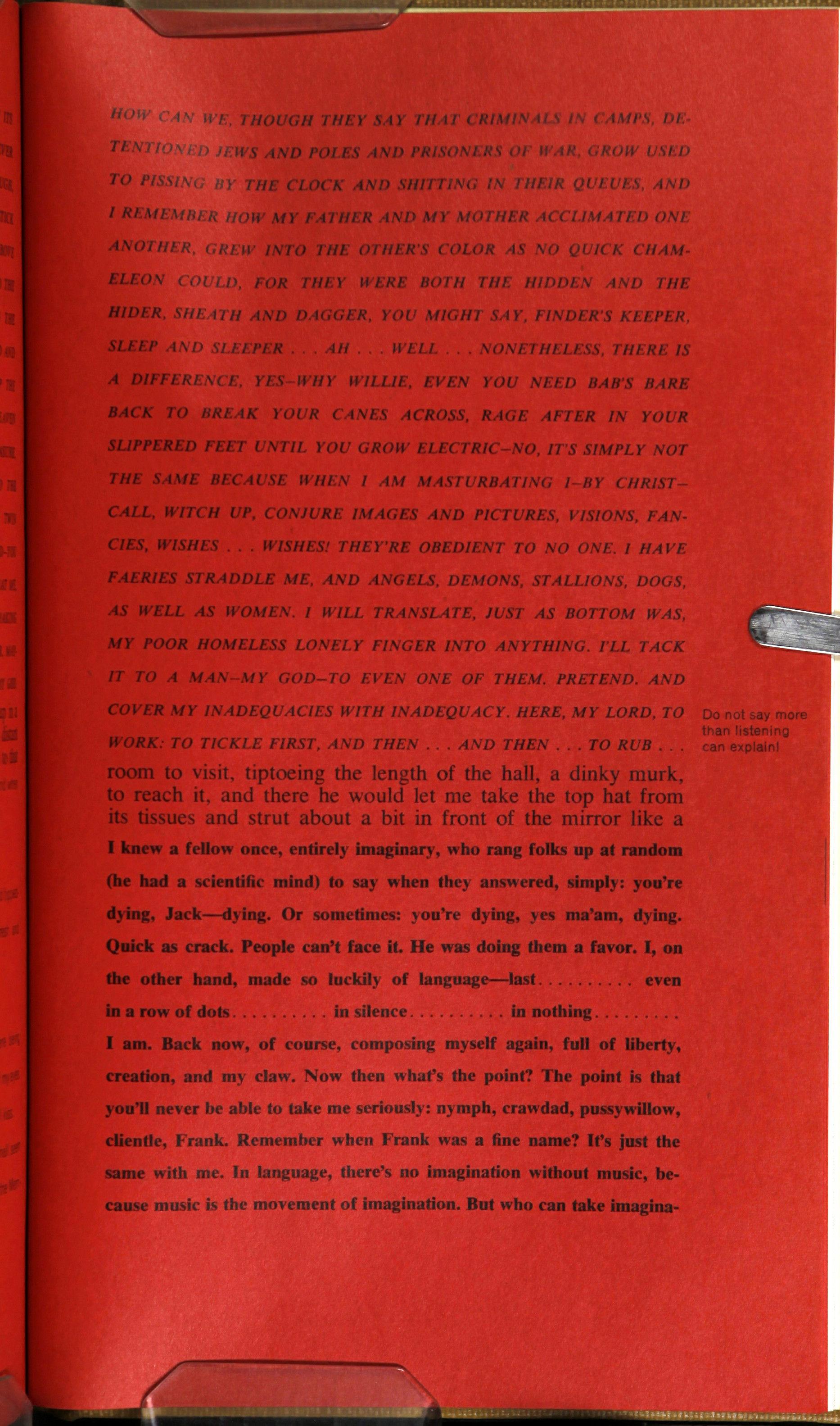
be able to bike me sClIet.s!y: UYu¥"
Frank. Renaember wben Frank WIll • IRe with me. In langlwage, the. e"s DO musk is the move ent of 1 1 1I1"'0Il. Bat who
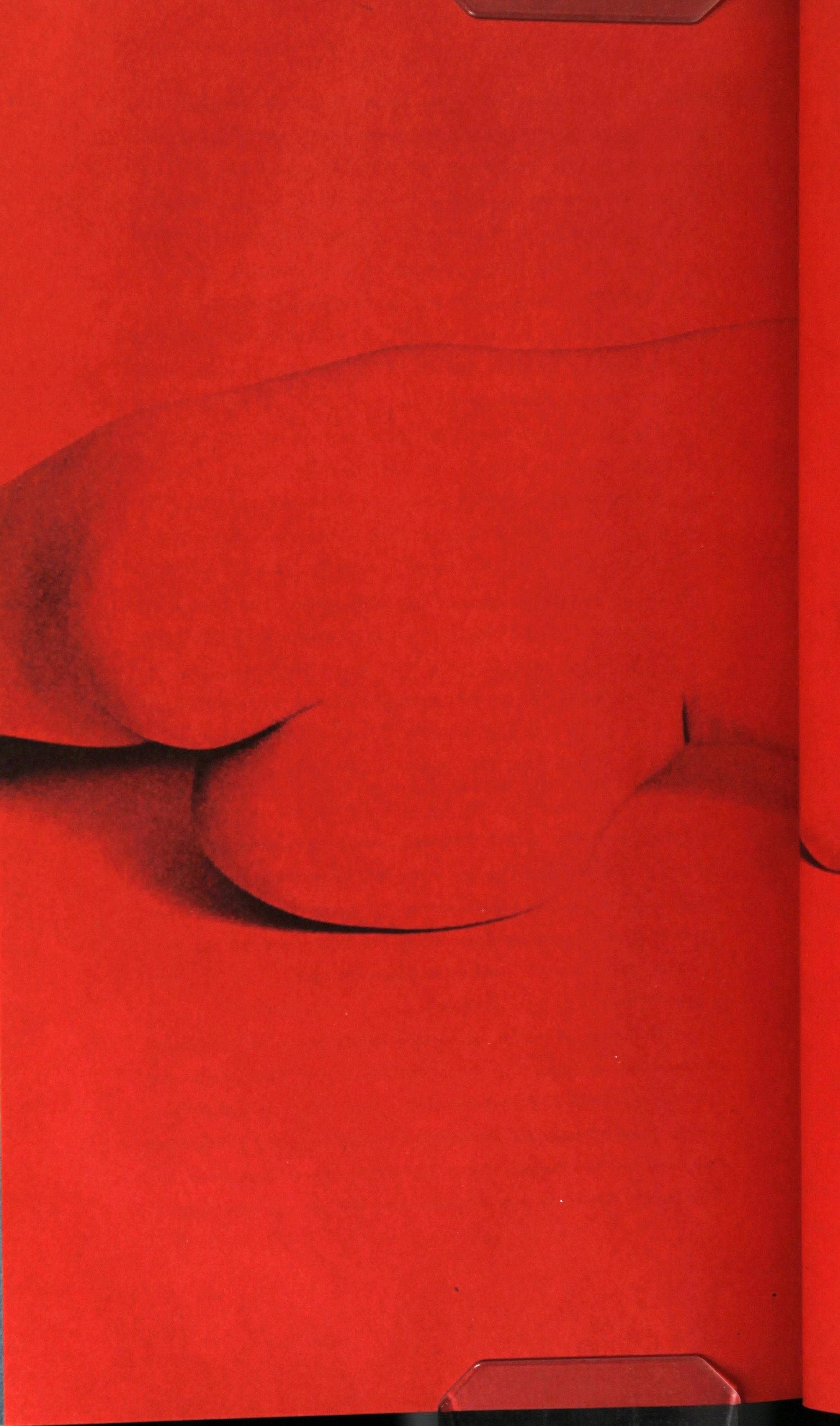
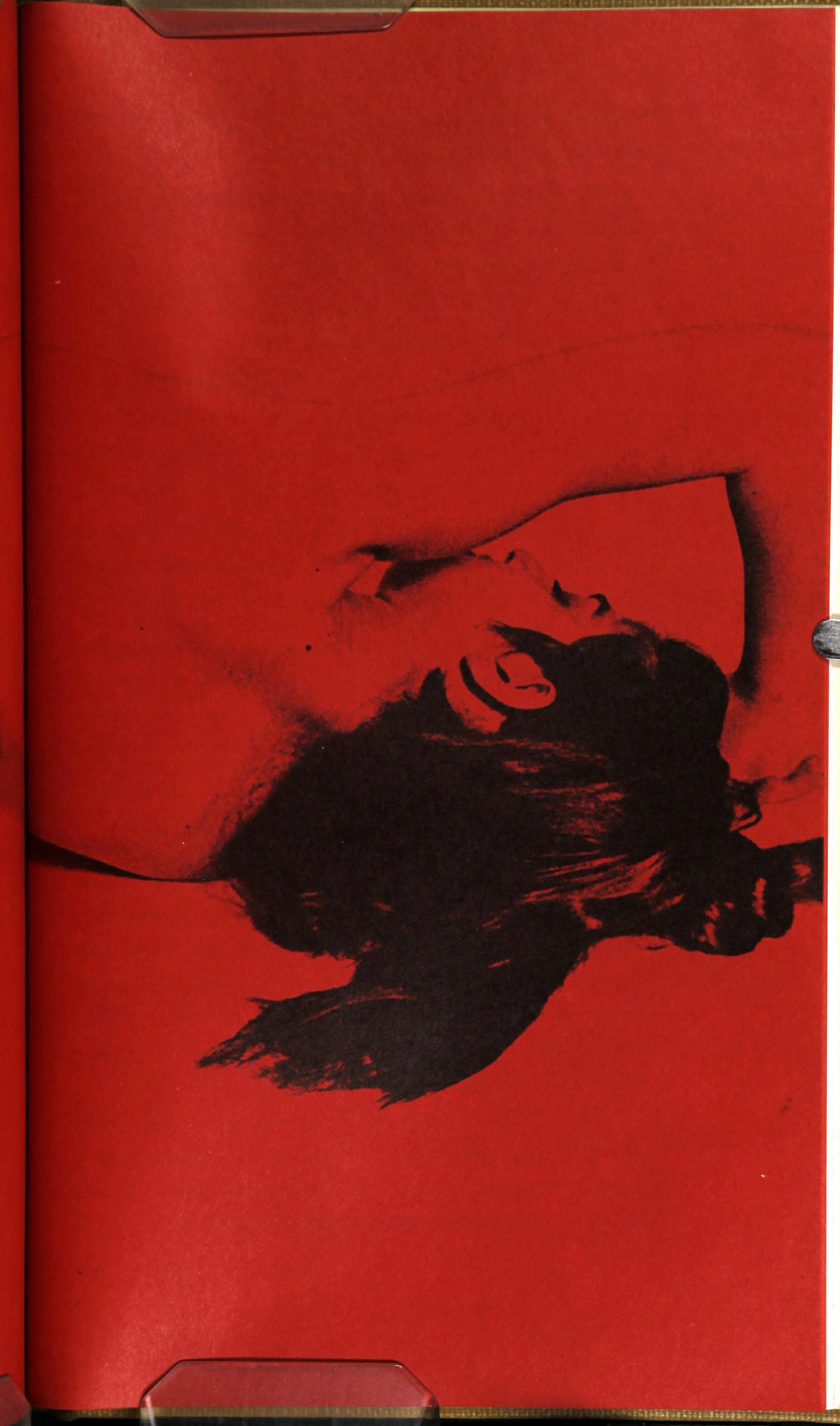
DliDJtlel, doublinl myself, until I feU to widonlna woO it made, Iro' 10 nervOUI he wee OIl biB rule for I did feel I was ca ud Iloobd tcadlly iDtothatshiniqhat. Rna t my will, the da.toea would tely and draw me down. Then I it on my held again, to cover m with JOlt color of the blacks, for I thought I should fall did. More than once ince I've I and found myself tenified by the oontiDent 01
I've fallen to the around aDd cl·ttclwl bard to my dear life. Dear life. What an ex is a in which you lose position. 'I1Iia 0'Vel' llae the hIli.;. coffee t"IIII,
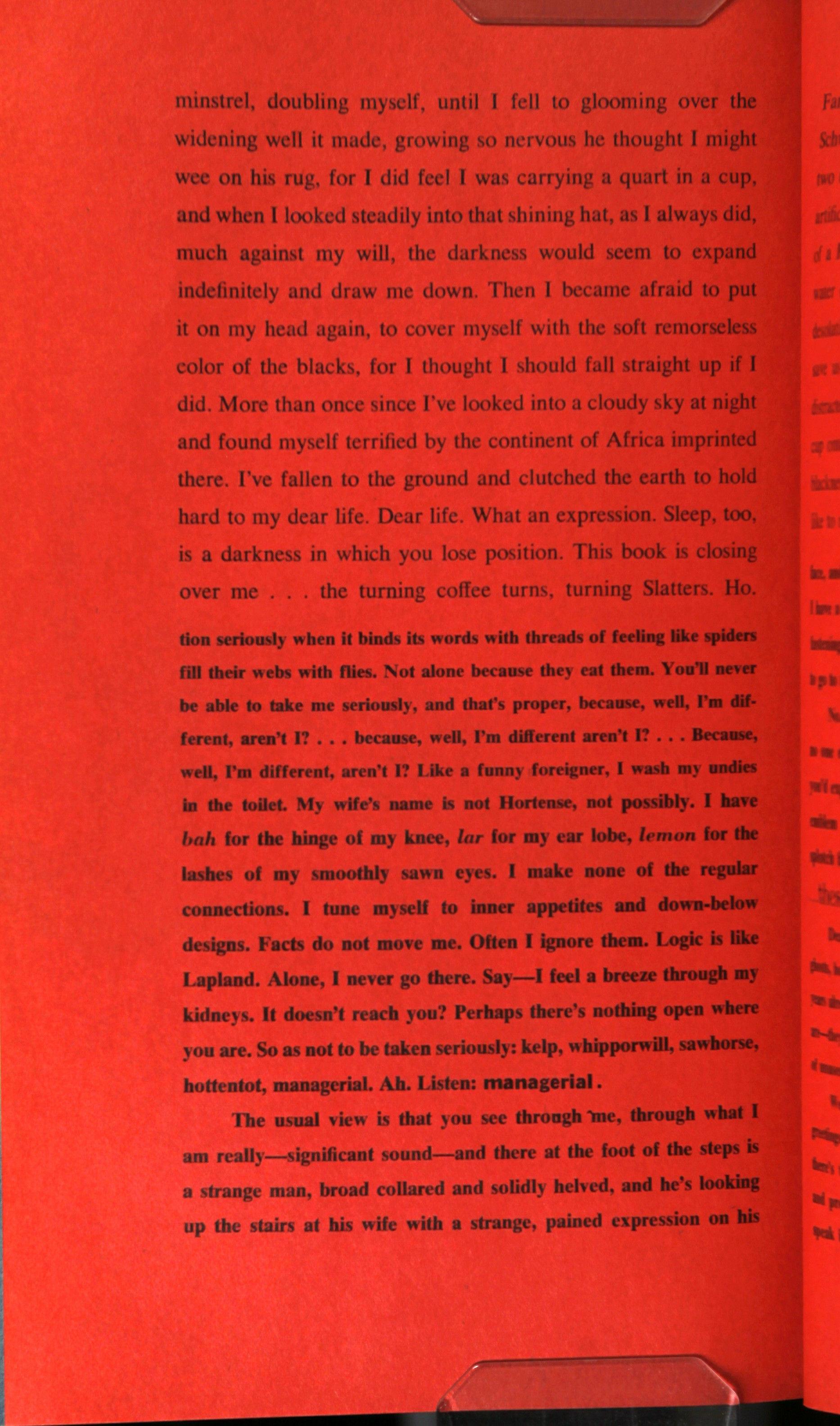
am really II cut • strange mae, broad collared Md IOlidIy up the stain at hiI wife wida a
..., n 'tftLae • ,. ..,....... ..., of., I I 110 IlIna'ao
tit be 110 � I ...
IddMYL b JNda ,..7 yOll8n. So _IIOC
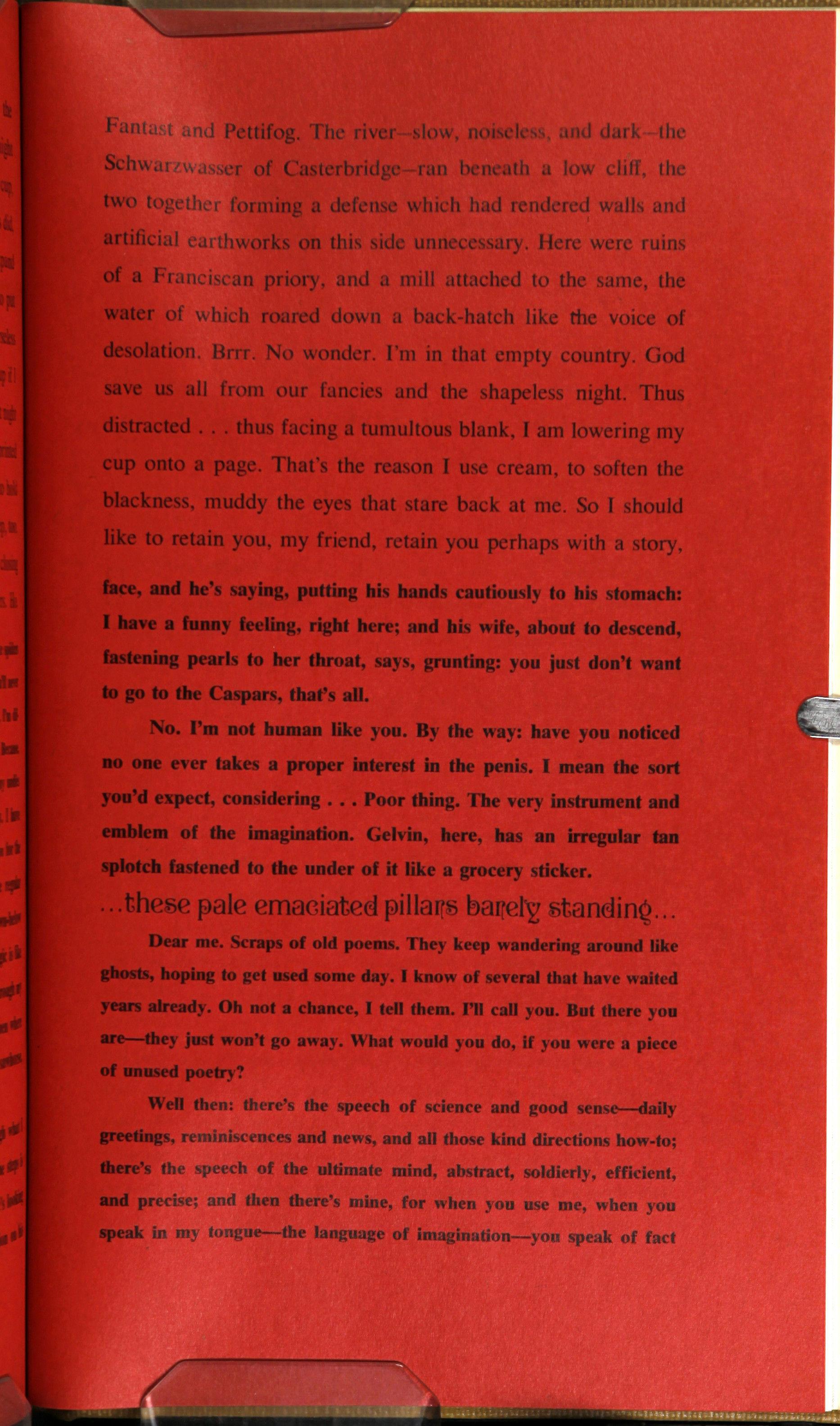
1DIu, tar "Jaen YOB 1I8e me, "bea jon on YOB speak of fact
ther
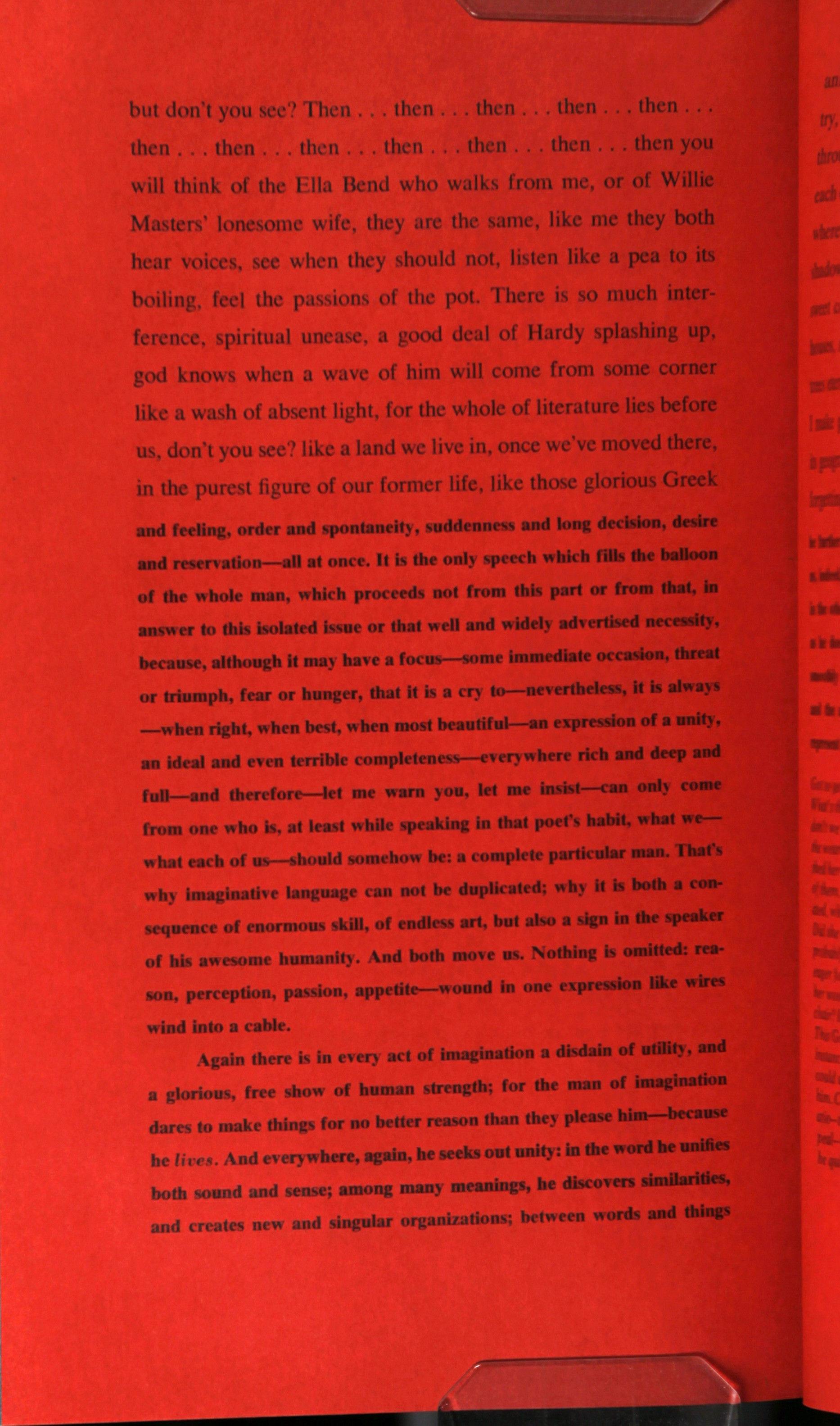
• •., aIIIL �

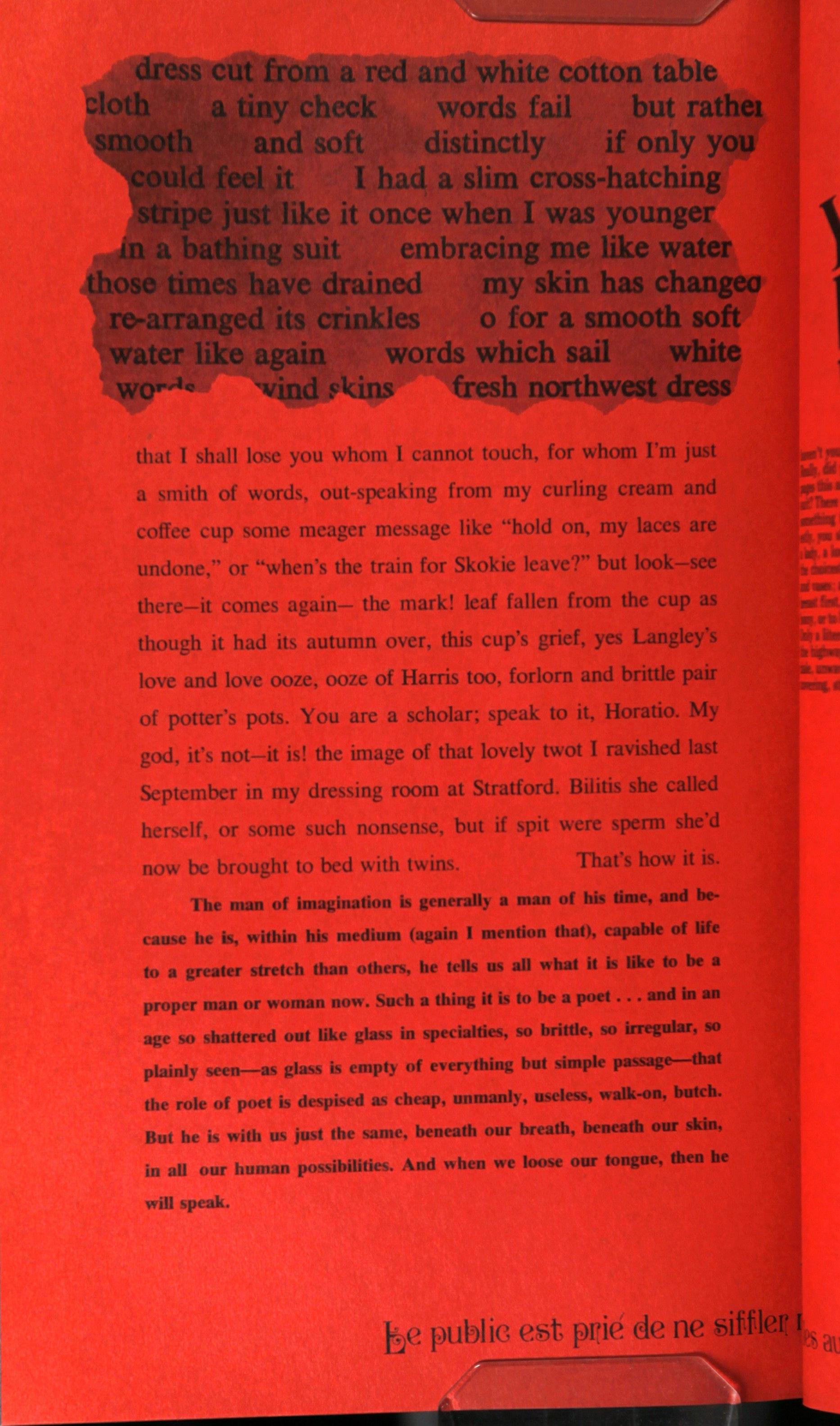
that I shall lose you whom I c touch, for a mith of words, out-speaking from my cu coffee cup some meager mes age like "bold on, my undone," or "when's the train for Skokie leave?" but there it comes again the mart! leaf fallen though it had its autumn over, this cup's 81ief, love and love ooze, ooze of too, forlotn aod of 's pots. You a I e a scholar; peat 10 it, god, it's not it is! the image of that lovely twot I September in my dressing room at Ont. Bililil herself, or some such nonsense, but if spit were now be brought to bed with twins.
TIae of doD II
CUIe lie II, wIdaID (..... I ...", to. propel' or BOW. s.dI II
IIge 10 Old like at- illplaialy the role of poet Is d
But be is with US just the same, iu aU 001' hu will speak.
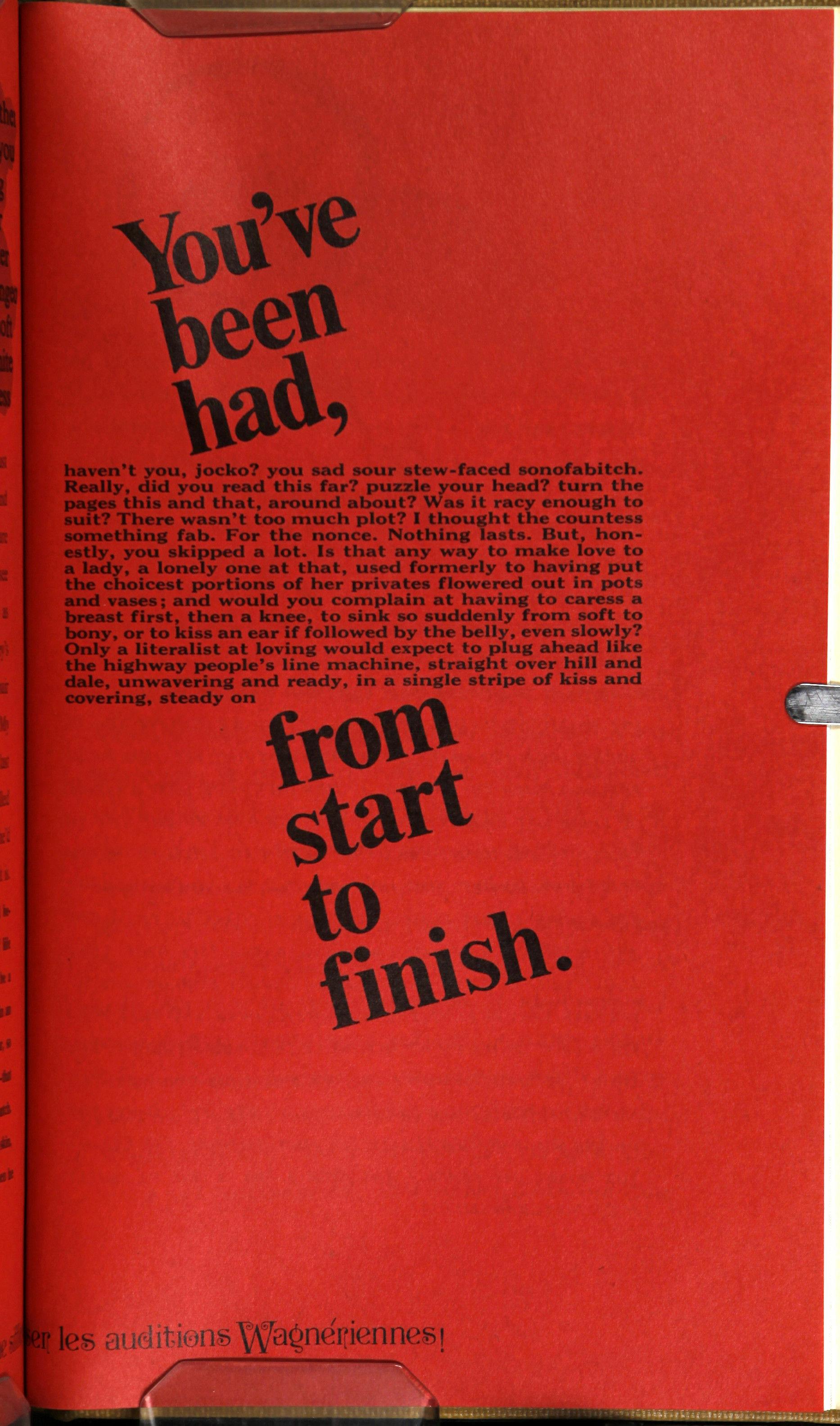
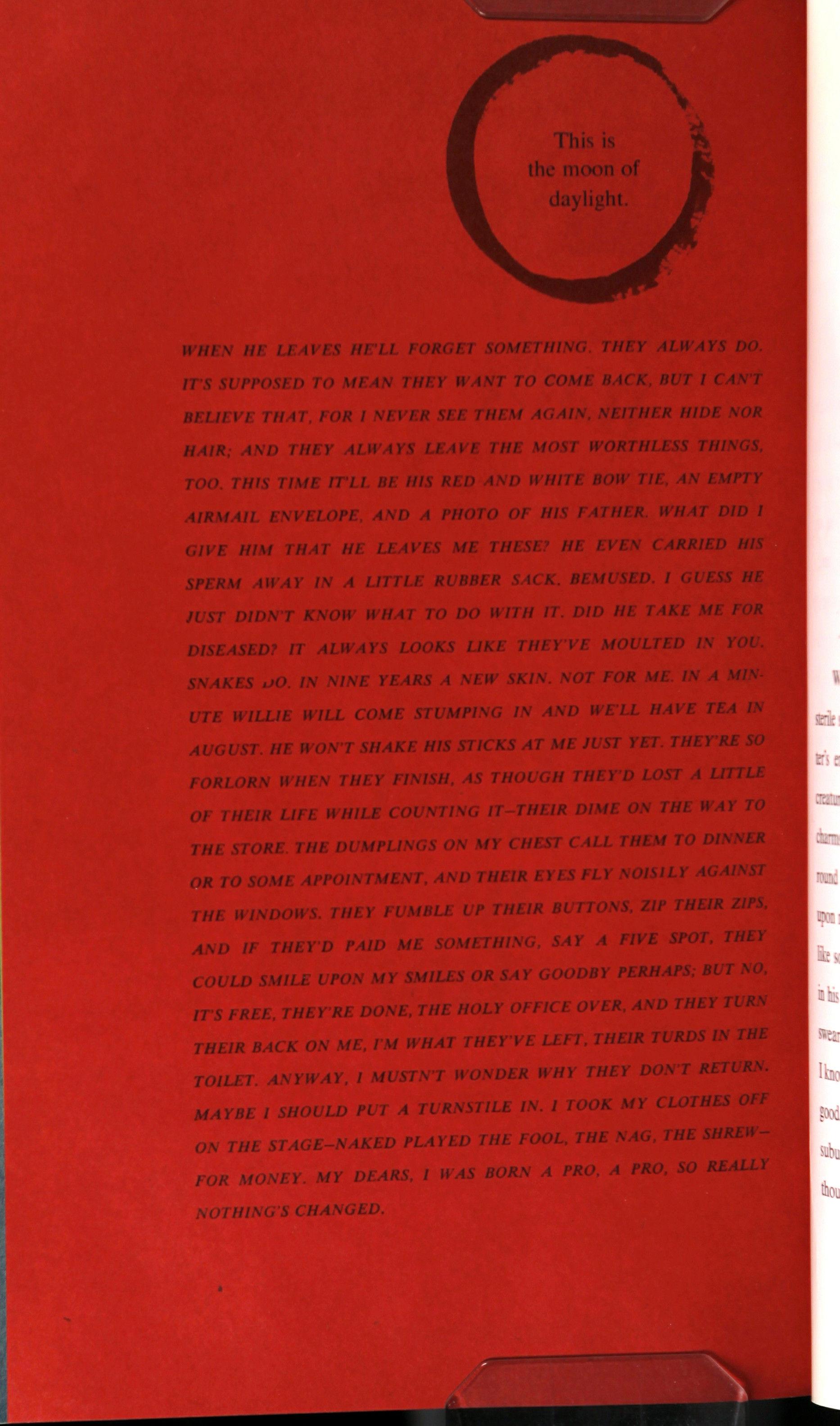
rIlO ,">", line IUhn ilion
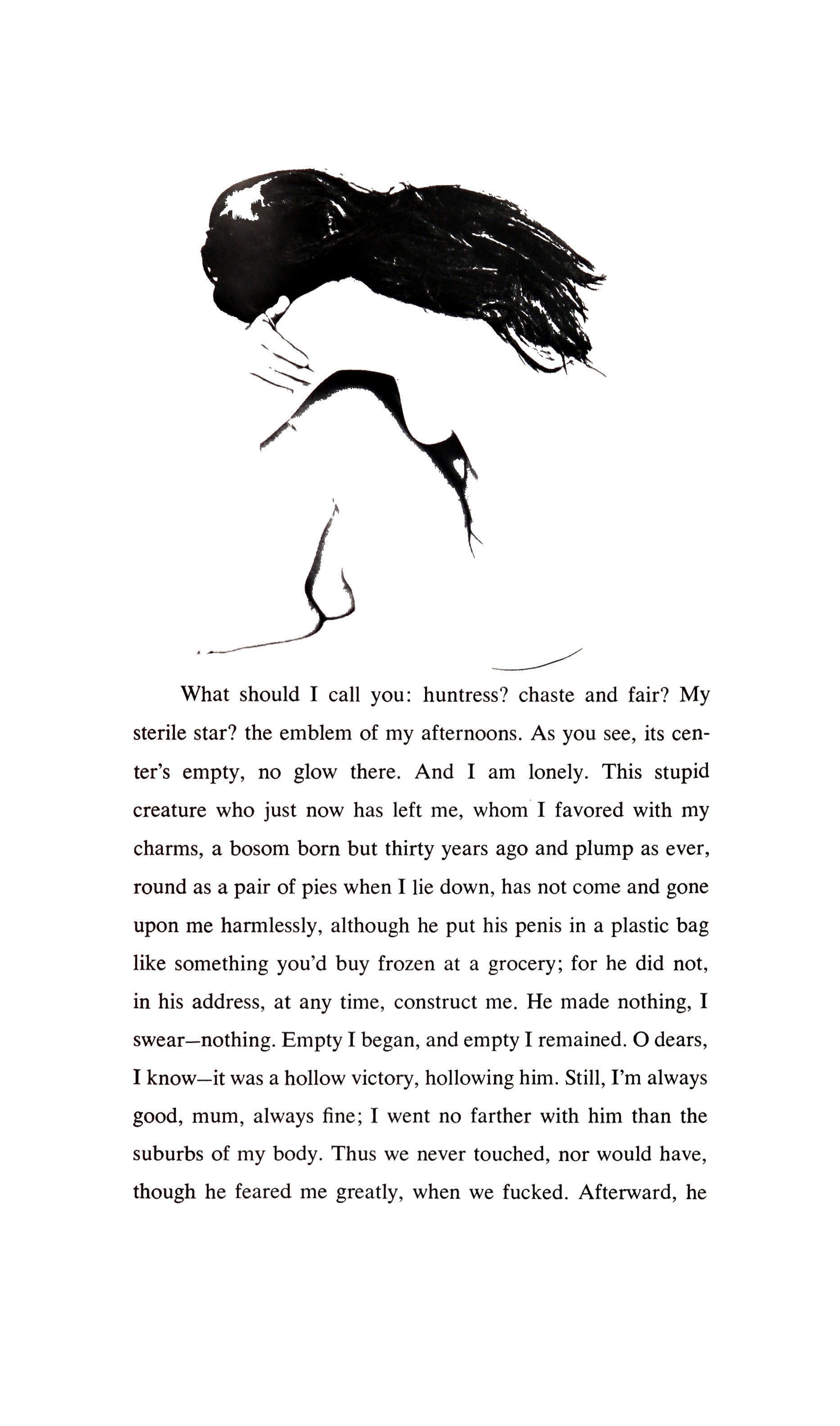
What should I call you: huntress? chaste and fair? My sterile star? the emblem of my afternoons. As you see, its center's empty, no glow there. And I am lonely. This stupid creature who just now has left me, whom I favored with my charms, a bosom born but thirty years ago and plump as ever, round as a pair of pies when I lie down, has not come and gone upon me harmlessly, although he put his penis in a plastic bag like something you'd buy frozen at a grocery; for he did not, in his address, at any time, construct me. He made nothing, I swear nothing. Empty I began, and empty I remained. 0 dears, I know it was a hollow victory, hollowing him. Still, I'm always good, mum, always fine; I went no farther with him than the suburbs of my body. Thus we never touched, nor would have, though he feared me greatly, when we fucked. Afterward, he

carried his seed off safely in a sack. Well, what the hell he's some hybrid maybe, strain of Burpee, supergiant, extra early, so I should, had he not worn his celloguard, have been but seven months to bud, a week to bloom, and three more days to fruiting. This moon, then, is something like me. For one thing, I'm an image. I still reflect the spots which lit me all those years. I turned in them, revolved you know the way it was I shook. My hands felt for me, slowly slid along my thighs so every customer could dream his own were sliding slowly in that sliding place. Poor gentlemen. I'd like to laugh at them because I cannot cry. Well, I'm no longer the nooky-look-see sort of tease I was, I can tell you that. I used to sweep my nipples clean and blacken the stage in a single gesture. Their own straining undid them, you know the starting of their eyes, the stare; it was never as dark as it seemed. Anyhow, that's the way it worked: I gave them tantalizing glimpses, passed behind clouds constantly, or simply changed my shape into a mouth, to a curl, to a shiver. Sometimes an actress, shut up in her dressing room, loses herself in her role and emerges a queen; but I moult my dress and panties on the stage and only wish it were another, not myself, that I discover. Then I dispose my flesh to pretense like a paper napkin; put on passion as I. put on paint and powder; try to believe I've flung my body in the wings and out of seeshot with my spangles. Still, wherever I am, I'm lonely. Night frightens me. I do not watch the moon there. Only by daylight, when it seems almost a tissue, frail and antic, can I bear it and its scrutiny. I want to have familiar things around me when a man is on me; he'll be too strange, too foreign for me, otherwise. Something unforeseen might happen. It must have the carpet,
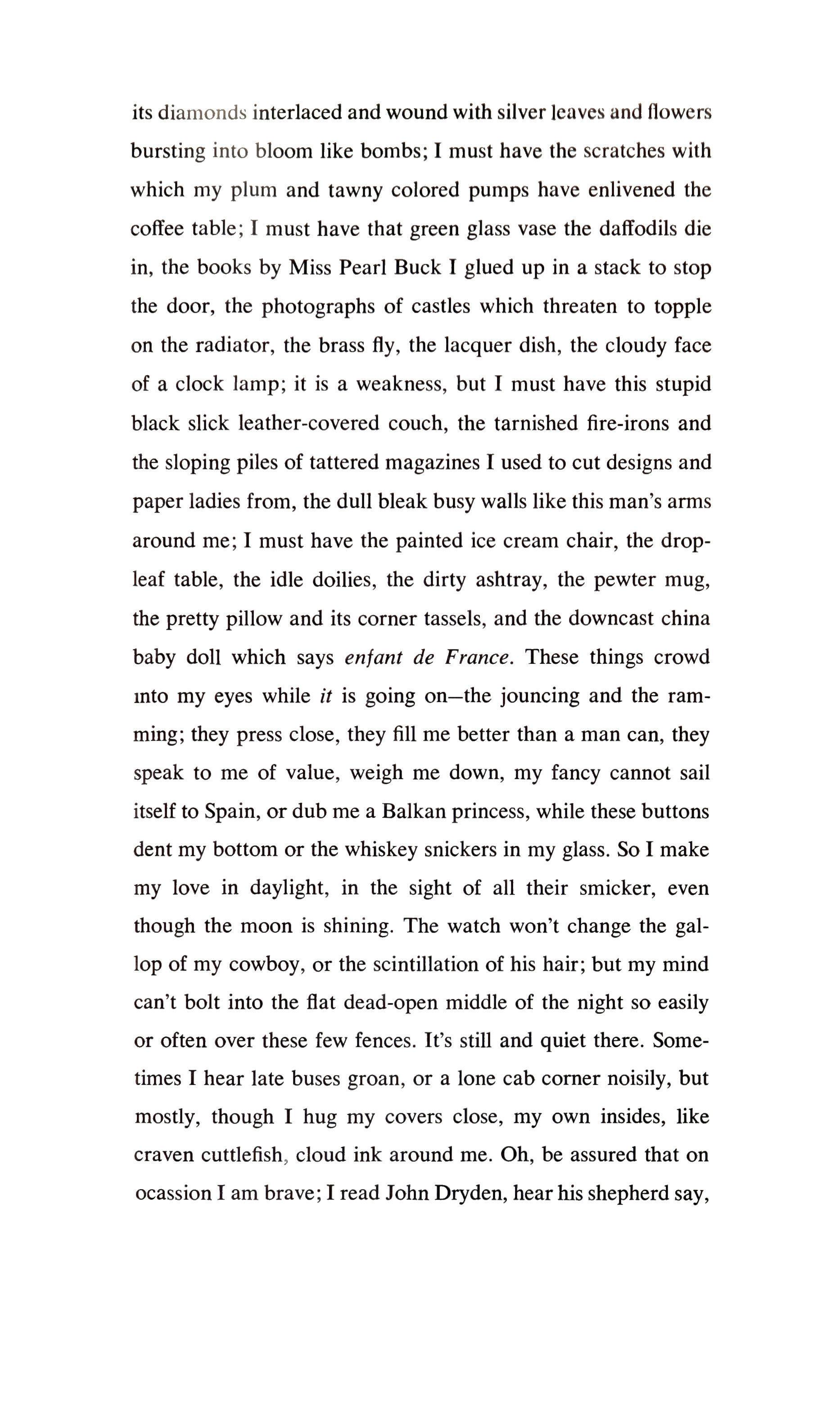
its diamonds interlaced and wound with silver leaves and flowers bursting into bloom like bombs; I must have the scratches with which my plum and tawny colored pumps have enlivened the coffee table; I must have that green glass vase the daffodils die in, the books by Miss Pearl Buck I glued up in a stack to stop the door, the photographs of castles which threaten to topple on the radiator, the brass fly, the lacquer dish, the cloudy face of a clock lamp; it is a weakness, but I must have this stupid black slick leather-covered couch, the tarnished fire-irons and the sloping piles of tattered magazines I used to cut designs and paper ladies from, the dull bleak busy walls like this man's arIllS around me; I must have the painted ice cream chair, the dropleaf table, the idle doilies, the dirty ashtray, the pewter mug, the pretty pillow and its corner tassels, and the downcast china baby doll which says enfant de France. These things crowd Into my eyes while it is going on the jouncing and the ramming; they press close, they fill me better than a man can, they speak to me of value, weigh me down, my fancy cannot sail itself to Spain, or dub me a Balkan princess, while these buttons dent my bottom or the whiskey snickers in my glass. So I make my love in daylight, in the sight of all their smicker, even though the moon is shining. The watch won't change the gallop of my cowboy, or the scintillation of his hair; but my mind can't bolt into the flat dead-open middle of the night so easily or often over these few fences. It's still and quiet there. Sometimes I hear late buses groan, or a lone cab corner noisily, but mostly, though I hug my covers close, my own insides, like craven cuttlefish, cloud ink around me. Oh, be assured that on ocassion I am brave; I read John Dryden, hear his shepherd say,
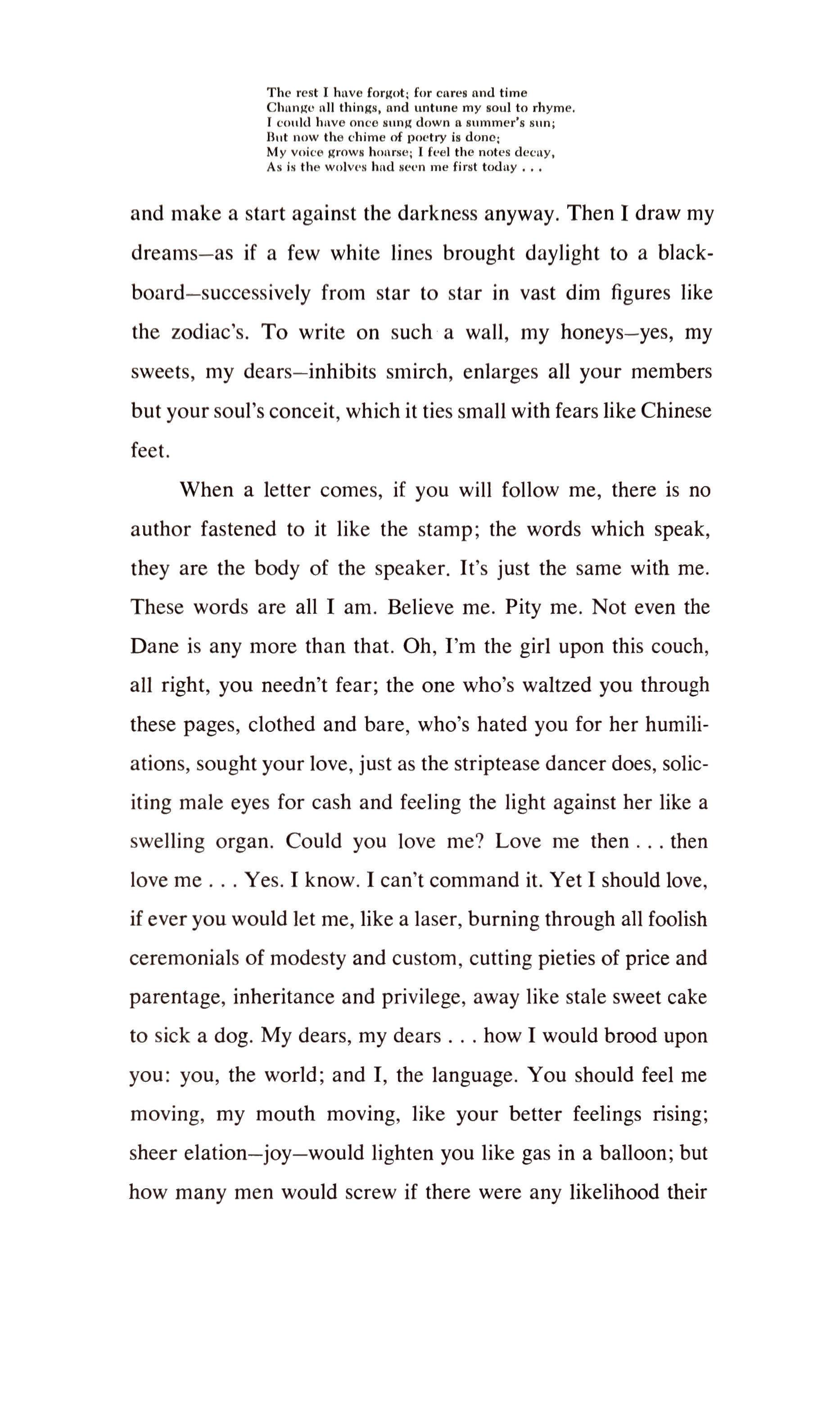
The rest I have forgot, for cares and time Cburure 111I things, and untune my soul to rhyme. r could hnve once Slln!! down a summer's sun, But II()W the chime of poetry is dono; My voice grow. hoarse, I Feel the notes decuy, As is the wolves had seen me first today and make a start against the darkness anyway. Then I draw my dreams as if a few white lines brought daylight to a blackboard successively from star to star in vast dim figures like the zodiac's. To write on such a wall, my honeys yes, my sweets, my dears inhibits smirch, enlarges all your members but your soul's conceit, which it ties small with fears like Chinese feet.
When a letter comes, if you will follow me, there is no author fastened to it like the stamp; the words which speak, they are the body of the speaker. It's just the same with me. These words are all I am. Believe me. Pity me. Not even the Dane is any more than that. Oh, I'm the girl upon this couch, all right, you needn't fear; the one who's waltzed you through these pages, clothed and bare, who's hated you for her humiliations, sought your love, just as the striptease dancer does, soliciting male eyes for cash and feeling the light against her like a swelling organ. Could you love me? Love me then then love me Yes. I know. I can't command it. Yet I should love, if ever you would let me, like a laser, burning through all foolish ceremonials of modesty and custom, cutting pieties of price and parentage, inheritance and privilege, away like stale sweet cake to sick a dog. My dears, my dears how I would brood upon you: you, the world; and I, the language. You should feel me moving, my mouth moving, like your better feelings rising; sheer elation joy would lighten you like gas in a balloon; but how many men would screw if there were any likelihood their
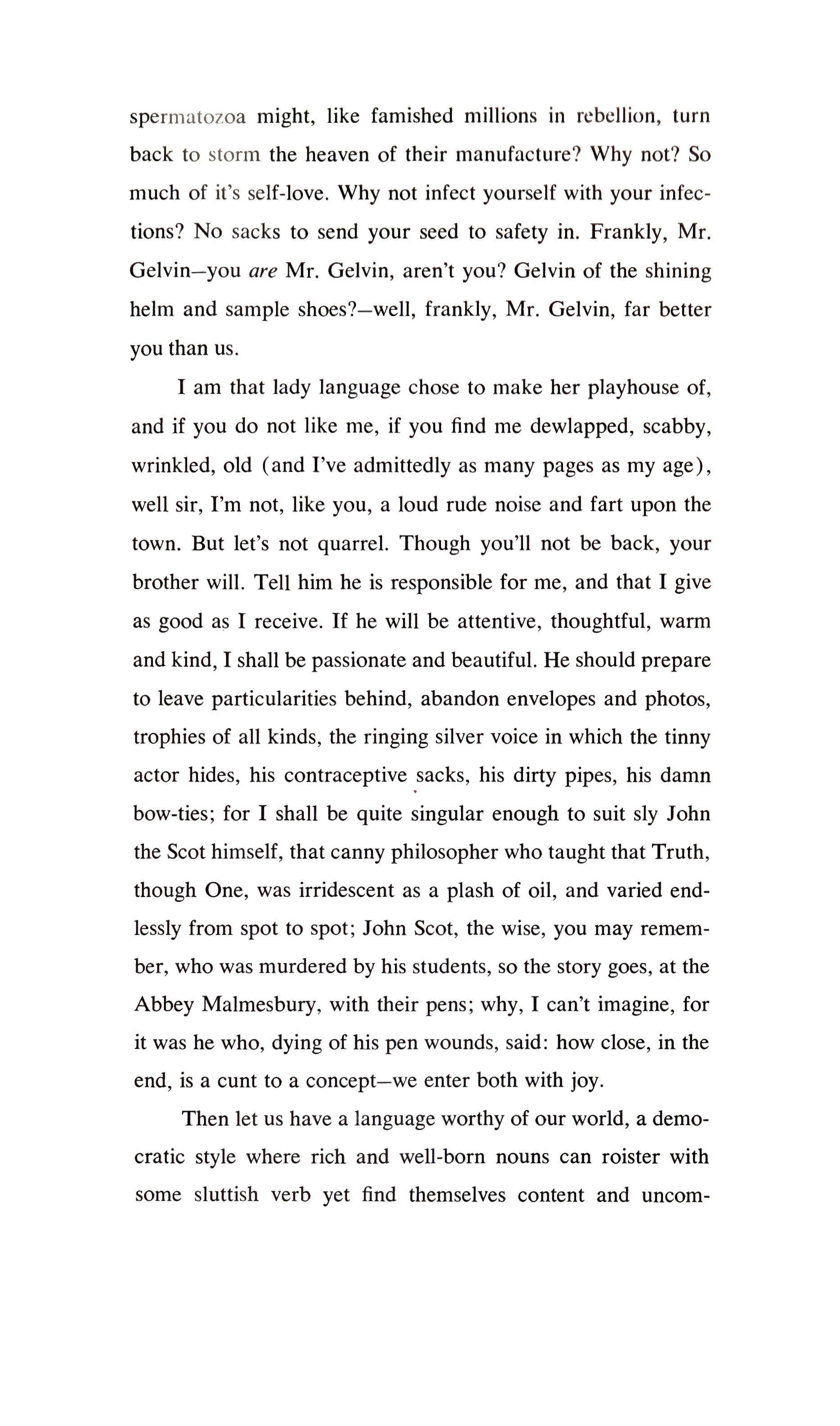
spermatozoa might, like famished millions ill rebellion, turn back to storm the heaven of their manufacture? Why not? So much of it's self-love. Why not infect yourself with your infections? No sacks to send your seed to safety in. Frankly, Mr. Gelvin you are Mr. Gelvin, aren't you? Gelvin of the shining helm and sample shoes? well, frankly, Mr. Gelvin, far better you than us.
I am that lady language chose to make her playhouse of, and if you do not like me, if you find me dewlapped, scabby, wrinkled, old (and I've admittedly as many pages as my age), well sir, I'm not, like you, a loud rude noise and fart upon the town. But let's not quarrel. Though you'll not be back, your brother will. Tell him he is responsible for me, and that I give as good as I receive. If he will be attentive, thoughtful, warm and kind, I shall be passionate and beautiful. He should prepare to leave particularities behind, abandon envelopes and photos, trophies of all kinds, the ringing silver voice in which the tinny actor hides, his contraceptive sacks, his dirty pipes, his damn bow-ties; for I shall be quite singular enough to suit sly John the Scot himself, that canny philosopher who taught that Truth, though One, was irridescent as a plash of oil, and varied endlessly from spot to spot; John Scot, the wise, you may remember, who was murdered by his students, so the story goes, at the Abbey Malmesbury, with their pens; why, I can't imagine, for it was he who, dying of his pen wounds, said: how close, in the end, is a cunt to a concept we enter both with joy.
Then let us have a language worthy of our world, a democratic style where rich and well-born nouns can roister with some sluttish verb yet find themselves content and uncom-






NOT TO BE TAKEN FROM THE LIBRARY


NOT TO BE TAKEN FROM THE LIBRARY



























































































































































































































































































































